His Divine Grace A.C. Bhaktivedanta swami Prabhupada
Founder-Acarya of the International Society for Krishna Consciousness
Fourth Canto
!Part one-chapters 1-Bl
with the original Sanskrit text, its Roman transliteration, word-for-word synonyms, translation and elaborate purports by
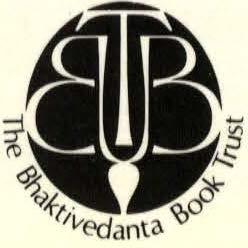
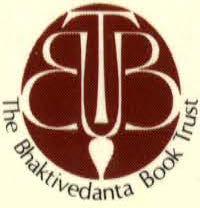
His Divine Grace A.C. Bhaktivedanta swami Prabhupada
Founder-Acarya of the International Society for Krishna Consciousness
359 pages
8 color illustrations
Of all the treasures of ancient India, none can be more valuable than Srimad-Bhagavatam. Indeed, the Bhagavatam is so exalted that it is worshiped as a literary incarnation of God Himself, and it is said that simply by hearing Sriinad-Bh�gavatam one can attain the highest plane of transcendental consciousness. Science, politics, adventure, philosophy, sociology, religion and love all find their perfection in Srimad-Bh�gavatam because the Bhagavatam is the authorized transcendental history of the pastimes of Lord Sri Kr�l')a, the Supreme Personality of Godhead.
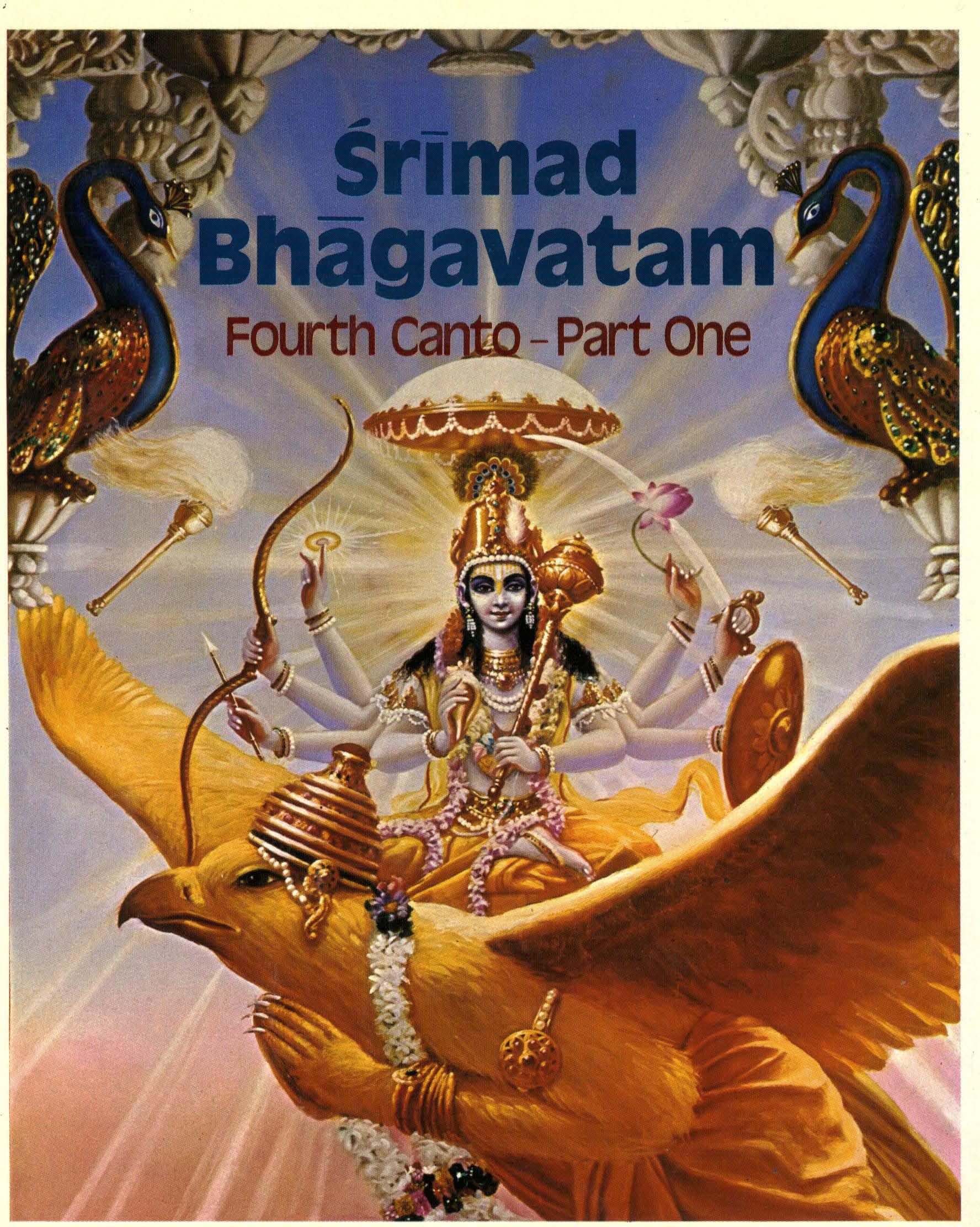
Although Lord Sri Kr�l')a is the speaker of the worldfamous Bhagavad-gita and although He is celebrated both in the world and in the Vedas as the Supreme Personality of Godhead, the transcencental nature of His appearance and activities is rarely understood even by the greatest scholars. As Kr�l')a says Himself in the Git�. "Out of many thousands among men, one may endeavor for perfection, and of those who have achieved perfection, hardly one knows Me in truth." In SrimadBh�gavatam, the name, fame, qualities and pastimes of this Supreme Personality are elaborately described in a scientific way. The science of God is greater than all other sciences, and this spiritual technology is brilliantly explained in the 18,000 verses of Srimad-Bhagavatam.
(continued on back flap)
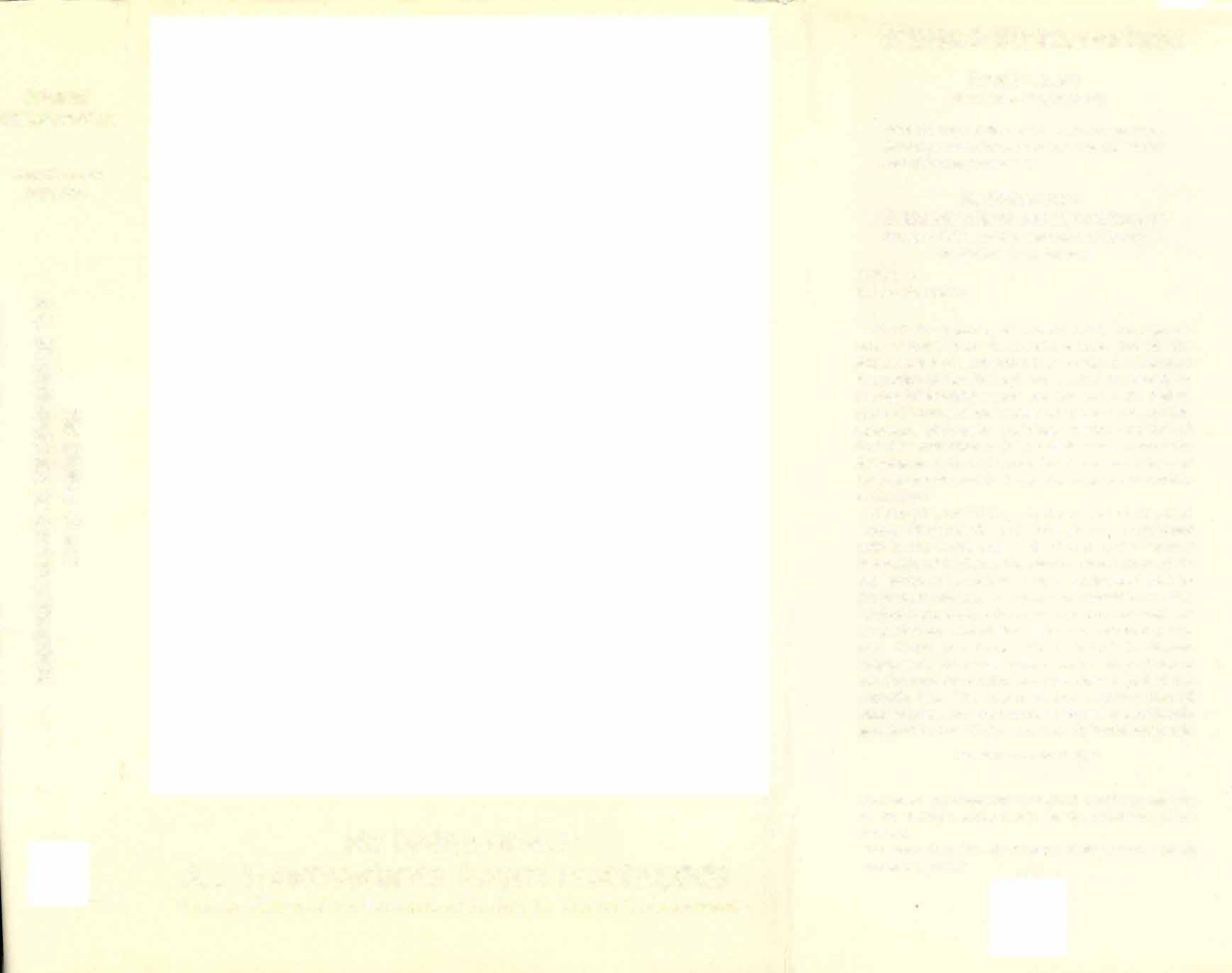
Frontcover: The Personality of Godhead Lord Vi�QU appearing on His feathered carrier Garuqa for the benediction of the demigods.
Back cover: Lord Siva, the destroyer of the universe, with his devoted consort Sat!.
grimad Bhagavatam Fourth canto Part one )> h . OJ :::r nl � �· ::J: c. v;· nl c ::::s S" c::· 5' CJ) en � 0 ..., �. nl n ""0 en QJ C' :::r c '0 nll c. nl
Srlmad-Bhagavatam
(continued from front flap)


Therefore by reading Srimad-Bhiigavatam one is sure to become a fully self-realized soul, and in the advanced stage of self-realization one can enjoy the highest satisfaction and become absorbed in the transcendental pastimes that the Bhagavatam describes.
Srimad-Bhagavatam is a book of knowledge and of truth. Originally spoken 5,000 years ago, it has been carefully handed down in the Sanskrit language through a chain of self-realized spiritual masters, and it is now being translated into English by His Divine Grace A.C. Bhaktivedanta Swami Prabhupada, the world's greatest authorityonVedicreligionandthought. SrilaPrabhupada is the founder and spiritual master of the International Society for Krishna Consciousness and the author of Bhagavad-gita As It Is, Kr�rJa and many other English versionsofVedicIiterature. Hisauthoritativetranslations, commentaries and summary studies are standard textbooks of transcendental science.
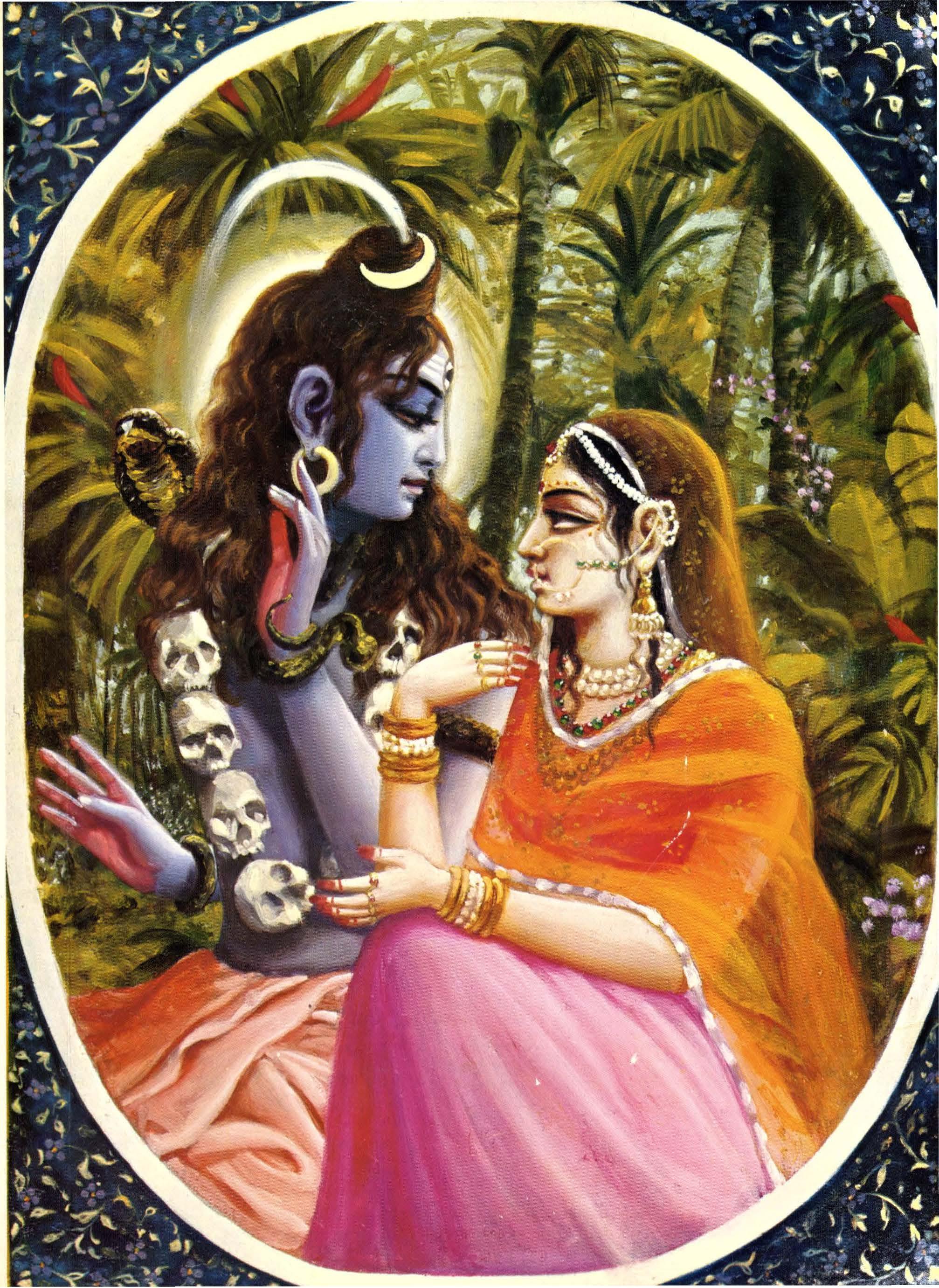
Srila Prabhupada does not write with any professional mot1ve in mind. Upon the order of his spiritual master, he has taken up the work of Kr�f)a consciousness as a matter of spiritual responsibility, and he has dedicated his life to spreading the messageof Srimad-Bhagavatam. His Divine Grace says, "It is the great need of modern civilization. I am hopeful of its good reception by the thinkersand leaders of society.
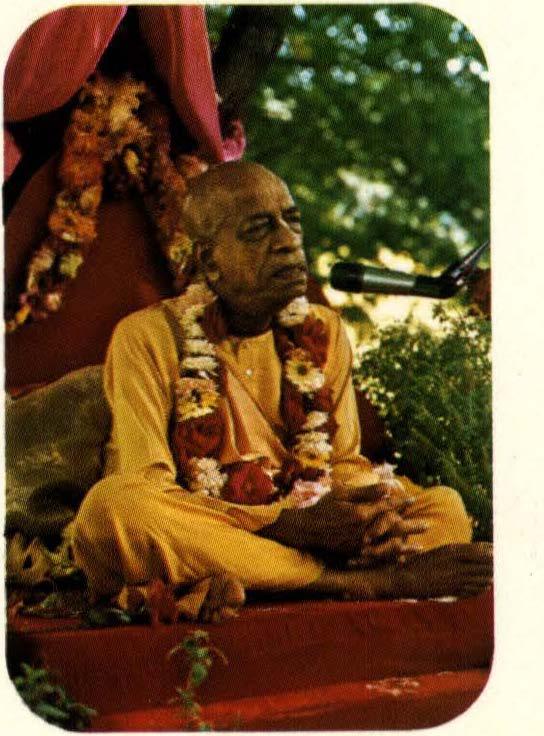 His Divine Grace A. C. Bhaktivedanta Swami Prabhupada
His Divine Grace A. C. Bhaktivedanta Swami Prabhupada
His Divine Grace
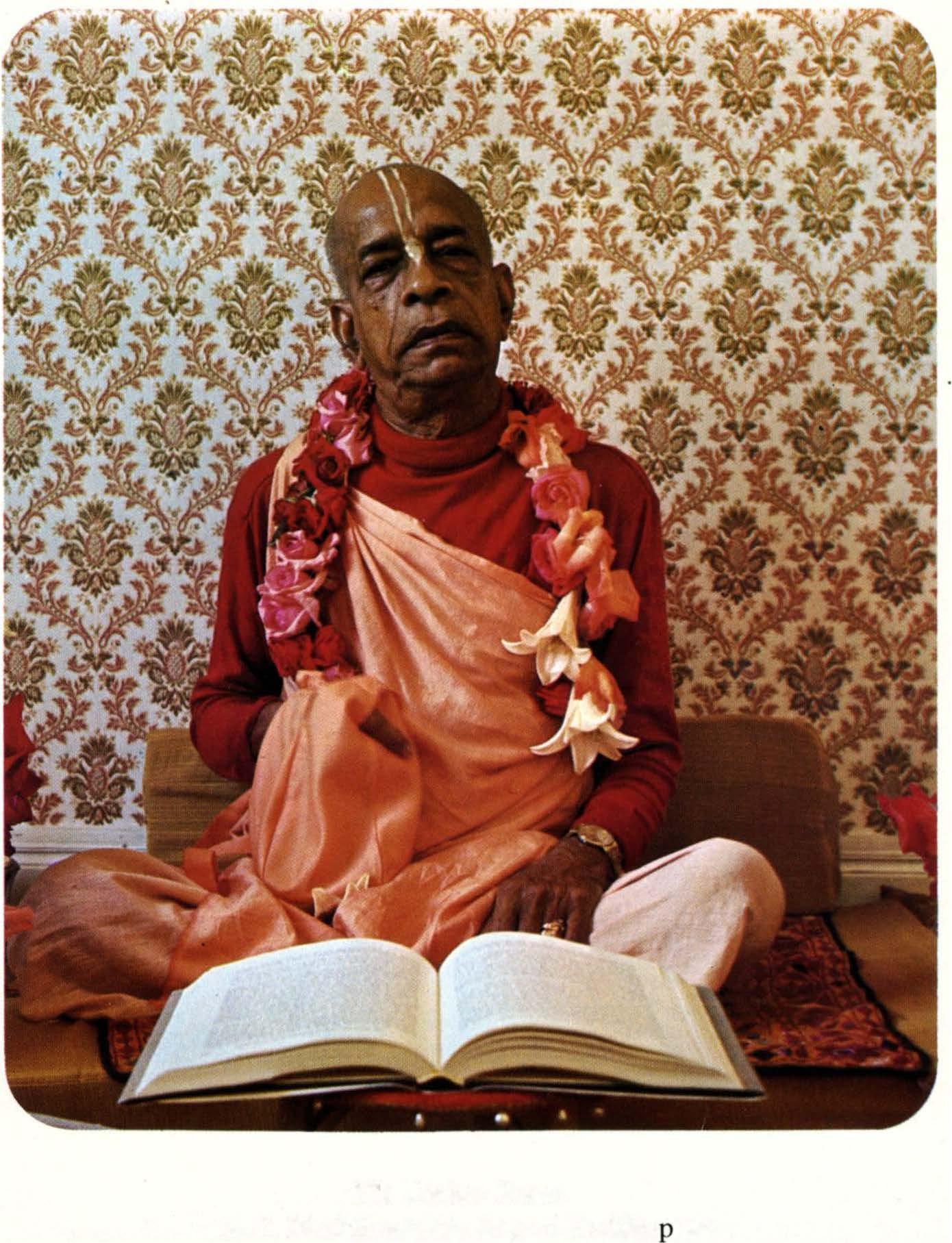
A.C. Bhaktivedanta Swami Prabhu ada

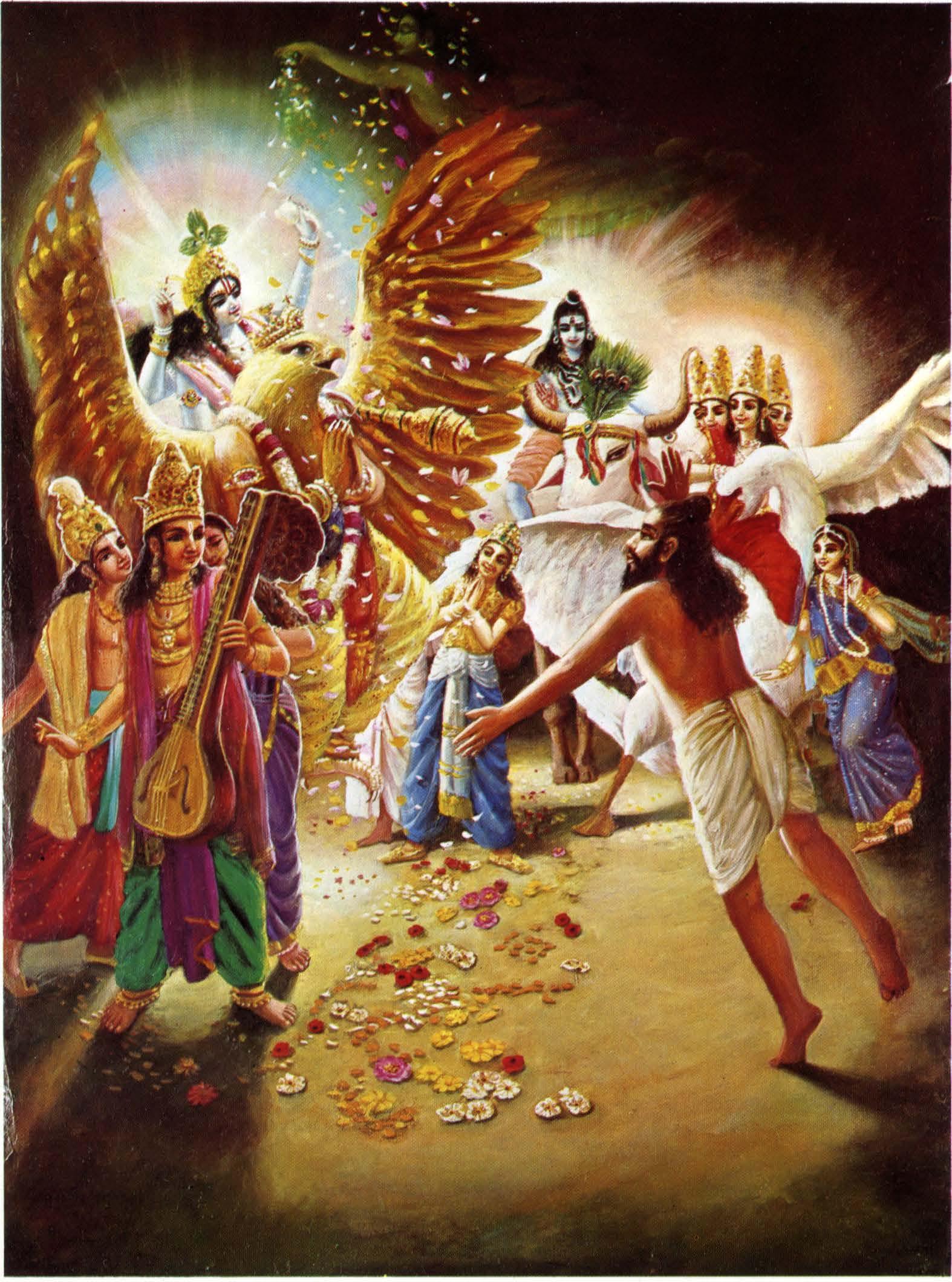
 Plate 1
The three deities approached the hermitage of Atri Muni, accompanied by the denizens of the heavenly planets. (page 19)
Plate 1
The three deities approached the hermitage of Atri Muni, accompanied by the denizens of the heavenly planets. (page 19)
.Plate 2 ln the heavenly planets, bands began to play, and they showered flowers from the sky. Great demi ods like Brahma also offered their res ectful ra ers. a e 38


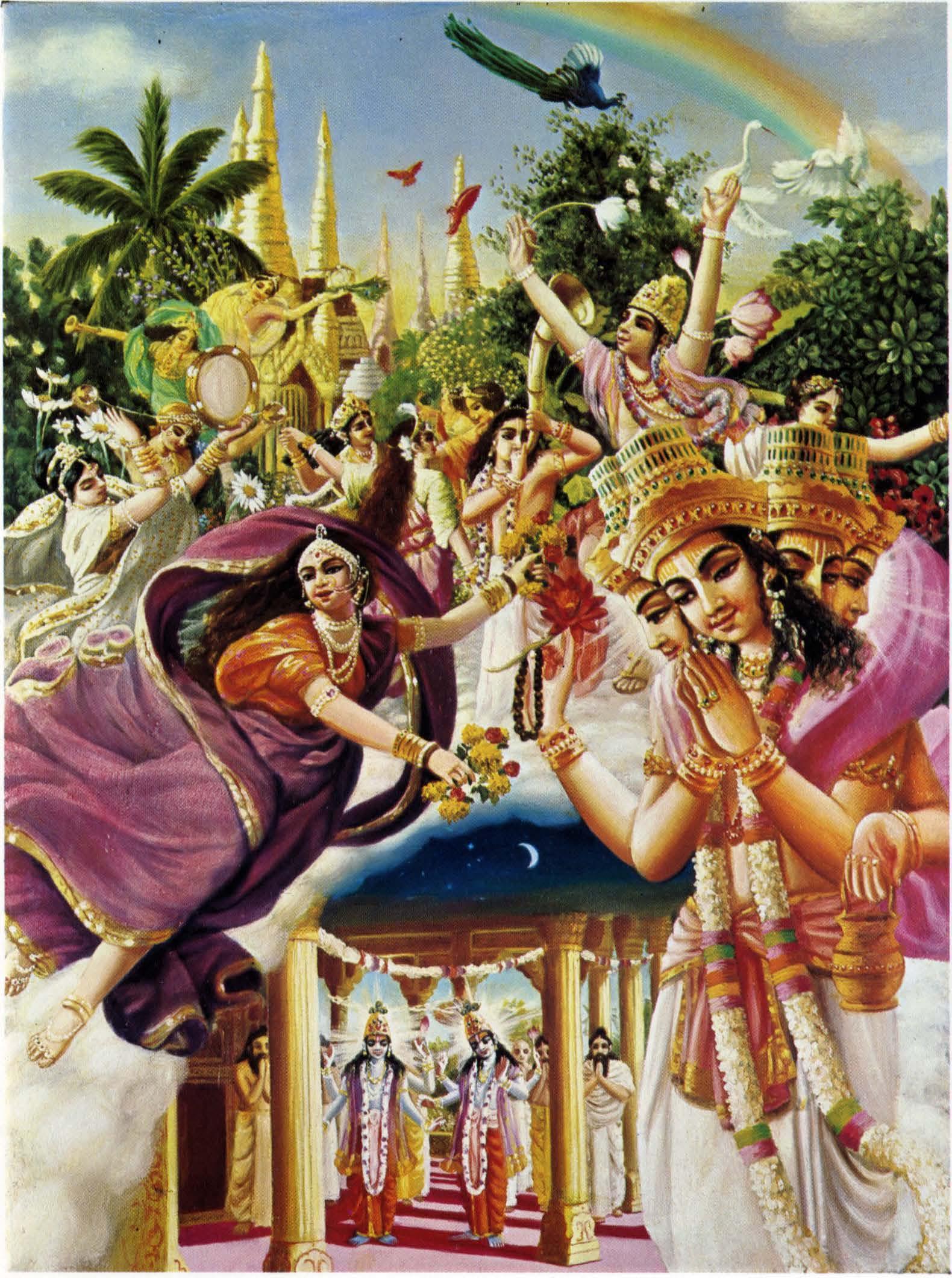

Plate 3 Sati could not persuade Lord Siva to give her permission to go to her father's home. (page 110)

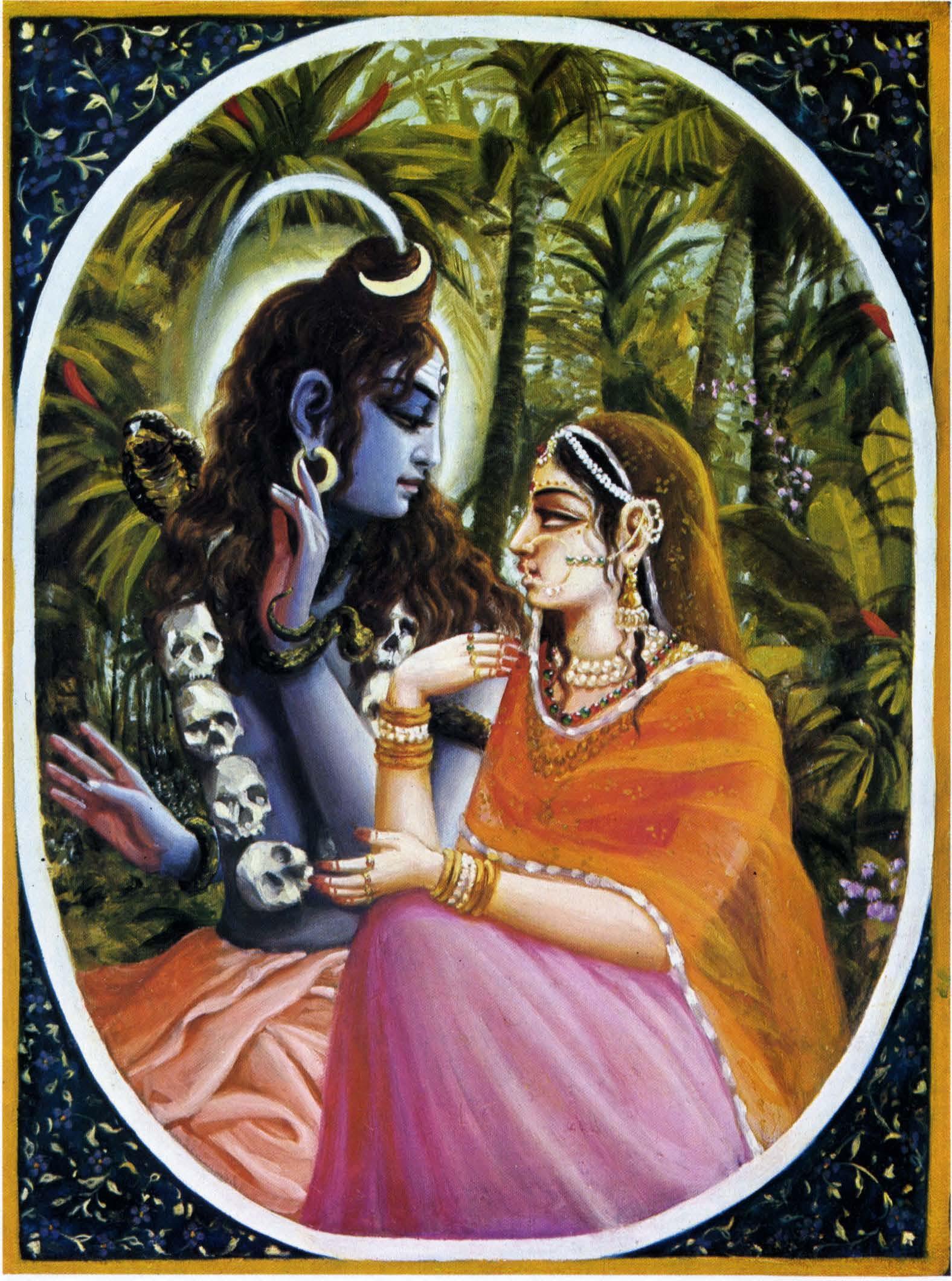

Plate 4 Satl became completely cleansed of all taints of sin and quit her body in a blazing fire by meditation on the fiery elements. (page 141)
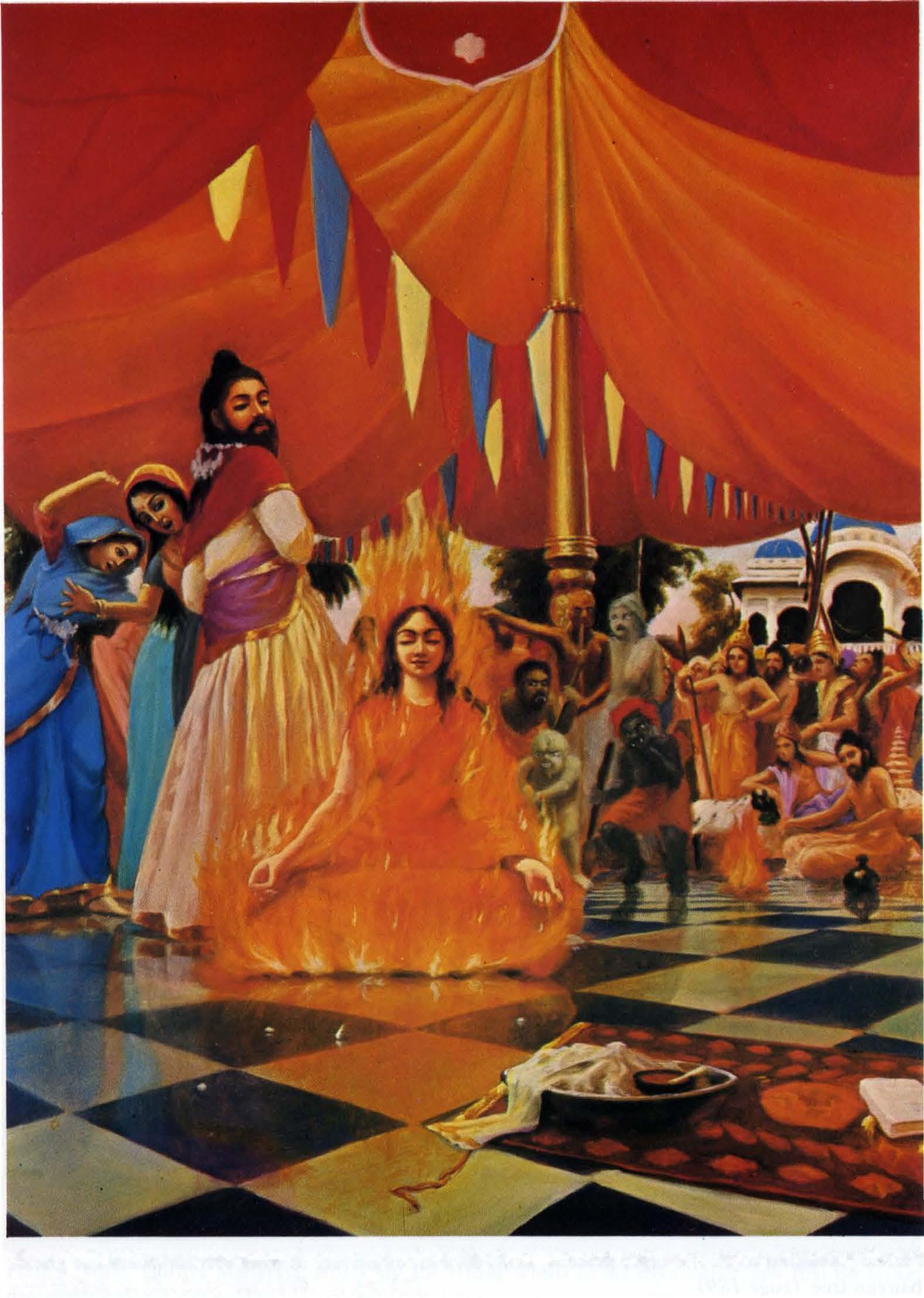
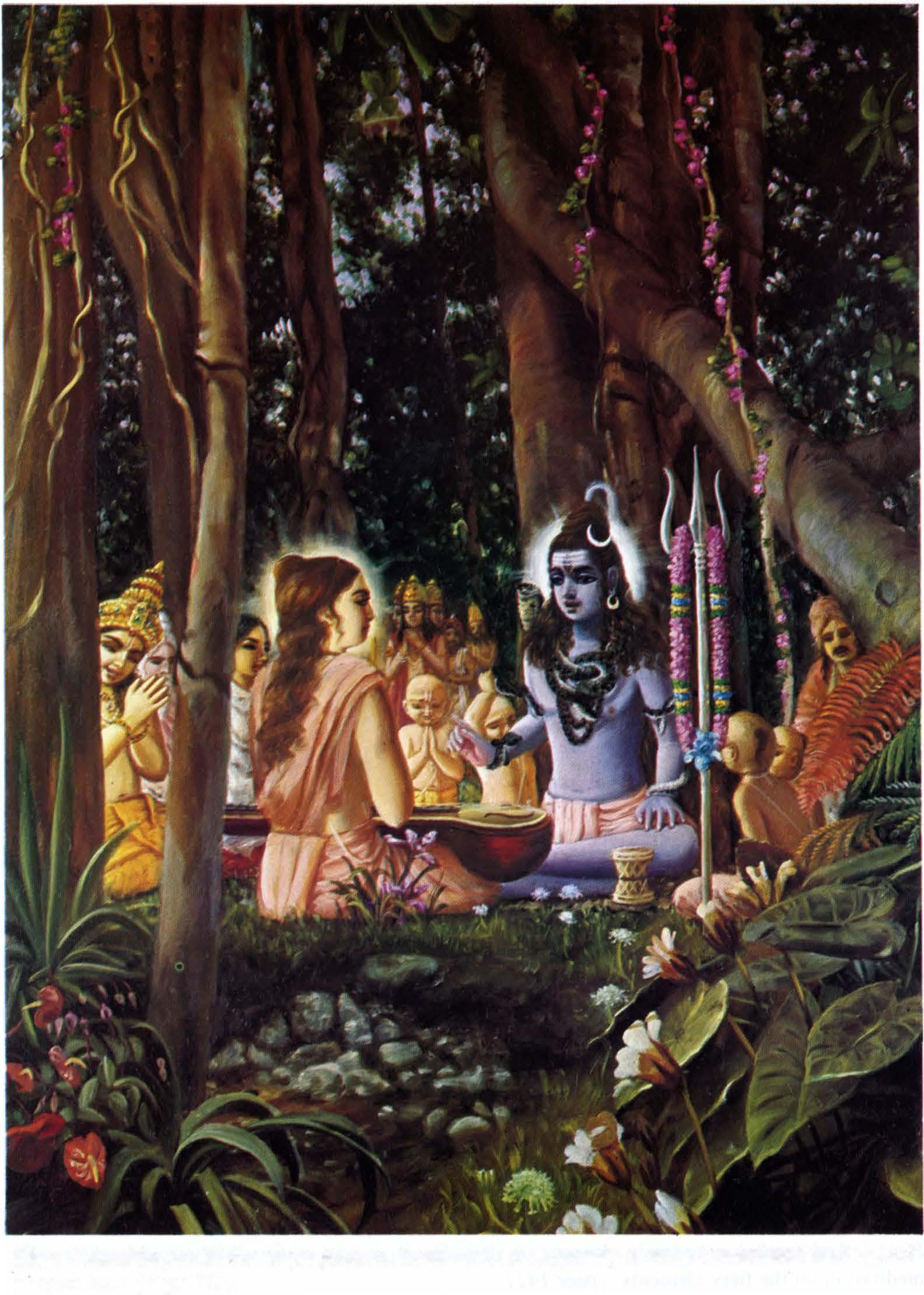 Plate 5 Speaking to all the sages present, Lord Siva sat as gravely as time eternal under the giant banyan tree. (page 189)
Plate 5 Speaking to all the sages present, Lord Siva sat as gravely as time eternal under the giant banyan tree. (page 189)
When Dhruva Maharaja, struck by the strong words of his stepmother, saw that his father was silent and did not rotest, he immediately left the alace. (page 290)
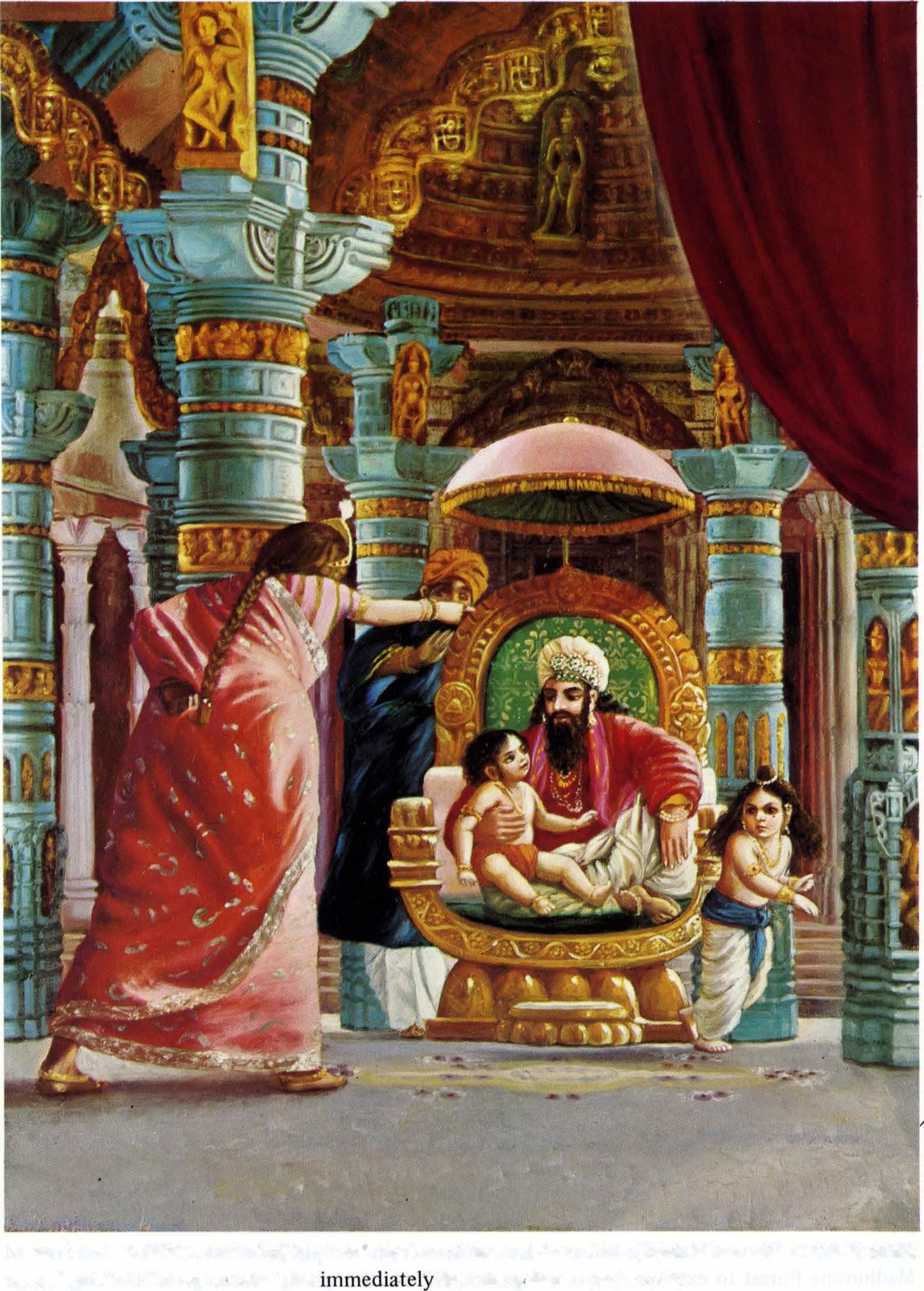 Plate 6
Plate 6
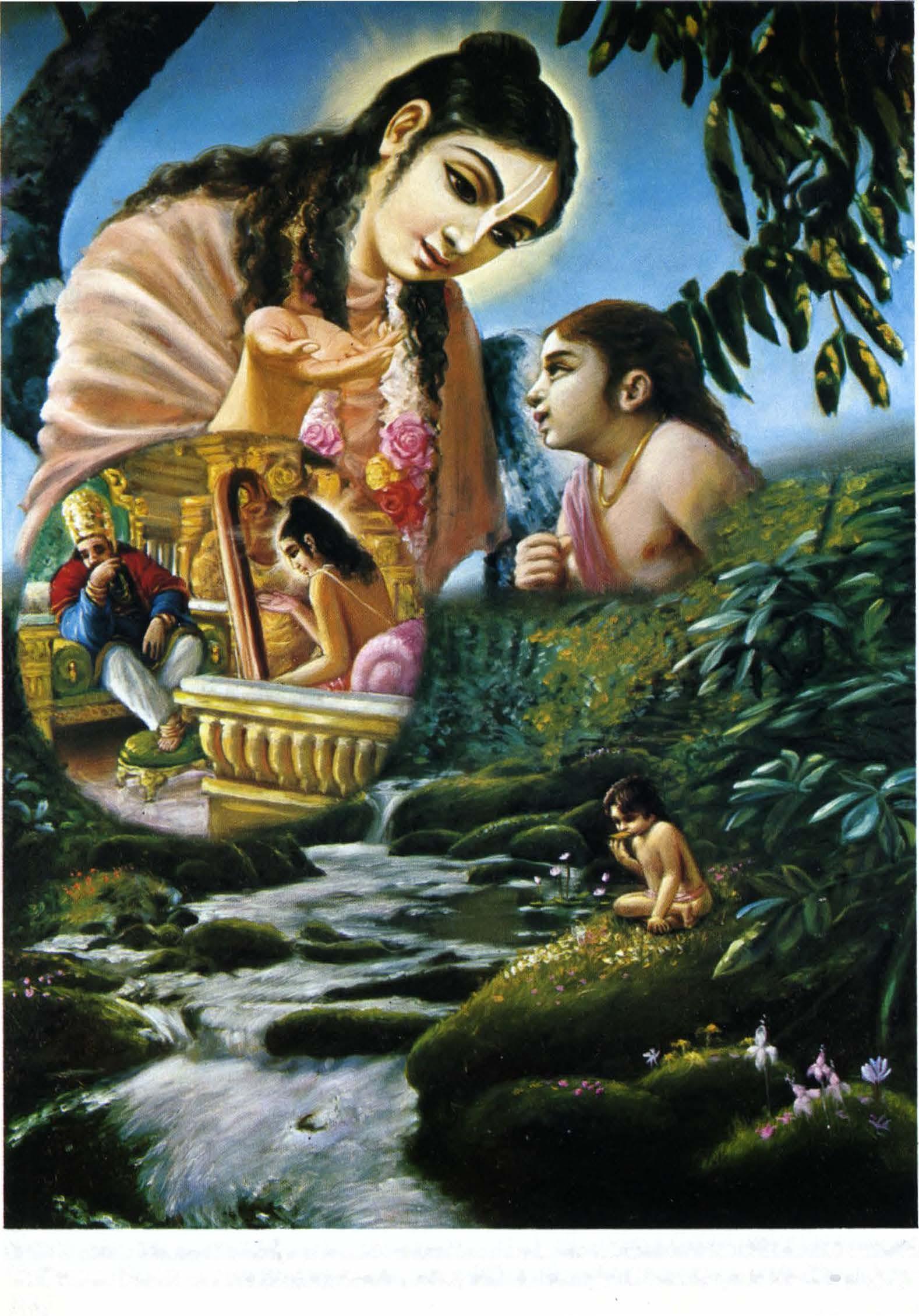 Plate 7 After Dhruva Maharaja received instructions from his spiritual master Narada and entered Madhuvana Forest to execute devotional service, Narada thought it wise to go to the King. (page 341)
Plate 7 After Dhruva Maharaja received instructions from his spiritual master Narada and entered Madhuvana Forest to execute devotional service, Narada thought it wise to go to the King. (page 341)
Srlmad-Bhagavatam

OTHER BOOKS
by His Divine Grace A.C. Bhaktlvectanta swami Prabhupada
Bhagavad-g"'itii As It Is '

r"'imad-Bhiigavatam, Cantos 1-3

Teachings of Lord Chaitanya
The Nectar of Devotion
Easy Journey to Other Planets
KnrJ.a Consciousness: The Topmost Yoga System
Kmta, the Supreme Personality of Godhead (2 Vols.)
Transcendental Teachings of Prahliid Mahiiraj
Transcendental Teachings of Caitanya Mahiiprabhu
Beyond Birth and Death
On the Way to KHTJ.a
Rii.ja-vidyii: The King of Knowledge
Elevation to KnTJ.a Consciousness
Back to Godhead Magazine (Founder)
Kmw, the Matchless Gift
Kr�t;ta, the Reservoir of Pleasure
A complete catalogue is available upon request.
Srlmad-Bhagavatam
Fourth Canto
"The creation Of the Fourth Order"
<Part one-Chapters 1-8>
With the Original Sanskrit Text, Its Roman Transliteration, Synonyms, Translation and Elaborate Purports by
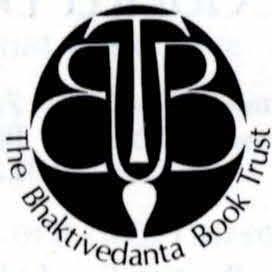

His Divine Grace
A.C. Bhaktivedanta swami Prabhupada
Founder-Acarya of the International Society for Krishna Consciousness
Copyright © 1972 by the Bhaktivedanta Book Trust
International Standard Book Number: 0-912776-33-2

Library of Congress Catalogue Card Number: 71-189066

ALL RIGHTS RESERVED
Readers interested in the subject matter of this book are invited by the International Society for Krishna Consciousness to correspond with its Secretary.
International Society for Krishna Consciousness 3764 Watseka Ave. Lo Angele , Calif. 90034
The Bhaktivedanta Book Trust
32 Tiffany Place 3764 Watsckn Avenu · 13ruoklyn, No;w York 11231 Lo Angeles, Cnlifornia 90034 7 Bury Pia 'C Gandhi Gram Road Bloomsbury, W.C. I .luhu, Bombay.54 London
Dai Nippon Printing Co., Ltd., Tokyo, Japan
Printed by
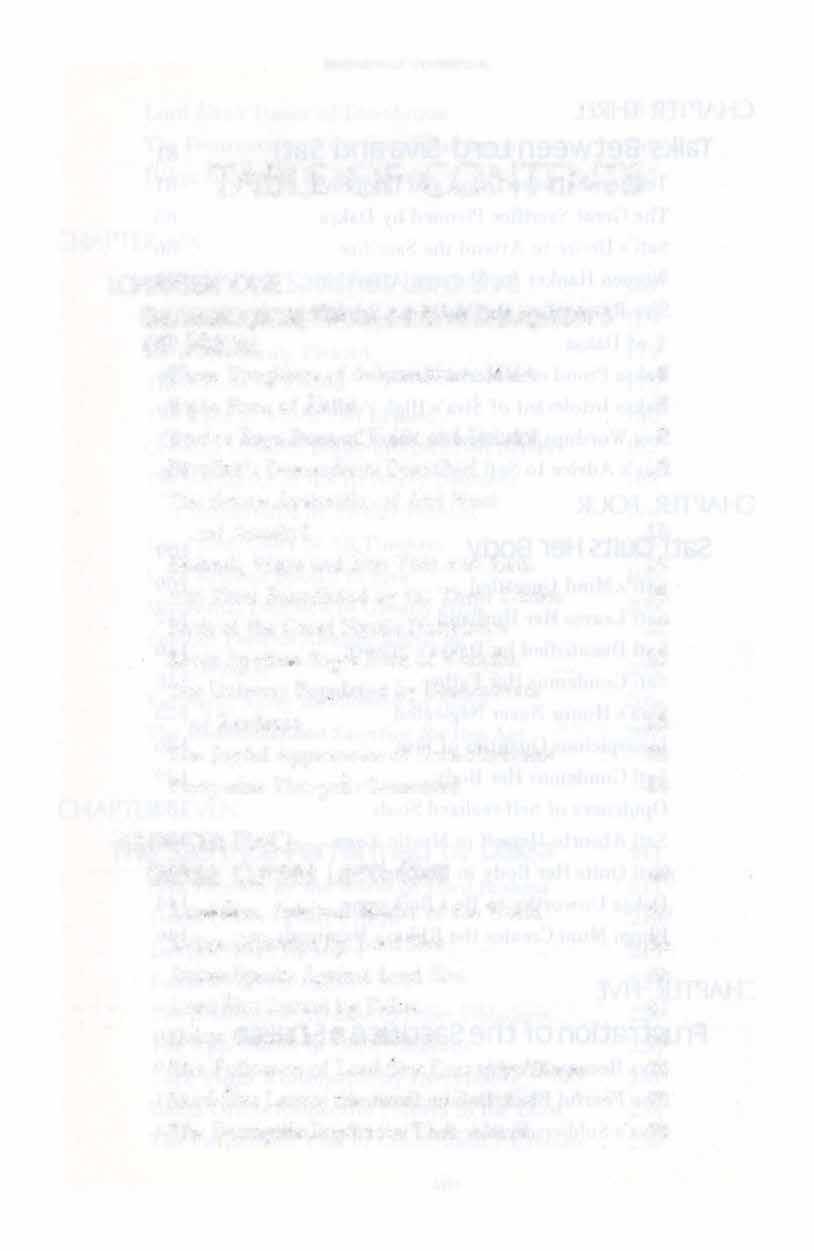

TABLE
CONTENTS CHAPTER ONE Genealogical Table of the Daughters of Manu 1 Three Daughters of Svayambhuva Manu 1 Yajfia Born of Akuti 5 Twelve Boys Born of Yajfia and Dak�il')ii 8 Plirl')ima's Descendants Described 12 The Severe Austerities of Atri Muni and Anasuya 15 Brahma, Vi�I')U and Siva Visit Atri Muni 19 Atri Muni Benedicted by the Three Deities 25 Birth of the Great Mystic Dattatreya 27 Seven Spotless Sages Born of Vasi�tha 31 The Universe Populated by Descendants of Kardama 35 The Joyful Appearance of Nara-Narayal')a 38 Forty-nine Fire-gods Generated 44 CHAPTER TWO oak$a curses Lord Siva 49 Lord Siva, Spiritual Master of the World 50 Dak�a Offended by Lord Siva 54 Dak�a Speaks Against Lord Siva 56 Lord Siva Cursed by Dak�a 61 Dak�a Cursed by Nandisvara 64 The Followers of Lord Siva Cursed by Bhrgu 70 Lord Siva Leaves the Arena of Sacrifice 77 The Demigods Depart for Their Abodes 79 vu
OF

Table of Contents CHAPTER THREE Talks Between Lord Siva and SatT s1 Tension Between Dak�a and Lord Siva 81 The Great Sacrifice Planned by Dak�a 83 Sati's Desire to Attend the Sacrifice 86 Women Hanker for Material Affection 90 Siva Remembers the Malicious Speeches of Dak�a 93 Dak�a Proud of Material Assets 96 Dak�a Intolerant of Siva's High Position 100 Siva Worships Vasudeva in Pure Consciousness 103 Siva's Advice to Sati 106 CHAPTER FOUR satT Quits Her Body 1o9 Sati's Mind Unsettled 109 Sati Leaves Her Husband 112 Sati Dissatisfied by Dak�a's Silence 116 Sati Condemns Her Father 118 Siva's Honor Never Neglected 123 Inauspicious Qualities of Siva 126 Sati Condemns Her Body 129 Opulences of Self-realized Souls J 33 Sati Absorbs Herself in Mystic Yoga 137 Sati Quits Her Body in Blazing Fire 141 Dak�a Unworthy to Be a Briihma[la 144 Bhrgu Muni Creates the .{tbhava Demigods 146 CHAPTER FIVE Frustration of the sacrifice of Dak$a 149 Siva Becomes Angry 149 The Fearful Black Demon Created 151 Siva's Soldiers Follow the Fierce Personality 154 viii
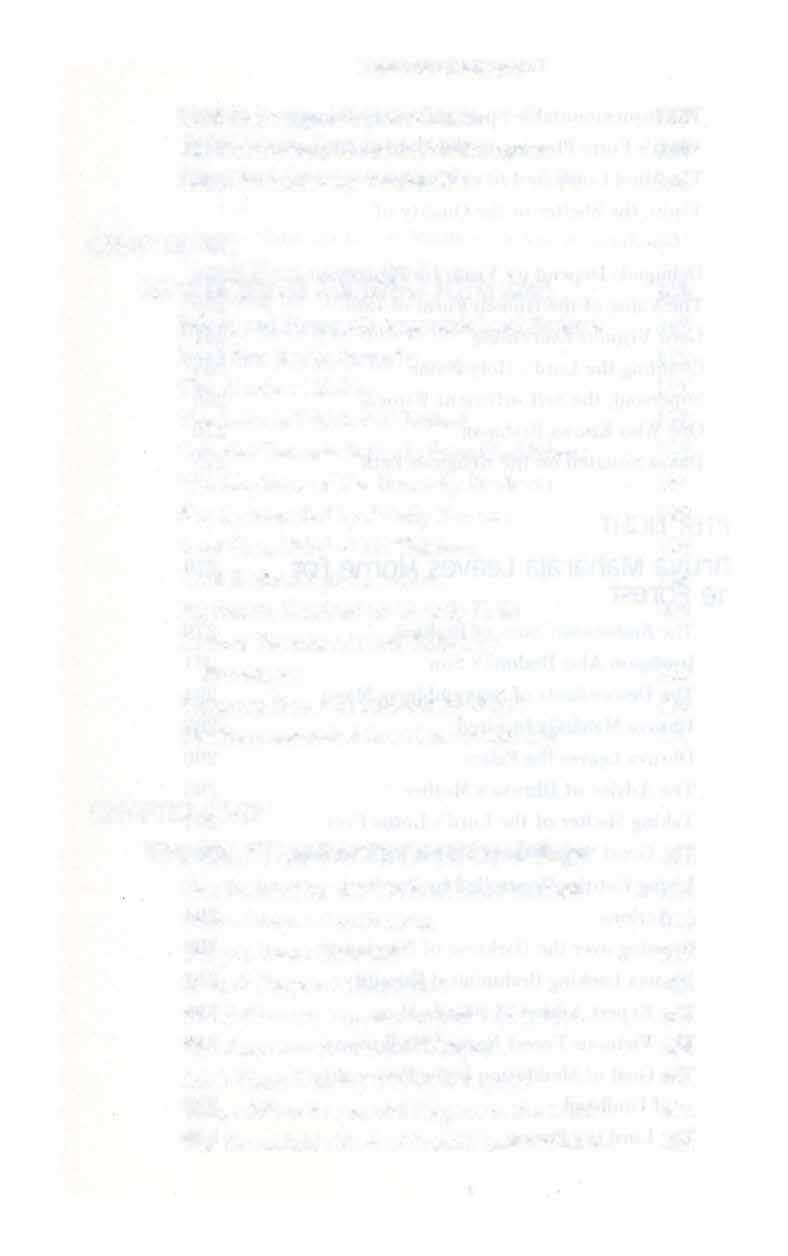

Table of Contents Lord Siva's Dance of Dissolution 157 The Destruction of the Sacrificial Arena 160 Dak�a Beheaded by Virabhadra 165 CHAPTER SIX Lord Brahma satisfies Lord Siva 169 Priests and Demigods Approach Lord Brahma 169 Lord Siva Easily Pleased 172 The Abode of Kailasa 1 75 The Lake in Which Sati Bathed 180 Celestial Damsels Enjoy in Sanctified Rivers 182 The Airplanes of the Heavenly Denizens 184 Siva Surrounded by Saintly Persons 190 Lord Siva, Chief of All Thinkers 194 Lord Brahma Speaks to Siva 196 Miscreants Destined to Ghastly Hells 200 Envious Persons Already Killed by Providence 203 Vai�l}avas Never Bewildered by Miiyii 205 The Recommended Sacrifice for this Age 209 CHAPTER
The sacrifice Performed by Dak$a 211 Siva Pacified by the Words of Lord Brahma 211 Dak�a Given a Goat's Head 213 Dak�a's Heart Cleansed 219 Dak�a's Prayers to Lord Siva 221 The Briihmaf1as Arrange to Offer Oblations 226 The Appearance of Lord Narayal}a 228 Lord Vi�I}U Worshipable by Everyone 231 Dak�a Offers Respectful Prayers to the Lord 234 The Formidable Fort of Conditional Existence 236 lX
SEVEN
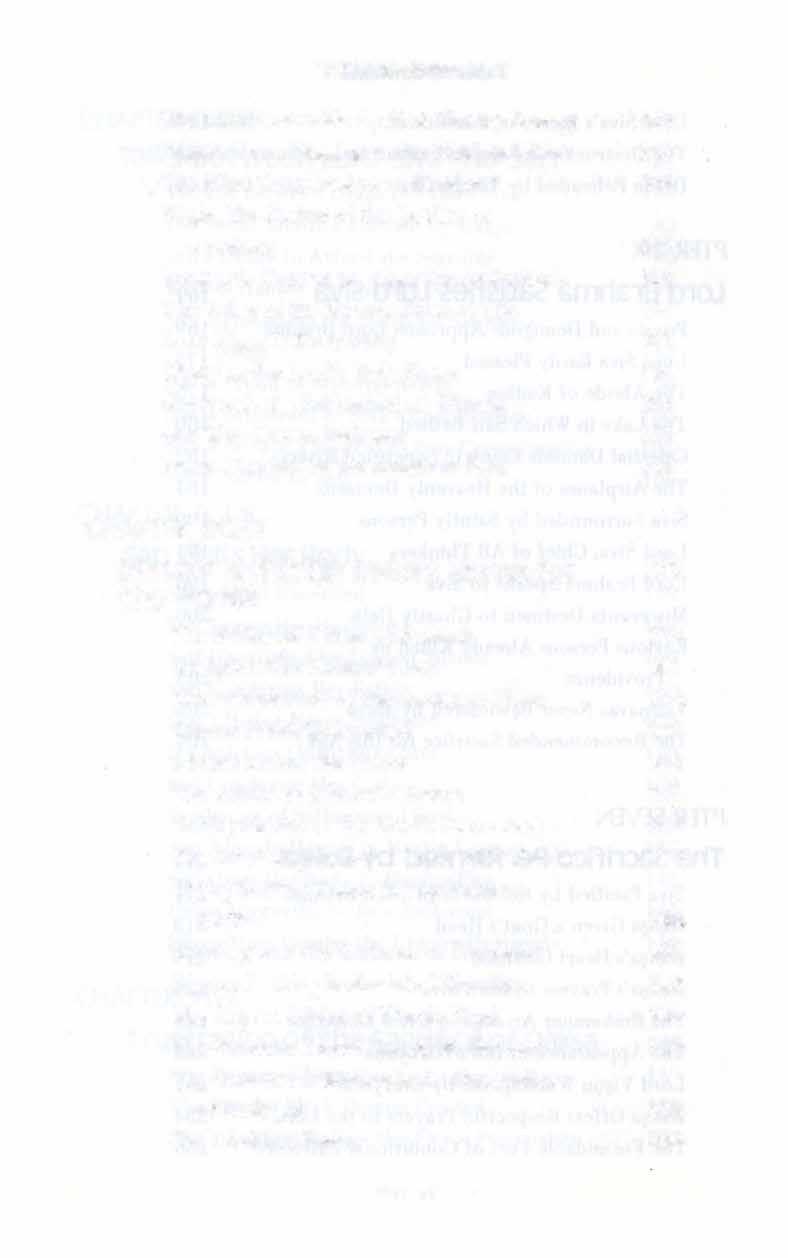
Table of Contents The Insurmountable Spell of Illusory Energy 239 Vi�pu's Form Pleasing to the Mind and Eyes 242 The Mind Compared to an Elephant 246 Vi�Qu, the Shelter of the Quality of Goodness 253 Demigods Depend on Vi�QU for Protection 256 The Value of the Human Form of Life 259 Lord Vi�QU Is Everything 261 Chanting the Lord's Holy Name 264 Supersoul, the Self-sufficient Witness 266 One Who Knows Brahman 270 Dak�a Situated on the Religious Path 273 CHAPTER EIGHT Dhruva Maharaja Leaves Home for 279 the Forest The Brahmacii.ri Sons of Brahma 279 Irreligion Also Brahma's Son 281 The Descendants of Svayambhuva Manu 284 Dhruva Maharaja Insulted 287 Dhruva Leaves the Palace 290 The Advice of Dhruva's Mother 293 Taking Shelter of the Lord's Lotus Feet 297 The Great Sage Narada Struck with Wonder 301 Living Entities Controlled by Previous Actions 304 Crossing over the Darkness of Nescience 308 Dhruva Lacking Brahminical Humility 312 The Expert Advice of Narada Muni 316 The Virtuous Forest Named l\Iadhuvana 319 The Goal of .Meditation Is the Personality of Godhead 322 The Lord Is a Person 325 X

Table of Contents Perfect Human Beings Flying in the Sky 329 TulasT Leaves Very Dear to Kr�J;Ja 333 Prescribed Paraphernalia for Worship of the Lord 337 Dhruva Maharaja Enters Madhuvana Forest 341 Narada Muni Advises the King 345 Following the Orders of the Spiritual Master 347 Dhruva Maharaja Captures the Supreme Lord 352 The Lord Reassures the Demigods 358 XL
CHAPTER ONE
Genealogical Table of the Daughters of Manu TEXT l fu�
maitreya uvaca manos tu satariipiiyarh tisra� kanyas ca jajnire akiitir devahiitiS ca pras iitir iti viSruta�
maitreya� uvaca-the great sage Maitreya said; mano� tu-of Svayambhuva Manu; satariipayam-in his wife Satariipa; tisra�-three; kanya� ca-daughters also; jajnire-gave birth; akuti�-named Akuti; devahiit*-named Devahiiti; ca-also; prasut*-named Prasiiti; iti-thus; viSruta�-wel1 known.
TRANSLATION
Sri Maitreya said: Svayambhuva Manu begot three daughters in his wife Satariipa,and their names were Akiiti, Devahiiti and Prasiiti.
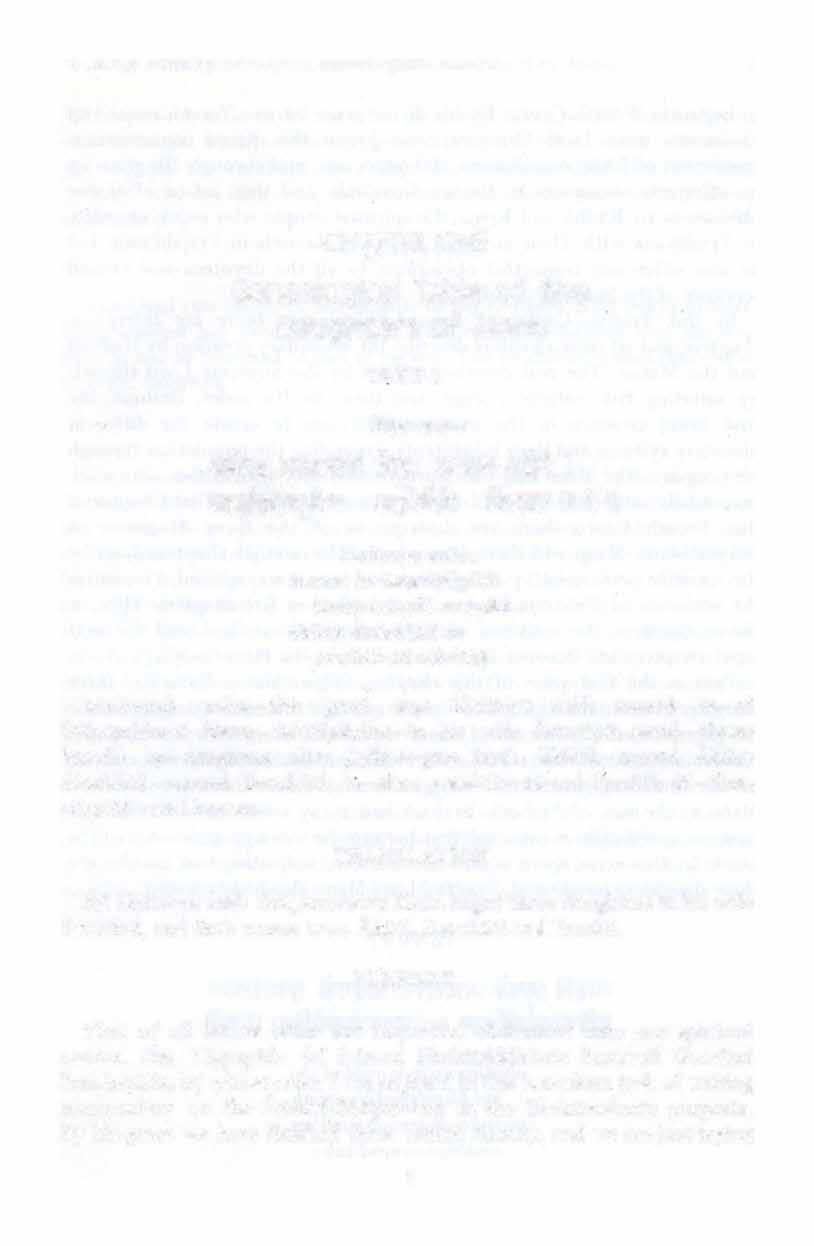
PURPORT
First of all let us offer our respectful obeisances unto our spiritual master, Om Vi�!]upada Sri Srimad Bhaktisiddhanta Sarasvati Gosvami Prabhupada, bywhoseorder I am engaged in this herculean taskofwriting commentary on the Srimad-Bhiigavatam as the Bhaktivedanta purports. By his grace we have finished three cantos already, and wearejusttrying
���6�1�i
iil�
ftm: �ff
I 31ffi��q:Rr� !N.� R�H II � II
l
to begin the Fourth Canto. By his divine grace let us offer our respectful obeisances unto Lord Caitanya, who began this Kp]l}a consciousness movement of Bhiigavata-dharma 500 years ago, and through His grace let us offer our obeisances to the six Gosvamis, and then let us offer our obeisances to Radha and Kr�J}a,the spiritual couple who enjoy eternally in Vrndavana with Their cowherd boys and damsels in Vrajabhumi. Let us also offer our respectful obeisances to all the devotees and eternal servitors of the Supreme Lord.
In this Fourth Canto of Srimad-Bhiigavatam there are thirty-one chapters,and all these chapters describe the secondary creation by Brahma and the Manus. The real creation is done by the Supreme Lord Himself by agitating His material energy, and then, by His order, Brahma, the first living creature in the universe, attempts to create the different planetary systems and their inhabitants,expanding the population through his progeny, like Manu and other progenitors of living entities, who work perpetually under the order of the Supreme Lord. In the First Chapter of this Fourth Canto there are descriptions of the three daughters of Svayambhuva Manu and their descendants. The next six chapters describe the sacrifice performed by King Dak�a and how it was spoiled. Thereafter the activities of Maharaja Dhruva are described in five chapters. Then, in eleven chapters, the activities of King Prthu are described, and th� next eight chapters are devoted to the activities of the Pracetas J5.ih.gs. Asdescribed in the first verse of this chapter, Svayambhuva Manu had three daughters,named Akuti, Devahiiti andPrasuti..Ofthesethree daughters, one daughter, Devahuti, has already been described, along with her husband, Kardama Muni, and her son, Kapila Muni. In this chapter the descendants of the first daughter, Akuti, will specifically be described. Svayambhuva Manu is the son of Brahma. Brahma had many other sons, but Manu's name is specifically mentioned first because he was a great devotee of the Lord. In this verse there is also the word ca, indicating that besides the three daughters mentioned, Svayambhuva Manu also had two sons.

TEXT 2

2
Srimad-Bhagavatam (Canto 4, Ch. l
rucaye pradad api bhratrmatim nrpa� putrika-dharmam asritya satarupanumodita�
akut�rh
iikutim- Akiiti; rucaye-unto the great sage Ruci;priidiit-handed over; api-although; bhriitrmatim- daughter having a brother; nrpa�-the King; putrikii-get the resultant son; dharmam-religious rites; iisritya- taking shelter; sataru'pii-the wife of Svayambhuva Manu; anumodita�-being sanctioned.
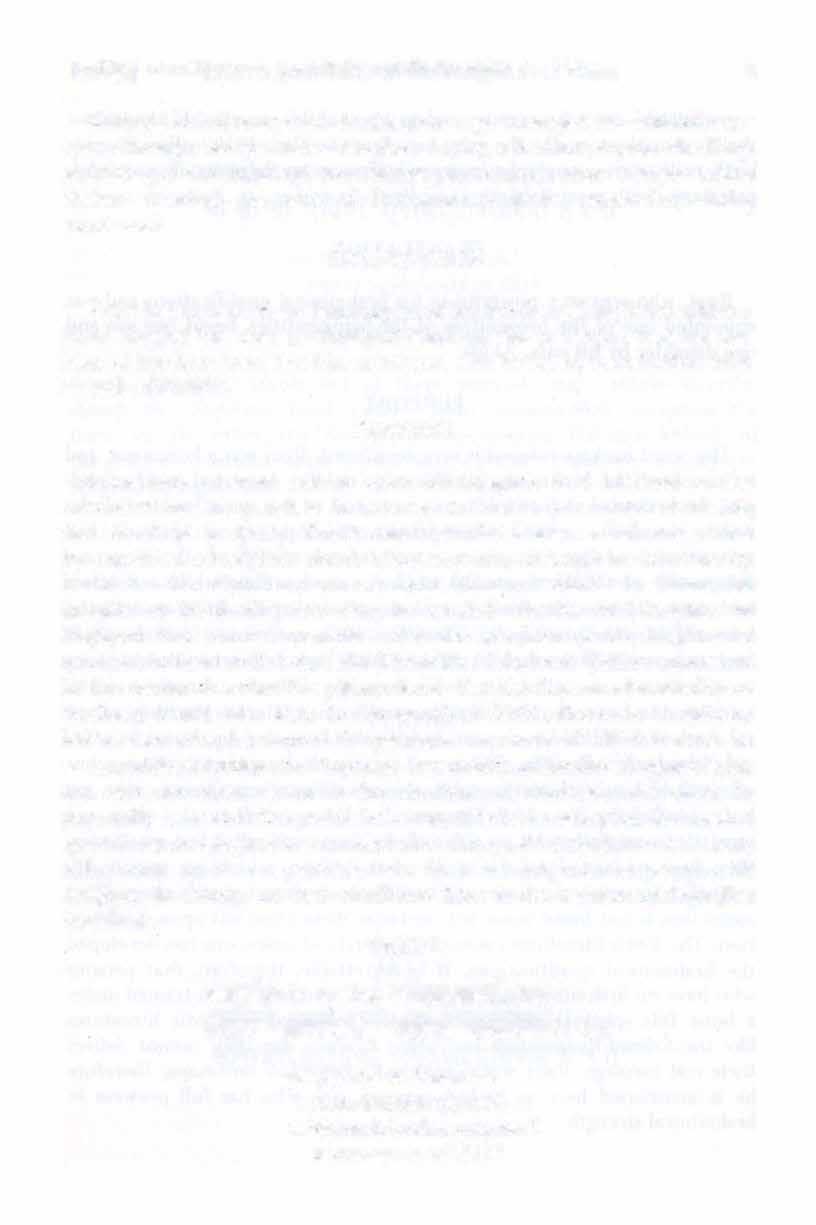
TRANSLATION
Akiiti had two brothers, but in spite of her brothers, King Svayambhuva Manu handed her over to Prajapati Ruci on the condition that the son born of her be returned to him as his son. This he did in consultation with his wife, Satariipa.
PURPORT
Sometimes a sonless person offers his daughter to a husband on the condition that his grandson be returned to him to be adopted as his son and inherit his property. This is called putrikii-dharma, which means that by execution of religious rituals one gets a son, although he is sonless by his own wife. But here we see extraordinary behavior in Manu, for in spite of his having two sons, he handed over his first daughter to Prajapati Ruci on the condition that the son born of his daughter be returned to him as his son. Srila Visvanatha Cakravarti Thakur comments in this connection that King Manu knew that the Supreme Personality of Godhead would take birth in the womb of Akiiti; therefore, in spite of having two sons, he wanted the particular son born of Akiiti because he was ambitious to have the Supreme Personality of Godhead appear as his son and grandson. Manu is the lawgiver of mankind, and since he personally executed the putrikii-dharma, it is to be accepted that such a system can be adopted by mankind also. Thus, even though one has a son, if he wants to have a particular son from his daughter, he can give his daughter in charity on that condition. That is the opinion of Srila ]iva Gosvami. TEXT
Text 3) Genealogical Table of the Daughters of Manu 3
3 Qtmr: � �Fl. �Rt(ij�l¥4���I � iUIW�W � �II �II prajiipat* sa bhagaviin rucis tasyiim ajijanat mithunam brahma-varcasv"i parameT}a samiidhinii
praftipat*-one who is entrusted to beget children; saft-he; bhagaviinthe most opulent; rucift-the great sage Ruci; tasyiim-in her; ajija nat-gave birth; mithunam-couple; brahma-varcasvi-very muchspirituallypowerful; pa ram e r-a- with great strength; samiidhinii-in trance.
TRANSLATION
Ruci, who was very powerful in his brahminical qualifications and was appointed one of the progenitors of the living entities, begot one son and one daughter by his wife, Akiiti.
PURPORT
The word brahma-varcasvi is very significant. Ruciwas a briihma[ta, and he executed the brahminical duties very rigidly. As stated in Bhagavadgitii, the brahminical qualifications arecontrol of the enses, controlofthe mind, cleanliness within and without, development of spiritual and material knowledge, simplicity, truthfulness, faith in the Supreme Personality of Godhead, etc. There are many qualities which indicate a brahminical personality, and it is understood that Ruci followed all the brahminical principles rigidly. Therefore he is specifically mentioned as brahma-varcasvi. One who is born of a briihma[ta father but does not act as a briihma[ta is called, in Vedic language, a brahma-bandhu, and is calculated to be onthe level of sudras and women.Thus in theBhiigavatam we find that Mahiibhiirata was specifically compiled by Vyasadeva for stri-sudra-brahma-bandhu. Stri means women, sudra means thelower class of civilized human society, and brahma-bandhu means persons who are born in the families of briihmar-as but do not follow the rules and regulations carefully. All of these three classes are called les intelligent; they have no access to the study of the Vedas, which are specifically meant for persons who have acquired the brahminical qualifications. This restriction is not based upon any sectarian distinction but upon qualification. The Vedic literatures cannot beunderstood unless one has developed the brahminical qualifications. It is regrettable, therefore, that per ons who have no brahminical qualifications and have never been trained under a bona fide spiritual master nevertheless comment on Vedic literatures like the Srimad-Bhiigavatam and other Purarws, for they cannot deliver their real message. R uci was considered a first-class briihmar-a; therefore he is mentioned here as brahma-varcasvi, one who has full prowess in brahminical strength.
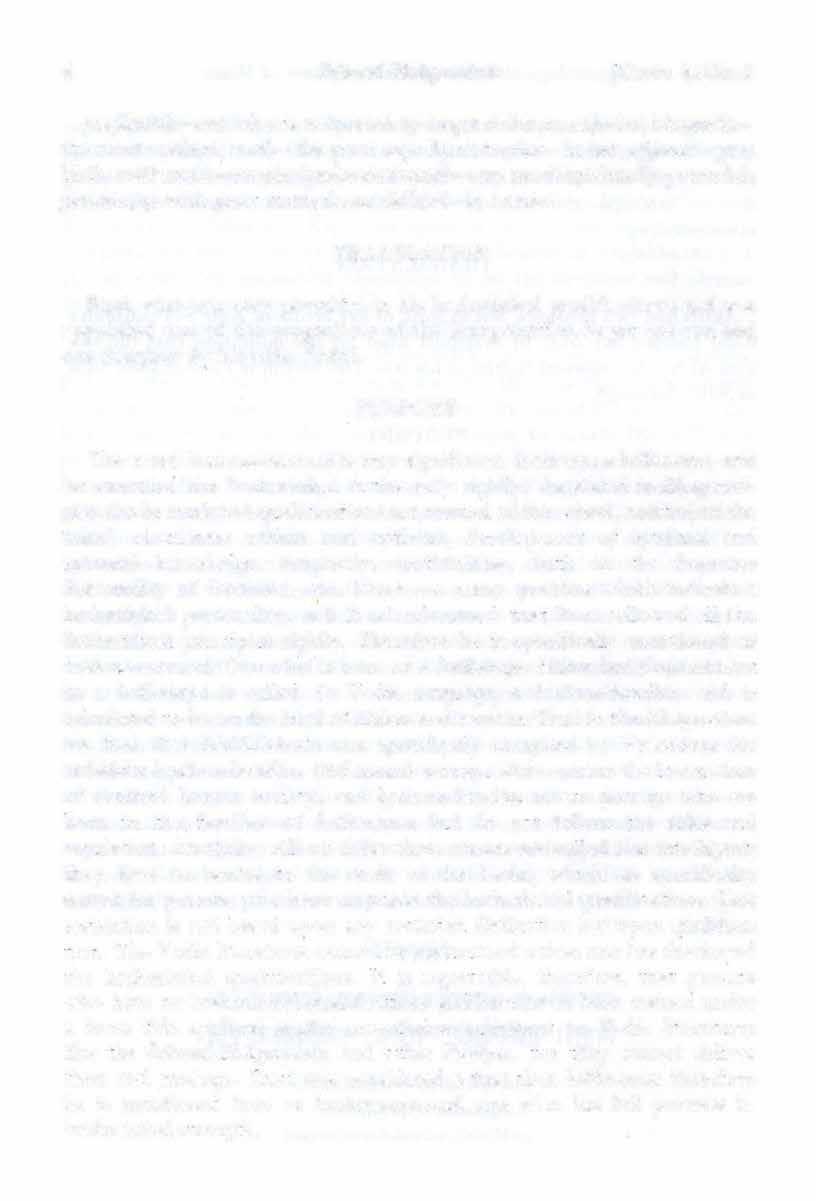
4 Srimad-Bhagavatam [Canto 4, Ch. 1
Text 5) Genealogical Table of the Daughters of Manu

TEXT4
yas tayo� puru�a� sak�ad vi�ttur yajna-svariipa-dhrk ya str"i sa dak�irta bhuter arhsa-bhutanapayin"i
ya� - one who; tayo� - ou t of them; puru�a�-male; s ak�at- directly; v4rtu�-the Supreme Lord; yajna- Yajiia; svariipa-dh rk- accepting the form; ya-the other; str"i-female; sa- she; dak . siru1-Dak�ina; bhute�-of thegoddess of fortune; am.�a-bhuta- being a plenaryexpansion; anapayin"inever to be separated.
TRANSLATION

Of the two children born of Akiiti, the male child was directly an incarnation of the Supreme Personality of Godhead, and His name was Yajfia, which is another name of Lord Vi�I).U. The female child was a partial incarnation of La�mi, the goddess of fortune, the eternal consort of Lord Vi�J).U.
PURPORT
Lak�mi, the goddess of fortune, is the eternal consort of Lord Vi�J).U. Here it is stated that both the Lord and Lak�mi, who are eternal consorts, appeared from Akiiti simultaneously. Both the Lord and His consort are beyond this material creation, as confirmed by many authorities (niiriiya[ta� paro 'vyaktiit); therefore their eternal relationship cannot be changed, and Yajfia, the boy born of Akiiti, later on married the goddess of fortune. TEXTS 3CIM� �
aninye sva-grham putrya� putram vitataroci�am
5
��Jm:��
�: �N(t(tUM€411,. I �fro�
II'-' II
sviiyambhuvo mudii yukto rucir jagriiha dak�i[liim
iin inye- brought to; sva-grham-home; putryiib--born of the daughter; putram-the son; vitataroci�am-very powerful; sviiyambhuvab--the Manu named Svayambhuva; mudii- being very pleased; yuktab--with;rucib--the great sage Ruci;jagriiha-kept;dak�i[liim-the daughter named Dak�iQii.
TRANSLATION

Svayambhuva Manu very gladly brought home the boy named Yajfia, who was so beautiful, and Ruci, his son-in-law, kept with him the daughter, Da�i�a.
PURPORT
Svayambhuva Manu was very glad to see that his daughter, Akiiti, had given birth to both a boy and girl. He was afraid that he would take one son and that because of this his son-in-law, Ruci, might be sorry. Thus when he heard that a daughter was born along with the boy, he was very glad. Ruci, according to his promise, returned his male child to Svayambhuva Manu and decided to keep the daughter, whose name was Dak�i�a. One of Lord Vi�I)U's names is Yajfia because He is the master of the Vedas. The name Yajfia comes from yaju§iim pati[l; in the Yajur-veda there are different ritualistic prescriptions for performing yajfias, and the beneficiary of all such yajfias is the Supreme Lord, Vi�I)U. Therefore it is stated in Bhagavad-gitii, yajiiiirthiitkarma!Ja�: one shouldact,but one should perform his prescribed duties only for the sake of Yajfia or Vi�I)U. If one does not act for the satisfaction of the Supreme Personality of Godhead, or if one does not perform devotional service, then there will be reactions to all his activities. It does not matter if the reaction is good or bad;if our activities are not dovetailed with the desire of the Supreme Lord, or if we do not act in Kr�l)a consciousness, then we shall be responsible for the results of all our activities. There is always a reaction to every kind of action, but if actions are performed for Yajiia, there is no reaction. Thus if one acts for Yajiia, or the Supreme Personality of Godhead, one is not entangled in the material condition, for it is mentioned in the Vedas and also in Bhagavad-gitii that the Vedas and the Vedic rituals are all meant for understanding the Supreme Personality of Godhead, Kr�l)a. From the very beginning one should try to act in Kr�l)a consciousness;that will free one from the reactions of material activities.
6
Srimad-Bhagavatam
[Canto 4, Ch. 1
tam kamayiinam bhagaviin uvaha yaju�am pat* tu�tayam tO§am apanno 'janayad dvadasatmajan
tam-her; kamayanam-desiring; bhagavan-the Lord; uvaha-married; yaju�iim-of all sacrifices; pati�-master; tufi.tiiyiim-in His wife who was very much pleased; tofiam-great pleasure; iipanna�-having obtained; ajanayat-gave birth; dviidasa-tweive; iitmajiin-sons.


TRANSLATION
The Lord of the ritualistic performance of yajiia later on married Dalq;i!la, who was anxious to have the Personality of Godhead as her husband, and in this wife the Lord was also very much pleased to beget twelve children.

PURPORT
An ideal husband and wife are generally called Lak�mi-Naraya11a to compare them to the Lord and the goddess of fortune, for it is significant that Lak�mi-Naraya11a are forever happy as husband and wife. A wife should always remain satisfied with her husband, and a husband should always remain satisfied with his wife. In the Ciip,akya-sloka, the moral instructions of Capakya Pa11�it, it is said that if a husband and wife are always satisfied with one another, then the goddess of fortune automatically comes. In other words, where there is no disagreement between husband and wife there is all material opulence present, and good children are born. Generally, according to Vedic civilization, the wife is trained to be satisfied in all conditions, and the husband, according to Vedic instruction, is required to please the wife with sufficient food, ornaments and clothing. Then, if they are satisfied with their mutual dealings, good children are born. In this way the entire world can become peaceful, but unfortunately in this age of Kali there are no ideal husbands and wives; therefore unwanted children are produced, and there is no peace and prosperity in the present-day world.
Text6] Genealogical
� li•l41�!!41� � cmr: , � �qasi\�:rttt{4:1C(�I€¥4Gil'lll
Table of the Daughters of Manu TEXT6
�II
7
Srimad-Bhagavatam
TEXT7
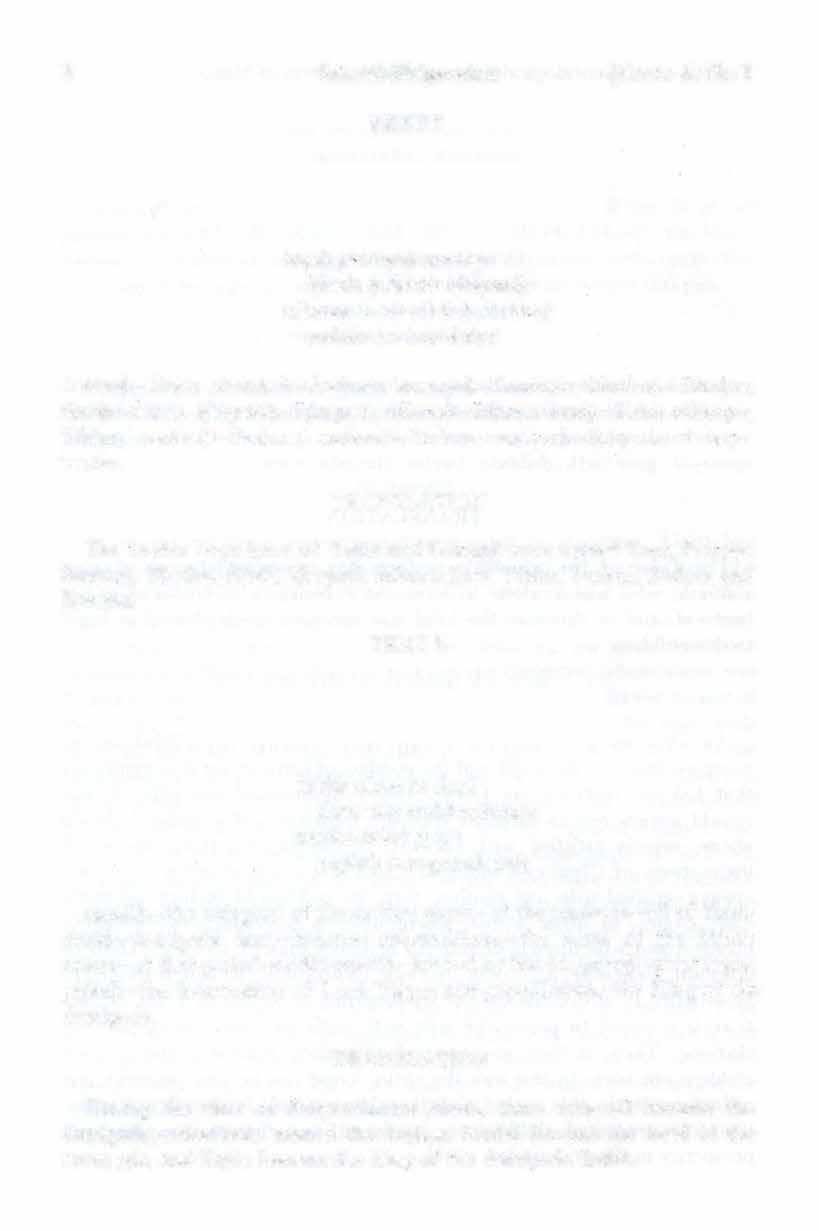
to�a� prato§afl. santo�o bhadrafl. siintir itjaspat* idhma� kavir vibhu[l. sva hna[l. sudevo rocano dv4at


to�a[l.-To�a; prato�a�-Prato�a; santo�a�-Santo�a; bhadra[l.-Bhadra; siint�-S anti ; itjaspatifl.-l �aspati; idhmafl.- ldhma; kavi�-Kavi; vibhu[l.Vibhu; svahna [l.-Svahna ; sudeva�-Sudeva; rocana�- Rocana; dvi$attwelve.
TRANSLATION
The twelve boys born of Yajna and D�i!la were named To�a, Prato�a, Santo�a, Bhadra, Santi, I�aspati, Idhma, Kavi, Vibhu, Svahna, Sudeva and Rocana.
TEXT8
tu�itii nama te devii iisan sviiyambhuvantare marici-mi.Srii nayo yajiiafl. sura-ga[tesvara[l.
tu�itafl.-the category of the tu�itas; nama-of the name; te-all of them; devafl.-demigods; iisan-became; sviiyambhuva-the name of the Manu; antare-at that period; marici-misriifl.-headed by Marici;r�aya[l.-great sages; yajiia�-the incarnation of Lord Vi�QU; sura-ga[ta-isvara[l.- the King of the demigods .
TRANSLATION
During the time of Svayambhuva Manu, these sons all became the demigods collectively named the tu�itas. Marici became the head of the seven r�is, and Yajna became the King of the demigods, lndra.
8
[Canto 4, Ch. I
PURPORT
During the life of Svayamhhuva Manu, six kinds of living entities were generated from the demigods known as the tu�itas, from the sages headed by Marici, and from descendants of Yajfia, King of the demigods, and all of them expanded their progeny to observe the order of the Lord to fill the universe with living entities. These six kinds of living entities are known as manus, devas, manu-putras, amsavatiiras, surdvaras and nis. Yajria, being the incarnation of the Supreme Personality of Godhead, became the leader of the demigods, lndra.
TEXT9
priyavratottanapadau manu-putrau mahaujasau
tat-putra-pautra-naptfTJiim anuvrttam tadantaram
priyavrata- Priyavrata; uttanapiidau-Uttanapada;manu-putrau-sons of Manu; mahii-ojasau- very great, powerful; tat-their;putra-sons;pautragrandsons; naptf!liim-grandsons from the daughter; anuvrttam- following; tadantaram-in that Manu's period.
TRANSLATION
Svayambhuva Manu's two sons, Priyavrata and Uttanapada, became very powerful kings, and their sons and grandsons spread all over the three worlds during that period.
TEXT 10

�'ii(l�l� �¥4NR�j q: I
6«4"4f� �swf � � 'Pill� oil
devahutim adat tata
kardamiiyiitmajiim manu�
tat-sambandhi sruta-priiyam
bhavatii gadato mama
Text 10) Genealogical Table of the Daughters of Manu 9
• �� 1
�1{,II
�Jhu�q1�1
�l��'ktUII'i�t'f
� II �
devahutim-Devahuti;adiit-handed over;tata-my dear son;kardamiiya -unto the great sage Kardama; iitmajiim-daughter; manu�-Lord Sviiyambhuva Manu; tat-sambandhi-in that connection; sruta-priiyamheard almost in full;bhavatii-by you;gadataft-spoken;mama-by me.
TRANSLATION
My dear son, Sviiyamhhuva Manu handed over his very dear daughter, Devahiiti, to Kardama Muni. I have already spoken to you about them, and you have heard about them almost in full.
TEXT 11

� iUA,;'SIIil SN.fd' ¥tiHI"t�: I
SII11"4Jtt€ti«:�,.Jt4Miftm'�II��II
dak�iiya brahma-putriiya prasutim bhagaviin manu� pmyacchad yat-krta� sargas trilokyiim vitato mahiin
dak�iiya-unto Prajapati Dak�a; brahma-putriiya-the son of Lord Brahmii; prasutim-Prasuti; bhagaviin-the great personality; manu�
Svayamhhuva Manu; priiyacchat-handed over;yat-krta�-done by whom; sarga�-creation; tri-lokyiim-in the three worlds; vitata�-expanded; mahan- greatly.
TRANSLATION
Svayambhuva Manu handed over his daughter Prasuti to the son of Brahma named Dak�a, who was also one of the progenitors of the living entities. The descendants of Da�a are spread through the three worlds.
TEXT 12
�: 4i�+twn: sm.n �it ""Mq"�: 1
� SN.Rl� sfl:&q+tlwf f.RN itII��II
yii� kardama-sutii� proktii
nava brahmar�i-patnaya�
tiisiim prasutiprasavam
procyamiinam nibodha me
10 Srimad-Bhagavatam [Canto 4, Ch. 1
Text 14] Genealogical Table of the Daughters of Manu II
y"a[t-those who; kardama-suta[l-the daughters of Kardama; prokta[lwerementioned;nava-nine;brahma-r§i-great sages of spiritual knowledge; patnayal;t-wives; tiisi.im-their; prasutiprasavam-generations of sons and grandsons; procyamanam-describing; nibodha-try to understand; mefrom me.
TRANSLATION
You have already been informed about the nine daughters of Kardama Muni, who were handed over to nine different sages. I shall now describe the descendants of those nine daughters. Please hear from me.
PURPORT
In the Third Canto it is already described how Kardama Muni begot nine daughters in Devahuti and later on all the daughters were handedover to great sages like Marici, Atri and Vasi�tha.
TEXT 13 qift
patn'imar'ices tukala
SUflUVe kardamiitmaja kasyaparh purr-imanarh ca yayor apuritarh jagat
patn"i-wife; mar'ice[l-of the sage named Mar1ci; tu-also; kala-named Kala; SU§uve-gave birth; kardama-atmajii-daughter of Kardama Muni; kasyapam-of the name Kasyapa; pilrrtimanam ca-and of the name Purt:�ima;yayo[l-by whom;apilritam-spread aU over;jagal-the world.
TRANSLATION
Kardama Muni's daughter Kala, who was married to Marici, gave birth to two children, whose names were Kasyapa and Piiqtima. Their descendants are spread all over the world.
TEXT 14

�(1��
�·����'Nil
��(1\"Rd �11��11
m
I � �lwi �
tf'fr11� . m � � cRfA 1 a.ctt�i �: qta:�n'EltQit_€(1R�: n�\lll
Srimad-Bhagavatam
piir!timiisiita virajam
visvagam ca parantapa devakulyiim hare� padasauciid yiibhut sarid diva�
purrimii-Piirt;�ima; asiita-begot; virajam-a son named Viraja; visvagam ca -and named Visvaga; parantapa-0 annihilator of enemies; devakulyiim-a daughter named Devakulya; hare�- of the Supreme Personality of Godhead; pada-saucat-by the water which washed His lotus feet; ya-she; abhut-became;sarit diva�-the transcendental water within the banks of the Ganges.
TRANSLATION
My dear Vidura, of the two sons, Ka.SyapaandPiiqtima, Piiqtima begot three children, namely Viraja, Visvaga and Devakulya. Of these three, Devakulya was the water which washed the lotus feet of the Personality of Godhead and later on transformed into the Ganges of the heavenly planets.
PURPORT
Of the two sons Kasyapa and Purpima, herein Purpima's descendants are described. An elaborate description of these descendants will be given in the Sixth Canto. It is also understood herein that Devakulya is the presiding deity of the River Ganges, which comes down from the heavenly planets to this planet and is accepted to be sanctified because it touched the lotus feet of the Supreme Personality of Godhead, Hari.
TEXT 15 3fi: q&'flfi&\�1 ��:�I
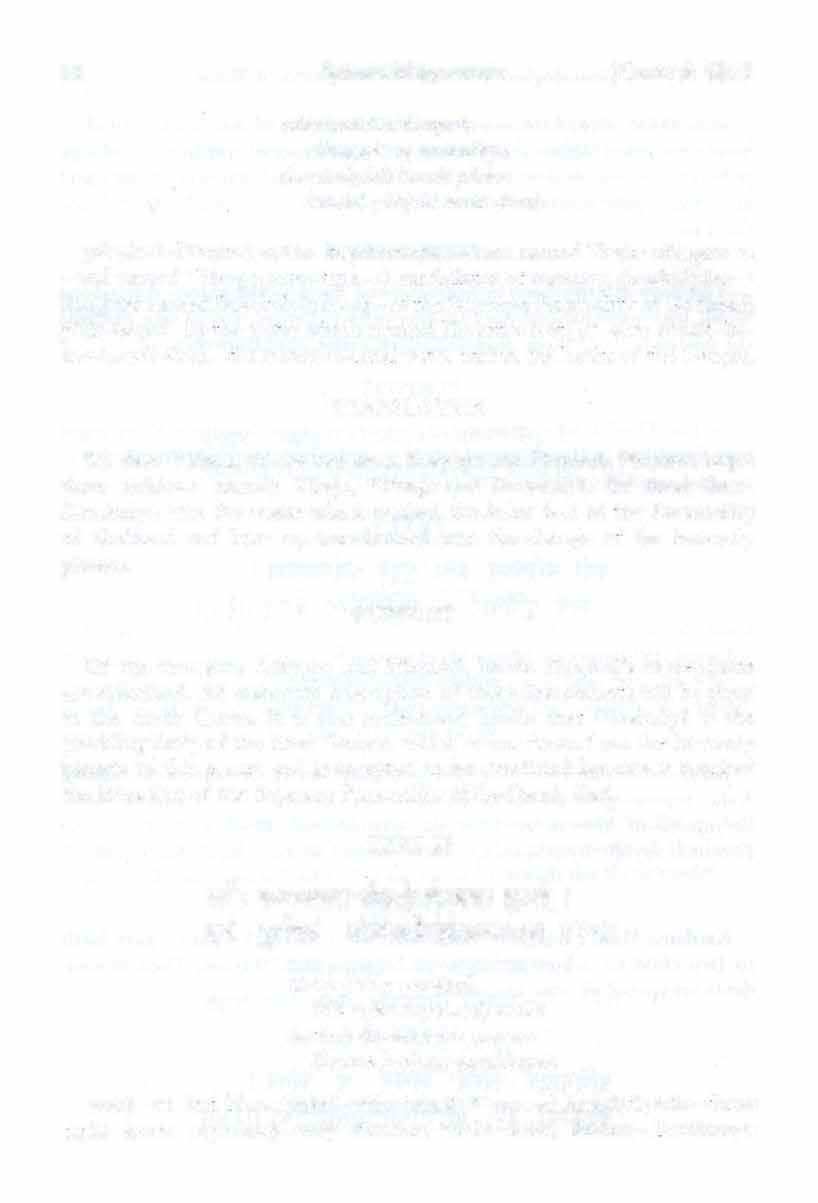
atre� patny anasuyii
triii jajiie suyasasa� sutiin
dattam durviisasam somam
iitmesa-brahma-sambhaviin
atre�-of Atri Muni; patni- wife; anasiiyii-named Anasiiya; trin-three; jajii.e-bore ; suyasasa�- very famous; sutiin-sons; dattam- Dattatreya;
12
[Canto 4, Ch. 1
����''1111��11:
� �
II � '-\II
durviisasa"J- Durvasa; somam-Soma (themoon-god); atma-theSupersoul; isa-Lord Siva;brahma-Lord Brahmii; sambhavan-incarnations of.
TRANSLATION
Anasuya, the wife of Atri Muni, gave birth to three very famous sons, Soma, Dattatreya and Durvasa, who were partial representations of Lord Vi�J'.lU, Lord Siva and Lord Brahma. Soma was a partial representation of Lord Brahma, Dattatreya was a partial representation of Lord Vi�l',lU, and Durvasa was a partial representation of Lord Siva.
PURPORT
In thisverse we findthe words atma-isa-brahma-sambhaviin. Atma means the Supersoul, or ViglU, TSa means Lord Siva, and brahma means the fourheaded Lord Brahmii. The three sons born of Anasuya-Dattiitreya, Durvasa and Soma-were born as partial representations of these three demigods. .if.tma is not in the category of the demigods or living entities because HeisVi�l)u;therefore He isdescribedas vibhinniimsa-bhiitiinam. The Supersoul or Vi�1�u is the seed-giving father of all living entities, including Brahma and Lord Siva. Another meaning of the word iitma may be accepted in this way: theprinciple who is the Supersoul in every iitma, or, one may say, the soul of everyone, became manifested as Dattatreya, because the word amsa, part and parcel, is used here.
In Bhagavad-gitii the individual souls are also described as parts of the Supreme Personality of Godhead or Supersoul, so why not accept that Dattatreya is one of those parts? Lord Siva and Lord Brahma are also described here as parts, so why not accept all of them as ordinary individual souls? The answer is that the manifestations of Vi�I)U and those of the ordinary living entities are certainly all parts and parcels of the Supreme Lord, and no one is equal. to Him, but among the parts and parcels there are different categories. In the Variiha Puriirza it is nicely explained that some of the parts are sviithsa, and some are vibhinniimsa. Vibhinniimsa parts are called jivas, and sviimsa parts are in the Vi�l)u category. In the jiva category, the vibhinniimsa parts and parcels, there are also gradations. That is explained in the Vi§r;tU Puriirza, where it is clearly stated that the individual parts and parcels who can travel to any part of the Lord's creation are called sarva-gata and are suffering the pangs of material existence. They are subject to be freed from the coverings of ignorance under material existence according to different levels of work
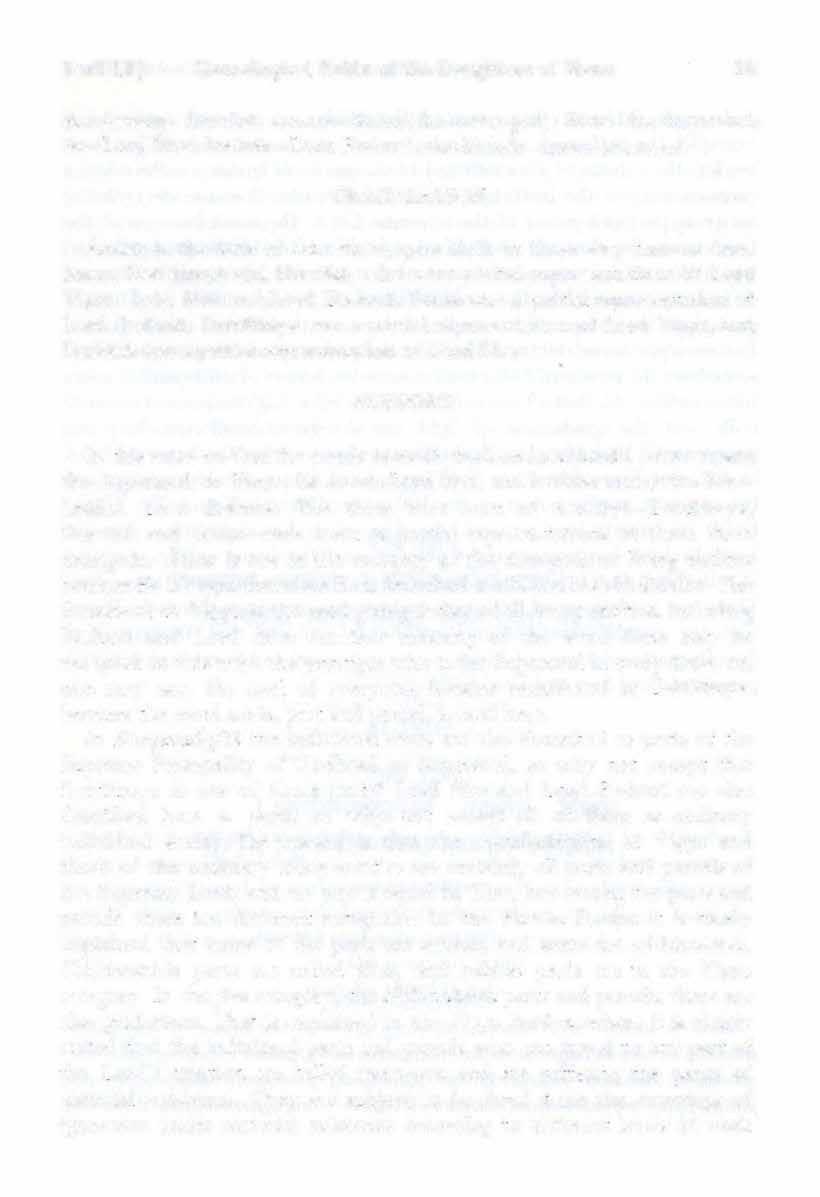
Text 15) Genealogical Table of the Daughters of Manu 13
and under different influences of the modes of material nature. For example, the sufferings of jivas who are situated in the mode of goodness are less than those of jivas situated in the mode of ignorance. Pure Kr�r;Ja consciousness is the birthright of all living entities because every living entity is part and parcel of the Supreme Lord. The consciousness of the Lord is also in the part and parcel, and according to the proportion to which that consciousness is cleared of material dirt, the living entities are differently situated. In the Vediinta-sutra the living entities of different gradations are compared to candles or lamps with different candle power. For example, some electric bulbs have the power of one thousand candles, some have the power·of 500 candles, some the power of 100 candles, some fif�y candles, etc., but all electric bulbs have light. Light is present in every bulb, but the gradations of light are different. Similarly, there are gradations of Brahman. The Vi�I).U sviirhsa expansions of the Supreme Lord in different Vi�r;JU forms are like lamps, Lord Siva is also like a lamp, and the supreme candle power or the 100 percent light is Kr�r;Ja. The Vi§[lUtattva has ninety-four percent, the Siva-tattva has eighty-four percent, Lord Brahma has seventy-eight percent, and the living entities are also like Brahma, but in the conditioned state their power is still more dim. There are gradations of Brahman, and no one can deny this fact. Therefore the words iitmesa-brahma-sam bhaviin indicate that Dattatreya is directly part and parcel of Vi�r;Ju, whereas Durvlisa and Soma are parts and parcels of Lord Siva and Lord Brahma.
TEXT 16
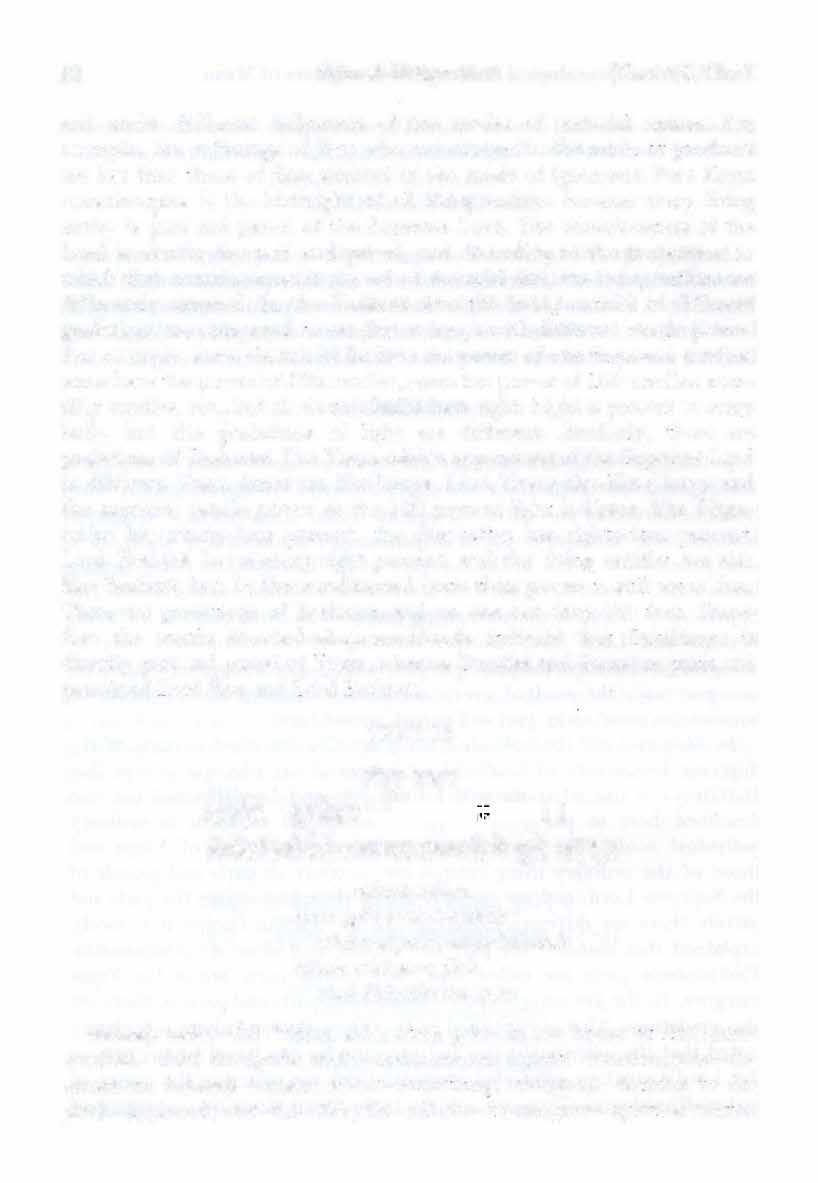
M'illf4tcil�il�mniljt(RQ41feltgU 11��11
vidura uviica
atrer grhe sura-sre§thii(L
sthity-utpatl:y-anta-hetava� kincic cikir§avo jiitii
etad akhyahi me guro
vidura� uvaca-Sri Vidura said; atre� grhe-in the house of Atri; surasre§tha�-chief demigods; sthiti-maintenance; utpatti-creation; anta-destruction; hetava�-causes; kii'icit-something; cikir§ava�-desiring to do; jatafl-appeared; etat-this; akhyahi-tell; me-to me;guro-spiritu al master.


14 Srimad-Bhagavatam [Canto 4, Ch. 1
�
�f�
�: m.: I
TRANSLATION
After hearing this, Vidura inquired from Maitreya: My dear master, how is it that the three deities Brahma, Vi�J]U and Siva, who are the creator, maintainer and destroyer of the whole creation, became the offspring of the wife of Atri Muni?
PURPORT
The inquisitiveness of Vidura was quite fitting, for he understood that when the Supersoul, Lord Brahmii. and Lord Siva all appeared through the person of Anasiiyii., the wife of Atri Muni, there must have been some great purpose. Otherwisewhy should they appear in such a way?
TEXT 17

qan
���Plfl��: 11�\911
maitreya uvaca
brahmar-a coditab- sr:�tav
atrir brahma-vidam varab
saha patnya yayav r:k�am
kuliidrim tapasi sthitab-
maitreyab- uvaca-Sr1 Maitreya l:t!ii said; brahma!�a-by Lord Brahma; coditab--being inspired ;sr§tau-for creation; atrib-- Atri; brahma-vidam-of the persons learned in spiritual knowledge; varab--the chief; saha-with; patnya-wife;yayau-went; rk�am-tothemountainnamed .{tk�a; kuladrim -great mountain; tapasi-for austerities; sthitab--re mained .
TRANSLATION
Maitreya said: When Lord Brahmii. ordered Atri Muni to create generations after marrying Anasiiyii., Atri Muni and his wife went to perform severe austerities in the valley of the mountain known as .{tk�a.
Text 17] Genealogical Table of the Daughters of Manu 15
���
�: qm�i{� em 1
TEXT 18
� �'l,'i�ii+Met�tWt4t-.9l f.ff�;�: ��: 1�

tasmin prasuna-stabakapaliisasoka-kanane varbh* sravadbhir udghu�te nirvindhyaya� samantata�
tasmin-in that; prasuna-stabaka-bunches of flowers; palasa-paliisa trees; asoka-asoka trees; kiinane-in the forest garden ; viirbhi{t-by the waters; sravadbhi�-flowing; udghu�Je-in sound; nirvindhyiiyii[l.-of the river Nirvindhya; samantata[l.-everywhere.


TRANSLATION
In that mountain valley flows a river named Nirvindhya. On the bank of the river there are many a.Soka trees and other plants full of palasa flowers, and there is always the sweet sound of water falling from a waterfall. The husband and wife reached that beautiful place.
TEXT 19

SJ11I1Rtlr.. ij�� �WIT �� uf.t: I
3tfttg�1iql�..
f.t(orl)sf.l���: II� �II
prar;tayamena samyamya mano var�asatam muni�1 ati�thad ekapadena nirdvandvo 'nila-bhojana�
prar;tayamena-by practice of the breathing exercise; samyamya-controlling ; mana�-mind ; varfia-satam-one hundred years; mun*-the great sage; ati�that- remained there; ekapadena-sta nding on one leg; nirdvandva�- wi thout duality; anila- air; bhojana�-ea ting.
TRANSLATION
There the great sage concentrated his mind by the yoga breathing exercises, and thereby controlling all attachment, he remained standing
16
Srimad-Bhagavatam
[Canto 4, Ch. 1
on one leg only; eating nothing but air, and stood there on one leg for hundreds of years.
TEXT 20

��uj ij SAQS{ � � 1!111�41(: I
�mf�'{�f'IVSl�� N�44W{II� o II
sara[lam tam prapadye 'ham ya evajagad-1Svara�
prafo.m iitmasamiim mahyam
prayacchatv iti cintayan
sararam-taking shelter;tam-unto Him;prapadye-surrendered;aham1; ya�-one who;eva-certainly;jagat-Ts'varoQ-master of the universe;prajiim-son;iitma-samiim-like Himself;mahyam-unto me;prayacchatu-let Him give;iti-thus;cintayan-thinking.
TRANSLATION
He was thinking: May the Lord of the universe, of whom I have taken shelter, kindlybe pleased to offer me a son exactlylike Him.
PURPORT
It appears that the great sage Atri Muni had no specific idea of the Supreme Personality of Godhead. Of course he must have been conversant with the Vedic information that there is the Supreme Personality of Godhead who is the creator of the universe, from whom everything emanated, who maintains this created manifestation, andin whom the entire manifestation is conserved after dissolution. Yato vii imiini bhiitiini. The Vedic mantras give us information of the Supreme Personality of Godhead, so he concentrated his mind upon that Supreme Personality of Godhead, even without knowing His name, just to beg from Him a child exactly on His level. This kind of devotional service, in which knowledge of God's name is lacking, is also described in Bhagavad-gitii where the Lord says that there are four kinds of men with backgrounds of pious activities who come to Him asking what they need. Atri Muni wanted a son exactly like the Lord, and therefore he is not supposed to be a pure devotee because he had a desire to be fulfilled, and that desire was material. Although he wanted a son exactly like the Supreme Personality of Godhead, still it
Text 20) Genealogical Table of the Daughters of Manu 17
was material desire because he did not want the Personality of Godhead Himself, but only a child exactly like Him. If he had desired the Supreme Personality of Godhead as his child he would have been completely free of material desires because he would have wanted the Supreme Absolute Truth, but because he wanted a similar child, that was material. Thus Atri Muni cannot be counted among the pure devotees.
TEXT 21

tapyamanam tri-bhuvanam priirtiiyamaidhasagnina nirgatena muner murdhnab, samik�ya prabhavas trayab-
tapyamanam-while practicing austerities; tri-bhuvanam-the three worlds; priirtiiyiima-practice by breathing exercise; edhasii-fue l; agniniiby the fire; nirgatena-issuing out; munefl,-of the great sage; murdhnab-topof the head;samik�ya-looking over; prabhavab, trayab- -the three great gods (Brahma, Vi��;tu and Mahesvara).
TRANSLATION
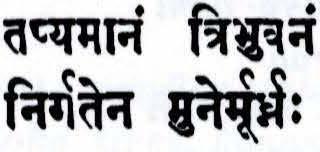
While Atri Muni was engaged in these severe austerities, a blazing fire came out of his head due to his breathing exercise, and that fire was seen by the three principal d�ities of the three worlds.
PURPORT
According to Srila Jiva Gosvami, the fire of priiriiyiima is mental satisfaction, and that was perceived by the Supersoul, Vi�!JU, and thereby Lord Brahma and Siva also perceived it. By his breathing exercise Atri Muni concentrated on the Supersoul, or the Lord of the universe. As confirmed in Bhagavad-gitii, the Lord of the universe is Vasudeva (viisudevaft sarvam iti), and, by the direction of Vasudeva, Lord Brahma and Lord Siva work. Therefore, on the direction of Vasudeva, both Lord Brahma and Lord Siva perceived the severe penance adopted by Atri Muni, and thus they were pleased to come down, as stated in the next verse.
18 Srimad-Bhagavatam [Canto 4, Ch. 1
Sf1UIIt41�t�ijlfQ'11 I � Sf'li!t.ct: II��II
TEXT 22 �ftq��: I H6aq¥iaWi�lim�� �: ������
apsaro-muni-gandharvasiddha-vidyiidharoragai�
vitiiyamiina-yasasas
tadiisramapadam yaytt�
apsara� - heavenly society women;muni- great sages; gandharva-inhabitants of the Gandharva planet; siddha-of Siddhaloka; vidyiidhara- other demigods; uragai�� the inhabitants of Nagaloka;vilayamana- being spread; yasasa� - fame , reputation; tat,his; as'rama-padam- hermitage; yayu�went.
TRANSLATION
At that time the three deities approached the hermitage of Atri Muni, accompanied by the denizens of the heavenly planets, such as the celestial beauties, the Gandharvas, the Siddhas, the Vidyadharas and the Nagas, and thus they entered the iisrama of the great sage, who had become so famous by his austerities.
PURPORT
It is advised in the Vedic literatures that one should take shelter of the Supreme Personality of Godhead, who is the Lord of the universe and who is the master of creation, maintenance and dissolution. He is known as the Supersoul, and when one worships the Supersoul, all other deities, such as Brahma and Siva, appear with Lord Vi�r;tu because they are directed by the Supersoul.

tat-priidurbhiiva-samyogavidyotita-manii mun*
utti�thann ekapiidena
dadarsa vibudha-r�abhiin



Text 23) Genealogical Table of the Daughters of Manu
19
��
TEXT 23 �sn��� af-1: 1
A�ltl... ������
tat-their; priidurbhava-appearance; samyoga- simultaneously; vidyotita- enlightened; mana/:1.-in the mind; muni/:1.- the great sage; utti�thanbeing awakened; eka-padena-even on one leg; dadarsa-saw; vibudhademigods; r�abhan-the great personalities.
TRANSLATION
The sage was standing on one leg, but as soon as he saw that the three deities had appeared before him, he was so pleased to see them all together that despite great difficulty he approached them on one leg.
TEXT 24

prar;wmya dar4avad bhumiiv upalasthe 'rhartiinjalib. vr�a-hamsa-supar[la-sthan svaiJ:t svais cihnais ca cihnitiin
prartamya- offering obeisances; dart(iavat- like a rod;bhumau- ground; upatasthe-fell down; arharta-all paraphernalia for worship; arijaliJ:t-fo!ded hands; vr�a-bull; hamsa-swan; suparf! a-the Garul,la bird; sthiin-situated; svaiJ:t -own; svailt-own ; cihnailt-by symbols; ca-and cihnitiin-being recognized.
TRANSLATION
Thereafter he began to offer prayers to the three deities, who were seated on different carriers- a bull, a swan and Garu�a-and who held in their hands a drum, kusa grass and a discus. The sage offered them his respects by falling down like a stick.
PURPORT
Dart!la means a long rod, and vat means like. Before a superior, one has to fall down on the ground just like a stick, and this sort of offering of respect is called dart(iavat. Atri ].l�i offered his respect to the three deities in that way. They were identified by their different carriers and different
20 Srimad-Bhagavatam [Canto 4, Ch. l
�ltqa,;q(f�s(�: 1
�
Tt«t�u(��:�fll(ttf�� II �'ill
symbolic representations. In that connection it is stated here that Lord Viwu was sitting on Garu�a, a big aquiline bird, and was carrying in His hand a disc, Brahma was sitting on a swanand had in his hand kusa grass, and Lord Siva was sitting on a bull and was carrying in his hand a small drumcalled a damar u. Atri J;t�i recognized them by their symbolic representations and different carriers, and thus he offered them prayers and respects.
TEXT 25

krpiivalokena hasadvadanenopalambhitiin tad-roc4ii pratihate nimuya munir ak�i[Li
krpa-avaloken a- glancing with mercy; hasat-smiling; vadanena-with faces; upalambhitiin-appearing very much satisfied; tat-their ; roci�ii- by the glaring effulgence; pratihate-being dazzled; n imilya- closing ; muni{t-the sage;ak§i[Li-his eyes.
TRANSLATION
Atri Muni was greatly pleased to see that the three devas were gracious towards him. His eyes were dazzled by the effulgence of their bodies, and therefore he closed his eyes for the time being.
PURPORT
Since the deities were smiling, he could understand that they were pleased with him. Their glaring bodily effulgences were intolerable to his eyes, so he closed them for the time being.
TEXTS 26-27
Texts 26-27) Genealogical
of
21
Table
the Daughters of Manu
ti'fl=:t�l\'1 ��1qefl:•R11'{ I 6�f-«t�l srfm fif� IM(RMf������
�uf 91!1'il�l=:tRd«61!tM: I �-up;n �� � ���i••tut��n ������
iJT("ffi'f!('R
¥ti441!JUi(M•i �: I ij';mt'fP!!ftrfun: !1om� cr
�:l!fi�lffift���{lq(<t: ������
cetas tat-pravar-am yuiijann astavit samhataiijal* slakHtaya siiktaya vaca sarvaloka-gariyasa�
atrir uvaca
viSvodbhava-sthiti-laye� u vibhajyamiinair maya-gu�J-air anuyugarh vigrhita-deha�
te brahma-v4r-u-girisa� prar-ato 'smy aham vas tebhya� ka eva bhavatam ma ihopahuta�
ceta�-heart; tat-pravar-am-fixing on them; ynrijan-making; astavitoffered prayers; samhata-arijal*-with folded hands; slak�rwya- ecstatic; siiktaya-prayers; vaca-words; sarva-loka-all over the world; gariyasa�honorable; atr* uvaca-Atri said; viSva-the universe; udbhava-creation; sthiti-maintenance; laye§u-in destruction; vibhajyamiinai[l-being divided; miiyii-gu[lai[l-by the external modes of nature; anuyugam-according to different millenniums; vigrhita- accepted; dehii[l-bodies; te-they; brahma -Lord Brahma; vi§!ll.t-Lord Vigw; girisii[l-Lord Siva; prarwta[I-bowed; asmi-am; aham-1; va[l--unto you; tebhya[l-from them; ka[l-who; evacertainly; bhavatiim-of you; me-by me; iha- here; upahuta[l-calJed for.

TRANSLATION
But since his heart was already attracted by the deities, somehow or other he gathered his senses, and with folded hands and sweet words he began to offer prayers to the predominating deities of the universe. The great sage Atri said: 0 Lord Brahma, Lord Vi�pu and Lord Siva, you have divided yourself into three bodies by accepting the three modes of material nature, as you do in every miUennium for the creation, maintenance and dissolution of the cosmic manifestation. I offer my respectful obeisances unto all of you and beg to inquire whom of' you three I have called by my prayer.
22 Srimad-Bhagavatam
����A��
[Canto 4, Ch_ 1
Atri ��i called for the Supreme Personality of Godhead, jagadisvara, the Lord of the universe. The Lord must exist before the creation, otherwise how could He be its Lord? If someone constructs a big building, this indicatesthat he musthave existed before the building was constructed. Therefore the Supreme Lord, the creator of the universe, must be transcendental to the material modes of nature. But it is known that Vi�pu takes charge of the mode of goodness, Brahma takes charge of the mode of passion, and Lord Siva takes charge of the mode of ignorance. Therefore Atri Muni said,"That jagadisvara, the Lord of the universe, must be one of you, but since three of you have appeared, I cannot recognize whom I have called. You are all so kind. Please let me know who is actually jagadiSvara, the Lord of the universe." In fact Atri ��i was doubtful about the constitutional position of the Supreme Lord Vi�pu, but he was quite certain that the Lord of the universe cannot be one of the creatures created by miiyii. His very inquiry about whom he called for indicates that he was in doubt about the constitutional position of the Lord. Therefore he prayed to all three, "Kindly let me know who is the transcendental Lord of the universe." He was, of course, certain that not all of them could be the Lord, but the Lord of the universe was one of the three.
TEXT 28

eko mayeha bhagavan vividha-pradhanais
citti-krta/:1. prajananaya katham nu yuyam
atriigatiis tanubhr:tiim manaso 'pi duriid bruta prasidata mahan iha vismayo me
eka/:1.-one; maya-by me; iha-here; bhagavan-great personality; vividha-various; pradhana*-by paraphernalia; citti-kr:ta/:1. - fixed in mind; prajananiiya-for begetting a child; katham-how come; nu-however; yuyam- all of you; atra- here; iigata{t-appeared; tanubhrtam-of the embodied; manasa{t-the minds; api- a ltho ugh; dilriit-from far beyond; bruta -kindly explain;prasidata- being merciful to me; mahan-very great; ihathis; vismaya[!- doubt; me-of mine.
Text 28) GenealogicalTableoftheDaughtersof Manu 23
PURPORT
� � ll'f.O'l. ffi�:J!r�
� �T"l. I �m� �ffisft � i@���N\¥444111 ������
f��: Shf'1'11�
TRANSLATION
I called for the Supreme Personality of Godhead, desiring a son like Him, and I thought of Him only. But although He is far beyond the mental speculation of man, all three of you have come here. Finally let me know how you have come, for I am greatly bewildered about this.
PURPORT
Atri Muni was confidently aware that the Supreme Personality of Godhead is the Lord of the universe, so he prayed for the one Supreme Lord. He was surprised, therefore, that three of them appeared.
TEXT 29
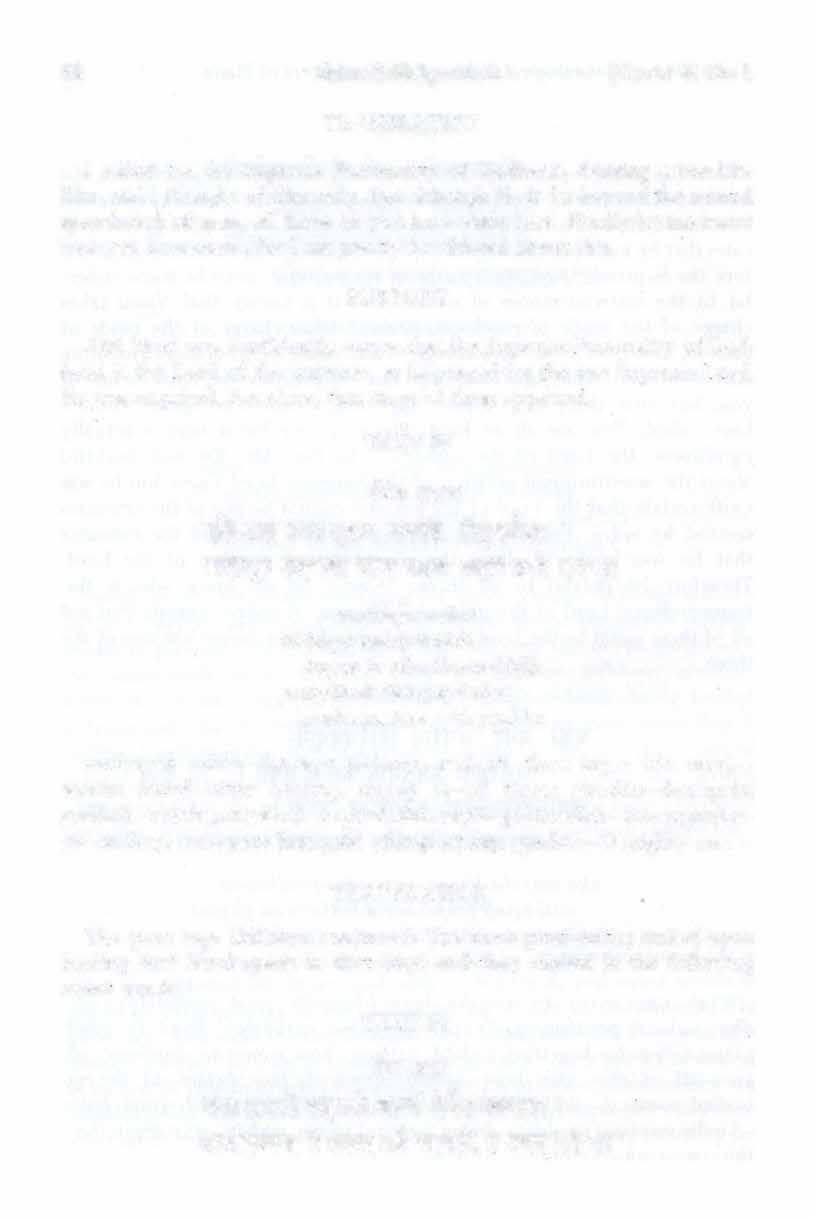
�: 'Sfllf'n�� �snit ����II
maitreya uvaca iti tasya vacafl srutva trayas te vibudha-r�abhiifl pratyiihufl slnk�rwyaviicii prahasya tam r�im prabho
maitreyafl uvi.ica- the sage Maitreya said; iti-thus; tasya-his; vacaflwords; srutvii-after hearing; trayafl te- all three; vibudha-demigods; r�abhiifl- chiefs;pratyiihufl-replied ;slak�[layii- gentle; viicii- voices; prahasya-smiling; tam-u nto him;r�im-the great sage; prabho- 0 mighty one.
TRANSLATION
The great sage Maitreya continued: The three great deities smiled upon hearing Atri Muni speak in that way, and they replied in the following sweet words.
TEXT 30
� cri3:
24 Srimad-Bhagavatam [Canto 4, Ch. l
��":�� �!�:1
�5tcl �
�� � �tl'11��1 I (tffitiN� a-��\lqp�� a-����oil
'At�
devii ucub, yathii krtas te sahkalpo
bhiivyam tenaiva niinyathii
satsankalpasya te brahman
yadvai dhyiiyati te vayam
deval,l ucu l,l-the demigods replied; yatha-as; krta�-done; te - by you; sarikalpal,l-determination; bhavyam-to be done; lena eva-by that; na anyatha-not otherwise; satsahkalpasya-one whose determination is never lost; te-of you; brahman-0 dear briihmarw; yat - that which; vai-certainly; dhyiiyati-meditating; te-all of them; vayam-we are.
TRANSLATION
The three deities told Atri Muni: Dear brahmaiJ.a, you are perfect in your determination, so as you have decided, so it will happen; it will not happen otherwise. We are all the same person upon whom you were meditating, and we have all come to you.
PURPORT
Atri Muni unspecifically thought of the Personality of Godhead, the Lord of the universe, although he had no clear idea of the Lord of the universe nor of His specific form. Maha-Vi�flU, from whose breathing millions of universes emanate and into whom they are again withdrawn, may be accepted as the Lord of the universe. Garbhodakasayi VigJU, from whose abdomen sprouted the lotus flower which is the birthplace of Brahm a, can also be considered the Lord of the universe. Similarly, K�irodakasiiyi Vi�rm, who is the Supersoul of all living entities, can also be considered the Lord of the universe. Then, under the order of K�irodakasiiyi Vi�flU, the Vi�!lu form within this universe, Lord Brahma and Lord Siva can also beaccepted as the lords of the universe.Vi�!lu is the Lord of the universe because He is its maintainer.
Similarly Brahma creates the different planetary systems and the population, so he also can be considered the Lord of the universe. Or Lord Siva, who is ultimately the destroyer of the universe, also can be considered its lord. Therefore, since Atri Muni did not specifically mention whom he wanted, all three-Brahma, Vi�!lu and Lord Siva-came before him. They said, "Since you were thinking of having a son exactly like the Supreme Personality of Godhead, the Lord of the universe, your determination will be fulfilled." In other words, one's determination is fulfilled according to
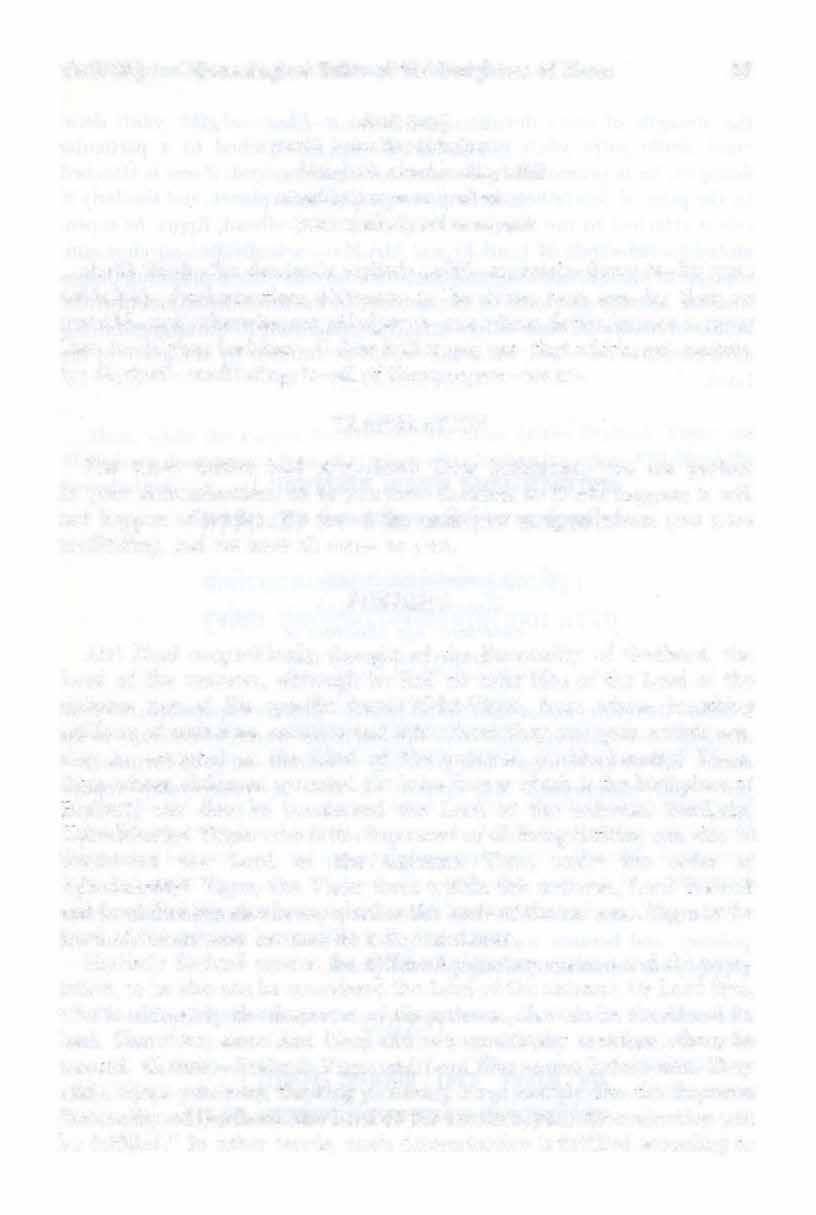
Text 30)
Genealogical Table of the Daughters of Manu
25
the strength of one's devotion. As stated in Bhagavad-gitii: yiinti devavratii deviin pitfn yiinti pit_r-vratii�. If one is attached to a particular demigod, he is promoted to the abode of that demigod; if one is attached to the pitrs or forefathers he is promoted to their planet; and similarly if one is attached to the Supreme Personality of Godhead, Kr�Q.a, he is promoted to the abode of Lord Kr�Q.a. Atri Muni actually had no clear conception of the Lord of the universe; therefore the three presiding deities who are actually the lords of the universe in the three departments of the modes of nature all came before him. Now, according to the strength of his determination for a son, his desire would be fulfilled by the grace of the Lord.
TEXT 31
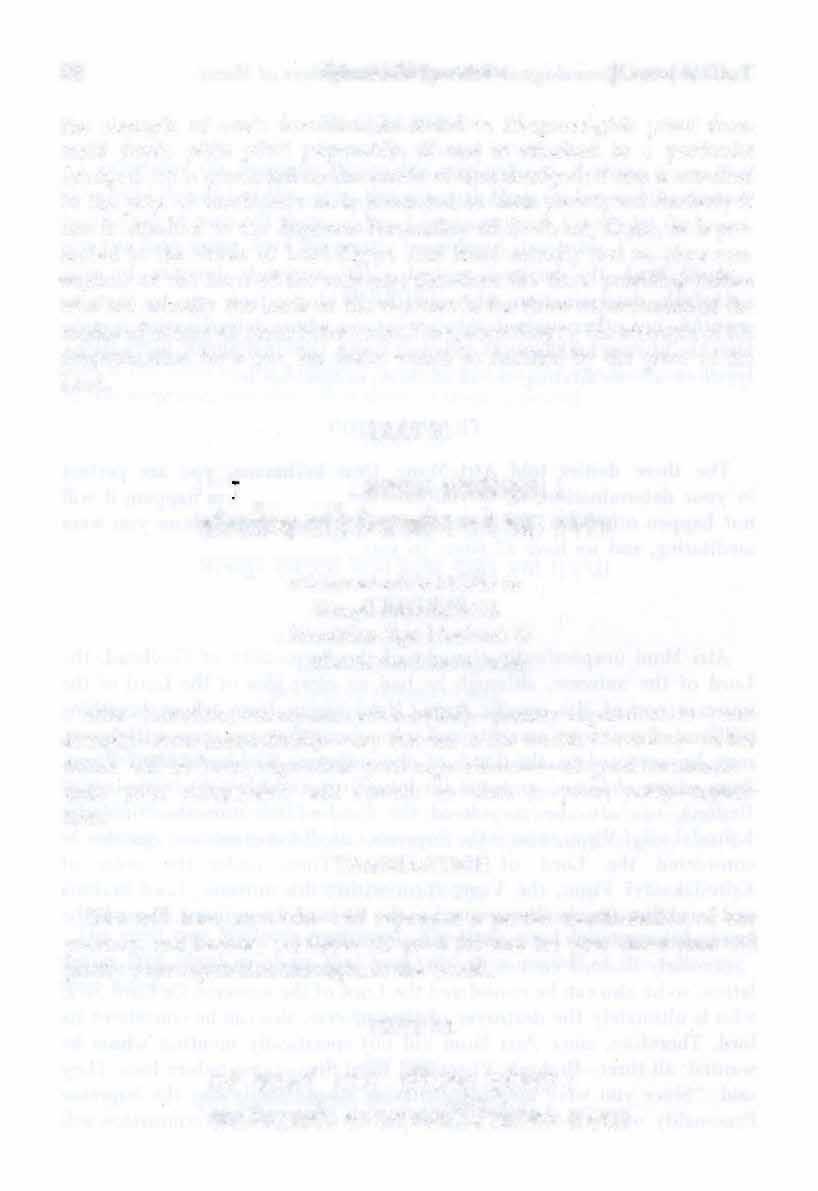
athasmad-arhsa-bhutiiste atmajii loka-viSrutii� bhavitiiro 'ngabhadram te visrapsyanti cate yasa�
atha- therefore; asmat- our; amsa-bhutii�-plenary expansions;te-your; iitmajii�-sons; loka- vismtii�-very famous in the world; bhavitara�-in the future will be born; anga- dear great sage; bhadram-all good fortune; teunto you; visrapsyanti-will spread; ca-also; te-your; yasa�-reputation.


TRANSLATION
You will have sons who will represent a partial manifestation of our potency, and because we desire all good fortune for you, those sons will glorify your reputation throughout the world. TEXT
32
26 Srimad-Bhagavatam [Canto 4, Ch. l
ij' 3fRJ��n ��: 1 at�(tiUSW�ij'Pf(ii�P<f � ijo �: ������
� � � sffinl;;:�•u: 1 ���ijl(it4{t:�tp(¥qN\flf��:����II
Table of the Daughters of Manu
evam kiimavaram dattva pratijagmul;t suresvariil;t sabhiijitiis tayol;t samyag dampatyor mi�atos tata�t
evam-thus; kiimavaram-desired benediction; dattvii-offering; pratijagmul;t-returned; sura-Isvarii/:t-the chief demigods; sabhiijitii/:t-being worshiped; tayolt-while they; samyak-perfectly; dampatyoft-the husband and wife; mifial;o/:t-were looking on; tata{t-from there.
TRANSLATION
Thus, while the couple looked on, the three deities Brahma, Vi�!lu and Mahesvara disappeared fromthat place after bestowing upon Atri Muni the benediction.
TEXT 33

somo'bhiid brahmar-o 'rhsena datto v4r-os tu yogavit durviisii/:t sankarasyiimso nibodhiingirasa/:t prajii/:t
somal;t-the King of the moon planet; abhut-appeared; brahmar-a/:t-of Lord Brahma; amsena-partial expansion; datta/:t-Dattatreya; v4r-o/:t-of Vi�I)U; tu-but;yogavit-verypowerful yogi:;durviisii/:t-Durvasa; sankarasya arhsa[t-partial expansion of Lord Siva; nibodha-just try to understand; angirasa/:t-of the great sage Angira; prajii�-generations.
TRANSLATION
Thereafter, from the partial representation of Brahma, the moon-god was born of them; from the partial representation of Vi�!lu, the great mystic Oattatreya was born; and from the partial representation of Sankara [Lord Siva], Durvasa was born. Now you may hear from me of the many sons of Angira.
Genealogical
Text 33)
27
I
�,..(�i�f�Mf«{:�: ������
mlits�oits'91�f.ltun�q)flfifa<
�im:
TEXT 34
Q1�flit�:qit��Si_(f �lt�: I ftl� it mT �ti?j't�{ijql11�\lll
sraddhii tvangirasa� patni
catasro 'siita kanyaka�
siniviili kuhii riikii
caturthy anumatis tathii
sraddhii � Sraddha; tu-but; angirasa�-of Angira .ft!li; patni-wife; catasra�-four; asiita- gave birth; kanyakii�-daughters; siniviili-Sin!vafi; kuhii�-Kuhu; riikii-Raka; caturthi-the fourth one; anumat0-Anumati; tathii-also.
TRANSLATION
Arigira's wife, Sraddha, gave birth to four daughters, named Sinivali, Kuhii, Riika and Anumati.
TEXT 35 �eft��� I

tat-putriiv apariiv iistiirh
khyiitau sviiroci$e 'ntare utathyo bhagaviin siik�iid
brahmi�thas ca brhaspat*
tat-his; putrau-sons; aparau-others; iistiim-were born; khyiitau- very famous; sviiroci§e-in the S varoci�a millennium; antare-of the Manu; utathya�-Utathya; bhagaviin-very mighty; siik� iit-dire ctly; brahmi�tha� ca-fully spiritually advanced; brhaspati�- Brhaspati.



TRANSLATION
Besides these four daughters, she also had another two sons. One of them was known as Utathya, and the other was the learned scholar Brhaspati.
28
Srimad-Bhagavatam
[Canto 4, Ch. l
� � �mu;:fita:\1"��: ������
Genealogical Table of the Daughters of Manu
TEXT 36
se��-.��q�•qiffili � miA- 1 �s��w:¥tf.f �mf.i��Jq +t(Rtqt: ����.1•

pulastyo 'janayat patnyiim agastyam ca havirbhuvi so 'nya-janmani dahriignir viSraviis ca mahiitapii/:t

pulastya�-the sage Pulastya; ajanayat-begot; patnyiim-in his wife; agastyam-the great sage Agastya;ca-also;havirbhuvi-in Havirbhii.;sa/:t-he (Agastya);anya-janmani-in the next birth; dahriignil:t-the digesting fire;visravii�-Visrava; ca-and; mahiitapii�-greatly powerful because of austerity.
TRANSLATION
Pulastya begot in his wife, Havirbhii, one son of the name Agastya, who in his next birth became Dahragni. Besides him, Pulastya begot another very great and saintly son, whose name was Visrava.

TEXT 37

� �'{�: t4<f�CNCiij(l: I
mUf: �� (l�lf44�d ft�: 11�""
tasya yak�a-patir deval:t kuberas tvi{lavi{lii-sutal:t
riivartal:t kumbhakarrtas ca tathiinyasyiim vibh4artal:t
tasya-his; yak�a-pati/:t-the King of the Yak�as; deva/:t-demigod; kubera/:t-Kuvera;tu-and;i{lavi{iii-of IQ.aviQ.ii;suta/:t-son; riivarta/:t-RavaJ:la; kumbhakarrtal:t-Kumbhakar!la;ca-also;tathii-so;anyasyiim-in the other; vibh(sartal:t- Vibhi�aJ:la.
TRANSLATION
ViSrava had two wives. The first wife was I�avi�a, from whom Kuvera, the master of all Yak�as, was born, and the next wife was named
Text 37]
29
Kesini, and from her were horn three sons-Riival).a, Kumhhakarl).a and Vihhi�al).a.
TEXT 38
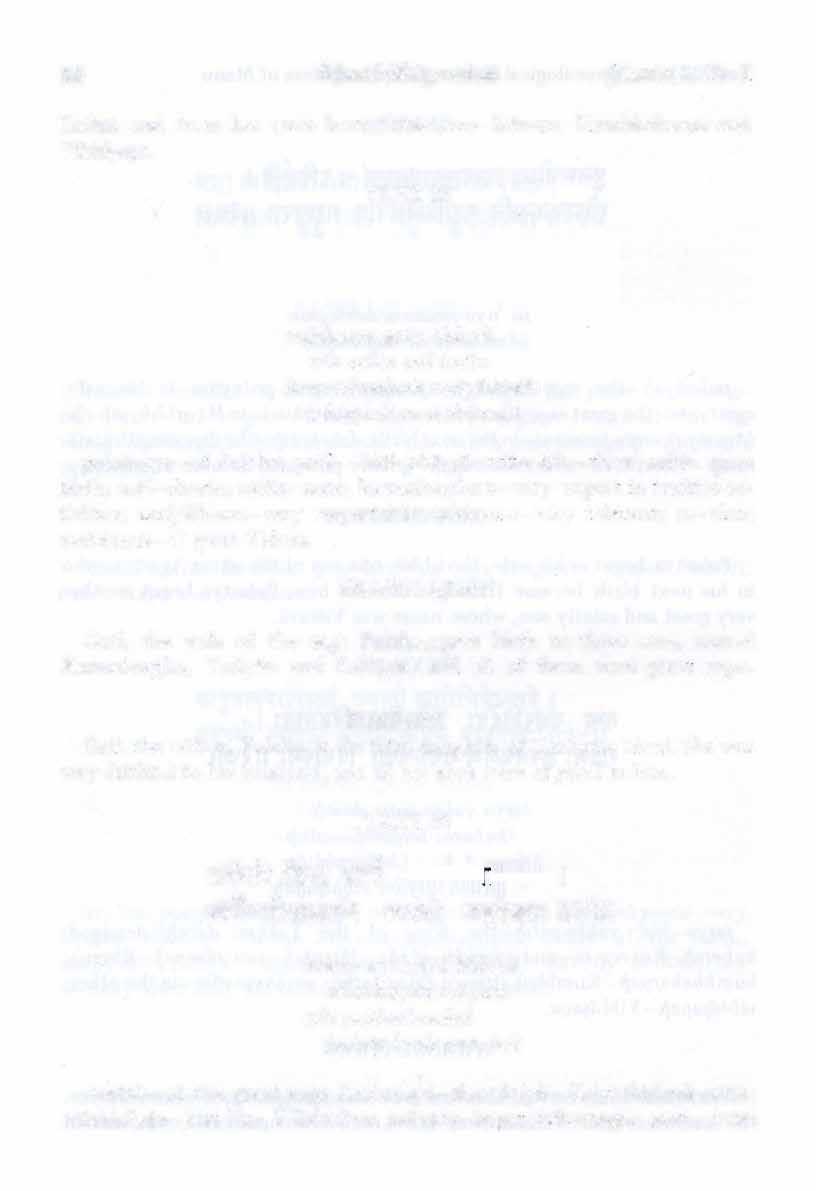
pulahasya gatir bhiirya tnn asuta satTsutiin karmas're�tharh variy7uhsam sahi�f!um ca mahiimate
pulahasya-of Pulaha; gati�- Gati; bharya- w ife; tr"in-three; as uta-gave birth; satf-chaste; sutiin-sons; karmasre�tham-very expert in fruitive activities; va nyamsam-very respectable; sahi�I)-U m-very tolerant; Ca-aJso; mahamate-0 great Vidura.

TRANSLATION
Gati, the wife of the sage Pulaha, gave birth to three sons, named Karma8re�tha, Variyan and Sahi�tm, and all of them were great sages.
PURPORT
Gati, the wife of Pulaha, is the fifth daughter of Kardama Muni. She was very faithful to her husband, and all her sons were as good as him.
TEXT 39
ifRft�ft� �trt I
@\r,fe�mnM �:rm ���II��II
krator api kriya bharyii
valakhilyiin asuyata
f§Zn �a�ti-sahasriif!i
jvalato brahma-tejasa
krato(l-of the great sage Kratu; api-also; kriyii- Kriyii;bharya-wife; valakhilyan-just like Valakhilya; asuyata-begot; nin-sages; §U§ti-sixty;


30
Srimad-Bhagavatam [Canto 4, Ch_ I
sahasrar.i-thousand; jvalata�-very brilliant; brahma-tejasii-by dint of the Brahman effulgence.

TRANSLATION
Kratu's wife, Kriya, gave birth to 60,000 great sages, named the Valakhilyas. All these sages were greatly advanced in spiritual knowledge, and their bodies were illuminated by such knowledge.
PURPORT
Kriya is the sixth daughter of Kardama Muni, and she produced 60,000 sages, who were known as the Valakhilyas because they all retired from family life as viinaprasthas.
TEXT 40
ur]ayiim jajnire putra
vas4thasya parantapa citraketu-pradhaniis te sapta brahmar�ayo 'malii{l
U'}ayam-in OrJa; jajnire-took birth; pu tral;l - sons; vasi�(hasya-of the great sage Vasi�tha; parantapa-0 great one; citraketu-Citraketu; pradhanal;l-headed by; te-all the sons; sapta- seven; brahmar$ayal;l-great sages with spiritual knowledge;amalii�-without contamination.
TRANSLATION
The great sage Vas�tha begot in his wife, Orja, sometimes called Arundhati, seven spotlessly great sages, headed by the sage named Citraketu.
TEXT 41
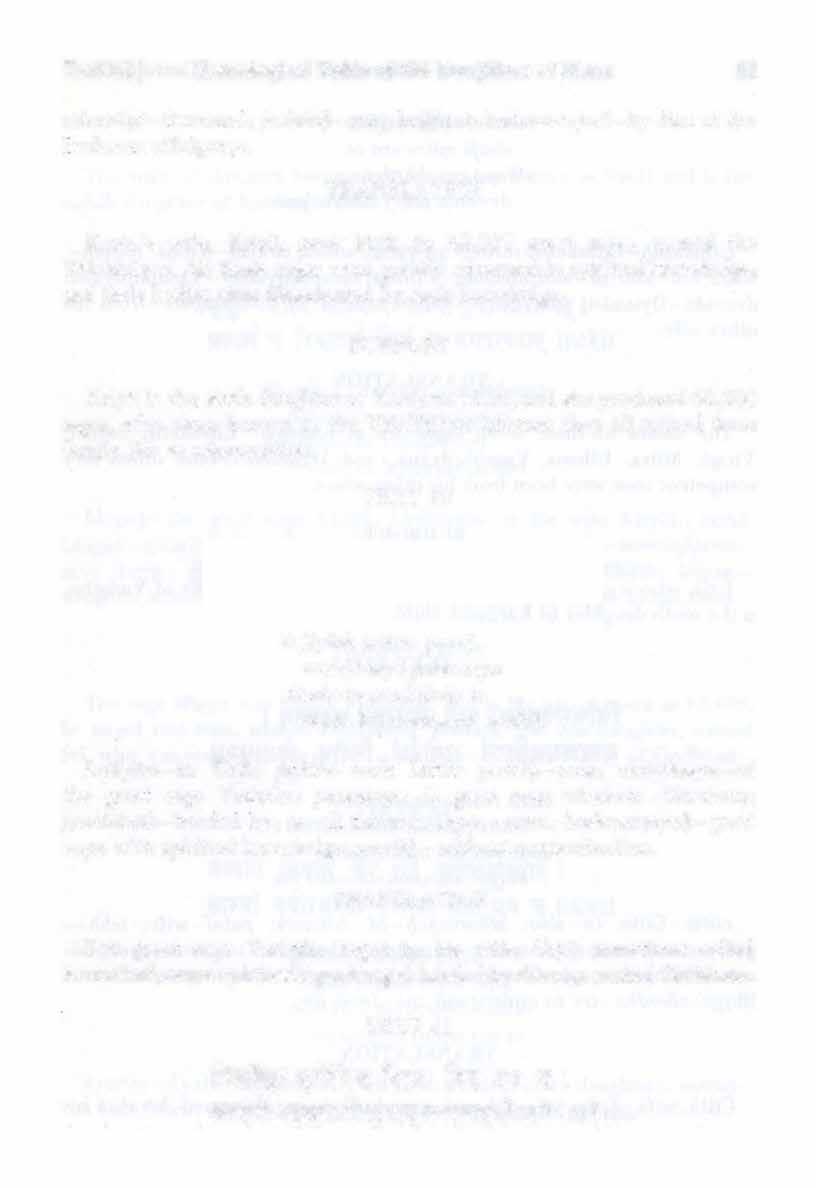
Text 41) Genealogical Table of the Daughters of Manu 31
�IJI�: uW�� fwn flf.f �cf � I �ctuf!QI'1rg���m m�tll
Srimad-Bhagavatam
citraketub- surociS ca virafo mitra eva ca ulbarw vasubhrdyiino dyumiin sakty-iidayo 'pare
citraketub--Citraketu; surocib- ca-and Suroci; virajiib--Viraja; mitrab-Mitra;eua-also;ca-and; ulbartab--UlbaQa; vasubhrdyiinab--Vasubhrdyana; dyuman- Dyumiin ; sakti-adayaft-sons headed by Sakti; apare-from his other wife.
TRANSLATION
The names of these seven sages are as follows: Citraketu, Suroci, Viraja, Mitra, Ulba�a, Vasubhrdyana, and Dyuman. Some other very competent sons were born from his other wives.
PURPORT
D�a, who is sometimes known as Arundhafi and is the wife of Vasi�tha, is the ninth daughter of Kardama Muni.
TEXT 42
cittis tvatharvartab- patni lebhe putram dhrtavratam
dadhyaiicam asvasirasam
bhrgor vamsam nibodha me
cittib--Citti; tu-also; atharvartab--of Atharva; patni-wife ; lebhegot;putram-son; dhrtauratam-completely dedicated to a vow; dadhyaiicam- Dadhyaiica ; asvasirasam-AsvaSira; bhrgob- uarhs'am- generations of Bhrgu; nibodha-try to understand; me-from me.

TRANSLATION
Citti, wife of the sage Atharvii, gave birth to a son named Asvasira by accepting a great vow called Dadhyafica. Now you can hear from me about the descendants of the sage Bhrgu.
32
[Canto 4, Ch. 1
�M�ff��: qifr � � 'la'Effl'{ 1 ���Rmt ��� f;r� it 11\l�ll
The wife of Atharvli known as Citti is also known as Santi and is the eighth daughter of Kardama Muni.
TEXT43
bhrgufl khyiityiirh mahiibhiigafl patnyiirh putriin ajijanat dhiitiirarh ca vidhatiirarh sriyarh ca bhagavat-pariim

bhrgufl- the great sage Bhrgu; khyiityiim-in his wife Khyati; mahiibhiiga[z-greatly fortunate; patnyiim-unto the wife; putriin-sons; afijanatgave birth; dhataram-Dhatli; ca-also; vidhataram-Vidhata; sriyamdaughter named Sr1; ca bhagavat-param- and a great devotee of the Lord.

TRANSLATION
The sage Bhrgu was highly fortunate, and in his wife, known as Khyati, he begot two sons, named Dhata and Vidhata, and one daughter, named Sri, who was very much devoted to the Supreme Personality of Godhead.
TEXT44
ayatirh niyatirh caiva
sute merus tayor adiit tiibhyarh tayor abhavatiirh
mr;karz{lafl prarza eva ca
iiyatim-Ayati; niyatim- Niyati; ca eva-also; sute-daughters ; meruflthe sage Meru; tayofl - unto those two; adiit-gave in marriage; tabhyamout of them; tayo[l-both of them; abhavatam-appeared; mrkar-{ia[lMrka�lQa; prarza[t-Prarya; eva- certainly; ca-and.

Text44) Genealogical Table of the Daughters of Manu 33
PURPORT
�:�t�rr:��T�I \lRtl� � A-�-mntf�� :q �·N�q(i'(11\l�ll
TRANSLATION
The sage Meru had two daughters, named Ayati and Niyati, whom he gave in charity to Dhata and Vidhata. They gave birth to two sons, Mrka!l�a and Prii!la.
TEXT45
�tft �� suoni�fiju �: I ���� �� �� ij(l: U�ll
miirka'(l{leyo mrka'(l{lasya pra'(liid vedaiira muni/;1. kaviS ca bhargavo yasya bhagavan usana suta/;1.
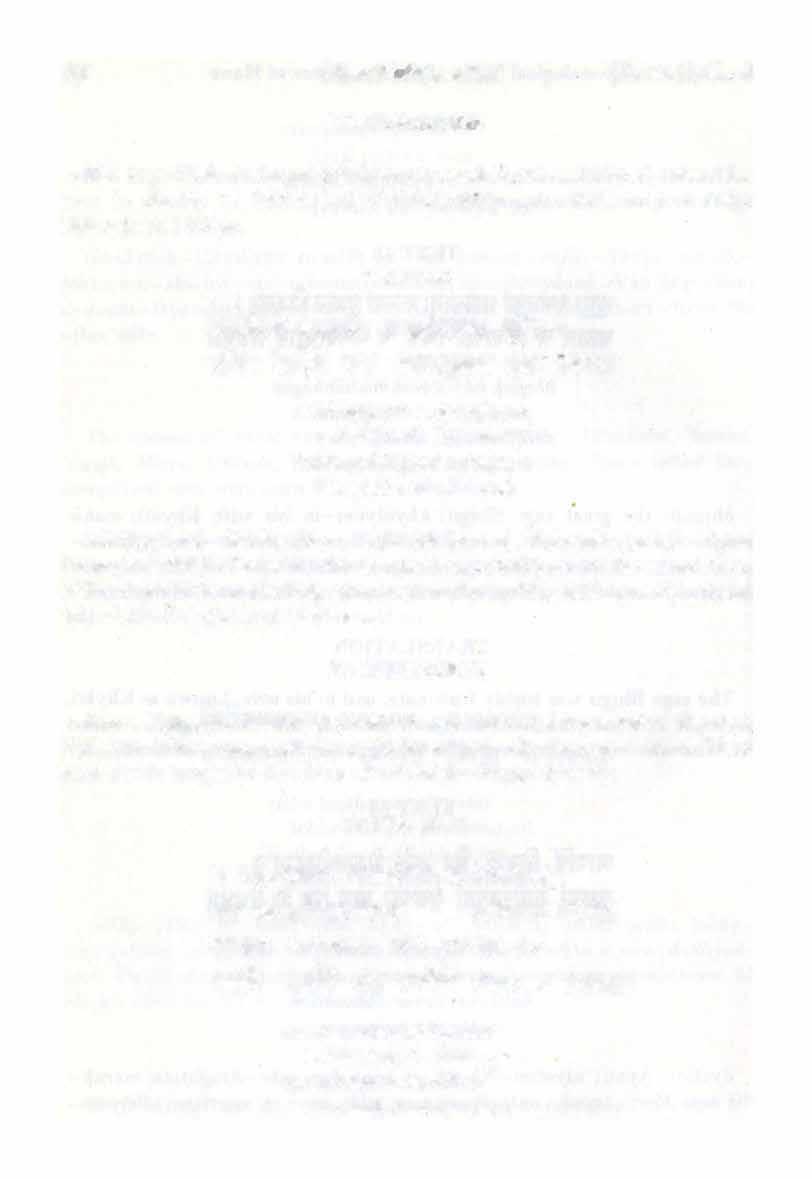
miirka'(l{ieyal;l.-Marka�;u;leya; mrka'(l{lasya-of Mrkru;u;la; pra'(lat-from Pral)a;vedasira/;1.-Vedasira;muni/;1.-great sage;kavi/;1. ca-of the name Kavi; bhargava/;1.-?fthe name Bhargava;yasya-whose;bhagavan-greatly powerful;usana-Sukracarya;suta/;1.-son.
TRANSLATION
From Mrkat:t_,a, Markal).,eya Muni was born and from Prru,a the sage Veda.Sira, whose son was Usana [Sukracarya], also known as Kavi. Thus Kavi also belonged to the descendants of the Bhrgu dynasty.
TEXTS46-47
t � �: �if��<¥m�I
� �*.if«4ar.n �N�mIIV�II
'l"Rf: 'tiT�� �: �: �: I
� �1 � � �&It�: 11\l�ll
ta ete munaya� k�attar
lokiin sargair abhiivayan
e�a karda11Ul-dauhitra
santiinaft kathitas tava
34
Srimad-Bhaga:vatam (Canto4, Ch. 1
srrwatafl.
sraddadhiinasya sadyafl. piipa-harafl. parafl. prasutim miinavim dakfia upayeme hy ajiitmajafl.
te- they; ete-all; munayafl.-great sages; k§attafl.-0 Vidura; lokiin-the three worlds; sargaifl.-with their descendents; abhiivayan-filled; e§afl.-this; kardama-of the sage Kardama; dauhitra-grandsons; santiinafl.-offspring ; kathitafl.-already spoken; tava-unto you; snwatafl.-hearing; sraddadhiinasya- ofthe faithful; sadyaft-immediately;piipa-haraft-reducingallsinful activities; parafl.-great; prasutim- Prasuti; miinavim-daughter of Manu; dak§aft-King Dak�a; upayeme-married; hi-certainly; ajiitmajafl.-son of Brahma
TRANSLATION
My dear Vidura, the population of the universe was thus increased by the descendants of these sages. Actually all of them were born of the daughters of Kardama. Anyone who hears the descriptions of this dynasty with faith will be relieved from all sinful reactions. Another daughter of Manu, known as Prasflti, married the son of Brahma named D�a.
TEXT48

m � m��wn: 1
�Cfil¥4\l� fcli: II \ltII

tasyiim sasarja duhitflJ. .soflasiimala-locanii/l trayodasiidiid dharmiiya tathaikiim agnaye vibhufl.
tasyiim-unto her; sasarja-created; duhitf?l-daughters; § Opasa-sixteen; amala-locaniift-with lotuslike eyes; trayodasa-thirteen; adiit-gave; dharmaya-to Dharma; tatha-so; ekiim-one daughter; agnaye-to Agni; vibhul;l- Dak�a.



Text48] Genealogical Table of
the Daughters of Manu
35
.
TRANSLATION
Dak�a begot sixteen very beautiful daughters with lotuslike eyes in his wife Prasiiti. Of these sixteen daughters, thirteen were given in marriage to Dharma, and one daughter was given to Agni.
TEXTS 49-52
���ffi�)�R�l(qf� I
qta��t�tf��:�!:��:ll\l,ll !f� rm� � "�: 1
� 'alf � � � 11'-\oll
�: �� «f!:� �M(f.ltt<t I
ql1j ��� sJ(«ltt<t II'\�II
iNT���«�(T:mW"l_ ,
�: �ait��t(I�Uil'"' 11'-\�11
pitrbhya ekiim yuktebhyo bhaviiyaikiim bhava-cchide §raddhii maitrr dayii siintis tu§{i{t pu§(i{t kriyonnati{t
buddhir medhii titik�ii hrir murtir dharmasya patnaya{t sraddhiisuta subham maitri prasiidam abhayam dayii

siinti{t sukharh mu.dam tu§ti{t srnayam pu§{ir asuyata yogam kriyonnatir darpam artham buddhir asuyata
medhii smrtim titik:�ii tu k§emam hri{t prasrayam sutam murti{t sarva-gurwtpattir nara-niiraya[LUV [�i
pitrbhya{t-to the Pitas; , ekiim- one daughter; yuktebhyaft-the assembled; bhavaya-to Lord Siva; ekiim-one daughter; bhava-chide-who delivers from the material entanglement; sraddhii, maitri, dayii, siinti{t,
36 Srimad-Bhiigavatam [Canto 4, Ch. l
tu�ti[l,, pu�ti[l,, kriyii, unnati[l,, buddhi[l,, medhii, titik�ii, hriJ:t, miirti[l,names of thirteen daughters of Dak(la; dharmasya-of Dharma; patnaya[l, -the wives; sraddhii-Sraddha;asuta- gave birth to; subham-Subha; maitriMaitri; prasiidam-Prasada; abhayam-Abhaya; dayii-Daya; siinti[l,-Siinti; sukham-Sukha; mudam-Muda; tu�ti[l.-Tu�ti; smayam-Smaya; pu§ti[l,Pu�ti;asiiyata-gave birth to;yogam-Yoga; kriyii-Kriya; unnati�-Unnati; darpam-Darpa; artham-Artha; buddhi[l,-Buddh i; asiiyata- begot; medhii -Medha; smrtim- Smrti; titik�ii -Titik(lii; tu-also; k�emam-K�ema; hriJ:tHri; prasrayam-Prasraya; sutam-son; miirti[l,-Murti; saroa-gu[la-of all respectable qualities; utpatti[l,-the reservoir; nara-niiriiya[lau-both Nara andNarayaQa;r�i-the two sages.
TRANSLATION
One of the remaining two daughters was given in charityto the Pitrloka, where she resides veryamicably, and the other was givento Lord Siva, who is the deliverer of sinful persons from material entanglement. The names of the thirteen daughters oi' Dak�:�a who were given to Dharma areSraddha, Maitri, Daya, Santi, Tu�:�ti, Pu�:�ti, Kriya, Unnati, Buddhi, Medha, Tit�, Hri and Murti. These thirteen daughters produced the following sons: Sraddha gave birth to Subha, Maitri produced Prasada, Daya gave birth to Abhaya, Santi gave birth to Sukha, Tu�ti gave birth to Muda, Pu�ti gave birth to Smaya, Kriya gave birth to Yoga, Unnati gave birth to Darpa, Buddhigavebirthto Artha, Medha gave birth toSmrti,Titik�a gave birth to K�ema, and Hn gave birth to Pras"raya. Miirti, areservoir of all respectable qualities, gave birth to Sri Nara-NarayaQa, the Supreme Personality of Godhead.
TEXT 53

�+tt'1��Mt(ll{ I 11;rtM q1it crnn: �:�ron�: ����II
yayor janmany ado visvam
abhyanandat sunirvrtam
maniimsi kakubho viitii{l prasedu{1 sarito 'draya�
yayo�-both of whom (Nara and NarayaQa); janmani-on the appearance; ada[!,-that; visvam-universe; abhyanandat-became glad; sunirvrtam


Text 53] Genealogical Table of the Daughters of Manu 37
-full ofjoy; maniirhsi-everyone's mind; kakubhaft-the directions; viitiiftthe air; praseduft-became pleasant; saritaft-the rivers; adrayaft- the mountains.



TRANSLATION
On the occasion of the appearance of Nara-Naraya!la, the entire world was full of joy. Everyone's mind became tranquil, and thus in all directions the air, the rivers and the mountains became pleasant.
TEXTS 54-55

divy aviidyanta turyii[li petuft kusuma-vrfitaya{t munayas tu§tuvus tu§tii jagur gandharva-kinnarii{I nrtyanti sma striyo devya iisit parama-mahgalam devii brahmiidaya{t sarve upatasthur abhi_stavai{t
divi-in the heavenly planets; aviidyanta-vibrated; tiiryii[li-a band of instruments; petuft-they showered; kusuma-of flowers; Vf§tayaftshowers; munayaft- the sages; tu§tuvuft-chanted Vedic prayers; tu§tiiftpacified; jaguft-began to sing; gandharva-the Gandharvas; kinnariift-the Kinnaras; nrtyanti sma- danced; striyaft-the beautiful damsels; devya{tof the heavenly planets; asit- were visible; parama-rnangalam-the highest good fortune; deviift-the demigods; brahma-iidayaft-Brahma and others; sarve-all; upatasthu{t-worshiped; abhi§tavai{t-with respectful prayers.

TRANSLATION
In the heavenly planets, bands began to play, and they showered flowers from the sky. The pacified sages chanted Vedic prayers, the denizens of
38 Srimad-Bhagavatam [Canto 4, Ch. l
f�TtM� �IJ( �: tW�m: 1 �����: 11�\lll i��fkt � f� �Olf � �tr: �� ������
heaven known as the Gandharvas and Kinnaras sang, the beautiful damsels of the heavenly planets danced, and in this way, at the time of the appearance of Nara-Naraya�a, all signs of good fortune were visible. Just at that time great demigods like Brahma also offered their respectful prayers.
TEXT 56
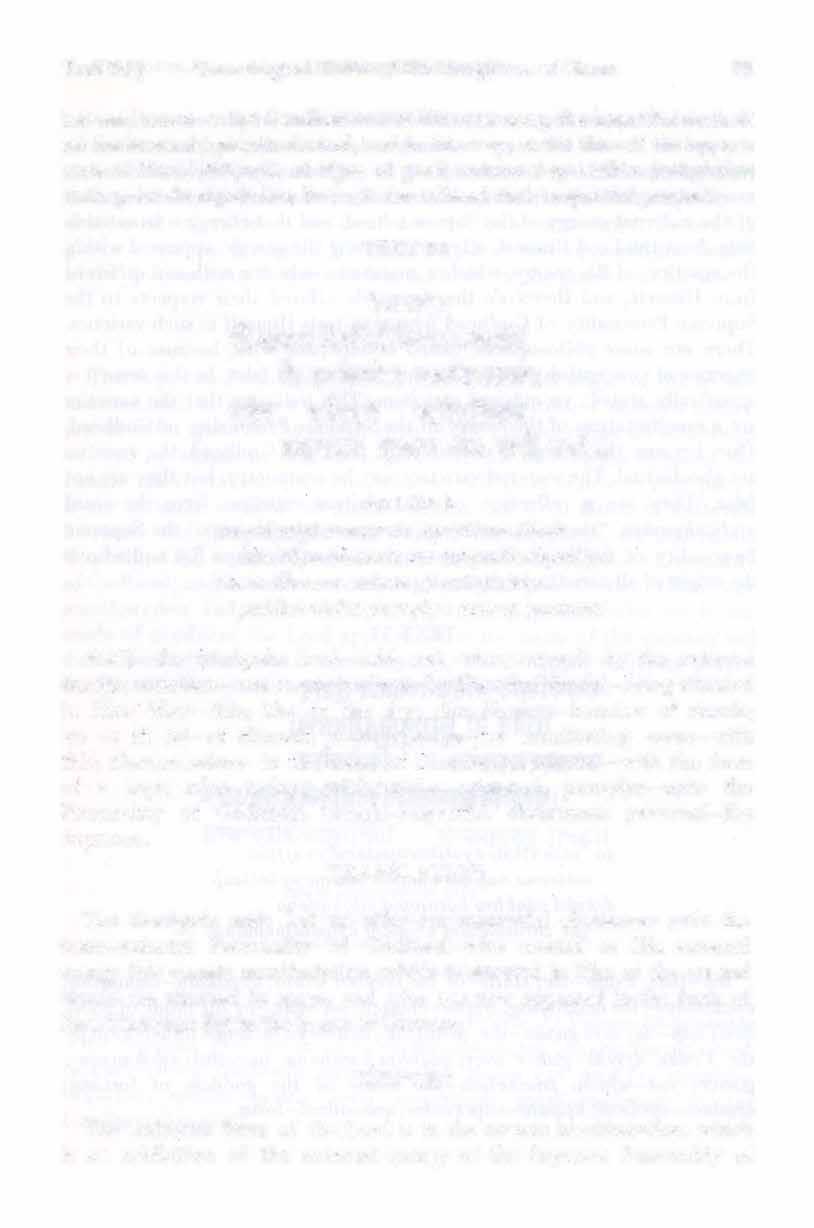
devii ilcu{l. yo miiyayii viracitarh nijayiitmanidarh khe rilpa-bhedam iva tat-praticak§a[liiya etena dharma-sadane [§i-milrtiniidya priidukakiira puru§iiya nama{!. parasmai
devafl - the demigods; ucufz-said; yafl-who; mayaya-by the external energy;viracitam-was created; nijaya-by His own; atmani-beingsituated in Him; idam-this; khe-in the sky; rupa- bhedam-bunches of clouds; iva-as if; tat-of Himself; praticak�a[laya - for manifesting; etena-with this; dharma-sadane-in the house of Dharma; r�i-murtina-with the form of a sage; adya-today; praduscakara-appeared; puru�aya-un to the Personality of Godhead; namafz-respec tful obeisances; paras mai- the Supreme.
TRANSLATION
The demigods said: Let us offer our respectful obeisances unto the transcendental Personality of Godhead who created as His external energy this cosmic manifestation, which is situated in Him as the air and clouds are situated in space, and who has now appeared in the form of Nara-Naraya�a J;t�i in the house of Dharma.
PURPORT
The universal form of the Lord is in the cosmic manifestation, which is an exhibition of the external energy of the Supreme Personality of
Text 56] Genealogical Table of the Daughters of Manu 39
��: � l�A�fctd�d��ss�� � �q�G\f'lq ijd(Rfoqf4UW4 I �� 14-fuG>it •A'{fflilM �� �'IN �: � 11'-\�11
Godhead. In space there are innumerable varieties of planets and also the air, and in the air there -are variously colored clouds, and sometimes we see airplanes running from one place to another. Thus the entire cosmic manifestation is full of variety, but actually that variety is a manifestation of the external energy of the Supreme Lord, and that energy is situated in Him. Now the Lord Himself, after manifesting His energy, appeared within the creation of His energy, which is simultaneously one with and different from Himself, and therefore the demigods offered their respects to the Supreme Personality of Godhead who manifests Himself in such varieties. There are some philosophers, called nondualists, who, because of their impersonal conception, think that the varieties are false. In this verse it is specifically stated, yo miiyayii viracitam. This indicates that the varieties are a manifestation of the energy of the Supreme Personality of Godhead. Thus because the energy is nondifferent from the Godhead, the varieties are also factual. The material varieties may be temporary, but they are not false. They are a reflection of the spiritual varieties. Here the word praticak�arziiya, "there are varieties,"announces the glories of the Supreme Personality of Godhead who appeared as Nara-Narayapa J;t�i and who is the origin of all varieties of material nature.
�';(:ij(iiUIIfi13ir�6"6t:
Ui41(4(Mm-r
44�f.t�1414\'iftJq61(f4"\l(.ll'-\\!>ll
so 'yam sthiti-vyatikaropasamiiya sr�tiin sattvena na� sura-garziin anumeya-tattva�

drsyiid adabhra-karurzena vilokanena
yac chriniketam amalam k�ipatiiravindam
sa[&- that; ayam-He; sthiti-of the created world; vyatikara-calamities; upasamiiya-fordestroying; sr#iin-created; sattvena-by themodeof goodness; na[&-us; sura-garziin-the demigods; anumeya-tattva[&- understood by the Vedas; drsyat-glance over; adabhra-karurzena- merciful ; vilokanenagl.ance; yat-which; sriniketam-the home of the goddess of fortune; amalam-spotless; k�ipata-supersedes; aravindam-Iotus.
40 Srimad-Bhagavatam [Canto 4, Ch. l
ftllfttoqR�Efioqt'n�
TEXT 57 it�
'l!l'l
���
Let that Supreme Personality of Godhead, who is understood by truly authorized Vedic literature and who has created peace and prosperity to destroy all calamities of the created world, be kind enough to bestow His glance upon the demigods. His merciful glance can supersede the beauty of the spotless lotus flower which is the home of the goddess of fortune.
PURPORT
The Supreme Personality of Godhead who is the origin of the cosmic manifestation is covered by the wonderful activities of material nature, just as outer space or the illumination of the sun and moon are sometimes covered by clouds or dust. It is very difficult to find the origin of the cosmic manifestation; therefore material scientists conclude that nature is the ultimate cause of all manifestations. But from siistra, or authentic literature like Bhagavad-gitii and other Vedic scriptures, we understand thatbehindthiswonderfulcosmic manifestation isthe SupremePersonality of Godhead, and in order to maintain the regular procedures of the cosmic manifestation and to be visible to the eyes of persons who are in the mode of goodness, the Lord appears. He is the cause of the creation and dissolution of the cosmic manifestatipn. The demigods therefore prayed for His merciful glance upon them in order to be blessed.
TEXT 58

evarit sura-ga1Jais tiita bhagavantiiv abhi�tutau labdhiivalokair yayatur arcitau gandhamiidanam
evam-thus; sura-garai{t-by the demigods; tiita-0 Vidura; bhagavantau -the Supreme Personality of Godhead; abhi§Jutau- having been praised; labdha-having obtained; avalok ai{t-the glance (of mercy); yayatuftdeparted; arcitau-having been worshiped; gandhamiidanam-to the Gandhamadana Hill.
Text 58] Genealogical Table of the Daughters of Manu 41
TRANSLATION
� Wfl�
li•lteiffl�fitc§Jt I �"'I'Jiel��� �� 11��11
TRANSLATION
[Maitryea said: J 0 Vidura, thus the demigods worshiped with prayers the Supreme Personality of Godhead appearing as the sage Nara-Naray�a, and the Lord glanced upon them with mercy and then departed for Gandhamadana Hill.
TEXT 59

tiiv imau vai bhagavato . harer amsiiv ihiigatau bhiira-vyayiiya ca bhuval].
krHwu yadu-kurildvahau
tau-both; imau-these; vai-certainly; bhagavata�-of the Supreme Personality of Godhead; hare[t-of Hari; amsau-part and parcel expansion; iha-here (in this universe); iigatau-has appeared; bhiira-vyayiiya-for mitigation of the burden; ca-and; bhuva[l-of the world; kH�au- t he two Kr�Q.as (Kr�cya and Aijuna); yadu-kuru-udvahau-who are the best of the Yadu and Kuru dynasties respectively.
TRANSLATION
That Nara-Narayar;ta IJ.11i, who is a partial expansion of K�!1f!a, has now appeared in the dynasties of Yadu and Kuru, in the forms of Kr�Q.a and Arjuna respectively, in order to mitigate the burden of the world.
PURPORT
Narayapa is the Supreme Personality of Godhead, and Nara is a part of the Supreme Personality of Godhead Narayapa . Thus the energy and the energetic together are the Supreme Personality of Godhead. Maitreya informed Vidura that Nara, the portion of NarayaQ.a, had appeared in the family of the Kurus and that NarayaQ.a, the plenary expansion of Krf?Q.a, had come as Kr�Q.a, the Supreme Personality of Godhead, with the purpose of delivering the suffering humanity from the pangs of material burdens.
42 Srimad-Bhagavatam [Canto 4, Ch. 1
�� � � t��lf4C14tm I
�lt(II:IC\11�'11
¥11<'"4�•� � wr: P�t1
In other words, Narayap.a l,l�i was nowpresent in the world in the forms of Kr�f)aand Arjuna.
TEXT 60

sviihiibhimiininas ciigner iitmajiirhs trin ajijanat piivakam pavamiinarh ca sucirh ca huta-bhojanam
svaha-Svaha,the wife of Agni;abhimaninafl-thepresiding deity of fire; ca-and; agne�-from Agni; iitmajiin-sons; trin-three; ajijanat- produced ; pavakam- Pavaka ;pavamanam ca-andPavamana; sucim ca-and Suci; hutabhojanam-eating the oblations of the sacrifice.
TRANSLATION
The predominating deity of fire begot in his wife, Svaha, three children, named Pavaka, Pavamana and Suci, who exist by eating the oblations offered to the fire of sacrifice.
PURPORT
After describing the descendants of the thirteen wives of Dharma, who were all daughters of Dak�a, Maitreya now describes the fourteenth daughter of Dak�a, Svaha, and her three sons. Oblations offered in the sacrificial fire are meant for the demigods, and, onbehalf of the demigods, the three sons of Agni and Svaha, namely Pavaka, Pavamana, and Suci, accept the oblations.
Text 61] Genealogical Table of the Daughters of Manu 43
(C41«1M'Ilf;lif�'41Sti(i\ifiSIT� I m q� � Wlt ..�ll,oll
TEXT 61 �)SlN: �if.:q�1f{�IQ 'fit � I � �.tifq-.�«Ft fq�J1{(11'it: II'�II
Srimad-Bhagavatam
tebhyo 'gnaya]z samabhavan
catviirimsac ca paiica ca ta evaikonapaiiciisat sakam pitr-pitiimahaift
tebhya{t- from them; agnaya[t -fire-gods; samabhavan-were produced; catviirimsat-forty; ca-and; paii ca-five; ca-and; te-they; eva-certainly ; ekonapaiiciisat-forty-nine; siikam- along with; pitr�pitiimahai{z-with the fathers and grandfathers.
TRANSLATION
From those three sons another forty-five descendants were generated, who are also fire-gods. The total number of fire-gods is therefore fortynine, including the fathers and the grandfather.
PURPORT
The grandfather is Agni, and the sons are Pavaka, Pavamana and Suci. Counting these four plus forty-five grandsons, there are altogether f ortynine different fire-gods.
TEXT 62

vaitiinike karma[!i yannamabhir brahrna-viidibhi{t agneyya i�fayo yajne nirupyante 'gnayas tu te
vaitanike-offering of oblations; karmari-the activity; yat-of the firegods; niimabhi{t-by the names; brahma-viidibhi{t-by impersonalist brahmar;ws; agneyyal;t- for Agni; i�{aya�z - sacrific es; yajne- in the sacrifice; nirilpyante-are the objective; agnaya[t-the forty-nine fire-gods; tu-but; te-those.
TRANSLATION
These forty-nine fire-gods are the beneficiaries of the oblations offered in the Vedic sacrificial fire by impersonalist brahma!las.
44
[Canto 4, Ch. 1
·� dfOr
..tar�q. ��S«�« �
�411it�����'41�fit: I
11��11
Impersonalists who perform Vedic fruitive sacrifices are attracted to the various fire-gods and offer oblations in their name. The forty-nine fire-gods are described herewith.
TEXT63
31NQ41'(11�:R:�31�:I

agni�viittii barhi�adaft saumyiif!, pitara iijyapiif!, siignayo 'nagnayas te�iirh
patni diik§iiya[li svadhii
agni�vattiib.-the Agni�vattas; barhiflada[l,-the Barhi�adas ; saumyab.-the Saumyas; pitara[l-the forefathers; iijyapii[l-the Ajyapas; siignaya[l-those whose means is by fire; anagnaya[l-those whose means is without fire; te�iim- of them; patni-the wife; da�aya�z-the daughter of Dak�a; svadhiiSvadha.
TRANSLATION
The Agni�vattas, the Barhi�adas, the Saumyas and the Ajyapas are the Pitrs. They are either sagnika or niragnika. The wife of all these Pitrs is Svadha, who is the daughter of King Da�a.




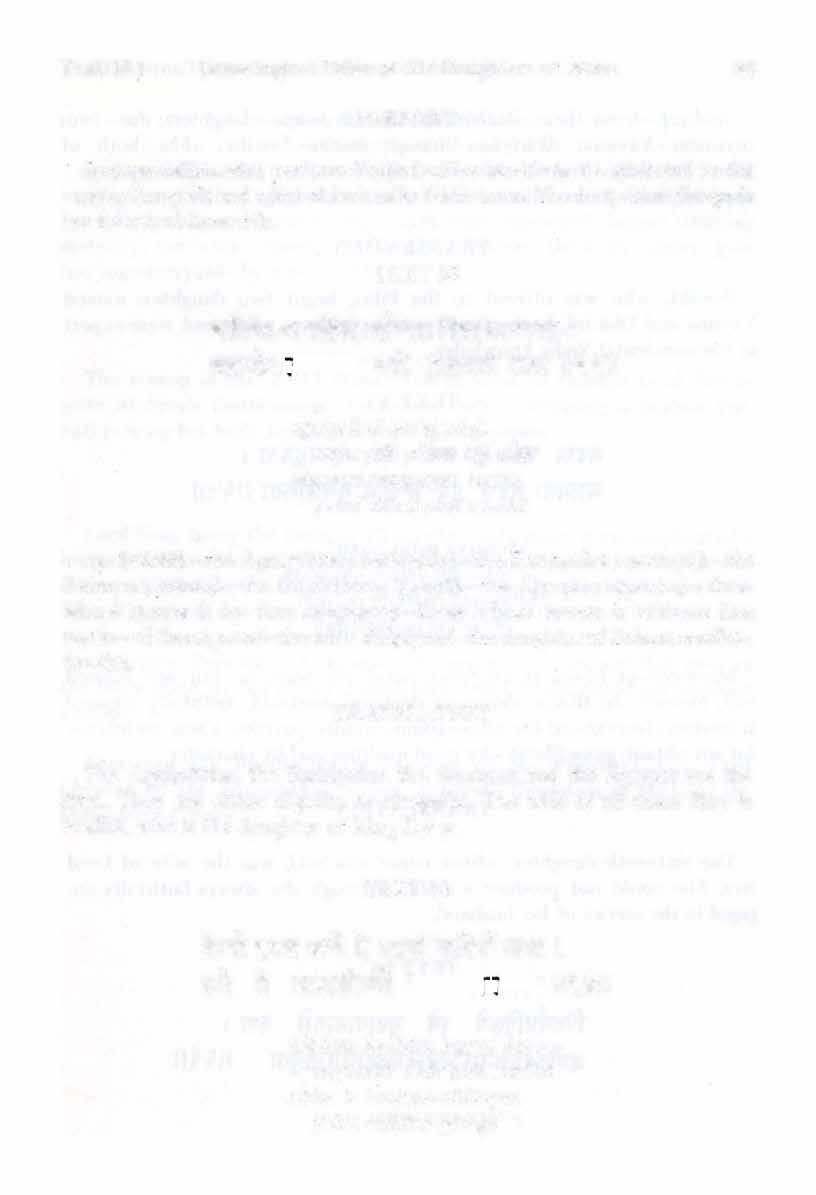
TEXT64
tebhyo dadhiira kanye dve
vayuniirh dhiirir-irh svadha ubhe te brahma-viidinyau
jniina-vijniina-piirage
Text64] Genealogical Table of the Daughters of Manu 45
PURPORT
�S qWT�������II
� �iCIWif'=ltftuff�I
� it*ICIIF(;:t(l ����II
�
�
tebhya�-from them; dadhiira-produced; k anye-daughters; dve-two; vayuniim- Vayuna; dhiiririm-Dharir_li; svadha-Svadha; ubhe-both of them; te-they; brahma-viidinyau-impersonalists; jfiiina-vijfiana-piirageexpert inbothtranscendental and Vedicknowledge.
TRANSLATION
Svadha, who was offered to the Pitas, begot two daughters named Vayuna and DhariQi, both of whom were impersonalists and were expert intranscendental Vedicknowledge.
TEXT 65

bhavasya patnitu sati
bhavarh devam anuvratii
iitmana� sadrsarh putrarh na lebhe gu[!a-suata�
bhavasya-of Bhava (Lord Siva ) ; patni-the wife; tu-but; sa ti- named Sati; bhavam-to Bhava; devam-a demigod; anuvrata-faithfully engaged in service;iitmana�-of herself;sadrsam- similar;putram-ason; na lebhedidnot obtain;gucw-silata�-by good qualities andby character.
TRANSLATION
The sixteenth daughter, whose name was Sati, was the wife of Lord Siva. She could not produce a child, although she always faithfully engaged in the service of her husband.
46 Snmad-Bhagavatam [Canto 4, Ch. 1
« m lR �Ci4¥i�C4<11 I
� "�gu1C\e<t:11��11
�em qW\'
�: rn.f
66 ftt<t4sifij"q � ¥tcU441'11il� � I 31Si\icn€¥«'11��C:IQlfi��T II��II pitary apratirupe sve bhavayanagase ru�ii
TEXT
pitari-asa father; apratirupe-unfavorable;sue-her own; bhavaya-unto Lord Siva; antigase-faultless; ru.sii-with anger; aprauphii-before attaining maturity; eva-even; iitmanii-by herself; iitnuinam-the body; ajahiit-gave up; yoga-samyutii- by mystic yoga.
TRANSLATION
The reason is that Sati's father, Dak�a, used to chastise Lord Siva in spite of Siva's faultlessness. Therefore, before attaining a mature age, Sati gave up her body by dint of yogic mystic power.
PURPORT
Lord Siva, being the head of all mystic yogis, never even constructed a home for his residence. Sati was the daughter of a great king, Dak�a, and because his youngest daughter, Sati, selected as her husband Lord Siva, King Dak�a was not very much satisfied with her. Therefore whenever she met her father, he unnecessarily chastised her husband, although Lord Siva was faultless. Because of this, before attaining a mature age Sati gave up the body given by her father, Dak�a, and therefore she could not produce a child.
Thus end the Bhaktivedanta purports of the Fourth Canto, First Chapter, of the Srimad-Bhagavatam, entitled "Genealogical Table ofthe Daughters of Manu.,

Text 66] Genealogical Table of the Daughters of Manu aprauf/,haiviitmaniitmanam
47
ajahiid yoga-sarhyuta
CHAPTER TWO
Daksa curses Lord Siva
TEXT I

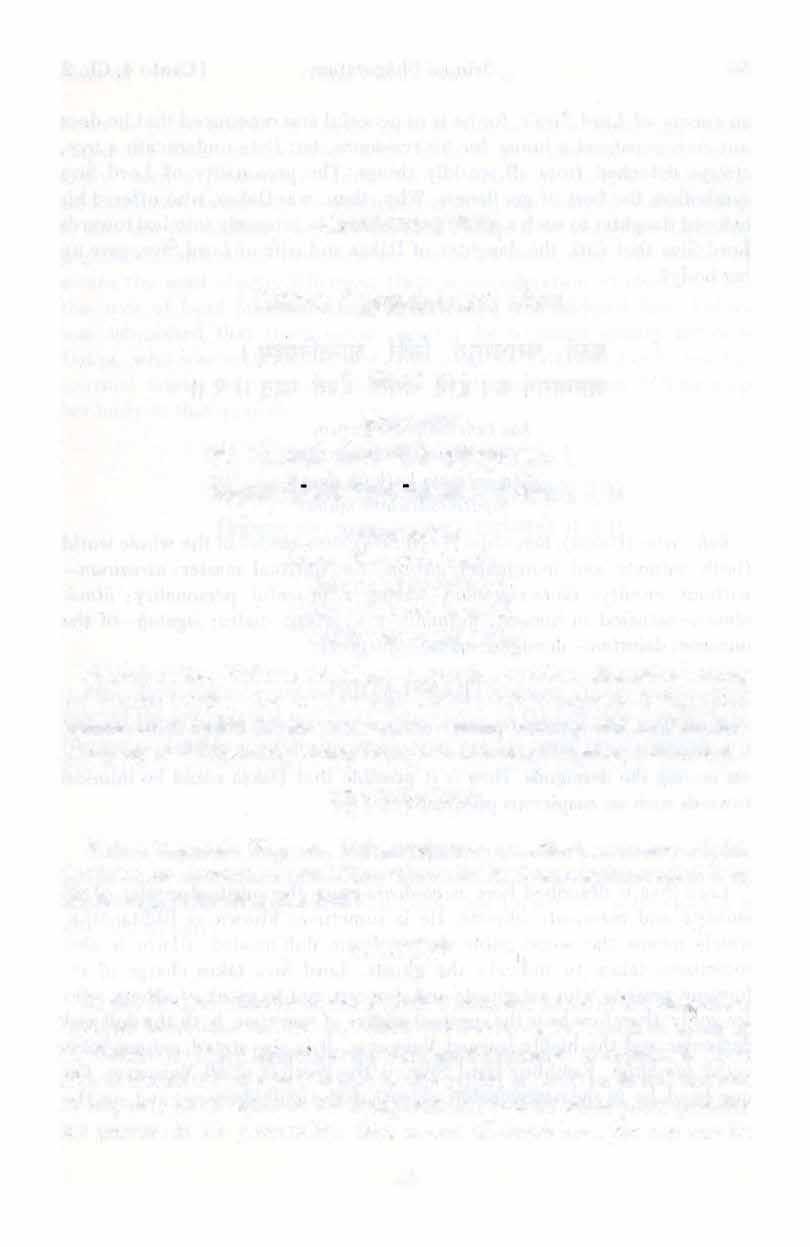
vidura uvaca bhave suavatiim sre§the. dak§o duhitr-vatsalafi. vidve§am akarot kasmiid anadrtyiitmajiim satTm
vidurafi. uviica- Vidura said; bhave-towards Lord Siva; s'ilavatiim-among the gentle; sre�the- the best; dak�a�-Dak�a; duhitr-vatsalab.-being affectionate towards his daughter; vidve§am-enmity; akarot-did exhibit; kasmiit- why; anadrtya- neglecting; iitmajiim- his own daughter; satim- Sati.
TRANSLATION
Vidura inquired: Why was Dalq;a, who was so affectionate towards his daughter, so envious of Lord Siva, who is the best among the gentle? Why did he neglect his daughter Sati?
PURPORT
In the Second Chapter of the Fourth Canto, the cause of the dis&�nsion between Lord Siva and Dak�a, which was due to a ,great sacrifice arranged by Dak�a for the pacification of the entire universe, is explained. Lord Siva is described here as the best of the gentle because he is not envious of anyone, he is equal to all living entities, and all other good qualities are present in his personality. Siva means all-auspicious. No one can be
��
�WH"tf � � if��:
wi""��'Mtl���t��t �11{
�
ll�
I
II
II
49
an enemy of Lord Siva's, for he is so peaceful and renounced that he does not even construct a house for his residence, but lives underneath a tree, always detached from all worldly things. The personality of Lord Siva symbolizes the best of gentleness. Why, then, was Dak�a, who offered his beloved daughterto such agentle personality, so intensely inimical towards Lord Siva that Sati, the daughter of Dakf?a and wife of Lord Siva, gave up her body?
kas tam cariicara-gurum nirvairam siinta-vigraham iitmiiriimam katham dve�ti jagato daivatam mahat
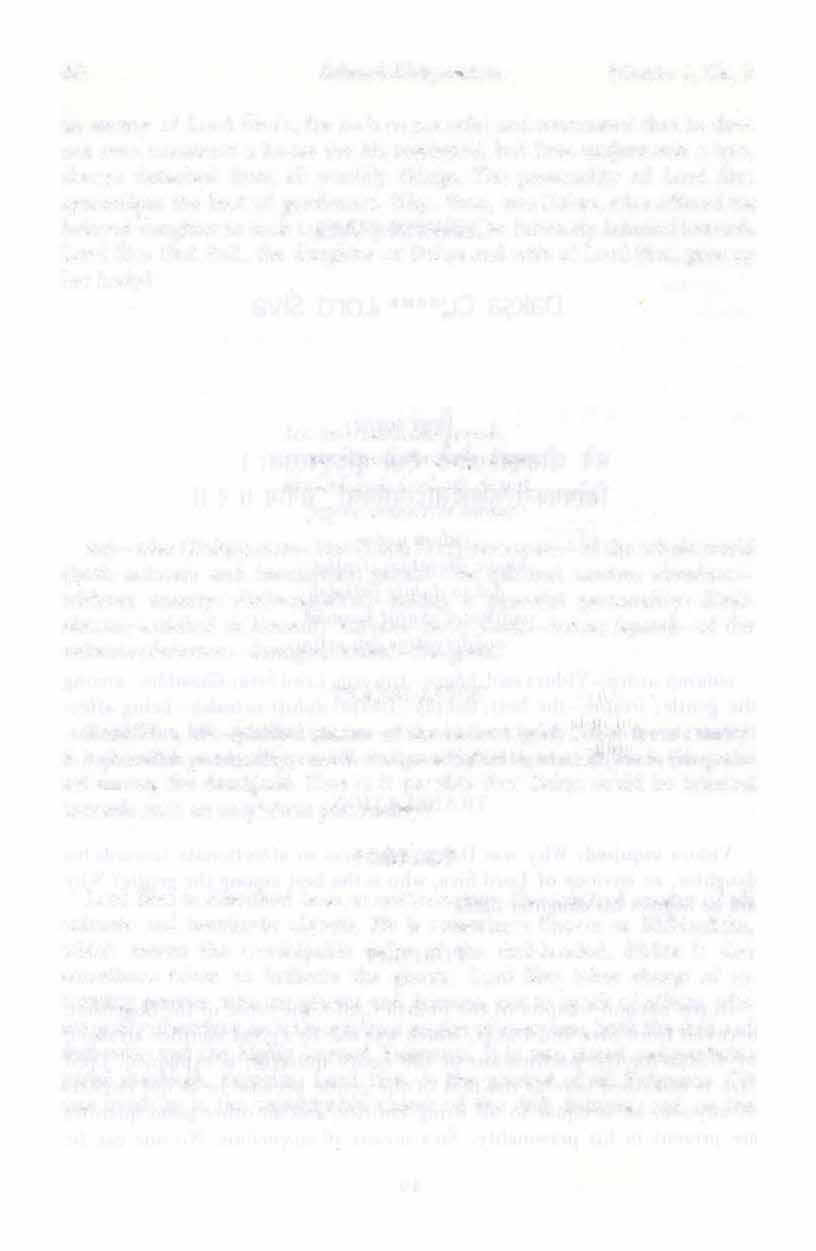
ka�-who (Dak�a);tam-him (Lord Siva);cara-acara- of the whole world (both animate and inanimate); gurum-the spiritual master; nirvairamwithout enmity; siinta-vigraham-having a peaceful personality; iitmiircimam-satisfied in himself; katham-how; dve§ti-hates; jagata�-of the universe; daivatam- demigod;mahat-the great.
TRANSLATION

Lord Siva, the spiritual master of the entire world, is free from enmity, is a peaceful personality, and is always satisfied in himself. He is the greatest among the demigods. How is it possible that D�a could be inimical towards such an auspicious personality?
PURPORT
Lord Siva is described here as cariicara-guru, the spiritual master of all animate and inanimate objects. He is sometimes known as Bhiitanatha, which means the worshipable deity of the dull-headed. Bhiita is also sometimes taken to indicate the ghosts. Lord Siva takes charge of reforming persons who are ghosts and demons, not to speak of others, who are godly;therefore he is thespiritual master of everyone, both thedull and demoniac and the highly learned Vaif?pavas. It is also stated, vai§T_taviincirit yatha sambhu�. Sambhu, Lord Siva, is the greatest of all vai�r;tavas. On one hand he is the worshipable object of the dull demons, and on the
50 Srimad-Bhigavatam [Canto 4, Ch. 2
other he is the best of all Vaig1avas, or devotees, and he has a sampradiiya called the Rudra-sampradaya. Even if he is an enemy or is sometimes angry, such a personality cannot be the object of envy, so Vidura, in astonishment, asked whyhe was taken as such, especially by Dak�a. Dak�a is also not an ordinary person. He is a Prajapati in charge of fathering population, and all his daughters are highly elevated, especially Sati. Sati means the most chaste. Whenever there is consideration of chastity, Sati, this wife of Lord Siva and daughter of Dak�a, is considered first. Vidura was astonished that there could possibly be so much enmity between Dak�a, who was such a great man, the father of Sati, and Lord Siva, the spiritual master of everyone, that the most chaste goddess Sati gave up her body in that quarrel.
TEXT3

l((tfl\l\"41fs:lt
etad iikhyiihi me brahman
jiimiitu{l svasurasya ca vidve�as tu yata� prii[tiims
tatyaje dustyajiin safi
etat-thus;iikhyiihi-please tell;me-to me;brahman-0 briihma(1a;jiimiitu�-of theson-in-law (Lord Siva) j svasurasya-of thefather-in-law(Dak�a) j ca-and;vidve�a�-quarrel;tu-as to;yata�-from what cause;priiQ.iin-her life;tatyaje-gave up;dustyajiin-which is impossible to give up;sati-Safi.
TRANSLATION
Vidura therefore inquired: My dear Maitreya, would you kindly explain to me how such a son-in-law and such a father-in-law could quarrel so bitterly that the great goddess Sati could give up her life, with which it is not easy to part?
TEXT4

Text4] Dakl}a Curses Lord Siva 51
Qr-{iiiM«:��� I
t�4iill�dl
f� ��1: SIIUif(ij��
II�II
Srimad-Bhagavatam
maitreya uviica
purii visva-srjiirh satre sametii(t paramar�ayafi, tathiimara-gar-iift sarve siinugii munayo'gnayafi,
maitreyafi, uviica-the sage Maitreya said; purii-formerly (at the time of Svayambhuva Manu); visva-srjiim-of the creators of the universe;satre-at a sacrifice;sametiifi,-were assembled; parama-r�ayafi,-the great sages; tathii -and also; amara-gar-iift-the demigods; sarve-all; sa-anugiifi,-along with their followers; munayafi,-the philosophers; agnayafi,-the fire-gods.
TRANSLATION
The sage Maitreya said: In a former time the leaders of the universal creation performed a great sacrifice in which all the great sages, philosophers, demigods and fire-gods assembled with their followers.
PURPORT
Upon being asked by Vidura, the sage Maitreya began to explain the cause of the misunderstanding between Lord Siva and Dak�a, because of which the goddess Sati gave up her body. Thus begins the history of.a great sacrifice performed by the leaders of the universalcreation, namely Marici, Dak�a and Vasi�tha. These great personalities arranged for a great sacrifice, for which demigods like lndra and the fire-gods assembled with their followers. Lord Brahma and Lord Siva were also present.
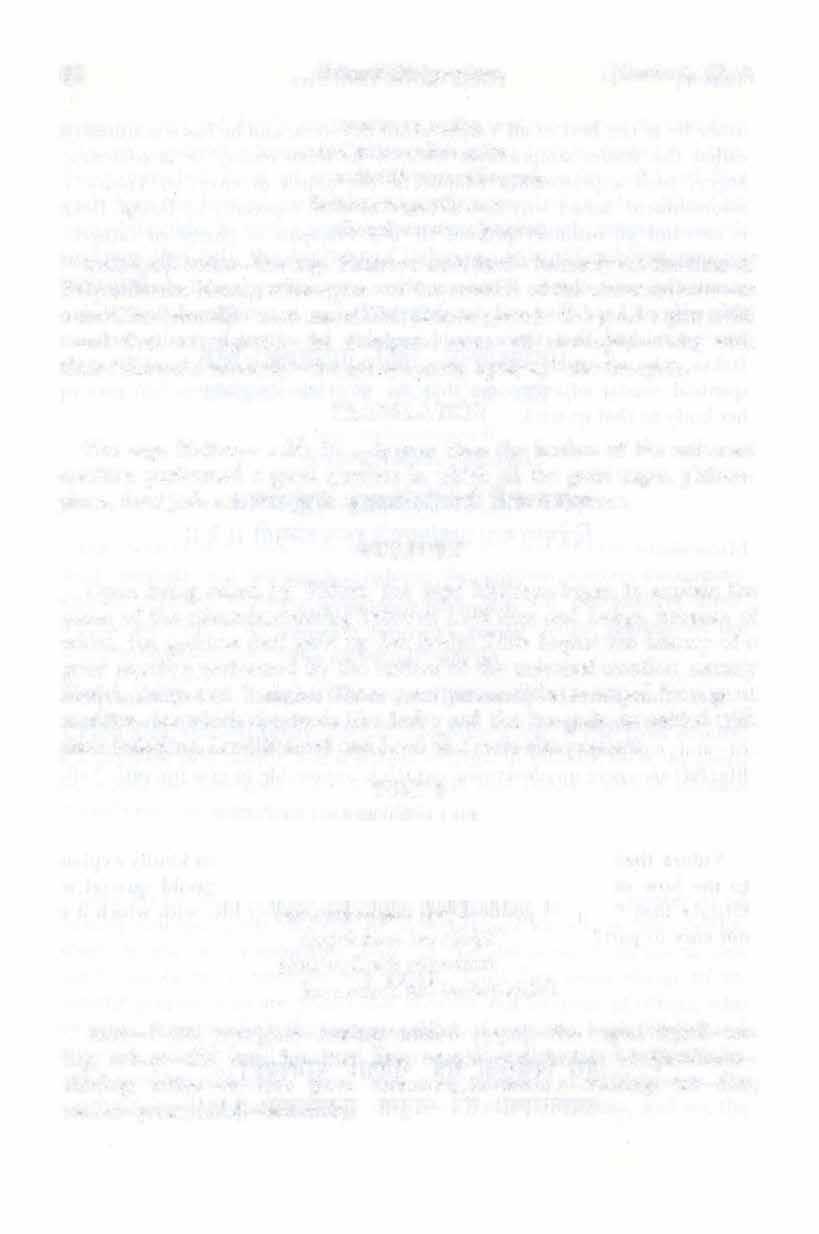
TEXTS
tatra pravi�tam r�ayo dr�tviirkam iva roci�ii
bhriijamiinarh vitimirarh
kurvantarh tari-mahat-Sadafi,
tatra-there; pravi�tam-having· entered; nayaft-the sages; dr�tvii-seeing; arkam-the sun; iva-just like; roci�ii-with luster; bhriijamiinamshining; vitimiram-free from darkness; kurvantam-making; tat-that; mahat-great; sadaft-assembly.

52
[Canto 4, Ch. 2
TRANSLATION
When Da�a, the leader of the Prajapatis, entered that assembly, his personal bodily luster as bright asthatof the sun, the entire assemblywas illuminated, and all the assembled personalities became insignificant in his presence.
TEXT6

�fuR��ij'�1:1'1J��'lf:�: I
� Mftili � � (10AI«IfaJ8�ilQ: II � II
udati�than sadasyiis te sva-dhi�r-yebhya� sahiignaya� rte viriliciim sarvam ca tad-bhiisiik�ipta-cetasa�
udati�{han-stood up;sadasyii{!-the members of the assembly; te-they; sva-dhi§[lyebhya{!-from their own seats; saha-agna_ya{!-along with the fire-gods; rte-except for; viriiicam-Brahma; sarvam-Siva;ca-and; tat-his (Dak�a's); bhiisa-by the luster; ak§ipta-are influenced; cetasa{l-those whose minds.
TRANSLATION
Influenced by his personal bodily luster, all the fire-gods and other participants present in that great assembly, with the exceptions of Lord Brahma and Lord Siva, gave up their own sitting places and stood in respectfor Dak�a.
TEXT7
'l�m�� ll'NA: � �: 1
� ���� �T mm� (1�1$3011 II \9 II
sadasas patibhir dak�o
bhagaviin siidhu sat-krta�
ajam loka-gurum natvii
ni�asiida tad-iijnayii
sadasas-of the assembly; patibhi�-by the leaders; dak�a�-Dak�a; bhagaviin-the possessor of all opulences; siidhu-properly; sat-krta[l-was welcomed; ajam-to the unborn (Brahmii); loka-gurum- to the teacher of
Text7] Da�aCurses Lord Siva 53
the universe; natva-making obeisances;ni§asada-sat down;tat-ajnaya-by his (Brahma's) order.
TRANSLATION
D�a was adequately welcomed by the president of the great assembly, Lord Brahma, and after offering him his respect, Da�a, by the order of Brahma, properly took his seat.
TEXTS
pran ni§a[t[W/'Yt mnlam d[§{Vii namr§yat tad-anadrta� uvaca viimam cak§urbhyam abhivik§ya dahann iva
pr'iin- before ;ni�a[t[tam-being seated; mglam- Lord Siva;dr�tvii-seeing; na amr�yat-did not tolerate; tat-by him (Siva); anadrta[l-not being respected; uvaca-said; vamam-dishonest; cak�urbhyam-with both eyes; abhivi"k�ya-looking at;dahan-burning;iva-as if.

TRANSLATION
Before taking his seat, however, Da�a was very much offended to see Lord Siva sitting there and not showing any respect to him. At that time he became greatly angry, and, his eyes glowing, he began to speak very strongly against him.
PURPORT
Lord Siva, being the son-in-law of Dak�a, was expected to show his father-in-law respect by standing with the others, but because Lord Brahma and Lord Siva are the principal demigods, their positions were greater than Dak�a's. Dak�a, however, could not tolerate this, and he took it as an insult by his son-in-law. Previously, also, he was not very much satisfied with Lord Siva because Siva looked very poor and was niggardly in dress.
54 Srimad-Bhagavatam [Canto 4, Ch. 2
�� � qt iit'l'tf�i3':
I
��+�q
� �p{
� II<; II
TEXT9 � �� it ij�T: �: I �j� t� �� :q 'i«HHI\ II � II
D�a Curses Lord Siva
sruyatiim brahmar§ayo me saha-devii� sahiignaya� siidhuniim bnwato vrttam
niijniiniin na ca matsariit
sriiyatiim- hear;brahmar�aya�-0 sages among the briihma�as; me-unto me; saha-devii�-0 demigods; saha-agnaya�-0 fire-gods;siidhuniim-of the gentle; bruvatalt-speaking; vrttam- the manners; na-not; ajniiniit-from ignorance; na ca-and not;matsariit-from envy.
TRANSLATION
All sages, brahma�as and fire-gods present here, please hear me with attention, for I am speaking about the manners of gentle persons. I am not speaking out of ignorance or envy.
PURPORT
In speaking against Lord Siva, Dak�a tried to pacify the assembly by presenting in a very tactful way that he was going to speak about the manners of gentle persons, although naturally this might affect some unmannerly upstarts and the assembly might be unhappy because they did not want even unmannerly persons to be offended. In other words, he was in complete knowledge that he was speaking against Lord Siva in spite of Siva's spotless character. As far as envy is concerned, from the very beginning he was envious of Lord Siva; therefore he could not distinguish his own particular envy. Although he spoke like a man in ignorance, he wanted to cover his statements by saying that he was not speaking for impudent and envious reasons.
TEXT 10

ayam tu loka-piiliiniim yaso-ghno nirapatrapa�
sadbhir iicarita� panthii
yena stabdhena du�ita�
ayam-he (Siva); tu-but ; loka-piiliiniim-of thegovernors of the universe; yasalt-ghnalt-spoiling thefame;nirapatrapalt-shameless;sadbhil;t-by those of gentle manner; iicarita�-followed;panthii�-the path;yena-by whom (Siva); stabdhena-being devoid of proper actions;dii§ita�-is polluted.

Text
10]
55
Siva has spoiled the name and fame of the governors of the universe and has polluted the path of gentle manners. Because he is shameless, he does not know how to act.

PURPORT
Dak�a wanted to im ress upon the mindsof all the great sages assembled in that meeting that Siva, being one of the demigods, had ruined the good reputations of all the demigods by his unmannerly behavior. The words used against Lord Siva byDak�a can also be understood in a different way, in a good sense. For example, he stated that Siva is yasoghna, which means one who spoils name and fame. So this also can be interpreted to mean thathe wassofamousthathisfame killed all other fame. Again, he used the word nirapatrapa, which also can be used in two senses. One sense is one who is stunted, and another sense is one who is the maintainer of persons who have no other shelter. Generally Lord Siva is known as the lord of the bhutas or lower grade of living creatures. They take shelter of Lord Siva because he is very kind to everyone and is very quickly satisfied. Therefore he is called ASuto�a. To such men, who cannot approach other demigods or Vi�pu, Lord Siva gives shelter. Therefore the word nirapatrapa can be used in that sense.
TEXT ll

�it f� snit �lt lfCti('4�( I
qUQ(��:��(Cf�
e�a me si§yatam priipto yan me duhitur agrahit pii[lirh vipriigni-mukhata� siivitryii iva siidhuvat
llttll
· e .sa�-he (Siva); me-my; si;syatam-subordinate position; praptaftaccepted; yat-because; me duhitu�-of my daughter; agrahit-he took; pi.i[!im-the hand; vipra-agni- of brahma[laS and fire; mukhata�-in the presence; si.ivitryi.ifi-Gayatri; iva-Like; siidhuvat-like an honest person.

TRANSLATION
He has already accepted himself as my subordinate by marrying my daughter in the presence of fire and brahmapas. He has married my
56 Srimad-Bhigavatam [Canto 4, Ch. 2
TRANSLATION
daughter, who is equal to Gayatri, and has pretended to be just like an honest person.
PURPORT
Dak�a's statement that Lord Siva pretended to be an honest person means that Siva was not honest because in spite of accepting the position of Dak�a's s.on-in-law, he was not respectful to Dak�a.
TEXT 12

grh!tvii mrga-siiviik�yii�
piirtirh markata-locana�
pratyutthiiniibhivadiirhe viiciipy akrta nocitam
grhitvii-taking;mrga-siiva-like a deer cub;ak�yii�-of she who has eyes; paf!im-the hand; markata-of a monkey; locana�-he who has the eyes; pratyutthiina-of rising from one's seat; abhiviida-the honor;arhe-tome, who deserves; viicii-with sweet words; api-even; akrta na-he did not do; ucitam-honor.
TRANSLATION
He has eyes like a monkey's, yet he has married my daughter, whose eyes are just like those of a deer cub. Nevertheless he did not stand up 'to receive me, nor did he think it fit to welcome me with sweet words.
TEXT 13 �fitl�1�1�44�
lupta-kriyiiyiisucaye
miinine bhinna-setave
anicchann apy adiirh biiliirh
sudriiyevosat!rh giram
lupta-kriyiiya-not observing rules and regulations; aSucaye-impure; miinine- proud; bhinna-setave-having broken. all rules of civility;
Text 13) Da�a Curses Lord Siva 57
�� ��1\-�:
��;r: I S«����{ctt��.m������ll
q-jf6r
��
�f;r�
I 3ff.(����������ll
anicchan-not desiring; api-although; adam-handed over; baliim-my daughter; sudraya-unto a sudra; iva-as; usatim giram-the message of the Vedas.
TRANSLATION
I had no desire to give my daughter to this person who has broken all rules of civility. Because of his not observing the required rules and regulations, he is impure, but I was obliged to hand over mydaughterto himjust asoneteaches themessagesofthe Vedas toa siidra.
PURPORT
A sudra is forbidden to take lessons from the Vedas because a sudra, due to his unclean habits, is not worthy to hear such instructions. This restriction, that unless one has acquired the brahminical qualifications one should not read the Vedic literatures, is like the restriction that a law student should not enter a law college unless he has graduated all lower grades. According to the estimation of Dak�a, Siva was unclean in habits and not worthy to have the hand of his daughter, Sati, who was so enlightened, beautiful and chaste. The word used in this connection is bhinna-se'tave, which means one who has broken all the regulations for good behavior by not following the Vedic principles. In other words, according to Dak�a the entire transaction of the marriage of his daughter with Siva was not in order.

TEXTS 14-15
��1'41�! � ��:I
31a�.,.rij'4'*"�a�� �wtll�\lll
Rffl��: ���: I
ftmq� ufuit � �;r6N:I
qfu: �;mn;rt (f+it'il�l�4i�1{_II�'-\11
pretavase�u ghore�u
pretair bhuta-gaFJair vrta�
ataty unmattavan nagno vyupta-ke5o hasan rudan
cita-bhasma-krta-sniina�
preta-sra[t-nr-asthi-bhu�af!al:t siviipadeso hy asivo
58 Srimad-Bhagavatam [Canto 4, Ch. 2
matto matta-jana-priya(t pati [t pramatha-niitluinam tamo-miitriitmakiitmaniim
preta-iiviise�u-at the burning places of dead bodies; ghore�uhorrible; pretaifl-by the pretas; bhiita-garai fl-by the bhiitas; vrtaftaccompanied by; atati-he wanders; unmattavat-like a madman; nagna[t-naked; vyupta-kesa[t-having scattered hair; hasan- laughing; rudan-crying; ci ta-of the funeral pyre; bhasma-with the ashes; krtasnanaft-taking bath; preta-of the skulls of dead bodies; srak-having a garland; nr-asthi-bhu.sapaft-ornamented with dead men's bones; sivaapadesa[t-who is siva, or auspicious, only in name; hi-for;asivaft- inauspicious; mattaft -crazy; matta-jana-priyaft-very dearto the crazybeings; pati[t-the leader; pramatha-nathanam-of the lords of the pramathas; tamaft-matra-atmaka-atmanam-of those grossly in the modes of ignorance.
TRANSLATION

He lives in filthy places like crematoriums, and his companions are the ghosts and demons. Naked like a madman, sometimes laughing and sometimes crying, he smears crematorium ashes all over his body. He does not bathe regularly, and he ornaments his body with a garland of skulls and bones. Therefore only in name is he Siva, or auspicious; actually, he is the most mad and inauspicious creature. Thus he is very dear to crazy beings· who are in the gross mode of ignorance, and he is their leader.
PURPORT
Those who do not regularly bathe are supposed to be in association with ghosts and crazy creatures. Lord Siva appeared to be like that, but his name, Siva, is actually fitting, for he is very kind to persons who are in the darkness of the mode of ignorance, such as unclean drunkards who do not regularly bathe. Lord Siva is so kind that he gives shelter to such creatures and gradually elevatesthemto spiritual consciousness. Although it is very difficult to raise such creatures to spiritual understanding, Lord Siva takes charge of them, and therefore, as stated in the Vedas, Lord Siva is all-auspicious. Thus by his association even such fallen souls can be elevated. Sometimes it is seen that great personalities meet with fallen souls, not for any personal interest but for the benefit of those souls. In the creation of the Lord there are different kinds of living creatures. Some of them are in the mode of goodness,some are in the mode of passion, and
Texts 14-15]
Dak�a Curses Lord Siva
59
some are in the mode of ignorance. Lord Vi���u takes charge of persons who are advanced Kr�rya conscious V ai�ryavas, and Lord Brahma takes charge of persons who are very much attached to material activities, but Lord Siva is so kind that he takes charge of persons who are in gross ignorance and whose behavior is lower than that of the animals. Therefore Lord Siva is especially called auspicious.
TEXT 16


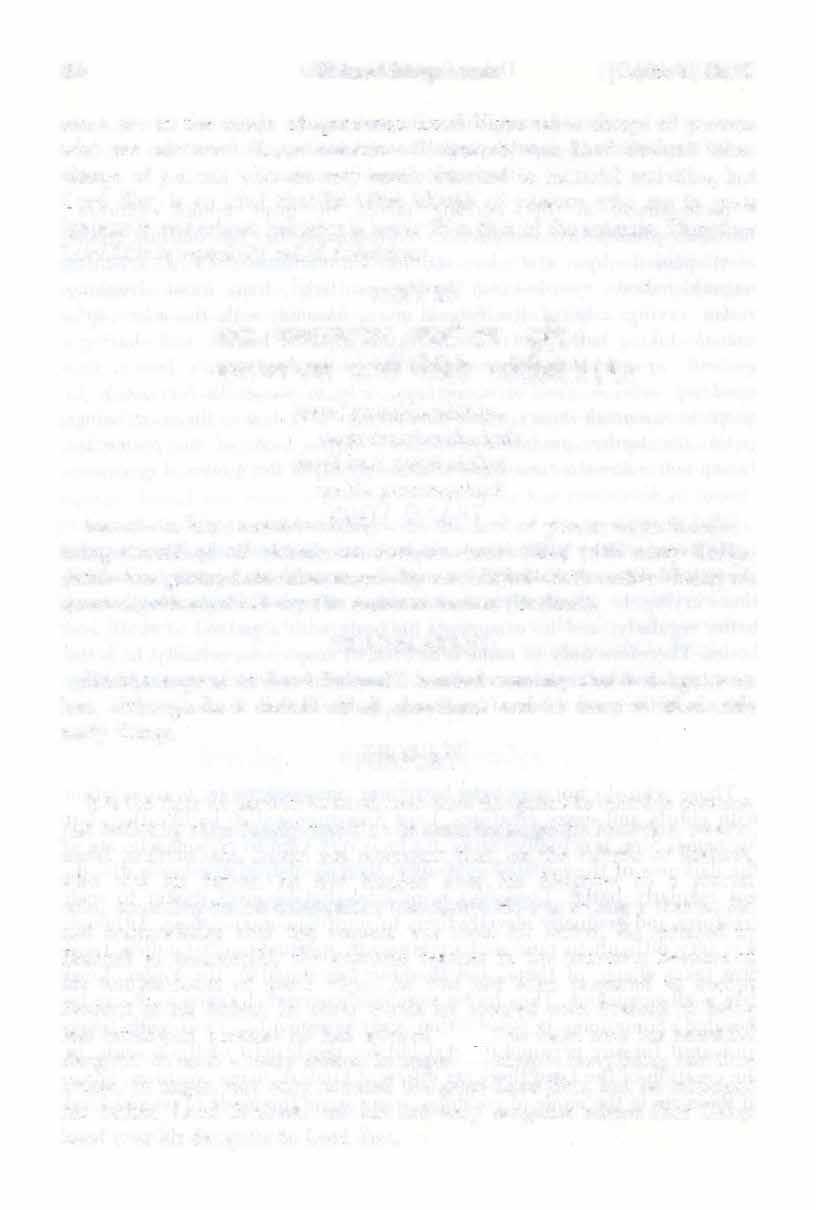
ilij 1NT ��:;it� q�mwtl II� �II
tasma unmada-nathaya
Tw�{a-saucaya durhrde datta bata maya sadhv!
codite parame�thina
tasmai-to him; unmada-nathaya-to the lord of ghosts; nafita-saucayabeing devoid of all cleanliness; durhrde-heart filled with nasty things; datta-was given; bata-alas; maya-by me; sadhv!-Sati; codite-being re· quested; parame§thina-by the supreme teacher (Brahma).
TRANSLATION
On the request of Lord Brahmli I handed over my chaste daughter to him, although he is devoid of all cleanliness and his heart is filled with nasty things.
PURPORT
It isthe dutyof parents to hand over their daughters to suitable persons, just befitting their family tradition in cleanliness, gentle behavior, wealth, social position, etc. Dak�a was repentant that, on the request of Brahmli, who was his father, he had handed over his daughter to a person who, according to his calculation, was nasty. He was so angry that he did not acknowledge that the request was from his father. He referred to Brahma as parame�!h!, the supreme teacher in the universe; because of his temperament of gross anger, he was not even prepared to accept Brahma as his father. In other words he accused even Brahmii of being less intelligent because he had advised Da��a to hand over his beautiful daughter to such a nasty fellow. In anger o e forgets everything, and thus Dak�a, in anger, not only accused the great Lord Siva, but he criticized his father, Lord Brahma, for his not very sanguine advice that Dak�a hand over his daughter to Lord Siva.
60 Srimad-Bhagavatam [Canto 4, Ch. 2
���WI!���
��
f.lf;r;:Qq « PifhJ'istdtq'iqf�I

�ajts� ��� �: � wq�II�\911
maitreya uviica
vinindyaivarh sa girisam apratfpam avasthitam
dalc§o 'thiipa upasprsya lcruddha(l saptum pracalcrame
maitreya[t uviica-Maitreya said; vinindya-abusing; evam-thus; sa�-he (Dak�a); girisam- Siva; apratipam- without any hostility; avasthitam-remaining;dak§a�I- Dak�a;atha-now;apa�-water;upasprsya- washing hands and mouth; kruddha�- angry; saptum-to curse; pracakrame- began to.

TRANSLATION
The sage Maitreya continued: Thus Dak�a, seeing Lord Siva sitting as if against him, washed· his hands and mouth and cursed him in the following words.
TEXT 18


3Pi ij �tt 1
ijl llltltt �t ���: II��II
ayam tu deva-_yajana indropendriidibhir bhava{1. saha bhiigam na labhatiili'l devair deva-gat;tadhama(t
ayam-that; tu- but;deva-yajane- in the sacrifice of the demigods;indraupendra-iidibh*-with Indra, Upendra and the others;bhava�-Siva; saltaalong with; bhiigam-a portion;na-not;labhatiim-should obtain; deva*wi th the demigods; deva-gat;ta-adhamal;t- the lowest of all the demigods.

TRANSLATION
The demigods are eligible to share in the oblations of sacrifice, but Lord Siva, who is lowest of all the demigods, should not have a share.
Text 18] Dak�a Curses
Lord Siva
TEXT 17 :,...._ �Q'�
61
PURPORT
Due to this curse, Siva was deprived of his share in the oblations of Vedic sacrifices. It is due to the curse of Dak§a, Sri Visvanatha Cakravarfi comments in this connection, that Lord Siva was saved from the calamity of taking part with other demigods, who were all materialistic. Lord Siva is the greatest devotee of the Supreme Personality of Godhead, and it is not fitting for him to eat or sit with materialistic persons like the demigods. Thus the curse of Dak§a was indirectlya blessing,for hewould not have to eat or sit with other demigods, who were too materialistic. There is a practical example set for us by Gaurakisora dasa Babaji Maharaja, who used to sit on the side of a latrine to chant Hare K.r§rya. Many materialistic persons used to come and bother him and disturb his daily routine of chanting, so to avoid their company he used to sit bythe side of a latrine, where materialistic persons would not go because of the filth and the obnoxious smell. However, Gaurakisora dasa Babaji Maharaja was so great that he was accepted as the spiritual master of such a great personalityas His Divine Grace Om Vi§ryupada Sri Srimad Bhaktisiddhanta Sarasvatl Gosvam1 Maharaja. The conclusion is that Lord Siva behaved in his own way to avoid materialistic persons who might disturb him in his prosecution of devotional service.
TEXT
nifiidhyamiina� sa sadasya-mukhyair
dakfiO giritriiya visrjya siipam
tasmiid vinifikramya vivrddhamanyur
jagiima kauravya nijarh niketanam
nifiidhyamiina�-being requested not to; sa�-he (Dak�a); sadasyamukhya*-by the members of the sacrifice; dakfia�-Dak�a; giritriiya-to Siva; visrjya-giving; siipam-a curse; tasmiit-from that place;vini�kramyagoing out; vivrddhamanyu�-being exceedingly angry; jagiima-went; kauravya-0 Vidura;nijam-tohis own;niketanam-home.

62 Srimad-Bhagavatam (Canto 4, Ch. 2
19 f�: � ('ld>�U��� fiiR'w4 f� �w_ I
Q�Tft�Rr WR����� f.i�wt�ll��ll
Maitreya continued: My dear Vidura, in spite of the requests of all the members of the sacrificial assembly, Dakl}a, in great anger, cursed Lord Siva and then left the assembly and went back to his home.
PURPORT
Anger is so detrimental that even a great personality like Dak�a, out of anger, left the arena where Brahma was presiding and all the great sages and pious and saintly persons were assembled. All of them requested him not to leave, but, infuriated, he left, thinking that the auspicious place was not fit for him. Puffed up by his exalted position, he thought that no one was greater than him in argument. It appears that all the members of the assembly, including Lord Brahma, requested him not to be angry and leave their company, but in spite of all these requests, he left. That is the effect of cruel anger. In Bhagavad-gitii, therefore, it is advised that one who desires to make tangible advancement in spiritual consciousness must avoid three things-lust, anger and the mode of passion. Actually we can see that lust, anger and passion make a man crazy, even though he be as great as Dak�a. The very name Dak�a suggests that he was expert in all material activities, but still, because of his aversion towards such a saintly personality as Siva, he was attacked by these three enemies-anger, lust and passion. Lord Caitanya, therefore, advised that one should be very careful not to offend Vai�l}avas. He has compared offenses towards a Vai�l}ava to a mad elephant. As a mad elephant can do anything horrible, so when a person offends a Vai�l}ava he can perform any abominable action.
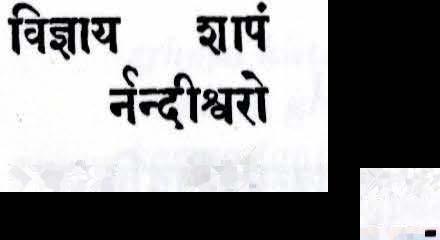
TEXT 20
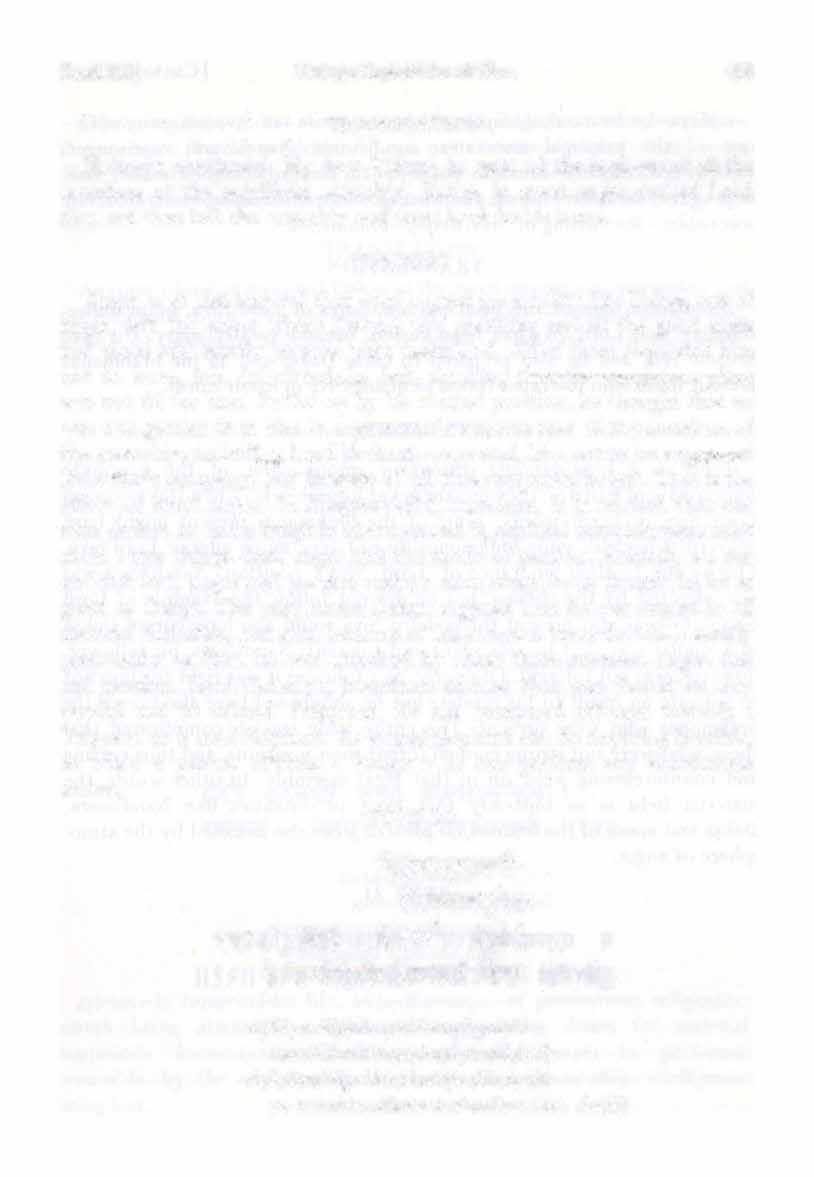
vijnaya sapam girisanugagral)ir nandisvaro ro§a-ka§aya-du§ita�
dak§aya sapam visasarja darul)am ye canvamodams tad-avacyatiim dvijii�
Text 20] Dak�a Curses Lord Siva 63 TRANSLATION
�tMli�IIRVr"t�'���:I �flr w ft� ��
�t:
lt441�¥fl<{ij�f41-o�ijf
II� oil
vijfi.aya-understanding; sapam- thecurse ;girisa- of Siva; anuga-agrar-zl;lone of the principal associates; nandisvaraQ.-N andisvara; rofia-anger; kafi aya-red; dufiital;l- blinded; dakfiaya-to Dak�a; sapam-a curse; visasarja- gave;darur-am-harsh;ye-who;ca-and; anvamodan- tolerated; tatavacyatam- thecursing of Siva; dvijal;l-brahmar-as.

TRANSLATION
Nandi8vara, one of the principal associates of Lord Siva, upon understanding that Lord Siva ha� been cursed, became greatly angry. His eyes became red, and he also prepared to curse Dak�a and all the brahma!las present there who tolerated Da�'s cursing Siva in harsh words.
PURPORT
There is a long-standing dissension among some of the neophyte Vai�pavas and Saivites;they are always at loggerheads. When Dak�acursed Lord Siva in harsh words, some of the brahmar-as present might have enjoyed it because some brahmarws do not very much admire LordSiva. This is due to their ignorance of Lord Siva's position. Nandisvara was also affected by the cursing, but he did not follow the example of Lord Siva, who was also present there. Lord Siva could alsohave cursed Dak�a in a similar way, but he was silent and tolerant; Nandisvara,his follower, however, wasnottolerant. Of course,as afollowerit wasright forhim not to tolerate an insult to his master, but he shouldnothavealso cursedthe brahmar-as who were present. The entire issue was so complicated that those who were not strongenough forgot their positions, and thus cursing and countercursing went on in that great assembly. In other words, the material field is so unsteady that even personalities l.ike Nandisvara, Dak�a and manyofthe brahma'{las present werealso infected bytheatmosphereof anger.
ya etan-martyam uddisya
bhagavaty apratidruhi
druhyaty ajiial;l prthag-drfitis
tattvato vimukho bhavet
64 Srimad-Bhagavatam [Canto 4, Ch. 2
*«'.,..�,f(�q �4'SfRtam 1
it.�•tfi!{6*4���u�tu
TEXT 21 �
a���•:
ya�-who (Dak�a); etat-martyam-this body; uddisya-with reference to; bhagavati-to Siva; apratidruhi-who is not envious; druhyati-bears envy; apia[I-Iess intelligent persons; prthak-dr��-the vision of duality; tattvata�-from transcendental knowledge; vimukh�-bereft; bhavet-may become.
TRANSLATION
Anyone who has accepted Daktja as the most important personality and has neglected Lord Siva because of envy is a less intelligent person and, because of visualizing induality,willbe bereft oftranscendentalknowledge.
PURPORT
The first curse in this connection by Nana.Svara was that anyone supporting Dak�a was foolishly identifying himself with the body, and therefore, because Dak�a had no transcendental knowledge, supporting him would deprive one of transcendental knowledge. Dak�a, Nandlsvara said, identified himself with the body like other materialistic persons and was trying to derive all kinds of facilities in relationship with the body. He had excessive attachment for the body and bodily relations like wife, children, home and other such things, which are different from the soul. Therefore NandJsvara's curse was that anyone who supported Dak�a would be bereft of transcendental knowledge of the soul and thus also be deprived of knowledge of the Supreme Personality of Godhead.
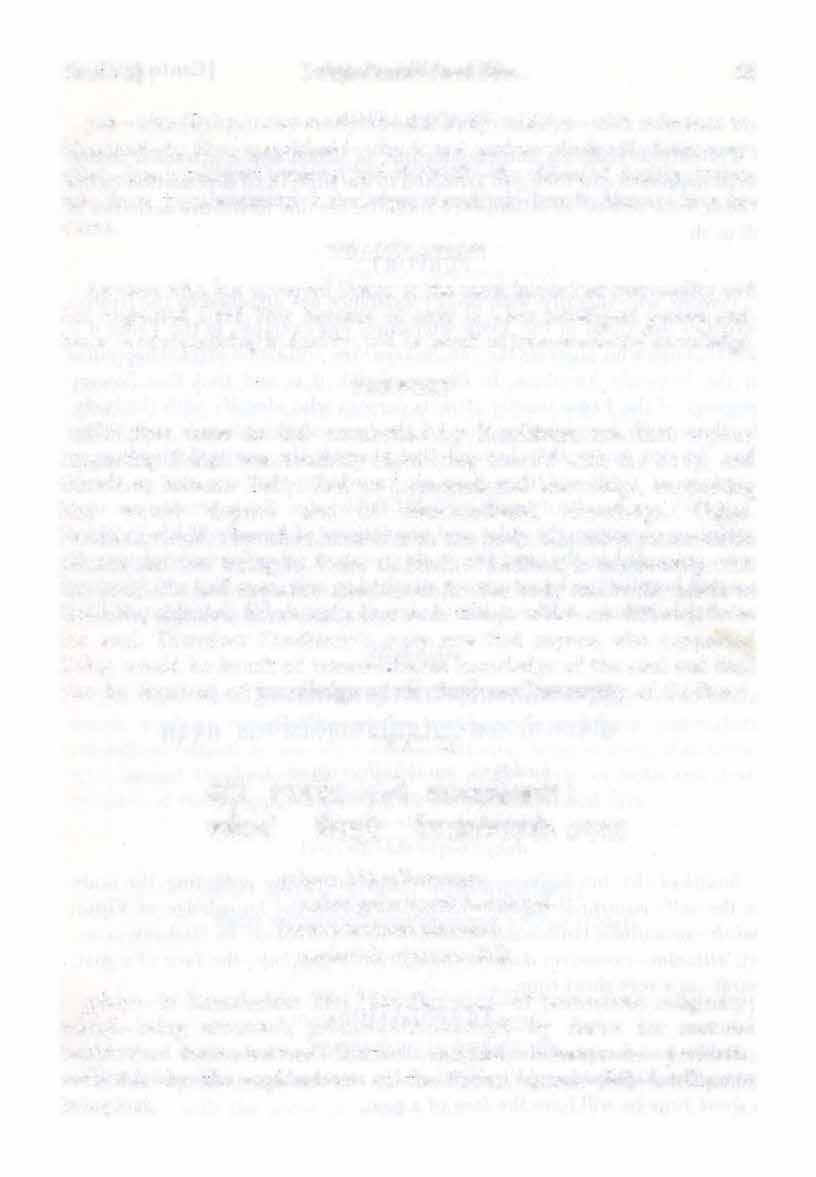
TEXT 22
� �! m 'IIW4U4"F41 I �;si �� "�IGOAq4t'f1: ������
grhe�u kuta-dharme�u
sakto griimya-sukhecchayii
karma-tantram vitanute
vedaviida-vipanna-dhl[l
grhe�u-in householder life; kuta-dharme�u-of pretentious religiosity; sakta�-being attracted; griimya-sukha-icchayii-by desire for material happiness; karma-tantram-fruitive activities; vitanute-he performs; veda-vada-by the explanations of the Vedas; vipanna-dhill-intelli gence being lost.
Text 22] D� Curses Lord Siva 65
TRANSLATION
Pretentious religious householder life, in which one is attracted to material happiness and thus also attracted to the superficialexplanation of the Vedas, robs one of all intelligence and attaches one to fruitive activities as all in all.
PURPORT
Persons who identify with bodily existence are attached to the fruitive activities described in the Vedic literature. For example, inthe Vedas it is saidthatonewho observes the ciiturmiisya vow willattain eternalhappiness in the heavenly kingdom. In Bhagavad-gitii, it is said that this flowery language ofthe Vedas mostly attracts persons who identify with the body. To them such happiness as that of the heavenly kingdom is everything; they do not know that beyond that there is the spiritual kingdom or kingdom of God, and they have no knowledge that one can go there. Thus they are bereft of transcendental knowledge. Such persons are very careful in observing the rules and regulations of household life in order to be promoted in the next life to the moon or other heavenly planets. It is stated herethatsuch persons are attached to griimya-sukha, which means material happiness, without knowledge of eternal, blissful, spiritual life.
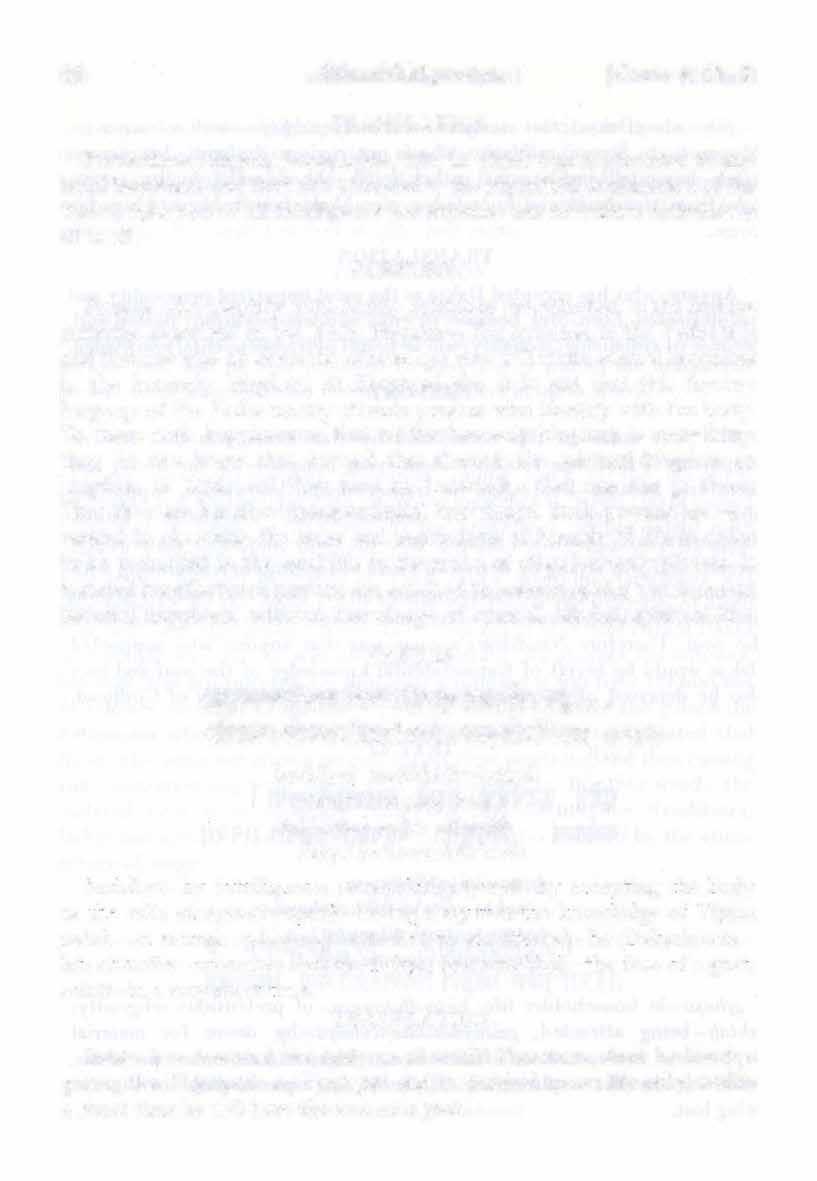
TEXT 23
�'ro����'liffil:qtg: I
�:�s�RHtd�l��lSRW<( 11��11
buddhya parabhidhyayinya vismrtatmagat* pasu� str"l-kama� so 'stv atitaram dak§o basta-mukho 'cirat
buddhyii-by intelligence; para-abhidhyiiyinyii-by accepting the body a the self; vismrta-iitmagati{t-having forgotten the knowledge of Vi�t� u; pasu[l-an animal; stri-kiima[l-attached to sex life; salt-he (Dak�a); astulet; atitariim-excessive; dak§a[l-Dak�a; basta-mukha�t-the face of a goat; aciriit-in a very short time.
TRANSLATION
Da�a has accepted the body as all in all. Therefore, since he has forgotten the Vi�!lupada or Vi�!lugati and is attached to sex life only, within a short time he will have the face of a goat.
66 Srimad-Bhagavatam [Canto 4, Ch. 2
TEXT 24

�f.{dCltUfri i31�: I
�;m: � '+4ltfti *'N+tlf.twt( 11�\lll
vidyii-buddhir avidyiiyiirh karma-mayyiim asau ja�al; smhsaran'tv iha ye camum anu sarviivamanmam
vidyii-buddhil;- materialistic education and intelligence; avidyiiyiim-in nescience ; karma-mayyiim-formed of fruitive activities; asau-he (Dak�a); ja{la�-dull; satitsarantu-let them take birth again and again; iha- here in this world;ye-who; ca- and; amum- Dak9a; anu- following; sarva- Siva; avamiininam-insulting.
TRANSLATION
Those who have become as dull as matter by cultivating materialistic education and intelligence are nesciently involved in fruitive activities. Such men have purposely insulted Lord Siva. May they continue in the cycle of repeated birth and death.
PURPORT
The three curses mentioned above are sufficient to make one as dull as stone, void of spiritual knowledge and preoccupied with materialistic education, which is nescience. After uttering these curses, N andisvara then cursed the briihmarws to continue in the cycle of birth and death because of their supporting Dak�a in blaspheming Lord Siva.

TEXT 25
fiR:�: ����WI� I
�WII �);IJN��:���: II��II giral; smtiiyiil; pu�pi[Lyii rnadhu-gan.dhena bhurirtii mathnii conmathitiitmiina[r sammuhyantu hara-dvi§al;
giral;- words; srutiiyiil;-of the Vedas; pu�pirryii?r- flowery; madhugandhena- with the scent of honey; bhurirrii- profuse; math n.ii- enchant-

Text 25) D� Curses Lord Siva
67
ing; ca-and; unmathita-atmiina� - whose minds have become dull; sammuhyantu- let themremain attached;hara-dvi�al;t-enviousof Lord Siva.
TRANSLATION
May those who are envious of Lord Siva, being attracted by the flowery language of the enchanting Vedic promises, and who have thus become dull, always remain attached to fruitive activities.
PURPORT
The Vedic promises of elevation to higher planets for a better standard of materialistic life are compared to "flowery language because in a "flower there is certainly an aroma, hut that aroma does not last for a very long time. In a flower there is honey, hut that honey is also not eternal.
TEXT
sarva-bhak�ii dvijii vrttyai
dhrta-vidyii-tapo-vratii� vitta-dehendriyariimii
yacakii vicarantv iha
sarva-bhak§ii�-eating everything; dvijii�- the briihmarws; vrttyai-for maintaining the body; dhrta-vidyii- having taken to education; tapa�austerity; vratii� - and vows; vitta- money; deha-the body; indriya-the senses; ara rnii�-the satisfaction; yacakii�-as beggars; vicarantu-let them wander; iha-here.
TRANSLATION
These hrahma�as take to education, austerity and vows only for the purpose of maintaining the body. They shall be devoid of discrimination between what is to eat and what is not to eat. They will acquire money, begging from door to door, simply for the satisfaction of the body.
PURPORT
The third curse which was inflicted by Nandisvara on the briihma[!as who supported Dak�a is completely functioning in the age of Kali. The socalled briihrna[!as are no longer interested in understanding the nature of the Supreme Brahman, although a briihrna[la means one who has attained

68 Srimad-Bhagavatam [Canto 4, Ch. 2
26 -fl� R 'l(fWtuerilA«t: 1 A�'ot�i41(1¥U � �::q(Pf4( ����II
knowledge about Brahman. In the Vediinta-sutra also it is stated, athiito brahma-jijiiiisii: thi human form of life is meant for realization of the Supreme Brahman or Absolute Truth, or, in other words, human life is meant for one's elevation to the post of a briihma[la. Unfortunately the modern briihma[laS, or so-called briihma[las who come in originally brahminical families, have left their own occupational duties, but they do not allow others to occupy the posts of briihmaflaS. The qualifications for briihma[tas are described inthescriptures, in Srimad-Bhiigavatam, Bhagavadgita and all other Vedic literatures. Brahmara is not a herediLary titie or position. If someone from a non-briihmafla family (for example, one born in the family of sudras) tries to become a briihma[la by being properly qualified under the instruction of a bona fide spiritual master, these socalled brah71Ja!ws will object. Such brahnwrws, being cursed by Nandi:svara, are actually in a position where they have no discrimination between eatables and noneatables and simply live to maintain the perishable material body and its family. Such fallen conditioned souls are not worthy to be called briihma[tas, but in Kali-yuga they claim to be briihmaflas, and if a person actually tries to attain the brahminical qualifications, they try to hinder his progress. This is the situation in the present age. Caitanya Mahaprabhu condemned this principle very strongly. During His conversation with Ramananda Raya, He said that regardless of whether a person is born in a briihmafla family or sudra family, regardless of whether he is a householder or a sannyasi, if he knows the science of Kr�J]a he must be a spiritual master. He had many so-called sudra disciples like Haridasa Thakur and Ramananda Raya. Even the Gosvamis, who were principal students of Lord Caitanya, were also ostracized from briihma[ta society, but Caitanya Mahaprabhu, by His grace, made them first-class V ai�p.avas.
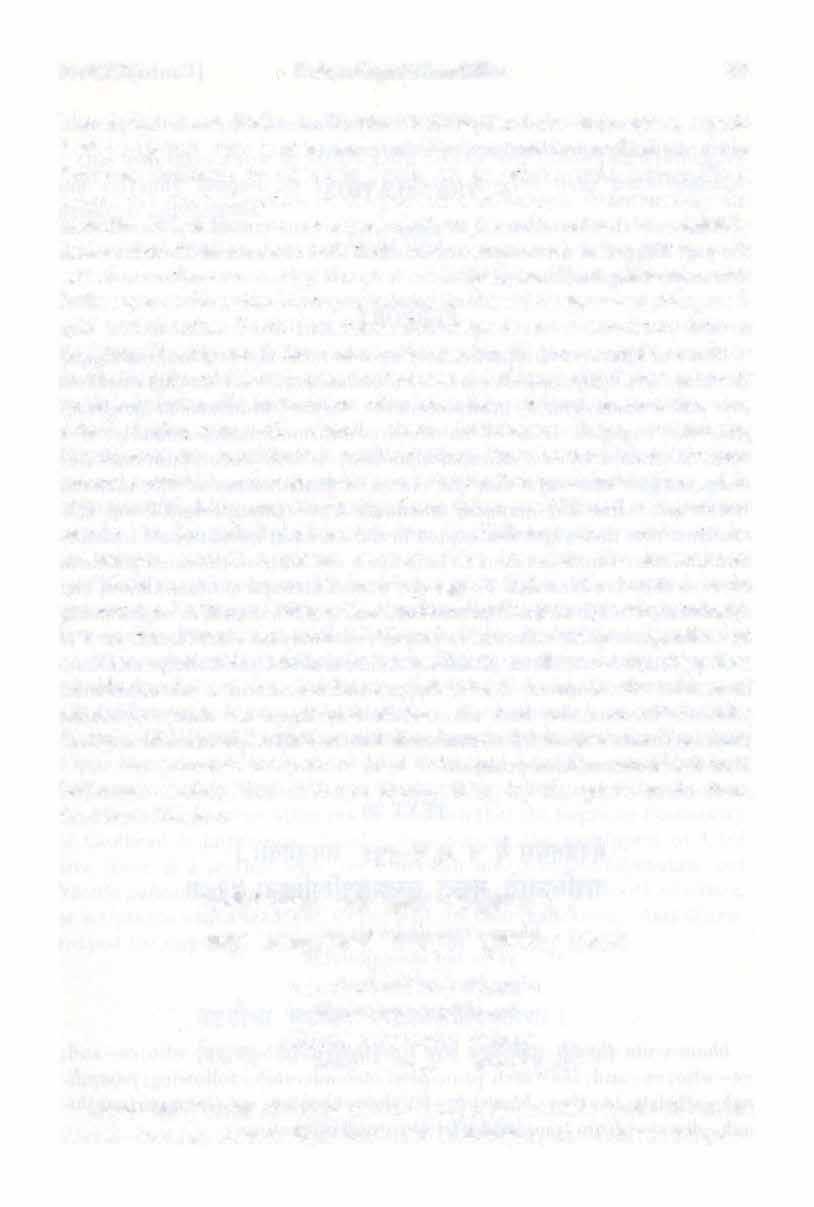
TEXT 27
m� �: \TN� ft�tel� � I
'{g: Sl€ttqGI'i'0N illl�o:S �(�tit«'( II��II
tasyaivam vadata� saparit srutvii dvija-kuliiya vai bhrgu/:t pratyasrjac chiipam brahma-dartd' !uratyayam
tasya- his (Nandisvara's); evam- th , v<J.-.!.ataJ:t- words;siipam-the curse; srutvii-hearing; dvija-kuliiya- unto the briihma[lUS; vai-indeed; bhrgu[l.-
Text 27] Dak�a Curses Lord Siva 69
Bhrgu; pratyasrjat- made; sapam-a curse; brahma�dar-{iam-the punishment of a brahmarta; duratyayam- insurmountable.
TRA NS LA TION
When all the hereditary brahmapas were thus cursed by Nandisvara, the sage Bhrgu, as a reaction, condemned the followers of Lord Siva with this very strong brahminical curse:

PURPORT
The word duratyaya is particularly used in reference to a brahma-dar4a, or curse by a briihmar-a. A curse by a briihmar-a is very strong; therefore it is called duratyaya, or insurmountable. As the Lord states in Bhagavadgita, the stringent laws· of nature are insurmountable; similarly, if a curse is uttered by a briihmar-a, that curse is also insurmountable. But Bhagavad-gitii also says that the curses or benedictions. of the material world are, after all, material creations. The Caitanya- caritamrta also confirms that that which is accepted in this material world to be a benediction and that which is taken to be a curse are both on the same platform because they are material. To get out of this material contamination, one shouldtake shelter of the Supreme Personality of Godhead, as recommended in Bhagavad-gitii: miim eva ye prapadyante miiyiim etam taranti te. The best path is to transcend all material curses and benedictions and take shelter of the Supreme Lord, Kr�l).a, and remain in a transcendental position. Persons who have taken shelter of Kr�l).a are always peaceful; they are never cursed by anyone, nor do they attempt to curse anyone. That is a transcendental position.
TEXT 28
��it� it� (J1'f. �'��'nn: 1 111'ff� � ����qftqf..�: ����II
bhava-vrata-dhara ye ca ye ca tan samanuvratatt paflar-{iinas te bhavantu sac-chastra-pari panthina�
bhava-vrata-dhara�-taking a vow to satisfy Lord Siva;ye- who;ca- and; ye- who; ca-and; tan-such principles; samanuvrata�-following;pii, sar-{iina�-atheists; te-they; bhavantu-let them become; sat-sastra-paripanthina�-diverted from transcendental scriptural injunctions.
70 Srimad-Bhagavatam (Canto 4, Ch. 2
One who takes a vow to satisfy Lord Siva or who follows such principles will certainly become an atheist and be diverted from transcendental scriptural injunctions.
PURPORT
It is sometimes seen that devotees of Lord Siva imitate the characteristics of Lord Siva. For example, Lord Siva drank an ocean of poison, so some of the followers of Lord Siva imitate him and try to take intoxicants like giinjii (marijuana). Here the curse is that if someone follows such principles he must become an infidel and turn against tqe principles of Vedic regulation. It is said that such devotees of Lord Siva will be sacchiistra-paripanthina{l, whichmeans opposed to the conclusion of s�stra, or scripture. This is confirmed in the Padma Puriir.ta also. Lord Siva was ordered by the Supreme Personality of Godhead to preach the impersonal or Mayavadi philosophy for a particular purpose, just as Lord Buddha preached the philosophy of voidness for particular purposes mentionedin the sastras.
Sometimes it is necessary to preach a philosophical doctrine which is against the Vedic conclusion. In the Siva Puriirw it is stated that Lord Siva said to Parvati that in the Kali-yuga in the body of a briihmarw he would preachthe Mayavadiphilosophy. Thus generally it is found that the worshipers of Lord Siva are Mayavadi followers. Lord Siva himself says, mayaviidam asac-chastram. Asat-sastra, as explained here, means the doctrine of Mayavadi impersonalism, or becoming onewiththe Supreme. Bhrgu Muni cursed that persons who worshiped Lord Siva would become followers of this Mayavadi asat-sastra. It is called asat-siistra because the Mayavadi doctrine attempts to establish that the Supreme Personality of Godhead is impersonal. Besides that, among the worshipers of Lord Siva there is a section who live a devilish life. Srimad-Bhiigavatam and Niirada-pancaratra are authorized scriptures that areconsidered sat-siistra, or scriptures which lead one to the path of God realization. Asat-sastras arejust the opposite.

Text 29) Da�a Curses Lord Siva 71
TRANSLATION
TEXT 29 wcm'l!41 � Gtal¥t441�\q1Ruf: I � Nct(l\SI�f � ��ij(IQCf( ����II na�ta-saucii muqha-dhiyo jatii-bhasmiisthi-dharirwfl
na�ta-sauciifr-cleanliness being abandoned; mu�ha-dhiya�-foolish;jatabhasmiisthi-dhiirirwfr-wearing long hair, ashes and bones; visantu- may enter; siva-cfik�iiyiim-into initiation of worship of Siva; yatra-where; daivam-are spiritual;sura-iisavam-wine and liquor.
TRANSLATION
Those who vow to worship Lord Siva are so foolish that they imitate him by keeping long hair on their heads. When initiated into worship of Lord Siva, they prefer to live on wine, flesh and other such things.
PURPORT
Indulging in wine and meat, keeping long hair on one's head, not bathing daily, and smokingganjii, marijuana, are some of the habits which are accepted by foolish creatures who do not have regulated lives. By such behavior one becomesdevoid oftranscendentalknowledge. In the initiation into the Siva mantra there are mudrikii�taka, in which it is sometimes recommended that one make his sitting place on the vagina and thus desire nirvii[la, or dissolution of existence. In that process of worship, wine is needed, or sometimes, in place of wine, palm tree juice which is converted into an intoxicant. This is also offeredaccording to Siva-iigama, a scripture onthe method of worshiping Lord Siva.
TEXT 30

... � qpqf� � qRPI�� I
W« �"l(uj -: ��: ll�oll
brahma ca briihmar-iims caiva yad yuyam parinindatha setum vidh'iira[lam puthsiim ata[l pa�a!l�am iisritii�
brahma-the Vedas; ca-and; briihmar-iin-the briihmar-as; ca-and; evacertainly; yat- because; yuyam-you; parinindatha-blaspheme; setumVedic principles;vidh'iirar-am-holding;pumsiim-of mankind;ata�-there· fore;pii�a[l�m-atheism; iiSrita[l- have taken shelter.
72
4, Ch. 2
Srimad-Bhagavatam visantu siva-dLk�ayiim yatro daivarh suriisavam [Canto
Bhrgu Muni continued: Since you blaspheme the Vedas and the brahma�as, who are followers of the Vedic principles, it is understood that you have already taken shelter of the doctrine of atheism.
PURPORT
Bhrgu Muni, in cursing Nandisvara, said that not only would they be degraded as atheists because of his curse, but they had already fallen to the standard of atheism because they had blasphemed the Vedas, which are the source of human civilization. Human civilization is based on the qualitative divisions of social order, namely the intelligent class, the martial class, the productive class and the laborer class. The Vedas provide the right direction for advancing in spiritual cultivation and economic development and regulating the principle of sense gratification so that ultimately one may be liberated from material contamination to his real state of spiritual identification (aharh brahmiismi). As long as one is in the contamination of material existence, he changes bodies from the aquatics up to the position of Brahma, but the human form of life is the highest perfectional life in the material world. The Vedas give direction how to elevate oneself in the next life, so the Vedas are the mother for such instructions, and the bnihmarzas, or persons who are in knowledge of the Vedas, are the father. Thus if one blasphemes the Vedas and briihmar-as, naturally one goes down to the status of atheism. The exact word used in Sanskrit is niistika, which means one who does not believe in the Vedas but manufactures some concocted system of religion. Sri Caitanya Mahaprabhu has said that the followers of the Buddhist system of religion are niistikas. In order to establish his doctrine of nonviolence, Lord Buddha flatly refused to believe in the Vedas, and thus, later on, Sankaracarya stopped this system of religion in India and forced it togo outside India. Here it is stated, brahma ca briihma[!iin. Brahma means the Vedas. Aharh brahmiismi means "I am in full knowledge." The Vedic assertion is that one should think that he is Brahman, for actually he is Brahman. If brahman or the Vedic spiritual science is condemned, and the masters of the spiritual science, the briihmar-as, are condemned, then where does human civilization stand? Bhrgu Muni says, "It is not due to my cursing that you shall become atheists; you are alreadysituated in the principle of atheism. Therefore you are condemned."
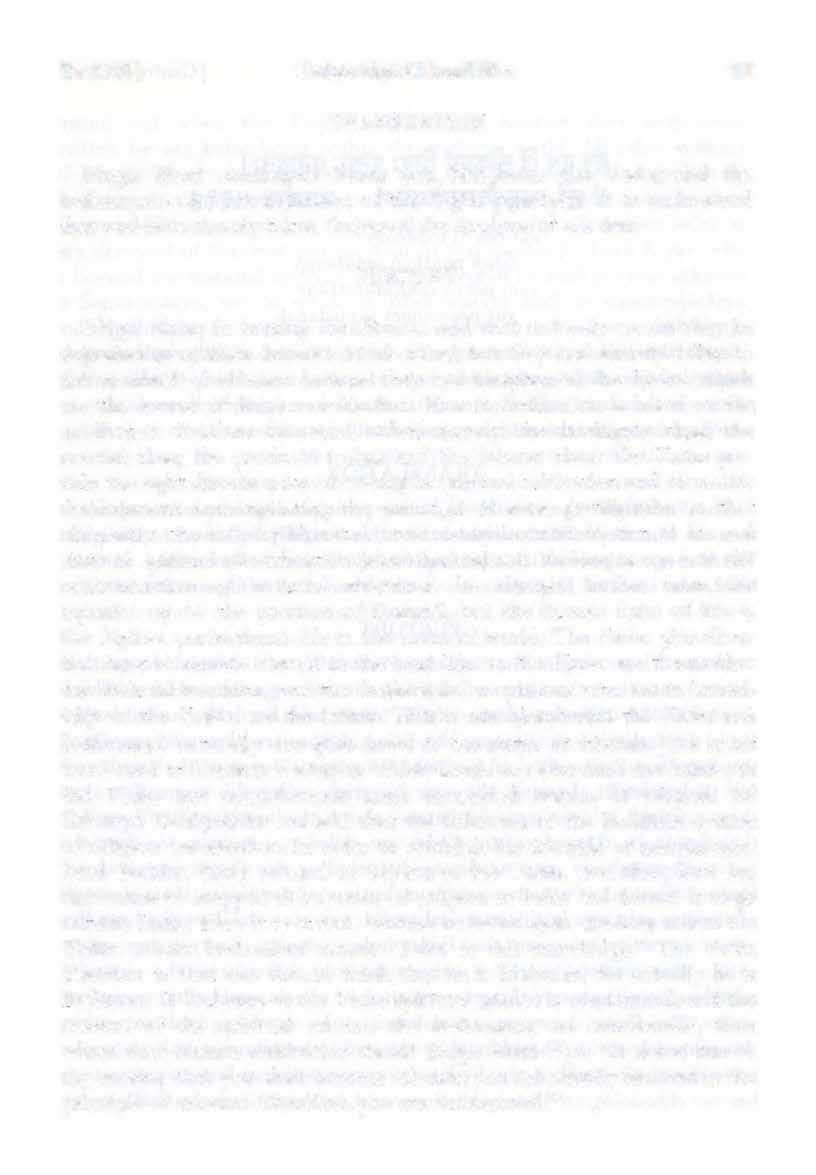
Text 30] Da�a Curses Lord Siva 73 TRANSLATION
�
TEXT 31

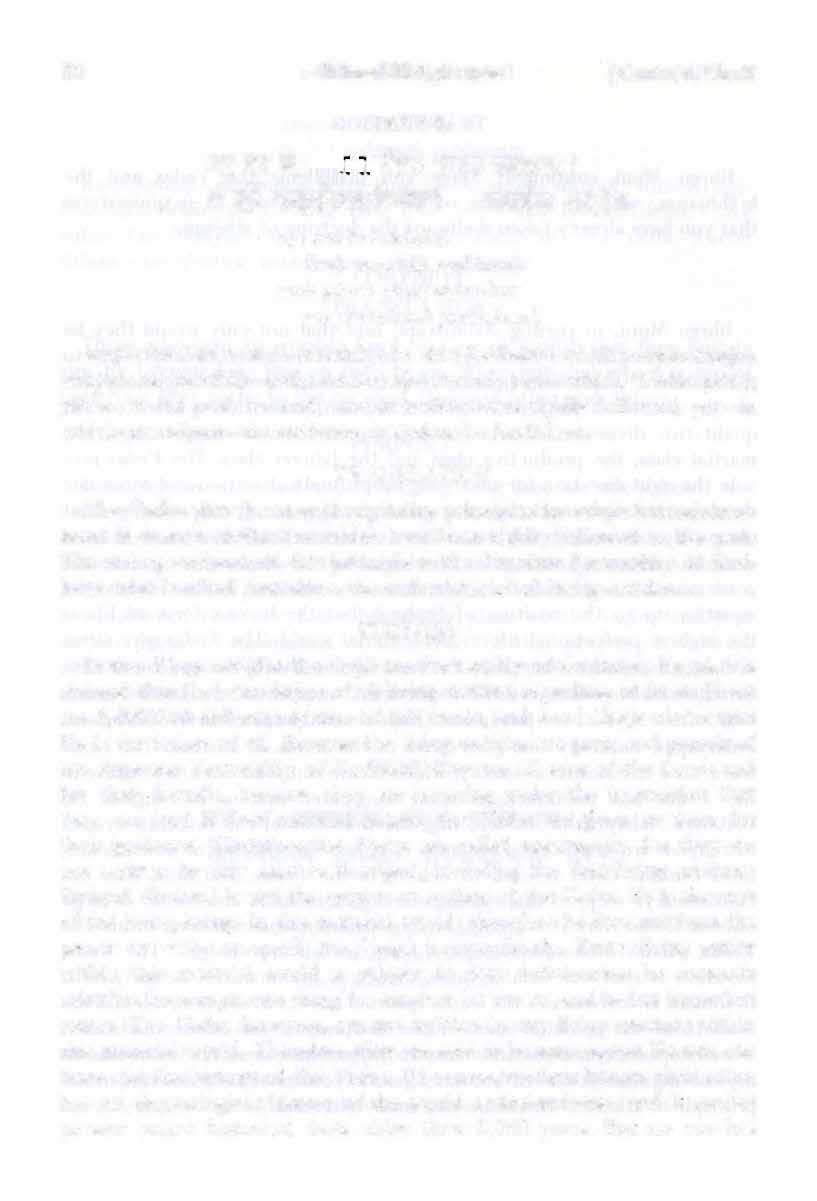
II��II
e§a eva hi lokiiniim siva(�, panthii� saniitana(l yam purve ciinusantasthur yat pramiirwm janiirdana[l
e�a�-the Vedas; eva-certainly ; hi-for; lokiiniim-of all people;Siva[l,auspicious; panthii�-path; saniitana�-eternal; yam-which (Vedic path); purve-in the past; ca-and ; anusantasthu�-was rigidly followed; yat-in which; pmmiirtam-the evidence;janiirdana(l- J anardana.


TRANSLATION
The Vedas give the eternal regulative principles for auspicious advancement in human ,civilization which have been rigidly followed in the past. The strong evidence of this principle is the Supreme Personality of Godhead, who is called Janardana, the well-wisher of all living entities.
PURPORT
In the Bhagavad-gitii the Supreme Personality of Godhead, Kr�f.la, has claimed that He is the father of all living entities, regardless of form. There are 8,400,000 different species of life forms, and Lord Kr�f.la claims that He is the father of all. Because the living entities are parts and parcels of the Supreme Personality of Godhead, they are all sons of the Lord, and for their benefit, because they are hovering under the impression that they can lord it over material nature, the Vedas are ,given to them for their guidance. Therefore the Vedas are called apauru§eya, for they are not written by any man or demigod, including the first living creature, Brahma. Brahma is not the creator or author of the Vedas. He is also one of the living beings in this material world; therefore he does not have the power to write or speak the Vedas independently. Every living entity within this material world is subject to four deficiencies: he commits mistakes, he accepts one thing for another, he cheats, and he has imperfect senses. The Vedas, however, are not written by any living creature within this material world. Therefore they are said to be apauru�eya. No one can trace out the history of the Vedas. Of course, modern human civilization has no chronological history of the world or the universe, and· it cannot present actual historical facts older than 3,000 years. But no one has
74 Srimad-Bhagavatam [Canto 4, Ch. 2
� ft: ftR: �:e;w16;w: 1 � �oqi�<I\!!��SI'llof \il;wl(;t:
traced out when the Vedas were written because they were never written by any living being within this material world. All other systems of knowledge are defective because they have been written or spoken by men or demigods who are products of this material creation, but Bhagavad-gitii is ap auru�eya, for it was not spoken by any human being or any demigod of this material creation; it was spoken by Lord Kr�I,la, who is beyond the material creation. That is accepted by such stalwart scholars as Sailkariidirya, not to speak of other iiciiryas such as Riimanujiicarya and Madhviidirya. Sankariiciirya has accepted that Niiriiyarta and Kr�I,la are transcendental, and in Bhagavad-gitii also Lord Kr�I,la has established, aharh sarvasya prabhavo matta� sarvarh pravartate: "I am the origin of everything; everything has emanated from Me." This material creation, including Brahmii and Siva and all the demigods, has been created by Him, for everything has emanated from Him. He also says that (vedaiS ca sarvair aham eva vedya�) the purpose of all the Vedas is to understand Him. He is the original veda-vit, or knower of Vedanta, and vediinta-krt, or compiler of the Vedas. Brahmii is not the compiler of the Vedas.
In the beginning of Srimad-Bhiigavatam it is established, tene brahma hrdii: the Supreme Absolute Truth, the Personality of Godhead, instructed Brahmii in the Vedic knowledge through his heart. Therefore the evidence that Vedic knowledge is free from the defects of mistakes, illusions, cheating and imperfection is that it is spoken by the Supreme Personality of Godhead Janiirdana and has thus beenfollowed from time immemorial, beginning from Brahmii. The Vedic religion or the principles of the Vedas have been followed by the highly cultured population of India since time immemorial; no one can trace out the history of Vedic religion. Therefore it is saniitana, and any blasphemy against the Vedas is calculated to be atheism. The Vedas are described as setu, which means bridge. If one wants to attain his spiritual existence, one has to cross an ocean of nescience. The Vedas are the bridge to cross such a great ocean. The Vedas describe how to divide the human race into four divisions according to quality and working capacity. This is a very scientific system, and it is also saniitana, for no one can trace out its history, and it has no dissolution. No one can stop the system of varrw and iisrama, or the castes and divisions. For example, whether or not one accepts the name briihmarw, there is a class in society which is known as the intelligent class and which is interested in spiritual understanding and philosophy. Similarly, there is a class of men who are interested in administration and in ruling others. In the Vedic system these martially spirited men are called k§atriyas. Similarly, everywhere there is a class of men who are interested in economic development,

Text 31] Da�a Curses Lord Siva 75
business, industry and moneymaking; they are called vai.Syas. And there is another class who are neither intelligent nor martially spirited nor endowed with the capacity for economic development hut who simply can serve others. They are called sudras, or the laborer class. This system is saniitana-it comes from time immemorial, and it will continue in the same way. There is no power in the world which can stop it. Therefore, since this saniitana-dharma system is eternal, one can elevate himself to the highest standard of spiritual life by following the Vedic principles. It is stated that formerly the sages followed this system; therefore to follow the Vedic system is to follow the standard etiquette of society. But the followers of Lord Siva, who are drunkards, who are addicted to intoxicants and sex life, who do not bathe and who smoke giinjii, are against all human etiquette. The conclusion is that persons who rebel against the Vedic principles are themselves the evidence that the Vedas are authoritative because by not following the Vedic principles they become like animals. Such animalistic persons are themselves evidence of the supremacy of the Vedic regulations.
TEXT 32

tad-brahma paramarh suddharh
satiirh vartma saniitanam
vigarhya yiita pii§a[t�arh
daivarh vo yatra bhuta-riit

tat-that; brahma- Veda; paramam-supreme; suddham-pure; satiimof the saintly persons; vartma-path; saniitanam-eternal; vigarhyahlaspheming; yata- should go; pii�a�;t�am-to atheism; daivam-deity; va�-your; yatra-where ; bhuta-riit-the lord of the bhutas.
TRANSLATION
By blaspheming the principles of the Vedas, which are the pure and supreme path of the saintly persons, certainly you followers of Bht1tapati, Lord Siva, will descend to the standard of atheism without a doub�.
PURPORT
Lord Siva is described here as bhiita-ra.t. The ghosts and those who are situated in the material mode of ignorance are called bhutas, so bhiita-ra,t means the leader of the creatures who are in the lowest
76 Srimad-Bhligavatam [Canto 4, Ch. 2
standard of the material modes of nature. Another meaning of bhuta is anyone who has taken birth or anything which is produced, so in that sense Lord Siva maybe accepted as the father of this material world. Here, of course, Bhrgu Munitakes Lord Siva as the leader ofthe lowest creatures. The characteristics of the lowest class of men have already been described -they do not bathe, they have long hair on their heads, and they are addicted to intoxicants. In comparison to the path followed by the followers of BhutariiL the Vedic system is certainly excellent, for it promotes people to spiritual life as the highest eternal principle of human civilization. If one decries or blasphemes the Vedic principles, then he falls to the standard of atheism.
TEXT 33

maitreya uviica tasyaivarh vadata/:1. saparh bhrgo/:1. sa bhagavan bhava/:1. niscakrama tataJ:! kiiicid vimana iva sanuga/:1.
maitreyaJ:!. uvaca-Maitreya said; tasya-of him; evam-thus; vadataJ;!being spoken; sapam-curse; bhrgo/:1.-of Bhrgu; saJ:!.-he; bhagavan-the possessor of all opulences; bhavaJ:!.-Lord Siva; niScakrama-went; tataJ:!from there; kiiicit-somewhat; vimanaJ:!.-morose; iva-as; sa-anugaJ;!followed by his disciples.
TRANSLATION
The sage Maitreya said: When such cursing and countercursing was going on between his followers and the parties of Dak�a and Bhrgu, Lord Siva became very morose. Not saying anything, he left the arena of the sacrifice, followed by his disciples.
PURPORT
Here Lord Siva's excellent character is described. In spite of the cursing and countercursing between the parties of Dak�a and Siva, because he is the greatest Vai�!lava, he was so sober that he did not say anything. A Vai�!lava is always tolerant, and Lord Siva is considered the
Text 33] Da�a Curses Lord Siva 77
m� ��:��:� � �:I t;.� �: M"FA:+iwtl��: ������
topmost Vai�pava, so his character, as shown in this scene, is excellent. He became morose because he knew that these people, both his men and Dak�a's, were unnecessarily cursing and countercursing one another, without any interest in the spiritual life. From his point of view, he did not see anyone as lower or higher because he is a Vai�pava. As stated in Bhagavad-gitii, par,Pitii[l sama-darsina[l: one who is perfectly learned does not see anyone as lesser or greater because he sees eve one from the spiritual platform. Thus the only ·alternative left to Lord Siva was to leave in order to stop his follower, Nandisvara, as well as Bhrgu Muni, from cursing and countercursing in that way.
TEXT 34


� Fi�: � ec�qf(.Et�(li1
4�\lN���eft:11�\lll
te 'pi visvasrja[l satram sahasra-parivatsariin sarhvidhiiya mahe�viisa yatrejya r�abho hari!t

te-those; api-even; visvasrja[l-progenitors of the universal population; satram-the sacrifice; sahasra-one thousand; parivatsariin-yea rs; sarhvidhiiya-performing; mahe�viisa-0 Vidura; yatra-in which; ijya[l-to be worshiped; r�abha[l-the presiding deity of all demigods; hari[l-Hari.
TRANSLATION
The sage Maitreya continued: 0 Vidura, all the progenitors of the universal population thus executed a sacrifice for thousands of years, for sacrifice is the best way to worship the Supreme Lord, Hari, the Personality of Godhead.
PURPORT
It is clearly stated here that the stalwart personalities who generate the entire population of the world are interested in satisfying the Supreme Personality of Godhead by offering sacrifices. The Lord also says in Bhagavad-gitii, bhoktiiram yajiia-tapasam. One may engage in performing sacrifices and severe austerities for perfection, but they are all meant to satisfy the Supreme Lord. If such activities are performed for personal satisfaction, that is called pii§ap.Q.a, or atheism; but when they are performed for the satisfaction of the Supreme Lord, that iii the Vedic
78 Srimad-Bhagavatam [Canto 4, Ch. 2
principle. All the assembled sages performed sacrifices for one thousand years.
aplutyiivabhrtharh yatra
ganga yamunayanvitii
virajeniitmana sarve
svarh svarh dhama yayus tata�
aplutya-taking a bath;avabhrtham-the bath which is taken after performing sacrifices;yatra-where;ganga-the River Ganges;yamunaya-by the River Yamuna;anvitii-mixed;virajena-without infection;iitmanii-by the mind;sarve-ail;svam svam-their respective;dhama-abodes;yayu�went;tata�-from there.
TRANSLATION

My dear Vidura, carrier of bows and arrows, all the demigods who were performing the sacrifice tooktheir bath at the confluence of the Ganges and the Yamuna after completing the yajiia performance. Such a bath is called avabhrtha-snana. Thus becoming purified in heart, they departed for their respective abodes.
PURPORT
After Lord Siva and, previously, Dak�a, left the arena of sacrifice, the sacrifice was not stopped; the sages went on for many years in order to satisfy the Supreme Lord. The sacrifice was not destroyed for want of Siva and Dak�, and the sages went on with their activities. In other words, it may be assumed that if one does not worship the demigods, even up to Lord Siva and Brahma, one can nevertheless satisfy the Supreme Personality of Godhead. This is also confirmed in Bhagavad-gitii
Kiimais tais tair hrta-jiiiinii� prapadyante'nya-devatii�. Persons who are impelled by lust and desire go to the demigods to derive some m�terial benefit. Bhagavad-gitii uses the very specific words niisti buddh�, meaning persons who have losttheir sense or intelligence. Onlysuch persons carefor demigods and want to derive material benefit from them. Of course, this does notmean that one should not showrespect tothe demigods, butthere is no need to worship them. One who is honest may be faithful to the government, but he does �ot need to bribe the government servants. Bribery is illegal; one does not bribe a government servant, but that does

Text 35] Dalqa Curses Lord Siva 79
not mean that he does not show him respect. Similarly, one who engages in the transcendental loving serVice of the Supreme Lord does not need to worship any demigod, nor does he have any tendency to show disrespect to the demigods. Elsewhere in Bhagavad-gitii it is stated, ye'py anyadevatii-bhaktii yajante sraddhayiinvitiilz. The Lord says that anyone who worships the demigods is also worshiping Him, but he is worshiping avidhi-piirvakam, which means without following the regulative principles. The regulative principle isto worshipthe Supreme Personalityof Godhead. Worship of demigods may indirectly be worship of the Personality of Godhead, but it is not regulated. By worshiping the Supreme Lord, one automatically serves all the demigods because they are parts and parcels of the whole. If one supplies water to the root of a tree, all the parts of the tree, such asthe leaves and branches, are automatically satisfied, and if one supplies food to the stomach, all the limbs of the body-the hands, legs, fingers, etc.-are nourished. Thus by worshiping the Supreme Personality of Godhead one can satisfy all the demigods, but by worshiping all the demigods one does not completely worship the Supreme Lord. Therefore worship of the demigods is irregular, and it is disrespectful to the scriptural injunctions. ·
In this age of Kali it is practically impossible to perform the deva-yajna or sacrifices to the demigods. As such, in this age Srimad-Bhiigavatam recommends sank'irtana-yajiia. Yajiiailz sankirtana-priiyair y(ljanti hi sumedhasalz. (Bhiig. 11.5.32) "In this age the intelligent person completes the performances of all kinds of yajnas simply by chanting Hare Kr�Q.a, Hare Kr�Q.a, Kr�t;�a Kr�t;�a, Hare Hare I Hare Rama, Hare Rama, Rama Rama, Hare Hare." 1'asmin tu�te jagat-tu�ta�: "When Lord Vi�Q.U is satisfied, all the demigods who are part and parcels of the Supreme Lord are satisfied."
Thus end the Bhaktivedanta purports of the Fourth Canto, Second Chapter, of the Srimad-Bhagavatam, entitled, "Dak§a Curses Lord Siva."

80 Srimad-Bhagavatam [Canto 4, Ch. 2
CHAPTER THREE
TalksBetween Lord Sivaandsati
TEXT I
maitreya uvaca sada vidvi�ator evam kalo vai dhriyamiir-ayo� jiimiitu� svasurasyiipi su-mahiin aticakrame
maitreya� uviica-Maitreya said; sadii-constantly; vidv�ato�-the tension; evam-in this manner; kala�-time; vai-certainly ; dhriyamiirtayo�continued to bear;jiimiitu�-of the son-in-law;sva8urasya-of the father-inlaw; api-even; su-mahiin-a very great;aticakrame-passed.
TRANSLATION
Maitreya continued: In this manner the tension between the father·inlaw and son-in-law, Da�a and Lord Siva, continued for a considerably long period.
PURPORT
The previous chapter has already explained that Vidura questioned the sage Maitreya as to the cause of the misunderstanding between Lord Siva and Dak�a. Another question is why the strife between Dak�a and his sonin-law caused Satito destroy her body. The chief reason for Satfs giving up her body was that her father, Dak�a, began another sacrificial performance to which Lord Siva was not invited at all. Generally, when any sacrifice
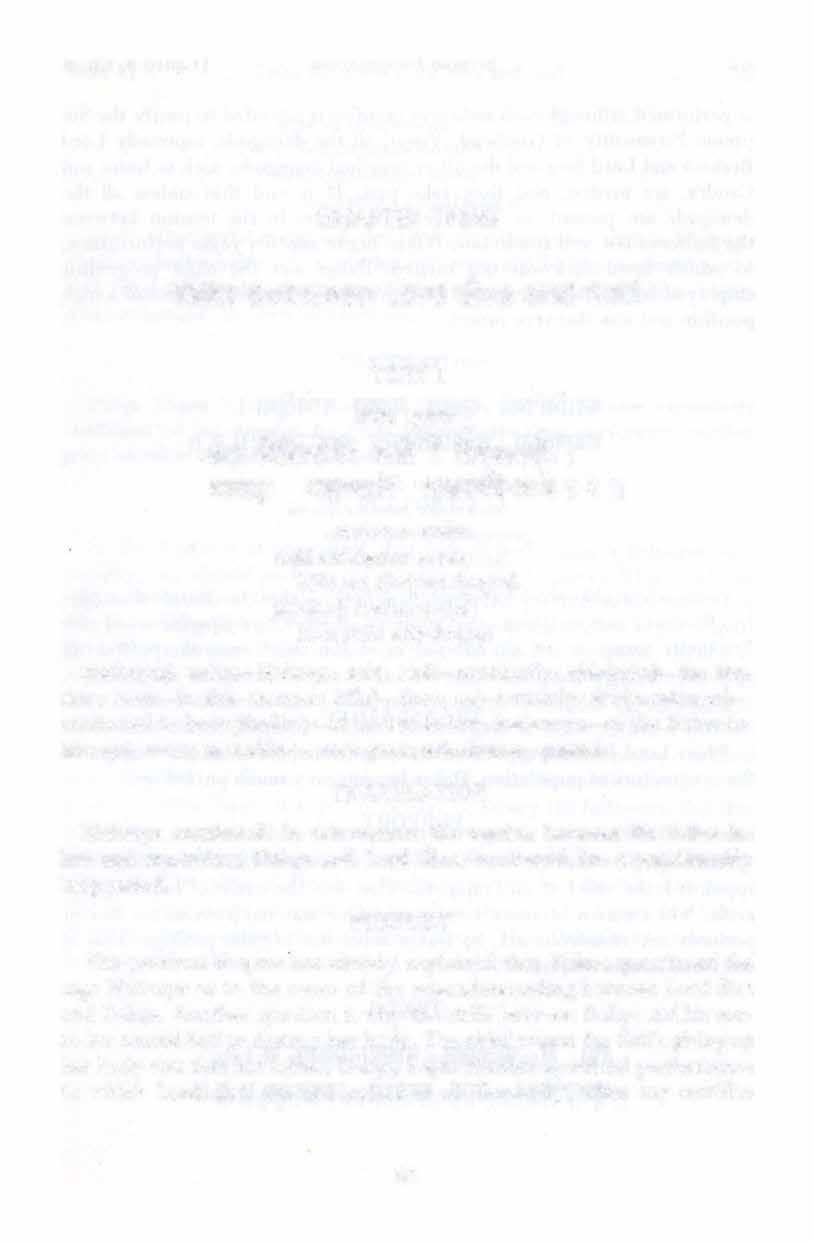
�"' ��
filft'lffl�i �� fa�¥UUI�: I
"'m�•fit Wi«twwR\:q•�u � 11
�
�:
81
is performed,although each and every sacrifice is intended to pacify the Supreme Personality of Godhead, Vi�r:tu, all the demigods, especially Lord Brahma and Lord Siva and the other principal demigods, such as Indra and Candra, are invited, and they take part. It is said that unless all the demigods are present, no sacrifice is complete. In the tension between the father-in-law and son-in-law, Dak�a began �mother yajfia performance, to- which Lord Siva was not invited. Dak�a was the chief progenitor employed by Lord Brahma, and he was a son of Brahma, so he had a high position and was also very proud.
TEXT 2
yadabhi§ikto dak§as tu brahmal)a parame§thina prajapatinam sarve�am adhipatye smayo 'bhavat

yada-when; abhi�ikta�-appointed; dak�a�-Dak�a; tu-but; brahmal)aby Brahma; parame§{hina-the supreme teacher; prajapafinam-of the Prajiipatis; sarve�am-of all; adhipatye-as the chief; smaya�-puffed up; abhavat- he became.
TRANSLATION
When Lord Brahma appointed Dak�a as the chief of all the Prajapatis, the progenitors of population, Dak�a became very much puffed up.
PURPORT
Although he was envious and was inimical towards Lord Siva, Dak�a was appointed the chief of all Prajiipatis. That was the cause of his excessive pride. When a man becomes too proud of his material possessions, he can perform any disastrous act, so Dak�a acted out of false prestige. That is described in this chapter.
82 Srirnad-Bhagavatarn [Canto 4, Ch. 3
�� � ;mun �;n I �mfl;U �� ��II�II
q� � ��� iffm� :q 1 "'�kt(1� ;:mt � 4�*1+4'(II� II
TEXT3
4tvii sa viijapeyena
brahmi§thiin abhibhiiya ca brhaspati-savarh niima samiirebhe kratiittamam

i§tvii-after performing; sa�-he (Dak�a); viijapeyena-with a Vajapeya sacrifice; brahmi§thiin- Siva and his followers; abhibh iiya- neglecting; caand; brhaspati-savam- the Brhaspati-sava; niima- called; samiirebhe- began; kratu-uttamam-the best of sacrifices.
TRANSLATION
Daktja began a sacrifice named Vajapeya, and he became excessively confident of his support by Lord Brahma. He then performed another great sacrifice named Brhaspati-sava.
PURPORT
In the Vedas it is prescribed that before performing a Brhaspati-sava sacrifice, one should perform the sacrifice named Vajapeya.While performing these sacrifices, however, Dak�a neglected great devotees like Lord Siva. According to Vedic scriptures, the demigods are eligible to participate in yajiias and share the oblations, but he wanted to avoid them. All sacrifices are intended to pacify Lord Vi�I)U, but Lord Vi�I)U includes all His devotees. Brahma, Lord Siva and the other demigods are all obedient servants of Lord Vi�I)U; therefore Lord Vi�I)U is never satisfied without them. But Dak�a, being puffed up with his power, wanted to deprive Lord Brahma and Lord Siva of participation in the sacrifice, understanding that if one satisfies Vi�I)U, it is not necessary to satisfy His followers. But that is not the process. Vi�I)U wants His followers to be satisfied first. Lord Kmw says, mad-bhakta-piijiibhyadhikii: "The worship of My devotees is better than worship of Myself." Similarly, in the Siva Purur:ta, it is stated that the best mode of worship is to offer oblations to Vi�I)U, but better than that is to worship the devotees of Kr�l)a. Thus Dak�a's determination to neglect Lord Siva in the sacrifices was not fitting.
Text41 Talks Between LordSiva andSati
83
TEXT4 � -: � �ctrffqi�!!Hm I <:' 3ft�1)6(4��--,(ij�q����:It\lIt
tasmin brahmar�aya� sarve devar§i-pitr-devatii�

iisan krta-svasty-ayaniis
tat-patnyas ca sa-bhartrkii�
tasmin-in that (sacrifice); br.ahmar�aya�-the brahmar�is; sarve-all; devar�i- the devar�is; pitr- ancestors; devatii�- demigods; iisan- were; krtasvasti-ayanii�- were very nicely decorated with ornaments; tat-patnya�their wives; ca-and; sa-bhartrkii�- along with their husbands.
TRANSLATION
While the sacrifice was being performed, many brahmar�is, great sages, ancestral demigods and other demigods, their wives all very nicely decorated with ornaments, attended from different parts of the universe.
PURPORT
In any auspicious ceremony, such as a marriage ceremony, sacrificial ceremonyorpujii ceremony,it isauspicious for married womentodecorate themselves very nicely with ornaments, fine clothing and cosmetics. These are auspicious signs, and many heavenly women assembled with their husbands, the devar�is, demigods and riijar�is, in that great sacrifice named Brhaspati-sava. It is specifically mentioned in this verse that they approached with their husbands, for when a woman is decorated nicely, her husband becomes more cheerful. Thenicedecorations, ornaments anddress of the wives of the demigods and sages and the cheerfulness of the demigods and sages themselves were all-auspicious signs for the ceremony.
TEXTS 5-7 �
qt��:l
tad upasrutya nabhasi khecariirtiirh prajalpatiim sati diik�iiyarzi devi
pitr-yajiia-mahotsavam
84
Srimad-Bhigavatarn
[Canto 4, Ch. 3
�·�HiUii SNii!'1ij1� I
�T
�
m
� ftr��+tilffli:i� II'-\ II
�;:ffl': � � 3q�CICI(�tt: I
�+ti�tll�l!�f.ft�:ijCII('t('t:ll � II
qfij' �qm �l-�ia>+� II \9 II
Texts 5-7]
Talks Between Lord Siva and Sati
vrajantil;t sarvato digbhya
upadeva-vara-striya/:l
vimiina-yiiniib sa-pre�thii
ni�ka-kar-thi/:t su-viisasaJ:t
dr�tvii sva-nilayiibhyiise loliik�ir mr§ta-kur-�aliiJ:t patim bhiita-patim devam
autsukyiid abhyabhii§ata

tat-then; upa.�ru tya-hearing;nabhasi-inthe sky; khec ariirttim-of those who werefly ing in the air (the Gandharvas); prajalpatiim-the conversation; sati-Sati; diik§iiyar- i-the daughter of Dak�a; devi-the wife of Siva; pitryajfia-mahotsavam-the great festival of sacrifice performed by her father; vrajantift -were going; sarvata/:l-from all; digb hya/:l - directions; upadevavara-striya/:l-the beautiful wives of the demigods; vimiina-yiinii�-flying in their airplanes; sa-p re . sthii/:l-along with their husbands; nifika-ka[tJhi/:lhaving nice necklaces with lockets; su-viisasa�-dressed in fine clothing; drfltrxi-seeing; sva-nilaya-abhyase-near her residence; Lo la-ak�i�-having beautiful glittering eyes; mr�ta-ku [!�alti�-nice earrings; pat im- her husband; bhiita-patim-the master of the bhutas; devam-the demigod; autsukyiit-from great anxiety; abhyabhiifiata-she spoke.
TRANSLATION
The chaste lady Sati, the daughter of Da�a, heard the heavenly denizens flying in the sky conversing about the great sacrifice being performed by her father. When she saw that from all directions the beautiful wives of the heavenly denizens, their eyes very beautifully glittering, were near her residence and were going to the sacrifice dressed in fine clothing and ornamented with earrings and necklaces with lockets, she approached her husband, the master of the bhiitas, in great anxiety, and spoke as follows.
PURPORT
It appears that the residence of Lord Siva was not on this planet but was somewhere in outer space, otherwise how could Sati see the airplanes coming from different directions towards this planet and hear the passengers talking about the great sacrifice being performed by Dak�a? Sati is described here as Dak�ayapi because she was the daughter of Dak�a. The mention of upadeva-vara refers to inferior demigods like the Gandharvas, Kinnaras and Uragas, who are not exactly demigods but are between the demigods and the human beings. They were also coming in planes. The
85
word sva-nilayiibhyiise indicates that they were passing right near her residential quarters. The dresses and bodily features of the wives of the heavenly denizens are very nicely described here. Their eyes moved;their earrings and other ornaments glittered and glared, their dresses were the nicest possible, and all of them had special lockets on their necklaces. Each woman was accompanied by her husband. Thus they looked so beautiful that Sati, Dak�ayapi, was impelled to dress similarly and go to the sacrifice with her husband. That is the natural inclination of a woman.
TEXTS
'Eicg;<=n:a
saty uviica prajiipates te svasurasya siirnpratam niryiipito yajtia-rnahotsavall kila vayarh ca tatriibhisariima viima te yady arthitiirni vibudhii vrajanti hi sati uviica-Sati said; prajiipate�-of Dak�a; te-your ; svasuras ya-ofyour father-in-law; siimpratam-nowadays; niryiipitaft-has been started; yajiiamahotsavaft-a great sacrifice; kila-certainly; vaya�-we; ca-and; tatrathere;abhisariima-may go; viima-0 my dear LordSiva; te-your; yadi-if ; arthitii-desire; ami-these; vibudhiift-demigods; vrajanti-a re going; hibecause.
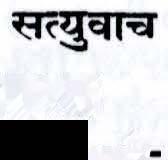

TRANSLATION
Sati said: My dear Lord Siva, your father-in-lawisnow executing great sacrifices, and all the demigods, having been invited by him, are going there. If you desire, we may also go.
PURPORT
Sati knew of the tension between her father and her husband, but still she expressed to her husband, Lord Siva, that since such sacrifices were going on at her father's house and somany demigods were going, she also desired to go. But she could not express her willingness directly, and so
86 Srimad-Bhagavatam [Canto 4, Ch. 3
�� � � Fr:rttqm ��'i��w-t: � 1 ���qll{�
f?r�
��1100
1(��� II � II
she told her husband that if he desired to go, then she could also accompany him. In other words, she submitted her desire very politely to her husband.
TEXT9

tasmin bhaginyo mama bhartrbhi� svakair dhruvmh gami§yanti suhrd-didrk§ava�t aham ca tasmin bhavatiibhikiimaye sahopanitarn paribarham arhitum
tasmin-in that sacrifice; bhaginya�-sisters; mama-my; bhartrbh*with their husbands;svaka*-their own;dhruvam-surely;gami�yanti-will go; suhrt-didrk:�ava�-desiring to meet the relatives; aham-1; ca-and ; tasmin-in that assembly; bhavatii-with you (Lord Siva); abhikiimaye-1 desire;saha- with; upanitam-given;paribarham-ornaments of decoration; arhitum-to accept.
TRANSLATION
I think that all my sisters must have gone to this great sacrificial ceremony with their husbands just to see their relatives. I also desire to decorate myself with the ornaments given to me by my father and go there with you to participate in that assembly.
PURPORT
It is a woman's nature to want to decorate herself with ornaments and nice dresses and accompany her husband to social functions, meet friends and relatives and enjoy life in that way. This propensity is not unusual because woman is the basic principle of material enjoyment. Therefore in Sanskrit the word for woman is stri, which means one who expands the field of material enjoyment. In the material world there is an attraction between woman and man. This is the arrangement of conditional life. A woman attracts a man, and in that way the scope of material activities, involving house, wealth, children and friendship, increases, and thus instead of decreasing one's material demands, one becomes entangled in
Text9] Talks Between Lord Siva and Sati 87
����:�-
�(tf(UR:
3T{ � ��� m)q;fuf qRif��dl(
Wi •tfitGttf�
I
II �II
material enjoyment. Lord Siva, however, is different; therefore his name is Siva. He is not atall attracted by material enjoyment, although his wife, Sati, was the daughter of a very great leader and was given to him by the request of Brahma. Lord Siva was reluctant, but Sati, as a woman, the daughter of a king, wanted enjoyment. She wanted to go to her father's house, just as her other sisters might have done, andmeetthem andenjoy social life. Here, she specifically indicated that she would decorate herself with the ornaments given by her father. She did not say that she would decorate herself with the ornaments given by her husband because her husband was callous about all such matters. He did not know how to decorate his wife and take part in social life because he was always in ecstasy with thoughts ofthe Supreme Personality ofGodhead. According to the Vedic system, a daughter is given a sufficient dowry at the time of her marriage, so Sati was also given a dowry by her father, and ornaments were included.It isalsothe customthatthehusband gives someornaments, but here it is particularly mentioned that her husband, being materially almost nothing, could not do so;therefore shewanted to decorate herself with the ornaments given by her father. It was fortunate for Sati that Lord Siva did not take the ornaments from his wife and spend them for giiiijii because those who imitate Lord Siva in smoking giiiijii exploit everything from household affairs; they take all of their wives' property and spend onsmoking, intoxication and similar otheractivities.
TEXT 10
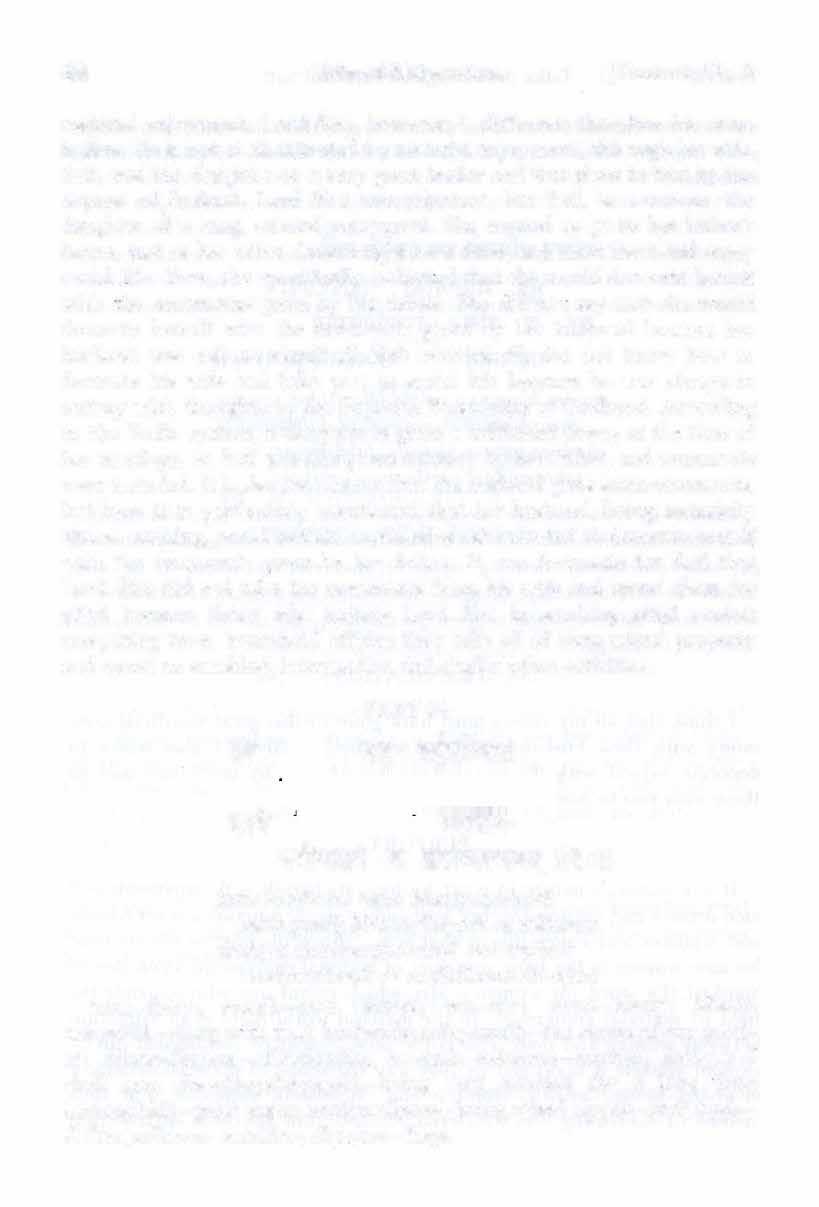
1t�:��:q�l
tatrasvas[r me nanu bhartr-sammitii miitr-�vasr� klinna-dhiyam ca miitaram
drak�ye cirotkar-tha-manii mahar§ibhir unniyamiinam ca mnliidhvara-dhvajam
tatra-there; svasf[l-own sisters; me-my; nanu-surely; bhartrsammital].-along with their husbands;matr-svasfl].-the sisters of my mother; klinna-dhiyam-affectionate; ca-and; mataram-mother; drak§ye-I shall see; cira-utkarztha-manii�-being very anxious for a long time; ma�ar�ibhi�-great sages; unnl"yamanam-being raised up; ca-and; mrcJa0 Siva;adhvara-sacrifice;dhvajam-flags.



88 Srimad-Bhagavatam [Canto 4, Ch. 3
vr � ��
� �-
���1{
�'ifttt1tl4 :q
II� oil
My sisters, the sisters of my mother and their husbands and other affectionate relatives must be assembled there, so if I go I shall be able to see them, and I shall be able to see the flapping flags and the performance of the sacrifice by the great sages. For these reasons, my dear husband, I am very much anxious to go.
PURPORT
As stated before, the tension between the father-in-law and son-in-law persisted for a considerable time. So Sati had not gone to her father'shouse for a long while. Thus she was very anxious to go to her father's house, particularly because on that occasion her sisters and their husbands and her mother's sisters would be there. As is natural for a woman, she wanted to dress equally to her other sisters and also be accompanied by her husband. She did not, of course, want to go alone.
TEXT 11


tvayy etad iiscaryam ajiitma-miiyayii
vinirmitarh bhiiti gutta-trayiitmakam
tathiipy aharh yo§id atattva-vic ca te dina didrk§e bhava me bhava-k�itim

tvayi-in you; etat-this; iiscaryam-wonderful; aja-0 Lord Siva; iitmamiiyayii-by the external energy of the Supreme Lord; vinirmitamcreated; bhii.ti-appears; gu{la-traya-iitmakam-being an interaction of the three modes of material. nature; tathiipi-even so; aham-l;yo�it-woman; atattva-vit-not conversant with the truth; ca-and; te-your; dinii-poor; didrk�e-l wish to see; bhava-0 Lord Siva; me-my; bhava-k�itim-place of birth.

TRANSLATION
Although this cosmic manifestation is a wonderful creation of the interaction of the three material modes, or the external energy of the Supreme Lord, the truth is fully known to you. Yet I am a poor woman, and, as
Text ll] Talks Between Lord Siva and Sati 89
TRANSLATION
��������'4¥41��· �Mf4� � ����I ijlfl� ij'
���II��II
� � +1t1
you know, I am not conversant with the truth. Therefore I wish to see my birthplace once more.
PURPORT
Dak�ayapi, Sati, knew very well that her husband, Lord Siva, was not very much interested in the glaring manifestation of the material world, whichis caused by the interaction of the three modes of nature. Therefore she addressed her husband as aja, one who has transcended the bondage of birth anddeath, or onewho has realized his eternalposition.She stated, "The illusion of accepting the perverted reflection,the material or cosmic manifestation, to be real is not present in you because you are selfrealized. For you the attraction of social life and the consideration that someone is father, someone is mother and someone is sister, which are illusory relationships, i� already over, but because I am a poor woman I am not so advanced in transcendental realization. Therefore naturally these appear to me as real." Only less intelligent persons accept this perverted reflection of the spiritual world to be real. Those who are under the spell of the external energy accept this manifestation to be fact, whereas those who are advanced in spiritual realization know that it is illusion. Actual reality is elsewhere, in the spiritual world. "But as far as I am concerned," Sati said, "I do not have much knowledge about selfrealization. I am poor because I do not know the actual facts. I am attracted by my birthplace, and I want to see it." One who has attraction for his birthplace, for his body, and for other such iterns mentioned inthe Bhiigavatam is considered to be like an ass or a cow. Satimight have heard all this many times from her husband, Lord Siva, but because she was a woman,yo,:Sit, shestillhankeredafterthesamematerial objects of affection The wordyo,:Sil means "one who is enjoyed." Therefore woman is called yo,:Sit. In spiritual advancement, association with yo,:Sit is always restricted because if one is like a play doll in the hands of yo.sit, then all his spiritual advancement is at once stopped. It is said, "Those who are just Like playthings in the hands of a woman cannot make any advancement in spiritual realization."

90 Srimad-Bhagavatam [Canto 4, Ch. 3
TEXT 12 qw Sltll�(�:f41�ttl�ijls��:���:t � ��:fu�1ff� ;00 �: ifi�(eqt�flt: II��II
pasya prayiintir abhaviinya-yo�ito 'py alankrtii� kiinta-sakhii variithasa�
yiisiim vrajadbh* siti-ka[�tha ma[lt)itam nabho vimiinai� kala-hamsa-pii[�t)ubhi�
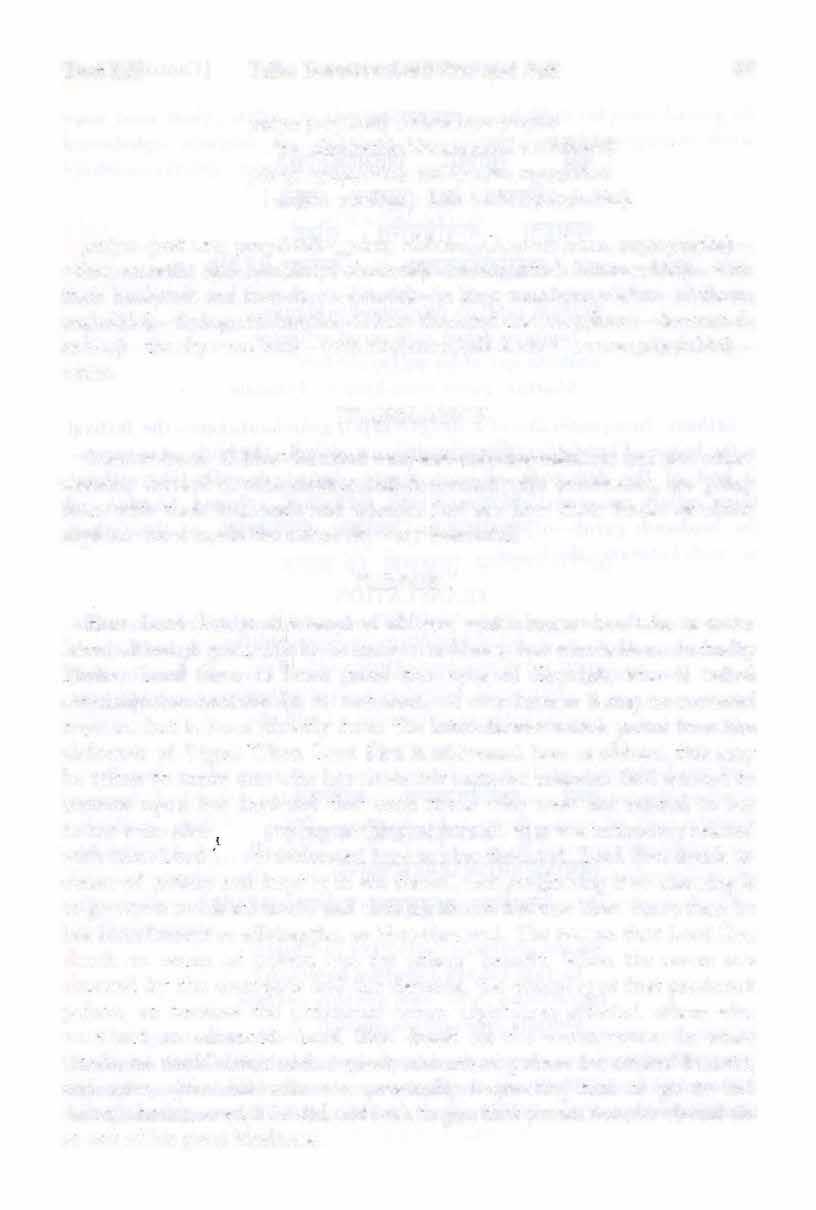
pasya-just see; prayiinti{t -going; abhava-0 never-horn; anya-yo§itaflother women; api-certainly; alankrtiiQ- ornamented; kiinta-sakhii�- with their husbands and friends;variithaSaQ-in large numbers;yiisiim-of them; vrajadbhiQ- flying; siti-ka!ltha- 0 blue-throatedone;ma[lt)itam- decorated; nabha�- the sky; vimiina*- with airplanes;kala-hamsa-swans;pii[lt)ubhiQwhite.
TRANSLATION

0 never-born, 0 blue-throated one, not only my relatives hut also other women, dressed in nice clothes and decorated with ornaments, are going there with their husbands and friends. Just see how their flocks of white airplanes have made the entire sky very heautifuJ.
PURPORT
Here Lord Siva is addressed as abhava, which means one who is never born, although generally he is known as bhava, one who is horn. Actually Rudra, Lord Siva, is horn from the eyes of Brahma, who is called sviiyambhuva because he is not born of any human being or material creature but is born directly from the lotus flower which grows from the abdomen of Vi�pu. When Lord Siva is addressed here as abhava, this may be taken to mean one who has never felt material miseries. Safi wanted to impress upon her husband that even those who were not related to her father were also oing, to say nothing of herself, who wasintimatelyrelated with him. Lord Siva is addressed here as blue-throated. Lord Siva drank an ocean of poison and kept it in his throat, not swallowing it or allowing it to go down to his stomach, and thus his throat became blue. Since then he has been known as nilaka!ltha, or blue-throated. The reason that Lord Siva drank an ocean of poison was for others' benefit. When the ocean was churned by the demigods and the demons, the churning at first produced poison, so because the poisonous ocean might have affected others who were not so advanced, Lord Siva drank all the ocean water. In other words, he could drink such a great amount- of poison for others' benefit, and now, since his wife was personally requesting him to go to her father's house, even if he did notwishto give that permission, he should do so out of his great kindness.

Text 12] Talks Between
Lord Siva and Sati
91
TEXT 13
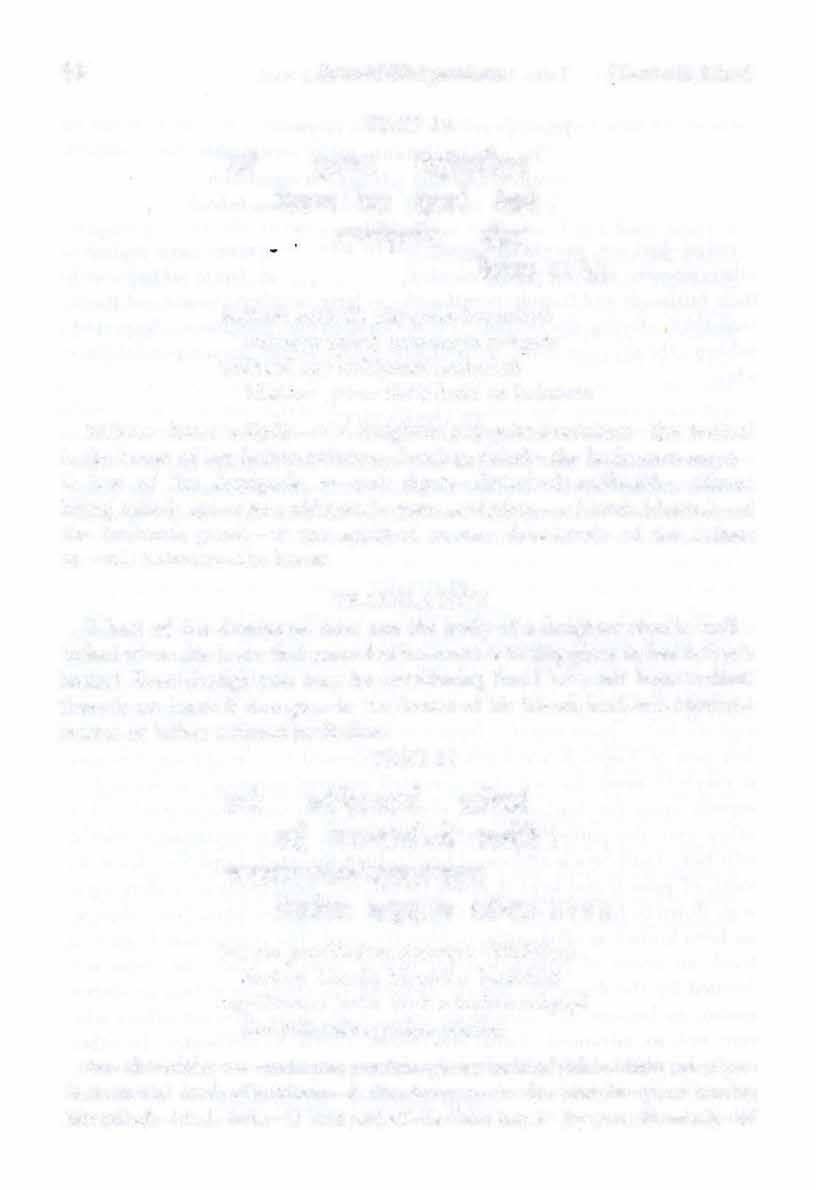
atc�flt�f.ijo � �����II
katharh sutiiyii� pitr-geha-kautukarh
nisamya deha� sura-varya nengate aniihutii apy abhiyanti sauhrdarh
bharlltr guror deha-krtas ca ketanam
katham-how; sutiiyii�-of a daughter;pitr-geha-kautukam-the festival in the house of her father;nisamya-hearing;deha�-the body;sura-varya0 best of the demigods; na-not; ingate-disturbed; aniihutii�-without being called; api- ev en; abhiyanti-goes; sauhrdam-a friend;bhartu�-of the husband; guro�-of the spiritual master; deha-krta�-of the father; ca-and;ketanam-the house.

TRANSLATION
0 best of the demigods, how can the body of a daughter remain undisturbed when she hears that some festive event is taking place in her father's house? Even though you may be considering that I have not been invited, there is no harm if one goes to the house of his friend, husband, spiritual master or father without invitation.
TEXT 14 R
SHft«+t+t€4 �ltsmf
�ij ll��IJlit 'RiltRrI
�s�;ft�Si{+{i(R��
M�{q(t( +413•l(IUI �:;rn: II�'JII
tan me prasidedam amartya viinchitarh karturh bhaviin kiiru[Liko batiirhati
tvayiitmarw 'rdhe 'ham adabhra-cak§U§ii nirupitii miinugrhii[la yiicita�
tat-therefore;me-unto me; prasida-please be kind;idam-this;amartya0 immortal lord; viinchitam-desire;kartum-to do;bhaviin-your honor; kiiru[!ika�-kind;bata-O lord;arhati-is able;tvayii-by you;iitmana�-of

92 Srimad-Bhigavatam
� WfN(: f\lq:i\�trt ��:��I
l Canto 4, Ch. 3
your own body; ardhe-in the half; aham-I; adabhra-cak � u�ii- having all knowledge; nirupitii-am situated; mii-to me; anugrha(w-please show kindness; yacita�-requested.
TRANSLATION
0 immortal Siva, please be kind towards me andfulfillmydesire. You have accepted me as half of your body; therefore please show kindness towardsmeandacceptmyrequest.
TEXT 15
� � ft��f �: ''�'"'"
ntr uvaca evam giritra�l priyayabhibha�ita[l pratyabhyadhatta prahasan suhrt-priya� samsmiirito marma-bhida� kuviig�un yan aha ko visva-srfiim samak�ata/:t
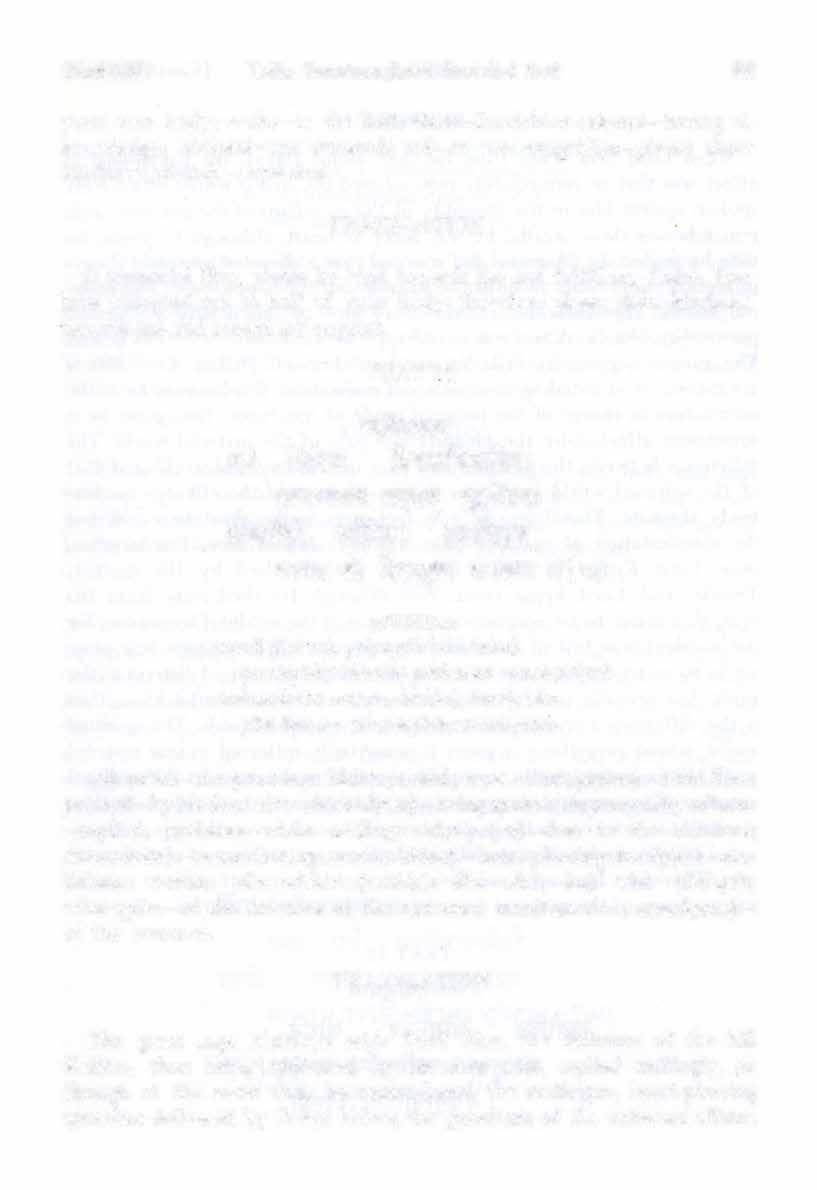
!§* uviica-the great sage Maitreya said;evam-thus;giritraft- Lord Siva; priyaya-by his dear wife; abhibha§itaft- being spoken to; pratyabhyadhatta -replied; prahasan-while smiling ; suhrt-priya�-dear to the relatives; samsmiirita�-remembering; marma-bhida�- heart-piercing ; kuviigi§iin-malicious words; yiin-which (words); aha-said; ka�-who (Dak�a); vi.Sva-srjam-of the creators of the universal manifestation; samak�ataftin the presence.
TRANSLATION
The great sage Maitreya said: Lord Siva, the deliverer of the hill Kailasa, thus being addressed by his dear wife, replied smilingly, although at the same time he remembered the malicious, heart-piercing speeches delivered by Dalq!a before the guardians of the universalaffairs.
Tex t l5 ) Talks Between LordSivaandSati 93
��
��Tmfl ��: ��
'Sfl�ijqj"i
fttf�: fitttttlr¥Pltffif: � � �ttRsttt: I
PURPORT

Wten Lord Siva heard from his wife about Dak�a, the psychological effect was that he immediately remembered the strong words which were spoken against him in the assembly of the guardians of the universe, and, remembering those words, he was sorry at heart, although to please his wife he smiled. In Bhagavad-gitii it is said that a liberated person is always in mental equilibrium in both the distress and the happiness of this material world. Therefore the question may now be raised why a liberated personality Like Lord Siva was so unhappy because of the words of Dak�a. The answer is given by Srila Visvanatha Cakravarti Thakur. Lord Siva is iitmiiriima, or situated in complete self-realization, but because he is the incarnation in charge of the material mode of ignorance, tamogu[ta, he is sometimes affected by the pleasure and pain of the material world. The difference between the pleasure and pain of this material world and that of the spiritual world is that in the spiritual world the effect is qualitatively absolute. Therefore one may feel sorry in the absolute world, but the manifestation of so-called pain is always full of bliss. For instance, once Lord �f.la, in His childhood, was chastised by His mother, Ya8odii, and Lord Kr�f.la cried. But although He shed tears from His eyes, this is not to be considered a reaction of the mode of ignorance, for the incident was full of transc;endental pleasure. When Kr�f.la was playing in so many ways, sometimes it appeared that Hecaused distress to the gopis, but actually such dealings were full of transcendental bliss. That is the difference between the material and spiritual worlds. The spiritual world, where everything is pure, is pervertedly reflected in this material world. Since everything in the spiritual world is absolute, in the spiritual varieties of apparent pleasure and pain there is no other perception than eternal bliss, whereas in the material world, because everything is contaminated by the modes of material nature, there are feelings of pleasure and pain. Therefore because Lord Siva, although a fully self-realized person, was in charge of the material mode of ignorance, he felt sorrow.
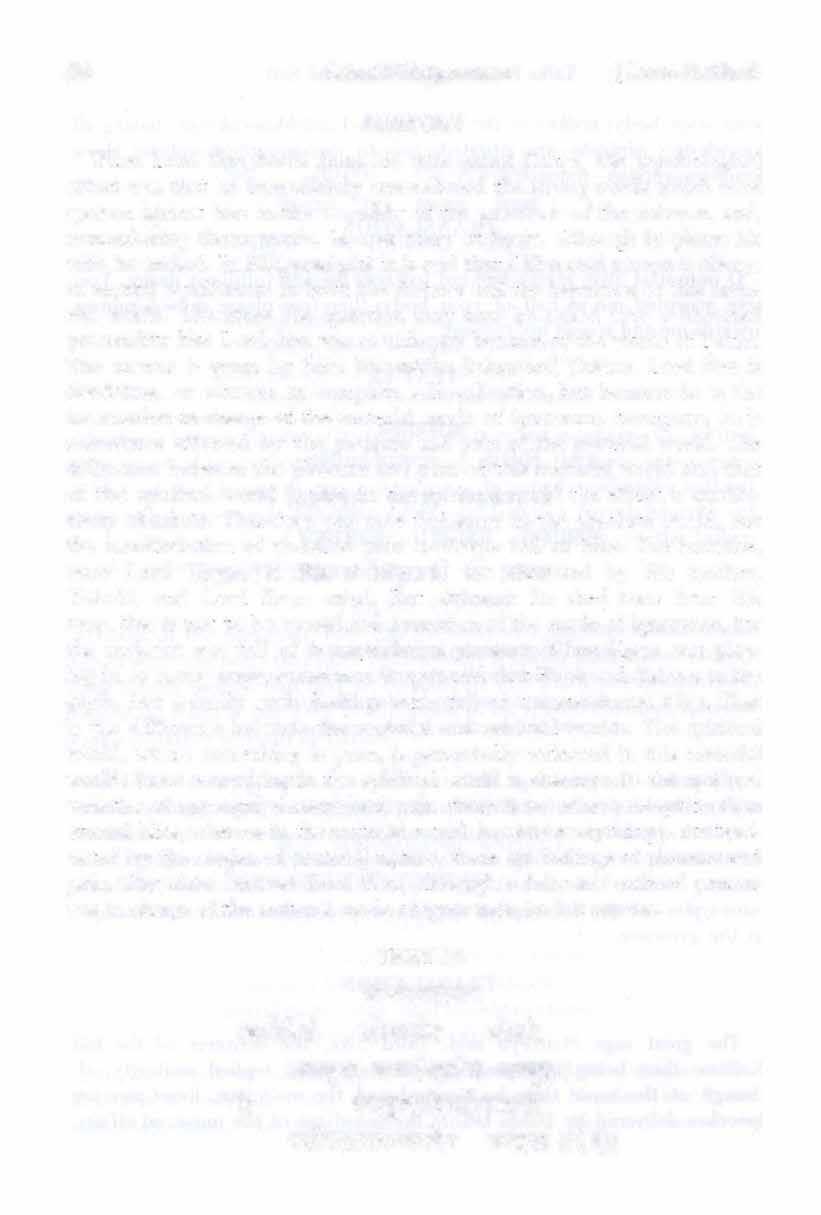
94 Srimad-Bhagavatam [Canto 4, Ch. 3
TEXT 16 wnt'�ICII?!CII'""' ��1RJ �flwtii€f � 31wtl�l����I � �'Q�c:qlf�ij¢Jttt!tlt 'l�l�('tlwtlc:"q'i�wt �II��II
sri bhagaviin uviica
tvayoditam .{obhanam eva sobhane aniihutii apy abhiyanti bandhu§u te yady anutpiidita-do§a-dr§tayo bafiyasiiniitmyamadena manyunii
sri bhagaviin uviica-the great lord replied;tvayii-by you;uditam-said; sobhanam-is true; eva-certainly; sobhane-my dear beautiful wife; aniihutiifl- without being invited; api-even; abhiyanti-go; bandhu§Uamong friends; te-those (friends);yadi-if;anutpiidita-do§a-dr�Jaya{l-not finding fault;baliyasii-more important;aniitmyamadena-by pride caused by identification with the body;manyunii-by anger.

TRANSLATION
The great lord replied: My dear beautiful wife, you have said that one may go to a friend's house without being invited, and this is true, provided such a friend does not find fault with the guest because of bodily identification and thereby become angry towards him.
PURPORT
Lord Siva could foresee that as soon as Sati reached herfather's house, her father, Dak�a, being too puffed up because of bodily identification, would be angry at her presence, and although she was innocent andfaultless, he would be mercilessly angry towards her. He warned that since her father was too puffed up by his material possessions, he would be angry, and this would be intolerable for her. Therefore it was better that she not go. This fact was already experienced by Lord Siva because although Lord Siva was faultless, Dak�a cursed him in so many harsh words.
TEXT


Text 17]
Talks Between Lord Siva and Sati
95
17 MQR1wilW*ICC��:�: . "' "'"' �ffl' gar: 'R I " (' � mtrT �'4191\t�H �W(q��f.:ijft:��II�"II
-va
vidyii-tapo-vitta-vapur
yafl-kulaifl satiim gur-aifl §a{lbhir asattametarai[t smrtau hatiiyiith bhrta-miina-durdrsafl stabdhii na pasyanti hi dhiima bhiiyasiim
vidyii-education;tapa�-austerity;vitta-;-wealth;mpu�-beauty of body, etc.; vaya�-youth; kulai�-with heritage; satam-of the pious; gut;�a*by such qualities;�a{1bhi�-six;asattama-itara*-having the opposite result to those who are not great souls;smrtau-good sense;hatiiyiim-being lost; bhrta-miina-durdrsa�-blind due to pride;stabdhii�-being proud;na-not; pasyanti-see;hi-for;dhiima-the glories;bhuyasiim-of the great souls.

TRANSLATION
Although the six qualities of education, austerity, wealth, beauty, youth and heritage are for the highly elevated, one who is proud of possessing them becomes blind, and thus he loses his good sense and cannot appreciate the glories of great personalities.
PURPORT
It may be argued that since Dak�a was very learned, wealthy and austere and had descended from a very exalted heritage, how could he be unnecessarily angry towards another? The answer is that when the qualities of good education, good parentage, beauty and sufficient wealth are misplaced in a person who is puffed up by all these possessions, they produce a very bad result. Milk is a very nice food, but when milk is touched by an envious serpent it becomes poisonous. Similarly, material assets such as education, wealth, beauty and good parentage arc undoubtedly nice, but when they decorate persons of a malicious nature, then they act adversely. Another example, given by Catlakya Patl�it, is that a serpent that has a jewel on its head is still fearful because it is a serpent. A serpent, by nature, is envious of other living entities, even though they be faultless. When a serpent bites another creature, it is not necessarily because the other creature is at fault; it is the habit of the serpent to bite innocent creatures. Similarly, although Dak�a was qualified by many material assets, because he was proud of his possessions and because he was envious, all those qualities were polluted. It is sometimes, therefore, detrimental for a person advancing in spiritual consciousness or Kr�J)a consciousness to possess such material assets. Kuntidevi, while offering prayers to Kr�Qa, addressed Him as akiiicana-gocara, one who is easily approached by those who are bereft of all material acquisitions. Material exhaustion is an advantage for advancement in Kr�qa consciousness, although if one is conscious of his eternal relationship with the Supreme Personality of Godhead, he can utilize his material assets, such as great learning and beauty and exalted ancestry, for the service of the Lord;then such assets become
96 Srimad-Bhigavatam [Canto 4, Ch. 3
glorious. In other words, unless one is Kr�Qa conscious, all his material possessions are zero, but when this zero is by the side of the Supreme One, it at once increases in value to ten. Unless situated by the side of the Supreme One, zero is always zero; one can add one hundred zeros, but the value will still remain zero. Unless one's material assets are used in Kr�l)a consciousness, they may play havoc and degrade the possessor.
TEXT 18
�(fl� �W{otfq�
�S+lllfR11'{
naitiidrsiiniim svajana-vyapek�ayii grhiin pratiyiid anavasthitiitmaniim ye 'bhyiigatiin vakra-dhiyiibhicak�ate iiropita-bhriibhir amar§a!liik�ibh*
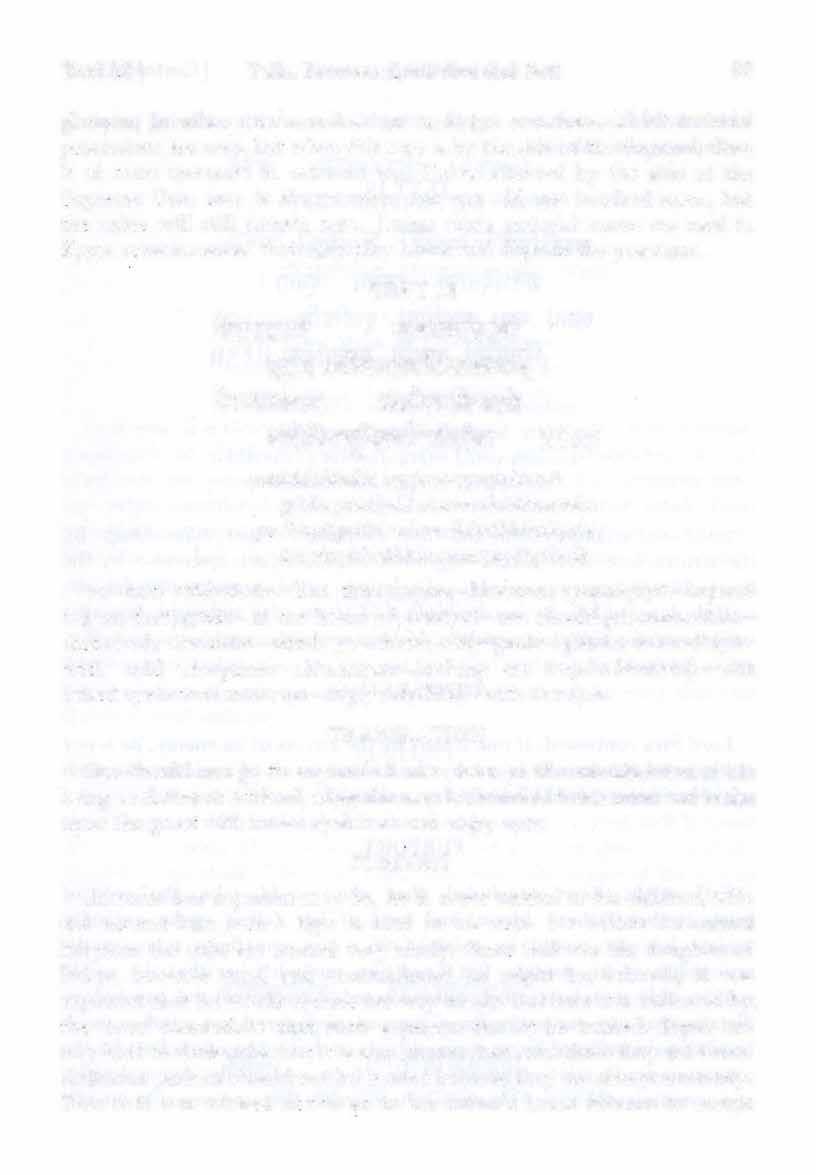
na-not; e tiidrsaniim- like this; svajana- kinsmen; vyapek§ayii- depend · ing on that; grhiin- in the house of; pratiyiit-one should go; anavasthitadisturbed; lilmaniim-mind; ye-those; abhyiigatiin- guests; vakra-dhiyiiwith cold reception; abhicak§ate -looking at; iiropita-bhriib h* - with raised eyebrows; amar§a!la- angry; ak§ibh* - with the eyes.
TRANSLATION
One should not go to anyone's house, even on the consideration of his being a relative or a friend, when the man is disturbed in his mind and looks upon the guest with raised eyebrows and angry eyes.
PURPORT
However low a person may be, he is never unkind to his children, wife and nearest kin; even a tiger is kind to his cubs, for within the animal kingdom the cubs are treated very nicely. Since Sati was the daughter of Dak�a, however cruel and contaminated he might be, naturally it was expected that he would receive her very nicely. But here it is indicated by the word anavasthita that such a person cannot be trusted. Tigers are very kind to their cubs, but it is also known that sometimes they eat them. Malicious persons should not be trusted because they are always unsteady. Thus Sati was advised not to go to her father's house because to accept
Text 18] Talks Between Lord Siva and Sati 97
�l'l stJlitits:wt�fml�'iwtl'l 1
��
...
31mM�Tf�: ������
such a father as a relative and to go to his house without being properly invited was not suitable.
TEXT 19

tathiiribhir na vyathate silimukha* sete 'rditiihgo hrdayena duyatii sviiniim yatha vakra-dhiyarh duruktibhir divii-nisam tapyati marma-ta,t)ita�
tathii.-so ; aribh*-enemy; na-not; vyathate-is hurt; silimukhai[l.-by the arrows; sete-rests; ardita-aggrieved; anga[l -a part; hrdayena-by the heart; duyata-grieving; svanam-of relatives ; yatha- as ; vakra-dhiyam-deceitful; duruktibhift-by harsh words; diva-nisam-day and night; tapyatisuffers; marma-ta{litaft-one whose feelings are hurt.
TRANSLATION
Lord Siva continued: If one is hurt by the arrows of an enemy, he is not as aggrieved as when he is cut by the unkind words of a relative, for such grief continues to rend his heart day and night.
PURPORT
Sati might have concluded that she would take the risk of going to her father's house, and even if her father spoke unkindly against her she would be tolerant, as a son sometimes tolerates the reproaches of his parents. But Lord Siva reminded her that she would not be able to tolerate such unkind words because natural psychology dictates that one can suffer harm from an enemy and not mind so much because pain inflicted by an enemy is natural; but when one is hurt by the strong words of a relative, he suffers the effects continually, day and night, and sometimes the injurybecomes so intolerable that one commits suicide.
98 Srimad-Bhagavatam [Canto 4, Ch_ 3
� � ftiJlQ(�: �(llfl � �I R �� f4st�J\Nt ��f(qlf.l*(Jqffif ��: II� Q..ll
vyaktarh tvam utkr.sta-gate� prajiipate{l priyatmajanam asi subhru me mata tathapi manam na pitu� prapatsyase mad-iisrayiit kafr. paritapyate yata�
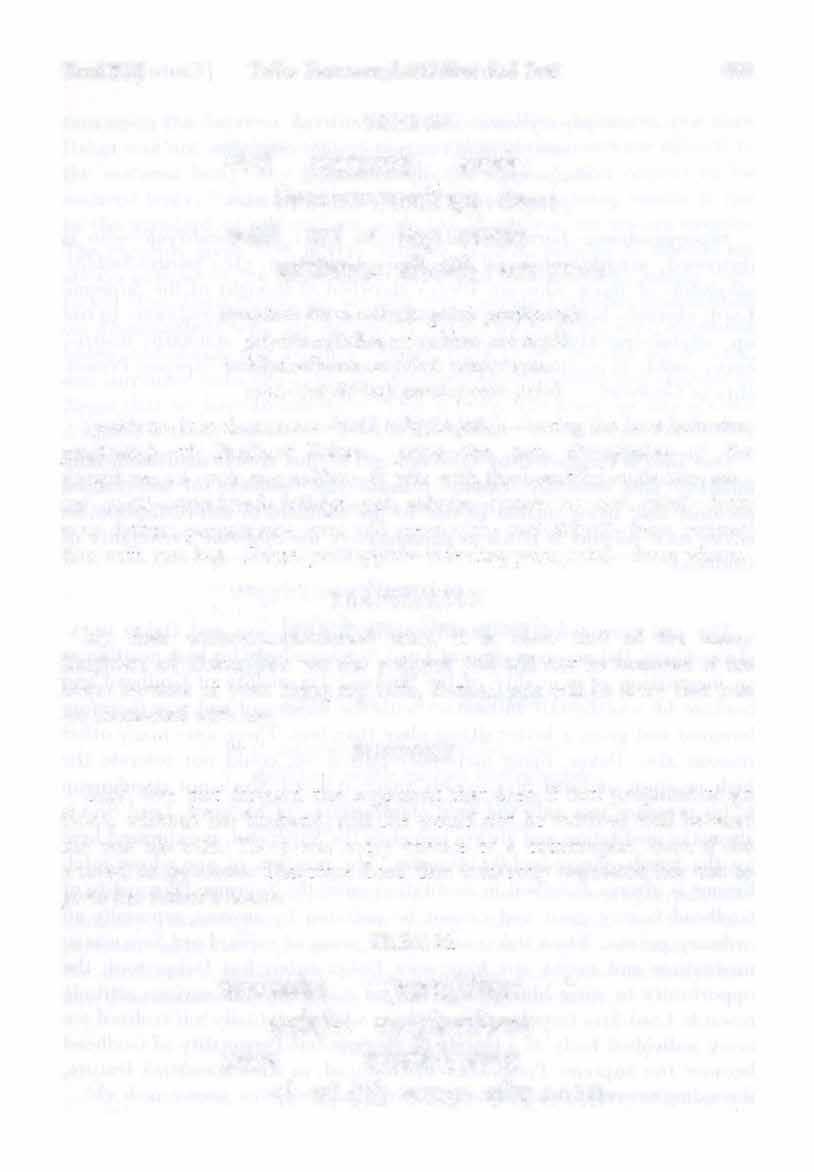
vyaktam-it is clear;tvam-you; utkrfita-gatefr.-having the best behavior; prajiipate[l-of Praj.apati Dak�a; priya-the pet; iitmajiiniim-of the daughters; asi-you are; subhru-0 you with the beautiful eyebrows; memy; matii-considered; tathiipi-yet; miinam-honor; na-not; pitu{l-from your father; prapatsyase-you will meet with; mat-iisrayiit-from connec· tion with me; kafi- D ak � a ; paritapyate-is feeling pain;yata�-from whom.

TRANSLATION
My dear white-complexioned wife, it is clear that of the many daughters of Dak�a you are the pet, yet you will not be honored at his house because of your being my wife. Rather, you will be sorry that you are connected with me.
PURPORT
Lord Siva put forward the argument that even if Sati proposed to go alone, without her husband, still she wouldnot be received well because she was his wife. There was every chance of a cata trophe, even if she wanted to go alone. Therefore Lord Siva indirectly requested her not to go to her father's house.
Text 21] Talks Between Lord Siva and Sati
� ���tf!•lij:
'"'
TEXT 20
�m-: ffl�•ss�qlil•�•qmij\1 �'«fl1
� � ;( fir«: Sf� q�l't�l�¥: qf(ijQ�ij �: ll�oll
99
qjqQtqj�� (i4lf%fln TEXT 21 ��(S��: ���I � ��(i( qt �iM ��•w• �1"�11
pii.pacyamiinena hrdiiturendriya�
samrddhibhi{l. piiru§a-buddhi-siik§i[liim akalpa e§iim adhiro{ihum aiijasii pararh padarh dve.sti yathiisurii harim
piipacyamiinena-burning; hrda-with a heart; iitura-indriya�-who is distressed; samrddhibhift-by the pious reputation, etc.; pii,ru§a-buddhisiik§i[liim-of those who are always absorbed in thought of the Supreme Lord; akalpa{t-being unable; e,siim-of those persons; adhiro{ihum-to rise up; aiijasii-quickly; param-merely; padam-to the standard; dvefitienvy; yathii-as much as; asurii{t-the demons; harim-the Supreme Personality of Godhead.
TRANSLATION
One who is conducted by false ego and is thus always distressed, both mentally and sensually, cannot tolerate the opulence of self-realized persons, and, being unable to rise to the standard of self-realization, he envies such persons as much as demons envy the Supreme Personality of Godhead.
PURPORT
The real reason for the enmity between Lord Siva and Dak�a is explained here. Dak�awas envious of Lord Sivabecause ofhis high position as an incarnation of a quality of the Supreme Personality of Godhead and because he was directly in contact with the Supersoul and was therefore honored and given a better sitting place than him. There were many other reasons also. Dak�a, bei,ng materially puffed up, c<;mld not tolerate the high position of Lord Siva, so his anger at Lord Siva's not standing up in his presence was only the final manifestation of his envy. Lord Siva is always in meditation and always perceives the Supersoul, as expressed here by the words piiru§a-buddhi-siik§i[liim. The position of one whose intelligence is always absorbed in meditation upon the Supreme Personality of Godhead is very great and cannot be imitated by anyone, especially an ordinary person. When Dak�a entered the arena of yajiia, Lord Siva was in meditation and might not have seen Dak�a enter, but Dak�a took the opportunity to curse him because he had maintained an envious attitude Lowards Lord Siva for a long time. Those who are actually self-realized see every individual body as a temple of the Supreme Personality of Godhead because the Supreme Personality of Godhead, in His Paramiitma feature, is residing in everyone's body.
When one offers respect to the body, it is not to the material body but to the presence of the Supreme Lord. Thus one who is always in medita-

100
Srimad-Bhagavatam
[Canto 4, Ch. 3
tion upon the Supreme Lord is always offering Him obeisances. But since Dak�a was not very elevated, he thought that obeisances were offered to the material body, and because Lord Siva did not offer respect to his material body, Dak�a became envious. Such persons, being unable to rise to the standard of self-realized souls like Lord Siva, are always envious. The example given here is very suitable. Asuras, demons or atheists,are always envious of the Supreme Personality of Godhead; they simply want to kill Him. Even in this age we find some so-called scholars commenting on Bhagavad-gitii who are envious of Kr�r:ta. When Kr�r:ta says, manmanii bhava mad-bhakto (Bg. 18.65)-"Always think of Me, become Mydevotee, and surrender unto Me."-the so-called scholars comment that it is not to Kr�r:ta that we have to surrender. That is envy. The asuras or atheists, the demons, without reason or cause, are envious of the Supreme Personality of Godhead. Similarly, instead of offering respect to self-realized persons, foolish men who cannot approach the highest standard of self-realization are always envious, although there is no reason.
TEXT 22
pratyudgama-prasraya[liibhivadanarh vidhiyate siidhu mitha[l, sumadh_yame priijiiai{l, parasmai puru.sii_ya cetasii guhasayiiyaiva na deha-miinine
pratyudgama-standing up from one's seat; prasraya[ta-welcoming; abhivadanam-obeisances; vidhiyate-are intended; sadhu-pro per; mitha�mutually; sumadhyame-my dear young wife; prajna*-by the wise; parasmai-unto the Supreme; puru;Saya-unto the Supersoul; cetasa-with the intelligence; guhasayaya-sitting within the body; eva-certai nly; nanot; deha-manine-to the person identifying with the body.
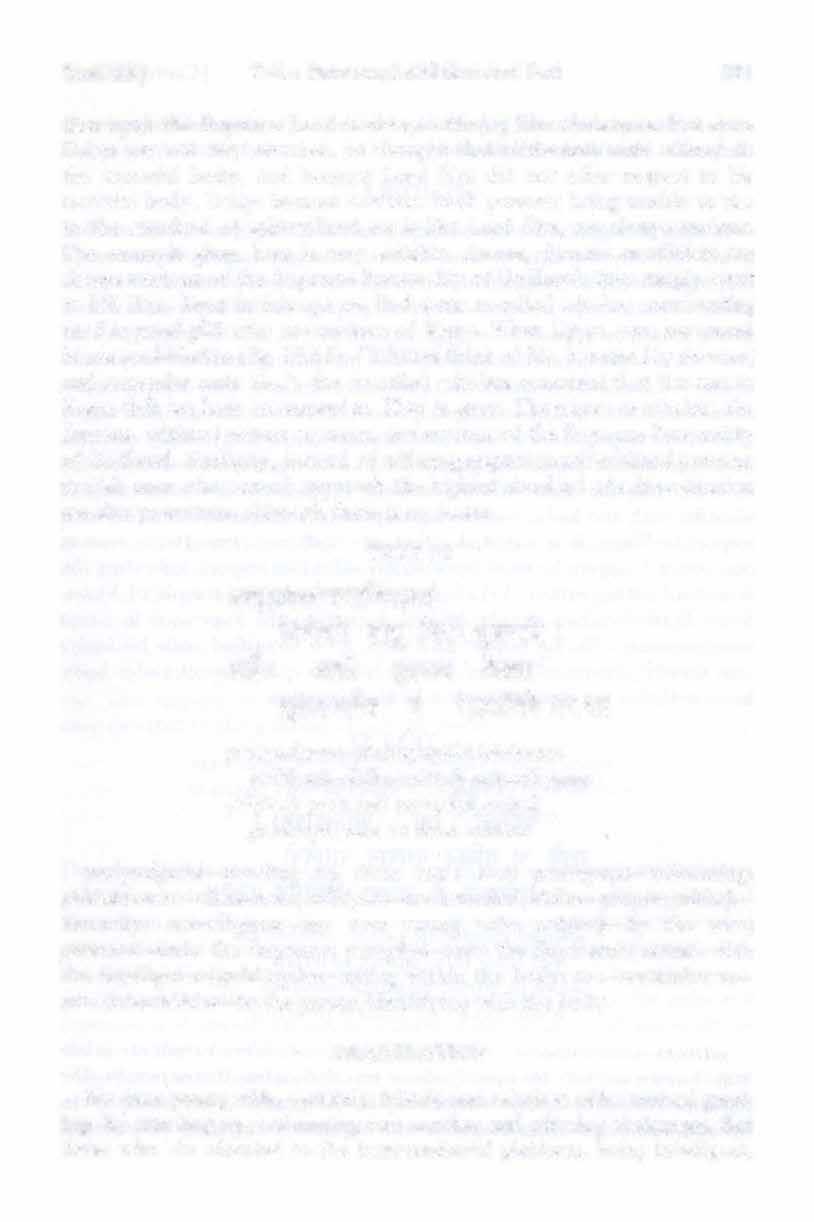
TRANSLATION
My dear young wife, certainly friends and relatives offer mutual greetings by standing up, welcoming one another and offering obeisances. But those who are elevated to the transcendental platform, being intelligent,
Text 22] Talks Between Lord Siva and Sati 101
st�A'4st��
� � fiN:t\'4�ft I sne: � � � !J(i�ltll�q ;f �(441F-t� ����II
offer such respects to the Supersoul who is sitting within the body, not to the person identified with the body.
PURPORT
It may be argued that since Dak�a was the father-in-law of Lord Siva, it was certainly the duty of Lord Siva to offer him respect. In answer to that argument it is explained here that when a learned person stands up or offers obeisances in welcome, he offers respect to the Supersoul, who is sitting within everyone's heart. It is seen, therefore, among Vai�pavas, that even when a disciple offers obeisances to his spiritual master, the spiritual master immediately returns the obeisances because they are mutually offerednottothebody buttothe Supersoul. Therefore the spiritual master also offers respect to the Supersoul situated in the body of the disciple. The Lord says in Srimad-Bhiigavatam that offering respect to His devotee is more valuable than offering respect to Himself. Devotees do not identify with the body, so offering respect to a Vai�l')ava means offering respect to Vi�l)U. It is stated also that, as a matter of etiquette, as soon as one sees a Vai�l')ava he must immediately offer him respect, indicating the Supersoul sitting within. A Vai�l')ava sees the body as a temple of Vi�l)U. Since Lord Siva had already offered respect to the Supersoul in Kr�l')a consciousness, offering respect to Dak�a, who identified with his body, was already performed. There was no need to offer respect to his body because that is not directed by any Vedic injunction.
TEXT
�'fiR:
sattvarh visuddham vasudeva-sabditam _yad �yate tatra p ttman apavrtaft sattve ca tasmin bhagavan vasudevo hyadhok�ajo me namasa vidhiyate
sattvam-consciousness; visuddham--eure; vasudeva- Vasudeva; sabditam-known as; yat-because; iyate-is revealed; tatra-there; pumiin-the Supreme Person; apavrta[1-without any covering;sattve-in consciousness; ca-and; tasmin-in that; bhagaviin-the Supreme Personality of Godhead;
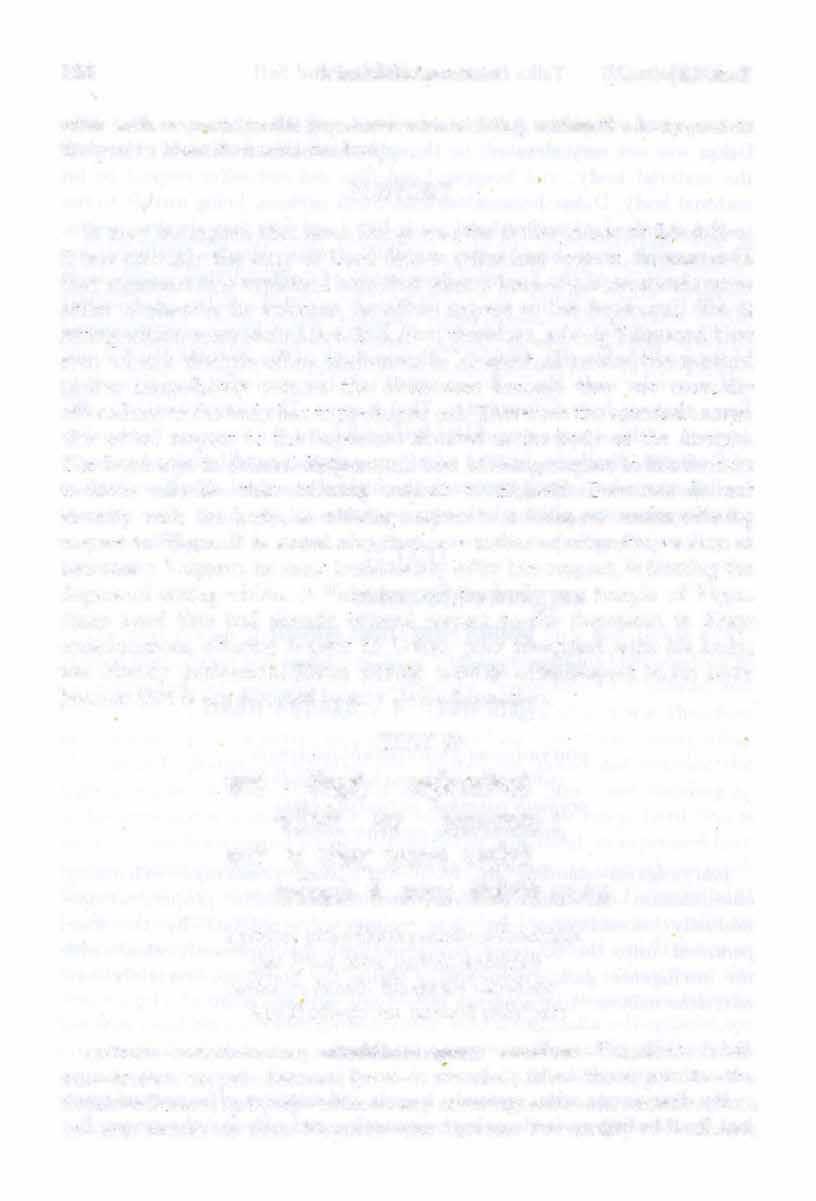
102 Srimad-Bhagavatam [Canto 4, Ch. 3
23 � �;{ crij�f�d
tt4.'1tt� �
I � � • ll� '41ija.(\ rit� it � � 11��11
vasudeva�-Vasude va; hi-because; adho/c,saia{t-transcendental; me-by me; namasa-with obeisances; vidhiyate- worshiped.
TRANSLATION
I am always engaged in offering obeisances to Lord Vasudeva in pure Kr�Qa consciousness. Kr�Qa consciousness is always pure consciousness, and in that consciousness the Supreme Personality of Godhead, known as Vasudeva, is revealed without any covering.
PURPORT
The living entity is constitutionally pure. Asahgo hy iitmiiyarh puru,sa/:1. In the Vedic literature it is said that the soul i always pure and uncontaminated by material attachment.The identification of thebody with thesoul is due to misunderstanding. As soon as one is fully Kr�Qa conscious it is to be understood that he is in his pure, original constitutional position. This state of existence is called suddha-sattva, which means that it is transcendental to the material qualities. Since this suddha-sattva existence is under the direct action of the internal potency, in this state the activities of material consciousness stop. For example, when iron is put into a fire, it becomes warm, and when it is red-hot, although it is iron, it acts like fire. Similarly, when copper is surcharged with electricity, its action as copper stops; it acts as electricity. It is also confirmed in Bhagavad-gita that anyone who engages in unadulterated devotional service to the Lord is at once elevated to the position of pure Brahman.
miim ca yo 'v yabhiciire[La bhakti-yogena sevate sa gu[Liin samatityaitiin brahma-bhuyiiya kalpate (Bg. 14.26)

Therefore suddha-sattva, as described in this verse, is the transcendental position, which is technically called vasudeva. Vasudeva is also the name of the person from whom K��r,ta appears. This verse explains that the pure state is called vasudeva because in that state Vasudeva, the Supreme Personality of Godhead, is reveale-d without 'tny covering. To execute unadulterated devotional service, therefore, one must follow the rules and regulations of devotional service without desire to gain material profit by fruitive activities or mental speculation.
In pure devotional service one simply serves the Supreme Personality of Godhead as a matter of duty, without reason and without being impeded by material conditions. That is called suddha-sattva, or vasudeva,
Text 23] Talks Between Lord Siva and Sati 103
because in that stage the Supreme Person, Kr��Ja, is revealed in the heart of the devotee. Srila Jiva Gosvami has very nicely described this vasudeva or suddha-sattva in his Bhagavat-sandarbha. He explains that a§tottarasata (108) is addedto the name ofthespiritualmasterto indicate onewhois situated in suddha-sattva or in the transcendental state of vasudeva. The word vasudeva is also used for other purposes. For example, vasudeva also means one who is everywhere or all-pervading. The sun is also called vasudeva-sabditam The word vasudeva may be utilized for different purposes, but whatever purpose we adopt, Vasudeva means the all-pervading or localized Supreme Personality of Godhead. In Bhagavad-gitii it is also stated, Vasudeva� sarvam iti (Bg. 7.19). Factualrealizationisto understand Vasudeva, the Supreme Personality of Godhead, and surrender unto Him. Vasudeva is the field where Vasudeva, the Supreme Personality of Godhead, is revealed. When one is free from the contamination of material nature and is situated in pure Kr�r:ta consciousness or in the vasudeva state, Vasudeva, the Supreme Person, is revealed. This state is also called kaivalya, which means pure consciousness. }fiiinarh siittvikarh kaivalyam. When one is situated in pure transcendental knowledge, that is called kaivalya. Therefore vasudeva also means kaivalya, a word which is generally used by impersonalists. Impersonal kaivalya is not the last stage of realization, but in Kr��Ja consciousness kaivalya, when one understands the Supreme Personality of Godhead, then he is successful. In that pure state, by hearing, chanting, remembering, etc., because of the development of knowledge of the science of Kr��Ja, one can understand the Supreme Personality of Godhead. All these activities are under the guidance of the internal energy of the Supreme Lord. The action of the internal potency is also described in this verse as apiivrta�, free from any covering. Because the Supreme Personality of Godhead, His name, His form, His quality, His paraphernalia, etc., are beyond materialnature, being transcendental, it is not possible to understand any one of them with the materialistic senses. When the senses are purified by the discharge of pure devotional service (hr§iker;w h!§ikesa-sevanarh bhaktir ucyate), the pure senses can see Kr��Ja without covering. Now one may inquire that since factually the devotee has the same material existential body, how is it possible that the same materialistic eyes become purified by devotional service? The example, as stated by Lord Caitanya, is that devotional service cleanses the mirror of the mind. In a clean mirror one can see his face very distinctly. Similarly, simply by cleansing the mirror of the mind one can have a clear conception of the Supreme Personality of Godhead. It is stated in Bhagavad-gitii, abhyiisa-yoga-yuktena. Byexecuting one's prescribed duties

104 Srimad-Bhagavatam [Canto 4, Ch. 3
in devotional service, cetasii niinyagiiminii (Bg. 8.8), or simply by hearing about God and chanting about Him, if one's mind is always engaged in chanting and hearing and is not allowed to go elsewhere, one can realize the Supreme Personality of Godhead. As confirmed by Lord Caitanya, by the bhakti-yoga process, beginning from hearing and chanting, one can cleanse the heart and mind, and thus one can clearly see the face of the Supreme Personality of Godhead.

Lord Siva said that since his heart was always filled with the conception of Vasudeva, the Supreme Personality of Godhead, because of His presence within his mind and heart, he was always offering obeisances unto Him. In other words, Lord Siva is always in trance, samiidhi. This samiidhi is not under the control of the devotee; it is under the control of Vasudeva, for the entire internal energy of the Supreme Personality of Godhead acts under His order. Of course the material energy also acts by His order, but His direct will is specifically executed through the spiritual energy. Thus by His spiritual energy He reveals Himself. It is stated in Bhagavad-gitii, sambhaviimy iitma-miiyayii. (Bg. 4.6
). A tma-miiyayii means internalpotency.
By His sweet will He reveals Himself by His internal potency, being satisfied by the transcendental loving service of the devotee. The devotee never commands, "My dear Lord, please come here so that I can see You." It is not the position of the devotee to command the Supreme Personality of Godhead to come before him or to dance before him. There are many socalled devotees who command the Lord to come before them dancing. The Lord, however, is not subject to anyone's command, but if He is satisfied by one's pure devotional activities, He reveals Himself. Therefore a meaningful word in this verse is adhok§aja, for it indicates that the activities of our material senses will fail to realize the Supreme Personality of Godhead. One cannot realize the Supreme Personality of Godhead simply by the attempt of his speculative mind, but if one desires he can subdue all the material activities of his senses, and by manifesting His spiritual energy the Lord can reveal Himself to the pure devotee. When the Supreme Personality of Godhead reveals Himself to the pure devotee, the devotee has no other duty than to offer Him respectful obeisances. The Absolute Truth reveals Himself to the devotee in His form. He is not formless. Vasudeva is not formless because it is stated in this verse that as soon as the Lord reveals Himself, the devotee offers his obeisances. Obeisances are offered to a person, not to anything impersonal. One should not accept the Mayavadi interpretation that Vasudeva is impersonal. As stated in Bhagavad-gitii, prapadyate, one surrenders. One surrenders to a person, not to impersonal nonduality. Whenever there is a question of surrenderingor
Text 23] Talks Between Lord Siva and Sati 105
offering obeisances, there must be an object of surrender or obeisances.
TEXT 24


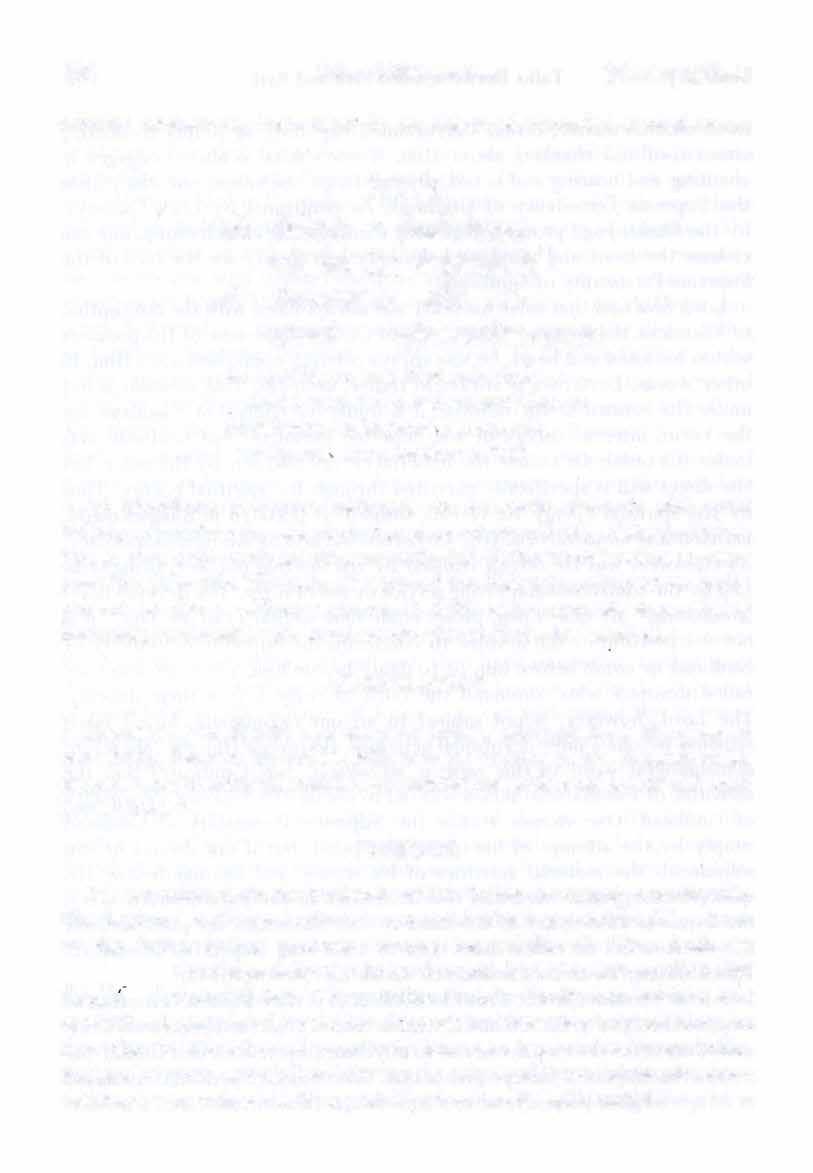
tat te nir"ik.s_yo na pitiipi deha-krd dak.so mama dvit tad-anuvratiis ca ye yo visvasrg yajiia-gatarh varoru miim aniigasarh durvacasiikarot tira{t
tat- therefore; te-your; nirik§ya�-to be seen; na-not; pitii-your father; api-although; deha-krt-the giver of your body; dakfia�-Dak�a; mama-my; dvit-envious; tat-anuvratii�-his (Dak�a's) foUowers;ca-also; ye-who;yaft-who (Dak�a); visvasrk-of the Visvasrjs;yajiia-gatam-being present at the sacrifice; vara-uru-0 Sati; miim-me; aniigasam- being innocent; durvacasii-with cruel words;aharot tira[l.-has insulted.
TRANSLATION
Therefore you should not see your father, although he is the giver of your body, because he and his followers are envious of me. Because of his envy, 0 most worshipful one, he has insulted mewith cruel words although I am innocent.
PURPORT
For a woman, both the husband and the father are equally worshipable. The husband is the protector of a woman during her youthful life, whereas the father is her protector during her childhood. Thus both are worshi able, but especially the father because he is the giver of the body. Lord Siva reminded Sati, "Your father is undoubtedly worshipable, even more than I am, but take care, for although he is the giver of your body, he may also be the taker of your body because when you see your father, because of your association with me, he may insult you. An insult from a relative is worse than death, especially when one is well situated."
106 Srimad-Bhagavatam [Canto 4, Ch. 3
f;t(l�
���fl � � m:... (f4\�tH11� lt I it ft"'Q!44�•id �� '{l�« �"Cf(1a•(1Rlu 11�\lll
ri
'1
TEXT 25 � m�� �� � � ;{ mllft�Rr , �� �i:itwtl�q(j�)
� � � �Ofllr � ����II
yadi vraji,syasy atihiiya mad-vaco
bhadram bhavatyii na tato bhavi,syati sambhiivitasya sva-janiit pariibhavo yadii sa sadyo mara[Iiiya lwlpate
yadi-if; vra}ifiyasi-you will go; atihaya-neglecting; mat-vacaf!-my words; bhadram-good; bhavatyiift-your; na-not; tata[!-then; bhavifiyatiwill become; sambhavitasya-most respectable; sva-janat-by your own relative; parabhava�-are insulted; yada-when ; sa� - that insult; sadyal;timmediately; mara[Iiiya-to death; kalpate-is equal.
TRANSLATION
If in spite of this instruction you decide to go, neglecting my words, the future will not be good for you. You are most respectable, and when you are insulted by your relative, it will immediately be equal to death.
Thus end the Bhaktivedanta purports of the Fourth Canto, Third Chapter, of the Srimad-Bhiigavatam, entitled "Talks Between Lord Siva and Safi."

Text 25] Talks Between Lord
Siva and Sati
107
CHAPTER FOUR
satT Quits Her Body
maitreya uviica etiivad uktvii virariima sahkara{l. patn.y-ahga-niiSarh hy ubhayatra cintaya.n suhrd-didrk.suft pa.risahkit;ii bha.viin n(skriimati nirvisat;i dvidhiisa sii
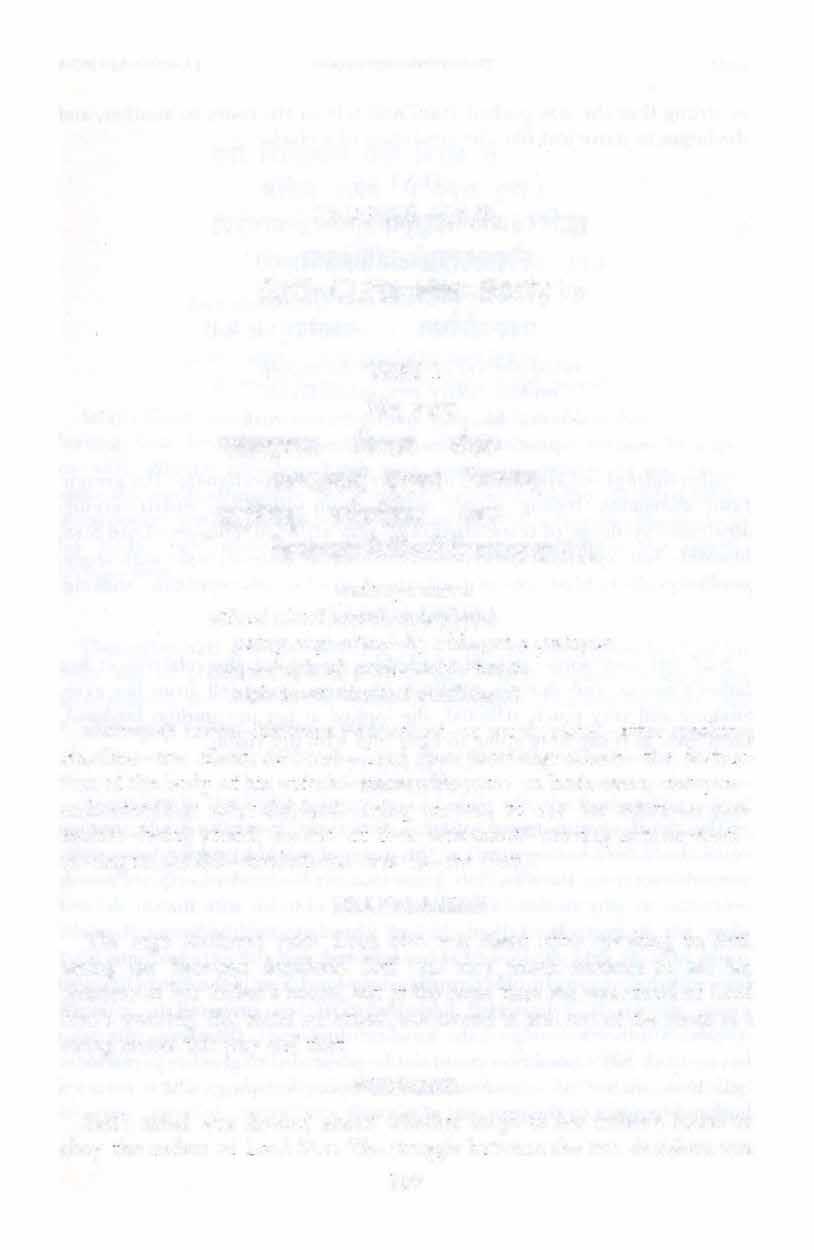
ma.itreya/:t uviica- Maitreya said; etiivat- so much; uktvii- a fter speaking; virariima.-was silent; sahkara/:t- Lord Siva;pa.tni-ahga-niisam- the destrUC· tion of the body of his wife;hi-since;ubhayatra-in both cases; cintayanunde rstanding; suhrt-didrk§u[t-being anxious to see her relatives; parisankita-being afraid; bhavat-of Siva; ni�kramati- moving out; nirvisatimoving in; dvidhii-divided; asa-wa ; sii-she (Satl).
TRANSLATION
The sage Maitreya said: Lord Siva was silent after speaking to Sati, seeing her between decisions. Sati was very much anxious to see her relatives at her father's house, but at the same time she was afraid of Lord Siva's warning. Her mind unsettled, she moved in and out of the room as a swing moves this way and that.
PURPORT
Sati's mind was divided about whether to go to her father's house or obey the orders of Lord Siva. The struggle between the two decisions was 109
"""' 1{51l[ � •vw•lffi' tffi"' m: 'Wl{f;mi �� f�tl'{ � ��: qf�� ��ll«ft��ft�tss�mII�II
TEXTl
so strong that she was pushed from one side of the room to another, and she began to movejust like the pendulum of a clock.
TEXT2
�(�UfkJEtiij��-.r: ��ill!t'O���fci� d WUritst� �1 51� iiiRA�: II � II
suhrd-didrkfiii·pratighiita-durmanii�
snehiid rudat_y asru-kaliitivihvalii
bhavarh bhaviiny apratipuru§am rusji
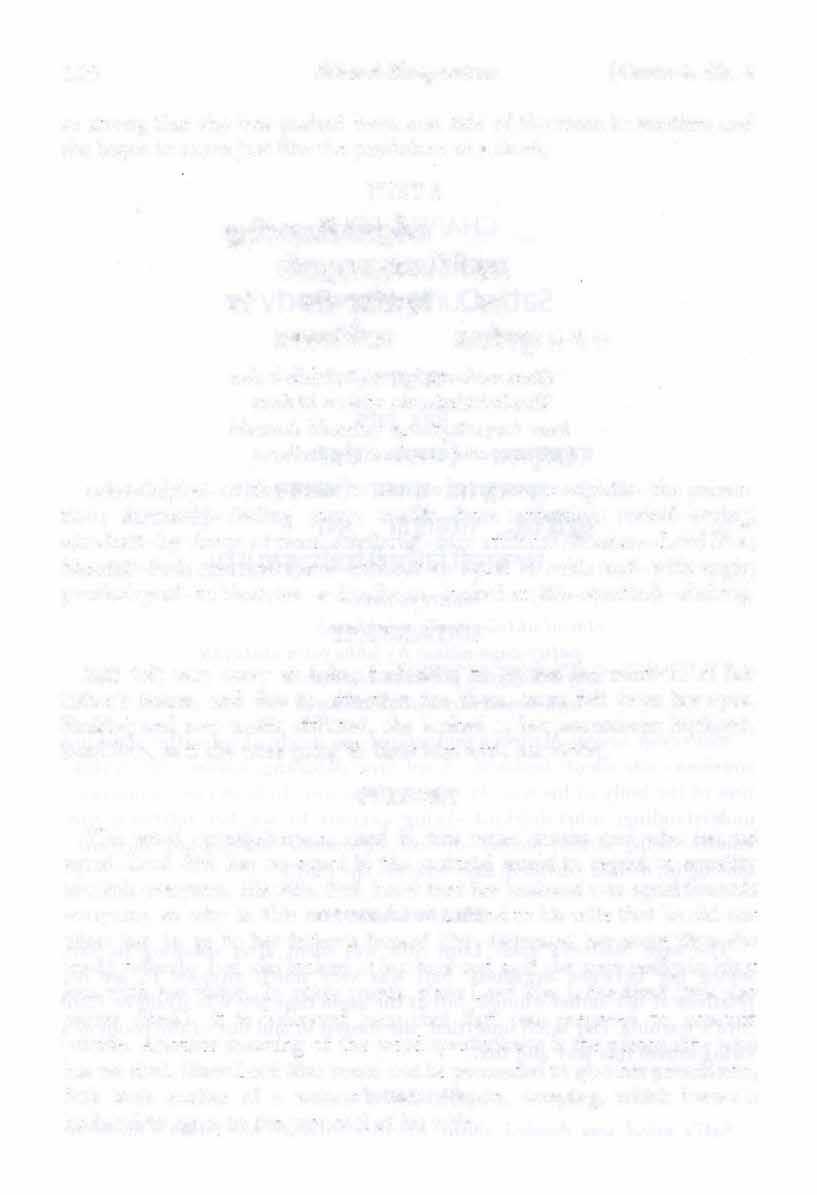
pradhakfi_yativaikfiala jiita-vepathu�
suhrt-didrk§ii-of the·desire to see her relatives; pratighiita-the prevention; durmaniift- feeling sorry; snehiit- from affection; rudatt- crying; asru-kala-by drops of tears; ativihvala-ve ry afflicted; bhavam-Lord Siva; bhaviini-Sati; apratipilru§am- without an equal or rival; ru§ii-with anger; pradhak§yati- to blast; iva-as if; aik§ata-looked at;jiita -vepathuft-shaking.
TRANSLATION
Sati felt very sorry at being forbidden to go see her relatives at her father's house, and due to affection for them, tears fell from her eyes. Shaking and very much afflicted, she looked at her uncommon husband, Lord Siva, as if she were going to blast him with her vision.
PURPORT
The word apratipiiru§am, used in this verse, means one who has no equal. Lord Siva has no equal in the material world in regard to equality towards everyone. His wife, Sati, knewthat her husband was equal towards everyone, so why in this case was he so unkind to his wife that he did not allow her to go to her father's house? This distressed her more than she could tolerate, and she looked at her husband as if she were ready to blast him with her vision. In other words, since Lord Siva is the iitmii (siva also means iitmii), it is indicated here that Sati was prepared lo commit suicide. Another meaning of the word apratipiim�a is the personal i ty who has no rival. Since Lord Siva could not be persuaded to give her permission. Sati took shelter of a woman's last weapon, weeping, which forces a husband to agree to the proposal of his wife.
llO Srimad-Bhagavatam [Canto 4, Ch. 4
m rm:� m f«R d m"�����
ttt"'l(4n�u,��oo·h:�ot
�s���'l<(lffi<tifsrq: II�II
tato vin*svasya sati vihiiya tam
.�okena ro§e[la ca duyatii hrdii pitror agiit strai[la-vimii!iha-dhir grhiin
prem[liitmano yo'rdham adiit satiirh priya�
tata�-th�n; vini�svasya-breathing very heavily; sati-Sati; vihiiyaleaving; tam-- him (Lord Siva); sokena-by bereavement; ro§era- by anger; ca-and; diiyatli-afflicted; hrdu-with the heart; pitro'{l-of her father; aglit-she went; straira-by her womanly nature; vimii!lha-deluded; dhiftintelligence; grhiin-to the house; premrli-due to affection; iitmana�-of his body; ya�-who; ardham-half; adiit-gave; satlim-to the saintly; priya�-dear.
TRANSLATION
Thereafter Sati left her husband, Lord Siva, who had given her half his body due to affection, and breathing very heavily because of anger and bereavement, she went to the house of her father. This less intelligent act was due to her being a weak woman.
PURPORT
According to the·Vedic conception of family life, the husband gives half his body to his wife, and the wife gives half of her body to her husband. In other words, a husband without a wife or a wife without a husband is incomplete. The Vedic marital relationship existed between Lord Siva and Sati, but sometimes, due to weakness, a woman becomes very attracted by the members of her father's house, and this happened to Sati. In this verse it is specifically mentioned that she wanted to leave such a great husband as Siva because of her womanly weakneSs. In other words, womanly weakness exists even in the relationship between husband and wife. Generally separation between husband and wife is due to womanly behavior; divorce takes place due to womanly weakness. The best course for a woman is to abide by the orders of her husband. That makes family life very peaceful. Sometimes there may be misunderstandings between

Text3] Safi Quits Her Body
TEXT3
lll
husband and wife, as found even in such an elevated family relationship as that of Sati and Lord Siva, but a wife should not leave her husband's protection because of such a misunderstanding. If she does so, it is understood to be due to her womanly weakness. TEXT4
IRfOtp.fl: II IJ II
tam anvagacchan druta-vikramiirh satim ekiirh trinetriinucarii� sahasrasa� sa-piir.sada-yak.sii ma{liman-madiidaya� puro-vr.sendriis.tarasii gata-vyathii�
tam-her(Sati); anvagacchan-followed;druta-vikramiim-leaving rapidly; satim-Sati; ekiim-alone; trinetra-of Lord Siva (who has three eyes); anucarii{l-the followers; sahasrasa{l-by thousands; sa-piir§ada-yak§ii{laccompanied by his personal associates and the Yak�as; mariman-madaadaya�t - Mal)i man, Mada, etc; pura{l-vnendrii{l-having the Nandi bull in front; tarasii-swiftly; gata-vyathii{l- without fear.


TRANSLATION
When they saw San leaving alone very rapidly, thousands of Lord Siva's disciples headed by Mal)iman and Mada quickly followed her with his bull Nandi in front and accompanied by the Ya�as.
PURPORT
Satiwas going veryfast so thatshe mightnotbe checked byherhusband, but she was immediately followed by the many thousands of disciples of Lord Siva, headed by Yak�as, MaQiman and Mada. The word gata-vyathii�, used in this connection, means without fear. Satidid not care that she was going alone; therefore she was almost fearless. The word anucarii{l is also significant, for it indicates that Lord Siva'sdisciples were always ready to sacrifice anything for Lord Siva. All of them could understand the desire of Siva, who did not want Sati to go alone. Anucarii{l means those who can immediately understand the purpose of their master.
112 Srimad-Bhagavatam [Canto 4, Ch. 4
��:
�lltriiG>I<::�:
<ll1r.-6441TJ0'{ �{f�stad mw
�n: (iql.f<::��
�
TEXT5
� mft•l, ':i�etlet4SiolfiijW(�rnf�: f�ftm �: II � II

tiirh siirikii-kanduka-darpa[Liimbujasvetiitapatra-vyajana-srag-iidibhitz
gitiiyanair dundubhi-sahkha-ve{lubhir V[§endram iiropya vitahkitii yayu{l
tiim-her (Sat!); siirikii-pet bird; kanduka-baU; darpa!la-mirror; ambuja-Iotus flower; sveta-iitapatra-white umbrella; vyajana-chowry; srak-garland; iidibhi�-and others; gitii-ayanai{l-accompanied with music; dundubhi-drums j sahkha-conchshells; ve!lubhi�-with flutes; vr§endramon the bull; iiropya-placing; vita�ikitii�- decorated; yayu�-they went.
TRANSLATION
The disciples of Lord Siva arranged for Sati to be on the back of a bull and gave her the bird which was her pet. They bore a lotus flower, a mirror and all such paraphernalia for her enjoyment and covered her with a great canopy. Followed by a singing party with drums, conchshells and bugles, the entire procession was as pompous as a royal parade.
TEXT6

3tPitAEftwft�et����
ii-brahma-gho§orjita-yajna-vaisasarh viprar§i-ju§tarh vibudhais ca sarvasa{l
mrd-diirv-aya{l-kiincana-darbha-carmabhir nisr.s!a-bhii[tparh yajanarh samiivisat

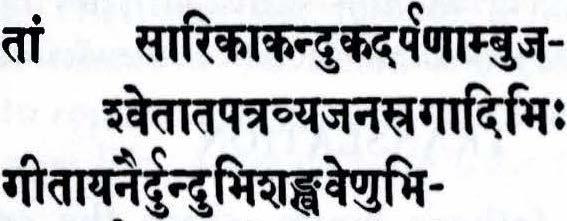
ii-from all sides; brahma-gho§a-with the sounds of the Vedic hymns; urjita-decorated; yajria-sacrifice; vaisasam-destruction of animals; viprar�i-ju§tam-attended by the great sages; vibudha*-with demigods;

Text6] Sati Quits Her Body
113
Put�e r�� �: ��:��llf.t�� �(1¥UW\H{ II � II
ca- and; sarvasa/;1 - on all sides; mrt-clay ; daru- wood ; aya/;1 -iron; kancana -gold; darbha-kusa grass; carmabhi/;1 - skins ; nimta-made of; bhii!l{iamsacrificial animals and pots; yajanam- sacrifice; samavisat- entered.

TRANSLATION
She then reached her father's house where the sacrifice was being performed and entered the arena where everyone was chanting the Vedic hymns. The great sages, brahma�as and demigods were all assembled there, and there were many sacrificial animals as weU as pots made of clay, stone, gold, glass and skin, which were all requisite for the sacrifice.
PURPORT
When learned sages and briihmarws assemble to chant Vedic mantras, someof them alsoengage in arguing about the conclusionof the scriptures. Thus some of the·sages and briihmarws were arguing, and some of them were chantingthe Vedic mantras, so the entire atmosphere was surcharged with transcendental sound vibration. This transcendental sound vibration has been simplified in the transcendental vibration Hare Kr�l)a, Hare Kr�t;�a, Kr�l)a Kr�l)a, Hare Hare/ Hare Rama, Hare Rama, Rama Rama, Hare Hare. In this age, no one is expected to be highly educated in the Ve'dic ways of understanding because people are very slow, lazy and unfortunate. Therefore Lord Caitanya has recommended the sound vibration Hare Kr�l)a, andinthe Srimad-Bhiigavatam itis also recommended: yajnai/;1 sank!rtana-priiyair yajanti hi sumedhasa/;1 (Bhag. 11.5.32). At the present moment it is impossible to gather sacrificial necessities because of the poverty of the population and their lack of knowledge in Vedic mantras. Therefore for this age it is recommended that people should gather together and chant the Hare Kr�l)a mantra to satisfy the Supreme Personality of Godhead who is accompanied by His associates. Indirectly this indicates Lord Caitanya, who is accompanied by His associates Nityiinanda, Advaita and others. That is the process of performing yajna in this age.
Another significant point in the verse is that there were animals for sacrifice. That these animals were meant for sacrifice does not mean that they were meant to be killed. There were great sages and realized souls assembled who were performing yajnas, and their realization was tested by animal sacrifice, just as, in modern science, tests are made on animals to determine the effectiveness of a particular medicine. The briihmarzas who were entrusted with the performance of yajiia were very realized
114 Srimad-Bhagavatam [Canto 4, Ch. 4
souls, and to test their realization an old animal was offered in the fire and again rejuvenated. That was the test of a Vedic mantra. The animals gathered were not meant to be killed and eaten. The real purpose of a sacrifice was not to replace a slaughterhouse but to test a Vedic mantra by giving an animal new life. Animals were used to test the power of Vedic mantras, not for meat.
tiim iigatiirh tatra na kascaniidriyad vimiinitiim yajna-krto bhayiij jana{l, rte svasfr vai jananirh ca siidara/J premiisru-kaflthya{l, pari:sasvajur mudii
tiim-her (Safi); iigatam-having arrived;tatra-there; na-not; kascanaanyone; iidriyat-received; vimiinitiim-not receiving respect;yajiia-krta[lof the performer of the sacrifice (Dak�a);bhayiit-from fear;jana[l-person; .rte-except; svas[[l-her own sister;uai-indeed;jananim-mother; ca-and; siidarii{t - with respect; prema-asru -kar-thya[l-whose throats were filled with tears of affection;pari�asuaju[l-embraced; mudii-with glad faces.


TRANSLATION
When Sati, with her followers, reached the arena, because all the people assembled were afraid of Dak�a, none of them received her well. No one welcomed her but her mother and sisters, who, with tears in their eyes and with glad faces, welcomed her and talked with her very pleasingly.
PURPORT
The mother and sisters of Sati could not follow the others, who did not receive Sati very well. Due to natural affection, they immediately embraced her with tears in their eyes and with loving feelings. This shows that women as a class are very softhearted; their natural affection and love cannot be checked by artificial means. Although the men present were very learned briihmar-as and demigods, they were afraid of their
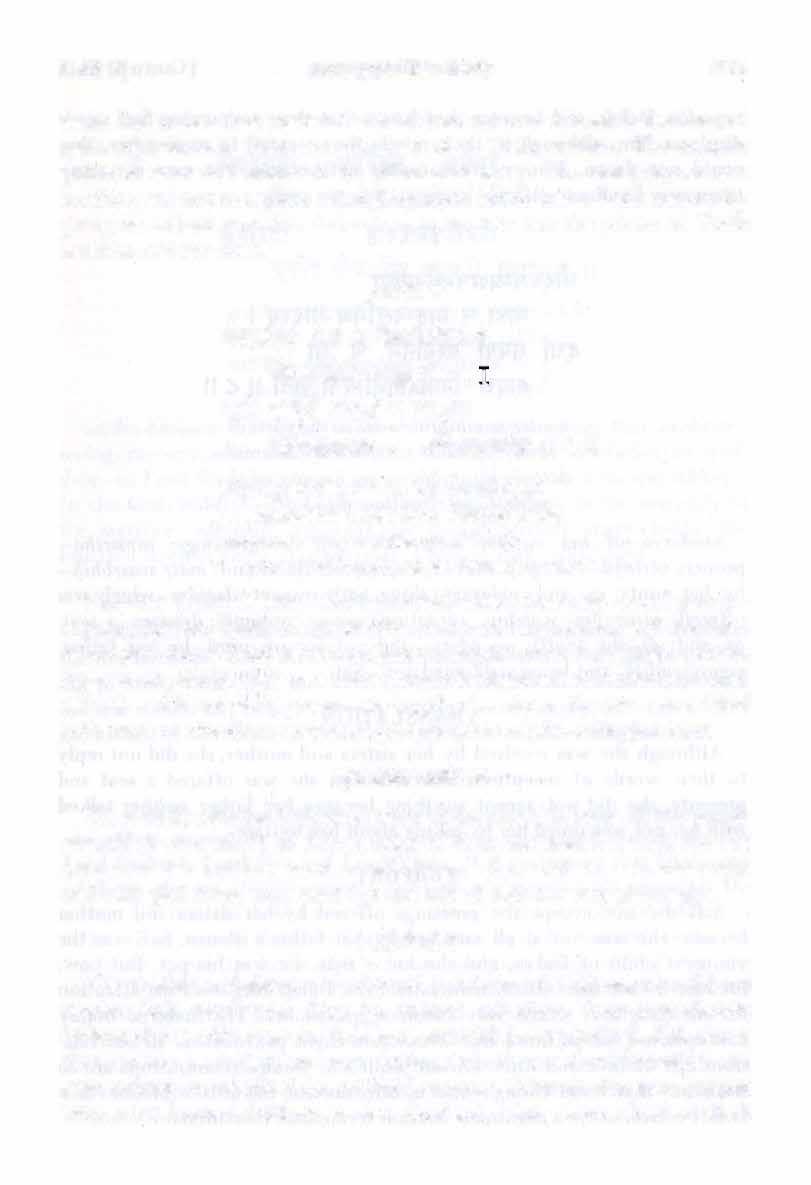
Text7] Sati Quits Her Body liS
ffl'IT'lffi'
;r ��;n�� ftltlfWRJf
���(:q��H it"'�: qf�i�
TEXT7
ij�
tffiijt I
II \911
superior, Dak�a, and because they knew that their welcoming Sati would displease him, although in their minds they wanted to receive her, they could not do so. Women are naturally softhearted, but men are sometimes very hardhearted.
TEXTS
«i<:\4«40!4-N«�
saudarya-samprasna-samartha-viirtayii miitrii ca miitr·§vasrbhis ca siidaram dattiim Sa]Xlryiim varam iisanam ca sa niidatta pitriipratinanditii sati
saudarya-of her sisters; samprasna-with the greetings; samarthaproper; viir t ayii- tidings; miitrii-by her mother; ca-and; matr-svasrbhiftby her aunts; ca-and; siidaram- along with respect; dattiim-which was offered; saparyiim- worship , adoration; varam- present s ; iisanam-a seat; ca-and; sa- she (Sati); na iidatta-did not accept; pitrii-by her father; apratinanditii-not being welcomed; sati-Safi .

TRANSLATION
Although she was received by her sisters and mother, she did not reply to their words of reception, and although she was offered a seat and presents, she did not accept anything because her father neither talked with her nor welcomed her by asking about her welfare.
PURPORT
Sati did not accept the greetings offered by her sisters and mother because she was not at all satisfied by her father's silence. Sati was the youngest child of Dak�a, and she knew that she was his pet. But now, necause of her association with Lord Siva, Dak�a forgot all his affection for his daughter, which very much aggrieved her. The material bodily conception is so polluted that even upon slight provocation all our relationships of love and affection are nullified. Bodily relationships are so transient that even though one is affectionate towards someone in a bodily relationship, a slight provocation terminates this intimacy.
116 Srirnad-Bhagavatam [Canto 4, Ch. 4
� :q +tl�ttQ:flf� � I � � tt<+tt«4 � m � ttm�� m11�11
� m�"tf ��t ftm � � t;ij�;f Fnn I ar.nm ��('(G\��1Qft �Nit��tRil � II� II
arudra-bhiigarh tam avel9ya ciidhvararh
pitrii ca deve krta-helanarh vibhau
aniicJrtii yajna-sadasy adhiSvari
cukopa lokiin iva dhak.syati ru.sii
arudra-bhagam- having no oblations for Lord Siva;tam-that ; avek§yaseeing; ca-and;adhvaram-place of sacrifice;pitrii-by her father;ca- and; deve-to Lord Siva; krta -helanam-contempt having been shown; vibhauto the lord; aniidrtii-not being received; yajiia-sadasi-in the assembly of the sacrifice; adhisvari-Sati; cukopa-became greatly angry; lokiin-the fourteen worlds;iva-as if;dhak§yati-burning;ru§ii-with anger.
TRANSLATION
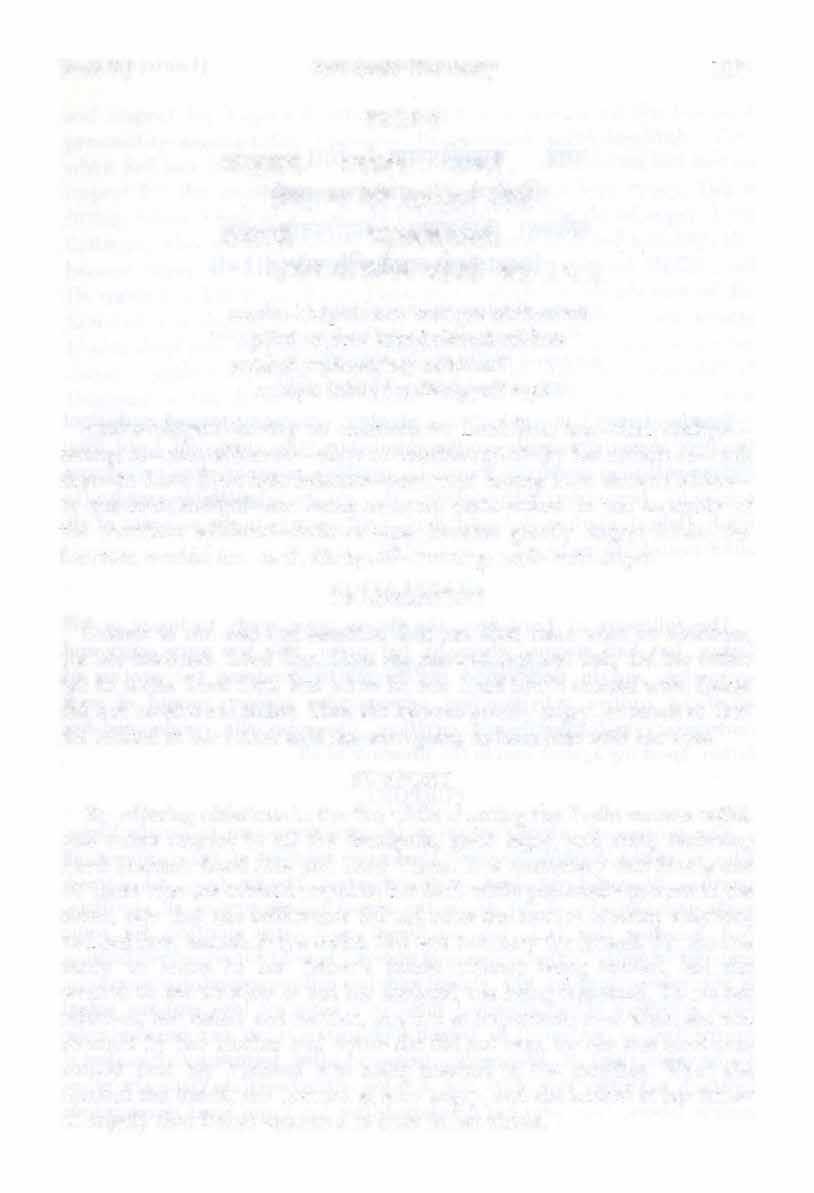
Present in the arena of sacrifice, Sati saw that there were no oblations for her husband, Lord Siva. Next she realized that not only did her father fail to invite Lord Siva, but when he saw Lord Siva's exalted wife, Dak�a did not receive her either. Thus she became greatly angry, so much so that she looked at her father as if she were going to burn him with her eyes.
PURPORT
By offering oblations in the fire while chanting the Vedic mantra sviihii, one offers respect to all the demigods, great sages, and pitrs, including Lord Brahma, Lord Siva and Lord Vi�!J.U. It is customary that Siva is one of those who are offered respects, but Sati, while personally present in the arena, saw that the briihma'{tas did not utter the mantra offering oblations to Lord Siva , nama� siviiya sviihii. She was notsorry for herself, for she was ready to come to her father's house without being invited, but she wanted to see whether or not her husband was being respected. To see her relatives, her sisters and mother, was not so important; even when she was received by her mother and sisters she did not care, for she was most concerned that her husband was being insulted in the sacrifice. When she marked the insult, she became greatly angry, and she looked at her father so angrily that Dak�a appeared to burn in her vision.
Text9] Sati Quits Her Body
TEXT9
ll7
jagarha siimar.sa-vipannayii girii siva-dvi;�arh dhiima-patha-srama-smayam sva-tejasii bhiita-garuin samq,tthitiin nigrhya devtjagato 'bhi.�nwataft

jagarha-began to condemn; sa-she; amar§a-vipannaya-indistinct through anger; gira-with words; siva-dvi§am-the enemy of Lord Siva; dhiima-patha-in sacrifices; srama-by troubles; smayam-very proud; svatejasa-by her order; bhiita-gartiin- the ghosts; samutthitiin-ready (to injure Dak�a); nigrhya-stopped; devi-Sati;jagata�-in the presence of all; abhiSrrvata�-being heard.
TRANSLATION
The followers of Lord Siva, the ghosts, were ready to injure or kill Dak.!ja, but Sati stopped them by her order. She was very angry and sorrowful, and in that mood she began to condemn the process of sacrificial fruitive activities and persons who are very proud of such unnecessary and troublesome sacrifices. She especially condemned her father, speaking against him in the presence of all.
PURPORT
The process of offering sacrifices is especially meant to satisfy Vi�p.u, who is called Yajfiesa because He is the enjoyer of the fruits of all sacrifice. Bhagavad-gitii also confirms this fact. The Lord says, bhoktiirarh yajna-tapasiim (Bg. 5.29). He is the actual beneficiary of all sacrifices. Not knowing this fact, less intelligent men offer sacrifices for some material benefit. To derive personal material benefit for sense gratification is the reason persons like Dak�a and his followers perform sacrifices. Such sacrifices are condemned here as a labor of love without actual profit. This is confirmed in S rimad-Bhiigavatam. One may prosecute the Vedic injunctions of offering sacrifices and other fruitive activities, but if by such activities one does not develop attraction for Vi�p.u, they are useless labors. One who has developed love for Vi�p.u must develop love
118 Srimad-Bhagavatam
TEXT 10 � �� firu fuqfri �'l�'i�tl'{ I �� �� �iR�61i f� � :sftRJt�iJ: ll�oll
[Canto 4, Ch. 4
and respect for Vigm's devotees. Lord Siva is considered the foremost personality amongst the Vai�t;tavas. Vai§rtaviiniim yathii sambhu�. Thus when Sati saw that her father was performing great sacrifices but had no respect for the greatest devotee, Lord Siva, she was very angr)'. This is fitting; when Vi��u or a Vai��ava is insulted, one should be angry. Lord Caitanya, who always preached nonviolence, meekness and humility, al�o became angry when Nityananda was offended by Jagai and Madhai, and He wanted to kill them. When Vi�!l.U or a Vai��ava is blasphemed or· dishonored, one should be very angry. Narottama dasa Thakur said, krodha bhakta dve§ijane. We have anger, and thatanger canbe a greatqualitywhen directed against a person who is envious of the Supreme Personality of Godhead or His devotee. One should not be tolerant when a person is offensive towards Vi�!l.U or a Vai��ava. The anger of Sati towards her father was not objectionable, for although he was her father, still he was trying to insult the greatest Vai�!lava. Thus Sati's anger against her father was quite applaudable. ·
TEXT ll

devy uviica
na yasya loke 'sty atisiiyana{! priyas tathiipriyo deha-bhrtiirh priyiilmana/:1, tasmin samastiitmani mukta.-vairake
[te bhavantarh katama{L pratipayet
devi uviica-the blessed goddess said;na-not;yasya-of whom;lolce-in the material world; asti-is; atisiiyana�-having no rival; priya�-dear; latha-so; apriya{!-enemy; deha-bhrtiim-bearing material bodies; priyaiitmana�-who is the most beloved;tasmin-towards Lord Siva; saniastaiitmani- the universal being; mukta-vairake-who is free from all enmity; rte-except; bhavantam-for you;katama�-who;pratipayet-would be envious.
Text ll] Sati Quits Her Body 119
��
� itts�M�lii"H
��
I
��qf;r ��
WI
fir:r�qTISJ�
fiFm�:
�
�l'R� ��: qffiq�({ II��II
The blessed goddess said: Lord Siva is the most beloved of all living entities. He has no rival. No one is very dear to him, and no one is his enemy. No one but yourself could be envious of such a universal being, who is free from all enmity.
PURPORT
In Bhagavad-gitii (Bg. 9.29) the Lord says, samo ,ham saroa-bhute§u: "I am equal to all living entities." Similarly, Lord Siva is a qualitative incarnation of the Supreme Personality of Godhead, so he has almost the same qualities as Him. Therefore he is equal to everyone; no one is his enemy, and no one is his friend, but one who is envious by nature can become the enemy of Lord Siva. Therefore Sati accused her father, "No one but you could be envious of Lord Siva or could be his enemy." There were other sages and learned briihmartas present, but they were not envious of Lord Siva, although they were all dependent on Dak�a. Therefore no one but Dak�a could be envious of Lord Siva. That was the accusation of Sati.


TEXT 12

� �ft��� wiij � ¥�€tit�• r� , gari� �
�a:�cnwt�f{. 11 ��II
do§iin pare;�iim hi gu[le§u siidhavo

grh[lanti kecin na bhaviidrso dvija
gu!liirhs ca phalgU.n bahuukari§!lavo
mahattamiis te§V avidad bhaviin agham
do§iin-faults; pare§iim-of others; hi-for; gu[!e§u-in the qualities; siidhava�-siidhus; grh!lanti- find; ke cit - some; na-not; bhaviidrsa�-like you; dvija-0 twice-born; gu[!iin-qualities; ca-and;phalgun-small; bahuukari�[lava�-greatly magnifies; mahattamii�-the greatest persons; te§Uamong them; avidat- find; bhaviin-you; agham-the fault.
TRANSLATION
Twice-born pak!ja, a man like you can simply find fault in the qualities of others. Lord Siva, however, not only does not find fault with others'

120 Srimad-Bhagavatam [Canto 4, Ch. 4
TRANSLATION
qualities, but if someone has a little good quality, he magnifies it greatly. Unfortunately you have found fault with such a great soul.
PURPORT
King Dak�a is addressed here by his daughter Sati as dvija, twice-born. Twice-born refers to the higher classes of men, namely the briihma'{las, k�atriyas and vaisyas. In other words, dvija is not an ordinary man but one who has studied the Vedic literature from a spiritual master and can discriminate between good and bad. Therefore it is supposed that he understands logic and philosophy. Sati, Dak�a's daughter, put before him sound arguments. There are some highly qualified persons who only accept the good qualities of others. Just as a bee is always interested in the honey in the flower and does not consider the thorns and colors, highly qualified persons, who are uncommon, accept only the good qualities of others, not considering their bad qualities, whereas the common man can judge what are good qualities and what are bad qualities.
Among the uncommonly good souls there are still gradations, and the best good soul is one who accepts an insignificant asset of a person and magnifies that good quality. Lord Siva is also called Asuto�a, which means one who is satisfied very easily and who offers to any person the highest level of benediction. For example, once a devotee of Lord Siva wanted the benediction that whenever he touched someone on the head, that person's head would at once be separated from his trunk. Lord Siva agreed. Although the benediction asked �as not very commendable because the devotee wanted to kill his enemy, Lord Siva considered his good quality in worshiping and satisfying him, and he granted the benediction. Thus Lord Siva accepted his bad qualities as magnificently good qualities. But Sati accused her father, "You are just the opposite. Although Lord Siva has so many good qualities and has no bad qualities at all, you have accepted him as bad and found fault with him. Because of your accepting his good qualities to be bad, instead of your becoming the most exalted soul you have become the most fallen. A man becomes the greatest· soul by accepting the goodness of others' qualities, but by unnecessarily considering others' good qualities to be bad, you have become the lowest of the fallen souls."

Text 13] Sati Quits Her Body 121
TEXT 13 wt�*f4�ijQC(ij� +tdA:Fwt;a:l • fUiql€¥tcU� I
f.\(�ij�nij �er �II��II
niiscaryam etad yad asatsu sarvadii mahad-vinindii kurapiitma-viidi_su ser.syarit n:tahiipuru§a-piida-piiritsubhir nirasta-tejafl.su tad eva sobhanam
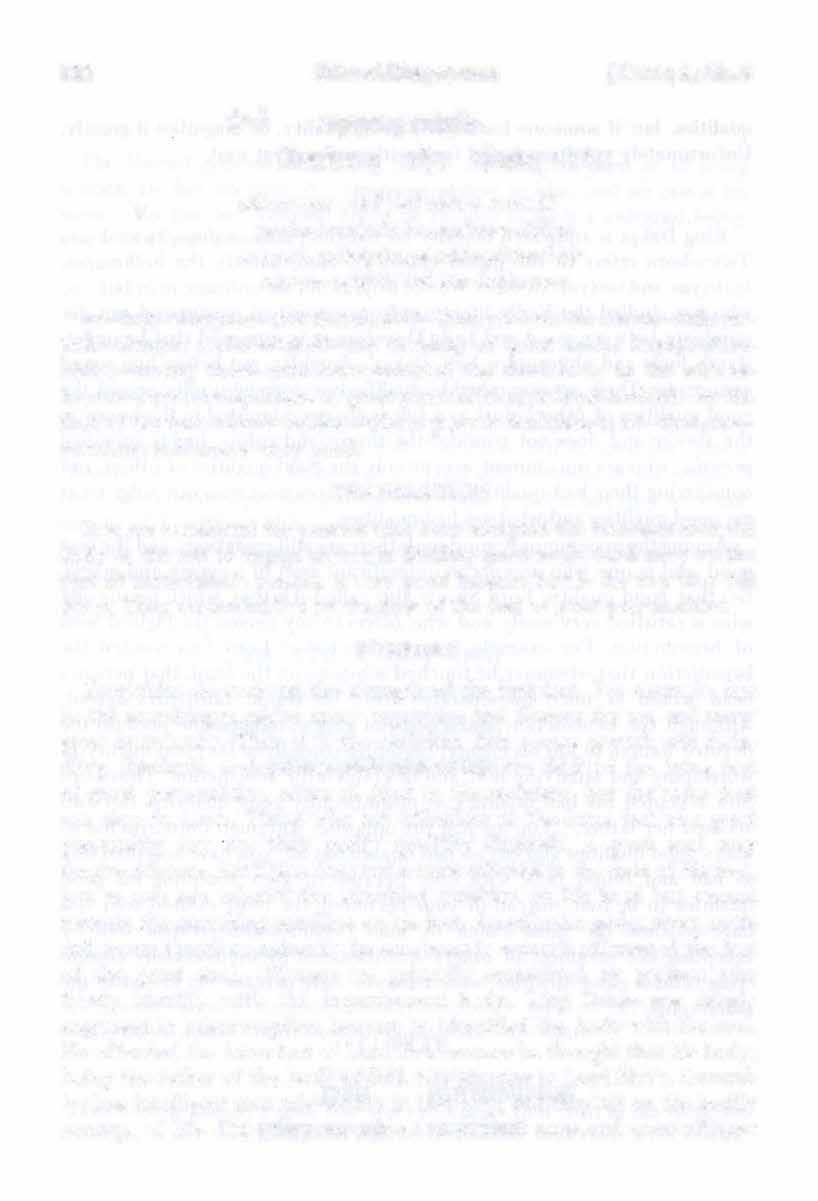
na-not; iiscaryam-wonderful; etat-this; yat-which; asatsu-evil; sarvadii-always; mahat-vinindii-the deriding of great souls; kurapa-tltmaviidi�u-among those who have accepted the dead body as the self; sair_syam-envy; mahiipiiru§a-of great personalities; pada-paritsubhifl.-by the dust of the feet; nirasta-tejafl.su-whose glory is diminished; tat-that; evacertainly; sobhanam-very good.
TRANSLATION
It is not wonderful for persons who have accepted the transient material body as the self to engage always in deriding great souls. Such envy on the part of materialistic persons is very good because that is the way they fall down. They arediminished by the dust of the feet of great personalities.
PURPORT
Everything depends on the strength of the recipient. For example, due to the scorching sunshine many vegetables and flowers dry up, and many grow luxuriantly. Thus it is the recipient that causes growth and dwindling. Similarly, mahiipuru�a-piida-piiritsubhifl, the dust of the lotus feet of great personalities, offers all good to the recipient, but the same dust can also do harm. Those who are offenders at the lotus feet of a great personality dry up; their godly qualities diminish. A great soul may forgive offenses,butK�s.n!J. does not excuse offenses to the dust of his feet, just as one can tolerate the scorching sunshine on his head but cannot tolerate the scorching sunshine on his feet. An offender glides down more and more; therefore naturally he continues to commit offenses at the feet of the great soul. Offenses are generally committed by persons who falsely identify with the impermanent body. King Dak�a was deeply engrossed in misconception because he identified the body with the soul. He offended the lotus feet of Lord Siva because hethought that his body, being the father of the body of Sati, was superior to Lord Siva's. Generally, less intelligent men misidentify in that way, and they act on thebodily concept of life. Thus they are subject to commit more and more offenses
122 Srimad-Bhagavatam [Canto 4, Ch. 4 � ¥4(1\(Sttql�qfqtll-
at the lotus feet of great souls. One who has such a concept of life is considered to be in the class of animals like cows and asses.
TEXT 14
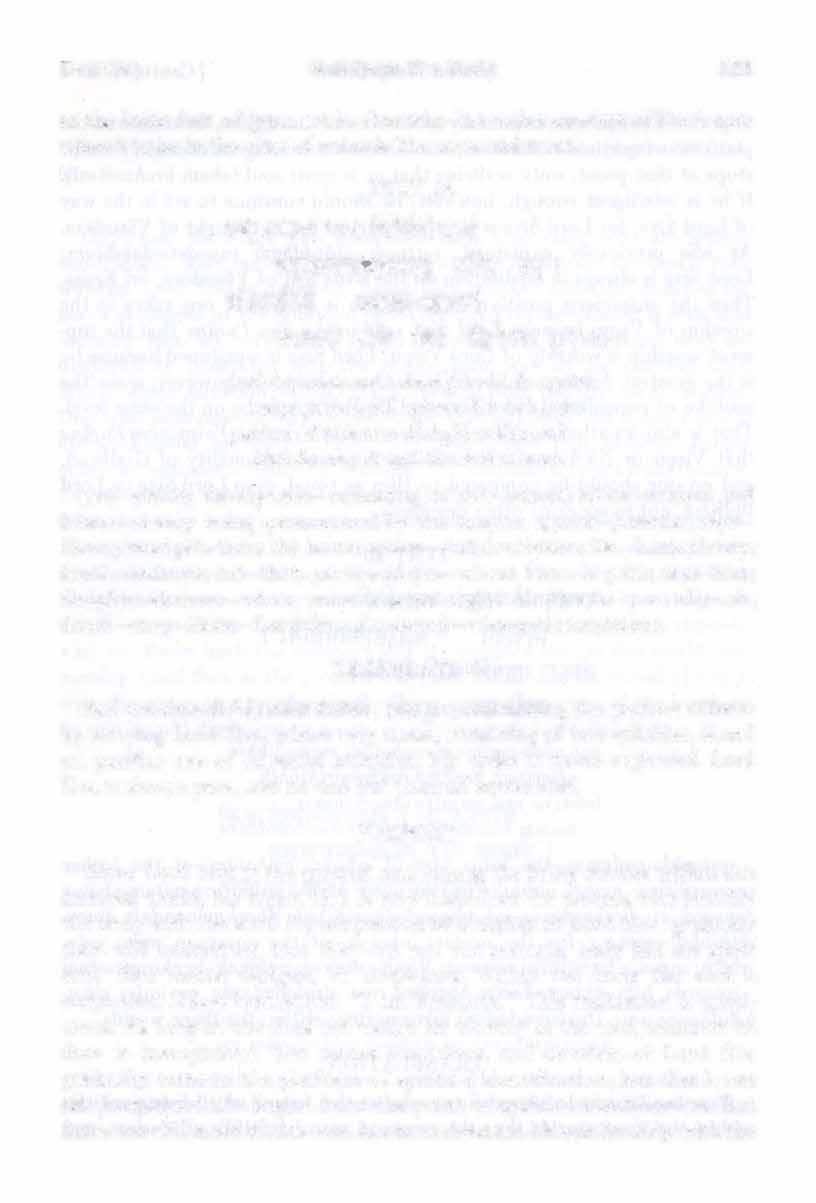
yad dvy-akfiararh niima gireritarh nnliim sakrt prasangiid agham iisu hanti tat pavitra-kirtirh tam alanghya-siisanarh
bhaviin aho dve.sti sivarh sivetara[t
yat-which; dvi-ak,:Saram-consisting of two letters; nama-named; gira iritam-merely being pronounced by the tongue; nnlam-persons; sakrtonce;prasangat- from the heart;agham-sinful activities;iisu-immediately; hanti-destroys; tat-that; pavitra-kirtim-whose fame is pure;tam-him; alanghya-siisanam-whose order is never neglected; bhavan-you;aho-oh; dvefiti-envy;sivam-Lord Siva; siva-itara[t-who are inauspicious.
TRANSLATION
Sati continued: My dear father, you are committing the greatest offense by envying Lord Siva, whose very name, consisting of two syllables, si and va, purifies one of all sinful activities. His order is never neglected. Lord Siva is always pure, and no one but yourself envies him.
PURPORT
Since Lord Siva is the greatest soul among the living entities within this material world, his name, Siva, is very auspicious for persons who identify the body with the soul. If such persons take shelter of Lord Siva, gradually they will understand that they are not the material body but are spirit soul. Siva means mangala, or auspicious. Within the body the soul is auspicious. Aharh brah masmi : "I am Brahman." This realization is auspicious. As long as one does not realize his identity as the soul, whatever he does is inauspicious. Siva means auspicious, and devotees of Lord Siva gradually come to the platform of spiritual identification, but that is not all. Auspicious life begins from the point of spiritual identification. But there are still more duties-one has to understand his relationship with the
Text 14] Sati Quits Her Body 123
ef)�stetti(Ef+tl� �
q�st"m �(J)ttf\lte4
� � WfT'{ fltlrt<i;prJ
ffil I
� m ftrcf N�:���\lu
Supreme Soul. If one is actually a devotee of Lord Siva, he comes to the platform of spiritual realization, but if he is not intelligent enough, then he stops at that point, only realizing that he is spirit soul (aharh brahmiismi)If he is intelligent enough, however, he should continue to act in the way of Lord Siva, for Lord Siva is always absorbed in the thought of Vasudeva_ As was previously explained, sattvarh viSuddharh vasudeva-sabditam: Lord Siva is always in meditation on the lotus feet of Vasudeva, Sri Kr�t:la. Thus the auspicious position of Lord Siva is realized if one takes to the worship of Vi�p.u because Lord Siva says in t�e Siva Puriirza that the topmost worship is worship of Lord Vi�J;lU. Lord Siva is worshiped because he is the greatest devotee of Lord V�p.u. One should not, however, make the mistake of considering Lord Siva and Lord Vi�p.u to be on the same level. That is also an atheistic idea. It is also enjoined in the Vai§l).aviya Puriipa that Vi�t;lU or Narliyap.a is the exalted Supreme Personality of Godhead, and no one should be compared to Him as equal, even Lord Siva or Lord Brahma, not to speak of other demigods.
TEXT 15

J:t�q1a;q.t
Q +iwilsMilfM��d iUR«1R1€41�: ����R�� ft� 11�'-\11
yat-piida-padmarh
mahatiirh mano 'libhir
ni§evitarh brahma-rasiisaviirthibhift

lokasya yad var,sati ciisi�o 'rthinas
tasmai bhaviin druhyati visva-bandhave
yat-piida-padmam-the lotus feet of whom; mahatiim-of the higher personalities; manaft-alibhi[l-by the bees of the mind; n�evitam- being engaged at; brahma-rasa-of transcendental bliss (brahmiinanda); iisavaarthibhift-seeking for the nectar; lokasya-of the common man; yatwhich; var§aii-he fulfills; ca-and; iis(saft-desires; arthinaft-seeking; tasmai -towards him (Lord Siva); bhaviin-you; druhyati-are envious; viSvabandhave-unto the friend of all living entities within the three worlds.
TRANSLATION
You are envious of Lord Siva, who is the friend of all living entities within the three worlds. For the common man he fulfills all desires, and
124 Srimad-Bhagavatam [Canto 4, Ch. 4
because of their engagement in thinking of his lotus feet, he also blesses higher personalities who are seeking after brahmananda [transcendental bliss J.
PURPORT
Ordinarily there are two classes of men. One class, who are grossly materialistic, want material rosperity, and their desires arefulfilled if they worship Lord Siva. Lord Siva, being very quickly satisfied, satisfies the material desires of the common man very quickly;therefore it is seen that ordinary men are very much apt to worship him. Next, those who are disgusted or frustrated with the materialistic way of life worship Lord Sivato attain salvation,which entails freedom from material identification. One who understands that he is not the material body but is spirit soul is liberated from ignorance. Lord Siva also offers that facility. People generally practice religion for economic development, to get some money, for by getting money they can satisfy their senses. But when they are frustrated they want spiritual brahmiinanda, or merging into the Supreme. These four principles of material life-religion, economic development, sense gratification and liberation-exist,and Lord Siva is the friendof both the ordinary man and the man who is elevated in spiritual knowledge, so it was not good for Dak�a to create enmity towards him. Even Vai�t]avas, who are above both the ordinary and the elevated men in this world, also worship Lord Siva as the greatest Vai�t]ava. Thus he is the friend of everyone-the common men, the elevated men and the devotees of the Lord-so no one should disrespect or create enmity towards Lord Siva.
TEXT 16 fiten�1:4Rott'IN14WI �

IG:t4(ij'liit� �: � I
I<At'4(1
il._(UW4«!1{11�,11
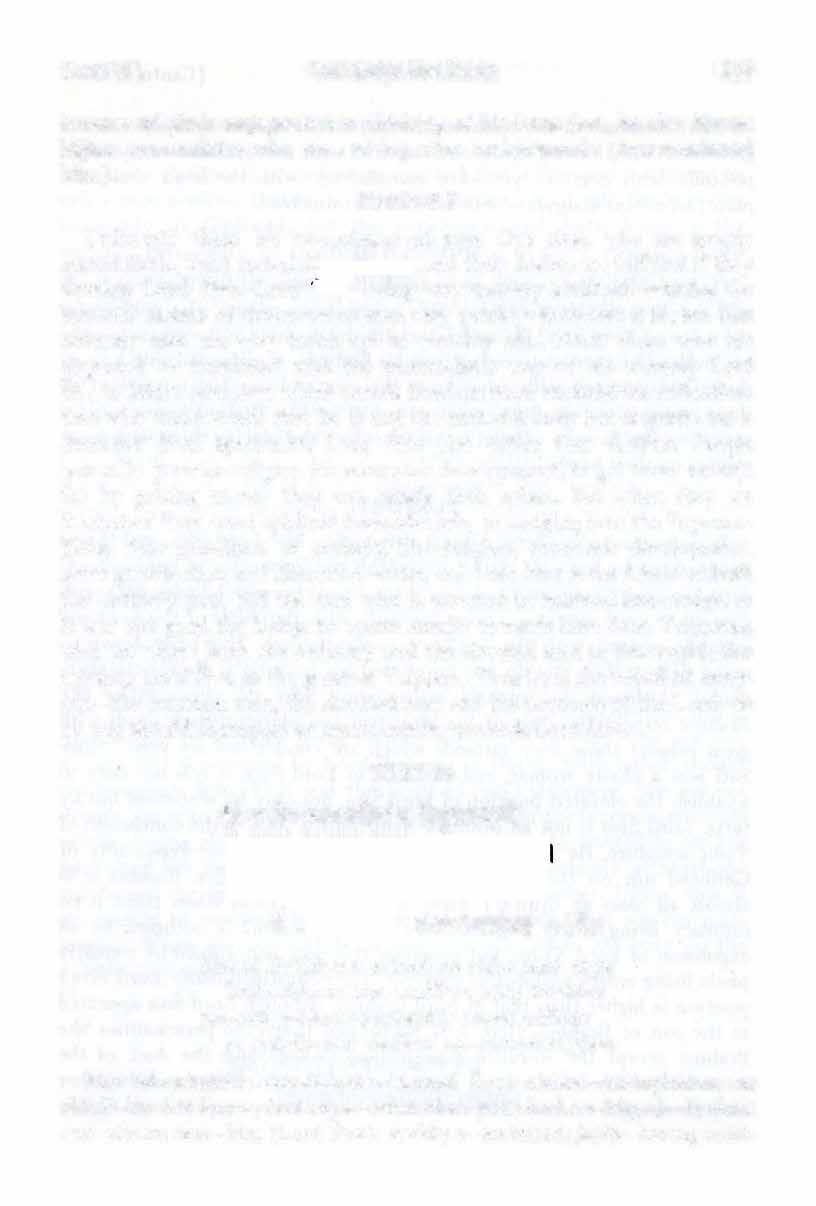
kirh vii siviikhyam asivarh na vidus tvad anye brahmiidayas tam avakirya jatii� smasiine
tan-malya-bhasma-nrkapaly avasat pisacair ye miirdhabhir dadhati tac-caraQavasntam
kim vii-whether; siva-akhyam-named Siva; asivam-inauspicious; na vidufr.-do not know; tvat anye-other than you; brahma-adayafr.-Brahma and others; tam-him (Lord Siva);avaki:'rya-scattered;jatiifr.-having twist-




Text 16 J Sati Quits Her Body 125
�
ed hair; smasane-in the crematorium; tat-malya-bhasma-nrkapali-who is garlanded with human skulls and smeared with ashes; avasat-associated; piSacai{l-with demons; ye-who; murdhabh*-with the head; dadhatiplace; tat-cararta-avasr.stam-fallen from his lotus feet.
TRANSLATION
Do you think that greater, more respectable personalities than you, such as Lord Brahma, do not know this inauspicious person who goes under the name of Lord Siva? He associates with the demons in the crematorium, his locks of hair are scattered all over his body, he is garlanded with human skulls and smeared with ashes from the crematorium, but in spite of all these inauspicious qualities, great personalities like Brahma honor him by accepting the flowers offered to his lotus feet and placing them with great respect on their heads.
PURPORT
It is useless to condemn a great personality like Lord Siva, and this is being stated by his wife, Sati, to establish the supremacy of her husband. First she said,"You call Lord Siva inauspicious because he associates with demons in crematoriums, covers his body with the ashes of the dead and garlands himself with the skulls of human beings. You have shown so many defects, but you do not know that his position is always transcendental. Although he appears inauspicious, why do personalities like Brahma respect the dust of his lotus feet and place on their heads with great respect those very garlands which are condemned by you?" Since Sati was a chaste woman and the wife of Lord Siva, it was her duty to establish the elevated position of Lord Siva, not only by sentiment but by facts. Lord Siva is not an ordinary living entity. This is the conclusion of Vedic scripture. He is neither on the level of the Supreme Personality of Godhead nor on the level of the ordinary living entities. Brahma is in almost all cases an ordinary living entity. Sometimes, when there is no ordinary living entity available, the post of Brahma is occupied by an expansion of Lord Vi�QU, but generally this post is occupied by a greatly pious living entity within this universe. Thus constitutionally Lord Siva's position is higher than that of Lord Brahma, although Lord Siva appeared as the son of Brahma. Here it is mentioned that even personalities like Brahma accept the so-called inauspicious flowers and the dust of the lotus feet of Lord Siva. Great sages like Marici, Atri, Bhrgu and the other nine great sages who are descendants of Brahma also respect Lord Siva in

126 Srimad-Bhagavatam [Canto 4, Ch. 4
such a way because they all know that Lord Siva is not an ordinary living entity.
In many Puriirws it is sometimes asserted that a demigod is elevated to such a high position that he is almost on an equal level with the Supreme Personality of Godhead, but the conclusion that Lord Vi�I).U is the Supreme Personality of Godhead is confirmed in every scripture. Lord Siva is described in the Brahma-samhitii to be like curd or yogurt. Curd is not different from milk. Since milk is transformed into curd, in one sense curd is also milk. Similarly, Lord Siva is in onesense the Supreme Personality of Godhead, but in another sense he is not, just as curd is milk although we have to distinguish between the two. These descriptions are in the Vedic literature. Whenever we find that a deJTiigod occupies a position apparently more elevated than that of the Supreme Personality of Godhead, it is just to dr.aw the devotee's attention to that particular demigod. It is also stated in the Bhagavad-gitii that if anyone wants to worship a particular demigod, the Supreme Personality of Godhead, who is sitting in everyone's heart, gives him greater and greater attachment for that demigod so that he may be elevated to the demigod's abode. Yiinti deva-vratii deviin (Bg. 9.25). By worshiping demigods one can elevate himself to the abodes of the demigods; similarly, by worshiping the Supreme Personality of Godhead one can be elevated to the spiritual kingdom. This is stated in different places in Vedic literature. Here Lord Siva is praised by Sati, partially due to her personal respect for Lord Siva, since he is her husband, and partially due to his exalted position, which exceeds that of ordinary living entities, even Lord Brahma. The position of Lord Siva is accepted by Lord Brahma, so Dak�a, Sati's father, should also recognize him. That was the point of Sati's statement. She did not actuallycome to her father's houseto participate in thefunction,although before coming she pleaded with her husband that she wanted to see her sisters and her mother. That was a plea only, for actually at heart she maintained the idea that she would convince her father, Dak�a, that it was useless to continue being envious of Lord Siva. That was her main purpose. When she was unable to convince her father, she gave up the body he had given her, as will be seenin the following verses.
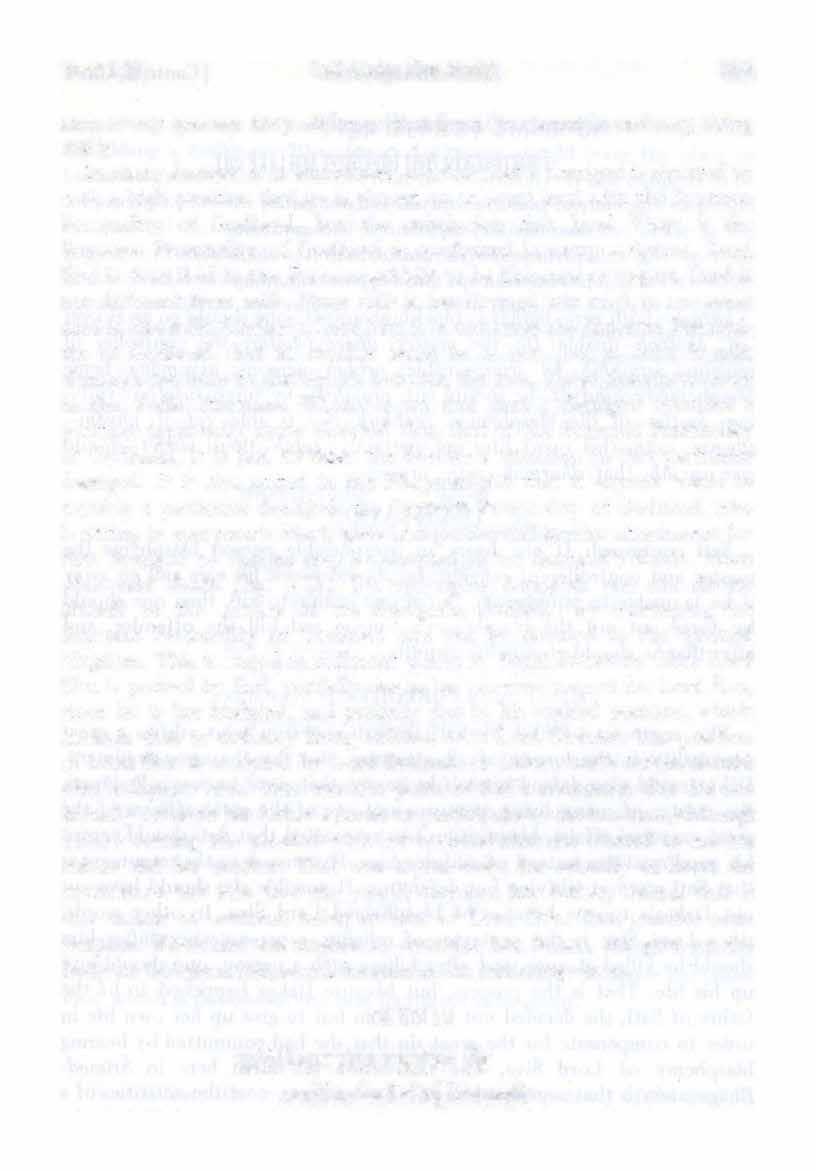
Text 17] Sati Quits Her Body 127
�fq1fltrfii�IQ��tN� ���
TEXT 17
kar{lau pidhiiya nirayiid yad akalpa ise dharmiivitary aS[[!ibhir nrbhir asyamiine
chindyiit prasahya rusatim asatirit prabhus cej jihvam asiin api tato visrjet sa dharma�
kar!'lau-both ears;pidhaya-blocking;nirayat-one should go away;yat -if; akalpa{l.-unable; iSe-the master; dharma-avitari-the controller of religion; asr!'libhi{l.-by irresponsible; nrbhi{l.-persons; asyamane-being 91asphemed;chindyat-he should cut;prasahya-by force;rusatim-vilifying; asatim-of the blasphemer; prabhu{l.-one is able;cet-if; jihvamtongue; asun-(his own) life; api-certainly; tata{l.-then; visrjet-should giveup;sa{!.-that;dharma{!.-is theprocess.

TRANSLATION
Sati continued: If one hears an irresponsible person blaspheme the master and controller of religion, he should block his ears and go away if he is unable to punish him. But if one is able to kill,then one should by force cut out the blasphemer's tongue and kill the offender, and afterthathe shouldgiveuphis ownlife.
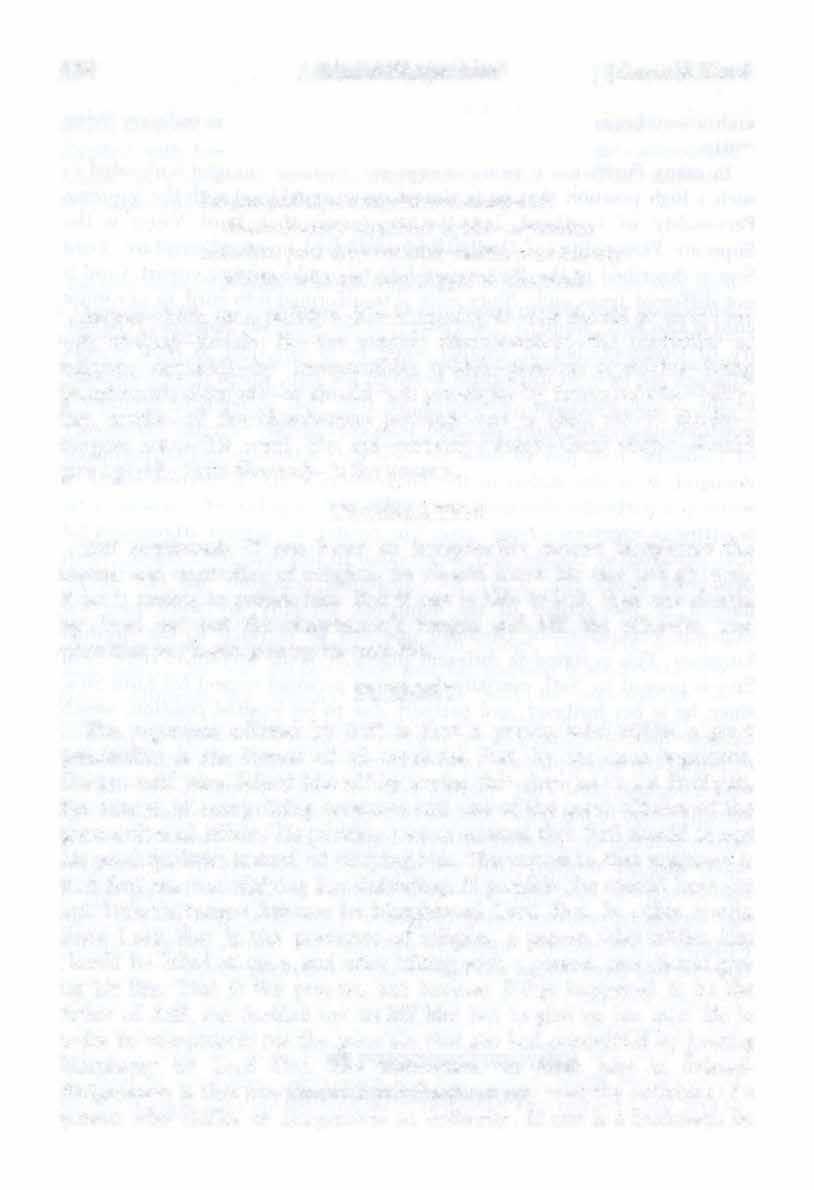
PURPORT
The argument offered by Sati is that a person who vilifies a great personality is the lowest of all creatures. But, by the same argument, Dak�a could also defend himself by saying that since he was a Prajapati, the master of many living creatures and one of the great officers of the great universal affairs, his position was so exalted that Sati should accept his good qualities instead of vilifying him. The answer to that argument is that Sati was not vilifying but defending. If possible she should have cut out Dak�a's tongue because he blasphemed Lord Siva. In other words, since Lord Siva is the protector of religion, a person who vilifies him should be killed at once, and after killing such a person, one should give up his life. That is the process, but because Dak�a happened to be the father of Sati, she decided not to kill him but to give up her own life in order to compensate for the great sin that she had committed by hearing blasphemy of Lord Siva. The instruction set forth here in SrimadBhiigavatam is that one should not tolerate at any cost the activities of a person who vilifies or blasphemes an authority. If one is a brahma!'la he
128 Srimad-Bhagavatam [Canto 4, Ch. 4
should not give up his body because by doing so he would be responsible for killing a briihma7Ja; therefore a briihma'{la should Leave the place or block his ears so that he will not hear the blasphemy. If one happens to be a k�atriya he has thepower to punish any man;therefore a k�atriya should at once cut out the tongue of the vilifier and kill him. But as far as the vaisyas and sudras are concerned, they should immediately give up their bodies. Sati decided to give up her body because she thought herself to be among the sudras and vaisyas. As stated in Bhagavad-gitii, striyo vaisyas tatha sudra� (Bg. 9.32). Women, laborers and the mercantile class are on the same level. Thus since it is recommended that vaiSyas and sudras should immediately give up their bodies upon hearing blasphemy of an exalted person like Lord Siva, she decided to give up her life.
TEXT 18

atas tavotpannam idarh kalevararh na dhiirayine siti-ka[ltha-garhirwft jagdhasya mohiidd hi visuddhim andhaso jugupsitasyoddhara[larh pracak§ate
uta�-therefore; tava-from you; utpannam-received; idam-this; kalevaram-bo dy; na dhiirayi§ye-1 shall not bear; siti-kar-tha-garhirw�-who have blasphemed Lord Siva;jagdhasya-which has been eaten; mohiit-by mistake; hi-because; visuddhim-the purification; ·andhasa�-of food; jugupsitasya-poisonous; uddharar-am-vo m iting;pracak§ate - declare.
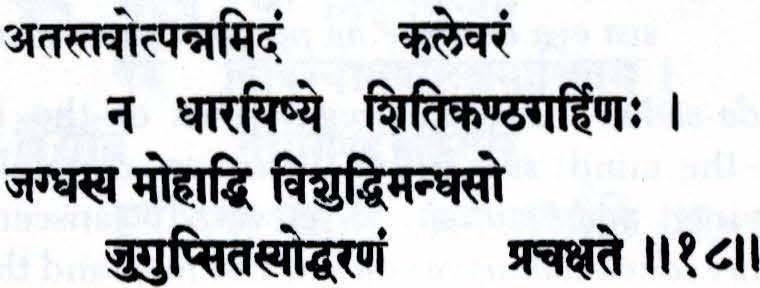
TRANSLATION
Therefore I shall no Longer bear this unworthy body, which has been received from you, who have blasphemed Lord Siva. If someone has taken food which is poisonous, the best treatment is to vomit.
PURPORT
Since Sati was the representation of the external potency of the Lord, it was in her power to vanquishmany universes, including many Dak�as, but
Text 18] Sati Quits Her Body 129
in order to save her husband from the charge that he employed his wife Sat! to kill Dak�a because he could not do so due to his inferior position, she decided to give up her body.
TEXT 19
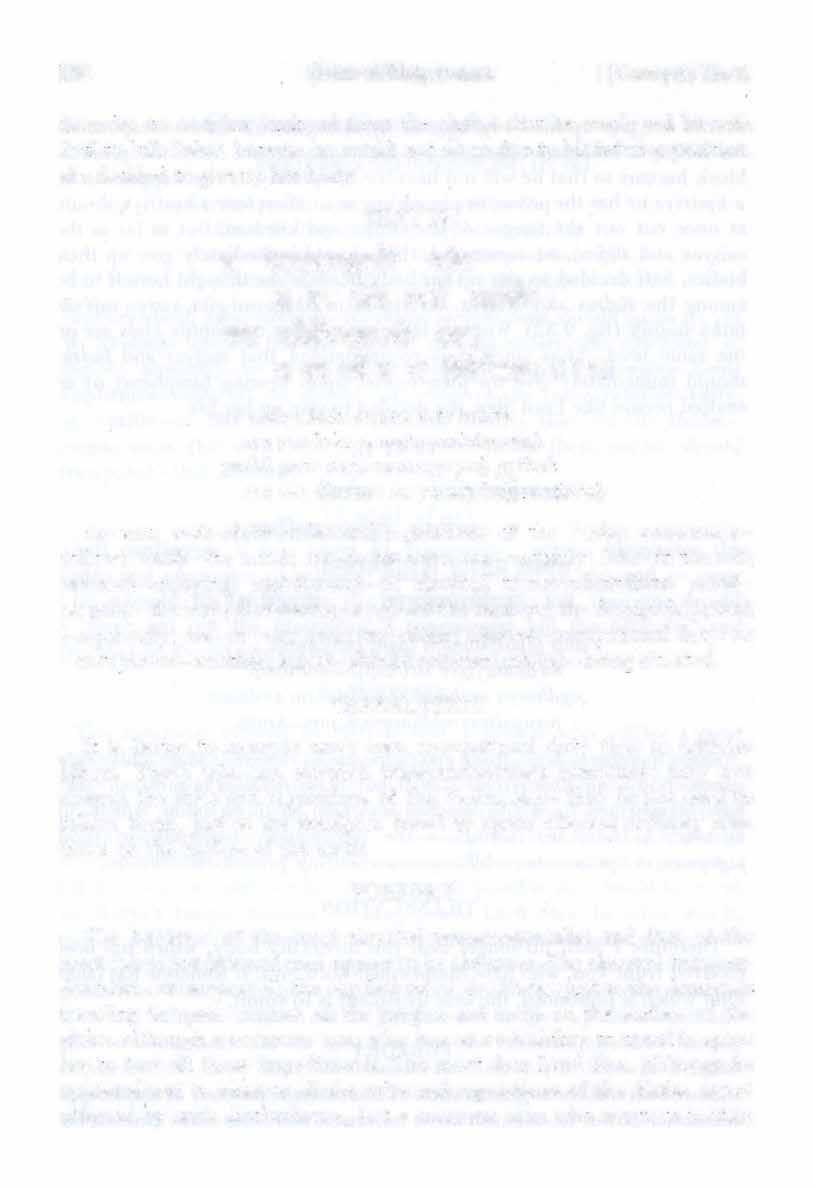
WI �cti(IWiict�a- �: ��itt� .:1
� tiRl�ct+(�Qiti): 'Nii, ���WI qt �f�:-11 ��II
na veda-viidiin anuvartate mati[t sva eva lake ramalo mahiimune{t yatha gatir deva-manu�yayo� prthak sva eva dharme na pararh k�ipet sthita/.1
na-not; veda-viidiin-rules and regulations of the Vedas; anuvartatefoUow; mat*-the mind; sve-in his own; eva-certainly; loke-in the self; ramata�-enjoying; mahiimune�-of elevated transcendentalists; yathiias; gati�-the way; deva-ma nu�yayo �-of the men andthe demigods;prthak -separately; sve-in your own; eva-alone; dharme-occupational duty; na -not; param-another; k�ipet-should criticize; sthita�-being situated.
TRANSLATION
It is better to execute one's own occupational duty than to criticize others. Those who are elevated transcendentalists sometimes may not observe the rules and regulations of the Vedas, since they do not need to follow them, just as the demigods travel in space whereas ordinary men travel on the surface of the earth.
PURPORT
The behavior of the most elevated transcendentalist and that of the most fallen conditioned soul appear to be the same. The elevated transcendentalist can surpass all the regulations of the Vedas, just as the demigods traveling in space surpass all the jungles and rocks on the surface of the globe, although a common man who has no such ability to travel in space has to face aU those impediments. The most dear Lord Siva, although he appeared not to observe all the rules and regulations of the Vedas, is not affected by such disobedience, but a common man who wants to imitate
130 Srimad-Bhagavatam [Canto 4, Ch. 4
Lord Siva is mistaken. A common man must observe all the rules and regulations of the Vedas which a person who is in the transcendental position does not need to observe. Dak�a found fault with Lord Siva for not observing all the strict rules and regulations of the Vedas, but Sati asserted that he had no need to observe such rules. It is said that for one who is powerful like the sun or the fire, there is no considera· tion of purity or impurity. The sunshine can sterilize an impure place, whereas if someone else were to pass such a place he would be affected. One should not try to imitate Lord Siva; rather, one should strictly follow his prescribed occupational duties. One should never vilify a great personality like Lord Siya.
karma pravrttarh ca nivrttam apy rtarh vede vivicyobhaya-lihgam iisritam

virodhi tad yaugapadaikakartari dvayarh tatha brahma(li karma narcchati
karma-activities; pravrttam-attached to material enjoyment; ca-and; nivrttam- materiaLly detached; api-certainly; rtam-true; vede-in the Vedas; vivicya- distinguished; ubhaya-lingam-symptoms of both; iisritam -directed; virodhi-contradictory; tat- that; yauga-pada-ekakartari- both activities in one person; dvayam- two; tathii- so; brahmari-in one who is transcendentally situated; karma-activities; na rcchati-areneglected.
TRANSLATION
In the Vedas there are directions for two kinds of activities-activities for those who are attached to material enjoyment and activities for those who are materially detached. In consideration of these two kinds of activities, there are two kinds of people, who have different symptoms. If one wants to see two kinds of activities in one person, that is contradictory. But both kinds of activities may be neglected by a person who is transcendentally situated.
Text 20] Sati Quits Her Body 131
20 d � � f.ll't+ttqd '"' e it1: �fi«"*4t¥4it�f+ll� I � �Qli(q(�
� i1SI'fUr �� ll�oll
TEXT
Ff
The Vedic activities are so designed that the conditioned soul who has come to enjoy the material world may do so under direction so that at the end he becomes detached from such material enjoyment and is eligible to enter into the transcendental position. The four different social ordersbrahmaciiri, grhastha, viinaprastha andsannyiisa-graduallytrain aperson to come to the platform of transcendental life. The activities and dress of a grhastha or householder are different from those of a sannyiisi, one in the renounced order of life. It is impossible for one person to adopt both orders. A sannyiisi cannot act like a householder, nor can ahouseholder act like a sannyiisi, but above these two kinds of persons, one who engages in material activities and one who has renounced material activities, there is the person who is transcendental to both. Lord Siva was in the transcendental position because, as stated before, he was always absorbed in the thought of Lord Vasudeva within himself. Therefore neither the activities of the grhastha nor those of the sannyiisi in the renounced order can be applicable for him. He is in the paramahamsa stage, the highest perfectional stage of life. The transcendental position of Lord Siva is also explained in Bhagavad-gitii, Second Chapter, verses 52 and 53. It is stated there that when one fully engages intranscendental service of the Lordby performing activities without fruitive results, one is elevated to the transcendental position. At that time he has no obligation to follow the Vedic injunctions or the different rules and regulations of the Vedas. When one is above the directions of the Vedic ritualistic injunctions for attaining different allurements and is fully absorbed in transcendental thought, which means thought of the Supreme Personality of Godhead in devotional service, that position is called buddhi-yoga, or samiidhi, ecstasy. For a person who has attained this stage, neither the Vedic activities for realizing material enjoyment nor those for renunciation are applicable.


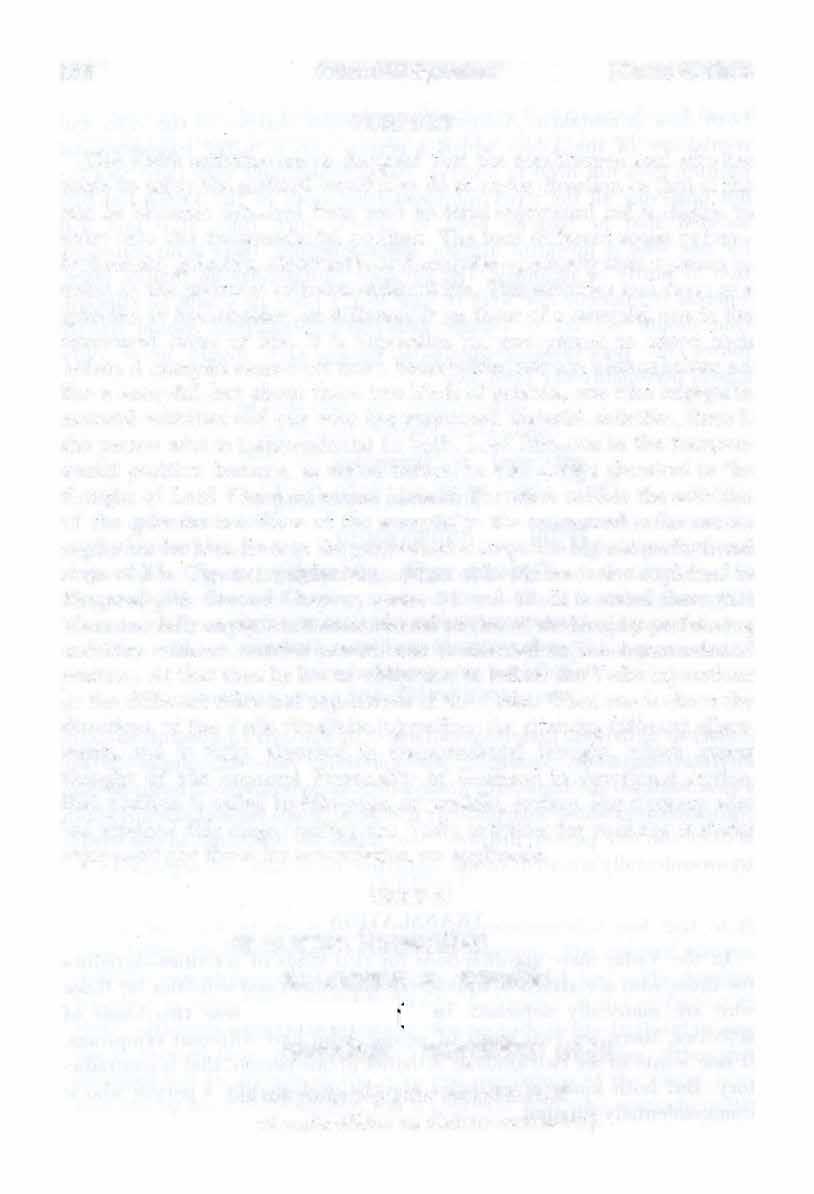
132 Srimad-Bhagavatam [ Canto 4, Ch. 4
PURPORT
ct: �:
qJ 44\I�IR�Iij WI \44ii4�fif: I 310i4'ffifett �: II��II mii va� padavya� pitar asmad-iisthitii yii yajiia-siiliisu na dhuma-vartmabh*
TEXT 21 �
fqij(ijli(f�ij(
tad-anna-trptair
iflita avyakta-linga avadhuta-sevita�
rna-are not; va�-yours; padavya�-opulences; pita�-0 father; asmatiisthitii�- possessed by us; ya�-which (opulences); yajiia-saliisu-in the sacrificial fire; na- not; dhuma-vartmabhi�-by the path of sacrifices; tatanna-trpta*- satisfied by the foodstuff of the sacrifice; asu-bhrdbh*satisfying bodily necessities; i�ita�-praised; avyakta-linga�-whose cause is unmanifested; avadhuta-sevita�-achievedby the self-realized souls.
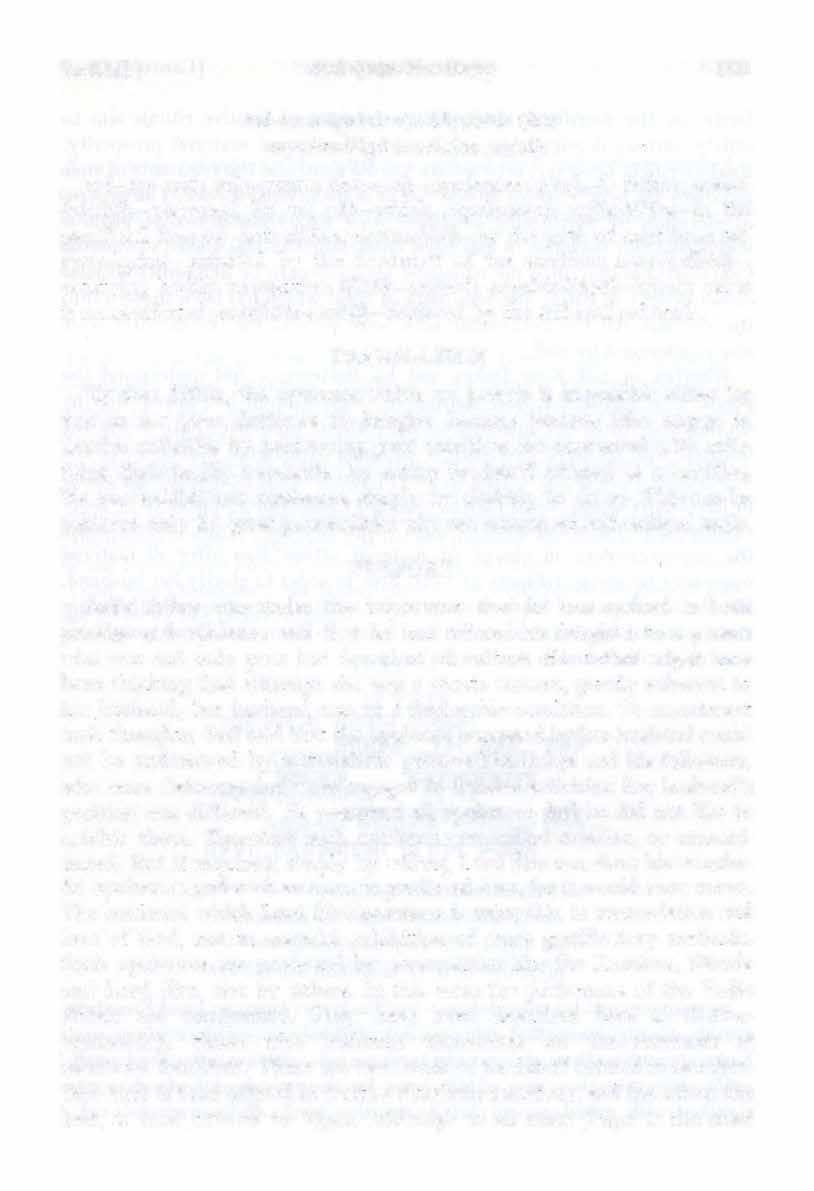
TRANSLATION
My dear father, the opulence which we possess is impossible eitherfor you or for your flatterers to imagine because persons who engage in fruitive activities by performing great sacrifices are concerned with satisfying their bodily necessities by eating foodstuff offered as a sacrifice. We can exhibit our opulences simply by desiring to do so. This can be achieved only by great personalities who are renouncedself-realizedsouls.
PURPORT
Sati's father was under the impression that he was exalted in both prestige and opulence and that he had offered his daughter to a person who was not only poor but devoid of all culture. Her father might have been thinking that although she was a chaste woman, greatly adherent to her husband, her husband was in a deplorable condition. To counteract such thoughts, Satisaid that the opulence possessed byher husband could not be understood by materialistic persons like Dak�a and his followers, who were flatterers and were engaged in fruitive activities. Her husband's position was different. He possessed all opulences, but he did not like to exhibit them. Therefore such opulences are called avyakta, or unmanifested. But if required, simply by willing, Lord Sivacan show his wonderful opulences, and suchan event is predicted here,for it would soonoccur. The opulence which Lord Siva possesses is enjoyable in renunciation and love of God, not in material exhibition of sense gratificatory methods. Such opulences are possessed by personalities like the Kumaras, Narada and Lord Siva, not by others. In this verse the performers of the Vedic rituals are condemned. They have been described here as dhumavartmabh*, those who maintain themselves on the remnants of sacrificial foodstuff. There are two kindsof foodstuff offered in sacrifice. One kind is food offered in fruitiveritualisticsacrifices, and the other, the best, is food offered to Vi�tJ.U. Although in all cases Viwu is the chief
Text 21] Sati Quits Her Body
133
asu-bhrdbhir
Deity on the sacrificial altar, the performers of fruitive rituals aim to satisfy various demigods to achieve in return some material prosperity. Real sacrifice, however, is to satisfy Lord Vi�pu, andthe remnants of such sacrifices arebeneficial for advancement in devotionalservice. The process of elevation by performing sacrifices other than those aimed at Vi�pu is very slow, and therefore it has been condemned in this verse. Visvanatha Cakravartihas described the ritualistic performers to be like crows because crows delight in eating the remnants of food which has been thrown into the dustbin. All the briihmarws who were present for the sacrifice were also condemned by Sati.
Whether or not King Dak�a and his flatterers could understand the position of Lord Siva, Sati wanted to impress upon her father that he should not think her husband to be without opulence. Sati, being the devoted wife of Lord Siva, offers all kinds of material opulences to the worshipers of Lord Siva. This fact is explained in the Srimad-Bhiigavatam, in the Tenth Canto. Lord Siva's worshipers sometimes appear to be more opulent than the worshipers of Lord Vi�qu because Durga, or Sati, being the superintendent in charge of material affairs, can offer all material opulences to the worshipers of Lord Siva in order to glorifyher husband, butthe worshipersof Vi�pu are meant forspiritual elevation,and therefore their material opulence is sometimes found to decrease. These points are verynicelydiscussed in the Tenth Canto.
TEXT 22
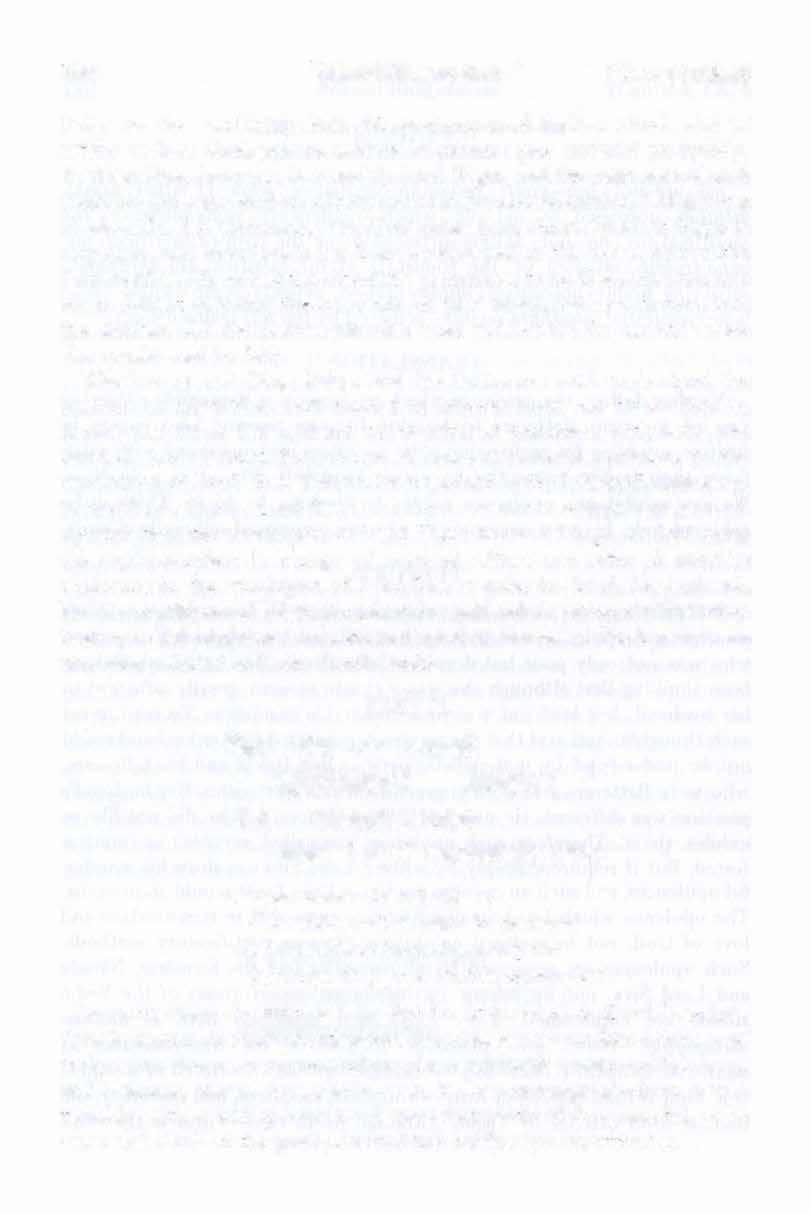
naitena dehena hare krtiigaso
dehodbhaveniilam ala rn ku-janmanii
vri(ia mamabhut ku-jana-prasarigatas
taj janma dhig yo mahatamavadya-krt
na-not;etena-by this;dehena-by the body;hare-to Lord Siva� krtaagasa�-having committed offenses; deha-udbhavena-produced fromyour body;alam alam-enough, enough;ku-janmana-with a contemptiblebirth; vri(iii-shame; mama-my; abhut-was; ku-jana-prasarigata�-from a relationship with a bad person; tat janma-that birth;dhik-shameful; ya�who;mahatam-of the great personalities;avadya-krt-an offender.
134 Srimad-Bhagavatam [Canto 4, Ch. 4
m ��� ��
� � " iflijlttit «if"A�wtlC?S¥4� �� I
'4(ijl'if.tt4t� 11��11
You are an offender at the lotusfeetofLord Siva, andunfortunatelyI have a body producedfrom yours. Iamverymuch ashamedof our bodily relationship,andIcondemnmyselfbecausemy body iscontaminatedby a relationship with a person who is an offender at the lotus feet of the greatestpersonality.
PURPORT
Lord Siva is the greatest of all devotees of Lord Vi�pu. It is stated, vai§rwviiniirh yathii sambhu{t. Sambhu, Lord Siva, is the greatest of all devotees of Lord Vi�pu. In the previous verses Sati has described that Lord Siva is always in a transcendental position because he is situated in pure vasudeva. Vasudeva is the state from which K��qa, Vasudeva, is born, so Lord Siva is the greatest devotee of Lord Kr�f,la, and Sati's behavior is exemplary because no one should tolerate blasphemy against Lord Vi�pu or His devotee. Sati is aggrieved not for her personal association with Lord Siva but because her body is related with that of Dak�a, who is an offender at Lord Siva's lotus feet. She feels herself to be condemned because of the body given by her father, Dak�a.
TEXT 23

ii;I�U4Uft�l�
I 64q6ww4f416+tl1! (f<:;ts(
gvtrarh tvad�yam bhagavan vr�adhvajo dak;;aya!tity aha yada sudurmani'ift vyapcta-narmasmitam iisu tada 'harh
v_yutsrak.s_ya etat kur-aparh tvad-ai�gajam
gotram-family relation hip; tvadiyam-your; bhagaviin-the possessor of all opulences; vr�adhvaja{t- Lord Siva; dak�iiyar.i-Diik�iiyani (the daughter of Dak�a); iti-thus; aha-calls; yadii-when; sudurmanii{t-very morose; vyapeta-disappear; rwmw·smitam- my joiJiness and smile; iisu-immediately; tadii-then; aham-I; vyutsrak�ye-I shall give up; etat-this (body); kur-apam- dead body; tvat-angajam-produced from your body.
Text 23] Sati Quits Her Body 135
TRANSLATION
���l'{!�l
� ��:
�� ��
�ii>f'it(������
TRANSLATION
Because of our family relationship, when Lord Siva addresses me as Dak�aya�i 1 at once become morose, and my jolliness and my smile at once disappear. 1 feel very much sorry that my body, which is just like a bag, has been produced by you, and I shall therefore give it up.
PURPORT
The word diik�iiyaf,li means the daughter of King Dak�a. Sometimes, when there was relaxed conversation between husband and wife, Lord Siva used to call Sati the daughter of King Dak�a, and because this very word reminded her about her family relationship with King Dak�a, she at once became ashamed because Dak�a is an incarnation of all offenses. Dak�a is the embodiment of envy, for he unnecessarily blasphemed a great personality, Lord Siva. Simply upon hearing the word diik�iiyari, she felt afflicted because of reference to the context because her body was the symbol of all the offensiveness with which Dak�a was endowed. Since her body was constantly a source of unhappiness, she decided to give it up.

TEXT 24

maitreya uviica ity adhvare dak,sam anudya satru-han k,sitiiv udicim ni,sasiida siinta-viik spr.stvii jalam pita-dukiila-samvrtii nimilya drg yoga-patham samiivisat
maitreya� uviica-Maitreya said; iti-thus; adhvare-in the arena of sacri· fice; dakfiam- to Dak�a; anudya-speaking ; satru-han-0 annihilator of enemies; kfiitau-on the ground; udtctm- facing north; nifiasiida-sat down; siinta-viik-in silence; sprfitvii-after touching; jalam-water ; pita-dukulasamvrta-dressed in yellow garments; nimtlya- closing; drk- the vision; yoga-patham-the mystic yoga process; samiivisat-became absorbed.
136 Srimad-Bhagavatam [Canto 4, Ch. 4
���
�'li(t1 �
I ....
� tft6�«Mtt61
tuft•lq���
(�&4�
N61!G.l4ffM'ftt
�
f.tlft�
II�\II I
Maitreya the sage told Vidura: 0 annihilator of enemies, while thus speaking to her father in the arena of sacrifice, Sati sat down on the ground and faced north. Dressed in saffron garments, she sanctified herself with water andclosedher eyestoabsorbherself inthemystic yoga process.
PURPORT
It is said that when a man desires to quit his body he dresses in saffron garments. Therefore it appears that Sati changed her dress, indicating that she was going to quit the body given her by Dak�a. Dak�a was Sati's father, so instead of killing Dak�a she decided that it would be better to destroy the part of his body which was hers. Thus she decided to give up the body of Dak�a by the yogic process. Sati was the wife of Lord Siva, who is known as Yogesvara, the best among all yogis, because he knows all the mystic processes of yoga, so it appeared that Sati also knew them. Either she learned yoga from her husband or she was enlightened because she was the daughter of such a great king as Dak�a. The perfection of yoga is that one can give up his body or release himself from the embodiment of material elements according to one's desire. Yogis who have attained perfection are not subject to death by naturaJ laws;such perfect yogis can leave the body whenever they desire. Generally the yogi first of all becomes mature in controlling the air passing within the body, thus bringing the soul to the top of the brain. Then when the body bursts into flames, the yogi can go anywhere he likes. This yoga system recognizes the soul, and thus it is distinct from the so-called yoga process for controlling the cells of the body which has been discovered in the modern age. The real yoga process accepts the transmigration of the soul from one planet to another or one body to another; and it appears from this incidence thai Sati wanted to transfer her soul to another body or sphere.

Text 25] SanQuits Her Body 137 TRANSLATION
TEXT 25 � (1¥41W1Nf.1JI Mijl(1Wil ���:1 � � fi;lt(td�� � �'!�����II krtvii samiiniiv anilaujitiisanii sodiinam utthiipya ca niibhi-cakrata[l
sanair hrdi sthiipya dhiyorasi sthitarh
karthiid bhruvor madhyam aninditiinayat
krtvii-after placing; samiinau-in equilibrium; anilau-the priira and apiina airs; jita-iisanii- having controlled the sitting posture; sti-Satl; udiinam-the life air; utthiipya,-raising; ca-and; niibhi-cakrata[l.-at the circle in the navel; sanai[l.-gradually; hrdi-in the heart; sthapya- placing; dhiyii-withthe intelligence;urasi-towards thepulmonary passage ; sthitam -having been placed; karthat- through the throat; bhruvo[l.-of the eyebrows; madhyam-to the middle;anindita-the blameless (Satl);anayatraised.

TRANSLATION
First of all she sat in the required sitting posture, and then she carried the life air upwards and placed it in the position of equilibrium near the navel. Then she raised her life air, mixed with inteUigence, to the heart and then gradually raised it towards the pulmonary passage and from there to between her eyebrows.
PURPORT
The yogic process is to control the air passing within the body in different places called �at-cakra, the six circles of air circulation. The air is raised from the abdomen to the navel, from the navel to theheart, from the heart to the throat, from the throat to between the eyebrows and from between the eyebrows to the top of the cerebrum. That is the sum and substance of practicing yoga. Before practicing the real yoga system one has to practice the sitting postures because this helps in the breathing exercises which control the airs going upwards and downwards. This is a great technique which one has to practice to attain the highest perfectional stage of yoga, but such practice is not meant for this age. No one in this age can attain the perfectional stage of such yoga, but people indulge in practicing sitting postures, which is more or less a gymnastic process. By such bodily gymnastics one may develop good circulation and may therefore keep his body fit, but if one simply restricts oneself to that gymnastic process one cannot attain the highest perfectionaJ stage. The yoga process, as described in the Kesava-sruti, prescribes how one can control his living force according to his desire and transmigrate from one body to another or from one place to another. In other words, yoga practice is not meant to keep the body fit because any transcendental process of spiritual realization automatically helps one
138 Srimad-Bhagavatam [Canto 4, Ch_ 4
to keep the body fit, for it is the spirit soul that keeps the body always fresh. As soon as the spirit soul is out of the body, the material body immediately begins to decompose. Any spiritual process keeps the body fit without separate endeavor, but if one takes itthat the ultimate aim of yoga is to maintain the body, then he is mistaken. The real perfection of yoga is elevation of the soul to a higher position or the liberation of the soul from material entanglement. Some yogis try to elevate the soul to higher planetary systems where the standard of life is different from that ofthis planetandwhere the material comforts,life span and other facilities for self-realization are greater, and some yogis endeavor to elevate the soul to the spiritual world, the spiritual Vaikm;ttha planets. The bhakti-yoga process directly elevates the soul to the spiritual planets where life is eternally blissful and full of knowledge; therefore bhakti-yoga is considered to be the greatest of all yoga systems.
evarh sva-deharh mahatarh mah�yasa
muhu� samaropitam mikam adarat
jihasatidak�a-ru�a mannsvini
dadhiira giitre§V aniliigni-dhiirariim
evam-thus; sva-deham-her own body; mahatiim-of the great saints; mahiyasa-most worshipful; muhu{l-again and again; samiiropitamseated; ahkam-on the lap; adariit-respectfully; jihiisati-wishing to give up; dak§a-ru§ii-due to anger towards Dak�a; manasvi ni-voluntarily; dadhiira-placed; giitre§u-on the limbs of the body; anila-agni-dhiira[Liimmeditation on the fire and air.

TRANSLATION
Thus, in order to give up her body, which had been so respectfully and affectionately seated on the lap of Lord Siva, who is worshiped by great sages and saints, Sati, due to anger towards her father, began to meditate on the fiery air within the body.
Text 26] Sati Quits Her Body 139
��
u: �c1edl �
-�
TEXT 26 Q ¥4(144(11 �(qij¥41¥41d\(l( � ¥4�
���II
PURPORT
Lord Siva is described herein as the best of all great souls. Although Sati's body was born of Dak�a, Lord Sivaused to adore her by sitting her on his lap. This is considered a great token of respect. Thus Sati's body was not ordinary, but still she decided to give it up because it was the source of unhappiness because of its connection with Dak�a. This severe example set by Sati is to be followed. One should be extremely careful about associating with persons who are not respectful to the higher authorities. It is instructed, therefore, in the Vedic literature that one should always be free from the association of atheists and nondevot:ecs and should try to associate with devotees, for by the association of a devotee one can be elevated to the platform of self-realization. This injunction is stressed in many places in Srimad-Bhiigavatam; if one wants to be liberated from the clutches of material existence, then one has to associate with great souls, and if one wants to continue one's material existential life, then one can associate with persons who are materialistic. The materialistic way of life is based on sex life. Thus both becoming addicted to sex life and associating with persons who are addicted to sex life are condemned in the Vedic literature because such association will simply interfere with one's spiritual progress. However, association with great personalities, devotees who are great souls, will elevate one to the spiritual platform. Satidev1 decided to quit the body which she had obtained from Dak�a's body, and she wanted to transfer herself to another body so that she might have completelyuncontaminated association with Lord Siva. Of course it is understood that in her next life she would take birth as the daughter of the Himalayas, Parvati, and then she would again accept Lord Siva as her husband. Sati and Lord Siva are eternally related; even after she changes her body their relationship is neverbroken.

140 Srimad-Bhagavatam [Canto4, Ch. 4
TEXT 27 �: ����p:� \lltllffiUI*f;:ij�ffl ;r �I � �� �«:1��",: m �: �� �T 11,\911 tala� sva-bhartus cara{!iimbujiisavam jagad-guros cintayati na ciiparam dadarsa deho hata-kalma,sa� sati sadya� prajajviila samiidhijiigninii
tata{l-there; sva-bhartu{!-of her husband; cararta-ambnja-iisavnm-on the nectar of the lotus feet; jagat-guro{!- of the supreme spiritual teacher of the universe; cintayati-meditating; na-not; ca-and; apamm-not other (than her husband); dadarsa-saw; deha{!-her body; hata-kalma§a{!- taints of sin being destroyed; sati- Sati; sadya{!-soon; prajajvala-burned; samadhija-agnina-by fire produced by meditation.
TRANSLATION

Sati concentrated all her meditation on the holy lotus feet of her husband, Lord Siva, who is the supreme spiritual master of all the world, and thus she became completely cleansed of all taints of sin and quit her body in a blazing fire by meditation on the fiery elements.
PURPORT
Sati at once thought of the lotus feet of her husband, Lord Siva, who is one of the three great personalities of Godhead in charge of the management of the material world, and simply by meditating on his lotus feet she derived such great pleasure that she forgot everything in relationship with her body. This pleasure was certainly material because she gave up her body for another body that was also material, but by this example we can appreciate the devotee's pleasure in concentrating his mind and attention on the lotus feet of the Supreme Lord, Vi�p.u or Krwa. There is such transcendental bliss in simply meditating on the lotus feet of the Lord that one can forget everything but the Lord's transcendental form. This is the perfectio n of yogic samiidhi or ecstasy. In this verse it is stated that by such meditation she became free from all contamination. What was that contamination? The contamination was her concept of the body derived from Dak�a, but she forgot that bodily relationship in trance. The purport isthat when one becomes free from all bodily relationships with�n this material world and simply places himself in the position of an eternal servant of the Supreme Lord,it is to be understood that all the contamination of his material attachment has been burnt by the blazing fires of transcendental ecstasy. lt is not necessary for one to manifest a blazing fire externally, for if one forgets all his bodily relationships within this material world and becomes situated in his spiritual i denti ty, it is said that one has been freed from all material contamination by the blazing fire of yogic samiidhi or ecstasy. That is the topmost perfection of yoga. If one keeps hi bodily l'elatiunships within this material world and poses himself as a great yogi, he is not a bona fide yogi. In Srim ad-Bhagavatam, Second Canto, it is stated, yat-hirtanam yat-smara[wrh (Bhag. 2.4.15).
Text 27] Sati Quits Her Body 141
Simply by chanting the holy name of the Supreme Personalityof Godhead, simply by remembering the lotus feet of Kr�l')a, simply by offering prayers to the Supreme Personality of Godhead, one is immediately freed from material contamination, the material bodily concept, by the blazing fire of ecstasy. This effect takes place immediately, without a second's delay. According to Sri jiva Gosviimi, that Sati quit her body means that she gave up within her heart her relationship with Dak�a. Sri Visvanatha Cakravarti Thakur also comments that since Sati is the superintendent deity of the external potency, when she quit her body she did not get a spiritual body but simply transferred from the body she had received from Dak�a. Other commentators also say that she immediately transferred herself into the womb of Menaka, her future mother. She gave up the body she had received from Dak�a and immediately transferred herself to another, better body, but this does not mean that she got a spiritual body.
TEXT 28

tat pasyatiirh khe bhuvi ciidbhutarh mahad
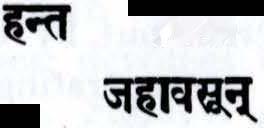
hii heti viidaft su-mahiin ajiiyata hanta priya daivatamasya dev"i jahav aslin kena satfprakopita
tat-that; pasyatiim- of those who had seen; khe-in the sky; bhuvi-on the earth; ca-and; adbhutam-wonderful; mahat- great; hii hii-oh, oh; iti -thus; viidaft-roar; su -mahiin-tumultuous ; ajiiyata- occurred ; harzta-alas; priyii-the beloved; daivatamasya-of the most respectable demigod (Lord Siva); devi-Sati; jahau-quit; asun-her life; kena-by Dak�a; sati- Sati; pral� opita-angered.
TRANSLATION
When Sati annihilated her body in anger, there was a tumultuous roar all over the universe. Why had Sati, the wife of the most respectable demigod, Lord Siva, quit her body in such a manner?
142 Srimad-Bhagavatam [Canto 4, Ch. 4
ij��ijf �� � � � em:: Dij!r.�'"lwt����r.n:q':l'ij fip.n �"ij¥4� � � m stitfqij• ������
There was a tumultuous roaring all over the universe in the societies of the demigods of different planets because Sati was the daughter of Dak�a, the greatest of all kings, and the wife of Lord Siva, the greatest of all demigods. Why did she become so angry that she gave up her body? Since she was the daughter of a great personality and wife of a great personality, she had nothing to desire, but still she gave up her body in dissatisfaction. Certainly this was astonishing. One cannot attain complete satisfaction even if o'ne is situated in the greatest material opulence. There was nothing Sati could not achieve either from her relationship with her father or from her relationship with the greatest of the demigods, but still, for some reason, she was dissatisfied. Therefore, Srimad-Bhiigavatam explains that one has to achieve real satisfaction, but (yayiitmii samprasidati) iitma - the body, mind and soul-all become completely satisfied only if one develops devotional service to the Absolute Truth. Sa vai purhsiirh paro dharmo yato bhaktir adhok§aje. Adhok§aja means the Absolute Truth. If one can develop his unflinching love for the transcen· dental Supreme Personality of Godhead, that can give complete satisfac· tion, otherwise there is no possibility of satisfaction in the material world or anywhere else.
TEXT 29
� 319(1� � �
Sfiitlq�4� � �: I
111CI€1&.� ttfl'461�T m
'iwtrt<lwft
�����II
aho aniitmyam mahad asya pasyata
prajiipater yasya cariicaram prajii� jahiiv asun yad-vimatiitma-ja sati
manasvini miinam abhik§{lam arhati
aho-oh; aniitmyam-neglect; mahat-great; asya-of Dak�a; pasyatajust see; prajiipate�-of the prajiipati; yasya-of whom; cara-acaram-allliv· ing entities; prajii�-offspring; jahau-gave up; asun-her body; yat-by whom; vimata-disrespected; atma-jii-his own daughter; sati-Sati; manasvini-voluntarily; manam:....respect; abhikfir-am-repeatedly; arhatideserved.
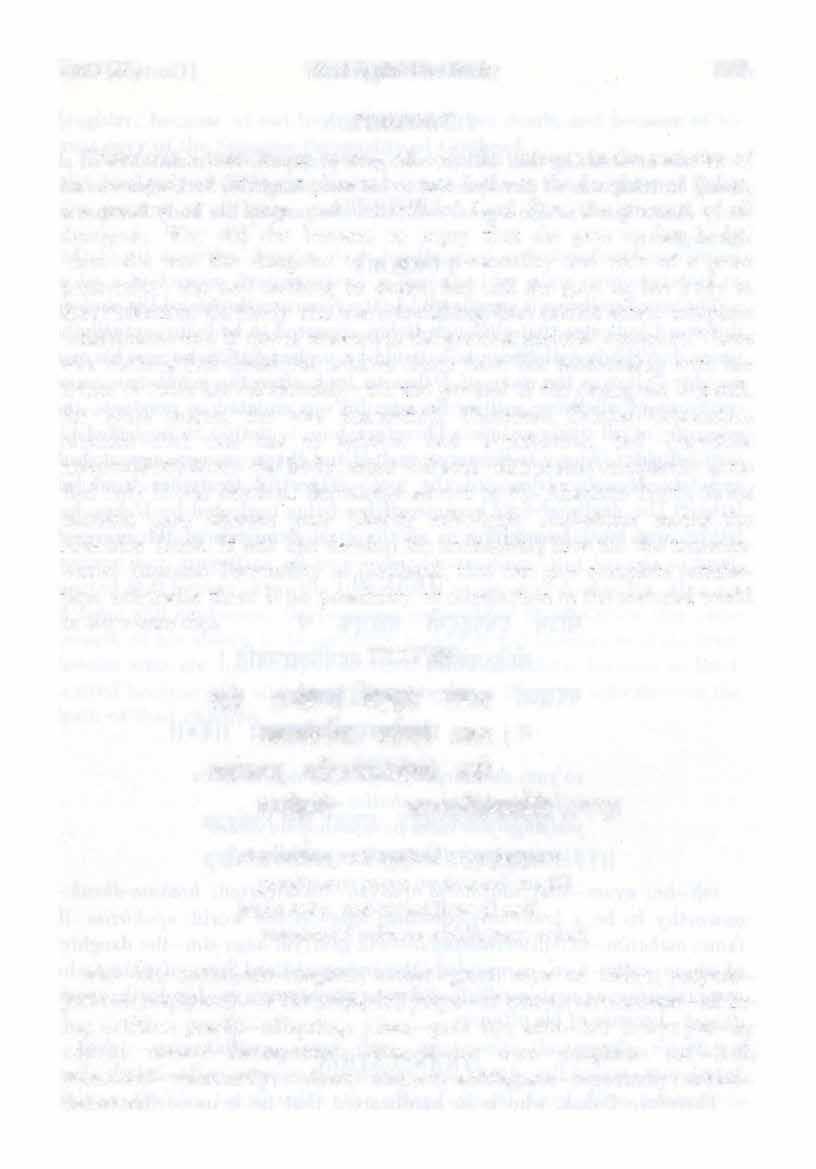
Text29] SatiQuitsHer Body 143
PURPORT
TRANSLATION
It was astonishing that Dak�a, who was prajapati, the maintainer of all living entities, was so disrespectful to his own daughter, Sati, who was not only chaste but was also a great soul, that she gave up her body because of his neglect.
PURPORT
The word aniitmya is significant. Aniitmya means the life of the soul, so this word indicates that although Dak�a appeared to be living, actually he was a dead body, otherwise how could he neglect Sati, who was his own daughter? It was the duty of Dak�a to look after the maintenance and comforts of all living entities because he was situated as prajiipat� the governor of all living entities. Therefore how is it that he neglected his own daughter, who was the most exalted and chaste woman, a great soul, and who therefore deserved the most respectful treatment from her father? The death of Sati because of her being neglected by Dak�a, her father, was most astonishing to all the great demigods of the umverse.
TEXT 30
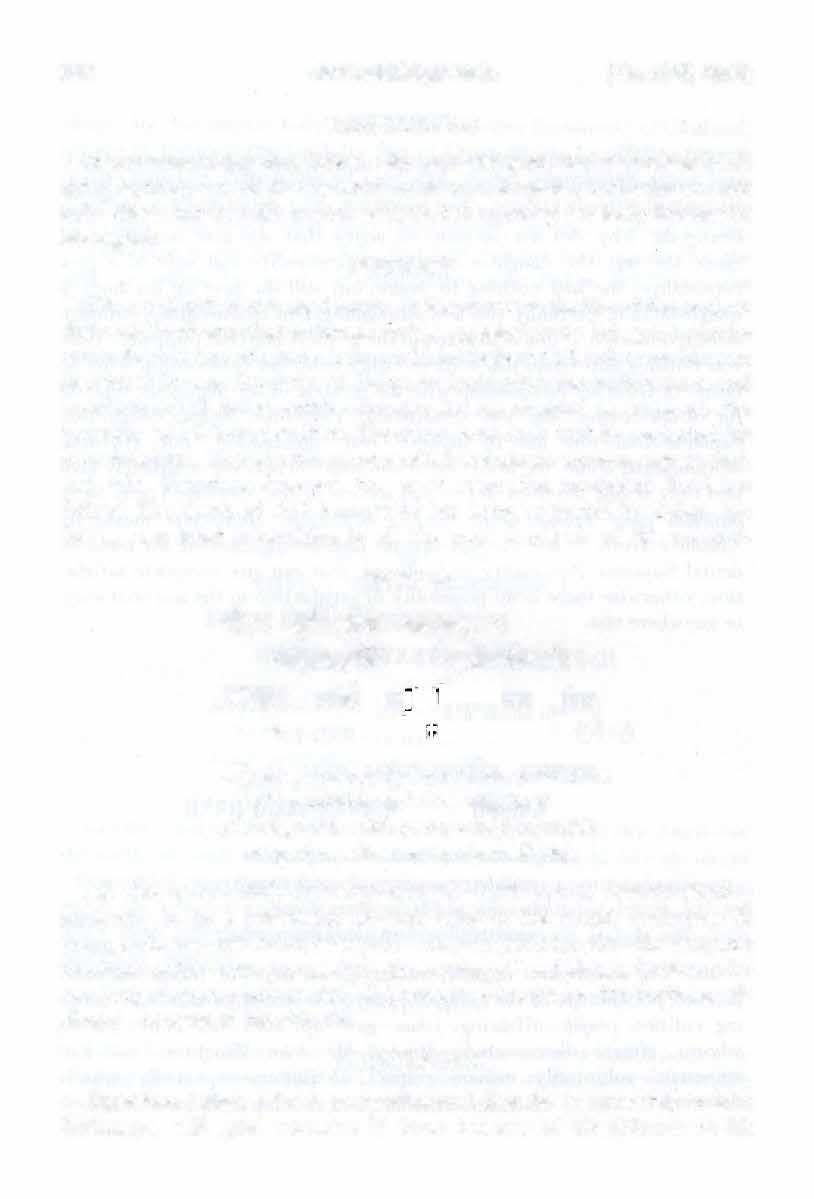
so'yarh durmar�a-hrdayo brahma-dhruk ca
loke 'pakirtirh mahatim aviipsyati
yad-anga-jiirh sviirh puru§a-dvi!l udyatiirh
na pratya�edhan m,rtaye 'pariidhataft
sa{l. - he; ayam-that; durmar§a-hrdaya�-hardhearted; brahma-dhrukunworthy to be a briih marw; ca-and; loke-in the world; apakirtim-ill fame; mahatim-extensive; aviipsyati-will gain; yat -anga-jiim-the daughter of whom; svam-own;puru§a-dvit-the enemyof Lord Siva; udyatam-who was preparing; na pratya�edhat-did not prevent; mrtaye- for death; apariidhata{l.-because of his offenses.




Therefore D�a, who is so hardhearted that he is unworthy to be a brahm�a, will gain extensive ill fame because of his offenses to his

144 Srimad-Bhagavatam [Canto 4, Ch. 4
� ��,(� J\$sqEfllf6� �-- :q' ¥t(d\¥ti!41C@IM I tt(�f � ;r II� o II
TRANSLATION
daughter, because of not having prevented her death, and because of his great envy of the Supreme Personality of Godhead.
PURPORT
Dak�a is described here as most hardhearted and therefore unqualified to be a briihmar-a. Brahma-dhruk is described by some commentators to mean brahma-bandhu, or friend of the brahmar-as. A person who is born in a brahmar-a family but has no brahminical qualifications is called a brahma-bandhu. Brahmar-as are generally very softhearted and forbearing because they have the power to control the senses and the mind. Dak�a, however, was not forbearing. For the simple reason that his son-in-law, Lord Siva, did not stand up to show him the formality of respect, he became so angry and hardhearted that he tolerated even the death of his dearest daughter. Sati tried her best to mitigate the misunderstanding between the son-in-law and the' father-in-law by coming to her father's house, even without an invitation, and at that time Dak�a should have received her, forgetting all past misunderstandings. But he was so hardhearted that he was unworthy to be called an aryan or briihmar-a. Thus his ill fame still continues. Dak�a means expert, and he was given this name because of his ability to beget many hundreds and thousands of children. Persons who are too sexually inclined and materialistic become so hardhearted because of a slight loss of prestige that they can tolerate even the death of their children.

TEXT31

vadaty evam jane satyii dr.stviisu-tyiigam adbhutam
dak.sam tat-piir;�adii hantum udati.sthann udiiyudhii�
vadati-were talking; evam-thus; jane-while the people; satya�-of Sati; drfitvii-after seeing; asu-tyiigam-the death; adbhutam-wonderful; dak . sam- Dak�a; tat-piir�ada[!-the attendants of Lord Siva; hantum-to kill; udatifi.than-stood up; udii.yudhii.ft-with uplifted weapons.
Text31] Sati Quits Her Body 145
TRANSLATION
While people were talking among themselves about the wonderful voluntary death of Sati, the attendants who came with her readied themselves to kill Dak�a with their weapons.
PURPORT
The attendants who came with Sati were meant to protect her from calamities, but since they were unable to protect their master's wife, they decided to die for her, and before dying they wanted to kill Dak�a. It is the duty of attendants to give protection to their master, and in case of failure it is their duty to die.
TEXT 32
te§iim iipatatiirh vegarh nisiimya bhagaviin bhrgu{l yajiia-ghna-ghnena yaju.sii dak.si[liignau juhiiva ha
te§iim-of them; iipatatiim-who were approaching; vegam-the impulse; niSiimya- after seeing; bhagaviin- the possessor of all opulences; bhrgu{lBhrgu Muni; yajiia-ghna-ghnena-for killing the destroyers of the yajiia; yaju;Sii- with hymns of the Yajur-veda; dak§irw-agnau-in the southern side of the sacrificial fire; juhiiva-offered oblations; Ita-certainly.
TRANSLATION
They came forward forcibly, but Bhrgu Muni saw the danger and, offering oblations into the southern side of the sacrificial fire, immediately uttered mantric hymns from the Yajur-veda by which the destroyers of yajfiik performances could be killed immediately.
PURPORT
Here is one example of powerful hymns in the Vedas which, when chanted, could perform wonderful acts. In the present age of Kali it is not possible to find expert mantra chanters; therefore all the sacrifices recommended in the Vedas are forbidden in this age. The only sacrifice recommended in this age is the chanting of the Hare Kr�l)a mantra because in this age it is not possible to accumulate the needed funds for performing

146 Srimad-Bhagavatam [Canto 4, Ch. 4
�Jtl+ilq(f(fj � Mtlll¥44 ��g: I �ri" �' � �m � ������
sacrifices, not to speak of finding expert briihmap.as who can chant the mantras perfectly.
TEXT 33
3l�� � � ��ml
� ;m� � � srnn: �: 11��11
adhvaryup.ii huyamiine devii utpetur ojasii
rbhavo niima tapasii somam priip tii[l sahasrasa[l
adhvaryup.ii-by the priest, Bhrgu; huyamiine-oblations being offered; devii�-demigods; utpetu[t- became manifested; ojasii- with great strength; rbhava. h- the :(tbhus; niima-named; tapasii-by penance; somam-Soma; priiptii�- having achieved; sahasrasa�-by the thousands.
TRANSL ATION
When Bhrgu Muni offered oblations in the fire, immediately many thousands of demigods named J;tbhu became manifested. All of them were powerful, having achieved strength from Soma, the moon.
PURPORT
It is stated here that many thousands of demigods named J;tbhus became manifested because of the oblations offered in the fire and the chanting of the hymns from the Yajur-veda. Briihmap.as like Bhrgu Muni were so powerful that they could create such powerful demigods simply by chanting the Vedic mantras. Vedic mantras are still available, but the chanters are not. By chanting Vedic mantras or chanting the Giiyatri or fl.g-mantra one can attain the results he desires. In the present age of Kali it is recommended by Lord Caitanya that simply by chanting Hare Kr�IJ.a one can attain all perfection.
TEXT 34
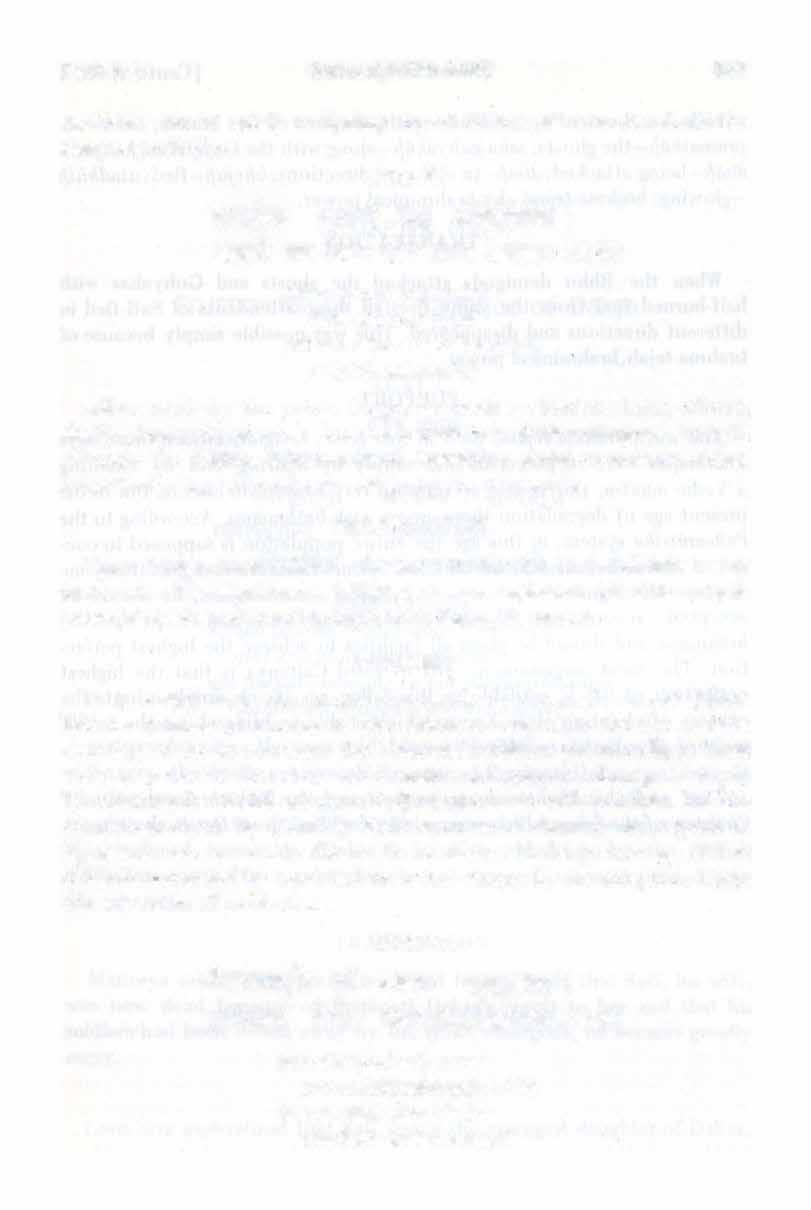
�m�il: � �'"": «��ctil: 1
��1Wll �� �����m�l51(il II�CJII
tair aliitiiyudha* sarve
pramathii[l saha-guhyakii� hanyamana diso bhejur
usadbhir brahma-tejasii
Text 34] Sati Quits Her Body 147
taift-by them; aliita-iiyudhaift-with weapons of fire brands; sarve-all; pramathii�-the ghosts; saha-guhyakii[t-along with the Guhyakas; hanyamiiniift- being attacked; disaft - in different directions; bhejuft-fled j usadbhift -glowing; brahma-tejasii-by brahminical power.
TRANSLATION
When the J.U>hu demigods attacked the ghosts and Guhyakas with half-burned fuel from the yajfia fire, all these attendants of Sati fled in different directions and disappeared. This was possible simply because of brahma-teja):t,brahminical power.
PURPORT
The word brahma-tejasii, used in this verse, is significant. In those days briihmaras were so powerful that simply by desiring and by chanting a Vedic mantra, they could accomplish very wonderful effects. But in the present age of degradation there are no such briihmaras. According to the Pancariitrika system, in this age the entire population is supposed to consist of sudras because the brahminical culture has been lost. But if anyone displays the signs of understanding Kf�l}a consciousness, he should he accepted, according to Vai�pava smrti regulations, as a prospective briihmara and should be given all facilities to achieve the highest perfection. The most magnanimous gift of Lord Caitanya is that the highest perfection of life is available in this fallen age if one simply adopts the process of chanting Hare Kr�Q.a, which is able to bring about the fulfillment of all activities in self-realization.
Thus end the Bhaktivedanta purports of the Fourth Canto, Fourth Chapter, of the Srimad-Bhagavatam, entitled "Safi Quits Her Body."
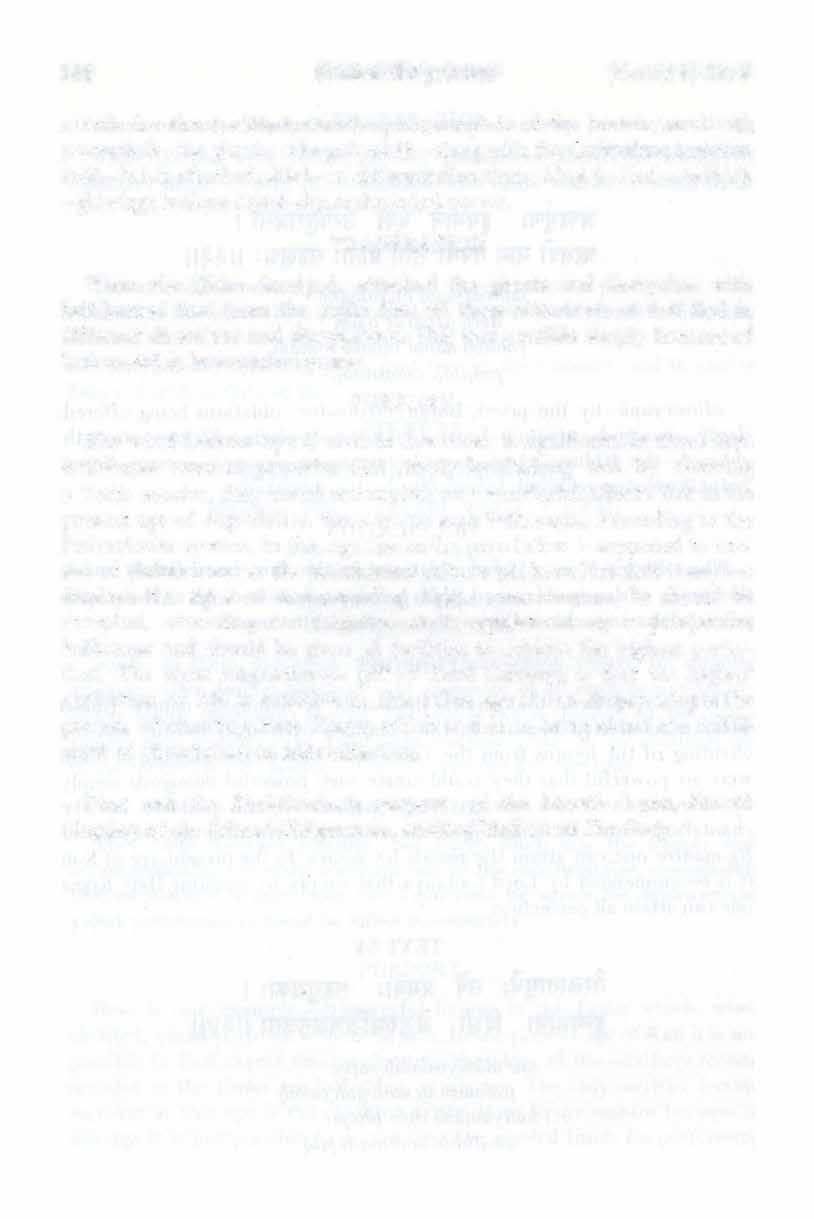
148 Srimad-Bhagavatam [Canto 4, Ch. 4
CHAPTER FIVE
Frustration of the sacrifice of Dak$3
TEXT l
�ll \ffl'f/
maitreya uvaca
bhavo bhavanya nidhanam prafapater asat-krtiiya avagamya naradiit
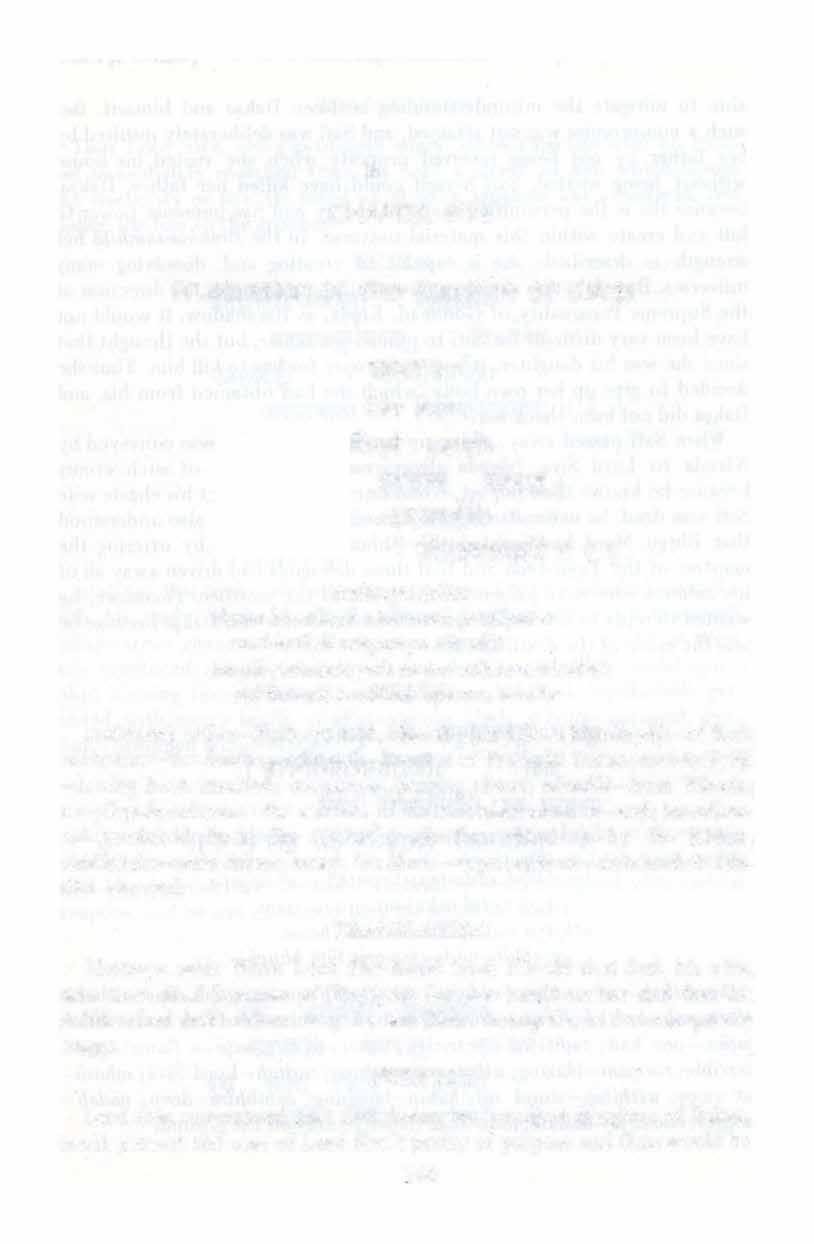
sva-piirfiada-sainyam ca tad-adhvararbhubhir vidravitam krodham aparam iidadhe
maitreya� uviica- Maitreyasaid; bhava�-Lord Siva; bhavanya]l-of Sati; nidhanam-the death; prafapate�-becauseof Prajapati Dak�a; asat-krtaya[l. -having been insulted; avagamya-hearing about; niiradiit-from Narada; sva-parfiada-sainyam-the soldiers ofhis own associates; ca-and; tat-adhvara-(produced from) his (Dak�a's) sacrifice; rbhubhi[r.-by the :{tbhus; vidriivitam-were driven away; krodham-anger;apiiram-unbounded; adadhe-showed.
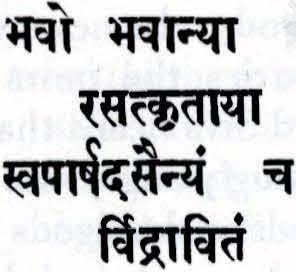
TRANSLATION
Maitreya said: When Lord Siva heard from Narada that Sati, his wife, was now dead because of Prajapati Dak�a's insult to her and that his soldiers had been driven away by the J;tbhu demigods, he became greatly angry.
PURPORT
Lord Siva understood that Sati, being the youngest daughter of Dak�a, could present the case ofLord Siva's purity of purpose and thus would be
f;N;t �m3(t{� �I �":R��11�11
149
able to mitigate the misunderstanding between Dak�a and himself. But such a compromise was not attained, and Sati was deliberately insulted by her father by not being received properly when she visited his house without being invited. Sati herself could have killed her father, Dak�a, because she is the personified material energy and has immense power to kill and create within this material universe. In the Brahma-sarhhitii her strength is described: she is capable of creating and dissolving many universes. But although she is so powerful, she acts under the direction of the Supreme Personality ·of Godhead, Kr�q.a, as His shadow. It would not have been very difficult for Sati to punish her father, but she thought that since she was his daughter, it was not proper for her to kill him. Thus she decided to give up her own body, which she had obtained from his, and Dak�a did not even check her.
When Sati passed away, giving up her body, the news was conveyed by Narada to Lord Siva. Narada always carries the news of such events because he knows their import. When Lord Siva heard that his chaste wife Sati was dead, he naturally became exceedingly angry. He also understood that Bhrgu Muni had created the J;tbhudeva demigods by uttering the mantras of the Yajur-veda and that these demigods had driven away all of his soldiers who were present in the arena of the sacrifice. Therefore, he wanted to reply to this insult, and thus he decided to kill Dak�a because he was the cause of the death of Sati.
TEXT2
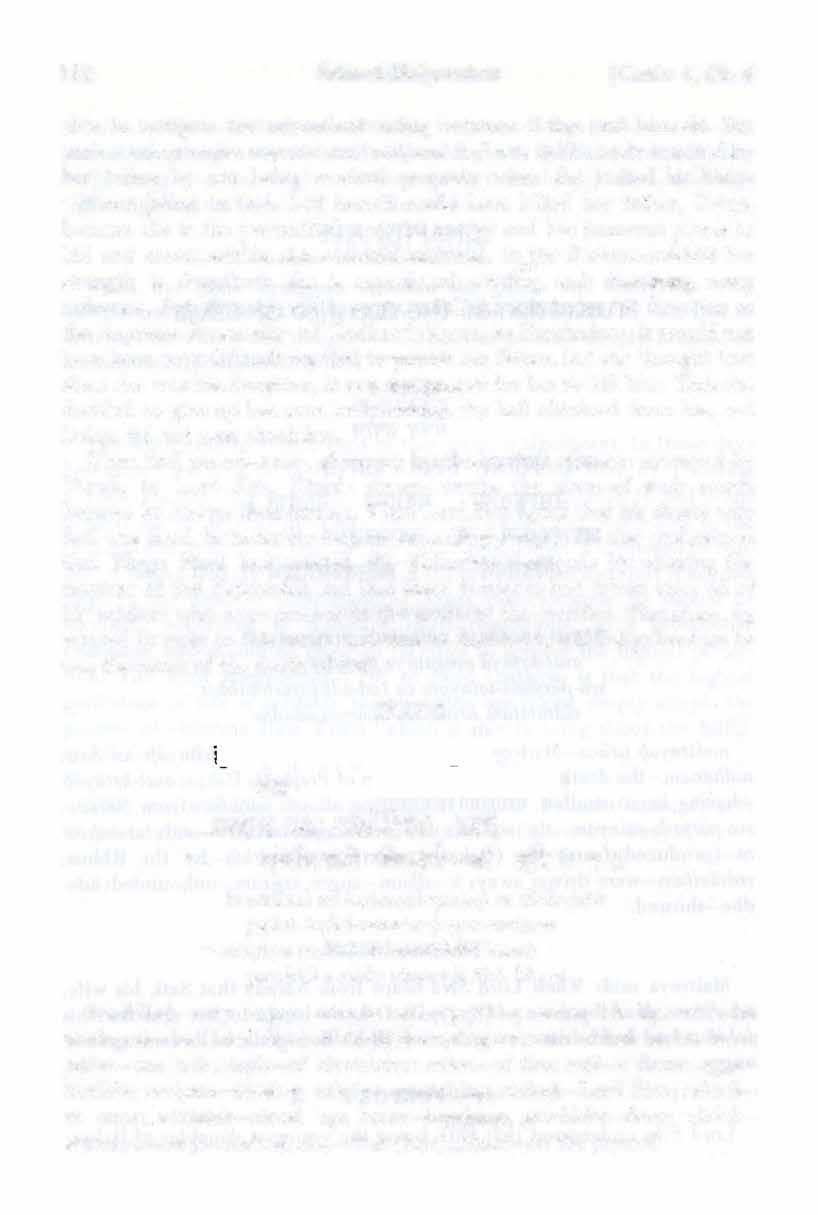
��:��) �'l �� f%� m W?r II � II
kruddha[l suda�tau�thaputalt sa dhur-ja(ir
jatiirh ta{lid-vahni-satogra-roci�am
utkrtya rudra[l sahasotthito hasan gambhi"ra-niido visasarja tam bhuvi
kruddha[l-very angry; suda�fa-o�fha-puta[l-pressing his lips with his teeth; sa�- he (Lord Siva);dhii[l-jati[l-having a cluster of hair on his head; jafiim-one hair; ta{lit-of electricity; vahni-of fire; satii-a flame; ugraterrible; roci�am- blazing; utkrtya-snatching ; rudra[l- Lord Siva; sahasiiat once; utthitafi.-stood up; hasan-laughing; gambhira-deep; niida[lsound; visasarja-dashed; tam-that (hair); bhuvi-on the ground.



150 Srimad-Bhagavatam [Canto 4, Ch. 5
R: �� I
TRANSLATION
Thus Lord Siva, being extremely angry, pressed his lips with his teeth and immediately snatched from his head a strand of hair which blazed like electricity or fire. He stood up at once, laughing like a madman, and dashed the hair to the ground.
tato'tikiiyas tanuvii sprsan divam sahasra-biihur ghana-ruk tri-surya-drk kariila-dam�tro jvalad-agni-murdhaja� kapala-miili vividhodyatiiyudha�
tata�-at this time; atikaya�-a greatpersonality(Virabhadra); tanuviiwith his body; sprsan-touching; divam-the sky; sahasrd-a thousand; bahuft-arms; ghana-ruk-of black color; tri-surya-drk-as bright as three suns combined; kariila-dam�tra�-having very fearful teeth; jvalat-agni(like) burning fire; murdhaja�-having hair on his head; kapala-miili-garlanded with men's heads; vividha-various kinds; udyata-upraised; iiyudha�-equipped with weapons.
TRANSLATION

A fearful black demon as high as the sky and as bright as three suns combined was thereby created, his teeth very fearful and the hairs on his head like burning fire. He had thousands of arms equipped with various weapons, and he was garlanded with the heads of men.
TEXT4


Text4) Frustration of the Sacrifice of Da�a 151
mfi� e"'"'!�wt.:i'lfi f,m_�� 1
iRteG:Rt'l�: "'
ft�:
TEXT3 �«tsRtEfittt(ij�'
�it
cm��T
II �II
�:I fiJ:lliif
Srimad-Bhagavatam
tam kim karomiti grrwntam aha baddhaiijalim bhagavan bhuta-natha� dakfiam sa-yajiiam jahi mad-bhatiinam
tvam agrartz rudra bha(iimsako me

tam-to him (Virabhadra); kim-what; karomi-shall I do; iti-thus; gnwntam-asking; aha-ordered; baddha-aiijalim-with folded hands; bhagavan -the possessor of all opulences (Lord Siva); bhiita-niitha�-the lord of the ghosts; dak,sam- Daksa; sa-yajiiam-along with his sacrifice; jahikill; mat-bhaf'iiniim-of all my associates; tvam-you; agrariT{l-the chief; rudra-0 Rudra; bhata-0 expert in battle; amsaka�-born of my body; me-my.
TRANSLATION
When that gigantic demon asked with folded hands, "What shall I do, my lord?"Lord Siva, who is known as Bhiitanatha, directly ordered, "Because you are born from my body, you are the chief of all my associates. Therefore, kill Da�a and his soldiers at the sacrifice."
PURPORT
Here is the beginning of competition between brahma-tejas and Siva-tejas. Bhfgu Muni had, created the J;tbhu demigods, who had driven away the soldiers of Lord Siva stationed in the arena, by his brahma-tejas, brahminical strength. When Lord Siva heard that his soldiers had been driven away, he created the tall black demon Virabhadra to retaliate. There is sometimes a competition between the mode of goodness and the mode of ignorance. That is the way of material existence. Even when one is situated in the mode of goodness, there is every possibility that his position will he mixed with or attacked by the modes of passion or ignorance. That is the law of material nature. Although pure goodness, or suddha-sattva, is the basic principle in the spiritual world, pure manifestation of goodness is not possible in this material world. Thus, the struggle for existence between different material qualities is always present. This quarrel between Lord Siva and Bhrgu Muni, centering around Prajapati Dak�a, is the practical example of such competition between the different qualitative modes of material nature.
152
[Canto 4, Ch.5
TEXT5 311Q�� � � �� q�:qifi� �I
it�tt(1f � �: ��1{.II '-\ II
ajiiapta evam kupitena manyunii sa deva-devam paricakrame vibhum mene tadiitmanam asanga-rarhhasa mah�yasam tiita sahaft sahi;�r.um

ajiiapta�-being ordered; evam-in this manner; kupitena- angry; manyuna-by Lord Siva (who is anger personified);saft-he (Virabhadra);devadevam-he who is worshiped by the demigods;paricakrame-circumambulated; vibhum-Lord Siva;mene-considered; tadii-at that time;iitmanam -himself; asanga-ramhasa-with the power of Lord Siva that cannot be opposed;mahl'yasam-of the most powerful;tata-my dear Vidura;sahaftstrength;sahifirtum-capable to cope with.


TRANSLATION
Maitreya continued: My dear Vidura, that black person was the personified anger of the Supreme Personality of Godhead,. and he was prepa,red to execute the orders of Lord Siva. Thus, considering himself capable of coping with anypower offered against him, he circumambulated Lord Siva.
anviyamiina� sa tu rudra-piir�adair bhrsam nadadbhir vyanadat su-bhairavam
udyamya siilam jagad-antakantakam sampriidravad ghofiarw-bhufiaflanghr*
anviyamanaft-being followed; �aft-he (Virabhadra); tu-but; rudrapar§adaift- by the soldiers of Lord Siva;bhrsam-tumultuously;nadadbhift -roaring;vyanadat-sounded;su-bhairavam-very fearful;udyamya- carrying;sillam-a trident;jagat-antaka- death ;antakam- killing;sampradravathurried towards (the sacrifice of Dak�a);gho§arw-roaring;bhii�a!la-anghrift -with bangles on his legs.
� �s�¥tlwt'4(1F6:(11
Text6) Frustration of the Sacrifice of Dakl!a
153
� ��wtG>f.Ao4�1 �111\"0IIe�:
31;:eftttitl'f: (1 � � w;f (1+'!tl"�' TEXT6
II � II
TRANSLATION
Many other soldiers of Lord Siva followed the fierce personality in a tumultuous uproar. He carried a great trident, fearful enough to kill even death, and on his legs he wore bangles which seemed to roar.
TEXT7

3ftllitf\ill f4ijj¥41WI: �: 44fi�"*4i SI�Uft\"4 �I
�: '"ij*
AA���� �: 11\911
athartvijo yajamanalt sadasyalt
kakubhy udicyiim prasam'ik§ya re11um tamalt kim etat kuta etad rajo'bhud iti dvifo dvija-patnyas ca dadhyult
atha-at that time; rtvija�-the priests; yajamiina�-the chief person performing the sacrifice (Dak�a); sadasyii�-all the persons assembled in the sacrificial arena; kakubhi udicyiim-in the northern direction; prasamikna -seeing; rerzum-the dust storm; tama�-darkness; kim-what; etat-this; kuta�-from where; etat-this; raja�-dust; abhiit-has come; iti-thus; dvijii�-the briihmacws; dvija-patnya�-the wives of the briihmaras; caand; dadhyu�-began to speculate.
TRANSLATION
At that time, all the persons assembled in the sacrificial arena-the priests, the chief of the sacrificial performance, and the brihmu:tas and their wives-wondered where the darkness was coming from. Later they could understand that it was a dust storm, and all of them were full of anxiety. TEXTS Ql1
154 Srimad-Bhagavatam [Canto 4, Ch. 5
�Sl{
WI�
�� �: ri�� ilwc::oc: 1
WIEfiiCN;:ij
�SWR fit SI\JS44144
WIft
""'
� tm 00
� II � II
Frustration of the Sacrifice of Da�a
vata na viinti na hi santi dasyava"{l. pracina-barhir jlvati hogra-da{l{ia"{l. gavo na kalyanta idam kuto rajo loko'dhuna kim pralayaya kalpate



vata�-thewinds; na vanti-are not blowing;na-not;hi-because;santiare possible; dasyava�-plunderers; priicina-barhi]l-old King Barhi;jivatiisliving;ha-still; ugra-da11fla�-whowould sternly punish;gava�- the cows; na kalyante- are not being driven; idam-this; kuta"{l.-from where; raja�dust;loka�-theplanet; adhunii-now;kim-is it;pralayiiya-for dissolution; kalpate- to be considered ready.
TRANSLATION
Conjecturing on the origin of the storm, they said: There is no wind blowing, and there are no cows passing, nor is it possible that this dust storm could be raised by plunderers because still there is the strong King Barhi, who would punish them. Where is this dust storm blowing from? Is the dissolution of this planet now to occur?
PURPORT
Specifically significant in this verse is priicinabarhir jivati. The king of that part of the land was known as Barhi, and although he was old, he was still living, and he was a very strong ruler. Thus there was no possibility of thieves and plunderers invading. Indirectly it is stated here that thieves, plunderers, rogues and unwanted population can exist only in a state or kingdom where there is no strong ruler. When, in the name of justice, thieves are allowed liberty, the state and kingdom are disturbed by such plunderers and unwanted population. The dust storm created by the soldiers and assistants of Lord Siva resembled the situation at the time of the dissolution of this world. When there is a need for the dissolution of the material creation, this function is conducted by Lord Siva. Therefore the situation now created by him resembled the dissolution of the cosmic manifestation.


Text9]
155
TEXT9 Q.�t: �a-lb� i§ii�lctd m�� � 1 tt�q'W�f WIT �����
prasuti-misra� striya udvigna-citta ucur vipiiko vrjinasyaiva tasya yat pa5yant"iniim duhitfr.iim prajesa{l sutam safirn avadadhyav aniigam

prasuti-misrii�-headed by Prasuti; striya� - the women; udvigna-cittii�being very anxious; U:cu�-said; vipiika{l-the resultant danger; vrjinasyaof the sinful activity; eva-indeed; tasya- his (Dak�a's); yat - because; pas'yant"inam- who were looking on; duhitff}iim- of her sisters; prajdal).the lord of the created beings (Dak�a); sutiim-his daughter; satim- Sati; avadadhyau-insulted; aniigiim-completely innocent.

TRANSLATION
Prasuti, the wife of Da�a, along with the other women assembled, became very anxious and said: This danger has been created by Da�a because of the death of Sati, who, even though completely innocent, quit her body as her sisters looked on.

PURPORT
Prasuti, being a softhearted woman, could immediately understand that the imminent danger approaching was due to the impious activity of hardhearted Prajapati Dak�a. He was so cruel that he would not save her youngest daughter, Sati, from the action of committing suicide in the presence of her sisters. Sati's mother could understand how much Sati had been pained by the insult of her father. She had been present along with the other daughters, and Dak�a had purposely received all of them but her because she happened to be the wife of Lord Siva. This consideration convinced the wife of Dak�a of the danger which was now ahead,and thus she knew that Dak�a must be prepared to die for his heinous action.
156 .Srimad-Bhagavatam
[Canto 4, Ch. 5
10 �*'�••� � 9@4&fd\iji(!AGJ��··�,.(1(ij'1��'fi II� o II .... yas tv anta-kale vyupta-jatii.-kaliipa� sva-sula-sucy-arpita-dig-gajendraf!
TEXT
ya�-who (Lord Siva); tu-but; anta-kiile-at the time of dissolution; vyupta-having scattered; jata-kalapa�-his bunch of hair; sva-siila-- hisown trident; suci-on the points; arpita-pierced;dik-gajendraft- the rulers of the different directions; vitatya-scattering; nrtyati- dances; ndita - upra i sed; astra- weapons ;do{l- hands; dhvajan- flags;ucca-loud;a ttahasa-laughing; stanayitnu-by the thundering sound;bhinna-divided;dik-the directions.

TRANSLATION

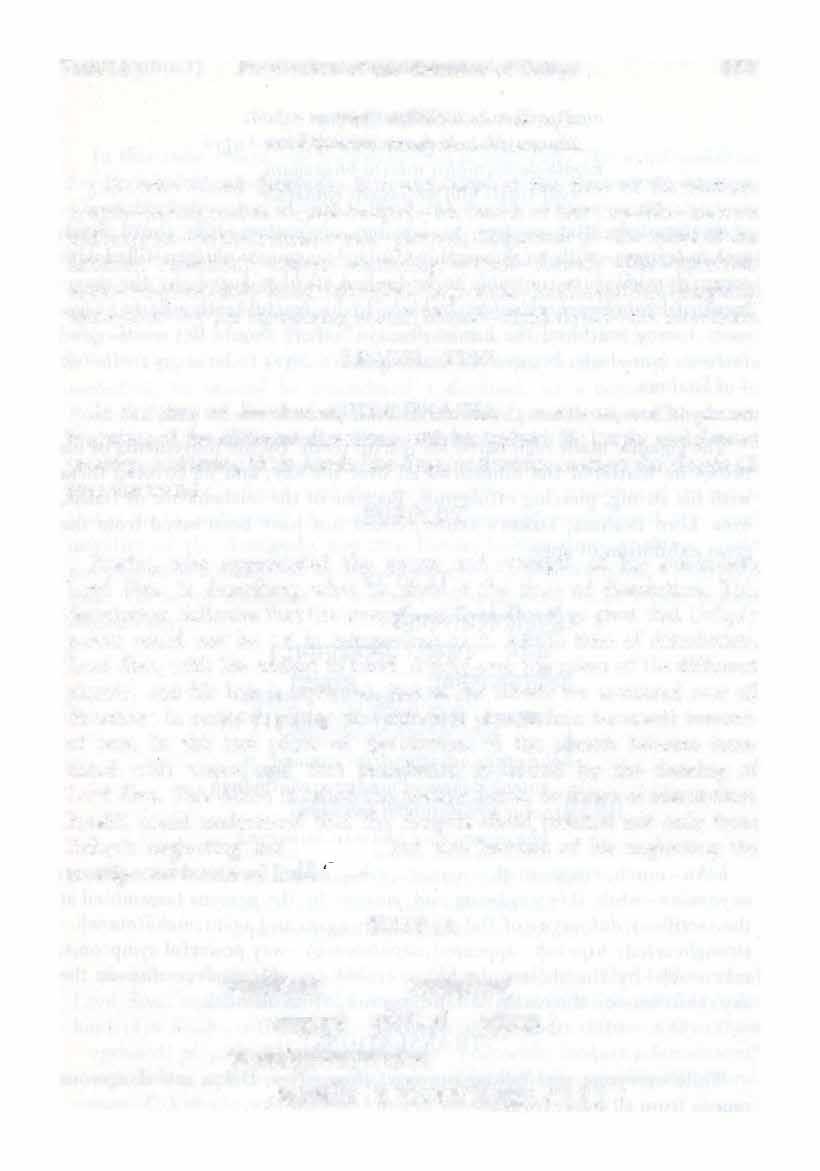
At the time of dissolution, Lord Siva's hair is scattered, and he pierces the rulers of the different directions with his trident. He laughs and dances proudly, scattering their hands like flags, as thunder scatters the clouds all over the world.
PURPORT
Prasiiti, who appreciated the power and strength of her son-in-law, Lord Siva, is describing what he does at the time of dissolution. This description indicates that the strength of Lord Siva is so great that Dak�a's power could not be set in comparison to it. At the time of dissolution, Lord Siva, with his trident in hand, dances over the rulers of the different planets, and his hair is scattered, just as the clouds are scattered over all directions in order to plunge the different planets into incessant torrents of rain. In the last phase of dissolution, all the planets become inundated with water, and that inundation is caused by the dancing of Lord Siva. This dance is called the pralaya dance, or dance of dissolution. Prasiiti could understand that the dangers ahead resulted not only from Dak�a's neglecting her dau hter, but also because of his neglecting the prestige and honor of Lord Siva.
Text 11] Frustration of the Sacrifice of Da�a vitatya nrtyaty uditastra-dor-dhvajan ucciittahiisa-stanayitnu-bhinna-dik 157
11 :su•4��. {f'«''Qm ���� �q !P'TI 'MI�(,if't(i((6+tl•laf ������qttffi�:II��II
TEXT
amar}ayitva tam asahya-tejasam
manyu-plutam durnir"'ik�yam bhru-kutyii
kariila-dam�triibhir udasta-bhagartam
syat svasti kim kopayato vidhatuft
amar�ayitva-after causing to become angry; tam-him (Lord Siva); asahya-tejasam-with an unbearable effulgence;manyu-plutam-filled with anger;durnirik�yam-not able to be looked at; bhru-kutya-by the movement of his brows;karala-dam�triibh*-by his fearful teeth;udasta-bhiiga!lam-having scattered the luminaries;syiit-there should be;svasti-good fortune;kim-how;kopayata�-causing (Lord Siva) to be angry;vidhiituft -of Brahma.
TRANSLATION
The gigantic black man bared his fearful teeth. By the movements of his brows he"scattered the luminaries all over the sky, and he covered them with his strong, piercing effulgence. Because of the misbehavior of Da�, even Lord Brahma, Da�a's father, could not have been saved from the great exhibition of anger.
TEXT 12

�
utic•€44"': 1
\kq�166¥U: (1«1�
¥t41q81 AA � � . ,II��II
bahv evam udvigna-drsocyamane
janena dak�asya muhur mahiitmanaft
utpetur utpatatama� sahasraso
bhayiivaha divi bhumau ca paryak
bahu-much;evam-in this manner;udvigna-drsa-with nervous glances; ucyamane-while this was being said;janena-by the persons (assembled at the sacrifice);dak�asya-of Da�a;muhu�-again and again;mahiitmana�stronghearted; utpetu�-appeared;utpiitatamii�-very powerful symptoms; sahasras'a�-by the thousands; bhaya-iivahii�-producing fear;divi-in the sky;bhumau-on the earth;ca-and;paryak-from all sides.


TRANSLATION
While everyone was talking amongst themselves, D�a saw dangerous omens from all sides, from the earth and from the sky.
158
Srimad-Bhagavatam
[Canto 4, Ch. 5
In this verse Dak�a has been described as mahatma. The word mahiitma has been commented upon by different commentators in various manners. Viraraghavadirya has indicated that this word mahatma means steady in heart. That is to say that Dak�a was so stronghearted that even when his beloved daughter was prepared to lay down her life, he was steady and unshaken. But in spite of his being so stronghearted, he was perturbed when he saw the various disturbances created by the gigantic black demon. Visvanatha Cakravarti Thakur remarks in this connection that even if one is called mahiitmii, a great soul, unless he exhibits the symptoms of a mahiitmii, he should be considered a duriitmii, or a degraded soul. In Bhagavad-gitii the word mahatma describes the pure devotee of the Lord: mahiitmiinas tu miim piirtha daivim prakrtim iiSritafl. (Bg. 9.13). A mahiitmii is always under the guidance of the internal energy of the Supreme Personality of Godhead, and thus how could such a misbehaved person as Dak�a be a mahiitma? A mahatma is supposed to have all the good qualities of the demigods, and thus Dak�a, lacking those qualities, could not be called a mahatma; he should instead be called duriitmii, a degraded soul. The word mahiitmii to describe the qualifications of Dak�a is used sarcastically.
TEXT 13
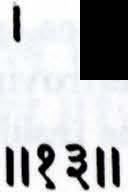
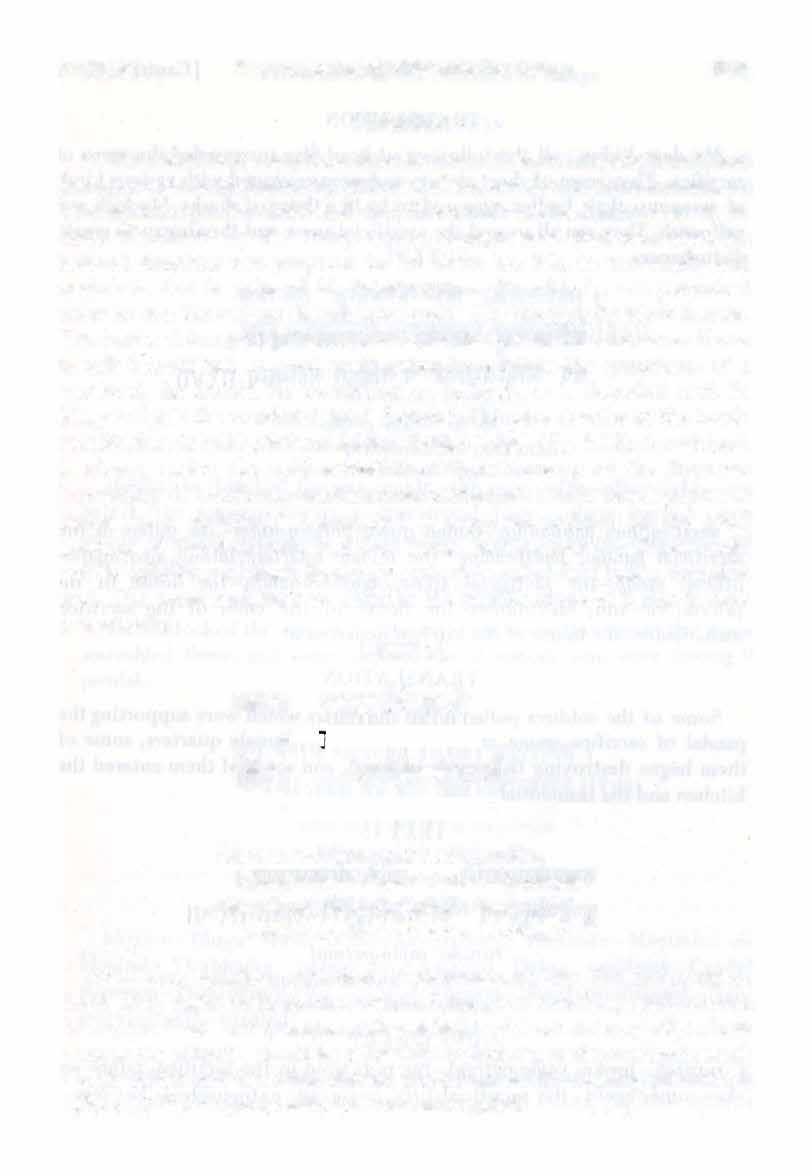
fiti: N41wq4iU((�Iwt�:

tiivat sa rudriinucarair mahii-makho niiniiyudhair oomanakair udiiyudhailt pingai[l. pisangair makarodariinanaifl.
paryiidravadbhir viduriinvarudhyata
tiivat-very quickly; sap-that; rudra-anucaraifl.-by the followers of Lord Siva; mahii-makhap-the arena of the great sacrifice; niinii-various kinds;iiyudhaip-with weapons; viimanakaip-of short stature; udiiyudhaip -upraised; pingaip- blackish; piSangaip- yellowish; makara-udara-iinanaip -with bellies and faces like sharks; paryiidravadbhi�-running all around; vidura-0 Vidura; anvarudhyata-was surrounded.


Text 13) Frustration of the Sacrifice of Dalu!a 159
PURPORT
�
��·�«�·q�
TRANSLATION
My dear Vidura, all the followers of Lord Siva surrounded the arena of sacrifice. They were of short stature and were equipped with various kinds of weapons; their bodies appeared to be like those of sharks, blackish and yellowish. They ran all around the sacrificial arena and thus began to create disturbances.
TEXT14
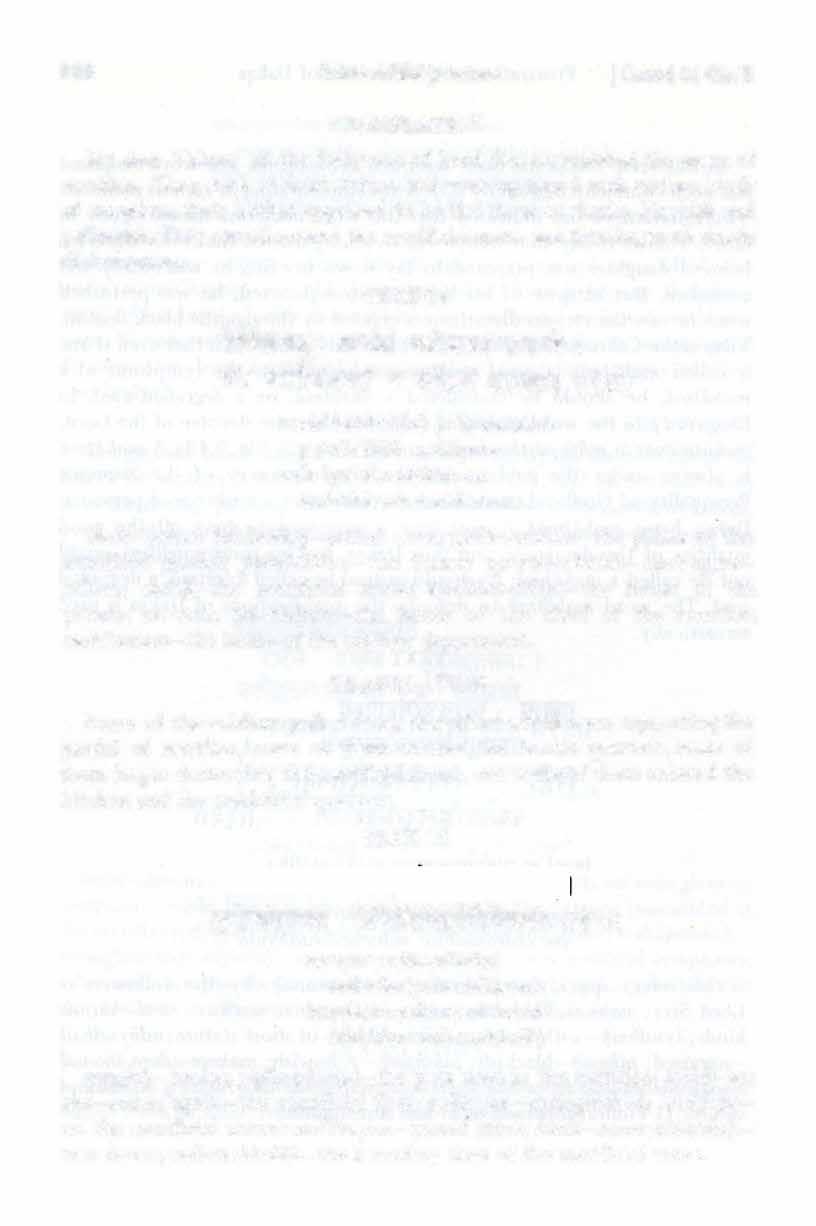
4$ua:q: �� qihtnef � 1 -.:1
� �.mm
kecid babhaiiju� prag-vamsam patni-saliim tathiipare sada iign"idhra-saliim ca tad-vihiiram mahiinasam
kecit-some; babha riju�- pulled down;priik-va msam- the pillars of the sacrificial pandal; patn"l-siiliim- the female quarters;tathii- also; apareothers; sada�-the sacrificial arena; iign"ldhra-siiliim-the house of the priests; ca-and; tat-vihiiram-the house of the chief of the sacrifice; mahiinasam- the house ofthe kitchendepartment.
TRANSLATION
Some of the soldiers pulled down the pillars which were supporting the pandal of sacrifice, some of them entered the female quarters, some of them began destroying the sacrificial arena, and some of them entered the kitchen and the residential quarters.

TEXT 15
�"1wtwti�I�Wll
t-4�4('31�-l 4iMfl:fillif��:II�"-.II
rurujur yajna-piitrii{li tathaike'gn"ln anasayan kurt<le�v amutrayan kecid bibhidur vedi-mekhalii�
ruruju�- broke; yajna-piitriir;ti-the pots used in the sacrifice; tathii-so; eke-some; agn"ln- the sacrificial fires; aniisayan-e xtinguishe d; kur-{ie§uon the sacrificial arenas; amutrayan-passed urine; kecit- some; bibhidu�toredown; vedi-mekhala�- the boundary lines of the sacrificial arena.
160 Srimad-Bhagavatam [Canto 4, Ch. 5
�������\ill
TRANSLATION
They broke all the pots made for use in the sacrifice,and some of them began to extinguish the sacrificial fire. Some tore down the boundary line of the sacrificial arena,and some passed urine on the arena.
TEXT16
31'1114� a;ft;f;� � qW\(ijJtt�I
� iil•a(qt"tsw�•ij•n�qe•f11ij.l� 11� ���
abadhanta munin anye eke patnir atarjayan
apare jagrhur devan pratyasannan paliiyitiin
abadhanta-blocked the way;muni'n-the sages; an�-others; eke - some; patni?l-the women; atarjayan-threatened; apare-others; jagrhu� - arrested; deviin-the demigods; pratyiisanniin-near at hand; paliiyitiin-who were fleeing.
TRANSLATION
Some blocked the way of the fleeing sages, some threatened the women assembled there, and some arrested the demigods who were fleeing the pandal.
TEXT17
'6�'4fiii¥U"{��:SliJ!Iq�i(I
��:'l""f� � ��&wch( 11�"u
bhrgum babandha maetiman
virabhadra[l prafopatim
caet{lesa[l pu�aetam devam
bhagam nandlsvaro ,grahit
bhrgum-Bhrgu Muni; babandha-arrested; ma!liman-Mal).iman; vi'rabhadra�-Virabhadra; prajiipatim-Prajapati Dak�a; ca!l{lesa�-Cai).QeSa; pii�a!lam-Pi:i.�a;devam-the demigod; bhagam-Bhaga;nandlsvara�-Nandisvara; agrahi't-arrested .
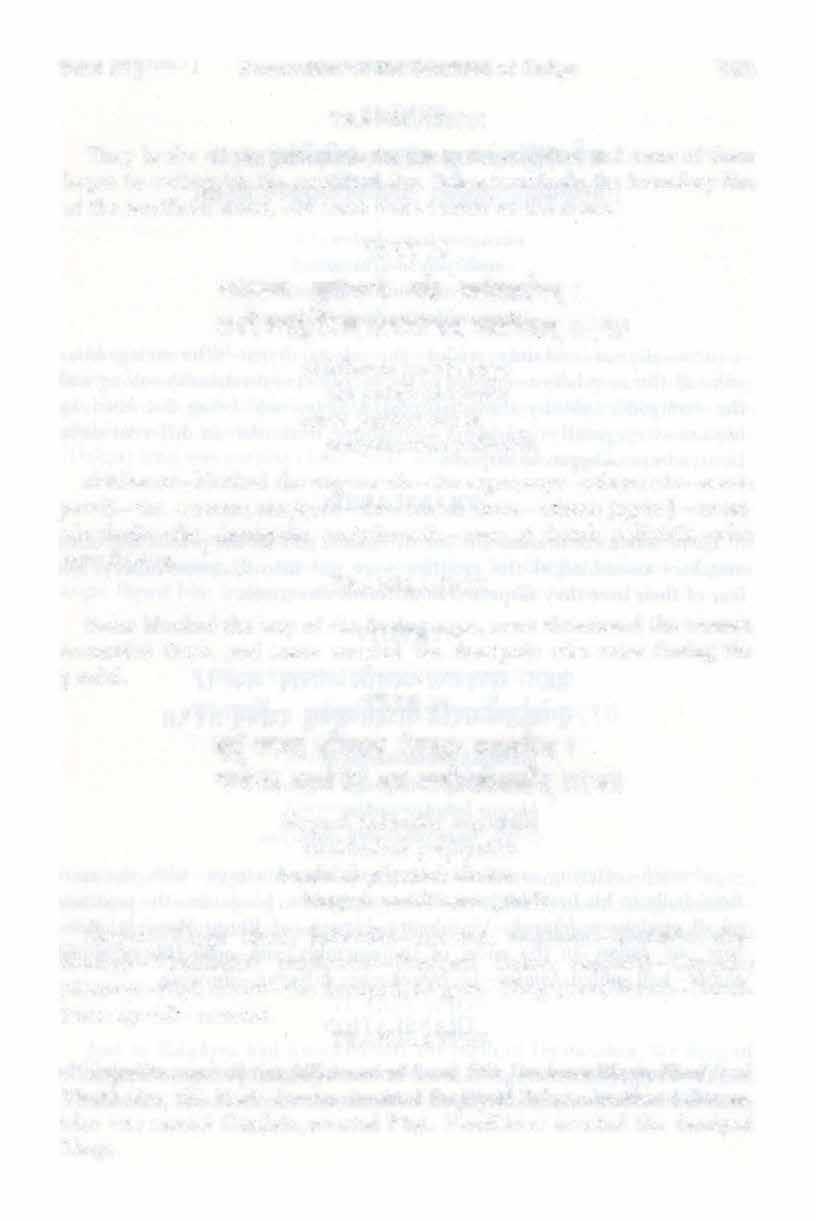
TRANSLATION
Ma!'iman, one of the followers of Lord Siva, arrested Bhrgu Muni, and Virabhadra, the black demon, arrested Prajapati Dalqa. Another follower, who was named Cal)..,esa,arrested Pii�a. Nandi8vara arrested the demigod Bhaga.
Text17) Frustration of the Sacrifice of Dalqla 161
TEXT 18

ri����: m:�: I
���: � Jtlij���� II��II
sarva evartvijo dr§tva sadasya� sa-divaukasalt
tair ardyamana� su-bhrsarh
griivabhir naikadha 'dravan
sarve-all;eva-certainly;rtvija�-the priests; dr�tvii-after seeing; sadasyii�-all the members assembledin the sacrifice; sa-divaukasa�- along with the demigods; tai�-by those (stones); ardyamiinii�-being disturbed; subhrsam-very greatly; griivabh* - by stones; naikadhii-in different directions; adravan-began to disperse.
TRANSLATION
There was a continuous shower of stones, and all the priests and other members assembled at the sacrifice were put into immense misery. For fear of their lives they dispersed in different directions.
TEXT 19 �: �� �� ¥ltNI'l �: I
�-��sce'4,+t'lci�ll��ll
juhvataft sruva-hastasya
smasrii!li bhagavan bhava�
bhrgor luluiice sadasi
yo 'hasac chmasru darsayan
juhvata�-offering sacrificiat" oblations; sruva-hastasya-with the sacrificial ladle in his hand; smalrii�i-themoustache; bhagaviin-the possessor of all opulences; bhava�- Virabhadra; bhrgo�-of Bhrgu Muni; luluncetore out; sadasi-in the midst of the assembly; ya�-who (Bhrgu Muni); ahasat-hadsmiled;smasru-hismoustache; darsayan- showing.
TRANSLATION
Virabha,dra shaved off the moustache of Bhrgu, who was offering the sacrificial oblations with his hands in the fire.
162 Srimad-Bhagavatam [Canto 4, Ch. 5
TEXT 20
�iN�qafeRt� � � I � ���:�(TQ,�II�oll
bhagasya netre bhagaviin
piititasya ru�ii bhuvi
ujjahiira sadastho 'k�flii
yaft sapantam asusucat
bhagasya-of Bhaga; netre-both eyes; bhagaviin-Virabhadra; piititasyahaving been thrust; ru§a-with great anger; bhuvi-on the ground; ujjahiiraplucked out; sadastha�- while situated in the assembly of the Visvastks; ak�rtii-by the m9vement of his eyebrows; ya�-who (Bhaga); sapantam(Dak�a) who was cursing (Lord Siva); asii.sucat-encouraged.
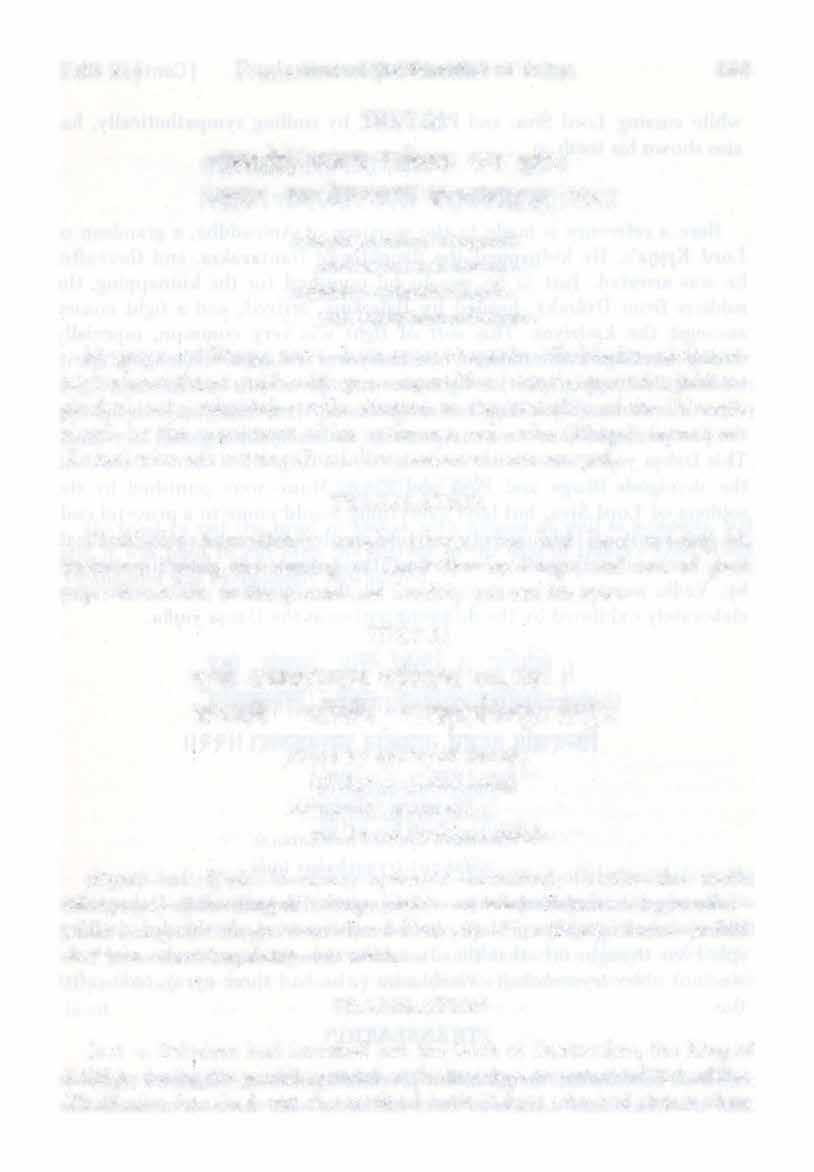
TRANSLATION
Virabhadra immediately caught Bhaga, who had been moving his eyebrows during the cursing of Lord Siva by Bhtgu, and out of great anger thrust him to the ground and forcibly put out his eyes.
TEXT 21
\�lift ,gq(ij4,W'(II-l•afus" � �:
I
4tsce��i491S\6: 11��11
pii§I]O hy apatayad dantiin
kalihgasya yathii bala�
sapyamane garimari
yo 'hasad darsayan data�
puuwtt-of PU�a; hi-since; apiitayat- extracted; dantiin-the teeth; kalingasya-of the King of Kaliriga; yathii-as; bala[t-Bal adeva; sapyamiinewhile being cursed; garima{li-Lord Siva; ya[t-who (Pii�a);ahasat-smiled; darsayan - showing; data�-his teeth.
TRANSLATION
Just as BallJdeva had knocked out the teeth of Dantavakra, the King of Kaliriga, during the gambling match at the marriage ceremony of Aniruddha, Virabhadra knocked out the teeth of both Dak{!a, who had shown them
Text 21) Frustration
of the Sacrifice of Dak�a
163
��
••R:�f01
while cursing Lord Siva, and PU�a, who, by smiling sympathetically, had also shown his teeth.
PURPORT
Here a reference is made to the marriage of Aniruddha, a grandson of Lord KHI)a's. He kidnapped the daughter of Dantavakra, and thereafter he was arrested. Just as he was to be punished for the kidnapping, the soldiers from Dvaraka, headed by Balarama, arrived, and a fight ensued amongst the k§atriyas. This sort of fight was very common, especially during marriage ceremonies, when everyone was in a challenging spirit. In that challenging spirit, a fight was sure to occur, and in such fights there was commonly killing and misfortune. After finishing such fighting the parties would come to a compromise, and everything would be settled. This Dak�a yajna was similar to such events. Now all of them-Dak�a and the demigods Bhaga and PU�a and Bhrgu Muni-were punished by the soldiers of Lord Siva, but later everything would come to a peacefulend. So this spirit of fighting between one another was not exactly inimical. But, because everyone was so powerful and wanted to show his strength by Vedic mantra or mystic power, all these fighting skills were very elaborately exhibited by the different parties at the Dak�a yajna.
TEXT 22






311¥Rfl(fij � f\1(1\ffiut tfawn 1

m�"r"�mW�roit��Tl��(·ll����
iikramyorasi dak�asya
sita-dhiirerta hetinii
chindann api tad uddhartum
niisaknot tryambakas tadii
akramya-having sat; urasi-on the chest; dak�asya-of Dak�a; sitadhare(la-having a sharp blade; hetina-with a weapon; chindan-cutting; api-even though; tat-that (head); uddhartum-to separate; na asaknotwas not able; tryambaka�- Virabhadra (who had three eyes); tada-after this.
TRANSLATION
Then Virabhadra, the giantlike personality, sat on the chest of Dak�a and tried to separate his head from his body with sharp weapons, but he was not successful.
164 Srimad-Bhagavatam [Canto 4, Ch. 5
Frustration of the Sacrifice of Dak�a
TEXT 23
�·�·� �:1 mA q(+«N4it � qWIRI�����II
sastrair astriinvitair evam
anirbhinna-tvacam hara[l
• 0vtsmayam param apanno
dadhyau pasupatis ciram
sastra*- with weapons; astra-anvita*-with hymns {mantras); evamthus; anirbhinna-not being cut; tvacam-the skin; haral;t- Virabhadra; vismayam- bewilderment; param-greatest; iipannal;t - was struck with; dadhyau- thought; pasupatil;t-Virabhadra; ciram-for a long time.
TRANSLATION
He tried to cut the head of Da�a with hymns as well as weapons, but still it was hard to cut even the surface of the skin of Dak�a's head. Thus Virabhadra was exceedingly bewildered.
TEXT 24
til � � � « qRI4� 1 ttlii+Ui1q�n: � �lttl�i11((�:II�CJII
dr*tvii samjnapanam yogam

pasuniim sa patir makhe
yajamiina-paso[l kasya
kayat teniiharac chiral;t
dr�tva-having seen; samjnapanam-for the killing of the animals in the sacrifice; yogam- the device; pasuniim-of the animals; sal;t - he (Virabhadra); pat*-the lord; makhe-in the sacrifice; yajamiina-pasol;t-who was an animal in the form of the chief of the sacrifice; kasya-of Dak�a; kayat- from the body; tena-by that (device); aharat-severed; siral;t-his head.
TRANSLATION
Then Virabhadrasawthe woodendevice in the sacrificialarena by which the animals were to have been killed. He took the opportunity of this facilityto behead Dak�a.
Text 24]
165
PURPORT
In this connection it is to be noted that the device used for killing animals in the sacrifice was not designed to facilitate eating their fles)l. The killing was specifically intended to give a new life to the sacrificed animal by the power of Vedic mantra. The animals were sacrificed to test the strength of Vedic mantras; yajnas were performed as a test of the mantra. Even in the modern age, tests are executed on animal bodies in the physiology laboratory. Similarly, whether or not the briihmarzas were uttering the Vedic hymns correctly was tested by sacrifice in the arena. On the whole, the animals thus sacrificed were not at all the losers. Some old animals would be sacrificed, but in exchange for their old bodies they received other, new bodies. That was the test of Vedic mantras. Virabhadra, instead of sacrificing animals with the wooden device, immediately beheaded Dak�a, to the astonishment of everyone.
TEXT 25
sadhu-vadas tad'ii te�iim karma tat tasya pasyatiim bhiita-preta-pisiiciiniim anye�iim tad-viparyaya�
siidhu-viida�-joyful exclamation; tadii-at that time; te�iim-of those (followers of Lord Siva); karma-action; tat-that; tasya-of him (Virabhadra); pasyatiim-seeing; bhiita-preta-pisiiciiniim-of the bhiitas (ghosts), pretas and piSiicas; anye�iim-of the others (in the party of Dak�a); tatviparyaya�-the opposite of that (an exclamation of grief).
TRANSLATION
Upon seeing the action of Virabhadra, the party of Lord Siva was pleased and cried out joyfully, and all the bhutas, the ghosts and demons that had come made a tumultuous sound. On the other hand, the brahmru:tas who were in charge of the sacrifice cried out in grief at the death of Da�a.
TEXT 26

166 Srimad-Bhagavatam [Canto 4, Ch. 5
«n!iltl(((ij((l� � � WI� I l(6�6fti\1Miwtl44�tti ijflq4�:������
I ij(q��;f � St1Rt8C( �4iR��4(������
'ijC:I4ij��;��J�UII\IIil444fifij:
juhiivaitac chiras tasmin
dak�ir-iigniiv amar�ita�
tad-deva-yajanam dagdhva
priiti�thad guhyakiilayam
juhiiva-sacrificed as an oblation; etat-that; sira�-head; tasmin-in that; dak§irw-agnau-in the sacrificial fire on the southern side; amarsitahVirabhadra, being greatly angry; tat-of Dak�a; deva-yajanam-the a;rangements for the sacrifice to the demigods; dagdhvii-having set fire; prati§(hat-de parted ; guhyaka-iilayam-to the abode of the Guhyakas (Kailasa).
TRANSLATION
Virabhadra then took the head and, out of his great anger, threw it into the southern side of the sacrificial fire, offering it as an oblation. In this way all the followers of Lord Siva devastated all the arrangements for sacrifice. After setting fire to the whole arena, they departed for their master's· abode, Kailasa.
Thus end the Bhaktivedanta purports of the Fourth Canto, Fifth Chapter, of the Srimad-Bhagavatam, entitled "Frustration of the Sacrifice of Dak�a."
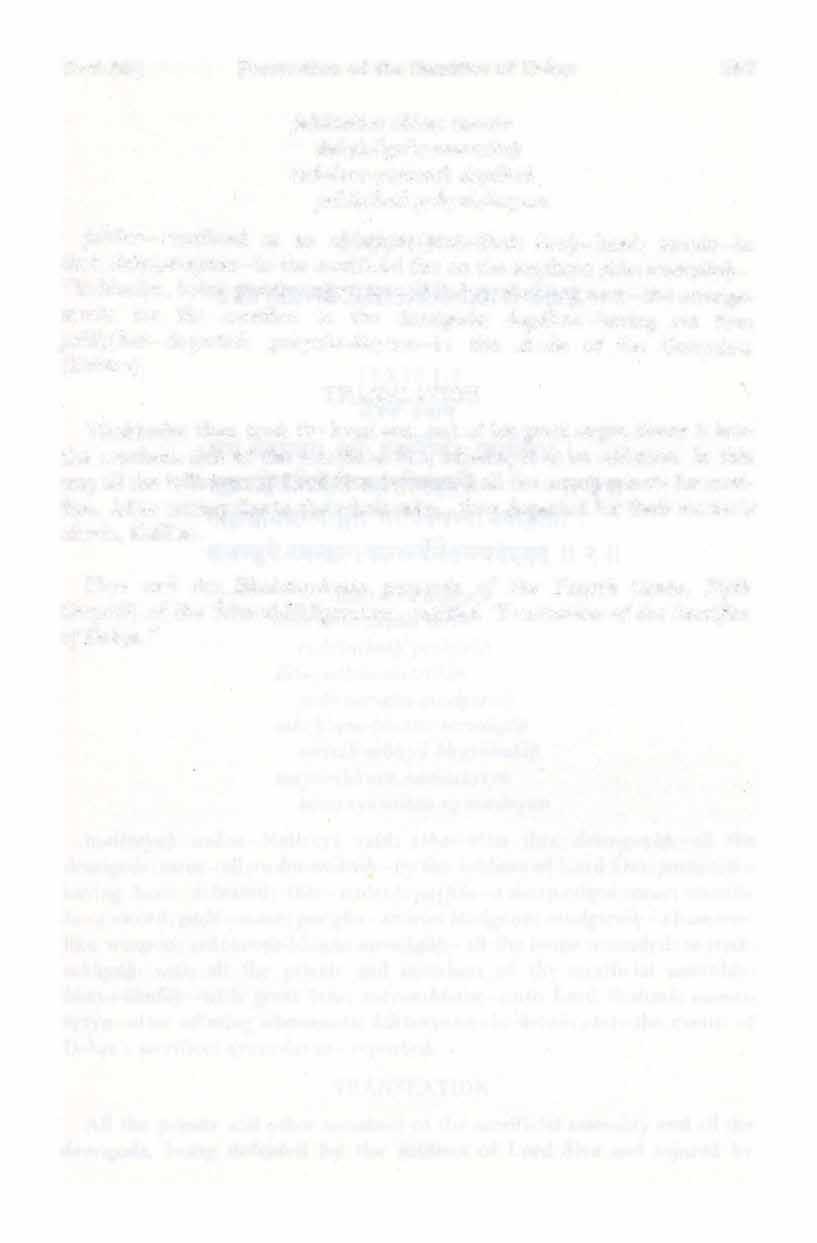
Text 26] Frustration of
the Sacrifice of Da�a
167
CHAPTER SIX
Brahmasatisfies Lord Siva
maitreya uviica atha deva-gartii� sarve rudriin"lka* pariijitii� siila-pattisa-nistrirhsagadii-parigha-mudgara* sanchinna-bhinna-sarvangii� sartvik-sabhyii bhayiikulii� svayambhuve namaskrtya kiirtsnyenaitan nyavedayan

maitreya� uvaca-Maitreya said; atha-after this; deva-gaT)ii/1-all the demigods;sarve-all;rudra-anika*-by the soldiers of Lord Siva;pariijita�having been defeated; si.ila-trident;pattisa-a sharp-edged spear;nistrimsa-a sword; gada-mace;parigha-an iron bludgeon; mudgarai�-a hammerlike weapon; safichinna-bhinna-sarva;tga�-all the limbs wounded;sa-rtviksabhya�-with all the priests and members of the sacrificial assembly; bhaya-akula�-with great fear; svayambhuve-unto Lord Brahma; namaskrtya-after offering obeisances; kartsnyena-in detail; etat-the events of Dak�a's sacrifice;nyavedayan-reported.


TRANSLATION
All the priests and other members of the sacrificial assembly and all the demigods, being defeated by the soldiers of Lord Siva and injured by 169
TEXTS 1-2 ���
�'44IUU:«lijS(Iwr\�: q(l�(tl: I II � II 4M'11N'ifij'4ltl: I �wt'4('f)�••�(""if���II � II
3N
weapons like tridents and swords, approached Lord Brahma with great fear. After offering him obeisances, they began to speak in detail of all the events which had transpired.
TEXT3
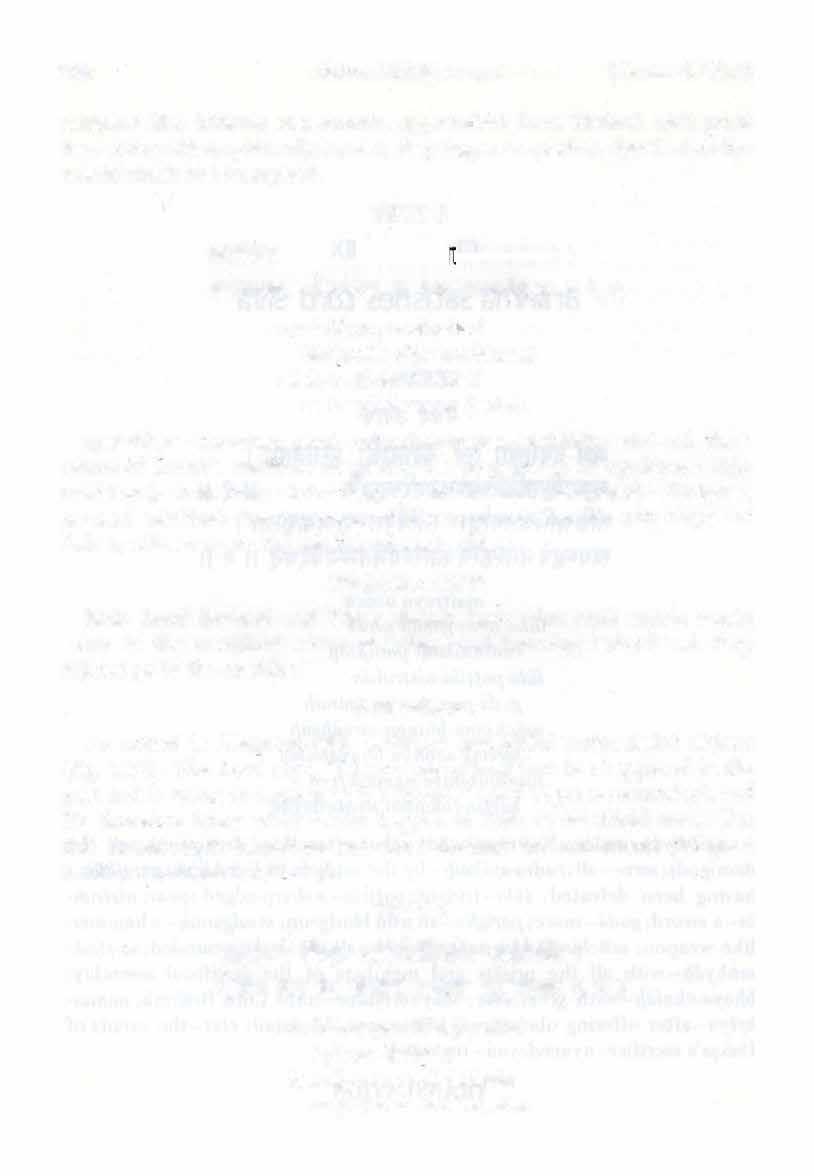
wtiO�UI� �'IT ;r 4MI'*4'ltft�t}: II � II
upalabhya puraivaitad bhagavan abja-sambhava[l naraya[las ca visviitmii na kasyadhvaram "iyatu[l
upalabhya-knowing; pura-beforehand; eva -ce rtainly; etat-all these events of Dak�a's sacrifice; bhagavan- the possessor of all opulences; abjasambhavafi.- bornfrom a lotusflower(LordBrahma); naraya[la/1.- Nad.iyar;Ja; ca-and; visvatma-the Supersoul of the entire universe; na-not; kasya-of Dak�a; adhvaram-to the sacrifice; i"yatu_h -di d go.


TRANSLATION
Both Lord Brahma and Vilj�u already knew that such events would occur in the sacrificial arena of D�a, and knowing beforehand, they did not go to the sacrifice.
PURPORT
As stated in Bhagavad-gitii, vediiham samatitiini vartamiinani ciirjuna (Bg. 7.26). The Lord says, "I know everything that has happened in the past and is going to happen in the future." Lord Vi�l)U is omniscient, and He therefore knew what would happen at Dak�a's sacrificial arena. For this reason both Narayal;la and Lord Brahma did not attend the great sacrifice performed by Dak�a.
tad akar[lya vibhuft praha
tejiyasi krtiigasi
k.semiiya tatra sa bhu_yiin
na prii_ye[!a bubhu:;atam
170 Srimad-Bhagavatam [Canto 4, Ch. 6
:aqew 1
�: � �'P.rm t6•••m 1
\ft�� sniPJr �II � II
TEXT 4 ij�
�
tat-the events related by the demigods and the others; iikarrya- after hearing; vibhu�- Lord Brahm a; p niha-replied; tejiyasi-a great personality; krta-iiga, i- has been offended; k , semiiya-for your happiness;tatra-in that way; sii-that; bhuyiit na-is not conducive; priiye [!a-geherally; bubhu$Uliim-desire to exist.
TRANSLATION
When Lord Brahma heard everything from the demigods and the members who had attended the sacrifice, he replied: You cannot he happy in executing a sacrifice if you blaspheme a great personality and therebyoffendhis lotusfeet. Youcannothave happinessin that way.
PURPORT
Lord Brahma explained to the demigods that although Dak�a wanted to enjoy the results of fruitive sacrificial activities, it is not possible to enjoy when one offends a great personality like Lord Siva. It was good for Dak�a to have died in the fight because if he had lived he would have committed such offenses at the lotus feet of great personalities again andagain. According to Manu's Jaw, when a person commitsmurder,punishment is beneficial for him because if he is not killed then he might commit more and more murders and therefore be entangled in his future lives for having killed so many persons. Therefore the king's punishment of a murderer is appropriate. If those who are extremely offensive are killed by the grace of the Lord, that is good for them. In other words, Lord Brahma explained to the demigods that it was good for Dak�a to have been killed.
TEXTS
3N1N Tf iijft�ttl � �
'ff41G:�ii4
�1•14{f$ �:
qRu�ij(11
�Sf$f(11{ st•OOijlf«q"� II "' II
athapi yuyam krta-kilbi�ii bhavam
_ye barhi�o bhaga-bhajarh paradu� prasadayadhvarh parisuddha-cetasa
lr�ipra-prasadarh pragrhita-mighri-padmam
athiipi-still; yuyam-all of you; k rta-kilbi§ii{l -having committed offenses; bhavam- Lord S iva;ye-all of you; barhi�aft -of the sacrifice;blufg.z-
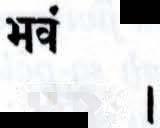
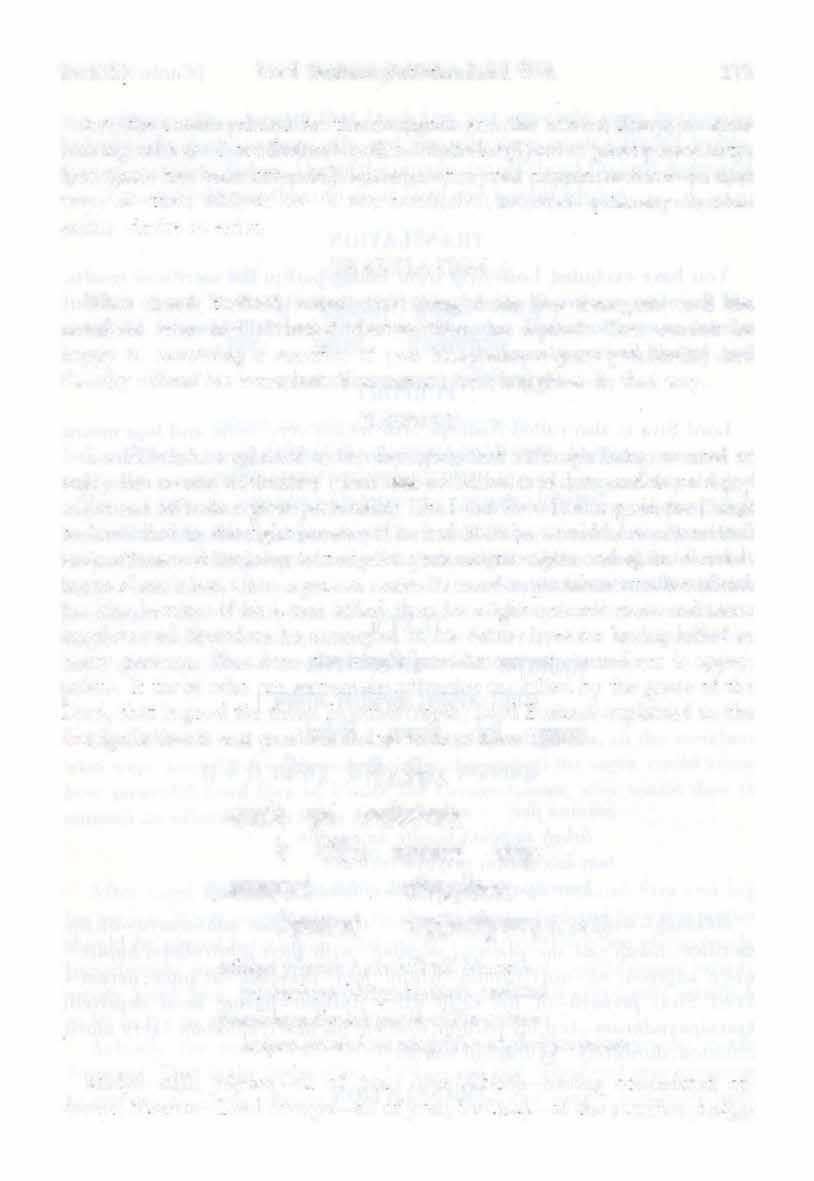
Text 5] Lord Brahma Satisfies Lord Siva 171
bhajam-entitled to a share; paradu{!-have excluded; prasiidayadhvamall of you should satisfy; parisuddha-cetasa-without mental reservations; k§ipra-prasadam-quick mercy; pragrhita-a;tghri-padrnam-his lotus feet having been taken shelter of.
TRANSLATION
You have excluded Lord Siva from takingpartinthesacrificialresults, andthereforeyouarealloffendersathislotusfeet.Still,if yougowithout mental reservations and surrender unto him and fall down at his lotus feet,hewillbeverypleased.
PURPORT
Lord Siva is also called Asuto�a. Asu means very soon, and to�a means to become satisfied. The demigods were advised to go to Lord Siva and beg his pardon, and because he is very easily pleased, it was certain that their purpose would be served. Lord Brahma knew the mind of Lord Siva very well, and he was confident that the demigods, who were offenders at his lotus feet, could mitigate their offenses by going to him and surrendering without reservation.
TEXT6

�:�:�W{�I
asiisana jivitam adhvarasya
lokafr sa-piilalt kupite na yasmin
tarn asu devam priyaya vihinam
k§amapayadhvam hrdi viddharh duruktaifr
asaslinalt-wishing to ask; jivitam-for the duration; adhvarasya-of the sacrifice; loka{!-all the planets; sa-pala{!-with their controllers; kupilewhen angered; na-not; yasmin-whom; tam-that; asu-at once; devamLord Siva; priyayii-of his dear wife; vihinam-having been deprived; k;samapayadhvam-beg his pardon; hrdi-in his heart; viddham-very much afflicted; duruktai{t- by unkind words.
TRANSLATION
Lord Brahma also advised them that Lord Siva is so powerful that by his anger all the planets and their chief controllers can be destroyed
172 Srimad-Bhagavatam [Canto 4, Ch.6
�m � � f«1;t ��Fit �:11�11
immediately. Also, he said that Lord Siva was especially sorry because he had recently lost his dear wife and was also very much afflicted by the unkind words of D�a. Under the circumstances, Lord Brahma suggested that it would behoove them to go at once and beg his pardon.
TEXT7 itt¥4�
t1(!4k44(1����11 \9 II
naharh na yajno na ca yuyam anye _ye deha-bhajo munayas ca tattvam viduft pramiirwmbala-v"iryayor vii yasyiitma-tantrasya ka upiiyam vidhitset
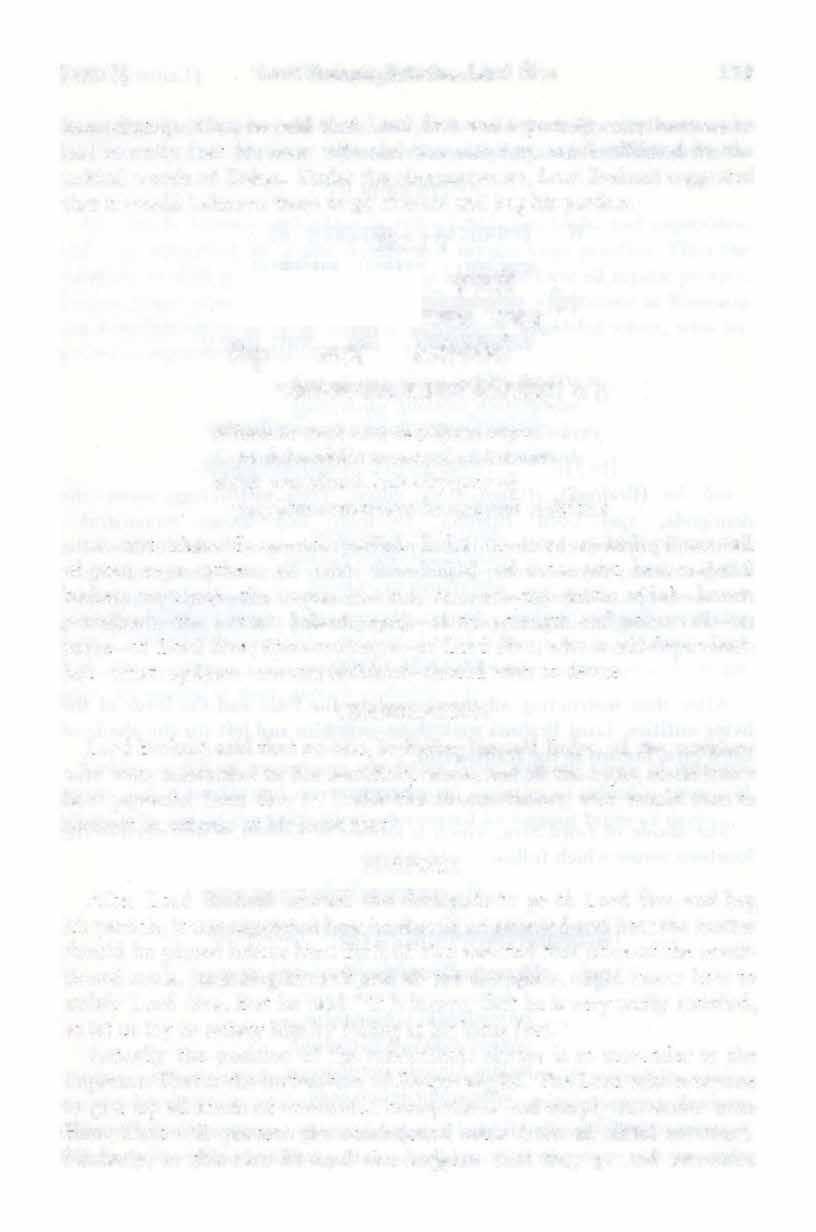
na-no t; aham- l ; na- nor ; yajiia� -lndra; na-nor; ca-and; yuyam-a11 of you; anye-others; ye-who; deha-bhiija�-of those who bear material bodies; munaya{t-the sages; ca-and; tattvam-the truth; viduft - know; pramanam-the extent; bala-viryayoh-of the strength and power; va- or; yasya _:_ of Lord Siva; iitma-tantrasya._of Lord Siva, who is self-dependent; ka{t-what; u payam-means ; vidhitset-should wish to devise.
TRANSLATION
Lord Brahma said that no one, including himself, Indra, all the members who were assembled in the sacrificial arena, and all the sages, could know how powerful Lord Siva is. Under the circumstances, who would dare to commit an offense at his lotus feet?
PURPORT
After Lord Brahma advised the demigods to go to Lord Siva and beg his pardon, itwas suggested how he should be satisfied and howthe mafter should be placed before him. Brahma also asserted that none of the conditioned souls, including himself and all the demigods, could know how to satisfy Lord Siva. But he said, "It is known that he is very easily satisfied, so let us try to satisfy him byfalling at his lotus feet."
Actually the position of the subordinate always is to surrender to the Supreme. That is the instruction of Bhagavad-gitii. The Lord asks everyone to give up all kinds of concocted occupations and simply surrender unto Him. That will protect the conditioned souls from all sinful reactions. Similarly, in this case Brahma also suggests that they go and surrender
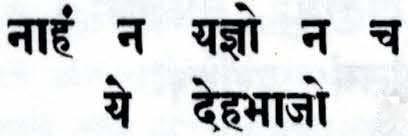
Text7] Lord Brahma Satisfies Lord Siva 173
'!�*��I
ft�: 3144Tui ile41�til�t
unto the lotus feet of Lord Siva, for since he is very kind and easily satisfied, this action would prove effective.
TEXTS
� � ij(lwt�4i� �: ij¥4�6: �: �: �1 �W<flfite4 �:
�le'4faSI!!4� fW;f �: II <; II
sa ittham adisya suran ajas tu ta* samanvita� pitrbhi� saprajesa*
yayau svadhi,wyan nilayam pura-dvi�aft kailasam adri-pravaram priyam prabhoft
sa�-he (Brahma); ittham-thus; adisya-after instruCting; suran-the demigods; aja�-Lord Brahma; tu-then; tai�- those; samanvita�foUowed; pitrbhi�- by the Pitas;sa-prajesa*-along with the lords of the living entities; yayau-went; svadhi§!tyiit-from his own place; nilayamt he · abode;pura-dvi�a�-of Lord Siva; kailiisam- Kailiisa; adri-pravaramLhc best among mountains;priyam-dear;prabho�-of thelord (Siva).
TRANSLATION
After thus instructing all the demigods, the Pitas and the lords of the living entities, Lord Brahma took them with him and left for the abode of Lord Siva, known as the Kailasa Hill.
PURPORT
The abode of Lord Siva, which is known as Kailasa, is described in the fourteen verses which follow.
TEXT9
�i4i1ttN6qlt4;:sctTt•l�t;f��:
janmaufiadhi-tapomantrayoga-siddhair naretara*
ju�tam kinnara-gandharvair apsarobhir vrtarh sada
janma- birth; o� adhi -her bs; tapa�-austerity ; mantra- Vedic hymns; yoga- mystic yoga practices; siddha*-with perfected beings; naretara*-
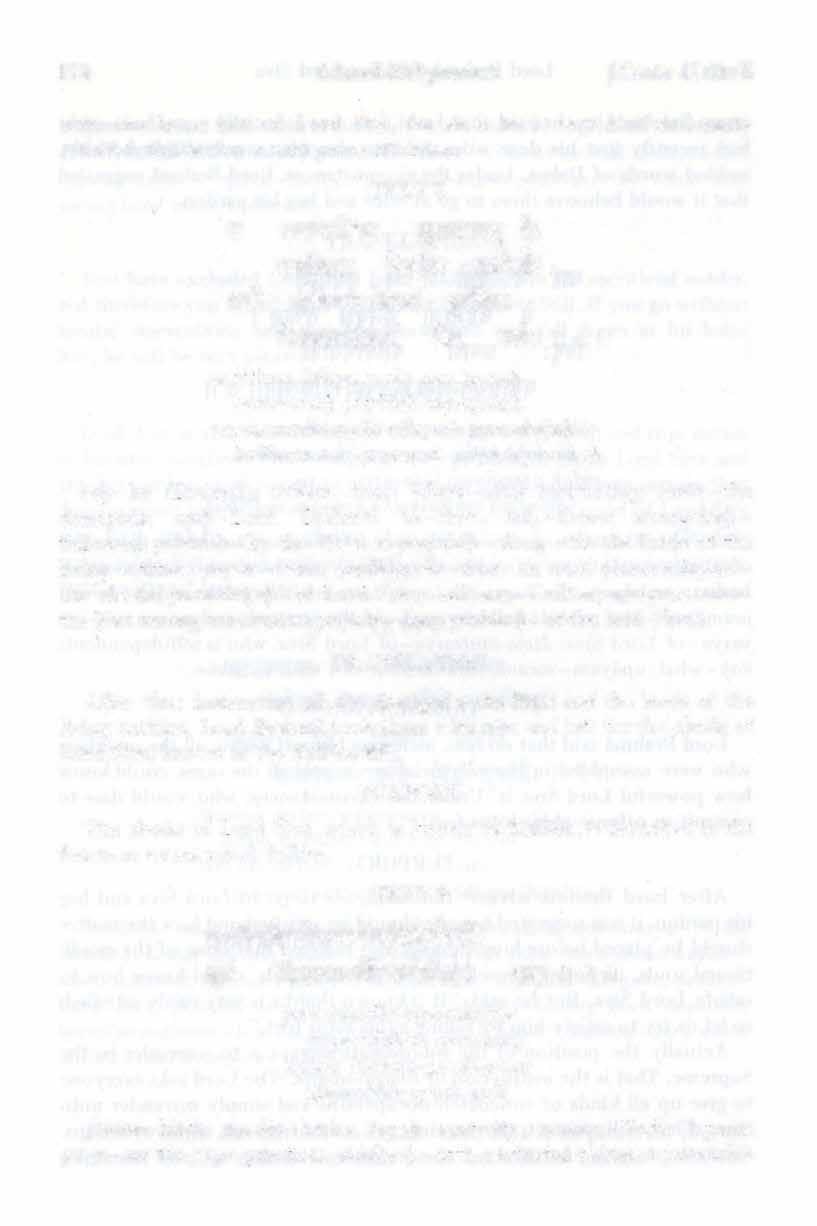
174 Srimad-Bhagavatam [Canto 4, Ch. 6
� fct;t(tl.-�c:e(t�
�
� II
II
by demigods; ju§fam-enjoyed; kinnara-gandharoaiJ:l-by K.innaras and Gandharvas;apsarobhil;l-by Apsaras;vrtam-full of;sada-always.
TRANSLATION
The abode known as Kailisa is full of different herbs and vegetables, and it is sanctified by Vedic hymns and mystic yoga practice. Thus the residents of that abode are demigods by birth and have all mystic powers. Besides them there are other human beings who are known as Kinnaras and Gandharvas and are accompanied by their beautiful wives, who are known as Apsaris, or angels.
TEXT10 ;u;uqru.q�: sft;tiwcr\ifltJfitNf?l�: 1 :rtl:rtig;qc?Rtlg��wrtwtl4l•l•l•llt�: II� o II
nana-map,i-mayai/l srngair nanadhatu-vicitritai/l nii.nii-druma-lata-gulmair
nana-mrga-gap,avrtai/l
niina-d.ifferent kinds;map,i-jewels;mayaiJ:l-made of;s'pigail;l-with the peaks; niiniidhiitu-vicitritai/;1.-decorated with various minerals;niinii- various; druma-trees; lata-creepers; gulmai/;1.-plants; niinii-various; mrgagarta-by groups of deer; iivrtaiJ:l-inhabited by.
TRANSLATION
Kailisa is full of mountains which are filled with all kinds of valuable jewels and minerals and surrounded by all varieties of valuable trees and plants. The top of the hill is nicely decorated by various types of deer.
TEXT11
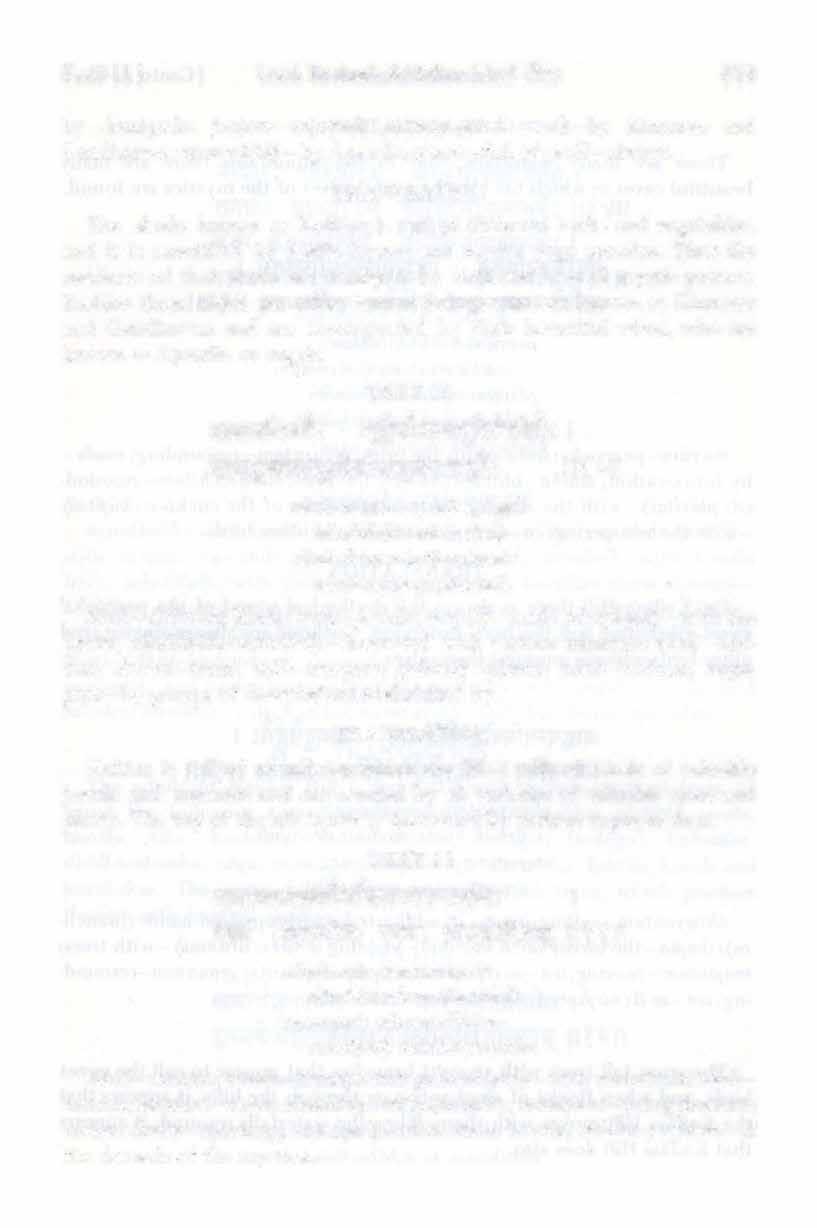
wtl:rtlq�Sf(llq�wtiwcl�«11�fll: I
� �«P{fiwti �:m:s;:.rt�{'lll(II��II
nanamala-prasraval,lair
niinii-kandara-siinubhi{l ramaf1arh viharantlnam
ramarraift siddha-yofiitiim
niinii-various; amala-transparent; prasraval,lai�-with waterfalls;niiniivarious;kandara-caves;siinubhi/;1.-with summits; ramap,am-giving pleasure; viharantiniim-sporting; ramal,lai/;1.-with their lovers; siddha-yo�itiim-of ·the damsels of the mystics.
Text 11) Lord Brahma Satisfies Lord Siva 175
TRANSLATION
There are many waterfalls, and in the mountains there are many beautiful caves in which the very beautiful wives of the mystics are found.
if%t�
TEXT 12
llt�ll
mayura-kekiibhirutarh
madiin.dhali-vimurcchitam
pliivitai rakta-kar-thiinarh
kujitais ca patattrittiim
mayU:ra-pe acocks; keka-with the cries; abhirutam-resounding; madaby intoxication; andha-blinded; ali-by the bees; vimiirc chitam-resounded; plavita*-with the singing; rakta-kar;tthanam-of the cuckoos; kujita* -with the whispering; ca-and;patattrir;tam-of other birds.
TRANSLATION
On Kailasa Hill there is always the rhythmical sound of the peacocks' sweet vibrations and the bees' humming. Cuckoos are always singing, and other birds whisper amongst themselves.
TEXT 13

ahvayantam ivoddhastair
dvijan kiima-dughair drumaift
vrajantam iva miitarigair
gp;wntam iva nirjhara*
ahvayantam-calling;iva-as if;uddhastai�-with upraised hands (branches); dvijan-the birds; kama-dughaiQ.-yielding desires; druma*-with trees; vrajantam-moving;iva-as if; matanga*-by elephants; gnwntam-resounding; iva-as if; nirjharaiQ.-b y the waterfalls.

TRANSLATION
There are tall trees with straight branches that appear to call the sweet birds, and when flocks of elephants pass through the hills, it appears that the Kailasa Hill moves with them. When the waterfalls resound, it appears that Kailasa Hill does also.
176 Srimad-Bhagavatam [Canto 4, Ch. 6
�tm �� �tfq�f�UIII(
�7{(
d �tref?c4{f4i�I
�..
�: 1 ���·
afi1'414\�Fl
'ftd.lul'kfflw �f�: II��II
mandarai/1piiri.iiitaisca
saralaiscopasobhitam
tamiila*siila-tiilaisca
kovidiiriisaniirjunai[l cutai[lkadambairnipaisca

niiga-punniiga-campakai� pii�aliisoka-bakulai�
kunda*kurabakairapi
mandiiraifl-withmandiiras;piirijiitaifi,-withpiirijiitas;ca-and;saralai[lwith saralas; ca-and; upasobhitam- decorat ed ; tamiilaift-with tamiila trees; siila-tiilaift-with siilas and tiilas; ca-and; kovidiira-iisana-arjunai[lkovidaras, iisanas (vijaya-saras) and arjuna trees (kiiiicaniirakas); cutai[lwith cutas (a species of mango); kadambaift-withkadambas;nipai�-with n"'ipas (dhuli-kadambas); ca-and; niiga-punniiga-campakailt·-with niigas, punniigas, and campakas;piitala-asoka-bakulai�-withpiitalas, asokas and bakulas;kundaift-withkundas;kurabakaift-withkurabakas;api-also.
TRANSLATION
The whole of Kailasa Hill is decorated with various kinds of trees, of which the following names can be mentioned: mandara, parijata, sarala, tarnala, tala, kovidara, asana, arjuna, amrajati (mango), kadamba, dhuli-kadamba, naga, punnaga, campaka, patala, a8oka, bakula, kunda and kurabakas. The entire hill is decorated with such trees, which produce flowers with fragrant aromas.
TEXT
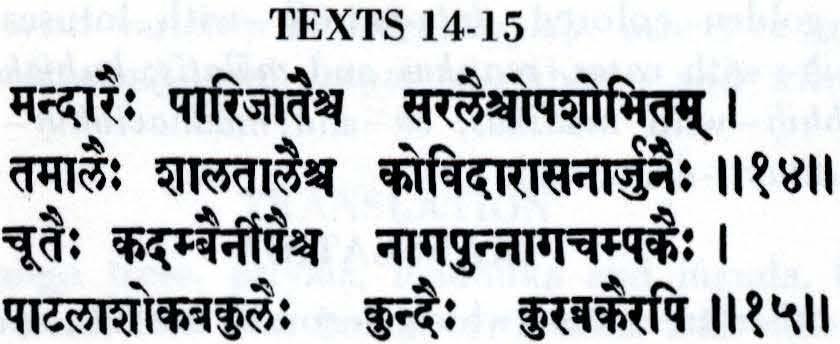
svarr-iirra-sata-patraisca varare"(luka-jiitibhi[l kubjakairmallikiibhisca
miidhavibhiscama"(l{litam
Text 16] Lord Brahma Satisfies Lord Siva
177
16 �o1tuiija-q;� f4«�sufflf¥r
:
1 ����tmfll� �¥1�11Na-�lit f.. II
svar(liir(la-golden colored; sata-patrai{l-with lotuses; ca-and; varare(luka-jiitibhil;t-with varas, re!lukas and malat"is; kubjakail;t-with kubjakas; mallikabhil;t-with mallikas; ca-and; madhav""ibhil;t- with madhav'is; ca-and; ma(l{iitam-decorated.




TRANSLATION
There are other trees also which decorate the hill, such as the golden lotusflower,the cinnamon tree, miilati, kubja, mallikii and madhavi.
TEXT 17 I

l{�'IM¥1: \it ���� ��: I I� \91I panasodumbariisvatthaplak�a-nyagrodha-hingubh* bhurjair o�adhibhil;t pugai rajapugais ca jambubhil;t
panasa-udumbara-asvattha-plak�a-nyagrodha-hirigubhil;t-with panasas (jackfruit trees), udumbaras, asvatthas, plak�as, nyagrodhas and trees producing asafetida; bhiirjail;t-with bhiirjas ;o�adhibhil;t-with betel nut trees; pugail;t-with piigas; rajapiigail;t-with rajapiigas; ca-and; ja."Y£bubhifl-with jambus.
TRANSLATION
Kailasa Hill is also decorated with such trees as kata, jackfruit, julara, banyan trees, plak�as, nyagrodhas and trees producing asafetida. Also there are trees of betel nuts and bhiirjapatra, as well as rajapiiga, blackberries and similar othe trees.
TEXT 18
kharjuriimratakiimriidyail;t priyala-madhukengudail;t druma-fatibhir anyais ca rajitam vep.u-k'icakail}
kharjura-iimriitaka-amra-adyail;t-with kharjiiras, amratakas, amras and others; priyiila-madhuka-ingudai{l-with priyalas, madhukas and irigudas;
178 Srimad-Bhagavatam [Canto 4, Ch. 6
���
��(i;jRtEfil;jla: r
� II�GII
druma-jiitibh*-with varieties of trees; anyai�-other; ca-and; riijitamdecorated; veflu-k'Lcaka*-with ver.us (bamboos) and k"icakas (hollow bamboos).
TRANSLATION
There are mango trees, priyila, madhuka and inguda. Besides these there are other trees, like thin bamboos, kicaka, and varieties of other bamboo trees, all decorating the tract of Kailasa Hill.
TEXTS 19-20
tHJ(\�qe�IW€fq'31!JIW«f.tftf: I
�1! � ����II
�: I
iFA: ��ii �f��f�r: ll�oll
kumudotpala-kahliirasatapatra-vanarddhibh* nalin'i�u kalam kujatkhaga-vrndopasobhitam mrga* siikhiimrga* kropair mrgendrair rkfia-salyaka* gavayai� sarabhair vyiighrai rurubhir mahi�iidibh*
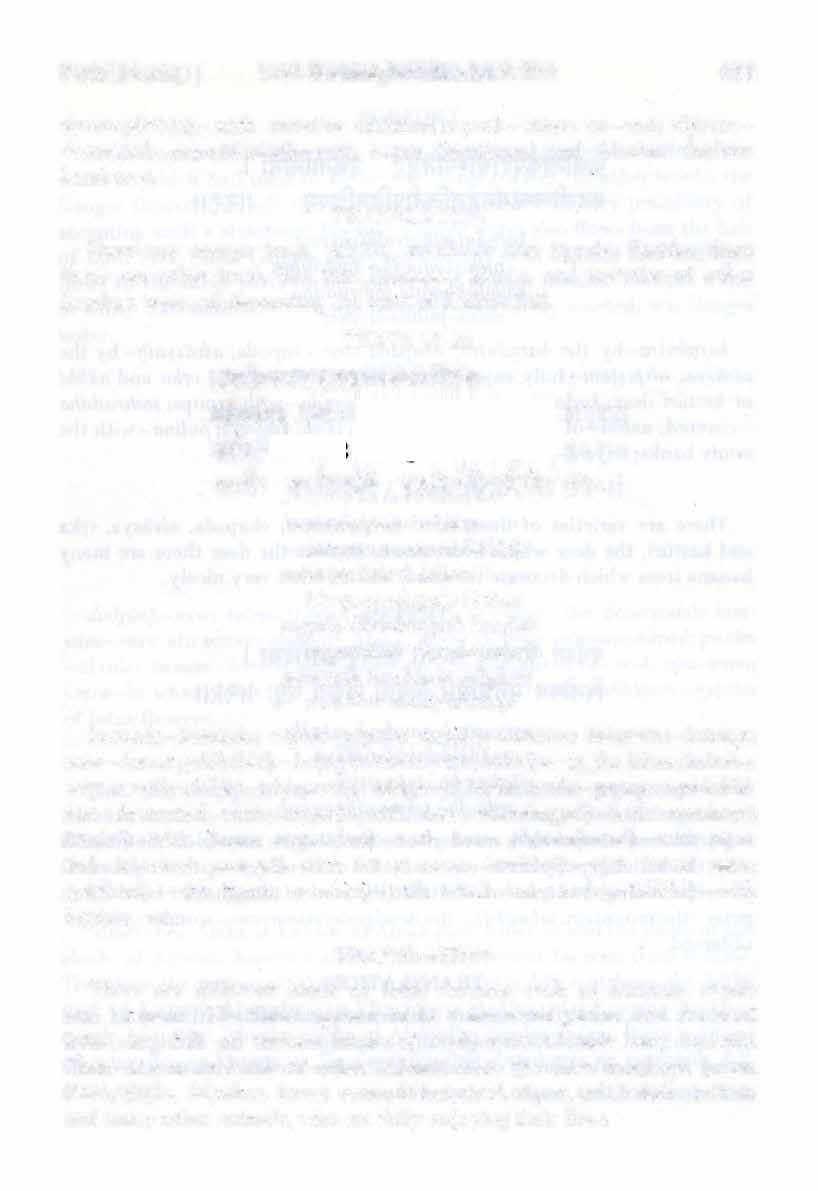
kumuda-kumuda; utpala-utpala; kahliira-kahliira; satapatra-lotuses; vana-forest; rddhibhi�-being covered with; nalin"i�u-in the lakes;kalamvery sweetly; kujat-whispering; khaga-of birds; vrnda- groups; upasobhitam-decorated with; mrga*-with deer; siikhiimrgai�-with monkeys; kro�a*-with boars; mrgendrai�- with lions; rk§a-salyaka*-with rk§as and salyakas; gavayailt-with forest cows; sarabha*-with forest asses; vyaghrai�-with tigers; rurubhi�-with small deer; mahi.5a-adibhi�-with buffalo, etc.



TRANSLATION
There are different kinds of lotus flowers, such as kumuda, utpala and satapatra. The forest appears to be a decorated garden, and the small lakes are full of various kinds of birds who whisper very sweetly. There are many kinds of other animals also, like deer, monkeys, boars, lions, riqlas, salyakas, forest cows, forest asses, tigers, small deer, buffalo and many other animals, who are fully enjoying their lives.
Texts 19-20] Lord Brahma Satisfies Lord Siva 179
TEXT 21
�IJfl��MdJ��f.\�i �: «J't(qtJC�����
karrantraikapadasvasyair nirju§tarh vrka-nabhibh* kadali-khar!ia-.sarhruddhanalin""i-pulina-sriyam
karrtiintra-by the karl}iintra; ekapada-the ekapada; as'vasyai�-by the as'vasya; nirju§tam-fully enjoyed;vrka-niibhibhi�-by the vrka and niibhi or kastiiri deer;kadali'-of banana trees;kha!lga-with groups;sarhruddha -covered; nalini-of small lakes filled with lotus flowers;pulina-with the sandy banks;sriyam-very beautiful.
TRANSLATION
There are varieties of deer, such as kart:tantra, ekapada, asvasya, vrka and kasturi, the deer which bears musk. Besides the deer there are many banana trees which decorate the small hillside lakes verynicely.
TEXT 22

paryastam nandaya satya�
snana-puryatarodaya vilokya bhutda-girirh
vibudha vismayarh yayu�
paryastam-surrounded;nandaya-by the Nandii;satyaf!,-of Sati;snana -by the bathing;puryatara-especially flavored;udaya-with water;�ilokya-after seeing;bhutesa-of Bhutesa (the lord of the ghosts, Lord Siva); girim-the mountain;vibudhtift-the demigods;vismayam-wonder;yayuftobtained.



TRANSLATION
There is a small lake named Alakananda in which Sati used to take her bath, and that lake is especially auspicious. All the demigods, after seeing the specific beauty of Kailasa Hill, were struck with wonder at the great opulence that was to be found there.
180 Srimad-Bhagavatam
[Canto 4, Ch. 6 I
����II
� .
� ��: I ��\��f'IR���: ������
'{lt�
PURPORT
According to the commentary called Sri Bhagavata-candra-candrika, the water in which Sati used to bathe was Ganges water. In other words, the Ganges flowed through the Kailasa Parvata. There is every possibility of accepting such a statement because Ganges water also flows from the hair of Lord �iva. Since Ganges water rests on the head of Lord �iva and then flows to the other parts of the universe, it is quite possible that the water in which Sati bathed, which was certainly very nicely scented, was Ganges water.
TEXT 23
dadrsus tatra te ramyiim alakiirh nama vai purim vanarh saugandhikarh ciipi yatra tan-nama paiikajam
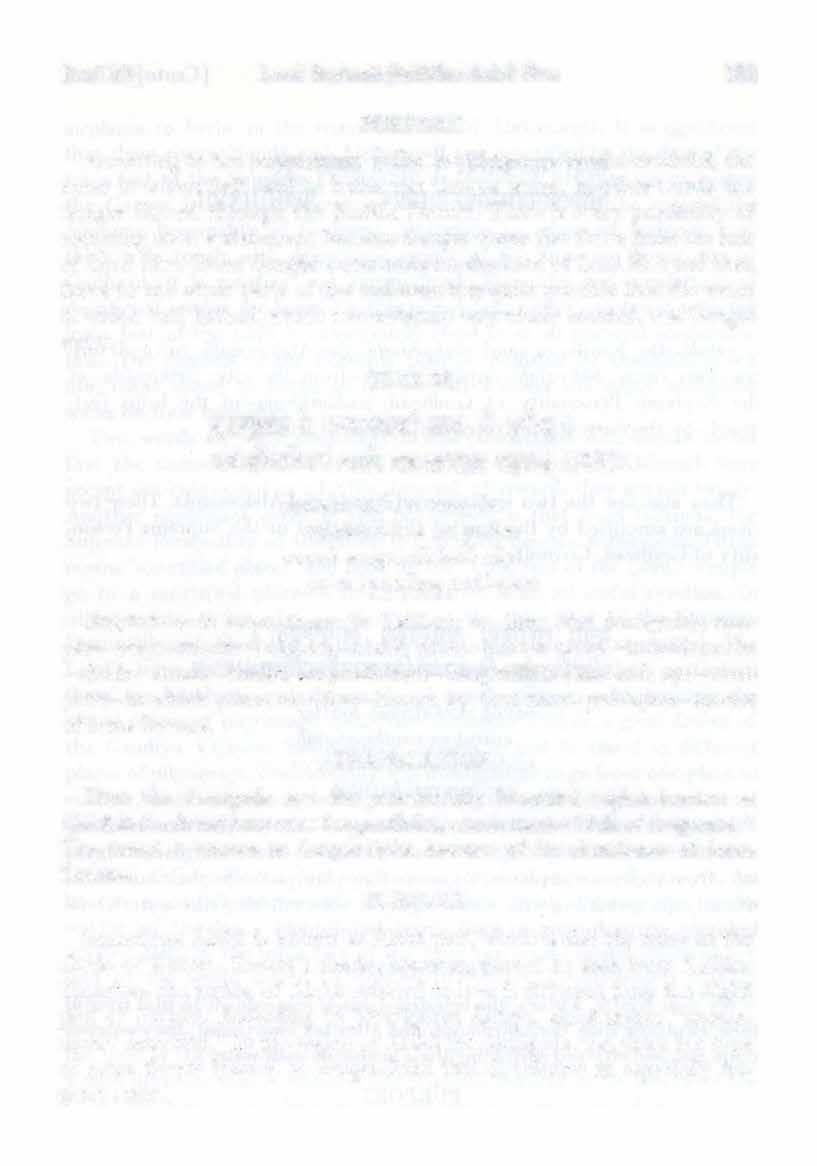
dadrsu�-saw; tatra-there (in Kailasa); te-they (the demigods); ramyam-very attractive; alakam-Alaka; nama-known as; vai-indeed; purim -abode; vanam-forest; sauga n dhikam-Sau gandhika; ca-and; api-even; yatra-in which place; tat-nama-known by that name;patikajam-species of lotus flowers.
TRANSLATION
Thus the demigods saw the wonderfully beautiful region known as AlakaintheforestknownasSaugandhika, which means "full of fragrance." The forest is known as Saugandhika because of its abundance of lotus flowers.
PURPORT
Sometimes Alaka is known as Alaka puri, which is also the name of the abode of Kuvera. Kuvera's abode, however, cannot be seen from Kailasa. Therefore the region of Alakii referred to here is different from the Alaka puri of Kuvera. According to Virariighava Acarya, alaka means "uncommonly beautiful." In the region of Alaka the demigods saw, there is a type of lotus flower known as Saugandhika that distributes an especially fragrant scent.
Text 23] Lord Brahma Satisfies Lord Siva 181
������llf�ll��ll
;::� �(RCiqC?SEfii em{ � �I
TEXT 24

���ftlWf;((l � �fhit ii'RRf: �(: I ���� �11��11
nanaa ciilakanandii ca saritau bahyataft puraft firthapada-padiimbhoja rajasiitiva piivane
nanda-the Nanda; ca-and; alakanandii-the Alakananda;ca-and; saritau-two rivers; bahyata{t -ou tside; pura�-from the city; tirthapada-of the Supreme Personality of Godhead; padiimbhoja-of the lotus feet; rajasii-bythedust; ativa- exceedingl.y; piivane-sanctified .
TRANSLATION
They also saw the two rivers named Nanda and Alakananda. These two rivers are sanctified by the dust of the lotus feet of the Supreme Personality of Godhead, Govinda.
TEXT 25
�: ij(�tt: �'ijfct� ���: I qiR��:f��f�d(t4i�6UII��II
yayoft sura-striya[l k,sattar avaruhya svadhigtyata� krT!fanti pumsa� siiicantyo vigiihya rati-karsitii!J,
yayo{t-inboth ofwhich(rivers); sura-striya�-thecelestialdamselsalong with theirhusbands; k§aUa�-0 Vidura; avaruhya-descending; svadhi§[lyata{!-fromtheirownairplanes;kri!fanti-theyplay;punisa[t-theirhusbands; siiicantya�- sprinklingwith water; vigiihya- ilfterentering(thewater);ratikarsitii�-whose enjoymenthas becomediminished.
TRANSLATION
My dear �atta, Vidura, the celestial damsels came down to that river in their airplanes with their husbands, and after sex enjoyment, they entered the water and enjoyed sprinkling their husbands with water.
PURPORT
It is understood that even the damsels of the heavenly planets are polluted by thoughts of sex enjoyment, and therefore they come in
182 Srlmad-Bhagavatam [Canto 4, Ch. 6
airplanes to bathe in the rivers Nandii. and Alakanandii.. It is significant that these rivers, Nandii. and Alakanandii., are sanctified by the dust of the lotus feet of the Supreme Personality of Godhead. In other words, just as the Ganges is sacred because its water emanates from the toes of the Supreme Personality of Godhead, Nii.rii.ya!J.a, so whenever water or anything is in touch with devotional service of the Supreme Personality of Godhead, it is purified and spiritualized. The rules and regulations of devotional service are based on this principle: anything in touch with the lotus feet of the Lord is immediately freed from all material contamination. The damsels of the heavenly planets, polluted by thoughts of sex life, come down to bathe in the sanctified rivers and enjoy sprinkling water on their husbands.
Two words are very significant in this connection. Rati-karsita means that the damsels become morose after sex enjoyment. Although they accept sex enjoyment as a bodily demand, afterwards they are not happy. Another significant point in this connection is that Lord Govinda, the Supreme Personality of Godhead, is described here as tirtha-pada. Tirtha means"sanctified place," and piida means "lotus feet of the Lord." People go to a sanctified place to free themselves from all sinful reaction. In other words, those who are devoted to the lotus feet of the Supreme Personality of Godhead, Kr�r;ta, automatically become sanctified. The Lord's lotus feet are called tirtha-piida because under their protection there are hundreds and thousands of saintly persons who sanctify the sacred places of pilgrimage. Srila Narottamadiisa Thakur, a great acarya of the Gau�iya Vai�r;tava Sampradaya, advises us not to travel to different places of pilgrimage. Undoubtedly,itis troublesome to gofrom one placeto another, but one who is intelligent can take shelter of the lotus feet of Govinda and thereby be automatically, sanctified as the result of his pilgrimage. Anyone who is fixed in the service of the lotus feet of Govinda is called tirtha-piida; he does not need to travel on various pilgrimages, for he can enjoy all the benefits of such travel simply by engaging in the service of the lotus feet of the Lord. Such a pure devotee who has implicit faith in the lotus feet of the Lord can create sacred places in any part of. the world where he decides to remain. Tirthikurvanti tirthiini (Bhag. 1.13.10). The places are sanctified due to the presence of pure devotees; any place automatically becomes a place of pilgrimage if either the Lord or His pure devotee remains or resides there. In other words, such a pure devotee, who is engaged one hundred percent in the service of the Lord, can remain anywhere in the universe, and that part of the universe immediatelybecomes a sacred place where he can peacefullyrender service to the Lord as the Lord desires.
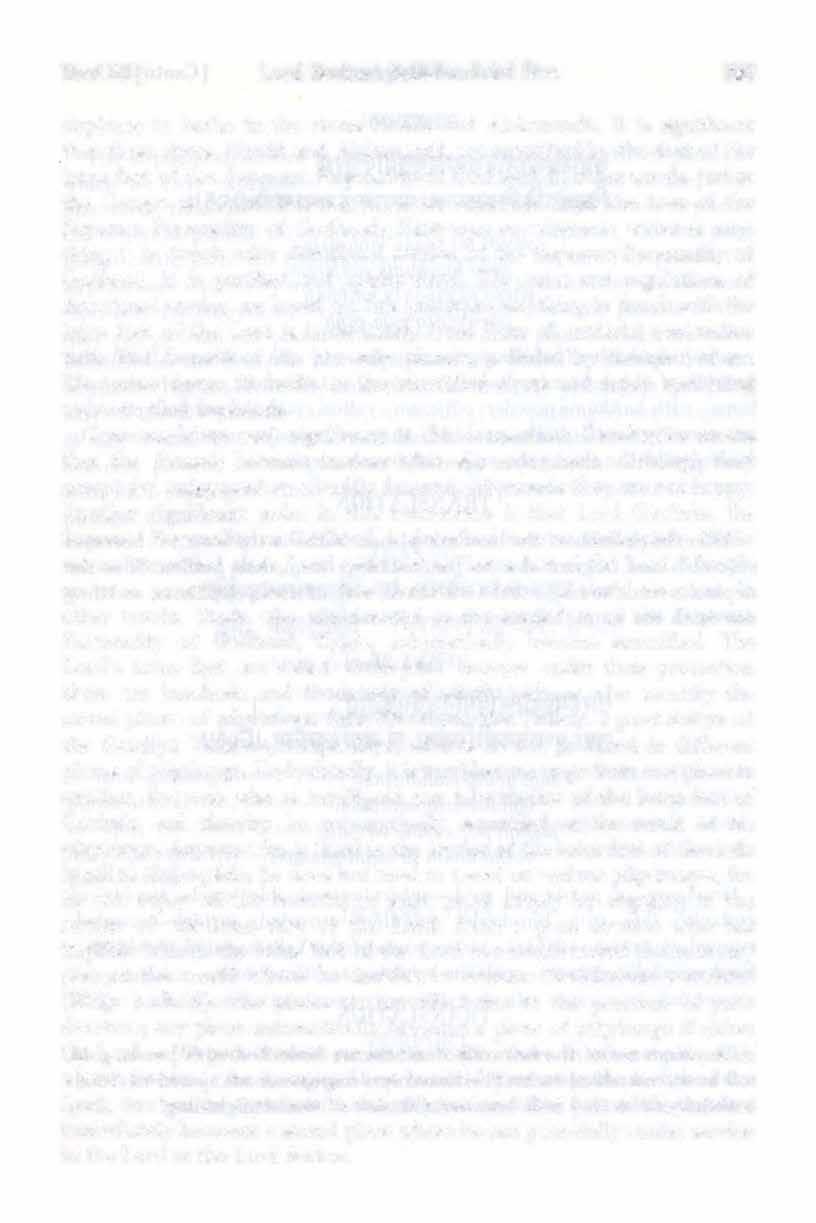
Text 25] Lord Brahmii Satisfies Lord Siva 183
TEXT 26
yayostat-snana-vibhrafitanava-kuhkuma-pinjaram vitrfiopipibantyambha[l payayantoga]agafz{t
yayo{t-in both of which rivers; tat-sniina-by the bathing of them (the damsels of the heavenly planets); vibhra§ {a- fallen off;nava-fresh;kunkuma-withkunkumapowder;piiijaram-yellow;vitr�a{t-not being thirsty ; api-even;piba11ti- drink; ambhary-the water;payayanta�t- causing to drink; gaja{t-the elephants; gaji'{t -the female elephants.

TRANSLATION
After the damsels of the heavenly planets bathe in the water, it becomes yellowish and fragrant due to the kurikuma from their bodies. Thus the elephants come to bathe there with their wives, the she-elephants, and they also drink the water, although they are not thirsty.
TEXT 27

iara-hema-maharatnavimana-sata-sankulam
ju.$tampur-yajana-strTbhir
yathakhamsa-ta{lid-ghanam
tara-hema-of pearls and gold; maharatna-valuable jewels; vimana-of airplanes; sata-with hundreds; sankulam - crow ded; ju${cim.-occupied, enjoyed ; pu[tyajana-stribhi{t-by the wives of the Yak�as; yathii-as;khamthe sky; sa-ta{lit-ghanam-with the lightning and the clou ds.


TRANSLATION
The airplanes of the heavenly denizens are bedecked with pearls, gold, and many valuable jewels. The heavenly denizens are compared to clouds in the sky decorated with occasional flashes of electric lightning.
184 Srimad-Bhagavatam
�q1�«iilwtfcnAe;wcttl'1f� [Canto 4, Ch_ 6 �sA q·��;ij·��:������
iji�'ICIOIN'llwt�.Htd� I
���11�\911
���lllwt4'f�qt
PURPORT
The airplanes described in this verse are different from the airplanes of which we have experience. In the Srimad-Bhiigavatam and all the Vedic literatures, there are many descriptions of vimiina, which means airplanes. On different planets there are different kinds of airplanes. On this gross planet earth, there are airplanes run by machine, but on other planets the airplanes are notrun by machine but bymantric hymns. They are also used especially for enjoyment by the denizens of the heavenly planets so that they can go from one planet to :mother. On other planets which are called Siddhalokas the denizens can travel from one planet to another without airplanes. The beautiful airplanes from the heavenly planets are compared here to the sky because they fly in the sky; the passengers are compared to the clouds. The beautiful damsels, the wives of the denizens of the heavenly planets, are compared to lightning. In summation, the airplanes with their passengers which came from higher planets to KaiHisa were very pleasant to look at.
TEXT 28

hitvii yak1�esvarapur"im vanam saugandhikam ca tat drumaift kiima-dughair hrdyam citra-miilya-phala-cchadai{l
hitva-passing over; yak§a-isvara-the lord of the Yak�as (Kuvera); purim- theabode; vanam-theforest; saugandhikam-named Saugandhika; ca-and; ta t - that ; drumailt- with trees; kama-dughailt - yielding desires; hrdyam-attractive; citra-variegated; miilya-flowers; phala-fruits; chadaift-leaves.


TRANSLATION
While traveling, the demigods passed over the forest known as Saugandhika, which is full of varieties oi' flowers, fruits and desire trees. While passing over the forest they also saw the regions of Y ak�svara.
PURPORT
Yak�esvara is also known as Kuvera, and he is the treasurer of the demigods. In the descriptions of him in Vedic literature, it is stated that he is
Text 28] Lord Brahma Satisfies Lord Siva 185
f(m= <t;f �: ������
fabulously rich. It appears from these verses that Kailasa is situated near the residential quarters of Kuvera. It is also stated here that the forest was full of desire trees. In Brahma-samhitii. we learn about the desire tree which is found in the spiritual world, especially in Kr�I)aloka, the abode of Lord Krsna. We learn here that such desire trees are also found in Kailasa, the re�tdence of Lord Siva, by the grace of Kr�I)a. It thus appears that Kailasa has a special significance; it is almost like the residence of Lord Kr�I)a.


TEXT 29

('ffiCW'6(CI4114\W(iiN(I'Ie�((4( . �.�(1��

(C4(((0C\ii�N"44( 11�'11 rakta-ka(ltha-khagiin"ikasvara-map{lita-fiat-padam kalahamsa-kula-prefitharh khara-dap(la-jalasayam
rak ta- reddish ; kap_tha-nec ks; khaga-anika-of many birds; svara-with the sweet sounds ; map{li ta- dec orated; �at-padam- bees; kalahathsa-kulaof groups of swans; pre§tham-very dear; khara-da!t!la-lotus flowers; jaliisayam-lakes.
TRANSLATION
In that celestial forest there were many birds whose necks were colored reddish and whose sweet sounds mixed with the humming of the bees. The lakes were abundantly decorated with crying swans as well as strongstemmed lotus flowers.
PURPORT
The beauty of the forestwas intensified by the presence of variouslakes. It is described herein that the lakes were decorated with lutus flowers and with swans who played and sang with the birds and th�� humming bees. Considering all these attribut<�s, one can imagine how IH:autiful this spot was and how much the demigods passing through enjoyed the atmosphere. There are many paths and b��autiful spots created by man on this planet, but none of them can surpass Lhos<� of Kailasa, as they are described in these verses.
TEXT 30
186 Srimad-Bhigavatam [Canto 4, Ch. 6
ctW�tg<4'l'!'R=..�-.�nsew• 1 �fA4\ilwt\4ftulf Q(il{ill4"4rilwt:II� o II
vanakunjara-sahghrfotaharicandana-vayunii
adhi pu(lyajana-stri(liim muhur unmathayan manaft
vana-kufijara-by wildelephants; sanghnta-rubbed against; hari-candana -the sandalwood trees; vayuna- by the breeze; adhi-further; pu(lyajanastr'iram-of the wives of the Yak�as; muhub-again and again; unmathayat -agitating; mana�- the minds.
TRANSLATION

All these atmospheric influences unsettled the forest elephants who flocked together in the sandalwood forest, and the blowing wind agitated the minds of the damsels there for further sex enjoyment.
PURPORT
Whenever there is a nice atmosphere in the material world, immediately there is an awakening of the sexual appetite in the minds of materialistic persons. This tendency is present everywhere within this material world, not only on this earth but in higher planetary systems as well. In complete contrast to the influence of this atmosphere on the minds of the living entities within the material world is the description of the spiritual world. The women there are hundreds and thousands of times more beautiful than the women here in this material world, and the spiritual atmosphere is also many times better. Yet despite the pleasant atmosphere, the minds of the denizens do not become agitated because in the spiritual world, the Vaikut�!ha planets, the spiritualistic minds of the inhabitants are so much absorbed in the spiritual vibration of chanting the glories of the Lord that such enjoyment could not be surpassed by any other enjoyment, even sex, which is the culmination of all pleasure in the material world. In other words, in the Vaikut�tha world, in spite of its better atmosphere and facilities, there is no impetus for sex life. As stated in Bhagavad-gitii (Bg. 2.59), param dntvii nivartate: the inhabitants are so spiritually enlightened that in the presence of such spirituality sex life is insignificant.
Text 31] Lord Brahma Satisfies Lord Siva
187
viipya
TEXT 31 �'66«lq1911 CJR a�qe'ilft.m: 1 SIR �s"tvt a 311(1(t?JI�������� vaidurya-krta-s0piinii
utpala- miilini[l
Srimad-Bhagavatam
praptam kimpuru§air dr§tva ta arad-dadrsur vatam
vaidurya-krta-made of vaidurya; sopana�-staircases; vapya�-lakes; utpala-of lotus flowers; malini{t-containing rows; praptam - inhabited; kimpuru�ai[l-by the Kimpuru�as; dr§t va-after seeing; te-those demigods; arat-not far away; dadrsuft-saw; vatam-a banyan tree.
TRANSLATION
They also saw that the bathing gha!s and their staircases were made of vaidiirya-ma1,1i. The water was full of lotus flowers. Passing by such lakes, the demigods reached a place where there was a big banyan tree.
TEXT 32

sa yojana-satotsedha[l padona-vitapayata[t paryak-krtacala-cchayo nirn"if]as tapa-varjitalt
sa�-that banyan tree; yojana-sata-one hundred yojanas (800 miles); utsedha�-height; piidona-less by a quarter (600 miles); vifapa- by the branches; ayata�-spread out; paryak-all around; krta-made ; acala-unshaken; chiiyatL-the shadow; nirn�a�-without bird nests; ti'ipa-varjital;twithout temperature.




TRANSLATION
That banyan tree was 800 miles high, and its branches spread over 600 miles around. The tree cast a fine shade which permanently cooled the temperature, yet there was no noise of birds.
PURPORT
Gen erally , in every tree there are bird nests, and the birds co ngregate in the evening and create noise. But it appears that this banyan tree was devoid of nests, and therefore it was calm, quiet and peaceful, and its temperature was undisturbed, so it was just suitable for meditation.
TEXT 33
188
[Canto 4, Ch. 6
� � ���:I q�'fl<tt,..e*'Wt�1 �t:l�n11��11
<tf41Ai,Mil¥4- � uu:I �:f�Rft;i II��II
tasmin ma hiiyogamaye
mumuk�u-sarar-e sura{!, dadrsu{l sivam iisinam
tyaktiimar�am ivantakam
tasmin-under that tree; mahayogamaye - having many sages engaged in meditation on the Supreme; mumuk�u-of those who desire liberation; sararze- the shelter; sura�-the demigods; dadrsu{l-saw; sivam- Lord Siva; asinam-seated; tyakta-amar�am- having given up anger; iva-as; antakameternal time.
TRANSLATION
The demigods saw Lord Siva sitting under that tree, which was competent to give perfection to mystic yogTs and deliver all people. As grave as time eternal, he appeared to have given up all anger.
PURPORT
In this verse the word mahii-yoga-maye is very significant. Yoga means meditation on the Supreme Personality of Godhead, and mahii-yoga means those who engage in the devotional service of Vi�QU. Meditation means remembering, smara{lam. There are nine different kinds of devotional service, of which smara11am is one process; the yogi remembers the form of Vi�QU within his heart. Thus there were many devotees engaged in meditation on Lord Vi�QU under the big banyan tree.
The Sanskrit word mahii is derived from the affix mahat. This affix is used when there is a great number or quantity, so mahii-yoga indicates that there were many great yogis and devotees meditating on the form of Lord Vi�Q.U. Generally such meditators are desirous of liberation from material bondage, and they are promoted to the spiritual world to one of the Vaikupthas. Liberation means freedom from material bondage or nescience. In the material world we are suffering life after life because of our bodily identification, and liberation is freedom from that miserable condition of life.

Text 34]
Brahma Satisfies
Lord
Lord Siva
189
34 6wtt<:;uq�rfu;{:�:��11"6fcli1Ci( I :aqr�uu;i � � ��·w�ri(11�\lll sanandanadyair mahasiddhai{l santai[l. samsiinta-vigraham upiisyamanarh sakhyii ca bhartra guhyaka-rak�asam
TEXT
sanandana-iidyai{t-the four Kumiiras headed by Sanandana; mahii-siddhai{l-liberated souls; santai{l-saintly; samsanta-vigraham-the grave and saintly Lord Siva; upiisyamiinam-was being praised; sakhyii-by Kuvera; ca-and; bhartrii-by the master; guhyaka-rakfiasiim-of the Guhyakas and the Rak�asas.
TRANSLATION
Lord Siva sat there, surrounded by saintly persons like Kuvera, the master of the Guhyakas, and the four Kumaras, who were already liberated souls. Lord Siva was grave and saintly.
PURPORT
The personalities who were sitting with Lord Siva are significant because the four Kumaras were liberated from birth. It may be remembered that after their birth these Kumaras were requested by their father to get married and beget children in order to increase the population of the newly created universe. But they refused, and at that time, Lord Brahma was angry. In that angry mood, Rudra, or Lord Siva, was born. Thus they were intimatelyrelated. Kuvera, the treasurer of the demigods, is fabulously rich. Thus Lord Siva's association with the Kumiiras and Kuvera indicates that he has all transcendental and material opulences. Actually, he is the qualitative incarnation of the Supreme Lord; therefore his position is very exalted.
TEXT 35

At�ta.f1q1alqq¥Uf�d �� 1 � R�� �����
vidyii-tapo-yoga-patham

asthitarh tam adhzsvaram
carantarh visva-suhrdarh
vatsalyal loka-mangalam
vidyi.i--knowledge;tapa�-austerity;yoga-patham-the path ofdevotional service; asthitam-situated;tam-him (Lord Siva); adh"isvaram-the master of the senses; carantam-performing (austerity, etc.); visva-suhrdam-the friend of the whole world;vatsalyiit-out of full affection;loka-ma1igalam -auspicious for everyone.


TRANSLATION
The demigods saw Lord Siva situated in his perfection as the master of the senses, knowledge, fruitive activities and the path of achieving perfec-
190 Srimad-Bhagavatam [Canto 4, Ch. 6
tion. He was the friend of the entire world, and due to his full affection for everyone, he was very auspicious.

PURPORT
Lord Siva is full of wisdom and tapasya, austerity. One who knows .the modes of work is understood to be situated on the path of devotional service to the Supreme Personality of Godhead. One cannot serve the Supreme Personality of Godhead unless he has achieved full perfectional knowled�e in the ways and means of perfor�ing devotional service.
Lord Siva is described here as adhlivara. Uvara means "controller," and adhlivara means particularly "controller of the senses." Generally our materially contaminated senses are apt to engage in sense gratificatory activities, but when a person is elevated by wisdom and austerity, the senses then become purified, and they become engaged in the service of the Supreme Personality of Godhead. Lord Siva is the emblem of such perfection, and t�erefore in the scriptures,it is said, vai§r.wviiniim yathii sambhul).: Lord Siva is a Vai�l}ava. Lord Siva, by his action within this material world, teaches all conditioned souls how to engage in devotional service twenty-four hours a day. Therefore he is described here as loka-mangala, good fortune personified for all conditioned souls.
TEXT 36

I 3l1l;t4UUWfll l'f �tl6'(������

lingam ca tiipasiibh�.tam

bhasma-dap.fla-jatajinam angena sandhyabhra-ruca
candra-lekham ca bibhratam
lirigam-symptom; ca-and;ttipasa-abhi�fam-desired by Saivite ascetics; bhasma-ashes; dap.pa-staff; jafa-matted hair; ajinam-antelope skin; arigena-with his body; sandhyiibhra- reddish;mea-colored;candra-lekham -the crest of a half moon; ca-and; bibhratam-bearing .
TRANSLATION
He was seated on a deer skin and was practicing all forms of austerity. Because his body was smeared with ashes, he looked like an evening cloud. On his hair,was the sign of a half moon, a symbolic representation.
Text 36] Lord Brahma Satisfies Lord Siva 191
=.. � 4t41f("i'iitlftt�'(
fW
PURPORT
Lord Siva's symptoms of austerity are not exactly those of a Vai�l)ava. Lord Siva is certainly the number one Vai�l)ava, but he exhibited a feature for a particular class of men who cannot follow the Vai�l)ava principles. The Saivites, the devotees of Lord Siva, generally dress like Lord Siva, and sometimes they indulge in smoking and taking intoxicants. Such practices are never accepted by the followers of Vai�f)ava rituals.
TEXT 37
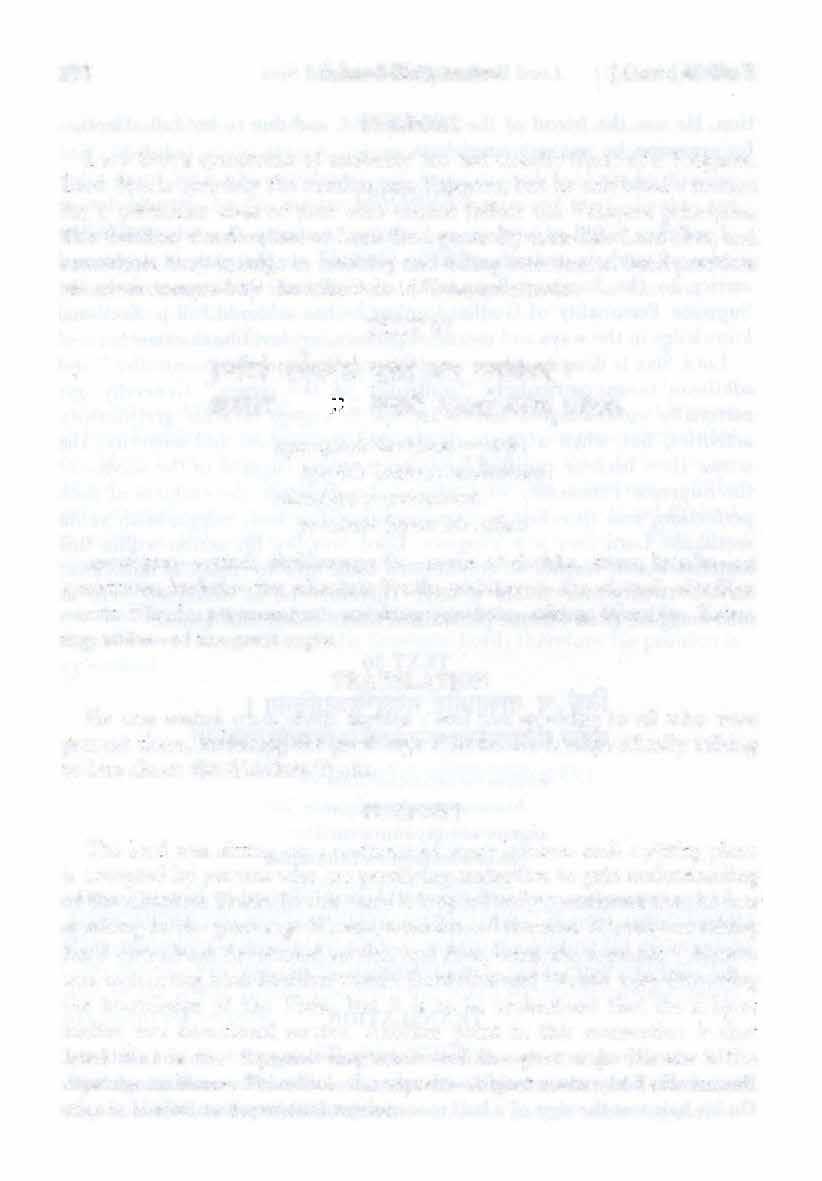
:rnw � � iRI ('litlijit'(I
itl(i(tt4 ��ijf �11�"11
upavi.starit darbhamayyarit
brsyarit brahma sanatanam naradaya pravocantarit prcchate snwatarit satam
upavi§tam-seated; darbhamayyiim-made of darbha, straw; brsyiim-on a mattress;brahma-the Absolute Truth;saniitanam-the eternal; niiradiiya -unto Narada;pravocantam-speaking;prcchate-asking;snwatiim-listening;satarn-of the great sages.


TRANSLATION
He was seated on a straw mattress and was speaking to all who were present there, including the great sage Narada. He was specifically talking to him about the Absolute Truth.
PURPORT
The lord was sitting on a mattress of straw because such a sitting place is accepted by persons who are practicing austerities to gain understanding of the Absolute Truth. In this verse it is specificallymentioned that he was speaking to the great sage Narada, a celebrated devotee. Narada was asking Lord Siva about devotional service, and Siva, being the topmost Vai�rtava, was instructing him. In other words, Lord Siva and Narada were discussing the knowledge of the Veda, but it is to be understood that the subject matter was devotional service. Another point in this connection is that Lord Siva is the supreme instructor and the great sage Narada is the supreme audience. Therefore, the supreme subject matter of Vedic knowledge is bhakti, or devotional service.
192 Srimad-Bhagavatam [Canto 4, Ch. 6
TEXT 38 � ���q.tlif.l � �%�+tR�I•U4hf �������II
krtvorau dakfiir-e savyam
pada-padmam ca ftinuni
bahum prako§the 'k�a-miiliim asinam tarka-mudraya

krtva-having placed; iirau-thigh; dak§ire-at the right; savyam-the left; piida-padmam-lotus feet; ca-and;jiinuni-on his knee; biihum-hand; prako§{he-in the end of the right hand; ak§a-miiliim-Rudriik�a beads; asi"nam-sitting; tarka-mudraya-with the mudra of argument.
TRANSLATION
His left leg was placed on his right thigh, and his left hand was placed on his left thigh. In his right hand he held rudr�a beads. This sitting posture is called virasana. He sat in the virasana posture, and his finger was in the mode of argument.
PURPORT
The sitting posture described herein is called viriisana according to the system of U§/iihga-yoga performances. In the performance of yoga there are eight divisions,· such as yama and niyama-controlling, following the rules and regulations, then practicing the sitting postures, etc. Besides viriisana there are other sitting postures, such as padmiisana and siddhiisana. Practice of these asanas without elevating oneself to the position of realizing the Supersoul, Vi�pu, is not the perfectional stage of yoga. Lord Siva is called yogisvara, the master of all yogis, and Kr�qais also called yogesvara. Yogisvara indicates that no one can surpass the yoga practice of Lord Siva, and yogesvara indicates that no one can surpass the ·yogic perfection of Kr�qa. Another significant word is tarka-mudrii. This indicates that the fingers are opened and the second finger is raised, along with the arm, to impress the audie·nce with some subject matter. This is actually a symbolic representation.
Text 39) Lord Brahma Satisfies Lord Siva
193
TEXT 39 � ••f.tctiuiQ+tiN+ttf'� �ftTmi 41•14iW( I
tfelEMit'SI pit ���llttf � Sll$t'S4H Jl'ita: ����II
tam brahma-nirva[la-samadhim asritam
vyupasritam giriSam yogakakfiam
saloka-pala munayo manunam
iidyam manum praiijalaya� prar-emu�
tam-him (Lord Siva); brahma-nirva�a-in brahmananda; samadhim-in trance; asritam-absorbed; vyupasritam-leaning on; girisam-Lord Siva; yoga-kak§am- having his left knee firmly fixed with a knotted cloth; saloka-palii�-along with the demigods (headed by Indra); munaya�-the sages; manunam-of all thinkers; adyam-the chief; manum-thinker; pranjalaya�-with foldedpalms; pra11emu�-offered respectful obeisances.
TRANSLATION
All the sages and the demigods, headed by lndra, offered their respectful obeisances unto Lord Siva with folded hands. Lord Siva was dressed in saffron colored garments and was absorbed in trance, thus appearing to be the head of all sages.
PURPORT
In this verse the word brahmiinanda is significant. This brahmiinanda, or brahma-nirviir;w, is explained by Prahlada Maharaja. When one is completely absorbed in the adhokfiaja, the Supreme Personality of Godhead, who is beyond the sense perception of materialistic persons, this is called brahmiinanda.

It is impossible to conceive of the existence, name, form, quality and pastimes of the Supreme Personality of Godhead because He is transcendentally situated beyond the conception of materialistic persons. Because materialists cannot imagine or conceive of the Supreme Personality of Godhead, they may think that God is dead, but factually He is always existing in His sac-cid-iinanda-vigraha, His eternal form. Constant meditation concentrated on the form of the Lord is called samiidh� ecstasy or trance. Samiidhi means particularlyconcentrated attention, so onewho has achieved the qualification of always meditating on the Personality of Godhead is to be understood to be always in trance and enjoying brohmanirv'ii[la or brahmiinanda. Lord Siva exhibited those symptoms, and therefore it is stated that he was absorbed in brahmiinanda.
Another significant word is yogakak§iim. Yogakak§iim is the sitting posture in which the left thigh is fixed under one's tightly knotted saffron
194 Srimad-Bhagavatam
[Canto 4, Ch. 6
colored garment. Also the words manuniim iidyam are significant here because theymean a philosopher or onewho is thoughtful and canthink very nicely. Such a man is called manu. Lord Sivais described in thisverse as the chief of all thinkers. Lord Siva,of course,does not engage in useless mental speculation, but as stated in the previous verse, he is always thoughtful regarding how to deliver the demons from their fallen condition of life. It is said that during the advent of Lord Caitanya, Sada-Siva appeared as Advaita Prabhu, and Advaita Prabhu's chief concern was to elevate the fallen conditioned souls to the platform of devotional service to Lord Kr�I)a. Since people were engaged in useless occupations which would continue their material existence, Lord Siva, in the form of Lord Advaita, appealed to the Supreme Lord to appear as Lord Caitanya to deliver these illusioned souls. Actually Lord Caitanya appeared on the request of Lord Advaita. Similarly, Lord Siva has a sampradaya, the Rudra Sampradaya. He is always thinking about the deliverance of the fallen soul�,as exhibited by Lord .Advaita Prabhu.
�(lti(�(f¥1'4(;(�tfW:
� �� f��-
�: � �Cf A�: ll'floll
sa tupalabhyagatam atma-yonim surasuresair abhivanditanghr*
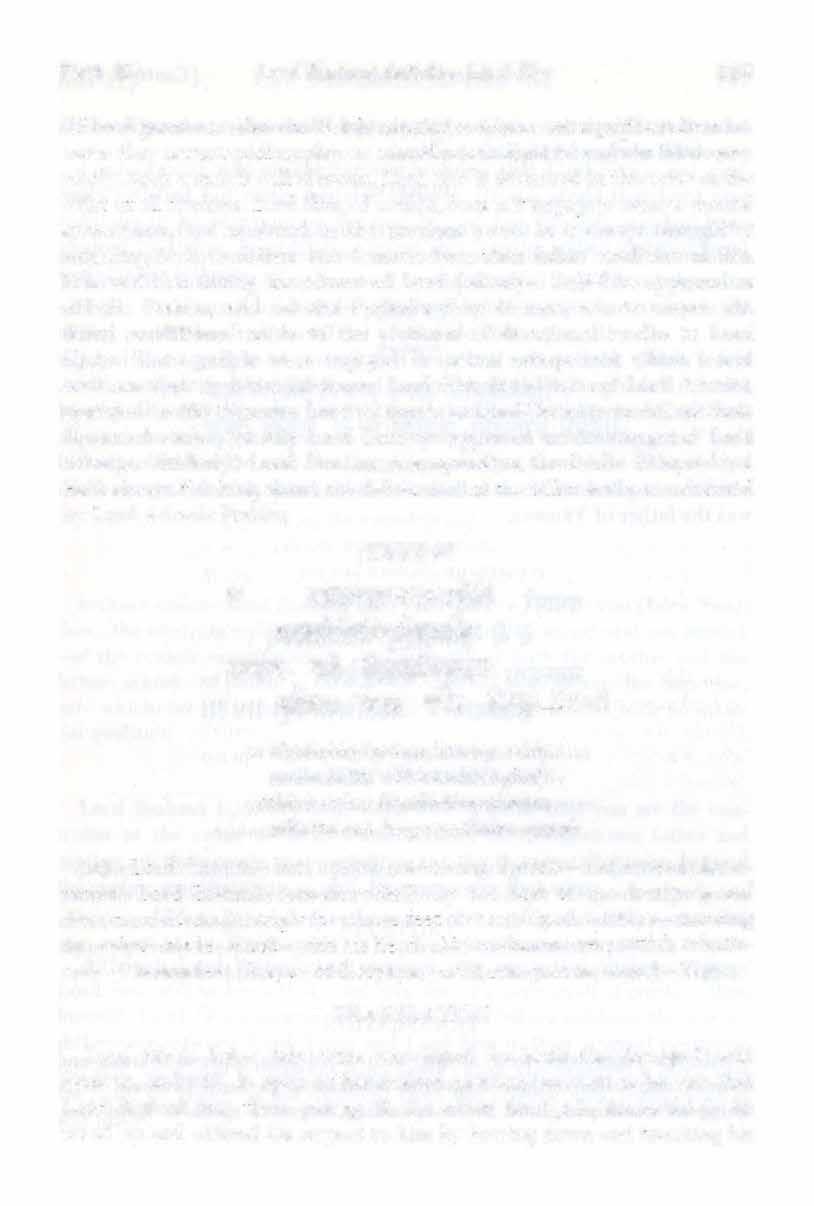
utthaya cakre sira.sabhivandanam arhallama[l kasya yathaiva vifirtuft
SU�l- Lord Siv a; lu-but; upalabhya-seeing; agatam-had arrived; atmayonim-· Lord Brah mi.i; sura-asura-isai�- by the best of the demigods and demons; abhivandita-a;tghrib-whose feet are worshiped ; utthaya-standing up; cakre-rnadc; sirasa-wilh his head; abh ivandanam- respectful ; arhattama�- Vamanadeva; kasya-of Kasyapa; yatha eva-just a ; vi�IJ-uf.t- Vi�l)u.
TRANSLATION
Lord Siva's lotus feet were worshiped by both the demigods and demons, and still, in spite of his exalted position, as soon as he saw that Lord Brahma was there among all the other demigods, immediately he stood up and offered his respect to him by bowing down and touching his
Text 40) Lord Brahma Satisfies Lord Siva 195
TEXT 40 � ([q�+�ltlallt�f.f
I
lotus feet. This action was just like that of Vamanadeva, who offered His respectful obeisances to Kasyapa Muni.
PURPORT
Kasyapa Muni was in the category of theliving entities, but he had a transcendental son, Vamanadeva, who was an incarnation of Vi�pu. Thus although Lord Vi�pu is the Supreme Personality of Godhead, He offered His respects to Kasyapa Muni. Similarly, when Lord K��l}a was a child He used to offer His respectful obeisances to His mother and father, Nanda and Yasodii. Also at the Battle of Kuruk�etra, Lord Kr�l)a touched the feet of Maharaja Yudhi�thira because he was His elder. It appears, then, that the Personality of Godhead, Lord Siva and other devotees, in spite of their being situated in exalted positions, instructed by practical example how to offer obeisances to their superiors. Lord Siva offered his respectful obeisances to . Brahma because Brahma was his father,just as Kasyapa Muni was the father of Vamana.
tathapare siddha-ga[la maharfiibhir
ye vai samantad anu nilalohitam namaskrta� praha sasanka-sekharam
krta-prartamam prahasann ivatmabhu�
tathii-so; apare-the others; siddha-ga[lii�-the Siddhas; maharfiibh*along with the great sages; ye-who; vai-indeed; samantiit-from all sides; anu-after; nilalohitam-Lord Siva; namaskrtatt-making obeisances; priiha -said; sasiinka-sekharam-to Lord Siva; krta-prartiimam-having made obeisances; prahasan-smiling; iva-as; iitmabhu�-Lord Brahma.


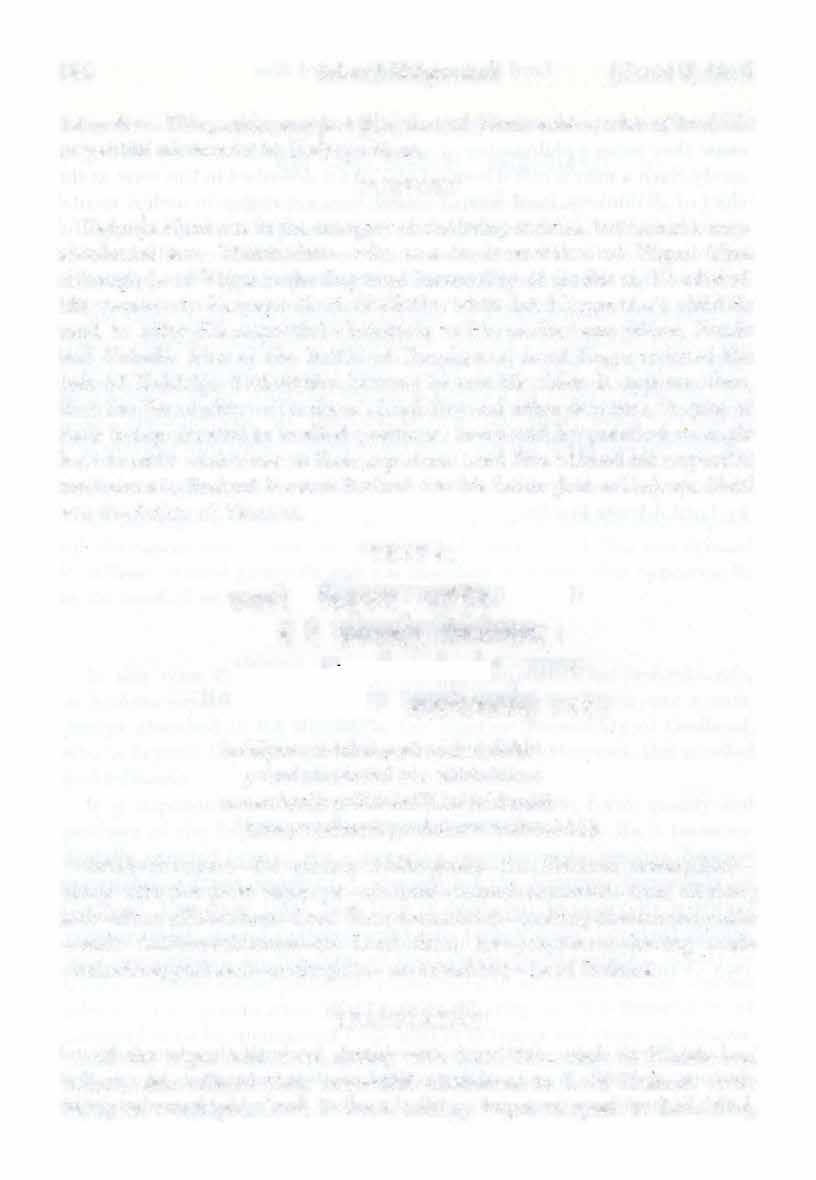
TRANSLATION
All the sages who were sitting with Lord Siva, such as Niirada and others, also offered their respectful obeisances to Lord Brahma. After being so worshiped, Lord Brahma, smiling, began to speak to Lord Siva.
196 Srimad-Bhagavatam [Canto 4, Ch. 6
� ft14:41011 'ICfifPtq� �G 4\e�lfl(fl{. I SIT( stCijf'l6CI�¥t'{: 11\l�ll
TEXT4l
PURPORT
Lord Brahma was smiling because he knew that Lord Siva is not only easily satisfied but easily irritated as well. He was afraid that Lord Siva might be in an angry mood because he had lost his wife and had been insulted by Dak�a. In order to conceal this fear, he smiled andaddressed LordSivaasfollows.·
ri:� =if qt ���� f-tW(� 11\l�ll
brahmoviica jane tviim"isam visvasya jagato yoni-bijayo� sakte� sivasya ca param yat tad brahma nirantaram

brahmii uviica-LordBrahmiisaid;jiine-I know;tviim-you (LordSiva); Tsam-thecontroller;visvasya-of theentire material manifestation; jagata� -of the cosmic manifestation; yoni-bTjayo�-of both the mother and the father;sakte�t-ofpotency;sivasya-of Siva;ca-and;param-the Supreme; yat-which;tat-that;brahma-withoutchange;nirantaram-withnomaterial qualities.
TRANSLATION
Lord Brahma said: My dear Lord Siva, I know that you are the controller of the entire material manifestation, the combination father and mother of the cosmic manifestation, and the Supreme Brahman beyond thecosmicmanifestation as well. I know you in thatway.
PURPORT
Although Lord Brahmii had received very respectful obeisances from LordSiva,stillheknewthatLordSivawasinamoreexaltedpositionthan himself. Lord Siva's position is described in Brahma-sarhhitii; there is no difference between Lord Vi�pu and Lord Siva in their original positions, but still Lord SivaisdifferentfromLordVi�pu. Theexampleisgiventhat the milk in yogurt is notdifferentfrom the original milk from which it wasmade.
Text 42] Lord Brahmii Satisfies Lord Siva 197
TEXT42 lf1it?fT"'
���4l�iR���1fw�;ft�:�q1: 1
TEXT43
� (4"qq): I A-•�q•�fffl�aicm � m1�11
tvam eva bhagavann etac chiva-saktyo[l. sva-rupayo[l. visvam srjasi pasy atsi krl:fjann ur!la-pato yatha
tvam-you;eva-certainly; bhagavan- 0 mylord; etat- this; siva-saktyo[l.being situated in your auspicious energy; sva-rupayo�-by your personal expansion; visvam-thisuniverse; srjasi-create; piisi- maintain; atsi-annihilate; knl!an-working; ur�a-pata�- spider's web; yathii-just like.


TRANSLATION
My dear lord, you create this cosmic manifestation, maintain it and annihilate it by expansion of your personality, exactly as a spider creates, maintains and winds up its web.
PURPORT
In this verse theword siva-sakti is significant. Siva means auspicious, and sakti means energy. There are many types of energies of the Supreme Lord, and all of them are auspicious. Brahma, Vi�Q.U and Mahesvara are called guru'ivatiiras or incarnations of material qualities. In the material world we compare these different incarnations from different angles of vision, but since all of them are expansions of the supreme auspicious, all of them are auspicious, although sometimes we consider one quality of nature to be higher or lower than another. The mode of ignorance or tamogura is considered very much lower than the others, but in the higher sense it is also auspicious. The example may be given herein that the government has both an educational department and criminal department. An outsider may consider the criminal department inauspicious, but fromthe government's point ofviewit is as important-as the education department, and therefore the government finances both departments equally, without discrimination.
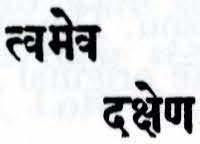
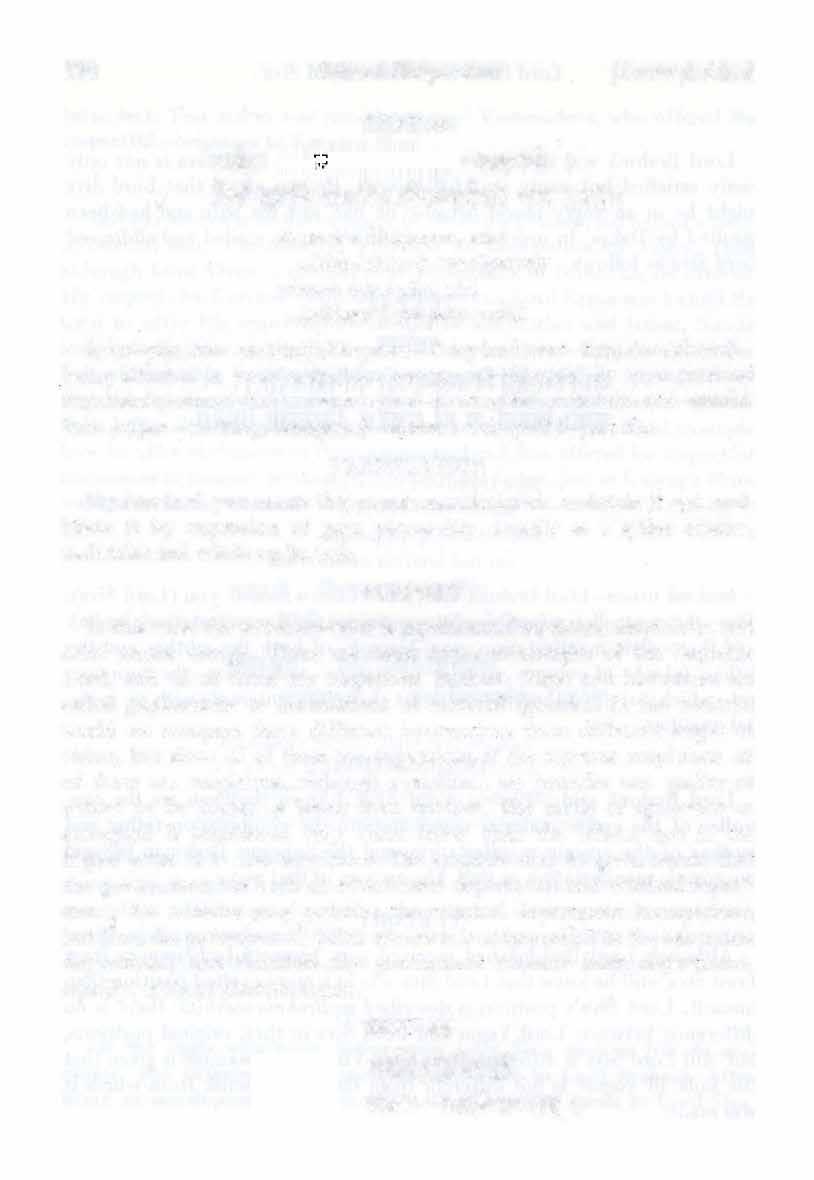
198 Srimad-Bhagavatam [Canto 4, Ch. 6
� �UJ ����
TEXT44
�" �"' � 'l� �: 11\J\JII
tvam eva dharmiirtha-dughiibhipattaye dak§er-a sutrer-a sasarjithiidhvaram
tvayaiva loke 'vasitiis ca setavo yiin briihmar-ii� sraddadhate dhrta-vratii�
tvam-your lordship; eva-certainly; dharma-artha-dugha-benefit derived from religion and economic development; abhipattaye-for their protection; dak�er-a-by Da�a; siitrer-a-making him the cause; sasarjithacreated; adhvaram-sacrifices; tvaya- by you; eva-certainly; loke-in this world; avasita�-regulated ; ca-and; setava�-respect for the varr-asrama institution; yan-which; brahmattiifl-the brahmar-as; sraddadhate- respect very much; dhrta-vrata� - taking it as vow.

TRANSLATION
My dear lord, your lordship has introduced the system of sacrifices through the agency of Da�a and thus one may derive the benefits of religious activities and economic development Under your regulative principles, the institution of the four vart;tas and asramas is respected. The brahmat;tas therefore vow to follow this system strictly.

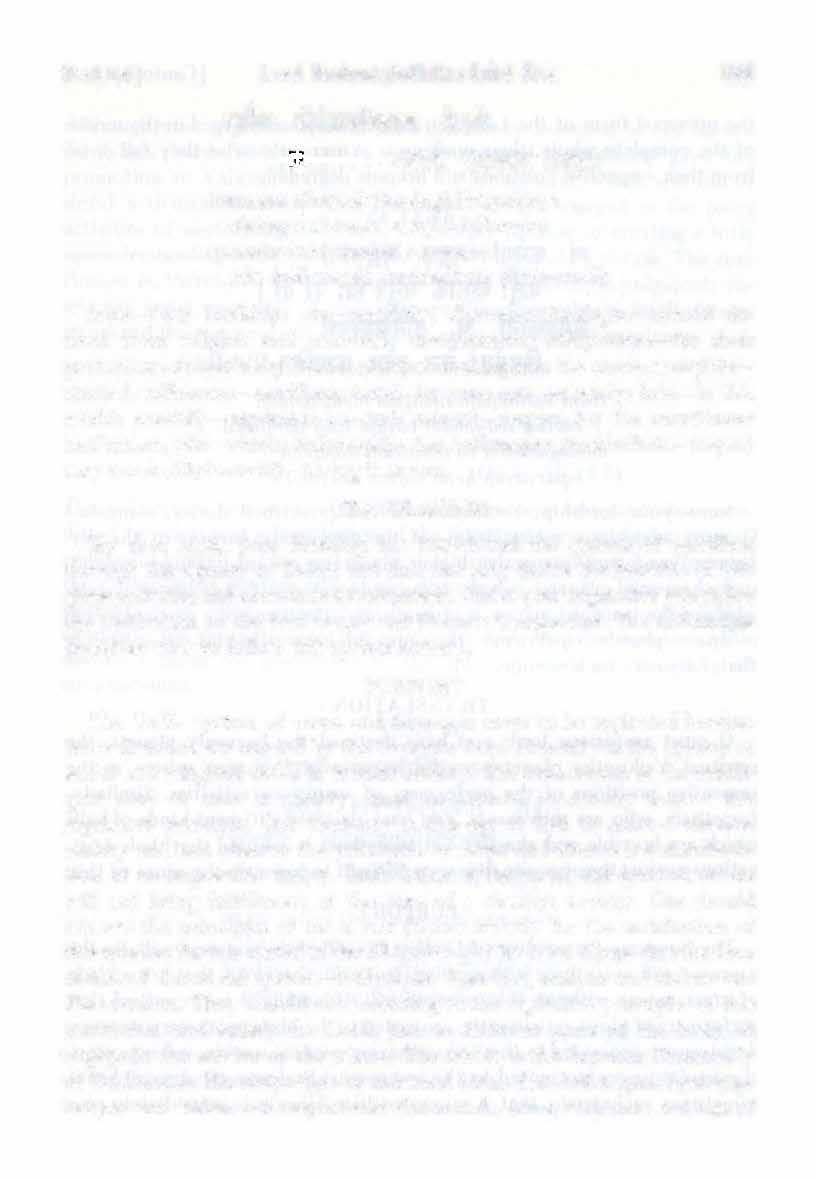
PURPORT
The Vedic system of varra and iisrama is never to be neglected because these divisions are created by the Supreme Lord Himself for the upkeep of social and religious order in human society. The brahmaras, as the intelligent class of men in society, must be avowed to steadily respect this regulative principle. The tendency in this age of Kali to make a classless society and not observe the principles of vartta and iisrama is a manifestation of an impossible dream. Destruction of the social and spiritual orders will not bring fulfillment of the idea of a classless society. One should observe the principles of varra and iisrama strictly for the satisfaction of the creator, for it is stated in the Bhagavad-gita by Lord KwJ.a that the four orders of the social system-lmihmaras, k§atriyas, vaisyas and Siidras-are His creation. They should act according to the regulative principles of this institution and satisfy the Lord, just as different parts of the body all engage in the service of the whole. The whole is the Supreme Personality of Godhead in His virata-riipa or universal form. The brahmaras, k§atriyas, vaiSyas and siidras are respectively the mouth, arms, abdomen and legs of
Text 44J Lord Brahma Satisfies Lord Siva
199
the universal form of the Lord. So long as they are engaged in Lhe service of the complete whole, their position is secure, otherwise they fall down from their respective positions and become degraded.
tvam karma[liim mangala mangalii.niim kartu/.1. sva-lokarh tanu�e sva{t pararh va amangaliiniirh ca tamisram ulbar:wm viparyaya/.1. kena /;adeva kasyacit
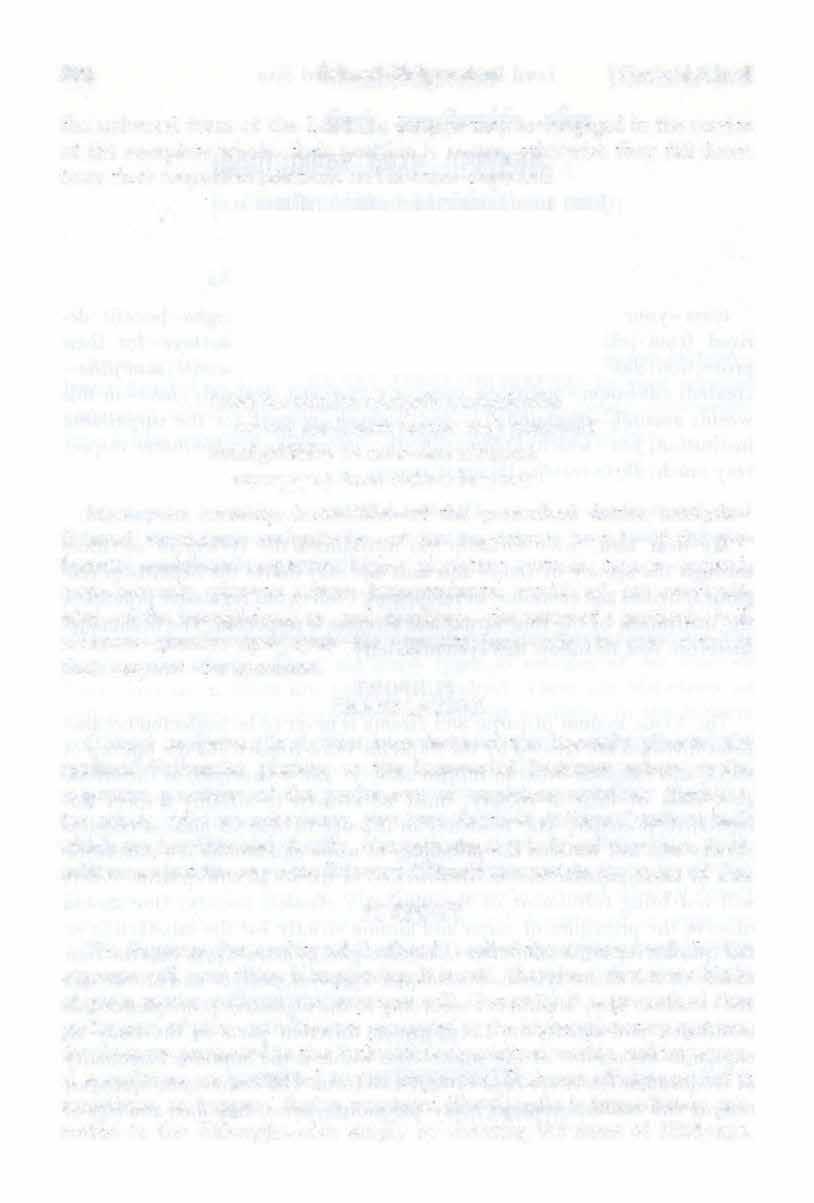
tvam-your lordship; karmaram-of the prescribed duties; marigala0 most auspicious; mangaliiniim-of the auspicious; kartu{t-of the performer; sva-lokam-respective higher planetary systems; tanu:Se - expand; sva{t-heavenly planets; param-transcendental world; va-or; amahgalaniim- of the inauspicious; ca-and; tamisram-the name of a particu.lar hell; ulbaram-ghastly ; viparyaya{t-the opposite; kena- why; tat eva- certainly that; kasyacit-for someone.
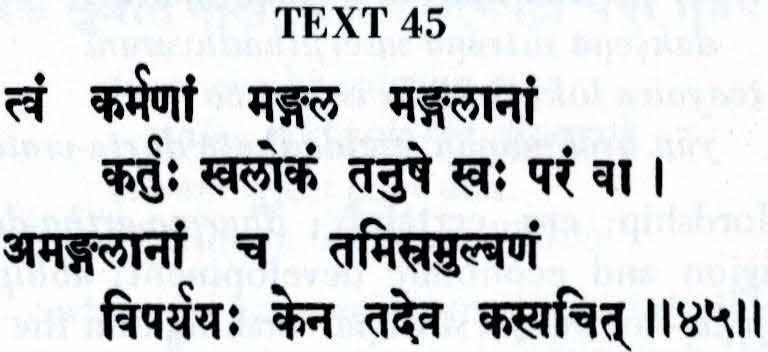
TRANSLATION
0 most auspicious lord, you have destined the heavenly planets, the spiritual Vaikut:�,ha planets, or the impersonal Brahman sphere as the respective positions of the performers of auspicious activities. Similarly, for others, who are miscreants, you have destined different kinds of hells which are horrible and ghastly. Yet sometimes it is found that their destinations arejust the opposite. Itis very difficult toascertain the cause of this.
PURPORT
The Supreme Personality of Godhead is called the supreme will. By the supreme will everything is happening. It is said, therefore, that not a blade of grass moves without the supreme will. Generally it is prescribed that performers of pious activities are promoted to the higherplanetary systems, devotees are promoted to the Vaikul).�has or spiritual worlds, and impersonal speculators are promoted to the impersonal Brahman effulgence; but it sometimes so happens that a miscreant like Aj iimila is immediately promoted to the Vaikut:��ha-loka simply by chanting the name of Niirayal).a.
200 Srimad-Bhagavatam [Canto 4, Ch. 6
Although when Ajamila uttered this vibration he intended to call his son Nariiyar;w, Lord Narayar;ta took it seriously and immediately gave him promotion to Vaiku�;ttha-loka, despite his background, which was full of sinful activities. Similarly King Dak�a was always engaged in the pious activities of performing sacrifices, yet simply because of creating a little misunderstanding with Lord Siva, he was severely taken to task. The conclusion is, therefore, that the supreme will is the ultimate judgment; no one can argue upon this. A pure devotee therefore submits in all circumstances to the supreme will of the Lord, accepting it as all-auspicious. tat te 'nukampam susamik.samarw bhufijana evatma-krtarh vipakam hrd-viig-vapurbhir vidadhan namas te jiveta yo mukti-pade sa daya-bhak (Bhiig. 10.14.8)

The purport of this verse is that when a devotee is in a calamitous condition he takes it as a benediction of the Supreme Lord and takes responsibility for himself for his past misdeeds. In such a condition, he offers still more devotional services and is not disturbed. One who lives in such a disposition of mind, engaged in devotionai service, is the most eligible candidate for promotion to the spiritual world. In other words, such a devotee's claim for promotion to the spiritual world is assured in all circumstances.
TEXT 46
na vai satiirh tvac-carartiirpitatmaniirh bhute�u sarve�v abhipasyatiirh tava bhutiini ciitmany aprthag-didrk�atiirh praye[la ro�o 'bhibhaved yathii pasum
na-not; vai-but; satam-of the devotees; tvat-cararw-arpita-atmanamof those who ai-e completely surrendered at your lotus feet; bhiite§uamong living entities; sarve�u-all varieties; abhipasyatam-perfectlyseeing; tava-your; bhiitani-living entities; ca-and; atmani-in the Supreme; aprthak-nondifferent; didrk§atam-those who see like that; praye[la-
Text 46) Lord Brahma Satisfies Lord Siva 201
... � m
� ��q��cti wt 1 �'If.{ �'4;:40l�f� snitut imsfil+t�tl�l�������
�SQ(UIIfif{lk+t�t
almost always; ro�a� -anger; abhibhavet-takes place; yathti-exactly like;, pasum- the animals.
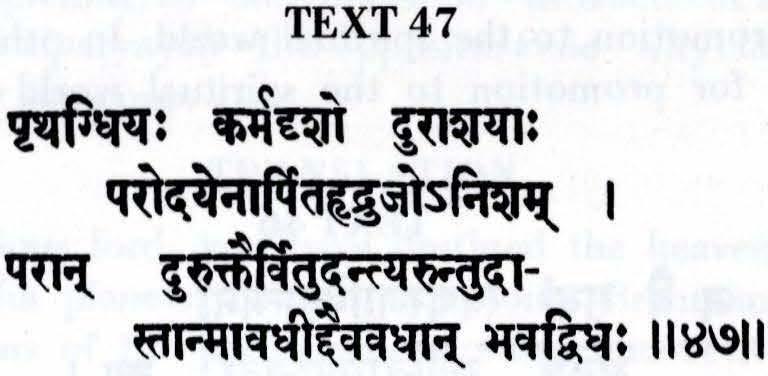
TRANSLATION
My dear lord, devotees who have fully dedicated their lives unto your lotus feet certainly observe your presence as Paramatma in each and every being, and as such they do not differentiate between one living being and another. Such persons treat all living entities equally. They never become overwhelmed by anger like animals, who can see nothing without differentiation.
PURPORT
When the Supreme Personality of Godhead becomes angry or kills a demon, materially it may appear unfavorable, but spiritually this is a blissful blessing upon him. Therefore pure devotees do not make any distinction between the Lord's anger and His blessings. They see both with reference to the Lord's behavior with others and themselves. A devotee does not find fault with the behavior of the Lord in any circumstances.
prthag-dhiya� karma-drso durasaya�
parodayenarpita-hrd-rujo 'nisam paran duruktair vitudanty aruntudiis
tiin mavadhid daiva-vadhan bhavad-vidhal;l
prthak-differen tly; dhiya�- those who are thinking; karma-fruitive activities; drsa� - observer; durasaya�-mean-minded; para-udayena-by others' flourishing condition; arpita-given up; hrt- heart; ruja� - anger; anisam-always; paran- others; duruktai�-harsh words; vitudanti-gives pain; aruntuda�-by piercing words; tan- unto them; ma- not; avadhitkill; daiva- by Providence; vadhan-already killed; bhavat-you; vidha�like.

202 Srimad-Bhigavatam [Canto 4, Ch. 6
Persons who observe everything with differentiation, who are simply attached to fruitive activities, who are mean-minded, who are always pained to see the flourishing condition of others and who thus give distress to them by uttering harsh and piercing words have already been killed by Providence. Thus there is no need for them to be killed again by an exalted personality like you.
PURPORT
Persons who are materialistic and always engaged in fruitive activities for material profit cannot endure seeing the flourishing life of others. But for a few persons in Kr�l)a consciousness, the entire world is full of such envious persons, who are perpetually full of anxieties because they are attached to the material body and are without self-realization. Since their hearts are always filled with an)i:iety, it is understood that they have already been killed by Providence. Thus Lord Siva, as a self-realized Vai�l,lava, was advised not to kill Dak�a. A Vaiwava is described as paradu�kha-du�khi because although he is never distressed in any condition of life, he is distressed to see others in a distressed condition. Vai�l,lavas, therefore, should not try to kill by any action of the body or mind but should try to revive the Kr�l}:a consciousness of others out of compassion for them. The Kr�l)a consciousness movement has been started �o deliver the envious persons of the world from the clutches of maya, and even though they are sometimes put in trouble, devotees push on the Kr�l)a consciousness movement in all tolerance. Lord Caitanya advises:
trflad api sunicena taror api sahi§[!Una amanina manadena kirtaniya� sada hari�
"One can chant the holy name of the Lord in a humble state of mind, thinking himself lower than the straw in the street. One should be more tolerant than the tree, devoid of all sense of false prestige and ready to offer all respects to others. In such a state of mind one can chant the holy name of the Lord constantly." (Sik§a§takam, 3)
A Vai�Qava should follow the examples of such Vai�qavas as Haridasa ':fhakura, Nityananda Prabhu and also Lord Jesus Christ. There is no need to kill anyone who has already been killed. But it should be noted herewith that a Vai�l,lava should not tolerate the blaspheming of Vi�l,lU or Vai�l,lavas, although he should tolerate personal insults to himself.

Text 47] Lord Brahma Satisfies Lord Siva 203
TRANSLATION
TEXT48

� � �(ifll{q'(lfqJ
�� �N'�: 'l�: I
��VI' �qtll � � � �if4ik1ktlij �II'J�II
yasmin yada puf!kara-nabha-mayaya durantaya spnta-dhiyaf!. prthag-drsa� kurvanti tatra hy anukampaya krpam na sadhavo daiva-balat krte kramam
yasmin-in some place; yada-when; pu�kara-nabha-miiyaya-by the illusory energy of Pu�karanabha, the Supreme Personality of Godhead; durantaya-insurmountable; spr��a-dhiya�-bewildered; prthak-dpfa�-the same persons who see differently ; kurvanti-do; tatra-there; hi-certainly; anukampaya-out of compassion; krpam-mercy; na-never; sadhava�saintly persons; daiva-balat-by Providence; krte-being done; kramamprowess.
TRANSLATION
My dear lord, if in some places materialists who are already bewildered by the insurmountable illusory energy of the Supreme Godhead sometimes commit offenses, a saintly person, with compassion, does not take this seriously. Knowing that they committed the offenses because they were overpowered by the illusory energy, he does not show his prowess to counteract them.
PURPORT
It is said that the beauty of a tapasvi or saintly person is forgiveness. There are many instances in the spiritual history of the world in which many saintly persons, although unnecessarily harassed, did not take action, although they could have done so. Parik�it Maharaja, for example, was unnecessarily cursed by a brahmara boy, and this was very much regretted by the boy's father, butParik�it Maharaja accepted the curse and agreed to die within a week asthe brahmar;za boy desired. Parlk�it Maharaja was the Emperor and was full in power both spiritually and materially, but out of compassion and out of respect for the briihmara community, he did not c ounteract the action of the brahmarw boy but agreed to die within seven days. Because it was desired by Kr�qa that Parik�it Maharaja agree to the punishment so that the instruction of Srimad-Bhagavatam
204
Srimad-Bhagavatam
[Canto 4, Ch_ 6
would thus be revealed to the world, Parik�it Maharaja was advised not to take action. A Vai�t;�ava is personally tolerant for the benefit of others. When he does not show his prowess, this does not mean that he is lacking in strength, but it indicates that he is tolerant for the welfare of the entire human society.
TEXT49
�� �a: � �liT ���'lf!'«RI:
bhaviirhstu purhsa� paramasya miiyayii durantayiispr�ta-mat* samasta-drk tayii hatiitmasv anukarma-cetarysv anugraharh kartum iharhasi prabho

bhaviin-your lordship; tu-but; purhsalt-of the person; paramasya- the supreme; miiyayii-by the material energy; durantayii-of great potency; aspnta-unaffected; mat*-intelligence; samasta-drk-seer or knower of everything; tayii-by the same illusory energy; hata-iitmasu-bewildered at heart; anukarma-ceta�su-whose hearts are attracted by fruitive activities; anugraham- mercy; kartum-to do; iha-in this case; arhasi-desire; prabho0 lord.

TRANSLATION
My dear lord, you are never bewildered by the formidable influence of the illusory energy of the Supreme Personality of Godhead. Therefore you are omniscient and should be merciful and compassionate upon those who are bewildered by the same illusory·energy and are very much attached to fruitive activities.
PURPORT
A V ai�t;�ava is never bewildered by the influence of the external energy because he is engaged in the transcendental loving service of the Lord. The Lord states in Bhagavad-gitii:
daiv"i hy efiii gu[tamay"imama miiyii duratyayii
miim eva ye prapadyante miiyiim etiirh taranti te
"My divine energy consisting of the three modes of material nature is difficult to overcome. But those who have surrendered unto Me can easily
Text49] Lord Brahma Satisfies Lord Siva 205
�lfl ,(fk¥4((4��(1:� �ma �m 11\lQ.,II
cross beyond it." (Bg. 7.14) A Vai�r:tava should take c;:tre of those who are bewildered by this miiyii instead of becoming angry with them because without a Vai�r:tava's mercy they have no way to get out of the clutches of miiyii. Those who have been condemned by miiyii are rescued by the mercy of devotees.
vanca-kalpatarubhyas ca krpii-sin.dhubhya eva ca patitanam pavanebhyo vaifi{tavebhyo nama nama{l
"I offer my respectful obeisances unto all the Vai�r:tava devotees of the Lord. They are just like desire trees who can fulfill the desires of everyone, and they are full of compassion for the fallen conditioned souls." Those who are under the influence of the illusory energy are attracted to fruitive activities, but a Vai�?r:tava preacher attracts their hearts to the Supreme Personality of Godhead, Sri Kmw.
TEXT 50

WI� llllf ijtt �q:
kurv adhvarasyoddharar-am hatasya bho{l tvayiisamaptasya mano prajiipate{l na yatra bhiigam tava bhiigino dadu{t ku-yiijino yena makho niniyate
kuru -just execute; adhvarasya-of the sacrifice; uddhara{Iam-complete regularly; hatasya-killed; bho�-0; tvayii-by you; asamiiptasya-of the unfinished sacrifie(�; mano-0 Lord Siva; prajiipate�-of Maharaja Dak�?a; na-not; yatra - where ; bhiigam-share; tava-your; bhiigina�-deserving to take the share; dadu{t-did not give; ku-yiijina�-bad priests; yena-by the beslower; makha�-saer ificc; niniyate-gets the result.
TRANSLATION
My dear Lord Siva, you are a shareholder of a portion of the sacrifice, and you are thegiver of t he result. The bad priests did not deliver your
206 Srimad-Bhagavatam [Canto 4, Ch. 6
���
��ttl«¥tiH�
� lit:
¥twiT 31�m: I
��;{J itWJ � Mwfltt� ll�oll
share, and therefore you destroyed everything, and the sacrifice remains unfinished. Now you can do the needful and take your rightful share.
TEXT 51
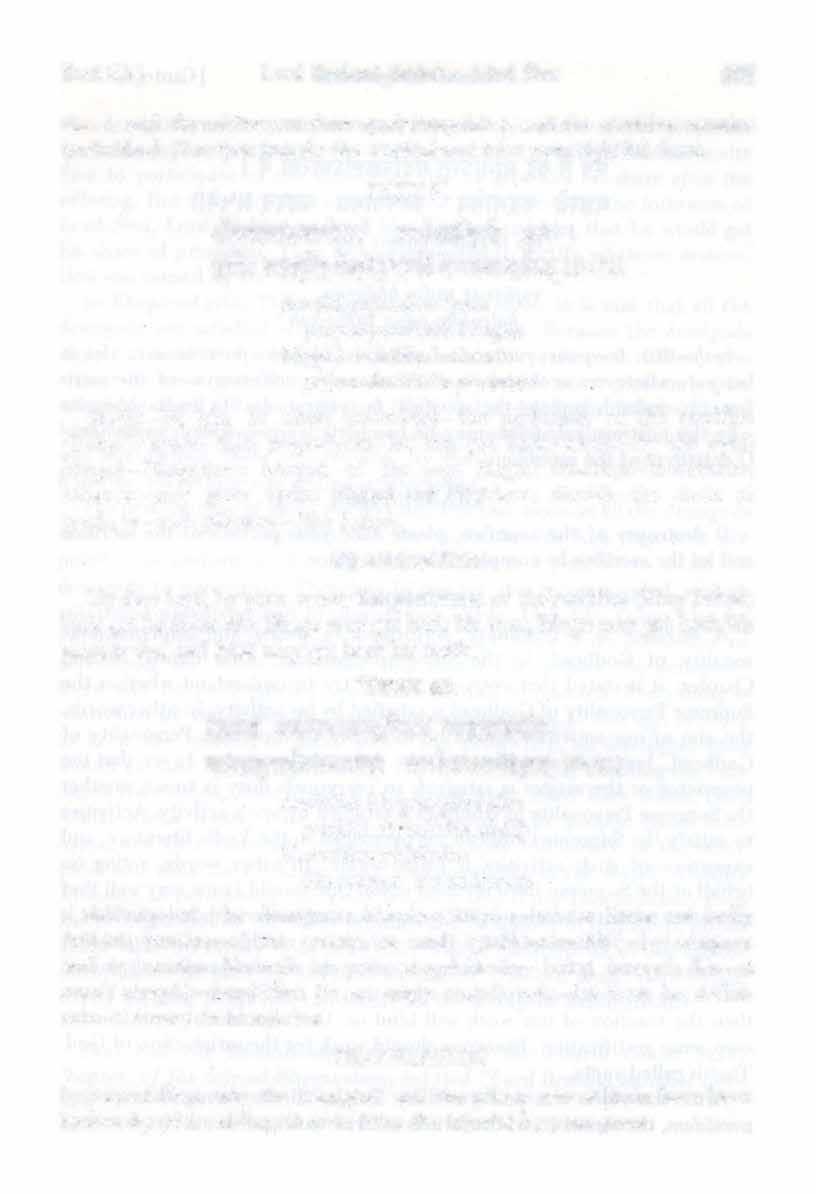
\1ftiHUQiitttlitl� SfqQ(UfaJoft �: I
�:�OJ���"��""'�"
jivatad yajamano 'yam
prapadyetak�irti bhaga� bhrgo� smasru[li rohantu pufiflO dantiis ca purvavat
jivatiit-let him be alive; yajamiina�-the performer of the sacrifice (Dak�a); ayam- this; prapadyeta-let him get back; ak�il)i-by the eyes; bhaga�-Bhagadeva; bhrgo�-of the sage Bhrgu; smasru!li-moustache; rohantu-may grow again; pu�fla�-of Pii�iideva; dantii�-the chain of teeth;ca-and;purvavat-like before.
TRANSLATION
Mydear lord, byyour mercythe performer of the sacrifice (King Dalqa) may get back his life, Bhaga may get back his eyes, Bhrgu may get back his moustache, and PU�a may get back his teeth.
TEXT 52
� �\ltii'SIIOII��'+41�1"4'tfq: I
�'4c:U�•OOijlwtlq� �s�wtl�l(11"'�11
devaniirh bhagna-gatral)iim rtvijarri ciiyudhasmabhift
bhavatiinugrhitiiniim iisu manyo 'stv aniituram
deviiniin-of the demigods; bhagna-giitriirtiim-whose limbs are badly broken; rtvijiim-of the priests; ca-and; iiyudha-asmabhi�-by weapons and by stones; bhavatii- by you; anugrhitiiniim- being favored; iisu- at once; manya[l-Lord Siva (in an angry mood); astu-let there be; aniituram-recovery from injuries.
TRANSLATION
0 Lord Siva, may the demigods and the priests whose limbs have been broken by your soldiers recover from the injuries byyour grace.
Text 52) Lord Brahma Satisfies Lord Siva 207
TEXT 53

� � '� ¥fltlt�« �-uifs-«f�� � I � �� �� � 11'-\�11

efia te rudra bhago 'stu yad-ucch�to 'dhvarasya vai yajnas te rudra bhiigena kalpatam adya yajna-han

e�a�-this; te-your; rudra-0 Lord Siva; bhaga�- portion; astu-let it be; yat-whatever; ucch�.ta[1-is the remainder; adhvarasya-of the sacrifice; vai-indeed; yajiia�-the sacrifice; te-your; rudra-0 Rudra; bhagena -by the portion; kalpatiim-may be completed; adya- today; yajiia-han0 destroyer of the sacrifice.
TRANSLATION
0 destroyer of the sacrifice, please take your portion of the sacrifice and let the sacrifice be completed by your grace.
PURPORT
A sacrifice is a ceremony erformed to please the Supreme Personality of Godhead. In the Srimad-Bhiigavatam, First Canto, Second Chapter, it is stated that everyone should try to understand whether the Supreme Personality of Godheadis satisfied byhis activity. In other words, the aim of our activities should be to satisfy the Supreme Personality of Godhead. Just as in an office it is the duty of the worker to see that the proprietor or the master is satisfied, so everyone's duty is to see whether theSupreme Personalityof Godheadis satisfied by one's activity. Activities to satisfy the Supreme Godhead are prescribed in the Vedic literature, and execution of such activities is called yajna. In other words, acting on behalfof the Supreme Lord is called yajna. One should know very well that any other activity besides yajiia is the cause of material bondage. That is explained in Bhagavad-gitii, Third Chapter, ninth verse: yajiiarthat karmat;to'nyatra loko 'yam karma-bandhanal,t. Karma-bandhana�1 means that if we do not work for the satisfaction of the Supreme Lord, Vi�Qu, then the reaction of our work will bind us. One should not work for his own sense gratification. Everyone should work for the satisfaction of God. That is called yajfia.
After the yajna was performed by Dak�a, all the demigods expected prosiidam, the remnants of foodstuffs offered to Vi�pu. Lord Siva is one of
208 Srimad-Bhagavatam [Canto 4, Ch. 6
the demigods, so naturally he also expected his share of the prasadam from the yajna. But Dak�a, out of his envy for Lord Siva, did not invite Siva to participate in the yajiia, nor did he give him his share after the offering. But after the destruction of the yajiia arena by the followers of Lord Siva, Lord Brahma pacified him and assured him that he would get his share of prasadam. Thus he was requested to rectify whatever destruction was caused by the followers.
In Bhagavad-gita, Third Chapter, eleventh verse, it is said that all the demigods are satisfied when one performs yajiia. Because the demigods expect prasadam from yajiias, yajiia must be performed. Those who engage in sense gratificato,ry materialistic activities must perform yajna, otherwise they will be im licated. Thus Dak�a, being the father of mankind, was performing yajn�, and Lord Siva expected his share. But since he was not invited, there was trouble. By the mediation of Lord Brahma, however, everything was settled satisfactorily.

The performance of yaj/ia is a very difficult task because all the demigods must be invited to participate in the yajiia. In this Kali-yuga it is not possible to perform such costly sacrifices, nor is it possible to invite the demigods to participate. Therefore in this age, it is recommended, yajiiaifl sankirtana-prayair yajanti hi sumedhasa� (Bhiig. 11.5.32). Those who are intelligent should know that in the Kali-yuga there is no possibility of performing the Vedic sacrifices. But unless one pleases the demigods, there will be no regulated seasonal activities or rainfall. Everything is controlled by the demigods. Under the circumstances, in this age, in order to keep the balance of social peace and prosperity, all intelligent men should execute the performance of sankirtana-yajna by chanting the holy names Hare J<r�J)a, Hare Kr�l)a, Kr�l)a Kr�l)a, Hare Hare/ Hare Riima, Hare Rama, Rama Riima, Hare Hare. One should invite people, chant Hare J<r�J)a, and then distribute prasadam. This yajiia will satisfy all the demigods, and thus there will be peace and prosperity in the world. Another difficulty in performing the Vedic rituals is that if one fails to satisfy even one demigod out of the many hundreds of thousands of demigods, just as Dak�a failed to satisfy Lord Siva, there will be disaster. But in this age the performance of sacrifice has been simplified. One can chant Hare J<r�l)a, and by pleasing J<r�J)a one can satisfy all the demigods automatically.
Thus end the Bhaktivedanta purports of the Fourth Canto, Sixth Chapter, of the Srimad-Bhagavatam, entitled "Lord Brahmii Satisfies Lord Siva."


Text 53] Lord Brahmii Satisfies Lord Siva 209
CHAPTER SEVEN
The sacrifice Performed byDak$a
maitreya uviica ityajeniinunztena bhavenaparitufiyatii abhyadhiiyimahiibiiho prahasyasruyatiimiti
maitreyafl-Maitreya; uviica-said; iti-thus; ajena-by Lord Brahma; anunitena-pacified; bhavena-by Lord Siva; parituuata-fully satisfied; abhyadhayi-said; mahabaho-0 Vidura; prahasya-smiling; sruyatamlisten;iti-thus.
TRANSLATION
The sage Maitreya said: 0 mighty-armed Vidura, Lord Siva, being thus pacified by the words of Lord Brahma, spoke as follows in answer to the request of Lord Brahma.

�5r7.1 � (�iwtl��wt �� CfR�61 I 31�1� 't(Nr(t � '(461fqf(t II i II
TEXT l
� if1fTTI WfNri� iJ1R � ;n��;:ij� I '�'tlttl� C(U'!�SI � 'tttlll � II 211
TEXT2
mahiideva uviica
niigham prajesa biiliiniim vaqwye niinucintaye deva-miiyiibhibhutaniim da(tf]as tatra dhrto maya

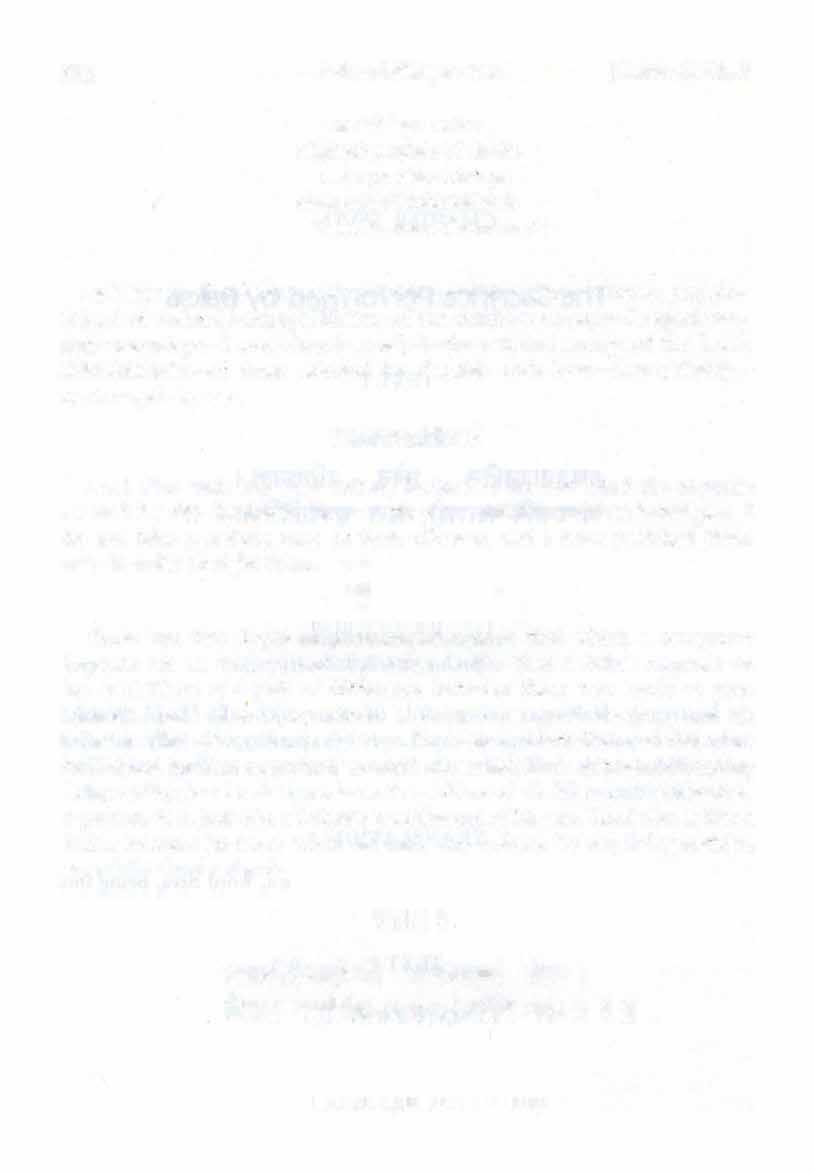
mahiidevaft-Lord Siva; uviica-said; na-not; agham-offense; prajesa0 lord of created beings; biiliiniim-of the children; var!laye-1 regard; nanot; anucintaye-1 consider; deva-miiyii- the external energy of the Lord; abhibhiitiiniim-of those deluded by; da!l{ia�- rod; tatra-there; dhrta�used; mayii-by me.

TRANSLATION
Lord Siva said: My dear father, Brahma, I do not mind the offenses created by the demigods. Because they are childish and less intelligent, I do not take a serious view of their offenses, and I have punished them only in order to rightthem.
PURPORT
There are two types of punishment. One is that which a conqueror imposes on an enemy, and the other is like that a father imposes on his son. There is a gulf of difference between these two kinds of punishment. Lord Siva is by nature a Vai�ryava, a great devotee, and his name in this connection is Asuto�a. He is always satisfied, and therefore he did not become angry as if he were an enemy. He is not inimical to any living entity, but he always wishes the welfare of all. Whenever he chastises a person, it is just like a father's punishment of his son. Lord Siva is like a father because he never takes seriously any offense by any living entities, especially the demigods.

212
Srimad-Bhagavatam
[Canto 4, Ch. 7
TEXT3 ��"�wn ��� m: 1 fiml �� �pj � � �: II � II prajiipater dagdha-Sir�!lO bhavatv aja-mukham siraft
mitrasya cakfiufiek�eta
bhagarh svarh barhifio bhaga�
prajiipate!t-of Prajapati Dak�a; dagdha-Sir�!!a�-whose head has been burned to ashes; bhavatu-let there be; aja-mukham-with the face of a goat;sira?t-a head;mitrasya-of Mitra; cak�u§a-through the eyes;!k§etamay see;bhiigam-share;svam-his own;barhi§a�-of the sacrifice;bhaga�Bhaga.

TRANSLATION
Lord Siva continued: Since the head of Dak�a has already been burned to ashes, he will have the head of a goat. The demigod known as Bhaga will be able to see his share of sacrifice through the eyes of Mitra.
TEXT4

pu§a tu yajamanasya dadbhir jak§atu pi§tabhuk deva� prakrta-sarvahga ye ma ucche.saf!arh dadu�
p'U§a-Pil�a; tu-but; yajamanasya-of the performer of the sacrifice; dadbh*-with the teeth; jak�atu-chew; pi§tabhuk-eating flour;devii�the demigods; prakrta- made; sarva-ariga�-complete;ye-who;me-unto me;ucche§af!am-a share of the sacrifice;dadu�-gave .
TRANSLATION
The demigod Pu�a will be able to chew only through the teeth of his disciples, and if alone, he will have to satisfy himself by eating dough made from chick pea flour. But the demigods who have agreed to give me my share of the sacrifice will recover from all their injuries.
PURPORT
The demigod Pu�a became dependent on his disciples for chewing. Otherwise he was allowed to swallow only dough made of chick pea flour.
Text 4] The Sacrifice Performed by Dak�a 213
Thus his punishment continued. He could not use his teeth for eating purposes because he had laughed at Lord Siva, deriding him by showing his teeth. In other words, it was not appropriate for him to have teeth because he had used them against Lord Siva.
TEXTS
illt�ld''Q'Wft:�((ijl+4rl��: I

41C4*4"4�iiflfR ���II�II
bahubhyam asvino{l pil§[W hastabhyarh krta-bahava{l bhavantv adhvaryavas ciinye basta-smasrur bhrgur bhavet
bahubhyam-with two arms; asvino{l-of Asvinikumara; pii§rza�-of Pli�a; hastiibhyam-with two hands; krta-bahava�-those in need of arms; bhavantu-they will have to; adhvaryava�-the priests; ca-and; anyeothers; basta-smasrtL�-the beard of the goat; bhrg�.t{t-Bhrgu; bhavet-he may have.
TRANSLATION
Those who have had their arms cut off will have to work with the arms of Asvinikumara, and those whose hands were cut off will have to do their work with the hands of Pii�a. The priests will also have to act in that manner. As for Bhrgu, he will have the heard from the goat's head.
PURPORT
Bhrgu M uni, a great supporter of Dak9a, was awarded the beard of the goat's head which was substituted for the head of Dak§a. It appears from the exchange of Dak§a's head that the modern scientific theory that the brain substance is the cause of all intelligent work is not valid. The brain substance of Dak§a and that of a goat are different, hut Dak§a still acted like himself, even though his head was replaced by that of a goat. The conclusion is that it is the particular consciousness of an individual soul which acts. The brain substance is only an instrument which has nothing to do with real intelligence. The real intelligence, mind and consciousness are part of the particular individual soul. It will he found in the verses ahead that after Dak§a's head was replaced by the goat's head, he
214 Srimad-Bhagavatam [Canto 4, Ch. 7
was as intelligent as he had previously been. He prayed very nicely to satisfy Lord Siva and Lord Vi�!)U, which is not possible for a goat to do. Therefore it is definitely concluded that the brain substance is not the center of intelligence;it is the consciousness of a particular soul thatworks intelligently. The whole movement of Kr�IJa consciousness is to purify the consciousness. It doesn't matter what kind of brain one has because if he simply transfers his consciousness from matter to Kr�Qa, his life becomes successful. It is confirmed by the Lord Himself in Bhagavad-gitii that anyone who takes up Kr�Qa consciousness achieves the highest perfection of life, regardless of whatever abominable condition of life he may have fallen into. Specifically, anyone in Kr�Qa consciousness goes back to Godhead, back to home, on leaving his present material body.
maitreya uviica tadii sarviirti bhutiini srutvii mi{lhu�tamoditam paritu§(iitmabhis tiita siidhu siidhv ity athiibruvan
maitreya�-the sage Maitreya;uviica-said;tadii-at that time; sarviiriall; bhiitiini-personalities;srutvii-after hearing; mi{lhu§(ama-the best of the benedictors (Lord Siva);uditam-spoken by;paritu§ta-being satisfied; iitmabh*-by heart and soul; tiita-my dear Vidura; siidhu siidhu-well done, well done; iti-thus; atha abruvan-as we have said.
TRANSLATION

The great sage Maitreya said: My dear Vidura, all the personalities present were very much satisfied in heart and soul upon hearing the words ofLord Siva, who is the best among the benedictors.
PURPORT
In this verse Lord Siva is described as mi{lhu§(ama, the best of the benedictors. He is also known asAsuto�a, which indicates that he is very q u ickly satisfied and very quickly angered. It is said in Bhagavad-gitii that less intel ligent persons go to the demigods for material benediction. In this connection, people generally go to Lord Siva, and because he is always
Text6] The Sacrifice Performed by Dalqa 215
TEXT6 mi!crrf � •��� ¥fi§e.U�1 qf(dtl�fil(ijl6 � mf'v��tt¥41!£�'{11 � II
quickly satisfied and gives benediction to his devotees without consideration, he is called mi�hu§tama, or the best of the benedictors. Materialistic persons are always anxious to get material profit, but they are not serious about spiritual profit.
Sometimes, of course, it so happens that Lord Siva becomes the best benedictor in spiritual life. It is said that once a poor briihmar-a worshiped Lord Siva for a benediction,and Lord Sivaadvised the devotee to go to see Sanatana Gosvami. The devotee went to Sanatana Gosvami and informed him that Lord Siva had advised him to seek out the best benediction from him (Sanatana). Sanatana had a touchstone with him, which he kept with the garbage. On the request of the poor briihmarw, Sanatana Gosvami gave him the touchstone, and the briihmar-a was very happy to have it. He now could get as much gold as he desired simply by touching the touchstone to iron. But after he left Sanatana, he thought,"If a touchstone is the best benediction, why has Sanatana Gosvami kept it with the garbage?" He therefore returned and asked Sanatana Gosvami, "Sir, if this is the best benediction, why did you keep it with the garbage?" Sanatana Gosvami theninformed him,"Actually, this is not the best benediction. But are you prepared to take the best benediction from me?" The briihmarw said, "Yes, sir. Lord Siva has sent me to you for the best benediction." Then Sanatana Gosvami asked him to throw the touchstone in the water nearby and then come back. The poor briihmar-a did so, and when he returned, Sanatana Gosvami initiated him with the Hare Kr�J]a mantra. Thus by the benediction of Lord Siva the briihmar-a got the association of the best devotee of Lord Kr�Qa and was thus initiated in the mahiimantra, Hare Kr�!]a, Hare Kr�Qa, Kr�J}.a Kr�f}.a, Hare Hare/ Hare Rama, Hare Rama, Rama Rama, Hare Hare.
TEXT7
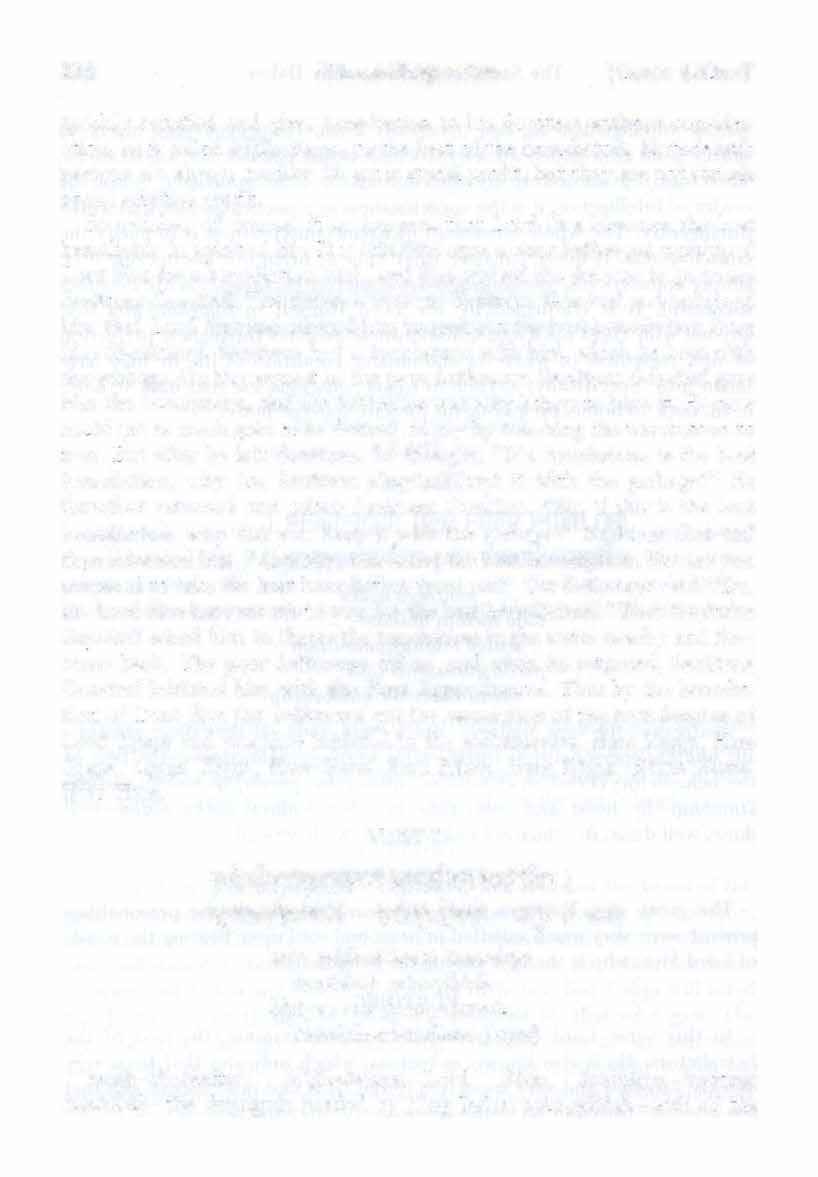
m�(qfQ+ti¥4;:;1J?f'tlelO:�: I
\�(ij«qit\ilwi � �: II \9 II
tato mi�hviirhsam iimantrya suniisirii� sahar�ibhi�
bhuyas tad deva-yajanarh sa-m'i�hvad-vedhaso yayu�
tata�-thereafter; mi�hviirhsam-Lord Siva; iimantrya-inviting; suniisirii�-the demigods headed by King lndra; saha-nibhi[t-with all the
216 Srimad-Bhagavatam [Canto 4, Ch. 7
great sages, headed by Bhrgu; bhiiya[l,-again; tat-thal; deva-yajanamplace where the demigods are worshiped; sa-mi�hvat-with Lord Siva; vedhasa[l,-with Lord Brahma; yayu[l,-went.
TRANSLATION
Thereafter, Bhrgu, the head of the great sages, invited Lord Siva to come to the sacrificial arena, and thus the demigods, accompanied by the sages, Lord Siva and Lord Brahmii, all went to the place where the great sacrifice was being performed.
PURPORT
The whole sacrifice arranged by King Dak�a had been disturbed by Lord Siva. Therefore all the demigods present there, along with Lord Brahma and the great sages, specifically requested Lord Siva to come and revive the sacrificial fire. There is a common phrase, siva-hina-yajiia: " Any sacrifice without the presence of Lord Siva is baffled." Although Lord Vi�pu is Yaj iiesvara, the Supreme Personality in the matter of sacrifice, still in each yajiia it is necessary for all the demigods, headed by Lord Brahma and Lord Siva, to be present.
TEXTS
R\lN Cfil��;r � ijq(\T(��: I
�: � �;r «�;,rqij): fm:: II � II
vidhiiya kiirtsnyena ca tad yad iiha bhagaviin bhava[l, sandadhu[l, kasya kiiyena savaniya-paso[l, sira[l,

vidhiiya-execu ting; kiirtsnyena-all in all;ca-also; ta t - that; yat-which; iiha-was said; bhagaviin-the Lord; bhava/:1 - Siva; sandadhu[l,-ex e cuted ; kasya-of the living (Dak�a); kiiyena- with the body; savaniya- meant for sacrifice; paso�-of the animal; siralt -head.
TRANSLATION
After everything was executed exactly as directed by Lord Siva, Dak�a's body was joined to the head of the animal that was meant to be killed in the sacrifice.
Text 8] The Sacrit'ice Performed by Da�a 217
PURPORT
This time, all the demigods and great sages were very careful not to irritate Lord Siva. Therefore whatever he asked was done. It is specifically said here that Dak�a's body was joined to the head of an animal (a goat).
TEXT9

r�rm- �� �: 1
�: Uti (�'ij� ���� II � II
sandhiyamiine sirasi
dak�o rudriibhivik�itap
sadyap supta ivottasthau
dadrse ciigrato mf1lam
sandhiyamiine-being executed; sirasi-by the head;dak�p-King Dak�a; rudra-abhivik�ita�-having been seen by Rudra (Lord Siva); sadyapimmediately; supte-sleeping; ioo-like;uttasthau-awakened;dadrse-saw; ca-also; agratafl-in front;mnlam-Lord Siva.



TRANSLATION
When the animal's head was fixed on the body of King Dak�a, D�a was immediately brought to consciousness, and as he awakened from sleep, the King saw Lord Siva standing before him.
PURPORT
The example given here is that Dak�a got up as if he were awakened from deep sleep. In Sanskrit this is called supta ivottasthau. The meaning is that after a man awakens from sleep, he immediately remembers alJ the duties which he must execute. Dak�a was killed, and his head was taken away and burnt to ashes. His body was lying dead, but by the grace of Lord Siva, as soon as the head of a goat was joined to the body, Dak�a came back to consciousness again. This indicates that consciousness is also individual. Dak�a actually took another body when he took on the head of a goat, but because consciousness is individual, his consciousness remained the same although his bodily condition changed. Thus bodily construction has nothing to do with the development of consciousness. Consciousness is carried with the transmigration of the soul. There are many instances of this in Vedic history, such as the case of Maharaja Bharata. After quilting his body as a king, Maharaja Bharala was transferred to the body of a deer, but he retained the same consciousness. He
218 Srimad-Bhigavatam [Canto 4, Ch. 7
knew that although formerly he was King Bharata, he had been transferred to the body of a deer because of his absorption in thinking of a deer at the time of his death. In spite of his having the body of a deer, however, his consciousness was as good as it was in the body of King Bharata. The arrangement by the Lord is so nice that if a person's consciousness is turned into Kr�I)a consciousness, there is no doubt that in his next life he will be a great devotee of Kr��J.a, even if he is offered a different type of body.
TEXT 10
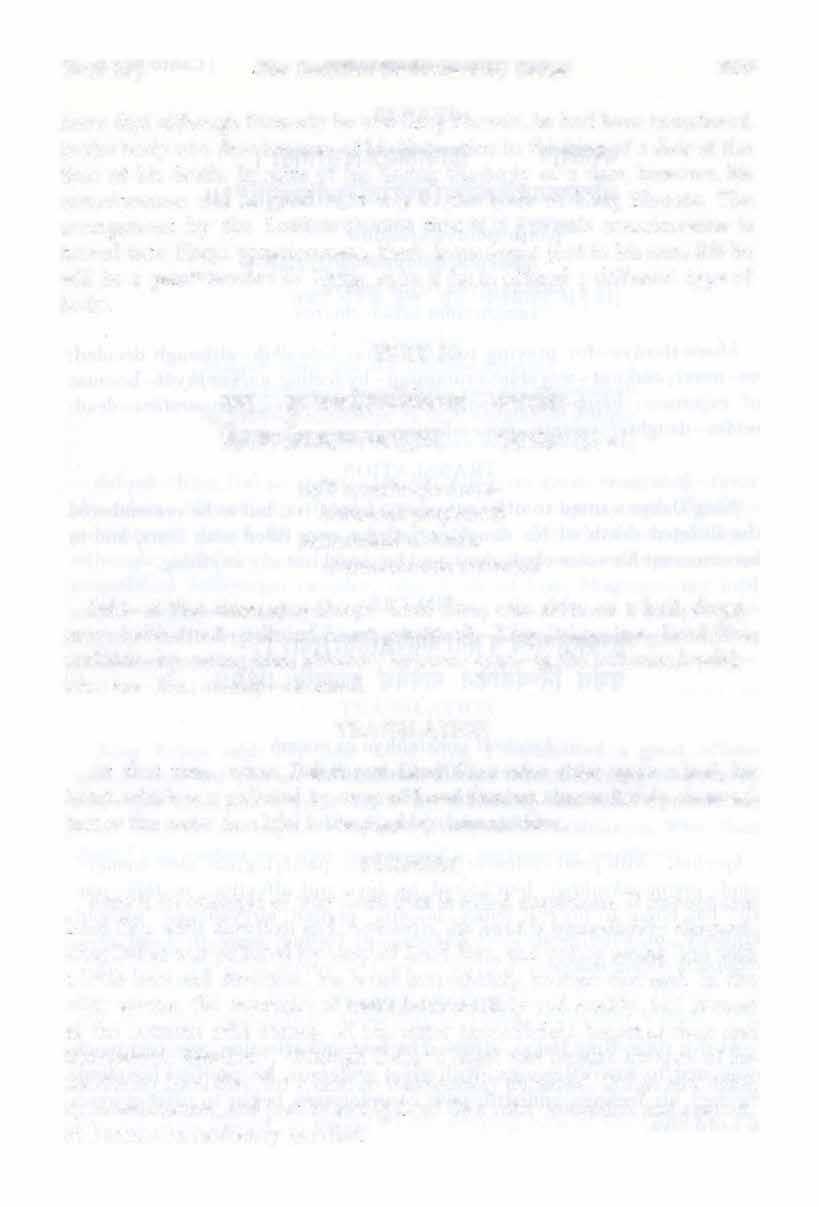
� '('t'CI�Ntitt�re�'*+tl �'NRJ: I
Nqfq�lEfil<(��� {�: II� 0 II
tadii vnadhvaja-dve§akaliliitmii prajiipati� siviivalokad abhavac charad-dhrada iviimala�
tadii-at that time; V[§a-dhvaja- Lord Siva, who rides on a bull; dve§aenvy; kalila-iitmii-polluted heart; prajiipat*- King Dak�a; siva - Lord Siva; avalokiit-by seeing him; abhavat-became; sarat-in the autumn; hrada�lake; iva-like; amala[l.-cleansed .
TRANSLATION
At that time, when Dak�a saw Lord Siva, who rides upon a bull, his heart, which was polluted by envy of Lord Siva, was immediately cleansed, just as the water in a lake is cleansed by autumn rains.
PURPORT
Here is an example of why Lord Siva is called auspicious. If anyone sees Lord Siva with devotion and reverence, his heart is immediately cleansed. King Dak�a was polluted by envy of Lord Siva, and yet by seeing him with a little love and devotion, his heart immediately became cleansed. In the rainy season, the reservoirs of water become dirty and muddy, but as soon as the autumn rain comes, all the water immediately becomes clear and transparent. Similarly, although Dak�a's heart was impure because of his slandering Lord Siva, for which he was severely punished, Dak�a now came to consciousness, and j ust by seeing Lord Siva with veneration and respect, he became immediately purified.
Text 10] ·The Sacrifice Performed by Da� 219
il�ll\1'��ij+q{6iijijf�II��II
bhava-staviiya krta-dhir niisaknod anuriigata� autkaf!thyiid bii§pa-kalayii samparetiirh sutiirh smaran
bhava-staviiya-for praying to Lord Siva; krta-dh Qt-altho u gh decided; na-never; asaknot-was able;anuriigata�-by feeling;autka!lthyiit-because of eagerness; bii§pa-kalayii-with tears in the eyes; samparetiim-dead; sutiim- daughter;smaran- remembering.
TRANSLATION
King D�a wanted to offer prayers toLord Siva, but as he remembered the ill-fated death of his daughter Sati, his eyes filled with tears, and in bereavement his voice choked up, and he could not sayanything.
TEXT 12

1..-.ttffl(tl���:��:�: I
II��II
krcchriit samstabhya ca mana� prema-vihvalita� sudhQl sasarhsa nirvyalikena
bhiivenesarh prajiipat*
krcchriit-with great endeavor;sarhstabhya- pacifying;ca- also;mana�mind; prema-vihvalita�-bewildered by love and affection; su-dhi�-one who has come to his real senses; sasamsa-praised; ni rvyalike n a-wit�out duplicity, or with great love; bhiivena-in feeling; isam-to Lord Siva; prajiipati�- King Dak§a.
TRANSLATION
Atthis time, King D�a, afflicted by love and affection, was verymuch awakened to his real senses. With great endeavor, he pacified his mind, checked his feelings, and with pure consciousness began to offer prayers toLord Siva.
220 Srimad-Bhagavatam
11 Wf((tq(q" 'l)ij'="JA�<:\�(1•16
[Canto 4, Ch. 7
TEXT
: I
� ��� ¥il���j �yqre:
TEXT 13

�JR 31it � �q �0�\��·����5{�:1
f!;;i ��� tij � \[<1"�� II��II
dak�a uviica
bhuyiin anugraha aho bhavatii krto me
dar-{ias tvayii mayi bhrto yad api pralabdha�
na brahma-bandhu§u ca viim bhagavann avajiiii
tubhyam hares ca kuta eva dhrta-vrate�u
dak�a�-l(jng Dak�a; uviica-said; bhuyiin-very great; anugraha�-favor; aho-alas; bhavatii- by you; krta{t-done; me-upon me; dart{ia{tpunishment; tvayii-by you; mayi-unto me; bhrta{t- done; yat apialthough; pralabdhaft-defeated; na-neither; brahma-bandhu§u-unto an unqualified briihmar-a; ca-also; viim-both of you; bhagavan-my lord; avajiiii-negligence; tubhyam-of you; hare[! ca-of Lord Vi�tlUi kutaftwhere; eva-certainly; dhrta-vrate§u- one who is engaged in the performance of sacrifice.
TRANSLATION
King Dak�a said: My dear Lord �iva, I committed a great offense against you, but you are so kind that instead of withdrawing your mercy, you have done me a great favor by punishing me. Both yourself and Lord Vi�tlu do not neglect even useless unqualified brahmatlas. Why, then, shouJd you neglect me, who am engaged in performing sacrifices?
PURPORT
Although Dak�a felt that he was defeated, he knew that his punishment was simply the great mercy of Lord Siva. He remembered that Lord Siva and Lord Vi�tlu are never neglectful of the briihmar-as, even though they are sometimes unqualified. According to Vedic civilization, a person who is a descendant of a briihmar-a family should never be heavily punished. This was exemplified in Arjuna's treatment of Asvatthama. Asvatthama was the son of a great briihmar-a, Drotlacarya, and in spite of his committing the great offense of killing all the sleeping sons of the Pap9avas, for
Text 13] The Sacrifice Performed by Dak�
���
������
221
which he was condemned even by Lord Kr�Qa, Arjuna excused him by not killing him because he happened to be the son of a briihma[la. The word brahma-bandhu�u used here is significant. Brahma-bandhu means a person who is born of a briihma[la father but whose activities are not up to the standaJ:d of the briihma[!as. Such a person is not a briihmafla, but is a brahma-bandhu. Dak�a proved himself to be a brahma-bandhu. He was born of a great briihmarza father, Lord Brahmii, but his treatment of Lord Siva was not exactly brahminical;therefore he admitted that he was not a perfect briihma'(la. Lord Siva and Lord Vi�p.u, however, are affectionate even to an imperfect briihma'(la. Lord Siva punished Dak�a not as one does his enemy, but he punished him just to bring him to his senses, so that he would know that he had done wrong. Dak�a could understand this, and he acknowledged the great mercy of Lord Kr�Qa and Lord Siva towards the fallen briihmaf1as, including even himself. Although he was fallen, his vow was to execute the sacrifice, as is the duty of briihma'(las, and thus he began his prayers to Lord Siva.

TEXT 14

;nnss�ij'Eif+tNQSNli�+t\ill�
ijJ:tfAUIIWf.�
qw;: �Ff�SI•lit1((U:S:
vidyii-tapo-vrata-dhariin mukhata� sma vipriin
brahmiitma-tattvam avitum prathamam tvam asriik tad briihma{liin parama sarva-vipatsu piisi
piila� pasiin iva vibho pragrh1ta-da!l!la�
vidyii-learning; tapa�-austerities; vrata-vows; dhariin-the followers; mukhata�-from the mouth; sma-was; vipriin- the briihma[!as; brahmiiLord Brahma; atma-tattvam-self-realization; avitum-to disseminate; prathamam-first;tvam-you;asrak-created;tat- therefore;brahma[lan-the briihma'(las; parama-0 great one; sarva-all ; vipatsu-in dangers;pasi-you protect; piilafl-like the protector; pasun-the animals; iva-like ; vibho-0 great one;pragrh1ta-taking in hand; dar{iafl-a stick.
TRANSLATION
My dear great and powerful Lord Siva, you were created first from the mouth of Lord Brahma in order to protect the brahmap.as in pursuing education, austerities, vows and self-realization. As protector of the
222 Snmad-Bhagavatarn [Canto 4, Ch. 7
NQRttfttt��:��
I ....
II�
�II
brahmapas, you always protect the regulative principles followed by them, just as a cowherd boy keeps a stick in his hand to give protection to the cows.
PURPORT
The specific function of a human being in society, irrespective of his social status, is to practice control of the mind and senses by observing the regulative principles enjoined in the Vedic siistras. Lord Siva is called pasupati because he protectstheliving entitiesintheir developed consciousness so that they may follow the Vedic system of varcw and iisrama. The word pasu refers to the animal as well as to the.human entity. It is stated here that Lord Siva is always interested in protecting the animals and the animal-like living entities who are not very advanced in the spiritual sense. It is also stated that the. briihmaetas are produced from the mouth df the Supreme Lord. We should always remember that Lord Siva is being addressed as the representative of the Supreme Lord Vi�pu. In the Vedic literature it is described that the briihmaetas are born from the mouth of the universal form of Vi�pu, the k§atriyas are born from His arms, the vaiSyas are born from His abdomen or waist, andthe sildras are born from His legs. In the formation of a body, the head is the principal factor. The briihmaetas are born from the mouth of the Supreme Personality of Godhead in order to accept charity for worship of Vi�pu and to spread Vedic knowledge. Lord Siva is known as pasupati, the protector of the briihmaetas and other living entities. He protects them from the attacks of non-briihmaetas, or uncultured persons who are against the self-realization process.
Another feature of this word is that persons who are simply attached to the ritualistic portion of the Vedas and do not understand the situation of the Supreme Personality of Godhead are not any more advanced than animals. In the beginning of Srimad-Bhii.gavatam it is confirmed that even though one performs the rituals of the Vedas, if he does not develop a sense of Kr�J}.a consciousness, then all his labor in performing Vedic rituals is considered to be simply a waste of time. Lord Siva's aim in destroying the Dak�a yajna was to punish Dak�a because by neglecting him (Lord Siva), Da�a was committing a great offense. Lord Siva's punishment was just like that of a cowherd boy who keeps a stick to frighten his animals. It is commonly said that to give protection to animals, a stick is needed because animals cannot reason and argue. Their reasoning and argument is argumentum ad baculum; unless there is a rod, they do not obey. Force is required for the animalistic class of men, whereas those who are advanced are convinced by reasons, arguments and scriptural authority.
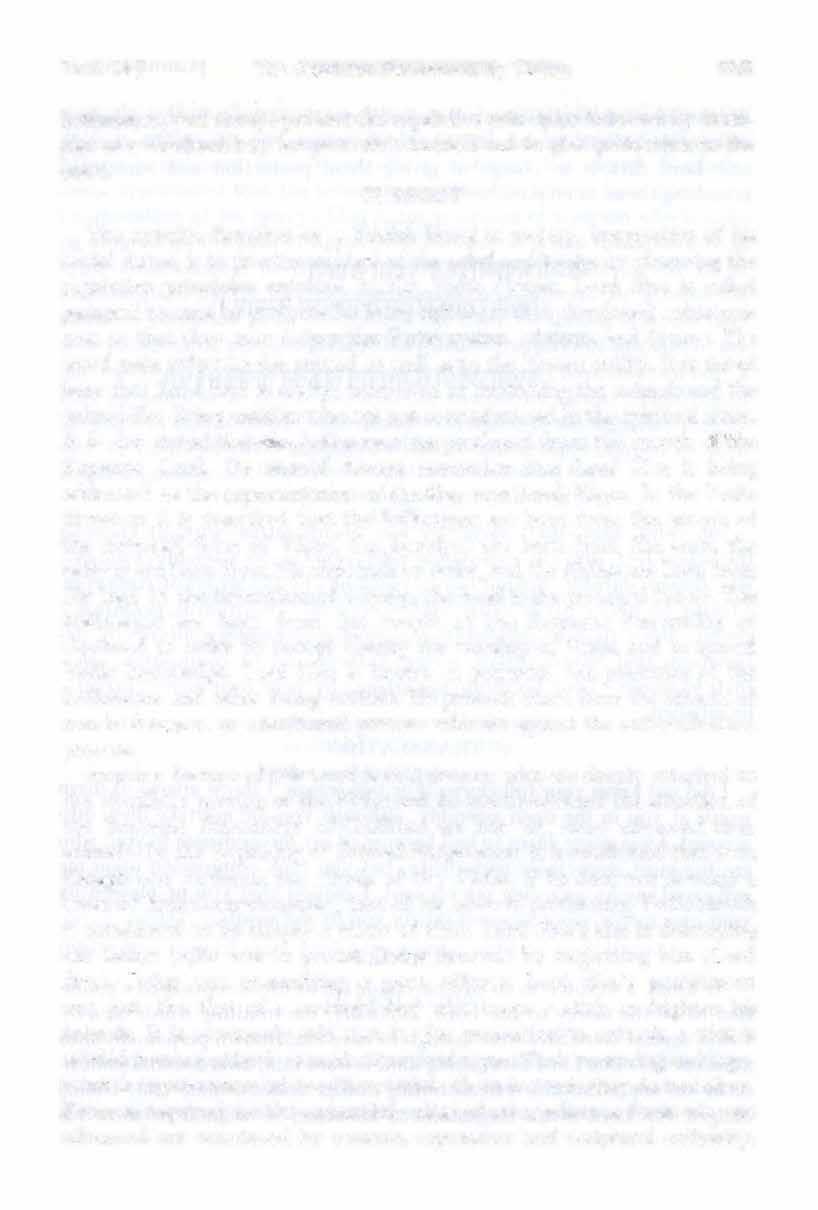
Text 14] The Sacrifice Performed by Dalqa 223
Persons who are simply attached to Vedic rituals, without further advancement of devotional service or Kr�Q.a consciousness, are almost like animals, and Lord Siva is in charge of giving them protection and sometimes punishing them, as he punished Dak�a.
TEXT 15
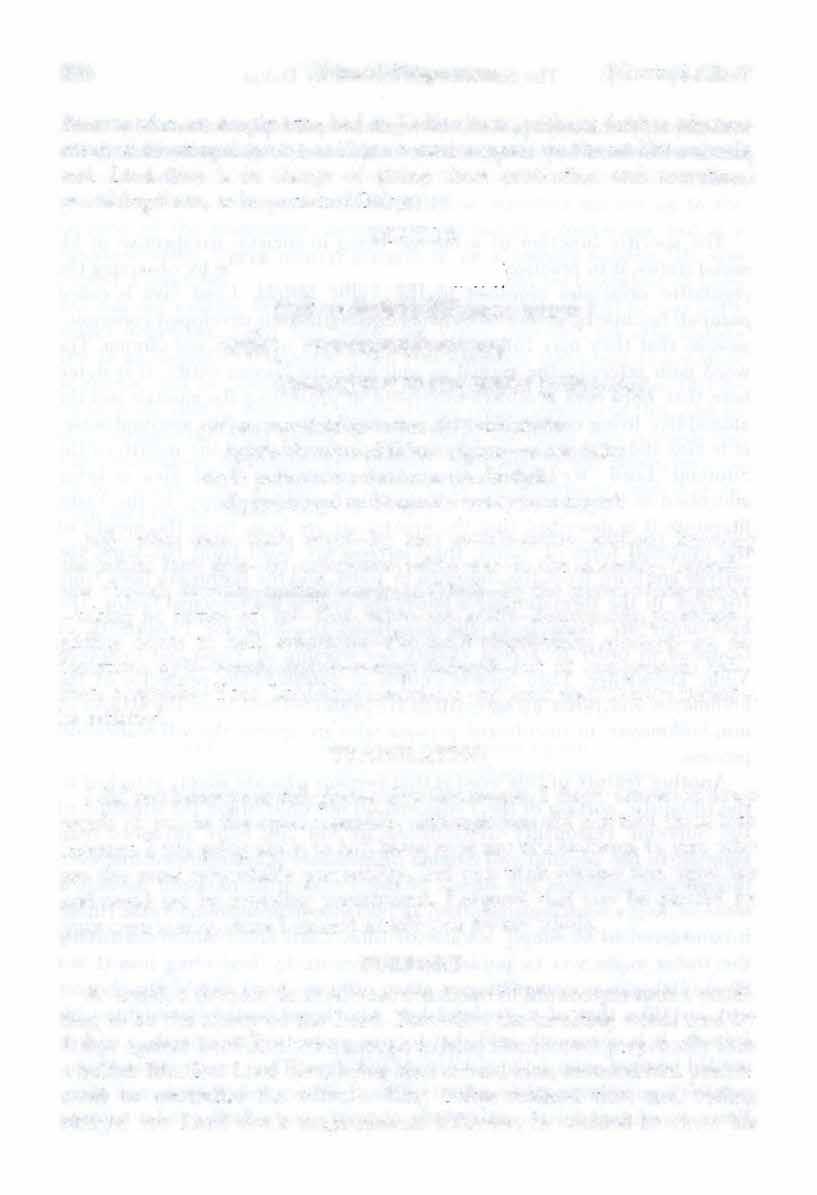
yo'sau mayiividita-tattva-drsii sabhiiyiirh k§ipto durukti-visikhair vigartayya tan miim arviik patantam arhattama-nindayiipiid dr§tyiirdrayii sa bhagaviin sva-krtena tu§yet ya�-who; asau-that; maya-by me; avidita-tattva-without knowing the actual fact; drsii-by experience; sabhiiyiim-in the assembly; k§iptaflwas abused; durukti-unkind words; visikhai�-by the arrowsof; vigartayya -taking no notice of; tat-that; miim-me; arviik-downwards; patantamgliding down to hell; arhattama-the most respectable; nindayii- by defamation; apiit-saved; dr�_tyii-seeing; iirdrayii-out of compassion; sa�that; bhagaviin- Your Lordship; sva-krtena-by your own mercy; tu�yetbe satisfied.

TRANSLATION
I did not knowyour full glories. For this reason, I threw arrows of sharp words at you in the open assembly, although you did not take them into account. I was going down to hell because of my disobedience to you, who are the most respectable personality, but you took compassion upon me and saved me by awarding punishment. I request that you be pleased by your own mercy, since I cannot satisfy you by my words.
PURPORT
As usual, a devotee in an adverse condition of life accepts such a condition to be the mercy of the Lord. Factually, the insulting words used by Dak�a against Lord Siva were enough to have him thrown perpetually into a hellish life. But Lord Siva, being kind toward him, awarded him punishment to neutralize the offense. King Dak�a realized this, and, feeling obliged for Lord Siva's magnanimous behavior, he wanted to show his
224 Srimad-Bhagavatam [Canto 4, Ch. 7
� f?ro�RtiN�R�R•totttt<:�� 1 aw� q'(j'�11�¥tM�tttq� 'w.nssim����llt�ll
gratitude to him. Sometimes a father punishes his child, and when the child is grown up and comes to his senses, he understands that the father's punishment was not actually punishment but mercy. Similarly, Dak�a appreciated that the punishment offered to him by Lord Siva was a manifestation of his mercy. That is the symptom of a pe!:son who is making progress on the path of Kr�Qa consciousness. It is said that a devotee in Kr�Qa consciousness never takes any miserable condition of life to be condemnation by the Supreme Personality of Godhead. He accepts the miserable condition to be the grace of the Lord. He thinks, "I would have been punished or put into a more dangerous condition of life due to my past misdeeds, but the Lord has protected me. Thus I have received only a little punishment as token execution of the law of karma." Thinking of His grace in that way, a devotee aiways surrenders to the Supreme Personality of Godhead more and more seriously and is not disturbed by such so-called punishment.
TEXT 16
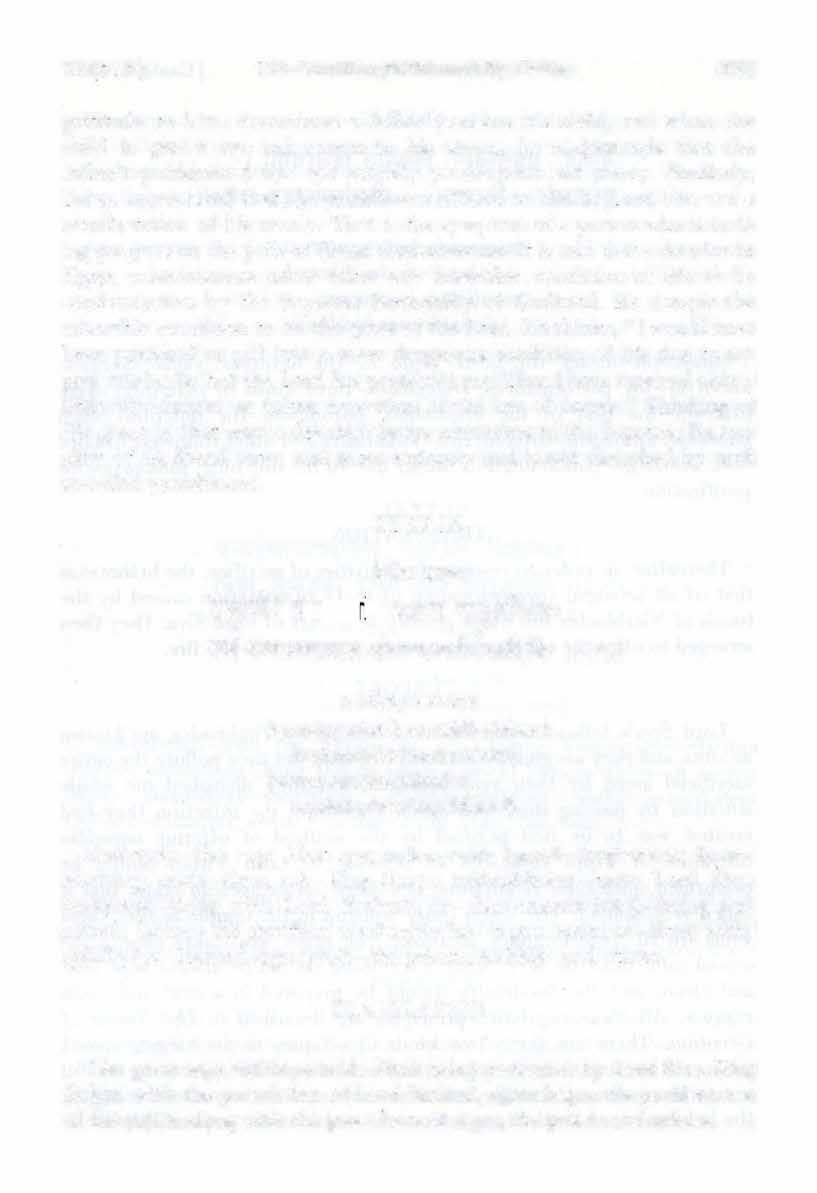
m�� i1111Jf1 �?.«T:I
�ij�l'1�1+tiij�J•nRiir:11�1\11
maitreya uviica
k�amiipyaivam sa miflhviimsam
brahmaf!ii ciinumantrita[l karma santiinayiimiisa
sopadhyiiyartvig-adibhi[l
maitreya[l-the sage Maitreya; uvaca-said; k�ama-forgiveness; iipyareceiving; evam- thus; sa[l-King Dak�a; mitjhvamsam -unto Lord Siva; brahmaf!ii-along with Lord Brahmii; ca-also; anumantrita[l-being permitted; karma�the sacrifice; santanayamasa-began again; sa-along with; upadhyaya-learned sages;rtvik-the priests; iidibhi[l-and others.


TRANSLATION
The great sage Maitreya said: Thus being pardoned by Lord Siva, King Dakt;�a, with the permission of Lord Brahmii, again began the performance of the yajfia, along with the great iearned sages, the priests and others.
Te�t 16] The Sacrifice Performed by Dalqa 225
��
vai§rtavam yajna-santatyai trikapiilam dvijottamii� purogiisam niravapan
vira-samsarga-suddhaye

vaigtavam-meant for Lord Vi�t:tu or His devotees; yajna-sacrifice; santatyai-for performances; trikapiilam-three kinds of offerings; dvijauttamii�-the best of the briihmartas; purogiisam-the oblation called puroqiisa; niravapan-offered;vira-Virabhadra and other followers of Lord Siva; samsarga-contamination (do§a) due to his touching; suddhaye-for purification.
TRANSLATION
Thereafter, in order to resume the activities of sacrifice, the brahmlqlas first of. all arranged for purification of the contamination caused by the touch of Virabhadra and other ghostly followers of Lord Siva. They then arranged to offer the oblations known as puroc,la8a into the fire.
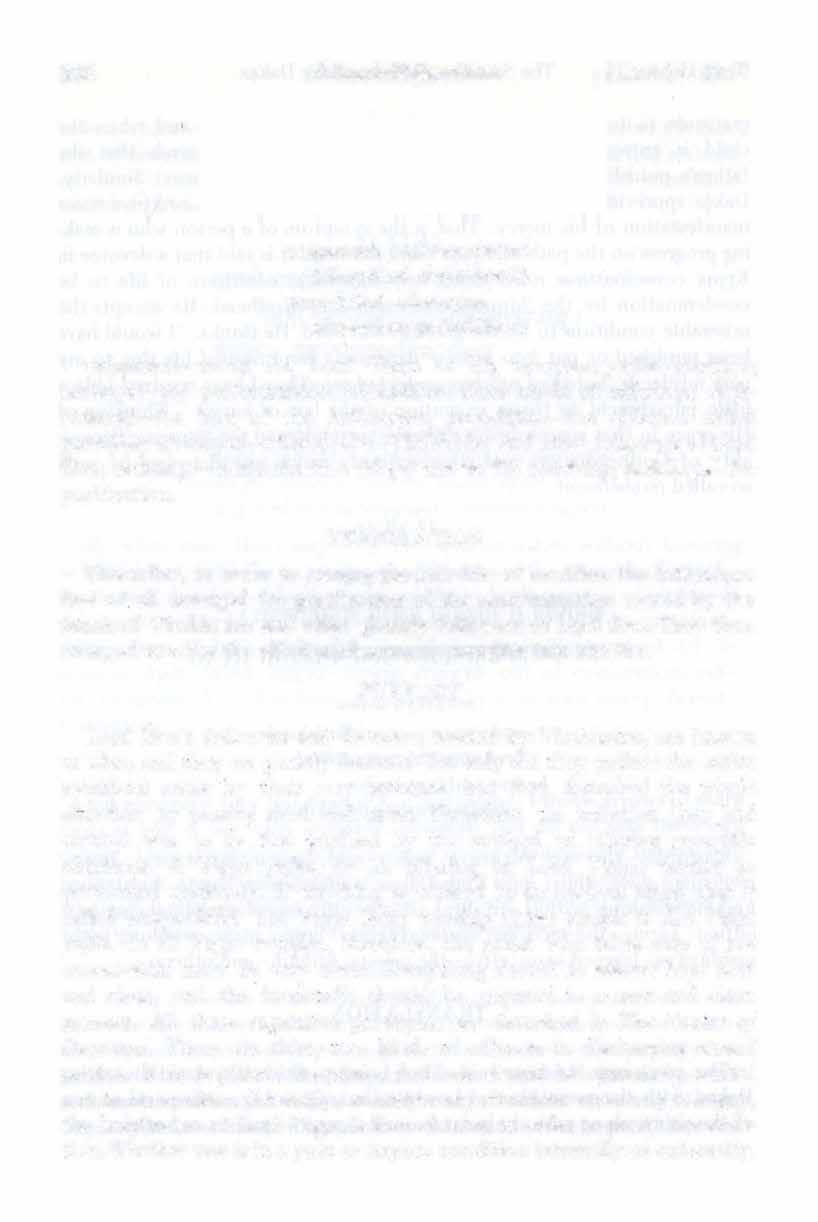
PURPORT
Lord Siva's followers and devotees, headed by Virabhadra, are known as viras, and they are ghostlydemons. Not only did they pollute the entire sacrificial arena by their very presence, but they disturbed the whol� situation by passing stool and urine. Therefore, the infection they had created was to be first ·purified by the method of offering puror)iisa oblations. A Vi�t:tu yajna, or an offering to Lord Vi�Qu, cannot be performed uncleanly. If anything is offered in an unclean state, that is called seviipariidha. The Vi�t:tu Deity worship in the temple is also Vi�t:tu yajna. In all Vi�t:tu temples, therefore, the priest who takes care of the arcanii-vidhi must be very clean. Everything should be always kept neat and clean, and the foodstuffs should be prepared in a neat and clean manner. All these regulative principles are described in The Nectar of Devotion. There are thirty-two kinds of offenses in discharging arcana service. It is required, therefore, that one should be extremely careful not to be unclean. Generally, whenever anyritualistic ceremony is begun, the holy name of Lord Vi�t:tu is first chanted in order to purify the situation.Whether one is in a pure or impure condition internally or externally,
226 Srimad-Bhagavatam
[Canto 4, Ch. 7
if one chants or even remembers the holy name of the Supreme Personality of Godhead Vi�!]U, he immediately becomes purified. The yajiia arena was desecrated by the presence of Lord Siva's followers, headed by Virabhadra, and therefore the entire arena had to be sanCtified. Although Lord Siva was present and he is all-auspicious, it was still necessary to sanctify the place because his followers had broken into the arena and committed so many obnoxious acts. That sanctification was possible only by chanting the holy name of Vi�!]u, Trikapalam, which can sanctify the three worlds. In other words, it is admitted herein that the followers of Lord Siva are generally unclean. They are not even very hygienic; they do not take baths regularly, they wear long hair, and they smoke giinjii. Persons of such irregular habits are counted amongst the ghosts. Since they were present in the sacrificial arena, the atmosphere became polluted, and it had to be sanctified by offering trikapiila oblations which indicated the invocation of Vi�!]u's favor.
TEXT 18 3t�SS���'11
adhvaryur-iitta-hav4ii yajamiino viSiim-pate dhiyii visuddhayii dadhyau tathii priidur abhudd hari�
adhvaryutz,ii-with the Yajur-veda; iitta- t aking; havi�ii-with clarified butter; yajamiina�-King Dak�a; viSiim-pate-0 Vidura; dhiyii-in meditation; viSuddhayii-sanctified; dadhyau- offered; tathii-immediately; pradu�-manifest; abhU t-became; hari�t-Hari, the Lord.

TRANSLATION
The great sage Maitreya said to Vidura: My dear Vidura, as soon as King Dak�a offered the clarified butter with Yajur-veda mantras in sanctified meditation, Lord Vi�!JU appeared there in His original form as Naraya!Ja.
PURPORT
Lord Vi�pu is all-pervading. Any devotee who, in sanctified meditation, following the regulative principles, chants the requirtd mantras in service and in a devotional mood can see Vi�t;�u. [t is said in the Brahma-sarhhita that a devotee whose eyes are anointed with the ointment of love of Godhead can see the Supreme Personality of Godhead always within his heart. Lord Syamasundara is so kind to His devotee.
Text 18] The Sacrifice Performed by Dalqa 227
��
Fltiii+qij I Nln �\f.Ftl �if��: 11��11
tadii sva-prabhayii te§iirh dyotayantyii diso dasa mu§parhs teja upiinitas · tiirk�yera stotra-viijinii
tadii-at that time; sva-prabhayii-by His own effulgence; te§iim-all of them; dyotayantyii-by brightness; diSa�-directions; dasa-ten; mu§r-andiminishing; teja�-effulgence; upanrta�-brought; tiirk§yeTJa-by Garu�a; stotra-viijinii-whose wings are called Brhat and Rathantara.

TRANSLATION
Lord Naraya�a was seated on the shoulder of Stotra, or Garu�a, who had big wings. As soon as He appeared, all directions were illuminated, diminishing the luster of Brahma and the others present.
PURPORT
A description of Naraya�a is given in the following two slokas.



TEXT 20
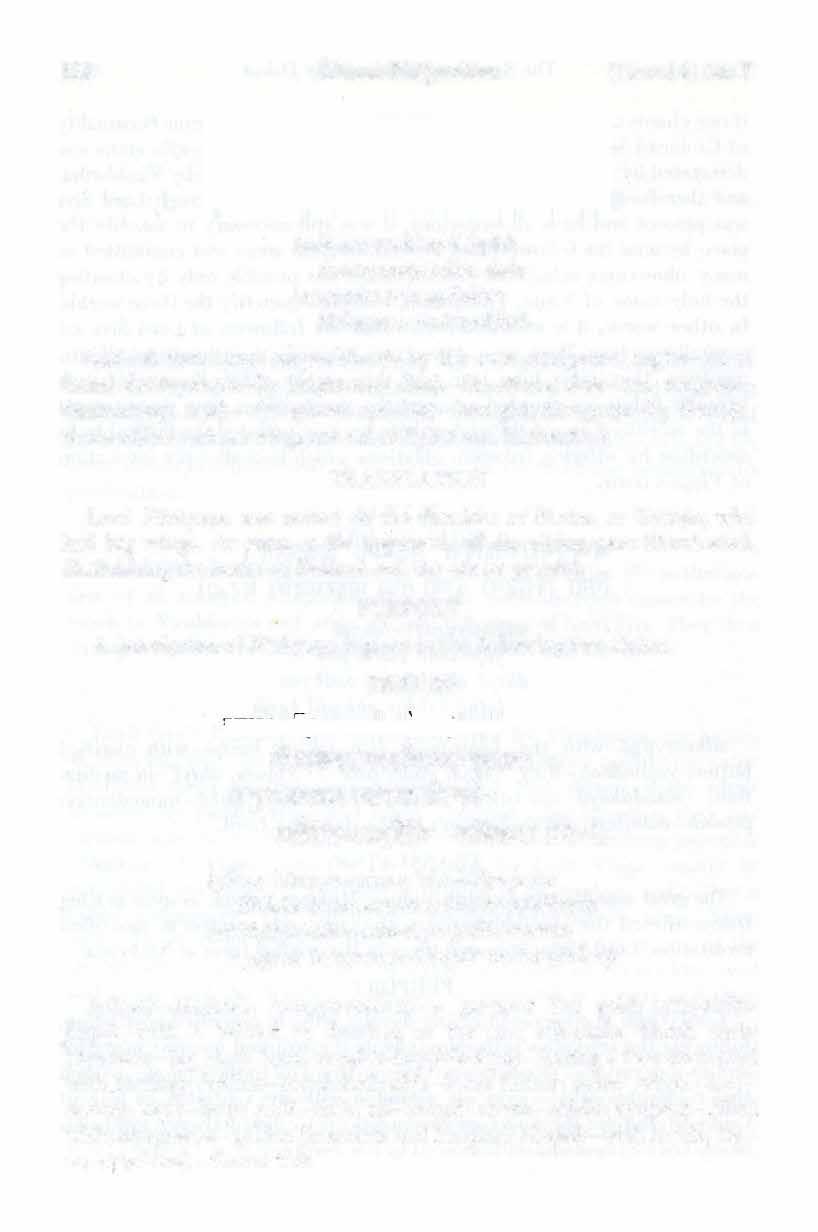
"' "' "' �'IT
�Iflt:\ii'it4i�H*41441�1
syamo hirar-ya-rasano 'rka-kirita-ju�to nlliilaka-bhramara-ma!l!iita-ku!l!ialasya�
sankhiibja-cakra-sara-capa-gadasi-carmavyagrair hira11maya-bhujair iva karr-ikara�
syama�-blackish; hiraf)ya-rasana�-a garment like gold; arka-kiritaju§ta�-with a helmet as dazzling as the sun; nua-alaka-bluish curls; bhramara-big black bees; maf)!iita-kur4ala-asya�-having a face decorated with earrings; sankha-conchshell; abja-lotus flower; cakra-wheel; saraarrows; capa-bow; gada-club; asi-sword; carma-shield; vyagra*-.filled with; hira!lmaya-goiden (bracelets and bangles); bhuja*-with hands; ivaas; kar!likara�--fiower tree.
228 Srimad-Bhagavatam
[Canto 4, Ch. 7
;ft�����:
�f':r.t����:ll�oll
His complexion was blackish, Hisgarment wasofayellow color,like gold, Hishelmetwasasdazzlingas the sun, Hishairwasbluish,thecolor of black bees, and Hisface was decorated with earrings. His eight hands heldaconchshell,wheel,club,lotusflower,arrow,bow,shieldandsword, and they were decorated with golden ornaments such as bangles and bracelets. His whole body resembled a blossoming tree beautifully decoratedwithvariouskindsofflowers.
PURPORT
The face of Lord Vi��;J.U as described in this verse appears like a lotus flower with bees humming over it. All of the ornaments on the body of Lord Vi��;J.U are of molten gold of the reddish-gold color of the morning sunrise. The Lord appears, just as the morning sun rises, to protect the whole universal creation. His arms display differenl weapons, and His eight hands are compared to the eight petals of a lotus flower. All the weapons mentioned are for the protection of His devotees.
Generally in the four hands of Vi��;J.U there are a wheel, a club, conchshell and lotus flower. These four symbols are seen in the four hands of Vi��;J.U in different arrangements. The club and the wheel are the Lord's symbols of punishment for the demons and miscreants, and the lotus flower and conchshell are used to benedict the devotees. There are always two classes of men, the devotees and the demons. It is confirmed in Bhagavad-gitii (Bg. 4.8) that (paritriiriiya siidhunam) the Lordis always ready for the protection of the devotees and annihilation of the demons. There are demons and devotees in this material world, but in the spiritual world there is no such distinction. In other words, Lord Vi��;J.U is the proprietor of both the material and spiritual worlds. In the material world almost everyone is of the demoniac nature, but there are also devotees, who appear to be in the material world although they are always situated in the spiritual world. A devotee's position is always transcendental, and he is always protected by Lord Vi��;J.u.
TEXT 21
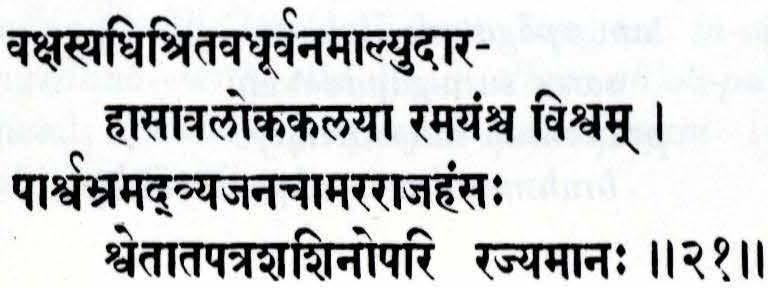
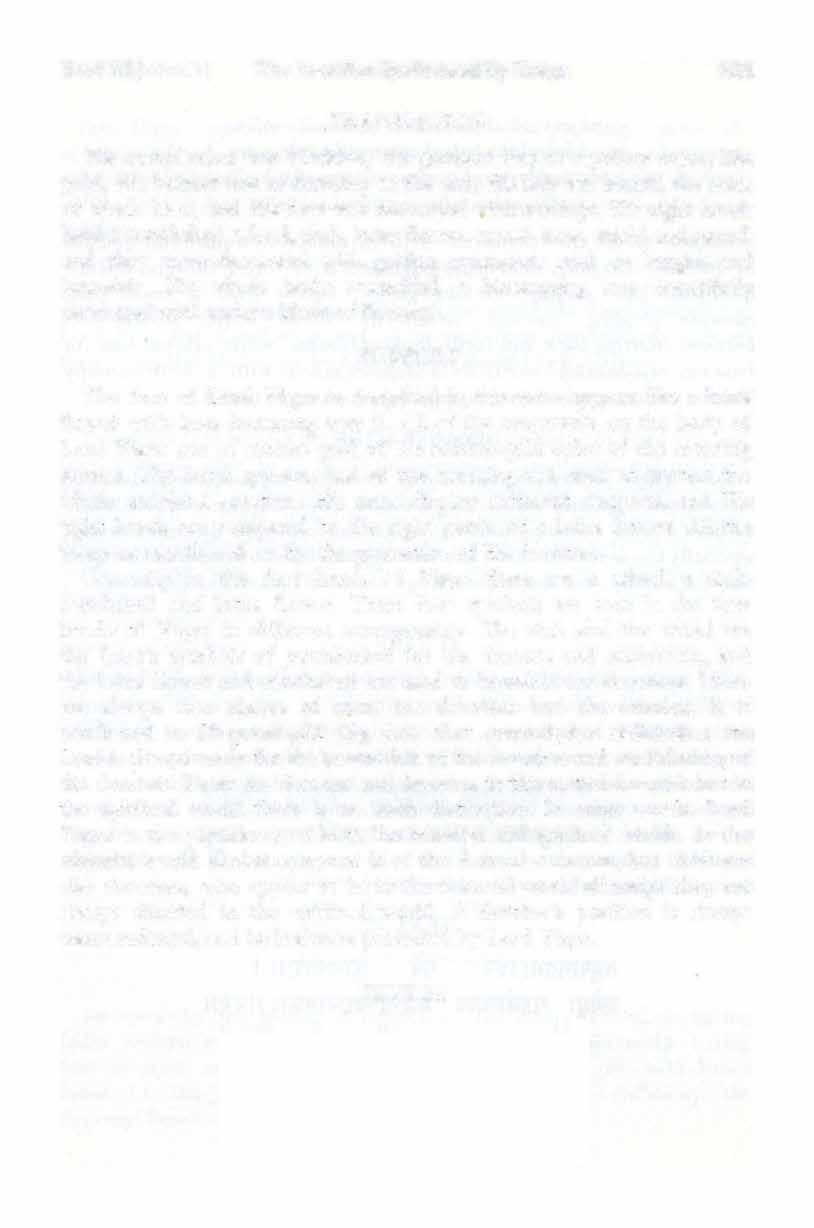
Text 21] TheSacrificePerformedbyDa�a 229
TRANSLATION
vak�asy adhiSrita-vadhur
vana-maly ud'iirahasavaloka-kalaya ramayarhs ca visvam
piirsva-bhramad-vyajana-camara-riija-harhsa�
. svetiitapatra-sasinopari rajyamana�
vak�asi-on the chest; adhisri ta-situated; vadhu�-a woman(the goddess of fortune, Lak�mi); vana-mali- garlanded with forest flowers; udarabeautiful; hasa - smiling ; avaloka - glance; kalaya-with a small part; ramayan-pleasing; ca-and; visvam-the whole world; parsva-side; bhramat-moving back and forth; vyajana-camara-white yak-tail hair for fanning; raja-harhsa�-swan; sveta-Gtapatra-iasina-with a white canopy likethe moon; upari-above; rajyamana� -looking beautiful.
TRANSLATION
Lord Vi��u looked extraordinarily beautiful because the goddess of fortune and a garland were situated on.his chest. His face was beautifully decorated with a smiling attitude which can captivate the entire world, especiallythedevotees. Whitehair fans appeared on both sides of the Lord likewhiteswans,and thewhitecanopy overhead looked likethe moon.
PURPORT
The smiling face of Lord Vi�pu is pleasing to the wholeworld. Not only devotees hut even nondevotees are attracted by such a smile. This verse nicely describes how the sun, moon, eight-petaled lotus flower and hummingblack beeswere represented by the fans of hair, the overhead canopy, the moving earrings on both sides of His face, and His blackish hair. All together, accompanied by the conchshell, wheel, club, lotus flower, bow, arrows, shield and sword in His hands, these presented a grand and beautiful audience for Lord Vi�I]U which captivated all the demigods there, including Dak�a and Lord Brahma.
TEXT 22

tam up'iigatam iilakna sarve sura-gariidaya� praremu� sahasotthiiya brahmendra-tryak�a-nayakii�
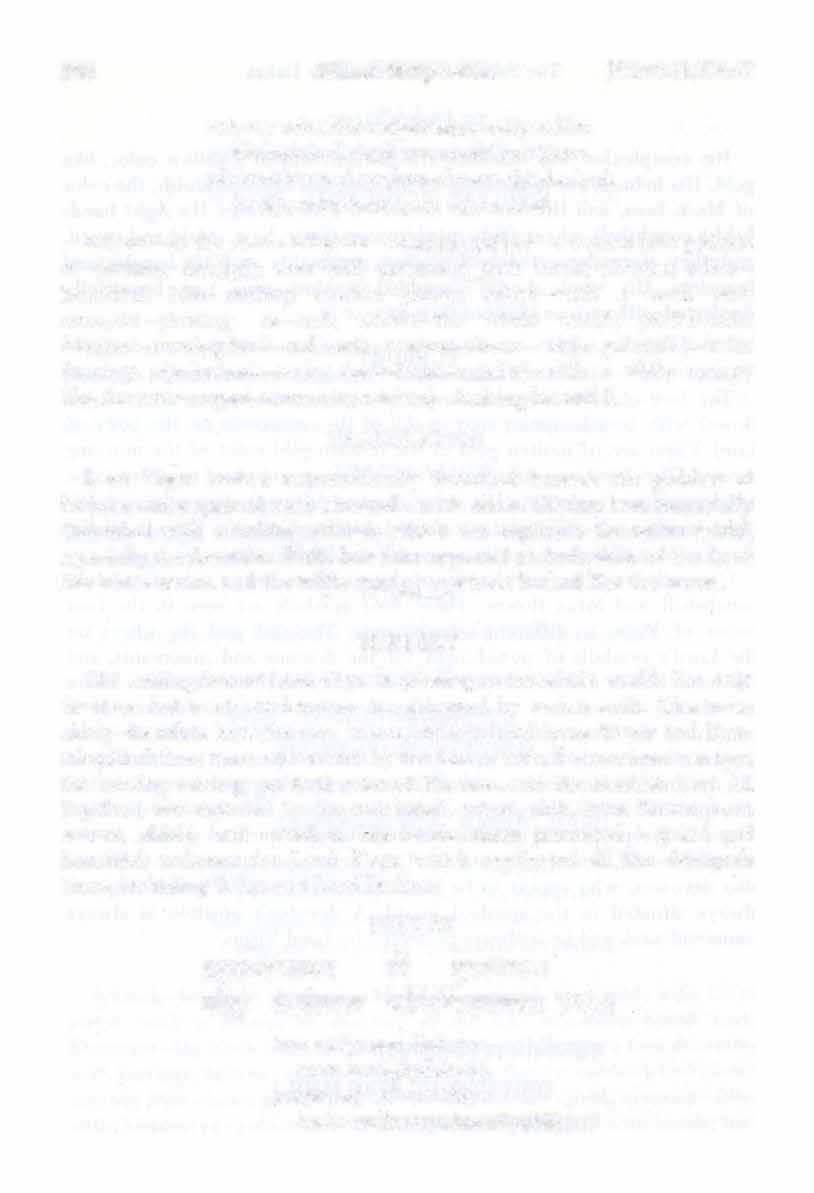
230 Srimad-Bhigavatam [Canto 4, Ch. 7
�ttRfq� � ij(4j0jji(tj: �: � q�: ������
tam-Him; upagatam-arrived; alak.sya-after seeing; sarve-all; sura-ga!la-adayall-the demigods and others; pra(lemull-obeisances; sahasii-immediately; utthiiya-after standing up; brahma-Lord Brahma; indra-Lord Indra; tryak�a-Lord Siva (who has three eyes); niiyakiillled by.
TRANSLATION
As soon as Lord Vi��u was visible, all the demigods-Lord Brahma and Lord Siva, the Gandharvas and all present there-immediately offered their respectful obeisances by falling down straight before Him.
PURPORT
It appears that Lord Vi��u is the Supreme Lord evenof LordSivaand Lord Brahma, what to speak of the demigods, Gandharvas and ordinary living entities. It is stated in a prayer, yam brahma varu�Jendra-rudramarutall: All of them, including the yogis, worship LordVi�I).U. Dhyanavasthitii tad-gatena manasii pasyanti yam yogino: Yogis concentrate their minds on the form of Lord Vi��u, and thus He is worshipable by all demigods, all Gandharvas and even by Lord Siva and Lord Brahma. Tad vi�!loll paramam padam sadii pasyanti siirayall: Vi��u is therefore the Supreme Personality of Godhead. Even though Lord Siva was previously referred to in prayers by Lord Brahma as the Supreme,when Lord Vi�pu appeared, Siva also fell pro11trated before Him to offer his respectful obeisances.
TEXT 23

�� m=i!l: ij"�'n �: 1
� 'l6i&�M�tl ��11��11
tat-tejasii hata-ruca�
sanna-jihvii� sa-siidhvasiill
murdhna dhrtiiiijali-putii
upatasthur adhok�ajam
tat-tejasii-by. the glaring effulgence of His body; hata-rucall-having faded lusters; sanna-jihvii�-having silent tongues; sa-siidhvasii�-having fear of Him; murdhnii-with the head; dhrta-anjali-putii�-with hands touched to the head; upatasthu�- prayed; adhok�ajam-to Adhok�aja, the Supreme Personalityof Godhead.
Text 23 J The Sacrifice Performed by Da�a 231
TRANSLATION
In the presence of the glaring effulgence of the bodily luster of Narayapa, everyone else's luster faded away, and everyone stopped speaking. Fearful with awe and veneration, they touched their hands to their heads and prepared to offer their prayers to the Supreme Personality of Godhead, Adhok�aja.
TEXT 24
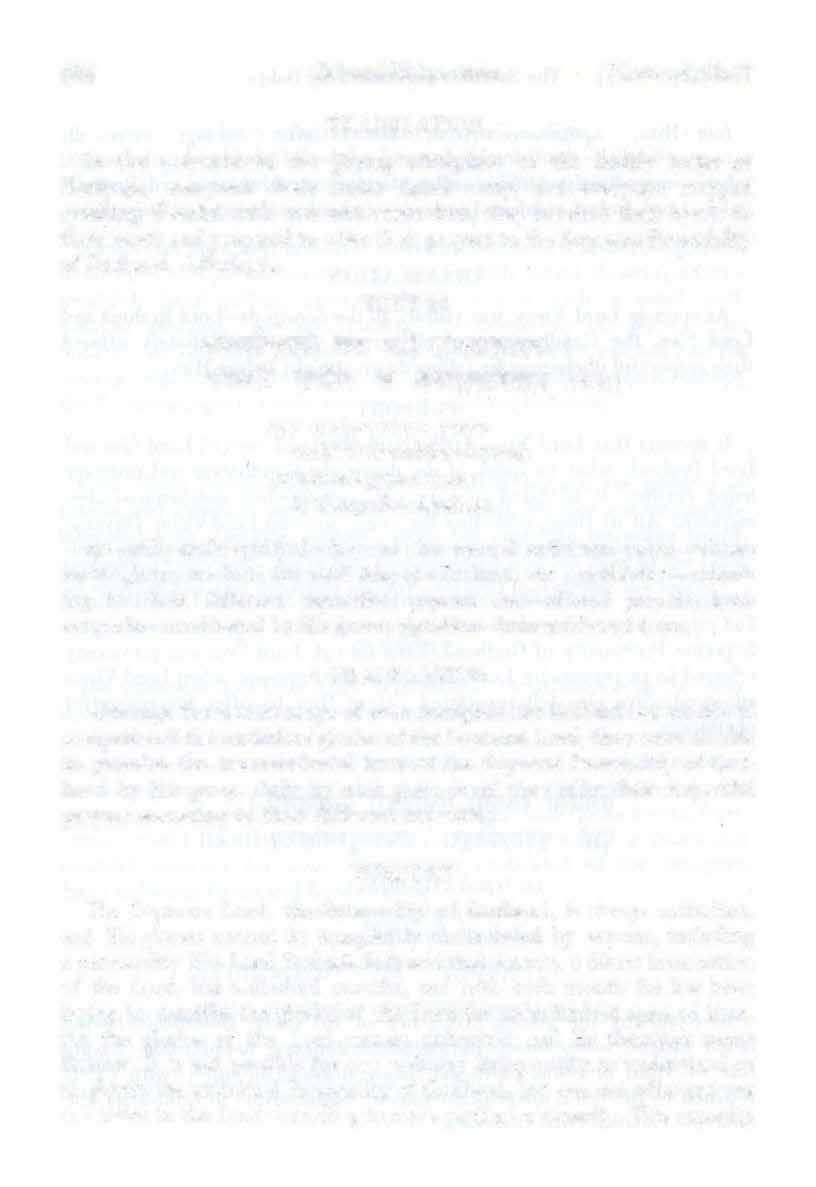
apy arviig-vrttayo yasya mahitv atmabhuv-adayafl. yath'iimatigrrantisma krtanugraha-vigraham
ll�'dll
api- still; arviik-vrttayafl.- beyond the mental activities; yasya- whose; mahi-glory; tu- but; iitmabhu-iidayafl.- Brahma, etc.; yathiima t i-accord· ing to their different capacities; grran.ti sma- offered prayers; krtaanugraha-manifested by His grace; vigraham- transcendental form.
TRANSLATION
Although the mental scope of even demigods like Brahma was unable to comprehend the unlimited glories of the Supreme Lord, they were all able to perceive the transcendental form of the Supreme Personality of Godhead by His grace. Only by such grace could they offer their respectful prayers according to their different capacities.
PURPORT
The Supreme Lord, the Personality of Godhead, is always unlimited, and His glories cannot be completely enumerated by anyone, including a personality like Lord Brahma. It is said that Ananta, a direct incarnation of the Lord, has unlimited mouths, and with each mouth He has been trying to describe the glories of the Lord for an unlimited span of time, yet the glories of the Lord remain unlimited, and He therefore never finishes. It is not possible for any ordinary living entity to understand or to glorify the unlimited Personality of Godhead, but one can offer prayers or service to the Lord according to one's particular capacity. This capacity
232 Srimad-Bhagavatam [Canto 4, Ch. 7
������:1 �� quri'� � ti�l�!f���
is increased by the service spirit. Sevonmukhe hi jihvadau means that the service of the Lord begins with the tongue. This refers to chanting. By chanting Hare Kr�rta, one begins the service of the Lord. Another function of the tongue is to taste and accept the Lord's prasadam. We have to begin our service to the Unlimited with the tongue and become perfect in chanting and accepting the Lord's prasadam. To accept the Lord's prasadam means to control the entire set of senses. The tongue is considered to be themostuncontrollablesense because it hankers for so many unwholesome eatables, thereby forcing the living entity into the dungeon of material conditional life. As the living entity transmigrates from one form of life to another, he has to eat so many abominable foodstuffs that finally there is no limit. The tongue should be engaged in chanting and in eating the Lord's prasadam so that the other senses will be controlled. Chanting is the medicine, and prasadam is the diet. With these processes one can begin his service, and as the service increases, the Lord reveals more and more to the devotee. But there is no limit to His glories, and there is no limit to engaging oneself in the service of the Lord.
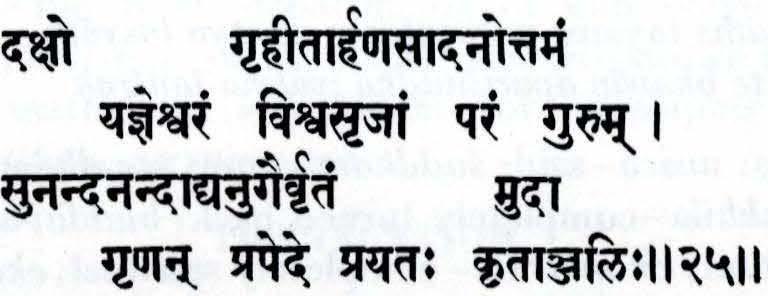
TEXT 25
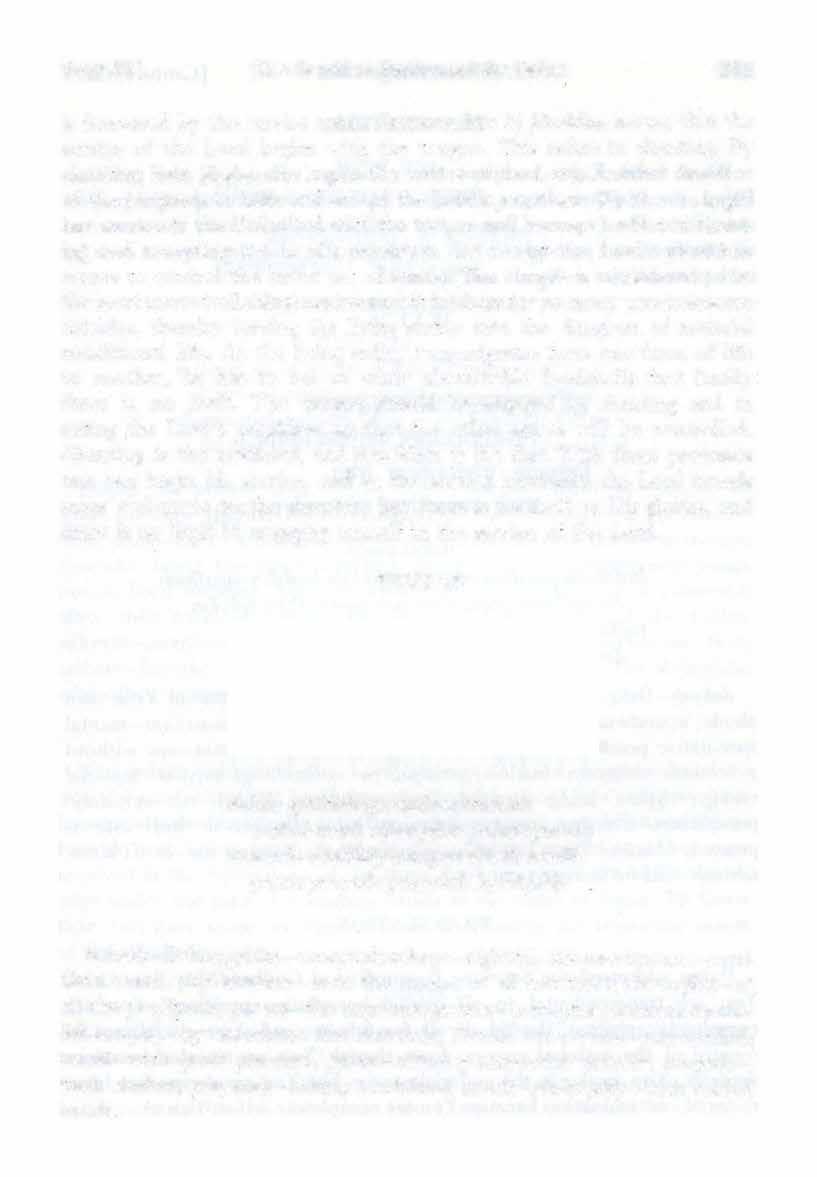
dak�o grhitiirhara-siidanottamarh yajiiesvararh visvasr[arh pararh gurum
sunanda-nandiidy-anugair vrtarh mudii grran prapede prayata� krtiinjal*
dak§a/],- Dak�a;grhfta-accepted; arha{la-rightful;sadana-uttamam-sacrificial vessel; yajnesvaram - unto the master of all sacrifices; visvasrjiim-of all the prajiipatis; param-the supreme; gurum-preceptor; s unanda-nandaiidi-anuga*-by associates like Sunanda, Nanda, etc.; vrtam-surrounded; mudii- with great pleasure; grran-offering respectful prayers; prapedetook shelter; praya ta� - having a subdued mind; krta-anjali� -with folded hands.
Text 25] The Sacrifice Performed by Dak�� 233
When Lord Vi¥otu accepted the oblations offered in the sacrifice, Dalqa, the Prajapati, began with great pleasure to offer respectful prayers unto Him. The Supreme Personality of Godhead is actually the master of all sacrifices and preceptor of all the prajapatis, and He is served even by such personalities as Nanda and Sunanda.
TEXT 26
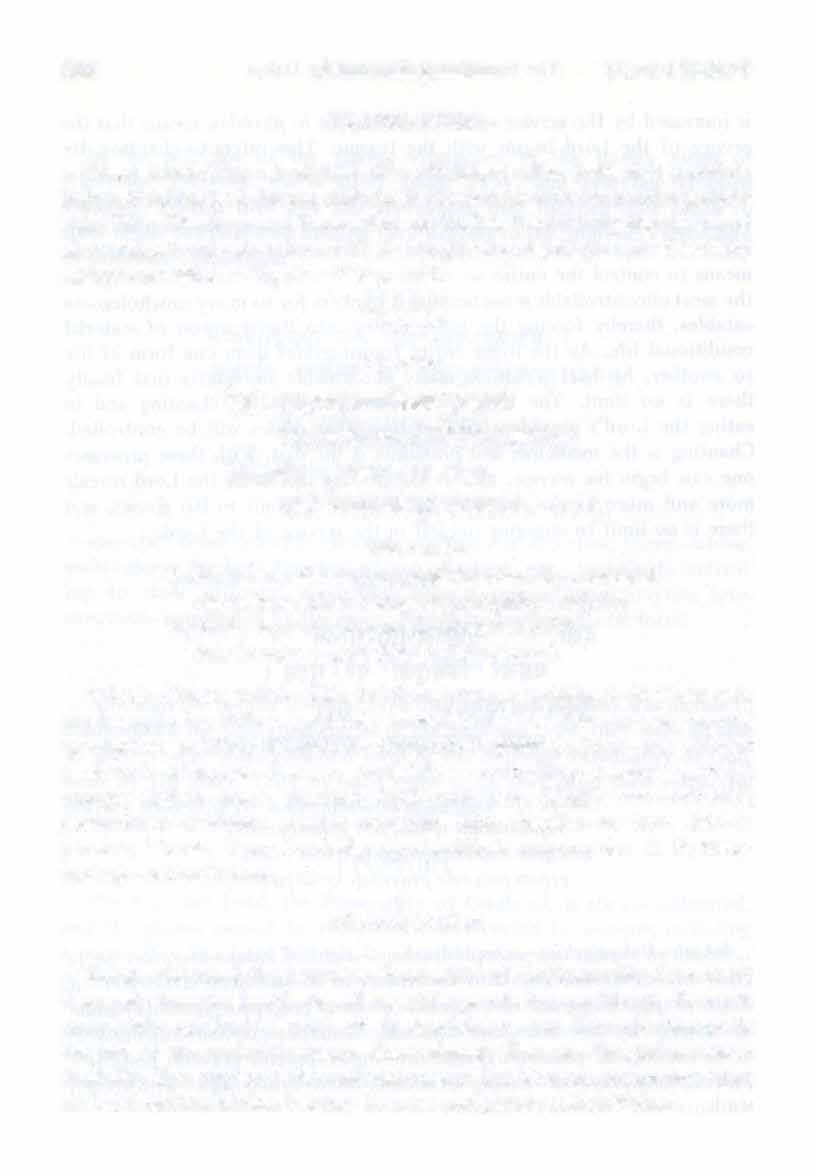
dak§a uviica
suddham sva-dhiimny uparatiikhila-buddhy-avastham cin-miitram ekam abhayarh prati§idhya miiyiim ti§tharhs tayaiva puru�atvam upetya tasyiim
· iiste bhaviin apari.Suddha iviitma-tantra�
dak§atJ - Dak9a; uviica-said; suddham-pure; sva-dhiimni-in Your own abode; uparata-akhila-completely turned back; buddhi-avastham-mental speculative p osition; cit-miitram-completely spiritual; ekam-one without a second; abhayam-fearless; prati§idhya-controUing; miiyiim-material energy; ti§than-being situated; tayii-with her (Maya); eva-certainly; purujatvam-overseer; upetya-entering into; tasyiim-in her; aste-is present; bhaviin-Your Lordship; apariSuddhal;l-impure; iva-as if; iitmatantra�-self-sufficient.
TRANSLATION
Dalqa addressed the Supreme Personality of Godhead: My dear Lord, You are transcendental to all mental speculative positions. You are completely spiritual, devoid of all fearfulness, and You are always in control of the material energy. Even though You are situated transcendentally, You appear in the material energy, but You are always free from material contamination because You are completely self-sufficient.
234 Srimad-Bhigavatam [Canto 4, Ch. 7
TRANSLATION
��� �(i4�1�q«tlf<CIC?Si� Mrill'31�f.fi+t¥PfSIRt�'fJ.I� I fij�qq��,q����i41wtqRij{(iill€¥46�:������
� �i:t�'4it�it�AA11q1a. �i:t'ICfWt +t•l�:tf;q<::l¥4: I lJfiiNe�ulllt<i m-:���\9, rtvija ucuft
tattvarh na te vayam anaiijana rudra-siipiit
karmary-avagraha-dhiyo bhagavan vidiimaft
dharmopalak�aram idarh trivrd adhvariikhyarh
jiiiitarh yad-artham adhidaivam ado vyavasthii�
rtvija{! - the priests; ucu{t-began to say; tattvam-truth; na-not; te-of Your Lordship; vayam-all of us; anarijana-without rnaterial contamination; rudra-Lord Siva; siipiit-by his curse; karma[li-in fruitive activities; avagraha-being too much attached; dhiyaft-of such intel ligence; bhagavan-0 Lord; vidiimal;t-know; dharma-religion;upalak§aram- symbolized ; idarn-this; trivrt-the three departments of knowledge of the Vedas; adhvara-sacrifice; iikhyam-of the name; jniitam- known to us; yat-that; artharn-for the matter of; adhidaivarn-for worshiping the demigods; ada�-this; vyavasthii/;t-arrangement.

TRANSLATION

The priests addressed the Lord, saying: 0 Lord, transcendental to material contamination, by the curse offered by Lord Siva's men we have become attachedto fruitiveactivities,and thuswe are nowfallenand therefore do not know anything about You. On the contrary, we are now involved in the injunctions of the three departments of the Vedic knowledge under the plea of executing rituals in the name of yajiia. We know that You have made arrangements for distributing the respective shares of the demigods.
PURPORT
The Vedas are known as traigur-ya-vi§ayii vediift (Bg. 2.45). Those who. are serious students of the Vedas are very much attached to the ritualistic ceremonies mentioned in the Vedas, and therefore these Vedavadis cannot understand th at the ul timate goal of the Vedas is to understand Lord Kg;Qa


Text 27] The Sacrifice Performed by D�a
���
TEXT 27
�
235
or Vi�r:tu. Those who have transcended the qualitative Vedic attractions, however, can understand Kr�r:ta, who is never contaminated by the material qualities. Therefore Lord Vi�r:tu is addressed here as ananjana (free from material contamination). In Bhagavad-g"itii the crude Vedic scholars have been deprecated by Kr�r:ta as follows:

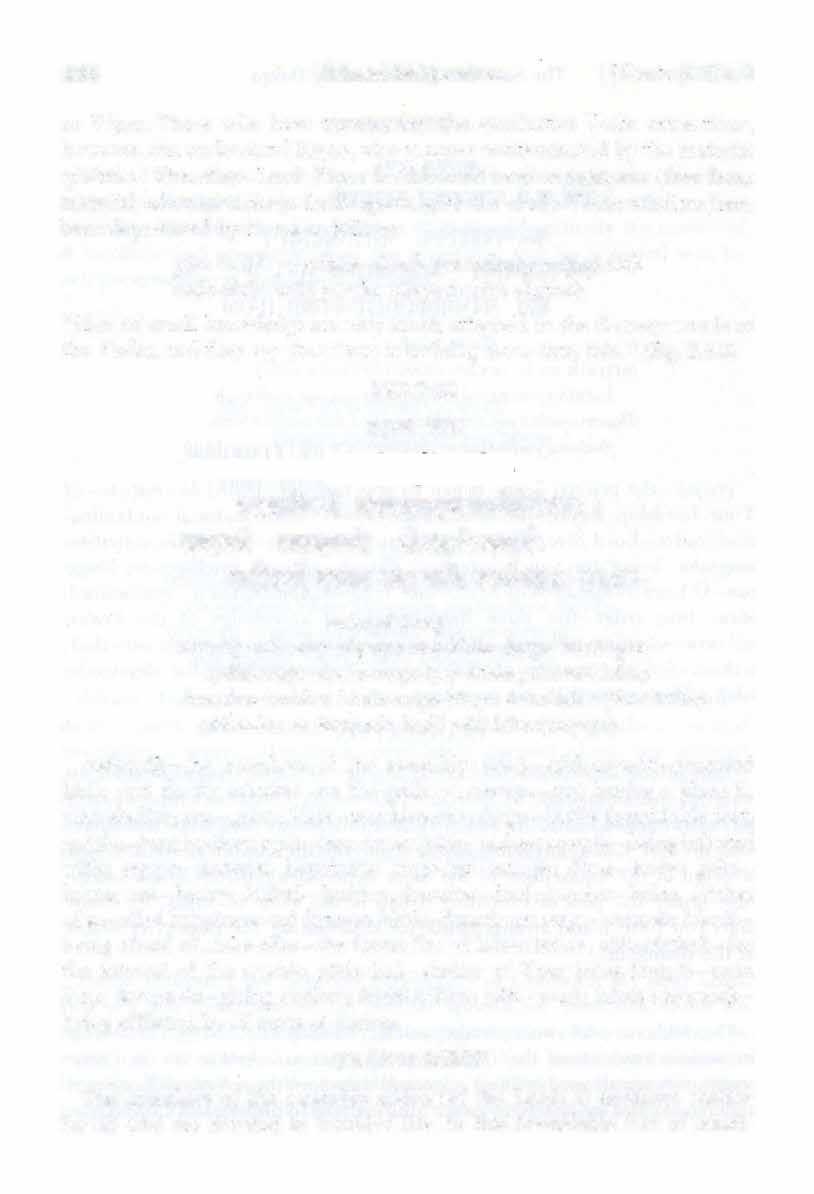
yam imam pu�pitarh vacarh pravadanty avipascitaft veda-viida-ratiift piirtha nanyad astt:ti viidina�
"Men of small knowledge are very much attached to the flowery words of the Vedas, and they say that there is nothing more than this." (Bg. 2.42)
TEXT 28
ff��:
sadasya ilcu�
utpatty-adhvany asarara uru-klesa-durge 'ntakogra
vyiilanvi§te vi§aya-rnrga-tr§Y iitma-gehoru-bhara� dvandva-svabhre khala-mrga-bhaye soka-diive 'jna-sartha�
piidaukas te sararada kada yiiti karnopasnta�
sadasya�-the members of the assembly; ilcu� -said; utpatti-repeated birth and death; adhvani-on the path of; asara[Le-not having a place to take shelter; uru-great; kle5a-troublesome; durge-in the formidable fort; antaka- termination; ugra-ferocious; vyiila-snakes; anvi§te-being infested with; vi§aya-material happiness; rnrga-tr�i-mirage; iitrna-body; gehahome; uru-heavy; bhara�-burden; dvandva-dual; svabhre-holes, ditches of so-called happinessanddistress;khala-ferocious; mrga-animals; bhayebeing afraid of; soka-dave- the forest fire of lamentation; ajna-sartha�-for the interest of the rascals; piidauka�-shelter of Your lotus feet; te-unto You; sara!la-da-giving shelter; kada-when; yati- went ; kama-upasf§ta�being afflicted by aU sorts of desires.
TRANSLATION
The members of the assembly addressed the Lord: 0 exclusive shelter for all who are situated in troubled life, in this formidable fort of condi-
236 Srimad-Bhagavatam [Canto 4, Ch. 7
'3($it8sftS�EitJ4oqi{U$If.:4� �14�1(('4i€¥4i\{l(S¥fR: I Ari (ite'tfl¥1� �nllMJ�sm�: ql(t·������!: ����II
tional existence the time element, like a snake, is always looking for an opportunity to strike. This world is full of ditches of so-called distress and happiness, and there are many ferocious animals always ready to attack. The fire of lamentation is always blazing, and the mirage of false happiness is always alluring, but one has no shelter from them. Thus foolish persons live in the cycle of birth and death, always overburdened in discharging their so-called duties, and we do not know when they will accept the shelter of Your lotus feet.
PURPORT
Persons who are not in Kr�va consciousness are living a very precarious life, as described in this verse, but all these circumstantial conditions are due to forgetfulness of Kr�va. The Kr�va consciousness movement is meant to give relief to all. these bewildered and distressed persons; therefore it is the greatest relief work for all human society, and the workers thereof are the greatest well-wishers, for they follow in the footsteps of Lord Caitanya, who is the greatest friend to all living entities.

TEXT 29

<N � !!4(1eWI!!4tM1t1Rct<?stif mafitfit(e:ffiu«ut�
� ff:qaflt���sqffi[
iijqftr ";� ttUJitd+Jt�q(ltJstCUI II��II
rudra uviica
tava varada variinghriiv iisi�ehiikhilarthe hy api munibhir asaktair adarerriirhariiye yadi racita-dhiyarh miividya-loko 'paviddham
japati na garraye tat tvat-pariinugrahera
rudra� uviica- Lord Siva said; tava- Your; varada-0 supreme benefactor; vara-anghrau-precious lotus feet; iisi§ii-by desire; iha-in the material world; akhila-arthe-for fulfillment; hi api-certainly; munibh *-by the sages; asaktai�-liberated; iidare!la-with care; arhaf)iye-w orshipa ble; yadiif; racita-dhiyam-mind fixed; mii-me; avidya-loka�-the ignorant persons; apaviddham-unpurified activity; japati-utters; na garayc- don't value; tat-it; tvat-para-anugraher;w-by compassion like Yours.
Text 29] The Sacrifice Performed by Da�a 237
����
'
Lord Siva said: My dear Lord, my mind and consciousness are always fixed on Your lotus feet, which, as the source of all benediction and the fulfillment of all desires, are worshiped by all liberated great sages because they are worthy of worship. With my mind fixed on Your lotus feet, I am no longer disturbed by persons who blaspheme me, claiming that my activities are not purified. I do not mind their accusations, and I excuse them out of compassion,just as You exhibit compassion towards all living entities.
PURPORT
Lord Siva expresses herein his regret at being angry and disturbing the sacrificial activities of Dak�a. King Da�a had insulted him in many ways, and thus he had become angry and had frustrated the entire sacrificial ceremony. Later, when he was pleased with them, the yajna performances were reinstituted, and therefore he regretted his activities. Now he says that due to his mind's being fixed on the lotus feet of the Supreme Lord, Vi�!'u, he is no longer disturbed by the ordinary critics of his way oflife. From this statement of Lord Siva it is understood that as long as one is on the material platform he is affected by the three modes of material nature. As soon as he is in Kr�t:ta consciousness, however, one is no longer affected by such material activities. One should therefore always be fixed in Kr�t:ta consciousness, busy in the transcendental loving service of the Lord. It is guaranteed that such a devotee will never be affected by the actions and reactions of the three modes of material nature. This fact is also corroborated in Bhagavad-gitii: Anyone who is fixed in the transcendental serviceof the Lord has surpassed all the materialqualities and is situated in the status of Brahman-realization, in which one is not afflicted by hankering for material objects. The recommendation of the SrimadBhiigavatam is that one should always be Kr�t:ta conscious and should never forget his transcendental relationship with the Lord. This program has to be followed strictly by everyone. From thestatementof Lord Siva it is understood that he was always in Kr�t:ta consciousness, and thus he remained free from material affliction. The only remedy is, therefore, to continue Kr�t:ta consciousnessrigidly,inorder to get out of the contamination of the material modes.


238 Srimad-Bhagavatam [Canto 4, Ch. 7
TRANSLATION
30 �/'if (61€+till'ff
TEXT
�sqSl(il(dliCIF{S(UI(Ikft'l.-!:11� o II

bhrgur uviica
yan miiyayii gahanayiipahrtiitma-bodhii brahmiidayas tanu-bhrtas tamasi svapanta�
niitman sritam tava vidanty adhuniipi tattvam
so 'yam pras""idatu bhaviin pra"(latiitma-bandhufr
bhrgu{l uv tica - Sri Bhrgu said;yat-who;mtiyaya-by illusory energy; gahanayii- insurmountable; apahrta-stolen; iitma-bodhii{l- knowledge of the constitutional position; brahmiJ...Qdaya�-Lord Brahma, etc; tanubhrta{l -embodied living ·entities; tamasi-in the darkness of iUusion; svapanta{l-lyingdown;na-not;titman-in theliving entity;sritam-situated in;tava-Your;vidanti-understand;adhunti-now; api-certainly;tattvamabsolute position; sa{l- You; ayam- this;prasidatu-be kind;bhavtin-Your Lordship;pra[lata...Qtma-surrendered soul;bandhu�-friend.
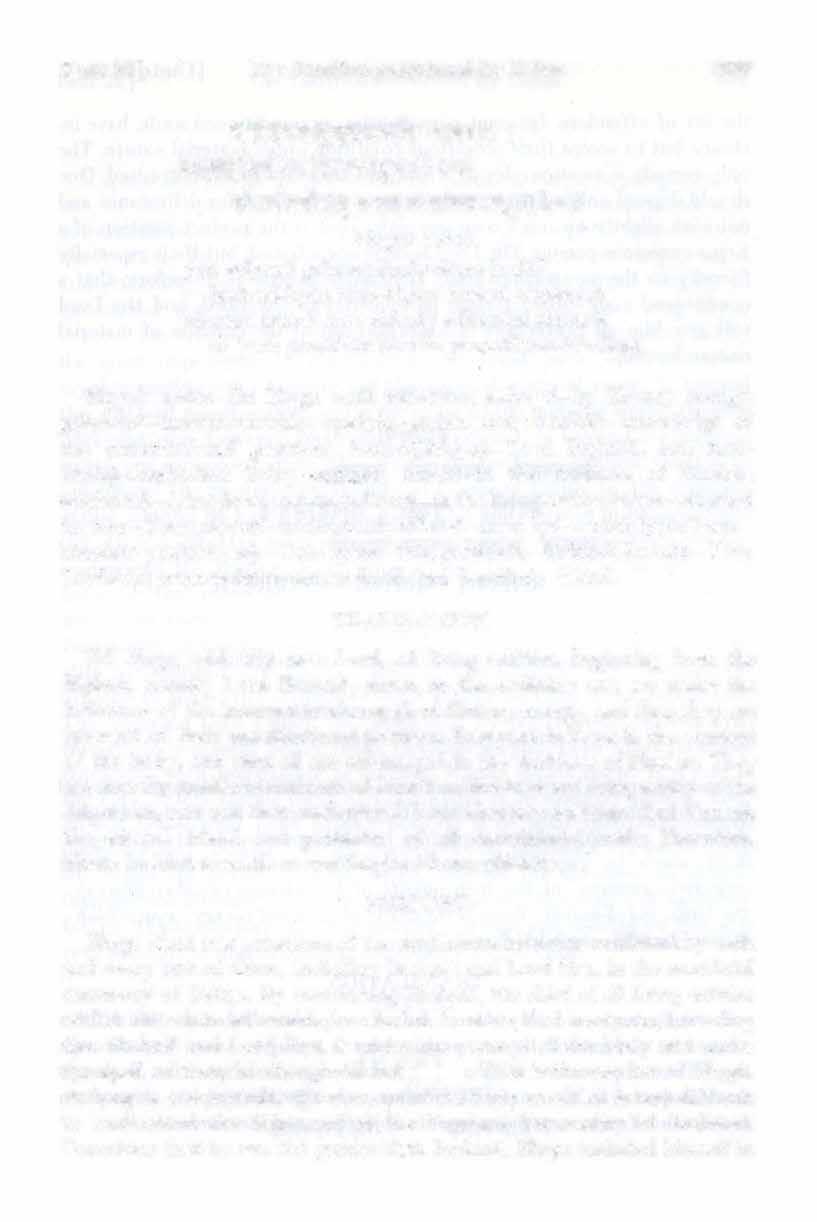
TRANSLATION
Sri Bhrgu said: My dear Lord, all living entities, beginning from the highest, namely Lord Brahma, down to the ordinary ant, are under the influence of the insurmountable spell of illusory energy, and thus they are ignorant of their constitutional position. Everyone believes in the concept of the body, and thus all are submerged in the darkness of illusion. They are actually unable to understand how You live in every living entity as the Supersoul, nor can they understand Your absolute position. But You are the eternal friend and protector of all surrendered souls. Therefore, please be kind towards us and forgive all our offenses.
PURPORT
Bhrgu Muni was conscious of the scandalous behavior exhibited by each and every one of them, including Brahma and Lord Siva, in the sacrificial ceremony of Dak�a. By mentioning Brahma, the chief of aU living entities within this material world, he wanted to state that everyone, including also Brahma and Lord Siva, is under the concept of the body and under the spell of material energy-all hut Vi�r.m. That is the version of Bhrgu. As long as one is under the concept of the body as self, it is very difficult to understand the Supersoul or the Supreme Personality of Godhead. Conscious that he was not greater than Brahma, Bhfgu included himself in
Text 30) The Sacrifice Performed by Dalqa il*'l(:q(ijft6(ij'IRf
�: I ;f�f'Rt6Cf���f4�
239
the list of offenders. Ignorant personalities, or conditioned souls, have no choice but to accept their precarious condition under material nature. The only remedy is to surrender to Vi�t;�u and always pray to be excused. One should depend onlyon the causeless mercy of the Lord for deliverance and not even slightly on one's own strength. That is the perfect position of a Kr�t;�a conscious person. The Lord is everyone's friend, but He is especially friendly to the surrendered soul. The simple process is, therefore, that a conditioned soul should remain surrendered to the Lord, and the Lord will give him all protection to keep him out of the clutches of material
nation.
TEXT 31
brahmoviica naitat svarupam bhavato 'sau padiirthabheda-grahai[l. purufio yavad ""ikfiet jniinasya ciirthasya gurtas_ya casrayo miiya-mayiid vyatirikto matas tvam
brahmii uviica- Lord Brahm a said; na- not; etat- this; svarupam- eternal form; bhavata{t- Your; asau-that other; pada-artha - knowledge; bhedadifferent; grahai{t-by the acquiring; puru§a/r -person; yiivat-as l.ong as; ik§el -wants to see; jniinasya-of knowledge; ca-also; arthasya-of the objective; gurtasya- of the instruments of knowledge; ca-also; iisraya{tthe basis; miiyii-mayiit-from being made of material energy; vyatirikta{tdistinct; mata{t-regarded ; tvam- You.
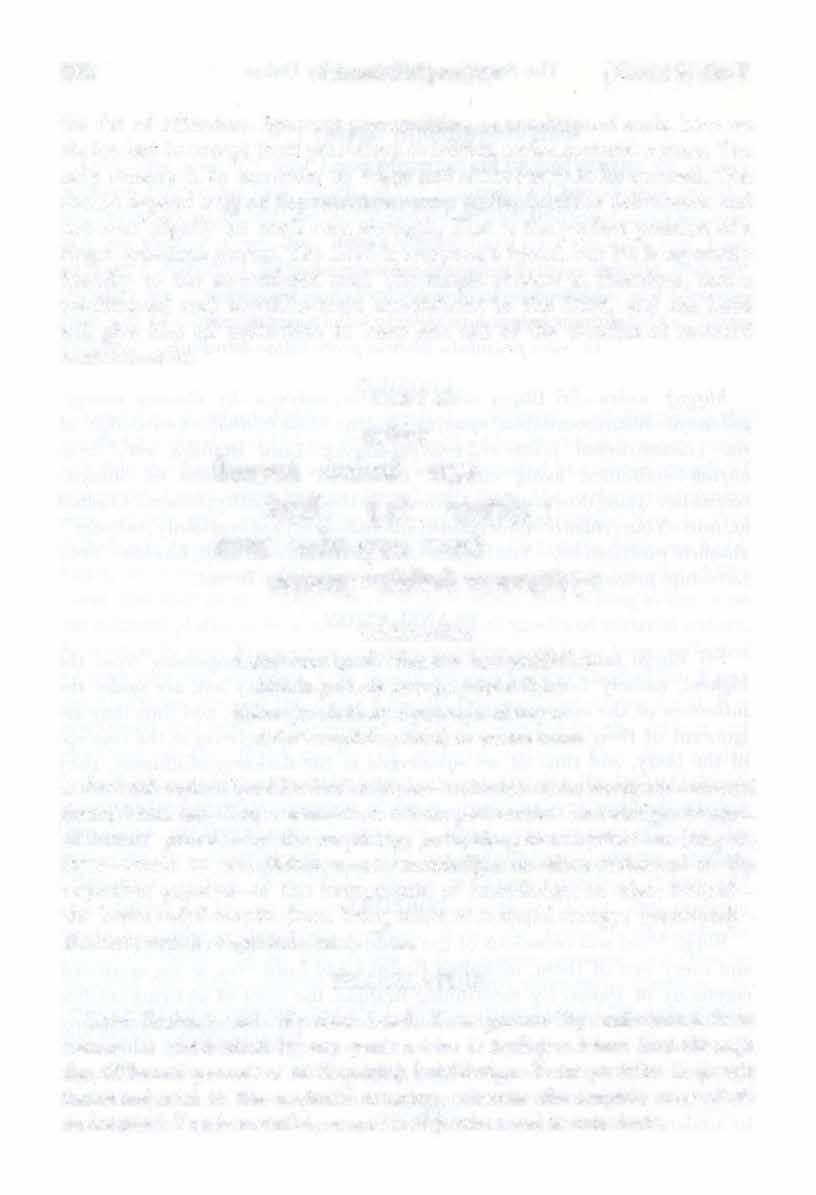
TRANSLATION
Lord Brahma said: My dear Lord, Your personality and eternal form cannot be understood by any person who is trying to know You through the different processes of acquiring knowledge. Your position is always transcendental to the material creation, whereas the empiric attempt to understand You is material, as are its objectives and instruments.
240 Srimad-Bhagavatam [Canto 4, Ch. 7
contami
�'Tsm ��: � tfl!i4G.l�I ����
lflitm �(1�"_.
¥\NI¥441(oqf(w�1Rf�ll��II
It issaid thatthe transcendentalname, qualities,activities, paraphernalia, etc., of the Supreme Personality of Godhead cannot be understood with our material senses. The attempt of the empiric philosophers to understand the Absolute Truth by speculation is always futile because their process of understanding, their objective and the instruments by which they try to understand the Absolute Truth are all material. The Lord is aprakrta, beyond the creation of t�e material world. This fact is also accepted by the great impersonalist Sankaracarya: narayar;w� paro 'vyaktiid arJlfam avyakta-sambhavam. Avyakta, or the original material cause, is beyond this material manifestation and is the cause of the material world. Because Narayat�a, the Supreme Personality of Godhead, is beyond the material world,one cannot speculate upon Him by any material method. One has to understand the Supreme Personality of Godhead simply by the transcendental method of Kr�l]a consciousness. This is confirmed in Bhagavad-gitii (Bg. 18.55). Bhaktyii mam abhijinati: Only by devotional service can one understand the transcendental form of the Lord. That is the difference between the impersonalists and the personalists. The impersonalists, limited by their speculative processes, cannot even approach the Supreme Personality of Godhead, whereas the devotees please the Supreme Personality of Godhead through His transcendental loving service. Sevonmukhe hi: Due to the service attitude of the devotee, the Lord is revealed to him. The Supreme Lord cannot he understood by materialistic persons even though He is present before them. In Bhagavad-giti, Lord Kr�J]a therefore condemns such materialists as muflhas. Muflha means rascal. It is said in the Gitii, "Only rascals think of Lord Kr�J]a as an ordinary person. TheY. do not know what Lord K.r�qa's position is or what His transcendental potencies are." Unaware of His transcendental potencies, the impersonalists deride the person of Lord Kr�J]a, whereas the devotees, by dint of their service attitude, can understand Him as the Personality of Godhead. In the Tenth Chapter of Bhagavad-gita, Arjuna also confirmed that it is very difficult to understand the personality of the Lord.

Text 32] The Sacrifice Performed by Dalqa 241 PURPORT
TEXT 32 R� �¥\tq� Cf�(IWC"«\�{ �fltq;f ¥twilt�ll( I
�B:��q��
4te�: ������
indra uvaca
idam apy acyuta visva-bhiivanam vapur ananda-karam mano-drsam sura-vidvit-kt;apartair ud-ayudhair bhuja-dar{iair upapannam afitabhi�

indra{t uvaca-King Indra said; idam-this; api- cer tainly; acyuta-0 infallible one; visva-bhiivanam-for the welfare of the universe; vapufttranscendental form; ananda-karam-a cause of pleasure; manalt-drsamtothemind andthe eye; sura-vidvi�-envious of Your devotees; lc§apa[lai�by punishment; ud-iiyudhaift-with u plifted weapons; bhuja-da!!{iai{t-with arms; upapannam- possessed of; a§[abhiq-with eight.


TRANS L ATION
King lndra said: My dear Lord, Your transcendental form with eight hands and weapons in each of them appears for the welfare of the entire universe, and it is very pleasing to the mind and eyes. In such a form Your Lordship is always prepared to punish the demons, who are envious of Your devotees.
PURPORT
It is generally understood from revealed scriptures that Lord Vi�pu appears with four hands, but in this particular sacrificial arena Lord Vi�pu arrivedwith eight hands. King lndra said,"Even though we are accustomed to see Your four-handed Vi�pu form, still thisappearancewith eight hands is as real as the four-handed form." As Lord Brahmii had said, to realize the transcendental form of the Lordis beyond the power of the senses. In reply to that statement of Brahmii, King lndra here says that even though the transcendental form of the Lord is not perceivable by the material senses, His activities and His transcendental form can be understood. The Lord's uncommon features, uncommon activities and uncommon beauty can be perceived even by an ordinary man. For example, when Lord Kr�Q.a appeared just like a six- or seven-year-old boy in V rndiivana, He was approached by the residents there. There were torrents of rain, and the Lord saved the residents of Vrndavana by lifting Govardhana Hill and
242 Srimad-Bhagavatam
[Canto 4, Ch. 7
resting it on the little finger of His left hand for seven days. This uncommon feature of the Lord should convince even materialistic persons who want to speculate to the limit of their material senses. The activities of the Lord are pleasing to experimental vision also, but impersonalists will not believe in His identity because they study the personality of the Lord by comparing their personality to His. Because men in this material world cannot lift a hill, they therefore do not believe that the Lord can lift one. They accept the statements of Srimad-Bhiigavatam to be allegorical, and they try to interpret them in their own way. But factually the Lord lifted the hill in the presence of all the inhabitants of Vrndavana, as corroborated by great iiciiryas and authors like Vyasadeva and Narada. Everything about the Lord-His activities, pastimes and uncommon features-should be accepted as is, and in this way, even in our present condition, we can understand the Lord. In the instance herein, King Indra confirms: "Your presence with eight hands is as good as Your presence with four hands." There is no doubt about it.
TEXT 33

'«"� �:
q)sti � �hlwtl� � �
�:quqf6WII'Q��I
(j � �i4�1�wtl'l�l;ij�� ��
patnya iicul), yajno 'yam tava yajanaya kena S[§(o vidhvasta[l pasupatinadya dak�a-kopat tam nas tvarn sava-sayanabha-santa-medham yajniitman nalina-ruca drsa punlhi
patnyalt ucu{t- the wives of the executors of the sacrifice said;yajiia[l.the sacrifice; ayam-this; tava- Your; yajaniiya-worshiping; kena-by Brahma; sntalt-arranged; vidhvasta{t-devastated; pasupatina-by Lord Siva; adya-today; da§ka-kopiit-from anger at Dak�a; tam-it; nal),-our; tvam-You; sava-sayana-dead bodies; abha-like; .§anta-medham-the still sacrificial animals; yajiiatman-0 Lord of sacrifice; nalin a-lo tus; rucabeauliful;drsa-by the vision of Your eyes;punihi-sanctify.
Text 33] The Sacrifice Performed by Da�a 243
!:�l �11��11
The wives of the performers of the sacrifice said: My dear Lord, this sacrifice was arranged under the instruction of Brahma, but unfortunately Lord Siva, being angry at Dalq!a, devastated the entire scene, and because of his anger the animals meant for sacrifice are lying dead. Therefore the preparations of the yajfia have been lost. Now, by the glance of Your lotus eyes, the sanctity of this sacrificial arena may be again invoked.
PURPORT
Animals were offeredin sacrificein order to give them renewed life; that was the purpose of having animals there. Offering an animal in sacrifice and giving him renewed life is the evidence of the strength of chanting mantras. Unfortunately, when Dak�a's sacrifice was devastated by Lord Siva, some of the animals were killed. (One was killed just to replace the head of Dak�a.) Their bodies were lying about, and the sacrificial arena was turned into a crematorium. Thus the real purpose of yajna was lost.
Lord Vi�pu, being the ultimate objective of such sacrificialeeremonies, was requested by the wives of the priests to glance over the yajiia arena with His causeless mercy so that the routine work of the yajiia might be continued. The purport here is that animals should not be unnecessarily killed. They were used to prove the strength of the mantras and were to have been rejuvenated by the use of the mantras. They should not have been killed, as they were by Lord Siva to replace the head of Dak�a with an animal's head. It was pleasing to see an animal sacrificed and rejuvenated, and that pleasing atmosphere had been lost. The wives of the priests requested that the animals be brought back to life by the glance of Lord Vi�pu to make a pleasing yajiia.

244 Srimad-Bhagavatam [Canto 4, Ch. 7
TRANSLATION
TEXT 34 ��: ���AA� tttJ�9\I�f(�� I � �� :;;sq�l{\�6 Wf � �'4sii4d61 � 11�v" r�ayaucu� ananvitamtebhagavanvice�titam yadiitmanacarasihikarmaniijyase
vibhutaye yata upasedur "isvar"irh
na manyate svayam anuvartatirh bhaviin
naya�-the sages; ucu�-prayed; ananvitam-wonderful; te-Your; bhagavan-0 possessor of all opulences; vice§!itam - activities ; yat-which; atmana-by Your potencies; carasi- You execute; hi-certainly ; karmato such activities; na ajyase- You are not attached; vibhiltaye-for her mercy; yata� - from whom; upased u� - worshiped; isvarim-Lak�mi, the goddess of fortune; na manyate-are not attached; svayam- Yourself; anuvar tat"im-to Your obedient servant (Lak�mi); bhaviin-Your Lordship.

TRANSLATION
The sages prayed: Dear Lord, Your activities are most wonderful, and although You do everything by Your different potencies, You are not at all attached to such activities. You are not even attached to the goddess of fortune, who is worshiped by the great demigods like Brahma, who pray to achieve her mercy.
PURPORT
In Bhagavad-gitii it is said that the Lord has no desire to achieve any result from His wonderful activities, nor has He any need to perform them. But still, in order to give an example to people in general, He sometimes acts, and those activities are very wonderful. He is not attached to anything. Na marh karmiirti limpanti: Although He acts very wonderfully, He is not at all attached to anything (Bg. 4.14). He is self-sufficient. The example is given here that the goddess of fortune, Lak�m1, is always engaged in the service of the Lord, but still He is not attached to her. Even great demigods like Brahma worship the goddess of fortune in order to win her favor. And though the Lord is worshiped by many hundreds and thousandsof goddesses of fortune, still He is not at all attached to any one of them. This distinction concerning the exalted transcendental position of the Lord is specifically mentioned by the great sages: He is not like the ordinary living entity, who is attached to the result of pious activities.
Text 35] The Sacrifice Performed by Da�a 245
3Fl ��li!41Tt'1td
TEXT 35 ffm�:
M�ldJii41f�: I
if ht'lf<l JttiQ¥4411!441: II��II
siddha ucuft
ayarh tvat-kathii-mrsta-piyufia-nadyiirh mano-varartaft klesa-daviigni-dagdhaft
trfiarto 'vagiipho na sasmiira davarh na ni_skriimati brahma-sampannavan naft
siddhii�-the Siddhas; ucu�-prayed; ayam- this; tvat-kathii- Your pastimes; mr§ta-pure; p'iyu�a-of nectar; nadyiim-in the river; mana�of the mind; viirara�-the elephant; klda-sufferings; diiva-agni-by the forest fire; dagdha�- burnt; tr�ii-thirst; iirtaft-afflicted; avagii�haft- being immersed; na sasmiira-does not remember; diivam-the forest fire or the miseries; na ni§kriimati-not come out; brahma-the Absolute; sampannavat-like having merged; naft-our.
TRANSLATION
The Siddhas prayed: Like an elephant that has suffered in a forest fire but can forget all its troubles by entering a river, our minds, 0 Lord, always merge in the nectarean river of Your transcendental pastimes, and they desire never to leave such transcendental bliss, which is as good as the pleasure of merging in the Absolute.
PURPORT
This statement is from the Siddhas, the inhabitants of the Siddhaloka, where the eight kinds of material perfection are complete. The residents of Siddhaloka have full control in the eight kinds of yogic perfection, but from their statement it appears that they are pure devotees. They always merge in the nectarean river of hearing of the pastimes of the Lord. Hearing of the pastimes of the Lord is called Knrta-kathii Similarly, there is a statement by Prahlada Maharaja that those who are always merged in the ocean of the nectar of describing the pastimes of the Lord are liberated. They have no fear of the material condition of life. The Siddhas say that the mind of an ordinary person is full of anxieties. The example is given of theelephantwho has suffered in a forest fire andwho enters into a river to

246 Srimad-Bhagavatam
+t;\tiiU(Ut:
��WI��
[Canto 4, Ch. 7
relieve himself. If persons who are suffering in the forest fire of this materialexistencewillonlyenterinto the nectarean river of the description of the pastimes of the Lord, they will forget all the troubles of the misera· ble material existence. The Siddhas do not care for fruitive activities, such as performing sacrifices and achieving the good results. They simply merge in the transcendental discussions of the pastimesof the Lord. That makes them completely happy, without care for pious or impious activities. For those who are always in Kr�!la consciousness there is no need to perform any kind of pious or impious sacrifices or activities. Kr�!la consciousness is itself complete, for it includes all the processes praised in the Vedic scriptures.
�i\ctt\;w: � � �: II��II . - -
yaJamany uvaca
sv-iigatarit te prasidesa tubhyarit nama{!
srinivasa sriyii kantayatriihi na�
tviim rte 'dhisa niihgair makha{l sobhate
Sir�a-hina{l ka-bandho yathii puru.sa{l

yajamiini-the wife of Dak�a; uvaca- prayed; su-agatam- auspicious appearance; te- Your; prasida_.:become pleased; Tsa- my dear Lord; tubhyam-unto You; nama{l-respectful obeisances; sriniviisa-0 abode of the goddess of fortune; sriya- with Lak�mi; kiintaya- Your wife; triihiprotect; na{l- us ; tviim- you; rte-without; adhisa-0 supreme controller; na- not; ahgai{l-with bodilylimbs; makha{l- the sacrificialarena; sobhateis beautiful; s!r�a-hina{l- withou l the head; ka-bandha{l- possessed of only a body ; yathii-as; puru�alt -a person.

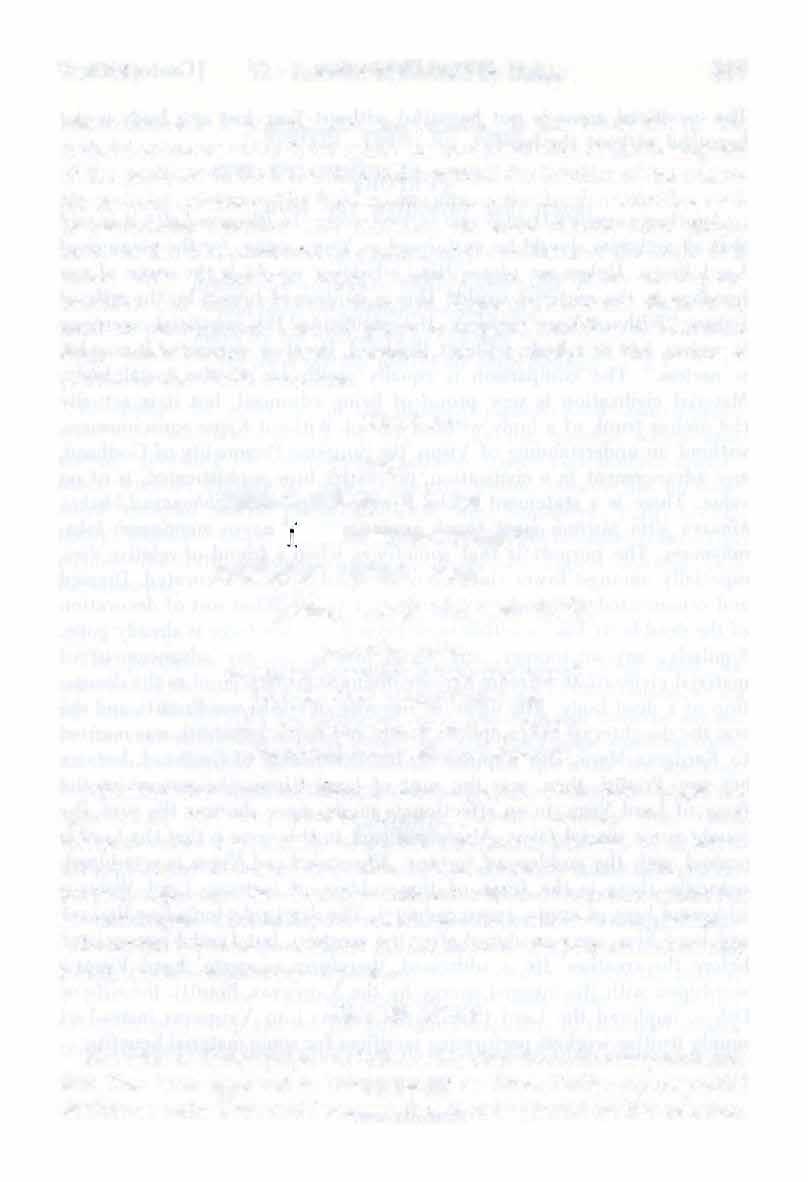
TRANSLATION
The wife of Da�a prayed as follows: My dear Lord, it is very fortunate that You have appeared in this arena of sacrifice. I offer my respectful obeisances unto You, and 1 request that You be pleased on this occasion.
Text 36 J The Sacrifice Performed by Da�a 247
TEXT 36 ll'3fij/�i!fl"' � � stdl« � ;p(: �¥1�441snft:;r: I �Slh��:�
The sacrificial arena is not beautiful without You, just as a body is not beautiful without the head.
PURPORT
Another name of Lord Vi�1:1u is Yajnesvara. In Bhagavad-gita it is said that all activities should be performed as Vi�1:1u yajii.a, for the pleasure of Lord Vi�l:lU- Unless we please Him, whatever we do is the cause of our bondage in the material world. This is confirmed herein by the wife of Dak�a: "Without Your presence, the grandeur of this sacrificial ceremony is useless, just as a body without the head, however decorated it may be, is useless." The comparison is equally applicable to the social body. Material civilization is very proud of being advanced, but it is actually the useless trunk of a body without a head. Without Kr�1:1a consciousness, without an understanding of Vi�1:1u, the Supreme Personality of Godhead, any advancement in a civilization, no matter how sophisticated, is of no value. There is a statement in the Srimad-Bhiigavatam: bhagavad-bhaktihinasya jiitil;l sastram japas tapafi, apriir-asyaiva dehasya mar-t;lanam lokaranjanam. The purport is that sometimes when a friend or relative dies, especially amongst lower class men, the dead body is decorated. Dressed and ornamented, the body is taken in procession. That sort of decoration of the dead body has no actual value because the life force is already gone. Similarly, any aristocracy, any social prestige or any advancement of material civilization without Kr�1:1a consciousnessis as good as the decoration of a dead body. The name of the wife of Dak�a was Prasuti, and she was the daughter of Svayambhuva Manu. Her sister, Devahuti, was married to Kardama Muni, and Kapiladeva, the Personality of Godhead, became her son. Prasuti, then, was the aunt of Lord Vi�Q.U. She was asking the favor of Lord Vi�1:1u in an affectionate mode; since she was His aunt, she sought some special favor. Also significant in this verse is that the Lord is praised with the goddess of fortune. Wherever Lord Vi�1:1u is worshiped, naturally there is the favor of the goddess of fortune. Lord Vi�QU is addressed here as amrta, transcendental. The demigods, including Brahma and Lord Siva, were produced after the creation, but Lord Vi�1:1u existed before the creation. He is addressed, therefore, as amrta. Lord Vi�1:1u is worshiped with His internal energy by the Vai�Q.avas. Prasuti, the wife of Dak�a, implored the Lord to turn the priests into Vai�1:1avas instead of simply fruitiveworkers performing sacrifices for somematerial benefits. TEXT
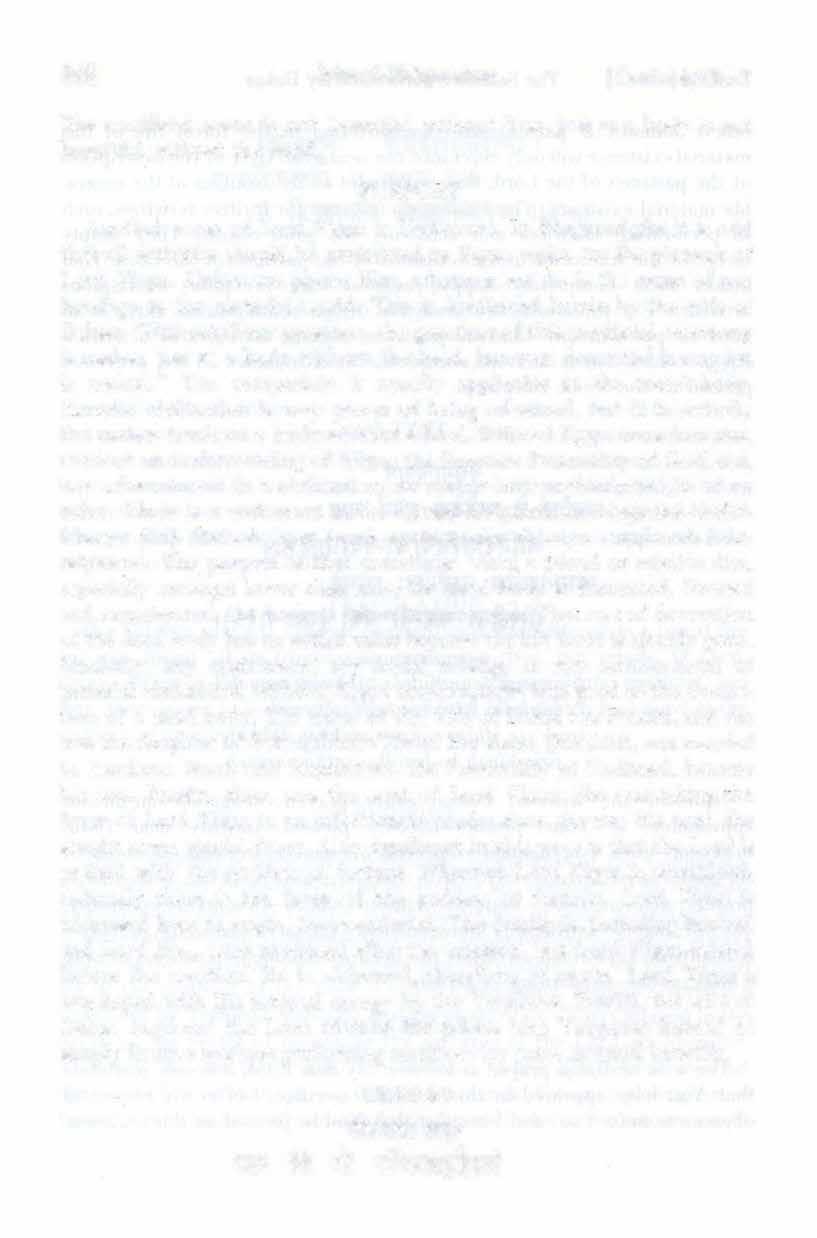
248 Srimad-Bhagavatam [Canto 4, Ch. 7
�'(ffl�l u: f4i ;it di¥t((1jl�
37
st�al:'!l Wfa itWf N"W. 1
� itn +tct((141 fi: 1{'fel
� qg: qflfil+tiRi�: 11�\911
lokapiila iicu�
dr�ta/:1. kim no drgbhir asad-grahais tvarh pratyag-dra§tii drsyate yena visvam

miiyii hy e§ii bhavadiyii hi bhuman yas tva · m �a.sJha� paiicabhir bhiisi bhiitai�
lokapalal)-the governors of the different planets; ucul).-said; dr�ta/:1.seen; kim-whether; naft-by us; drgbhil)-by the material senses; asatgrahail)- revealing the cosmic manifestation; tvam- You; pratyak-dra�tainner witness; drsyate-is seen; yena-by whom; visvam-the universe; maya- material world; hi-because; C§a-this; bhavac!iya-Your; hi-certainly; bhurnan-0 possessor of the universe; ya� - because; tvam- You; �a�thal)-the sixth; pancabhift-wilh the five; bhasi-appear; bhiitail) -with the elements.
TRANSLATION
The governors of various planets spoke as follows: Dear Lord, we believe only in our direct perception. But, under the circumstances, we do not know whether we have actually seen You with our material senses. By our material senses we can simply perceive the cosmic manifestation, but You are bey�nd the five elements. You are the sixth. We see You, therefore, as a creation of the material world.
PURPORT
Thegovernors of the various planets are certainly very materially opulent and puffed up. Such persons are unable to understand the transcendental eternal form of the Lord. In the Brahma-sarhhitii it is stated that only persons who have anointed their eyes with love of Godhead can see the Personality of Godhead in every step of their activities. Also, in the prayers of Kuntl it is stated (akii'i.cana-gocaram) that only those who are not materially puffed up can see the Supreme Personality of Godhead; others are bewildered and cannot even think of the Absolute Truth. (Bhiig. 1.8.26)
Text 38] The Sacrifice Performed by Da�a
249
TEXT 38 Wit-tm 3i'3: iPIT'f�s�a<��Pf 51¥1)
Allill�;it4"t � 3U�wt: I � ij�a�q�Ma�

¥Cwt�t'W41a•AIUI �������
yogesvarii ucu{l
preyiin na te 'nyo 'sty amutas tvayi prabho visviitmanik.sen na prthag ya iitmana{l athiipi bhaktyesa tayopadhiivatiim ananya-vrttyiinugrhiicw vatsala
yogesvarii� - the great mystics; ucutt - said; preyiin-very dear; na-not; te-of You; anya� -another; asti-there is; amutatt-from that; tvayi-in You; prabho-dear Lord; visva-iitmani-in the Supersoulof all livingentities; ik§et- see; na-not ; prthak-different; ya{l-who ; iitmana{l-the living entities; athiipi-so much more; bhaktyii-with devotion; isa-0 Lord; tayii-with it; upadhavatiim-of those who worship; ananya-vrttyii-unfailing; anugrh . favor; vatsala-0 favorable Lord.
TRANSLATION
The great mystics said: Dear Lord, persons who see You as nondifferent from themselves, knowing that You are the Supersoul of all living entities, are certainly very, very dear to You. You are very favorable towards those who engage in devotional service, accepting You as the Lord and themselves as the servants. By Your mercy, You are always inclined in their favor.
PURPORT
It is indicated in this verse that the monists and the great mystics know the Supreme Personality of Godhead as one. This oneness is not the misunderstanding that a living entity is equal in every respect to the Supreme Personality of Godhead. This monism is based on pure knowledge as described and confirmed in Bhagavad-gitii: priyo hi jniinino 'tyartham aham sa ca mama priya{l (Bg. 7.17). The Lord says that those who are advanced in transcendental knowledge and know the science of Kr�J).a consciousness are very dear to Him, and He also is very dear to them. Those who are actually in perfect knowledge of the science of God know that the living entities are superior energy of the Supreme Lord. This is stated in Bhagavad-gitii, Seventh Chapter: The material energy is inferior, and the living entities are superior energy. Energy and the energetic are
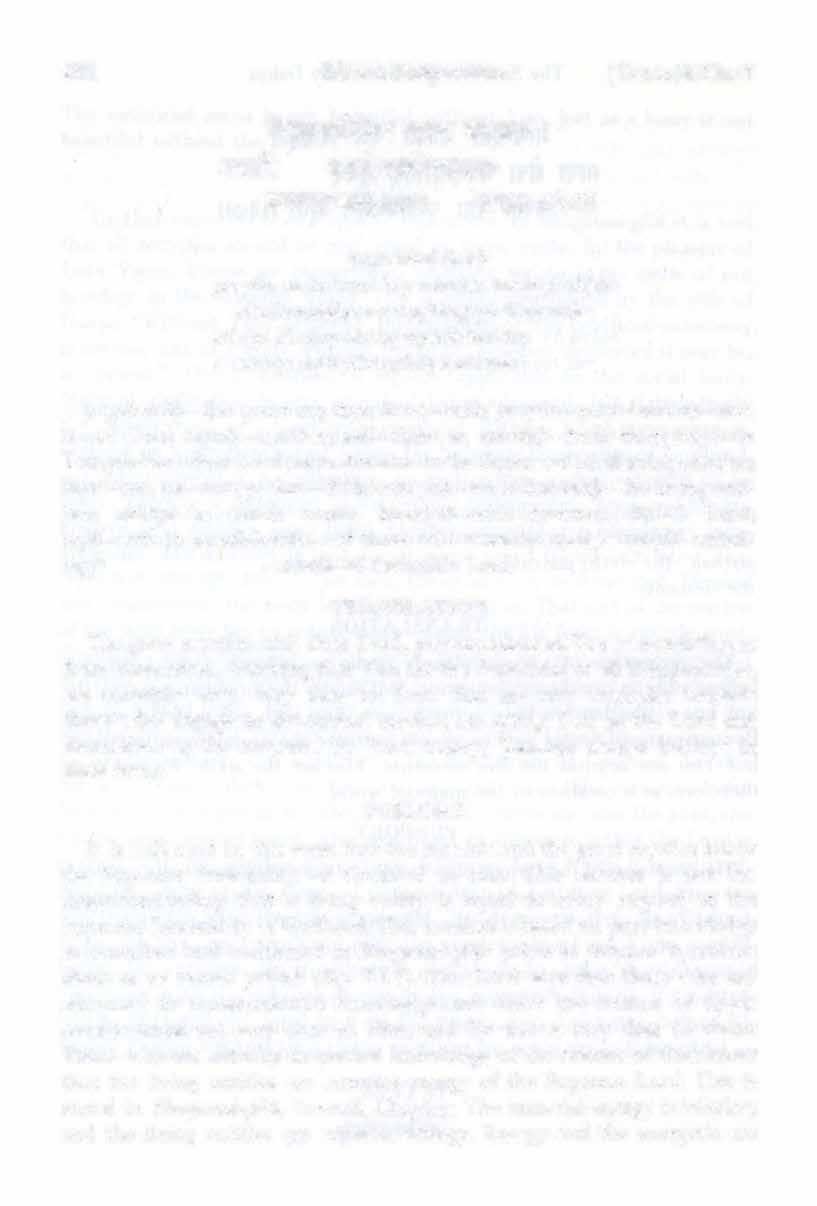
250 Srimad-Bhagavatam
[Canto 4, Ch. 7
nondifferent; therefore, energies possess the same quality as the energetic. Persons who are in full knowledge of the Personality of Godhead, analyzing His different energies and knowing their own constitutional position, are certainly very, very dear to the Lord. Persons, however, who may not even be conversant with knowledge of the Supreme Personality but who always think of the Lord with love and faith, feeling that He is great and that they are His parts and parcels, ever His servitors, are even more favored by Him. The particular significance of this verse is that the Lord is addressed as vatsala. Vatsala means always favorably disposed. The Lord's name is bhakta-vatsala. The Lord is famous as bhakta-vatsala, which means that He is always favorably inclined to the devotees, whereas He is never addressed anywhere in the Vedic literature as jniini-vatsala.
TEXT 39


AfWiqM6Ri4!JUII��
jagad-udbhava-sthiti-layefiu daivato
bahu-bhidyamana-gur-ayii "tma-miiyayii
racitiitma-bheda-mataye sva-samsthayii
vinivartita-bhrama-gur-iitmane nama�
jaga/,- the material world; udbhava-crea tion; sthiti-maintenance; laye�u-in annihilation; daivata�-destiny; bahu-many ; bhidyamiina-being variegated; gur- ayii-by material qualities; iitma-miiyayii-by His material energy; racita-produced ; iitma-in the living entities; bheda-mataye-who produced different inclinations; sva-sarhsthayii-by His internal potency; vinivartita-caused to stop; bhrama-interaction ; gura-of material modes; atmane-unto Him in His personal form ; nama� -obeisances
TRANSLATION
We offer our respectful obeisances unto the Supreme, who has created varieties of manifestations and put them under the spell of the three qualities of the material world in order to create, maintain and annihilate them. He Himself is not under the control of the external energy; in His personal feature He is completely devoid of the variegated manifestation of material qualities, and He is under no illusion of false identification.
Text 39] The Sacrifice Performed by Daksfl 251
�
� ����·
iil•tpc�Ar4f6e�1
'ltflltti41'1!JUI:qtss�qj:q:qj
�:
������
.
PURPORT
Two situations are described in this verse. One is the creation, maintenance and annihilation of the material world, and the other is the Lord's own establishment. There is also quality in the Lord's own establishment, thekingdom of God. It is stated here that Goloka is His personal situation. There is also quality in Goloka, but that quality is not divided into creation, maintenance and annihilation. In the external energy, the inter· action of the three qualities makes it possible for things to be created, maintained and annihilated. But in the spiritual world, or the kingdom of God, there is no such exhibition, since everything is eternal, sentient and blissful. Thereis a class of philosophers who misunderstand the appearance of the Personality of Godhead within this material world. They are under theimpressionthat when the Supreme Personality of Godhead appears, He is under the spell of the three qualities, like all the other living entities who appear within this material world. That is their misunderstanding; as it is clearly stated here (svasamsthayii), by His internal potency He is transcendental to all these material qualities. Similarly, in Bhagavad-gitii the Lord says, "I appear by My internal potency." Both the internal and external potencies are under the control of the Supreme, so He does not come under the control of either of these potencies. Rather, everything is under His control. In order to manifest His transcendental name, form, quality, pastimes and paraphernalia, He brings into action His internal energy. On account of the variegatedness of the external potency, there are manifestations of many qualitative demigods, beginning with Brahma and Lord Siva, and people are attracted to these demigods according to their own material quality. But when one is transcendental or surpasses the material qualities, he is simply fixed in the worship of the Supreme Personality. This fact is explained in Bhagavad-gitii: Anyone engaged in the service of the Lord is already transcendental to the variegatedness and interaction of the three material qualities. The summary is that the conditioned souls are being pulled on by the action and reaction of the material qualities, which create a differentiation of energies. But in the· spiritual world the worshipable one is the Supreme Lord and no one else.
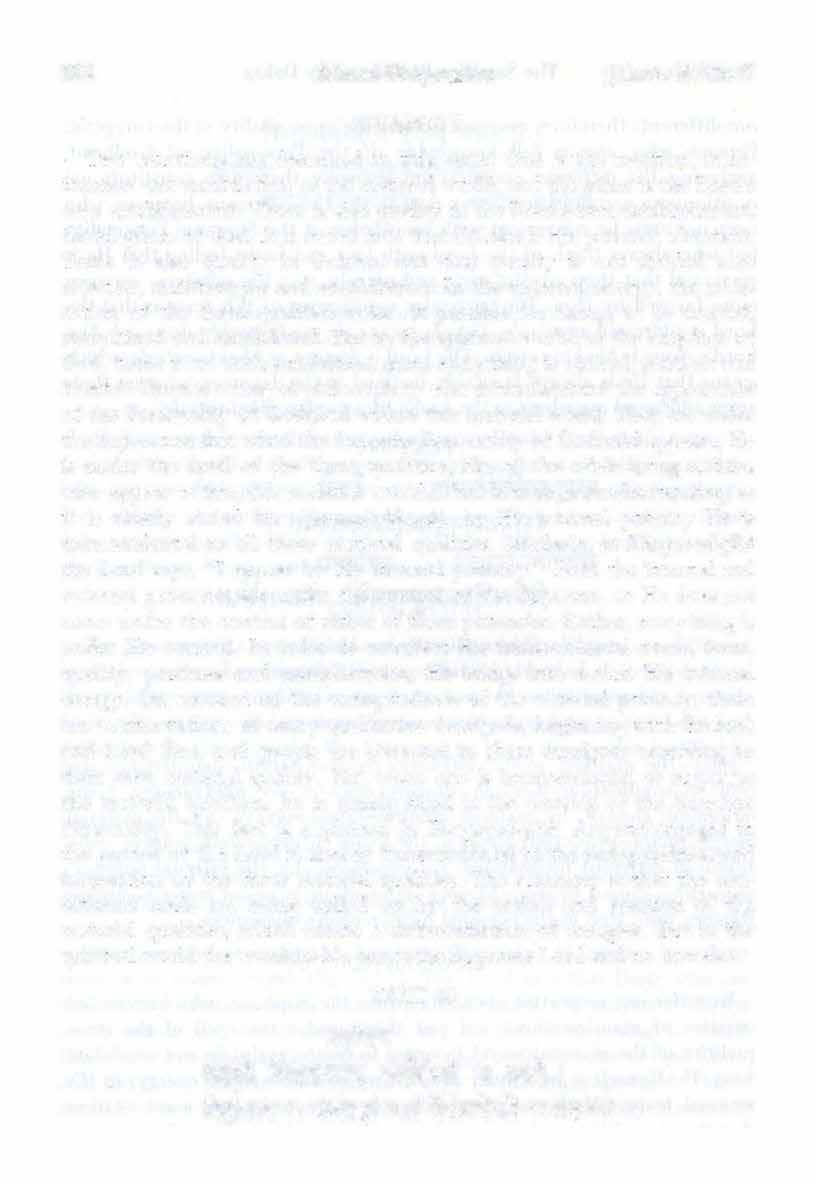
252 Srimad-Bhagavatam [Canto 4, Ch. 7
TEXT 40 lfrsitctl"t � �<IQ%4144 �¥4t(hd � � I r..gun44 t;f 44�181 ill(�sft :q-11\Joll
brahmovaca
namas tesrita-sattvaya dharmadinarh ca sutaye
nirgur-aya ca yat kafitharh
naharh vedapare ' pica
brahma-the personified Vedas; uvaca-said; nama�-respectful obeisances; te-unto You; srita-sattviiya-the shelter of the quality of goodness; dharma-iidiniim-of all religion, austerity and penance; ca-and; sutaye-the source; nirgu(liiya-transcendental to material qualities; caand; yat-of whom (of the Supreme Lord);ka�thiim-the situation; nanot; aham- I; veda-know; apare- others; api-certainly;ca-and.
TRANS LATIO N
The personified Vedas said: We offer our respectful obeisances unto You, the Lord, the shelter of the quality of goodness and therefore the source of all religion, austerity and penance, for You are nevertheless transcendental to all material qualities, and no one knows You or Your actual situation.
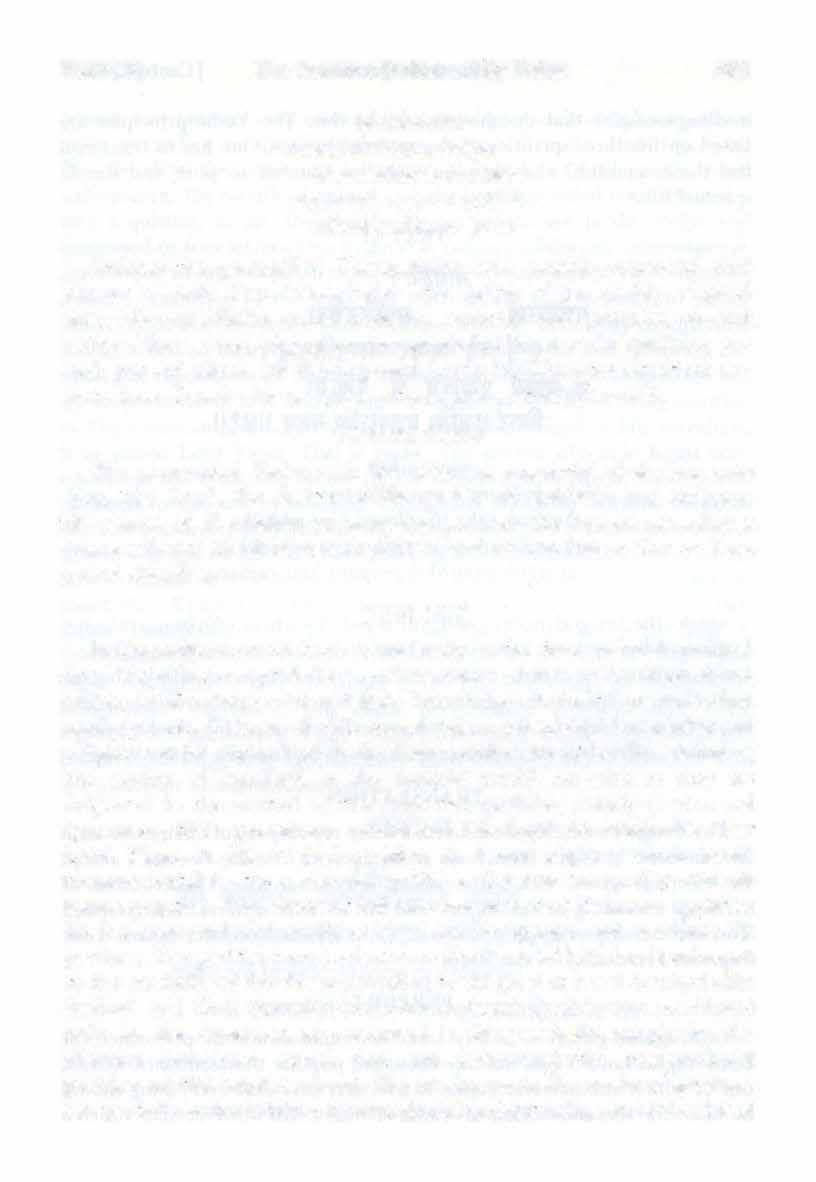
PURPORT
In the material world there is the trinityof the three material qualities. Lord Vi�ttu has accepted the superintendence of the qualityof goodness, which is the source of religion, knowledge, austerity, renunication, opulence, etc. Because of this, actual peace, prosperity, knowledge and religion can be attained when the living entities are under the control of the quality of goodness in the material world. As soon as they are subjected to the control of the other two qualities, namely passion and ignorance, their precarious conditional life becomes intolerable. But Lord Vi��u, in His original position, is always nirgu[ta, which means transcendental to these material qualities. Gurta means quality, and nir means negation. This does not indicate,however, that Hehasno qualities; He has transcendental qualities by which He appears and manifests His pastimes. The positive transcendentalqualitative manifestationis unknown to the students of the Vedas as wellas tothegreat stalwart demigods like Brahmii and Siva. Actually, the transcendental qualities are manifested only to the devotees. As confirmed in Bhagavad-gitii, simply by discharging devotional service one can understand the transcendental. position of the Supreme Lord. Those who are in the mode of goodness can partially enter into thetranscendental understanding, but it is advised
Text 40] The Sacrifice
Performed by Da�a
253
in Bhagavad-gitii that one has to surpass this. The Vedic principles are based on the three qualities of the material modes. One has to transcend the three qualities, and then one can be situated in pure and simple spiritual life.
:q�151�11( ijijf¥14�151T
� � � 31Fii4ftt'ffi4( I
d� q� � q.r�:
��: 5f11Rtlsm � mn11
agmr uvaca yat-tejasaharh susamiddha-teja havyarh vahe sv-adhvara iijya-siktam tam yajniyarh pancavidharh ca pancabh* sv-i�tarh yajurbhi� prarzato 'smi yajnam
agn i� -the fire-god; uvaca-said; yat-tejasa-by whose effulgence; aham1; susamiddha-teja�-as luminous as blazing fire; havyam- offerings; vahe1 am accepting; su-adhvare-in the sacrifice; ajya-siktam- mixed with butter; tam-that; yajifiyam-the protector of the sacrifice; panca-vidham- five; ca- and; pancabh*-by five; su-i§tam-worshiped;yajurbh*-Vedic hymns; praflata� - offer respectful obeisances; asmi-l; yajnam-to Y ajiia (Vi�I).U).
TRANSLATION
The fire-god said: My dear Lord, I offer my respectful obeisances unto You because by Your favor I am as luminous as blazing fire and I accept the offerings mixed with butter and offered in sacrifice. The five kinds of offerings according to the Yajur Veda are all Your different energies, and You are worshiped by five kinds of Vedic hymns. Sacrifice means Your Supreme Personality of Godhead.
PURPORT
In Bhagavad-gitii it is clearly said that yajna should be performed for Lord Vi�l)U. Lord Vi�l)U has one thousand popular transcendental names, out of which one name is Yajfia. It is clearly said that everything should be done for the satisfaction of Y ajfia or Vi�l)U. All other actions which a

254 Srimad-Bhagavatam [Canto 4, Ch. 7
TEXT 41 -wtii�l!fl'¥
person may take are only causes for his bondage. Everyone has to perform yajna according to the Vedic hymns. As stated in the Veda Upani�ad, fire, the altar, the auspicious full moon, the period of four months called Caturmiisya, the sacrificial animal and the beverage called soma are necessary requisites, as are the specific hymns mentioned in the Vedas and composed of four letters. One hymn is as follows: iisriivayeti catur-ak§aram astusrau�a!f iti catur-ak�aram yajeti dviibhyiim yeyajiimaha�. These mantras, chanted according to the sruti and smrti literatures, are only to please Lord Vi�I)U. For the deliverance of those who are materially conditioned and attached to material enjoyment, performing yajna and following the rules and regulations of the four divisions of society and of spiritual life are recommended. It is said in the Vi§!J.u Purii!J.a that by offering sacrifice to Vi�I)U onecan gradually he liberated. The whole target of life, therefore, is to please Lord Vi�I)U. That is yajna. Any person who is in Kr�Qa consciousness has dedicated his life for the satisfaction of Kr�Qa, the origin of all Vi�I)U forms, and by offering worship and prasiidam daily, he becomes the best performer of yajna. In the Sr"imad-Bhiigavatam it is clearly stated that in this age of Kali the only successful performance of yajna or sacrifice is yajnai� sank"irtana-priiya*; the best type of sacrifice is simply to chant Hare Kr�Qa, Hare Kr!}Qa, Kr!}Qa Kr!}Qa, Hare Hare/ Hare Rama, Hare Rama, Rama Rama, Hare Hare. This yajna is performed before the form of Lord Caitanya,as other yajnas are performedbefore the form of Lord Vi!}I)U. These recommendations are found in the Eleventh Canto of the SrimadBhiigavatam. Moreover, this yajna performance confirms that Lord Caitanya Mahiiprabhu is Vi�I)U Himself. As Lord Vi!}l)u appeared at the Dak� yajiia long, long ago, similarly Lord Caitanya has appeared in this age to accept our sankirtana-yajiia.


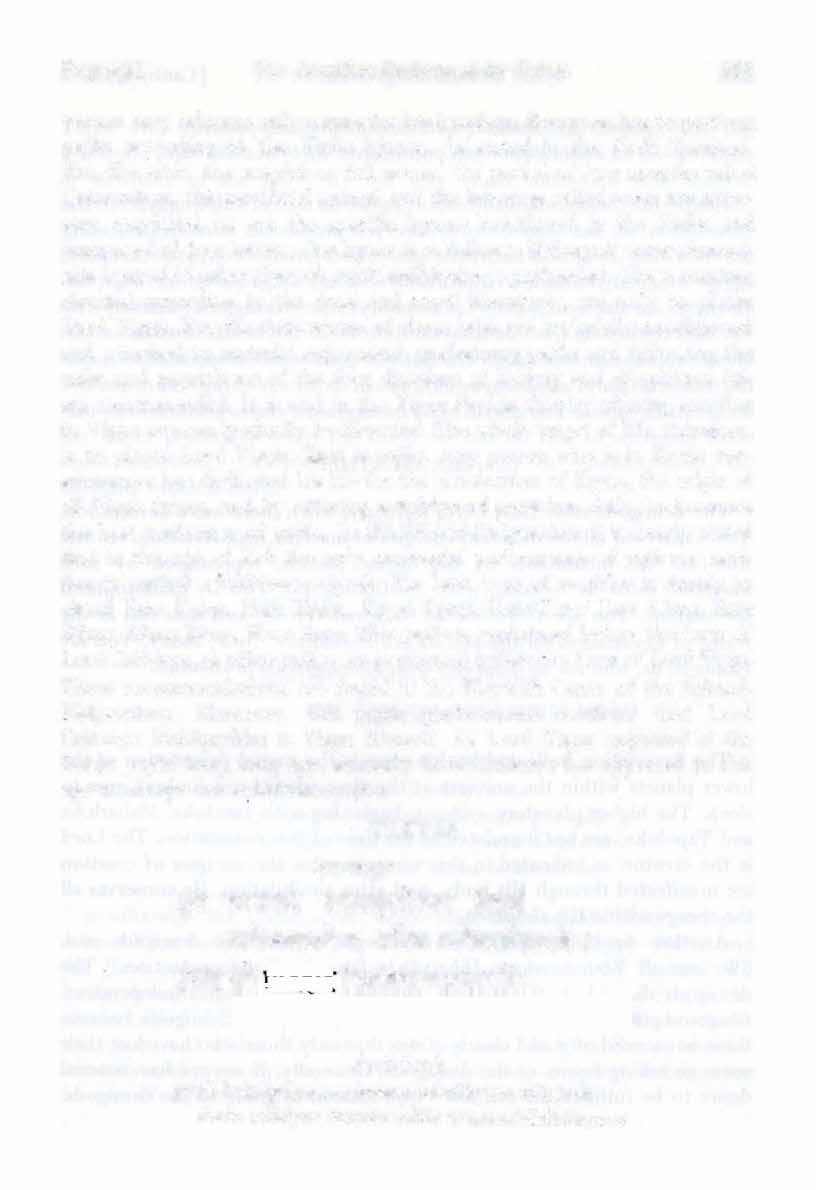
Text42] The Sacrifice Performed by Dalqa 255
�err�� ��NI4 (Cit)ijflf\UI€i4 � �lt't1C4«1r.t(�aVH:Ifltij*4it I �� R'lRH11\IS:4k¥fqi(f.t: ��:tritr����;r:ll\i�ll devii ucu� purii kalpiipiiye sva-krtam udankrtya vikrtam tvam eviidyas tasmin salila uragendriidhisayane
TEXT42
puman sefie siddhair hrdi vimrsitadhyatma-padav* sa evadyakfirwr ya� pathi carasi bhrtyan avasi na�
deva�-the demigods; ucu�-said; pura-formerly; kalpa-apaye-at the devastation of the kalpa; sva-kr tam-self-produced; udarzkrtya-having drawn within Your abdomen; vikrtam-effec t; tvam- You; eva-certainly; adya�-original; tasmin-in that; salile-water; uraga-indra-on Se�a; adhisayane-on the bed; puman-personality; sefie-taking rest; siddha*-by the liberated souls (like Sanaka, etc.); hrdi-in the heart; vimrsita-meditated on; adhyatma-padavi�-the path of philosophical speculation; sa�He; eva-certainly; adya-now; ak�[IO�-of both eyes; ya� - who; pathion the path; carasi- You move; bhrtyan-servants; avasi-protect; na�- us.
TRANSLATION
The demigods said: Dear Lord, formerly, when there was a deva&ation, You conserved all the different energies of material manifestation. At that time all the inhabitants of the higher planets, repr�sented by such liberated souls as Sanaka, were meditating on You by philosophical speculation. You are therefore the Original Person, and You rest in the water of devastation on the bed of the Se�a snake. Now, today, You are visible to us, who are all Your servants. Please give us protection.
PURPORT
The devastation indicated in this verse is the partial devastation of the lower planets within the universe at the time when Lord Brahma goes to sleep. The higher planetary systems, beginning with Janaloka, Maharloka and Tapoloka, are not inundated at the time of this devastation. The Lord is the creator, as indicated in this verse, because the energies of creation are manifested through His body, and after annihilation, He conserves all the energy within His abdomen.
Another significant point in this verse is that the demigods said, "We are all Your servants [ bhrtyan] . Give us Your protection." The demigods depend on the protection of Vi�QU; they are not independent. Bhagavad-gita, therefore, condemns the worship of demigods because there is no need of it and clearly states that only those who have lost their sense go asking favors of the demigods. Generally, if anyone has material desire to be fulfilled, he can ask Vi�I}U instead of going to the demigods.
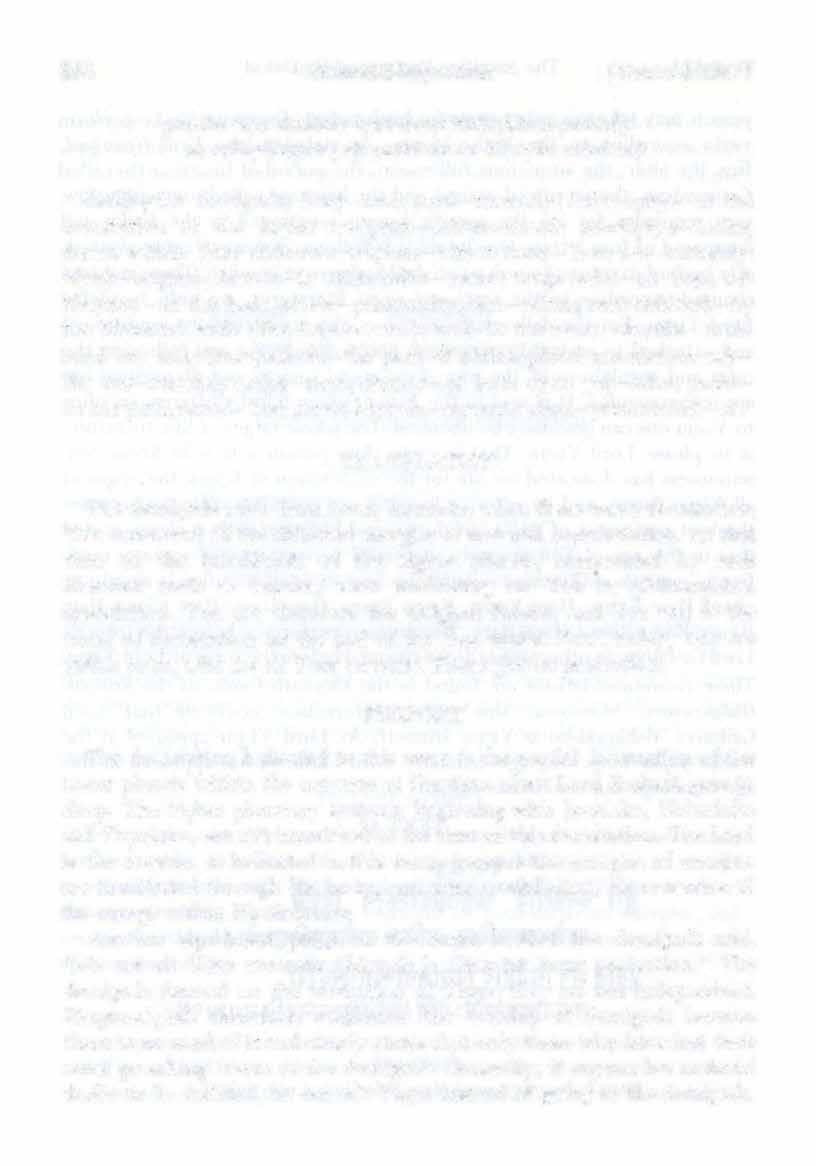
256 Srimad-Bhagavatam [Canto 4, Ch. 7
Those who worship demigods are not very intelligent. Besides that, the demigods say, "We are Your eternal servants." So those who areservants, or devotees of the Lord, are not very much concerned with fruitive activities, the performance of the prescribed yajnas or mental speculation. They simply serve the Supreme Personality of Godhead sincerely, with love and faith, performing everything with that loving service, and the Lord gives such devotees direct protection. In Bhagavad-gitii Lord l<f�Qa says, "Simply surrender unto Me, and I will give you protection from all the reactions ofsinful activities." This material world is so created that one has to act sinfully, knowingly or unknowingly, and unless his life is dedicated to Vi�f.l.U, he has to suffer all the reactions of sinful activities. But one who surrenders and dedicates his life for the service of the Lord has direct protection from the Lord. He has no fear of suffering from sinful activities, nor does he desire, willingly or unwillingly, to do anything which is sinful.
��WIN� � 11\1�11
gandharvii ucu[l
arhsarhsas te deva maricy-iidaya ete
brahmendradya deva-garii rudm-puroga[l
kri!ia-bhiirtflam visvam idarh yasya vibhuman
tasmai nityarh natha namas te kamviima
gandharva[l-the Gandharvas; ucu[l-said; amsa-amsa[l-parts and parcels of Your body; te- Your; deva-dear Lord; manci-iidaya[l-Marici and the great sages; ete-these; brahma-indm-iidya[l-headed by Brahma and lndra; deva-garta�-the demigods; rudra-puroga[l-having Lord Siva as the chief; krT!la-bhar4am-a plaything; viSvam-the whole creation; idamthis; yasya-of whom; vibhuman-the Supreme Almighty Great; tasmaiunto Him; nityam-always; natha-0 Lord; nama[l-respectful obeisances; te-unto You; karavama-we offer.
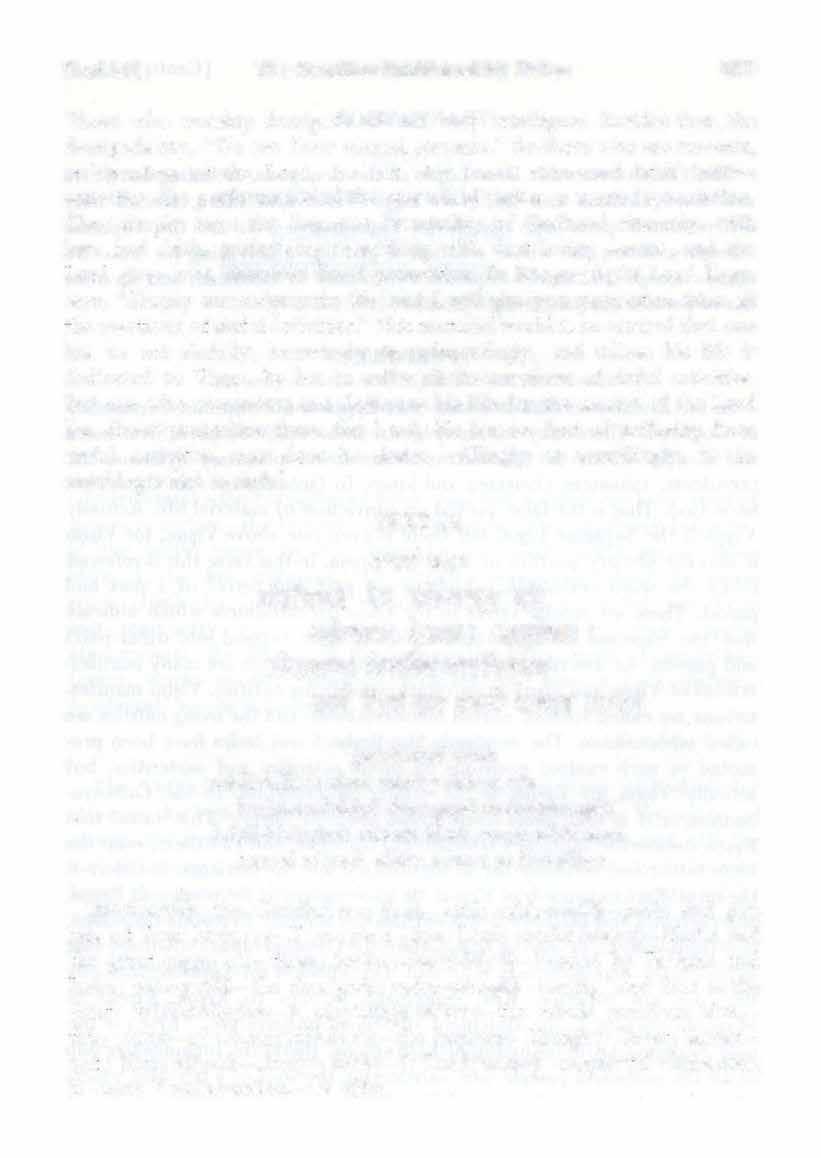
Text 43] The Sacrifice Performed by Dalqa 257
�
TEXT43 ;rr'<lW �: ai�i�ll� � '4(\'dfl�
if4tA.-S(lQl a.qtlUII �•11: I � A1fl��R\'t"l
The Gandharvas said: Dear Lord, all the demigods, including Lord Siva and Lord Brahma and the great sages Marici and Indra, are all only differentiated parts and parcels of Your body. You are the Supreme Almighty Great; the whole creation is just like a plaything for You. We always accept You as the Supreme Personality of Godhead, and we offer our respectful obeisances unto You.
PURPORT
In the Brahma-sarhhitii it is said that J<r�I].a is the Supreme Personality of Godhead. There may be many gods, from Brahma, Lord Siva, lndra and Candra down to the rulers of the lower planetary systems, the presidents, ministers, chairmen and kings. In fact, anyone can think that he is God. That is the false, puffed up conviction of material life. Actually Vi�f}.U is the Supreme Lord, but there is even one above Vi�I].U, for Vi�f}.U is also the plenary portion of a part of J<r�I].a. In this verse this is referred to by the word amsiimsii[1, which means part and parcel of a part and parcel. There are similar verses in the Caitanya-caritiimrta which indicate that the Supreme Lord's parts and parcels again expand into other parts and parcels. As described in Srimad-Bhiigavatam, there are many manifestations of Vi�I].U and many manifestations of living entities. Vi�f}.U manifestations are called sviirhsa, partial manifestations, and the living entities are called vibhinnarhsa. The demigods like Brahma and lndra have been promoted to such exalted positions by pious activities and austerities, but actually Vi�f}.u, or J<r�I].a, is the master of everyone. In the Caitanyacaritiimrta it is said, ekale isvara krgw, iira saba bhrtya. This means that Kr�l).a alone is the Supreme Personality of Godhead, and all others, even the vi�ru-tattva and certainly the living entities, are His servitors. Baladeva is the immediate expansion of Kr�I].a. He also engages in the service of Kr�f}.a, and certainly the ordinary living entities are serving. Everyone is created, constitutionally, for serving Kr�I].a. Here the Gandharvas acknowledge that although the demigods may represent themselves as the Supreme, actually they are not supreme. Real supremacy belongs to J<r�I].a. KnTJ-aS tu bhagaviin svayam is the statement of Srimad-Bhiigavatam: "Kr�f}.a is the only Supreme Lord." Worship of Kr�f}.a alone, therefore, includes worship of all the parts and parcels, just as watering the root of a tree also waters all the branches, twigs, leaves and flowers.
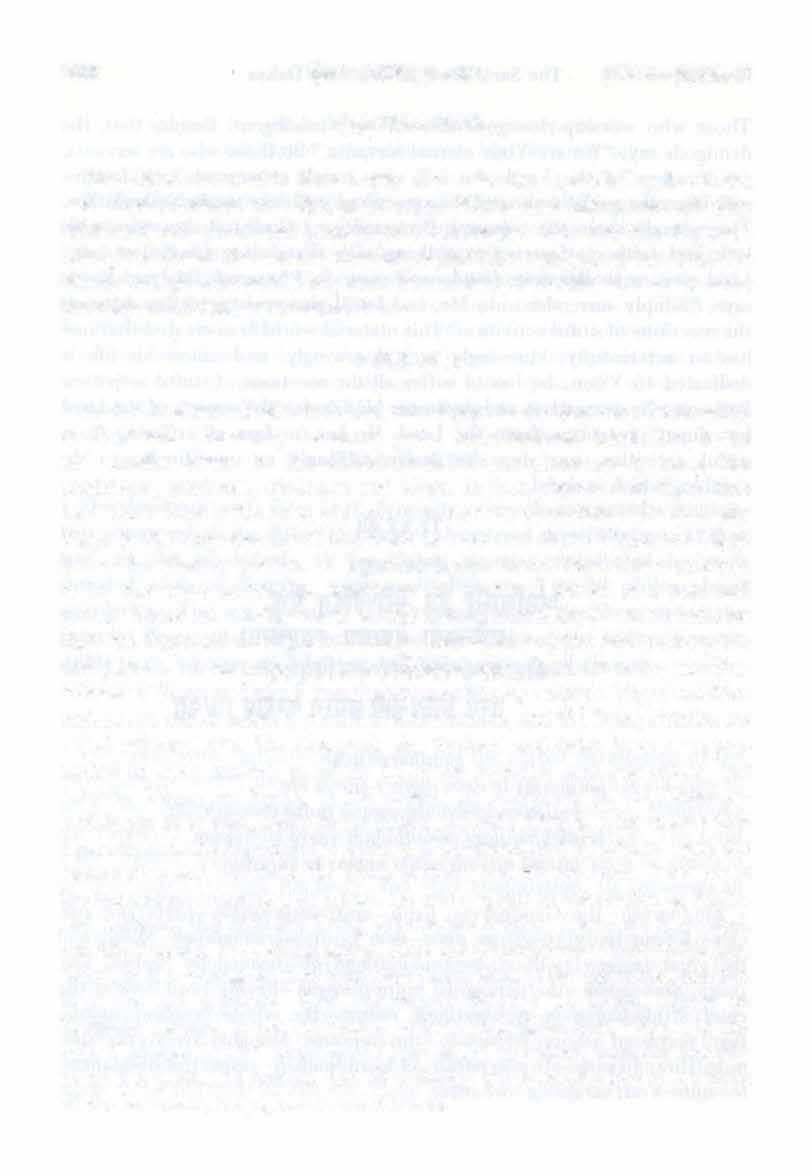
258 Srimad-Bhagavatam [Canto 4, Ch. 7
TRANSLATION
���sf�'{
�¥i4U&fl4Rr ��: ��: I ��«���« 3TR�
����31o�a:�4d,ll'd'JII
vidyadhara iicult
tvan-mayayiirtham abhipadya kalevare 'smin
krtvii mamaham iti durmatir utpathai[l. svai[l. k§ipto 'py asad-Vi§aya-lalasa atma-moham yufimat-kathamrta-nifievaka ud vyudasyet

vidyiidharal;t-the Vidyiidharas; iicu�t-said; tvat-miiyayii-by Yourexternal potency; artham-the human body; abhipadya-afterobtaining; kalevarein the body; asrrtin-in this; krtva- h aving misidentified; mama-mine; aham-I; iti-thus; durmati{t-the ignorant per on; utpathai?t-by wrong roads; sva*-by one's own belongings; k§ipta�-distracted; api-even; asat-temporary; vi§aya-liilasa{t-having his happiness in sense objects; iitma-moham-the illusion of the body as the self; yu§mat- Your; kathiitopics; amrta-nectar; rti§eVaka!t- reJishing; ul-from a long distance; vyudasyet-can be delivered.
TRANSLATION
The Vidyadharas said: Dear Lord, this human form of body is for attaining the highest perfectional objective, but, impelled by Your external energy, the living entity misidentifies himself with his body and with the material energy, and, therefore, influenced by maya, he wants to become happy by material enjoyment. He is misled and is always attracted by temporary, illusory happiness. But Your transcendental activities are so powerful that if one engages in the hearing and chanting of such topics, he can be delivered from illusion.
PURPORT
The human form of life is called arthadam because the body can very nicely help the embodied soul to achieve the highest perfection. Prahlada Maharaja said that even though it is temporary, the body can give us the
Text 441 The
Performed by Da�a
Sacrifice
TEXT 44 fci�T'eTfT �'3: �ritlt(�lltf�
259
highest perfectional achievement. In the process of evolution from the lower to the higher grade of living, the human form of life is a greatboon. But maya is so strong that in spite of achieving this great boon of the human form of life, we are influenced by temporary material happiness, and we forget our goal of life. We are attracted by things which will cease to exist. The beginning of such attraction is the temporary body. In this horrible condition of life there is only one way of liberation-to engage in the activities of transcendental chanting and hearing of the holy name of the Supreme Lord: Hare Kr�r;ta, Hare Kr�r;ta, Kr�r:ta Kr�r;ta, Hare Hare/ Hare Rama, Hare Riima, Riima Riima, Hare Hare. The words yu�matkathiimrta-ni§evaka mean "those who engage in relishing the nectar of the topics of Your Lordship." There are two narrative books which especially concern the words andj!Ctivities of Kr�r;ta. Bhagavad-gitii is the instruction given by ��r;ta, and SrTmad-Bhiigavatam is the book containing topics exclusively about Kr�r:ta and His devotees. These two books are the special nectar of the words of Kr�r;ta. For those who engage in the preaching of these two Vedic literatures it is very easy to get out of the illusory conditional life imposed upon us by miiyii. The illusion is that the conditioned soul does not try to understand his spiritual identity.He is more interested in his external body, which is only a flash and which will be finished as soon as the timeis designated. The whole atmosphere will change when the living entity has totransmigrate from one body to another.Under the spell of miiyii, he will again be satisfied in a different atmosphere. This spell of miiyii is called iivaraf!iitmika-sakti because it is so strong that the living entity is satisfied in any abominable condition. Even if he is born as a worm living within the intestine or abdomen in the midst of urine and stool, still he is satisfied. This is the covering influence of mayii. But the human form of life is a chance to understand,and if one misses this opportunity, he is most unfortunate. The way to get out of illusory miiyii is to engage in the topics of Kw;ta. Lord Caitanya advocated a process whereby everyone may remain in his present position without change but simply hear from the proper authoritative sources about Kr�r;ta. Lord Caitanya advised everyone to spread the word of Kr�r;ta. He advised, "All of you become spiritual masters. Your duty is simply to talk to whomever you meet of Kr�r:ta or of the instructions given by Kr�r;ta." The International Society for Krishna Consciousness is operating for this purpose: we do not ask anyone to first change his position and then come to us; we invite everyone to come with us and simply chant Hare Kr�r;ta, Hare Kr�r;ta, Kr�r:ta Kr�r;ta, Hare Hare/ Hare Riima, Hare Riima, Riima Riima, Hare Hare,because we know that if one simply chants and hears thetopics

260 Srimad-Bhagavatam [Canto 4, Ch. 7
of Kr�Jja, one's life will change; he will see a new light, and his life will be successful.
TEXT45
�UfT �:
� ft 1FJT:
3ffrit;f � � � �: II�'-\11
brahmar-a ucuf!
tvam kratus tvam havis tvam hutasaf! svayam tvam hi mantraf! samid-darbha-patrari ca tvam sadasyartvijo dampati devata
agnihotram svadha soma ajyam pasuf!
brtihmarui{t- the briihmarws; U:cu�- said; tvam- You; kratufi - sacrifice; tvam- You; havif!- offering of clarified butter; tvam- You; huta-iisa[!- fire; svayam- personified; tvam- You; hi- for; mantra[l - the Vedic hymns; samit-darbha-piitriiri- the fuel, the kusa grass and the sacrificial pots; caand; tvam- You; sadasya- the members of the assembly; rtvija{t- the priests; dampati- the chief person of the sacrifice and his wife; devatiidemigods; agnihotram- sacred fire ceremony; svadha-the offering to the forefathers; soma[l - the soma plant; iijyam- the clarified butter; pasul].the sacrificial animal.
TRANSLATION
The brahma�as said: Dear Lord, You are sacrifice personified, You are the offering of clarified butter, You are the fire, You are the chanting of Vedic hymns by which the sacrifice is conducted, You are the fuel, You are the flame, You are the kusa grass, You are the sacrificial pots, You are the priests who perform the yajna, You are the demigods headed by Indra, and You are the sacrificial animal. Everything that is sacrificed is You or Your energy.
PURPORT
In this statement Lord Vi�I;m's all-pervasiveness is partially explained. It is said in the V41JU Puriira that as a fire situated in one place emanates its heat and illumination everywhere, so whatever we see within the material

Text45] The Sacrifice Performed by Da� 261
�������:�
�
��k����
:q I
or spiritual worlds is also nothing but a manifestation of different energies emanating from the Supreme Personality of Godhead. The briihmapas' statement is that Lord Vi�ryu is everything-the fire, the offering, the clarified butter, the utensils, the place of sacrifice and the kusa. He is everything. It is confirmed herein that the performance of sankirtanayajna in this age is as good as all other yajnas in all other ages. If one per· forms sahkirtana-yajna by chanting Hare Kr�rya, Hare Kr�rya, Kr�rya Kr�rya, Hare Hare/ Hare Rama, Hare Rama, Rama Rama, Hare Hare, there is no need to arrange elaborate paraphernalia for the prescribed sacrificial ceremonies recommended in the Vedas. In the chant of the holy names, Hare and Kr�v.a, Hare means the energy of Kr�v.a, and Krf!!W is the vin,u-tattva. Combined together they are everything. In this age, persons are harassed by the influence of Kali-yuga and cannot arrange for all the requisite paraphernalia for performing sacrifice as recommended in the Vedas. But if one simply chants Hare KHQa, it is to be understood that he is performing all kinds of yajna because there is nothing within our vision except Hare, the energy of Kr�rya, and Kr�rya. There is no difference between Kr�rya and His energies. Thus since everything is a manifestation of His energy, it is to be understood that everything is Kr�Qa. One simply has to accept everything in Kr�Qa consciousness, and he is a liberated person. He should not misunderstand that because everything is Kr�Qa, Kr�Qa has no personal identity. Kr�Qa is so full that in spite of keeping Himself separate from everything by His energy, He is everything. This is confirmed in Bhagavad-g itii, Ninth Chapter. He is spread throughout the creation as everything, but still He is not everything. The philosophy recommended by Lord Caitanya is that He is simultaneously one and different.



tvam pura gam rasaya maha-sukaro darh§{raya paqminTrh vara[!,endro yatha stuyamiino nadallilayii yogibhir vyujjahartha trayTgiitra yajiia-kratu�
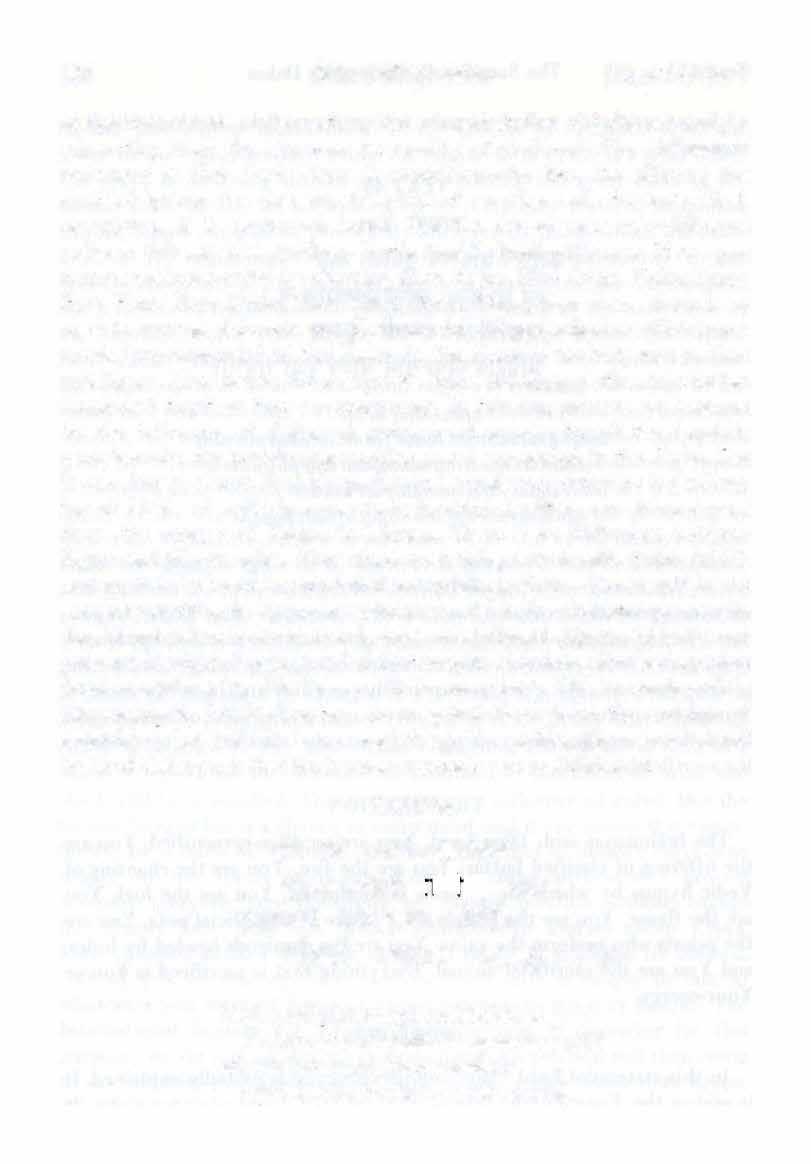
262 Srimad-Bhagavatam [Canto 4, Ch_ 7
�� � m �tn 't6:1��il �Wll qf�'l ..jl � I �tt'tl�' ��� mfimr�� srfi�JN ttij�: II�G.II
TEXT 46
tvam- You; pura- in the p ast; gam-the earth ;. rasaya{L-from within the water; maha-siikara{t-the great boar incarnaLion; darrt§trayii-with Y our tusk ; padminim-a lotus; vrirarendra{t-an e lephant; yalha-as; sliiyamalw{r-being offered prayers; nadan-vibrating; lilaya-very easily; yogibh*by great sages like Sanaka, etc.; vyujjahartha-picked up; lrayigatra-0 personified Vedic knowle dge; yajiia-kratu{l.-havin g the form of sacri fice.
TRANSLATION
Dear Lord, 0 personified Vedic knowledge, in the past millennium, long, long ago, when You appeared as the great boar incarnation, You picked up the world from the water as an elephant picks up a lotus flower from a lake. When You vibrated transcendental sound in that gigantic boar form, it was accepted as a sacrificial hymn, and great sages like Sanaka meditated upon it and offered prayers i"or Your glorification.
PURPORT
A significant word used in this verse is trayigiitra, which mean s that the transcendental form of the Lord is the Vedas. Anyone who engages in the worship of the Deity, or the form of the Lord in the temple, is understood to be studying all the Vedas twenty- four hours a day . S imply by decorating the Deities of the Lord, Radha and Kr��a, in the temple, one very minutely studies the injunctions of the Vedas. Even a neophyte devotee who simply engages in the worship of the Deity is understood to be in direct touch with the purport of Vedic know ledge . As confir med in Bhagavad-gitii, vedais ca sarvair aham eva vedya�: the purport of the Vedas is to understand Him, Kr�Qa. One who worships and serves Kr��a directly has understood the truths of the Vedas. TEXT47

Text47] The Sacrifice Performed by Da�a 263
� �� �+t�lf.fi+tlf.fil��i mij�� �+tR �� ;.rij�ij �Nm: � ;.rtf�� iPf: 11�\911 sa p rasTda lvam asmiikam iikiink�aliirh dar8anarh le paribhraHa-sat-karma�uim kirlyamiine nrbhir niimni yajlieSa le yajiiavighnii{l k§ayarh yiinti lasmai nama�
saft-that same person; prasida-be pleased;tvam-You;asmakam-upon us; akati k§atam-awaiting; darsanam-audience; te- Your; paribhrafi.tafallen down;sat-karma[liim-of whom the performance of sacrifice;kirtyamiine-being chanted;nrbhifl-bypersons; namni-Your holy name;yajnesa -0 Lord of sacrifice;te-Your;yajna-vighnafl-obstacles;k§ayam-destruction;yanti-attain;tasmai-unto You;namaft-respectful obeisances.



TRANSLATION
Dear Lord, we were awaiting Your audience because we have been unable to perform the yajiias according to the Vedic rituals. We pray unto You, therefore, to be pleasedwith us. Simplybychanting Your holy name, one can surpass all obstacles. We offer our respectful obeisances unto You in Your presence.
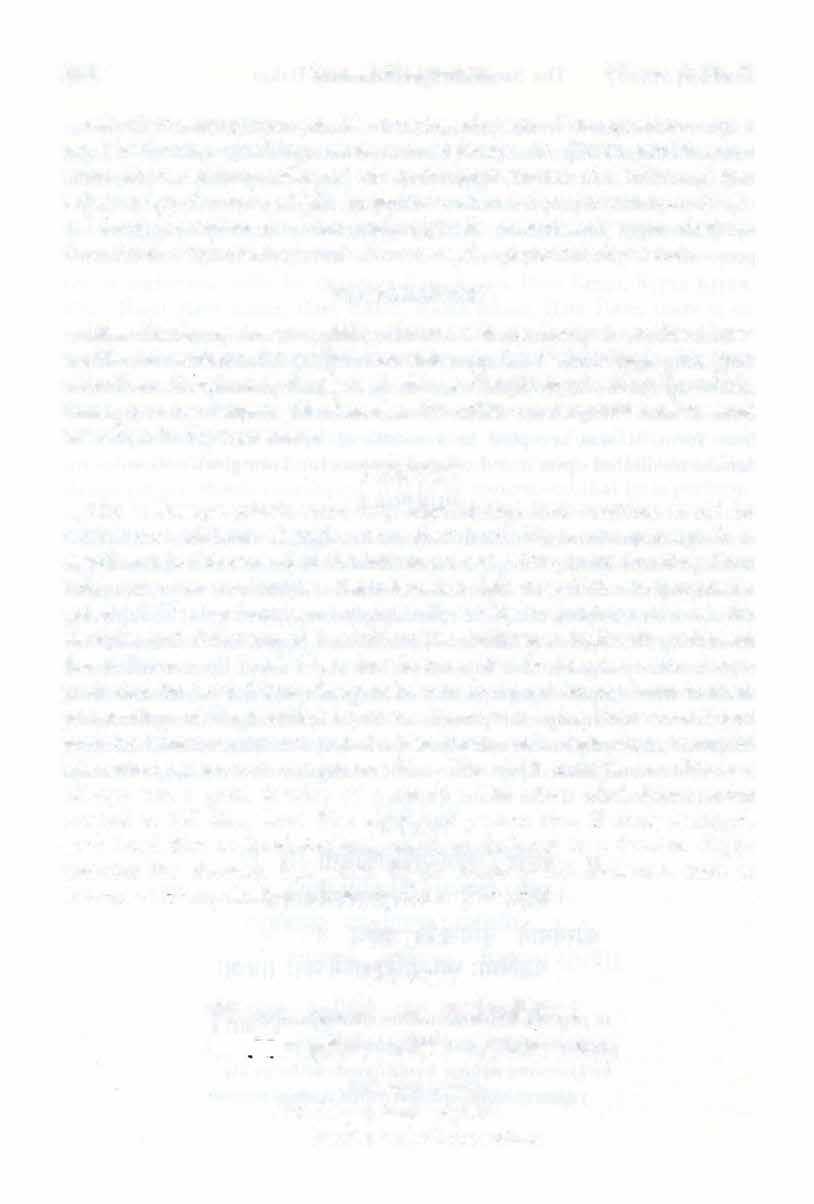
PURPORT
The briihma!la priests were very hopeful that their sacrifice would be carried out without obstacles now that Lord Vi�QU was present. It is significant in this versethat the briihma!las say, "Simply by chanting Your holy name we can surpass the obstacles, but now You are personally present." The performance of yajna by Dak�a was obstructed by the disciples and followers of Lord Siva. The briihma!las indirectly criticized the followers of Lord Siva, but because the briihma!las were always protected by Lord Vi�Qu, Siva's followers could not do any harm to their prosecution of the sacrificial process. There is a saying that when Kr�Qa protects someone, no one can do him harm, and when Kr�rya wants to kill someone, no one can protect him. The vivid example was Ravap.a. Ravap.a was a great devotee of Lord Siva, but when Lord Ramacandra wanted to kill him, Lord Siva could not protect him. If some demigod, even Lord Siva or Lord Brahma, wants to do harm to a devotee, Kr�I.la protects the devotee. But when Kf�rya wants to kill someone, such as RavaQa or HiraQyakasipu, no demigod can protect him.
264 Srimad-Bhagavatam [Canto4, Ch. 7
TEXT48 �� da' �: � � �fl{¥1�<14( I �4i:8 � �,,n,._ 11\l�ll maitreya uvaca iti dak§a/l kaviryapiarh bhadra rudriibhimarsitam
kTrtyamiine hriikese
sanninye yajiia-bhavane
maitreya�-Maitreya; uvaca- said; iti-thus; dak§a�-Dak�a; kav*- being purifiedinconsciousness;yajiiam-thesacrifice; bhadra-0 Vidura; rudraabhimarsitam- devastated by Virabhadra; kirtyamane-being glorified; hnikese-Hr�ikesa (Lord Vi�•:w); sanninye-arrangedfor restarting;yajiiabhavane- theprotector ofsacrifice.
TRANSLATION
Sri Maitreya said: After Lord Vi�QU was glorified by all present, Dak�a, his consciousness purified, arranged to begin again the yajfia which had been devastated by the followers of Lord Siva.
TEXT 49

����ri"+tl•t�,l � 'll11'f 30lti'� sfl�fiiUI � ������
bhagaviin svena bhagena sarviitmii sarva-bhagabhuk dak�arh babhii§a iibhii�ya pr"iyamiirw iviinagha
bhagavan- Lord Vi�I)U;svena-with Hisown; bhagena- withtheshare; sarva-atma- the Supersoul of all living entities; sarva-bhaga-bhuk- the enjoyer of the results of all sacrifices; dak§am-Dak�a ; babhii§e-sa.id; abha§ya-addressing;pnyamarw� - being satisfied; iva-as; anagha- 0sinless Vidura.
TRANSLATION
Maitreya continued: My dear sinless Vidura, Lord Vi�QU is actually the enjoyer of the results of all sacrifices. Still, because of His being the Supersoul of all living entities, He was satisfied simply with His share of the sacrificial offerings. He therefore addressed D�a in a pleasing attitude.
PURPORT
In Bhagavad-gitii it is said, bhoktiirarh yajiia-tapasiim: Lord VigJ.U, or Kr�f,la, is the supreme enjoyer of all the results of sacrifices, austerities and penances; in whatever one may engage, the ultimate goal is Vi�tJ.U. If he does not know that, a person is misled. As the Supreme Personality of
Text 49] The Sacrifice Performed by Dalqa
265
Godhead, Vi�ttu has nothing to demand from anyone. He is self-satisfied, self-sufficient, but He accepts the offerings of yajiia because of His friendly attitude toward all living entities. When His share of the sacrificial results was offered to Him, He appeared to be very pleased. It is said in Bhagavad-gita (9.26), patrarh pu§parh phalarh toyarh yo me bhaktyii prayacchati: if any devotee offers Him even a small leaf, or a flower or water, if it is done with love and affection, the Lord accepts it and is pleased. Although He is self-sufficient and does not need anything from anyone, He accepts such offerings because, as Supersoul, He has such a friendly attitude towards all living entities. Another point here is that He does not encroach upon another's share. In the yajiia there is a share for the demigods, Lord Siva and Lord Brahma, and a share for Lord Vi�ttu. He is satisfied with His own share and does not encroach upon others'. Indirectly, He indicated that He was not satisfied with Dak�a's trying to deny Lord Siva his share. Maitreya addressed Vidura as sinless because Vidura was a pure Vai�ttava and never committed any offense to any demigod. Although Vai�ttavas accept Lord Vi�ttu as the Supreme, they are not prone to �ffend demigods. They give them proper respect. Vai�ttavas accept Lord Siva as the best Vai�l)ava. For a Vai�nava there is no possibility of offending any demigods, and the demigods are also pleased with the Vai�ttava because they are faultless devotees of Lord Vi�ttu·
TEXT 50

q Q1 � �If �tRJ: �em{I
3U�Ja4il� � (<44tt1Ft4�10(: 11'-\oll
bhagaviin uviica
aham brahma ca sarvas ca jagata[l karapam param atmesvara upadra�ta
svayarh-drg avise}apap
bhagaviin-Lord Vi�l)u; uviica-said; aham-I; brahmii-Brahma ; ca-and; sarva�-Lord Siva; ca-and; jagata�-of the material manifestation; kiirarzam-cause; param-supreme; iitma-iSvara[l-the Supersoul;upadra§tii-the witness; svayam-drk-self-sufficient; avise§at]a�- there is no difference.

TRANSLATION
Lord Vi�ttu replied: Brahma, Lord Siva and I are the supreme cause of the material manifestation. I am the Supersoul, the self-sufficient witness.
266 Srimad-Bhagavatam [Canto 4, Ch. 7
But impersonally there is no difference between Brahma, Lord Siva and Myself.
PURPORT
Lord Brahma was born out of the transcendental body of Lord Vi§pu, and Lord Siva was born out of the body of Brahma. Lord Vi§pu is, therefore, the supreme cause. In the Vedas also it is stated that in the beginning there was only Vi§pu, Narayapa, but there was no Brahma or Siva. Similarly, Sankaracarya confirmed this: niiriiyapa[l para[l. Na.:ayapa, or Lord Vi§pu, is the origin, and Brahma and Siva are manifested after creation. Lord Vi�QU is also atmesvara, the Supersoul in everyone. Under His direction, ever thing is prompted from within. For example, in the beginning of the Srimad-Bhiigavatam it is stated, tene brahma hrdii: He first educated Lord Brahmafrom within.

In Bhagavad-gitii Lord l<f§r;ta states, aham iidir hi deviiniim: Lord Vi§pu, or l<fsr;ta, is the origin of all demigods, including Lord Brahma and Lord �iva. In another place in Bhagavad-gitii K!§r;ta states, aham sarvasya prabhava[l: "Everything is generated from Me." This includes all the demigods. Similarly, in the Vediinta-sutra: janmiidyasya yata[l. And in the Upani§ads is the statement, yato vii imani bhutiini jayante. Everything is generated from Lord Vi�Qu, everything is maintained by Him, and everything is annihilated by His energy. Therefore, by their actions and reactions, the energies which come from Him create the cosmic manifestations, and they also dissolve the whole creation. Thus the Lord is the cause and also the effect. Whatever effect we see is the interaction of His energy. And because the energy is generated from Him, He is both cause and effect. Simultaneously, everything is different and the same. It is said that everything is Brahman: sarvam khalv idam brahma. In the highest vision, nothing is beyond Brahman, and therefore Lord Brahma and Lord Siva are certainly nondifferent from Him.
TEXT 51

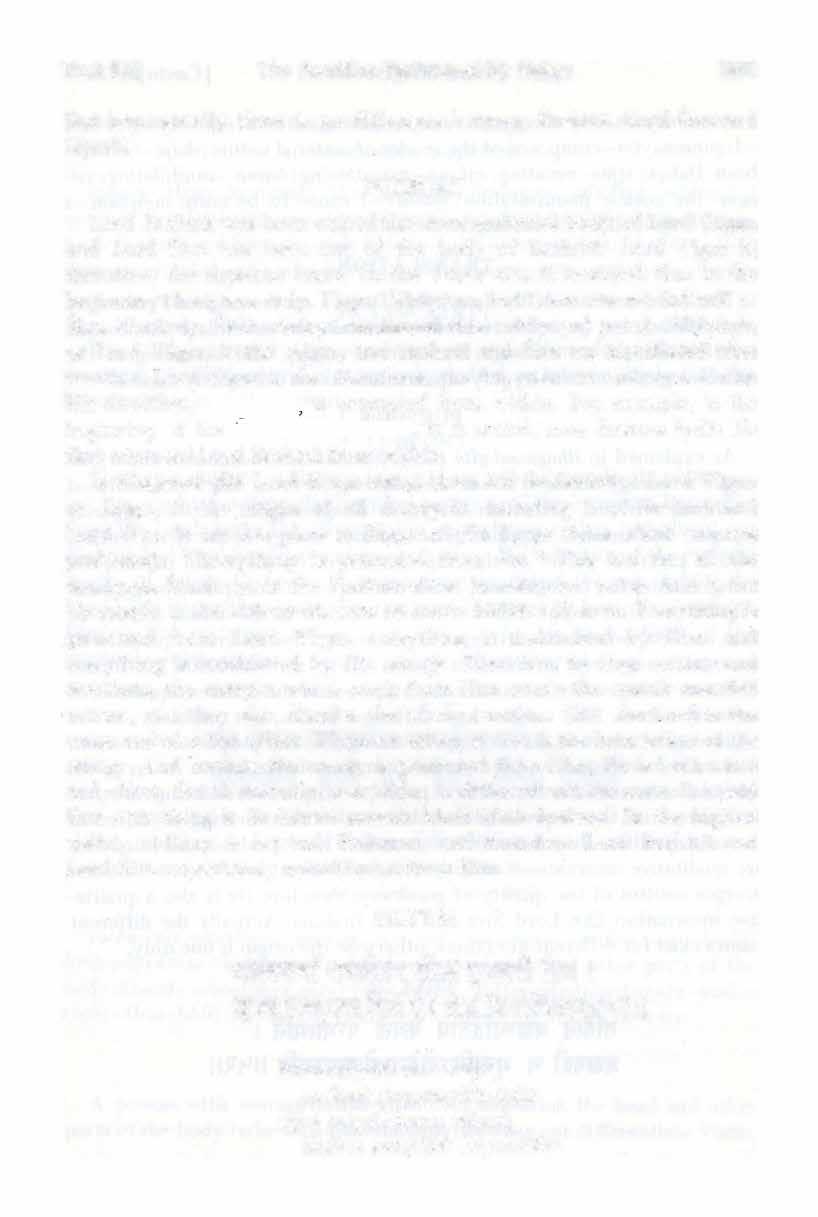
3ll€+1¥U�f�mstgoltttff� I
atma-miiyam samiivisya
so 'ham gurwmayim dvija
srjan rak�an haran visvarh
dadhre sarhjniirh kriyocit'iim
Text 51] The Sacrifice Performed by Da�a 267
�(111{11��11
��tt-lR����
iitma-miiyiim-My energy; samiivisya-having entered; saft - Myself ; aham - l ; gu(lamayim- composedof the modes ofmaterial nature; dvija-0 twiceborn Dak�a; srjan-creating; rak�an-maintaining; haran- annihilating; visvam-the cosmic manifestation; dadhre-I cause to be born; samjnii.m-a name; kriyii.-ucitii.m-according tothe activity.


TRANSLATION
The Lord continued: My dear Dalq;a Dvija, I am the original Personality of Godhead, but in order to create, maintain and annihilate this cosmic manifestation, I act through My material energy, and according to the different grades of activity, My representations are differently named.
PURPORT
As explained in Bhagavad-gitii (7.5), jiva-bhutiirh mahiibiiho: the whole world is energy released from the supreme source, the Personality of Godhead, who, it is further stated in Bhagavad-gitii, acts in superior energies and inferior energies. The superior energy is the living entity, who is part and parcel of the Supreme Lord. As parts and parcels, the living entities are not different from the Supreme Lord; the energy emanated from Him is not different from Him. But in the actual activity of this material world, the living entity is under the different qualities of material energy and in different forms. There are 8,400,000 life forms. The same living entity acts under the influence of the different qualities of material nature. The entities have different bodies, but originally, in the beginning of creation, Lord Vigm is alone. For the pur ose of creation, Brahma is manifested, and for annihilation there is Lord Siva. As far as the spiritual entrance into the material world is concerned, all beings are part and parcel of the Supreme Lord, but under the covering of different material qualities they have different names. Lord Brahma and Lord Siva are qualitative incarnations of Vi�J;�u, as gu(lii.vatii.ras, and Vi�J;�U with them accepts control of the quality of goodness; therefore He is also a qualitative incarnation like Lord Siva and Lord Brahma. Actually the different names exist for different directions, otherwise the origin is one only.
tasmin brahmap,y advifiye kevale paramii.tmani
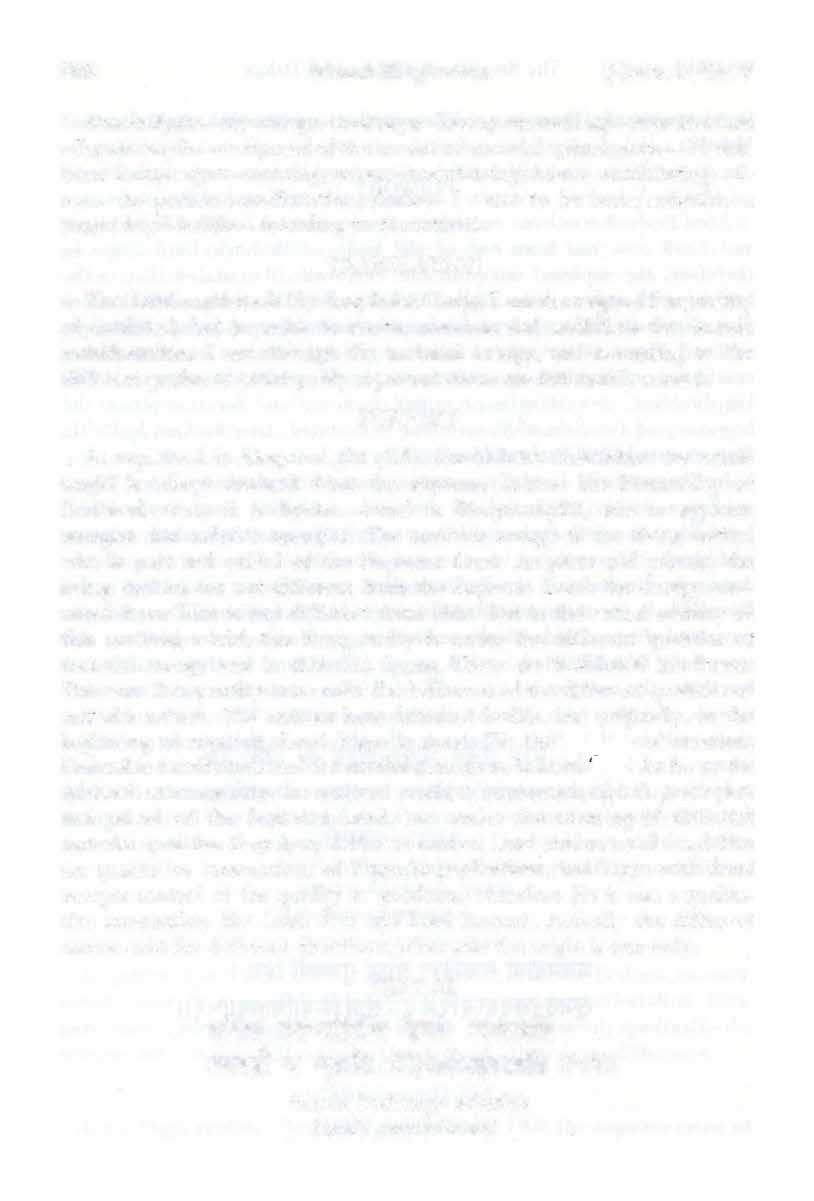
268 Srimad-Bhagavatam [Canto 4, Ch. 7
-illl�fitt�� q(¥U€¥4M
Jrm
il(;tlftS���Rt ����II
TEXT 52
I
� �
tasmin- H im; brahmari-the Supreme Brahman; advitiye- without a second; kevale-being one; paramatmani-the Supersoul; brahma-rudrauboth Brahma and Siva;ca-and; bhutani- the living entities;bhedena-with separation; ajiia{t- one who is not properly conversant; anupasyati- thinks.
TRANSLATION
The Lord continued: One who is not in proper knowledge thinks that demigods like Brahma and Siva are independent, or he even thinks that the living entities are independent.
PURPORT
The living entities, including Brahma, are not independently separated, but are counted within the marginal potency of the Supreme Lord. The Supreme Lord, being the Supersoul in every living entity, including Lord Brahma andLord Siva, is directing everyonein the activities of thematerial modes of nature. No one can act independently of the sanction of the Lord, and therefore, indirectly, no one is different from the Supreme Person, and certainly Brahma and Rudra, who are incarnations of the materialmodesof nature, passion and ignorance, are not.
TEXT 53

1NT�-N{:4lottl�1� I
4l('P4�r.t m � � �: 11'-\�11
yatha puman na svangefiU sira�-pa[ly-adifiU kvacit parakya-buddhirh kurute evarh bhutefiu mat-para�
yatha-as; puman-a person; na-not; sva-ahge§u-in his own body; .�ira{t-pii[!i-iidi§u-between the head and the hands and other parts of the body;kvacit-sometimes;piirakya-buddhim-differentiation;kurute-make; evarn-thus ; bhute§u-among living entities;mat-para!!-My devotee.
TRANSLATION
A person with average intelligence does not think the head and other parts of the body to be separate. Similarly, he does not differentiate Vi�f}u,
Text 53 J The Sacrifice Performed by Dak!j!a brahma-rudrau ca bhutani bhedenajiio ' nupasyati 269
the all-pervading Personality of Godhead, from any thing or any living entity.
PURPORT
Whenever there is disease in any part of the body, the whole body takes care of the ailing part. Similarly, a devotee's oneness is manifested in His compassion for all conditioned souls. Bhagavad-gitii says, par4itii� samadarsina�: those who are learned see everyone's conditional life equalJy (Bg. 5.18). Devotees are compassionate to every conditioned soul, and thereforethey are known as apiirakya-buddhi. Because devotees are learned and know that every living entity is part and parcel of the Supreme Lord, they preach Kr�va consciousness to everyone so that they may be happy. If a particular part of the body is diseased,the whole attention of the body goes to that part. Similarly, devotees care for any person who is forgetful of Kr�va and therefore in material consciousness. The equal vision of the devotee is that he works to get all living entities back home, back to Godhead.
TEXT 54
trayar-am eka-bhavanarh yo na pasyati vai bhidam
sarva-bhutatmanarh brahman sa siintim adhigacchati
trayar_�am-of the three; eka-bhav anam-having one nature; ya{t-who; na pasyati-does not see; vai-certainly; bhidam-separateness; sarva-bhiitaiitmaniim-of the Supersoul of all living entities; brahman-0 Dak�a; sa{the; santim- peace; adhigacchati- realizes.
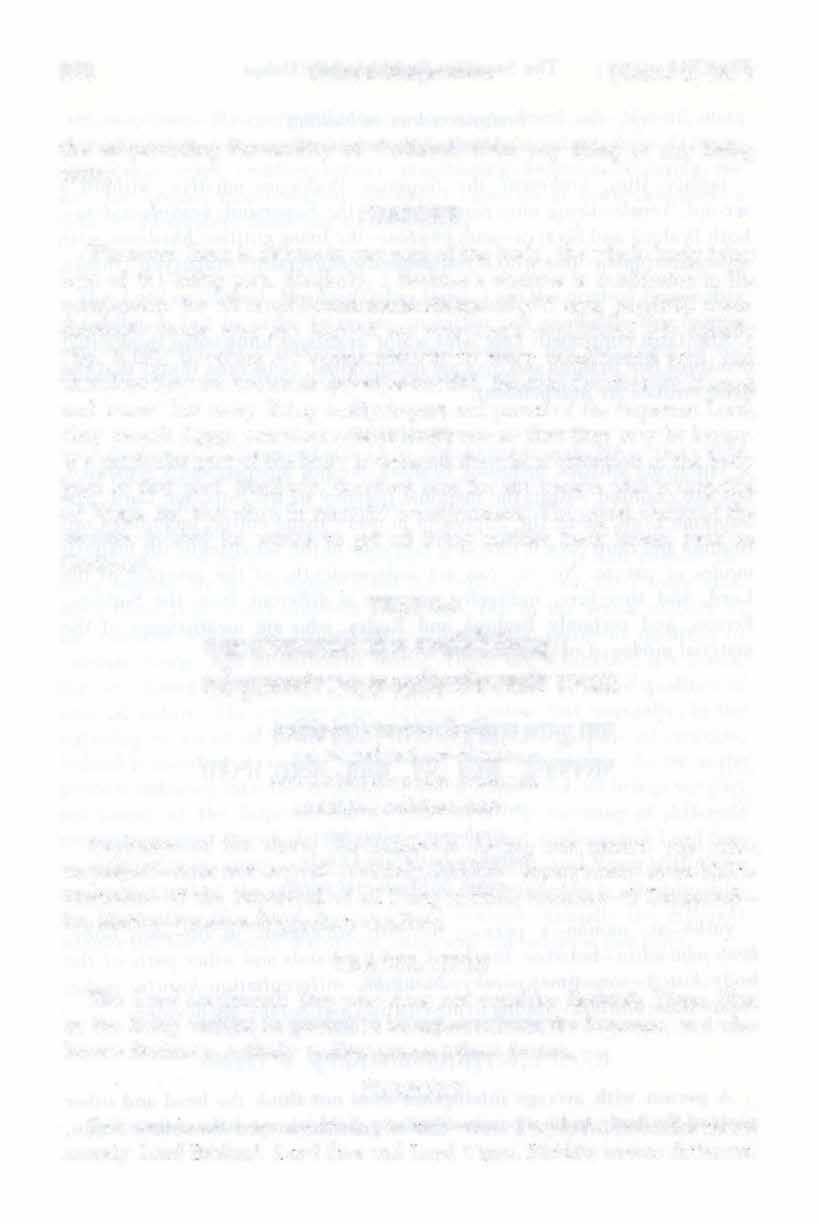
TRANSLATION
The Lord continued: One who does not consider Brahma, Vi�I].U, Siva or the living entities in general to be separate from the Supreme, and who knows Brahman, actually realizes peace; others do not.
PURPORT
Two words are very significant in this verse. Trayiir-iim indicates three, namely Lord Brahma, Lord Siva and Lord Vi�11u. Bhidam means different.
270 Srimad-Bhagavatam [Canto 4, Ch. 7
'I�UUII���WI'f��� I
��4(ijl�'1i�
� �Rr 11'-\�11
They are three, and therefore they are separate, but at the same time they are one. This is the philosophy of simultaneous oneness and difference, which is called acintya-bhediibheda-tattva. The example given in the Brahma-samhitii is that milk and yogurt are simultaneously one and different; both are milk, but the yogurt has become changed. In order to achieve real peace, one should see everything and every living entity, including Lord Brahma and Lord Siva, as nondifferent from the Supreme Personality of Godhead. No one is independent. Every one of us is an expansion of theSupreme Personality of Godhead. This accounts for unity in diversity. There are diverse manifestations, but, at the same time, they are one in Vi�QU. Everything is an expansion of Vi�Qu's energy.


TEXT 55
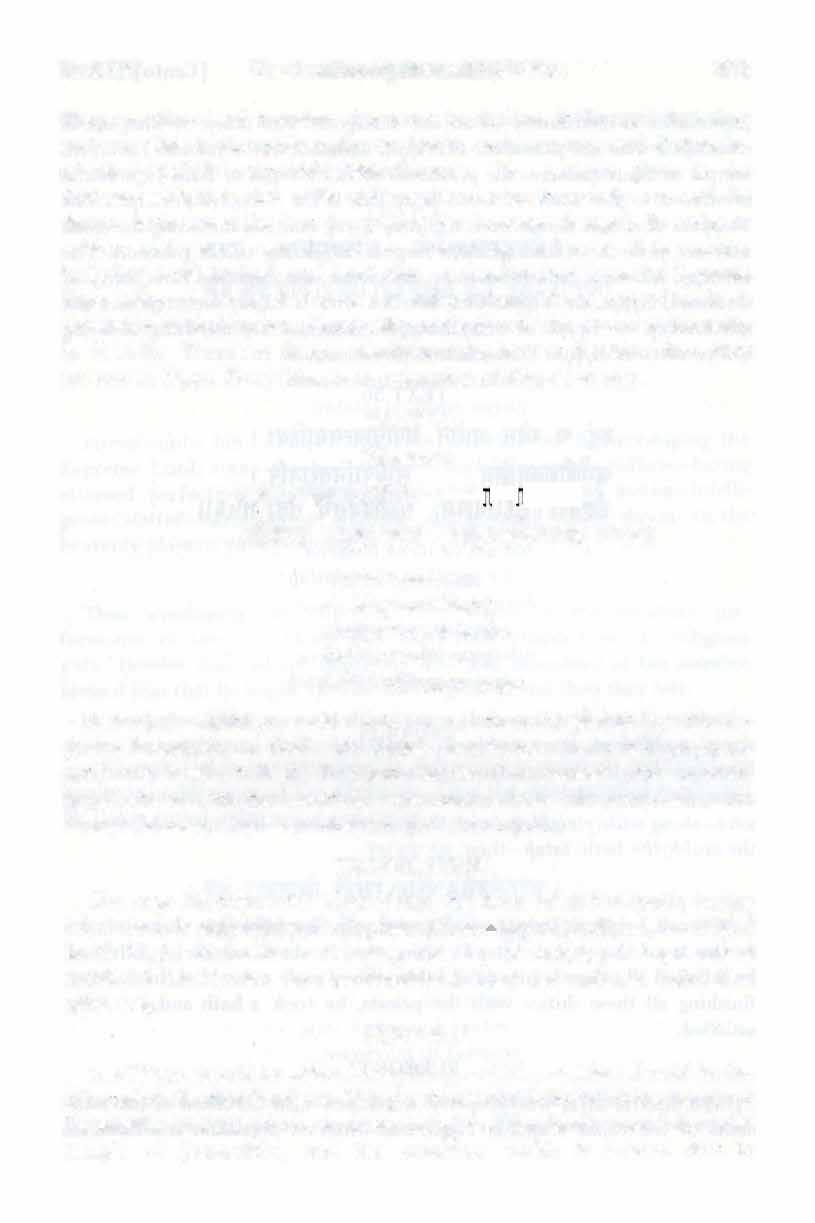
maitreya uviica evam bhagavatiidi�ta� prajiipati-patir harim arcitvii kratunii svena deviin ubhayato 'yajat
maitreya{l- Maitreya; u viica- said; evam- thus; bhagavatii- by the Supreme Personality of Godhead; adi�Ja�-having been instructed; prajiipatipati�- the head of aU the Prajapatis; harim-Hari; arcitvii-after worshiping; kmtunii-with the sacrificial ceremonies; svena-his own; deviin-the demigods; ubhaya t a�-separately ; ayajat- worshiped.

TRANSLATION
The sage Maitreya said: Thus D�a, the head of allPrajapatis, having been nicely instructedby theSupremePersonalityof Godhead, worshiped Lord Vi�QU, and after worshiping Him by performing the prescribed sacrificial ceremonies, he also worshiped Lord Brahma and Lord Siva separately.
PURPORT
LordVi��JU should be offered everything, andHis prasiidam should bedistributedto allotherdemigods.This practiceis stiU followedin thetempleof J agannatha at Puri. There are many temples of demigods around the main temple of Jagannatha, and the prasiidam which is offered first. to
Text 55] The Sacrifice Performedby Da�a 271
� lltf.RR
�����11'-\'-\11
m\RR
S�: I
Jagannatha is distributed to all the demigods. The deity of Bhagalin is worshiped with the prasiidam of Vi�QU, and also, in the famous Lord Siva temple of Bhuvanesvara, the prasiidam of Lord Vigm or Lord Jagannatha is offered to the deity of Lord Siva. This is the Vai�Qava principle. The Vai�Qava does not deride even ordinary living entities, including the small ant; everyone is offered proper respect according to his position. The offering, however, is in relation to the center, the Supreme Personality of Godhead, Kr�Qa, or Vi�I]U. The devotee who is highly elevated sees the relationship to Kr�Qa in everything; he does not see anything as being independent of Kr�J}.a. That is his vision of oneness.
TEXT 56
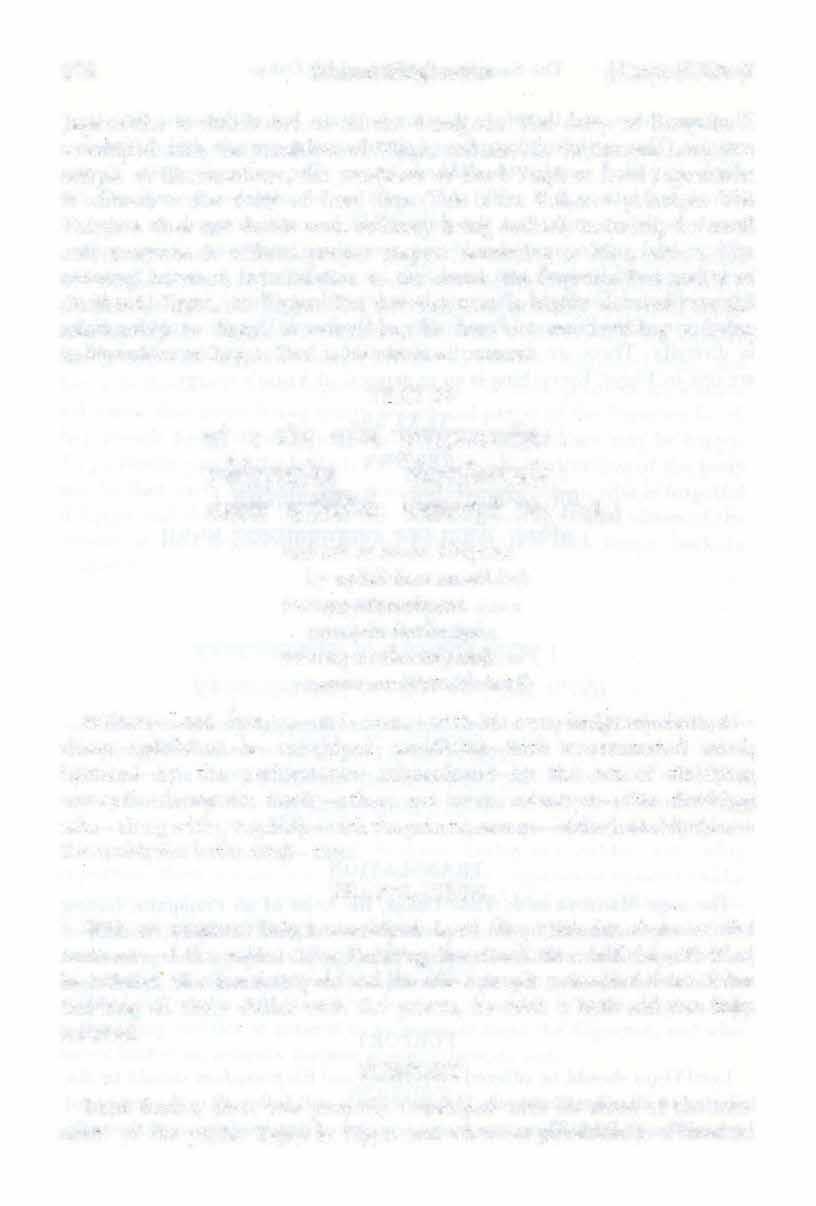
rudram ca svena bhiigena hy upiidhiivat samtihita[l karmarodavasiinena somapiin itariin api udavasya sahartvigbhi[l sasniiv avabhrtham tataft
rudram-Lord Siva; ca-and; svena-with his own; bhagena- sha re; hisince; upadhavat-he worshiped; samtihita{t-with concentrated mind; karmaiJti-by the performance; udavastinena-by the act of finishing; somaptin- demigods; itarlin-other; api- even; udavasya- after finishing; saha-along with;rtvigbhi{l-with thepriests;sasnau-bathed; avabhrthamthe avabhrtha bath;tata� - then.
TRANSLATION
With all respect, Da�a worshiped Lord Siva with his share of the remnants of the yajiia. After finishing the ritualistic sacrificial activities, he satisfied all other demigods and the other people assembled there. After finishing all these duties with the priests, he took a bath and was fully satisfied.
PURPORT
Lord Rudra, Siva, was properly worshiped with his share of the remnants of the yajiia. Yajiia is Vi�J}.U, and whatever prasiidam is offered to
272 Srimad-Bhagavatam [Canto 4, Ch. 7
���� ��:1 ��ij� �f;f(Rlilfq I �� «d'��: ij�� �: 11��11
Vi\ll)U is offered to everyone, even to Lord Siva. Srldhara Svam'i also comments in this connection, svena bhiigena: the remnants of the yajiia are offered to all the demigods and others.
TEXT 57

� 31��¥11�'1 �iiUifUft(l� I
\1��cl� � fST�tdl����: 11'-\�11
tasmii apy anubhiivena svenaiviiviipta-riidhase dharma eva matirh dattva tridasas te divam yayu�
tasmai-unto him (Dak�a); api- even ; anubhavena-by worshiping the Supreme Lord; svena-by his own; eva-certainly; aviipta-riidhase-having attained perfection; dharme-in religion; eva-certainly; matim-intelli· gence; dattva-having given; tridasa{l-demigods ; te-those; divam-to the heavenly planels; yayu�- went.
TRANSLATION
Thus worshiping the Supreme Lord Vi�l}U by the ritualistic performance of sacrifice, Da�a was completely situated on the religious path. Besides that, all the demigods who had assembled at the sacrifice blessed him that he might increase his religiosity, and then theyleft.
PURPORT
Although Dak\la was considerably advanced in religious principles, he awaited the blessings of the demigods. Thus the great sacrifice conducted by Dak�a ended in harmony and peace.
TEXT 58
�f(�144on � m 'l�Wi4(( I
q �: �� il'11441fitRt � 11'-\�11
evarh diik�iiyap.i hitva sati purva-kalevaram jajne himavata� k�etre meniiyiim iti susruma
evam-thus; dak§ayari-the daughter of Dak�a; hitva-after giving up; sati-Sa ti; piirva-kalevaram-her former body; jajiie-was born; himavata{l-
Text 58) The Sacrifice Performedby Dakfa 273
of the Himalayas; k§etre-in the wife; menayam-in Mena; iti-thus; susruma-1 have heard.
TRANSLATION
Maitreya said: I have heard that, after giving up the body she had received from Da�a, Da�ayar;ti (his daughter) took her birth in the kingdom of the Himalayas and was born as the daughter of Mena. I heard this from authoritative sources.
PURPORT
Mena is also known as Menaka and is the wife of the king of the Himalayas.
TEXT 59
tam eva dayitarh bhuya avrnkte patim ambika ananya-bhavaika-gatirh sakt* supteva puruflam
tam-him (Lord Siva);eva-certainly;dayitam-beloved;bhiiya�-again; avrnkte-accepted;patim-as herhusband; ambika-Ambika or Sati; ananyabhava-without attachment for others; eka-gatim-the one goal; sakt*the feminine (marginal and external) energies;supta-lying dormant; ivaas; puru§am-the masculine (Lord Siva, as representative of the Supreme Lord).
TRANSLATION
Ambika [goddess Durga], who was known as Dak�yaQi [Sati], again accepted Lord Siva as her husband, just as different energies of the Supreme Personality of Godhead act during the course of a new creation.
PURPORT
Accordingtotheverse oftheVedic mantras, pariisya saktir vividhaiva sruyate: theSupremePersonality ofGodhead hasdifferentvarieties ofenergies. Sakti isfeminine,and the Lord is puru�a, masculine. It is the duty ofthefemale toserve under thesupreme puru�a. As statedin Bhagavad-g"itii, aJl living entities are marginal energieS of the Supreme Lord. It is the duty of all
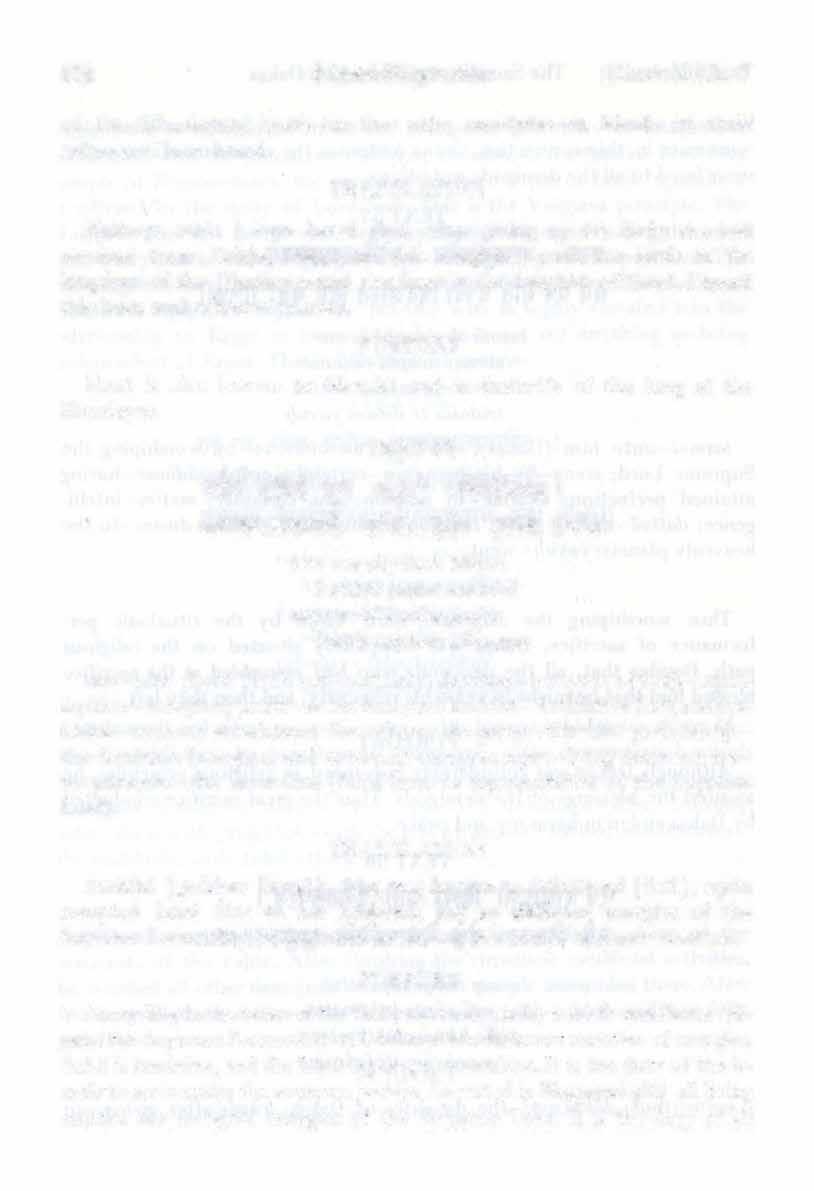
274 Srimad-Bhagavatam [Canto 4, Ch. 7
� ���'��
m � � 3l1ti qfet+�fi"4••1 31wtA4+n�� m: �
living entities to serve this Supreme Person. Durga is the representationin the material world of both the marginal and external energies, and Lord Siva is the representation ofthe Supreme Person. The connection ofLord Siva and Ambika, or Durga, is eternal. Sat! couldnot acceptanyhusband but Lord Siva. How Lord Siva remarried Durgii as Himavatl,thedaughter of the Himalayas, andhow Karttikeya was born, is agreatstoryinitself.
TEXT 60
'«t'A•I"�n �it:
etad bhagavata[l sambho[l
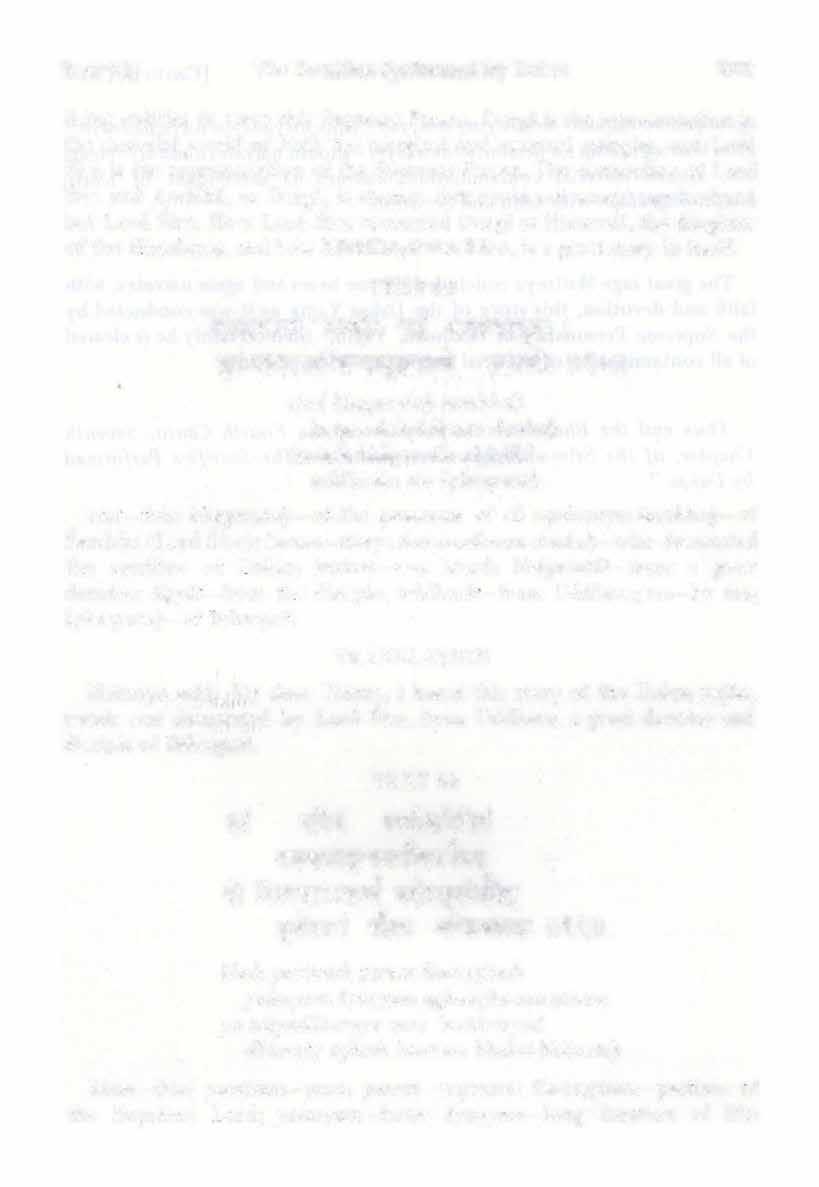
karma dak�iidhvara-druhalt srutarh bhagavatac chi�yad
uddhavan me brhaspate[l
etat- this; bhagavata[l- of the possessor of all opulences; sambhor-of Sambhu (Lord Siva); karma-story; dak�a-adhvara-druhalt-who devastated the sacrifice of Dak�a; srutam-was heard; bhiigavatiit-from a great devotee; si§yiit-from the disciple; uddhaviit-from Uddhava; me- by me; brhaspate[l-of Brhaspati.
TRANSLATION
Maitreya said: My dear Vidura, I heard this story of the Dalqla yajiia, which was devastated by Lord Siva, from Uddhava, a great devotee and disciple of Brhaspati.
TEXT 61
idam pavitrarh param isace.stitarh
yasasyam iiyu�yam aghaugha-mar§a�am
yo nityadiikarrzya naro 'nuk"irtayed
dhunoty agharh kaurava bhakti-bhavata[l
idam-this; pavitram-pure; param-supreme; isa-ce§Jitam-pastime of the Supreme Lord; yasasyam-famc; iiyu§yam-long duration of life;
Text 61) The Sacrifice Performed by Dak�a 275
d �'4q;(: 1
u
��aW-0"�•ro•·� �:��� o
>itA��s':i;�,. �11� m
� qft� q(lt't��mt
��+WHt:������
aghaugha-mar§ll[!am-destroying sins ;ya�-who; nityada-always; akarryaafter h earing ;naral;t-a pe rson ;anukirtayet- shoul d narrate; dhunoti-clears off; agham-material contamination; kaurava-0 descendant of Kuru; b hakti-bhiivata�- with faith and devotion.
TRANSLATION
The great sage Maitreya concluded: If one hears and again narrates, with faith and devotion, this story of the Dalqa Yajiia as it was conducted by the Supreme Personality of Godhead, Vi�tJ.U, then certainly he is cleared of all contamination of material existence, 0 son of Kuru.
Thus end the Bhaktivedanta purports of the Fourth Canto, Seventh Chapter, of the Srimad-Bhagavatam, entitled "The Sacrifice Performed by Dak�a ."

276 Srimad- Bhagavatam [Canto 4, Ch. 7
CHAPTER EIGHT
Dhruva Maharaia Leaves Home for the Forest
TEXT I

maitreya uviica
sanakiidyii niiradas ca rbhur hariuo 'ruflir yat*
naite grhiin brahma-sutii hy iivasann urdhva-retasaft
maitreyaft uviica-Maitreya said;sanaka-iidyiift-those headed by Sanaka; niiradaft-Narada; ca-and; rbhuft-�bhu; hamsaft-Hamsa; aru11*-Arupi; yat*-Yati; na-not; ete-all these; grhiin-at home; brahma-sutiift-sons of Brahma; hi-certainly; iivasan-did live; urdhva-retasaft-unadulterated celibates.
TRANSLATION
The great sage Maitreya said: The four great Kumara sages headed by Sanaka, as well as Narada, �bhu, Hamsa, Arupi and Yati, all sons of Brahma, did not live at home, but became urdhva-reta or nai�thikabrahmacii.ris, unadulterated celibates.
PURPORT
The system of brahmacarya has been current since the birth of Brahma. A section of the population, especially male, did not marry at all. Instead of allowing their semina to be driven downwards, they used to lift the
��
��
Q�CfMU ��� SllQ��: I ·
� ilmWfl �Q��ij({: II� II
279
semina up to the brain. They are called urdhva-reta/:l, those who lift up. Semina is so important that if, by the yogic process, one can lift the semina up to the brain, he can perform wonderful work-one's memory is enabled to act very swiftly, and the duration of life is increased. Yogis can thus perform all kinds of austerity with steadiness and can he elevated to the highest perfectional stage, evento thespiritual world. Vivid examples of brahmaciiris who accepted this principle of life are the four sages Sanaka, Sanandana, Sanatana an� Sanat-kumara, as well as Narada and others.
Another significant phrase here is naite grhan hy iivasan, "they did not live at home." Grha means home as well as wife. In fact, home means wife; home does not mean a room or a house. One who lives with a wife lives at home, otherwise a sannyiisi or brahmacU.ri, even though he may live in a room or in a house, does not live at home. That they did not live at home means that they did not accept a wife, and so there was no question of their discharging semina. Semina is meant to he discharged when one has a home, a wife and the intention to beget children, otherwise there is no injunction for discharging semina. These principles were followed from the beginning of creation, and such brahmaciiris never created progeny. This narration deals with the descendants of Lord Brahma from Manu's daughter Prasiiti. Prasiiti's daughter was Dak�aya�i or Sati, in relation to whom the story of the Dak�a yaji'ia was narrated. Maitreya is now explaining about the progeny of the sons of Brahma. Out of the many sons of Brahma, the brahmacU.ri sons headed by Sanaka and Narada did not marry at all, and therefore there is no question of narrating the history of their descendants.
TEXT2 at:�:n'tn.:llilm�:zn� lWI'is�� �f :q ��I
3Rm � � PisiRt��s�: II � II
m."§iidharmasya bhiiryasid dambham miiyam ca satru-han asiita mithunam tat tu nirrtir jagrhe 'praja"{l
mnii- Mr�a; adharmasya-of Irreligion; bharya-wife; asit- was; dambham -Bluffing; mayii,n-Cheating; ca-and ; satru-han-0 slayer of enemies;

280 Srimad-Bhagavatam [Canto 4, Ch. 8
asuta-produced; mithunam-combination; tat-that; tu-but; nirrti�Nirrti; jagrhe-took ; apraja� - being childless.
TRANSLATION
Irreligion was also Brahma's son, and his wife's name was Falsity. From their combination, two demons named Dambha, or Bluffing, and Maya, or Cheating, were born, and they were taken by a demon named Nirrti, who had no children.
PURPORT
It is understood herein that Adharma, Irreligion, was also a son of Brahma, and he married his sister Mr�a. This is the beginning of sex life between brother and sister. This unnatural combination ofsex life can be possible in human society only where there is Adharma, Irreligion. It is understood that in the beginning of creation Brahma created not only saintly sons like Sanaka, Sanatana and Narada but also demonic offspring like Nirrti, Adharma, Dambha and Falsity. Everything was created by Brahma in the beginning. Regarding Narada, it is understood that because his previous life was very pious and his association was very good, he was therefore born as Narada. Others were also born in their own capacities, according to their backgrounds. The law of karma continues birth after birth, and when there is a newcreation, the same karma comes back with the livingentities. Theyare born in different capacities according to karma even though their father is originally Brahma, who is the exalted qualitative incarnation of the Supreme Personality of Godhead.
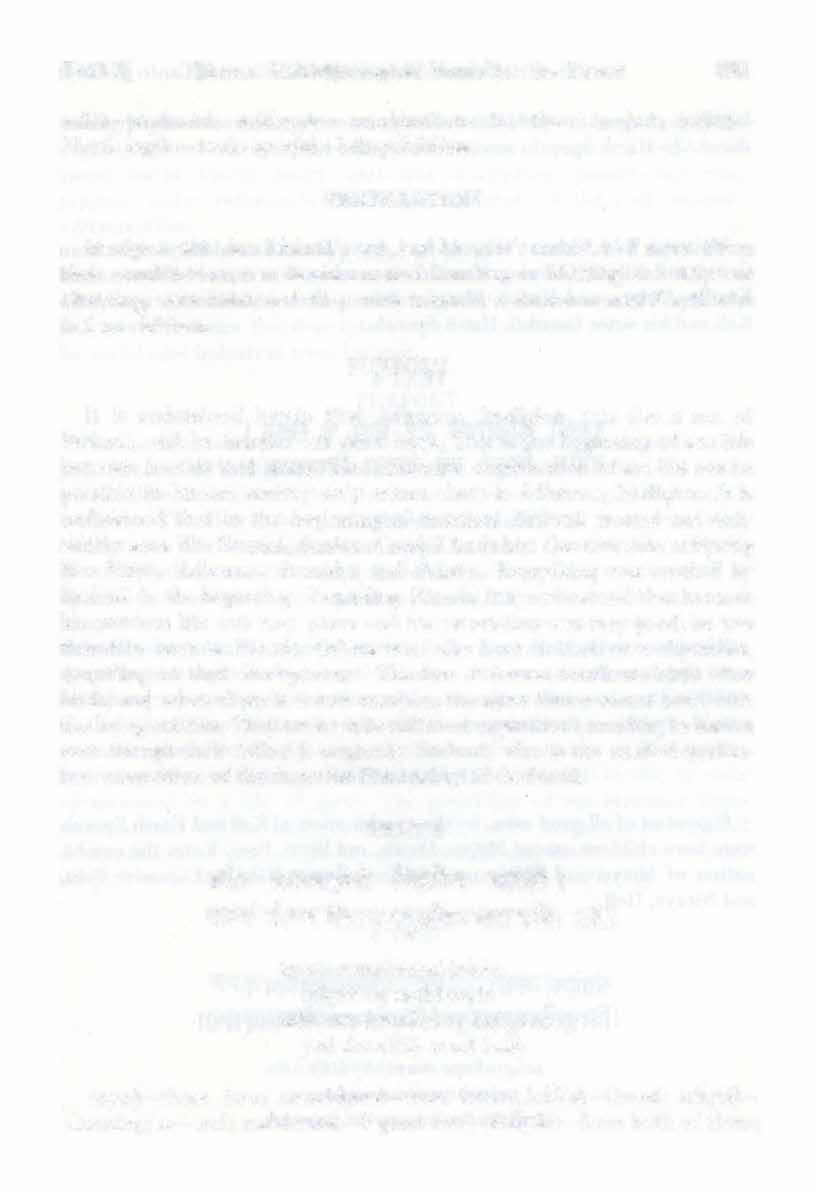
TEXT3
�: �'f€4�� �� � I
�ifiN�tm � tt�(iRti:�m: �����
tayo� samabhaval lobho
nikrtis ca mahii-mate
tiibhyiim krodhas ca himsii ca yad durukt* svasii kal*
tayo�-those two; samabhavat-were born; lobha�-Greed; nikrti�Cunning; ca - and; mahii-mate-0 great soul; tiibhyiim-from both of them;
Text3] Dhruva Ma haraja Leaves Home for the Forest 281
krodha{l-Anger;ca-and;hiriua-Envy;ca-and;yat-frombothofwhom; durukti{l-HarshSpeech;svasa-sister;kali{l-Kali.
TRANSLATION
Maitreya told Vidura: 0 great soul, from Dambha and Maya were born Greed and Nilq-ti, Cunning. From their combination came children named Krodha, Anger, and Hiril.sa, Envy, and from their combination were born Kali and his sister Durukti, Harsh Speech.
TEXT4

duruktaukaliradhatta bhayammrtyumcasattama tayoscamithunamjajiie yatananimyastatha
duruktau-inDurukti;kali{l-Kali;tUih.1tta-produced;bhayam-Fearfulness;mrtyum-Death;ca-and;sattama-0greatestof all goodmen;tayo{l -ofthosetwo;ca-and;mithunam-bycombination;jajiie-wereproduced; yatana-ExcessivePain;nimya{l-Hell;tatha-aswell.
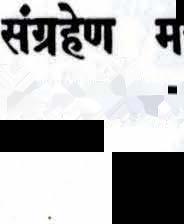
TRANSLATION
0 greatest of all good men, by the combination ofKali and Harsh Speech were born children named M,.tyu, Death, and Bhiti, Fear. From the combination of Mrtyu and Bhiti came children named Yatana, Excessive Pain, and Niraya, Hell.
TEXTS
� I
f,r:�e���¥419{�Al;fl�l€¥(;{1 �11�11
sangrahep.amayiikhyiita{l pratisargastaviinagha tri{lsrutvaitatpumanpupyam
vidhunotyatmanomalam
282 Srimad-Bhigavatam [Canto4, Ch. 8
� -�(1\if\1lPi � � � I �If � q � fZI('4t6141 II \l II
sahgrahecw-in summary; maya-by me; akhyatafl-is explained; pratisargafl-cause of devastation; tava-your; anagha-0 pure one; trifl-three times; srutva-having heard; etat-this description; puman-one who; pur-yam-piety; vidhunoti-washes off; atmanap-of the soul; malamcontamination.


TRANSLATION
My dear Vidura, I have summarily explained the causes of devastation, and one who hears this description three times attains piety and washes the sinful contamination from his soul.
PURPORT
The creation takes placeon the basis of goodness, but devastationtakes place because of irreligion. That is thewayof material creation and devastation. Here it is stated that the cause of devastation is Adharma, or Irreligion. The descendants of Irreligion and Falsity, born one after another, are Bluffing, Cheating, Greed, Cunning, Quarrel, Envy, Harsh Speech, Death, SeverePain and Hell. All these descendants are described as signs of devastation. If a person is pious and hears about these causes of devastation, he will feel hatred for all these, and that will cause his advancement in a life of piely. Pietyrefersto the cleansing processof the heart. As recommended by Lord Caitanya, onehas to cleanse the dust on the mirror of the mind, and then advancement on the path of liberation begins. Here also the same process is recommended. Malam means contamination. We should learn to despise all the causes of devastation, beginning from irreligion and cheating, and thenwe shall be able to make advancement in a life of piety. The possibility of our attaining Kf�r;ta consciousness will be easier, and we shall not be subjected to repeated devastation. The present life is repeated birth and death, but ifwe seek the path of liberation,we may be savedfrom repeatedsuffering.
TEXT6

athatafl kirtaye varitsarit pur.ya-kirtefl kuriidvaha
svayambhuvasyapi manor harer
aritsaritsa-janmanafl
Text6] Dhruva Maharaja Leaves Home for the Forest 283
3Pffif: � q �I ��1ft II � II
atha-now; ata�-hereafter; kirtaye-1 shall describe; vamsamdynasty; pu[lya-kirte�-celebrated for virtuous activities; kuru-udvaha-0 best of the Kurus; sviiyambhuvasya-of Svayambhuva; api- even; manoftof the Manu; hare�-of the Personality of Godhead; arhsa-plenary expansion; arhsa- part of;janmana�-born of.
TRANSLATION
Maitreya continued: 0 best of the Kuru dynasty, I shall now describe before you the descendants of Svayambhuva Manu, who was born of the part of the plenary expansion of the Supreme Personality of Godhead.
PURPORT
Lord Brahma is a powerful expansion of the Supreme Personality of Godhead. Although Brahma is jiva-tattva, he is empowered by the Lord, and therefore He is considered a plenary expansion of the Supreme Godhead. Sometimes it happens that when there is no suitable living being to he empowered to act as Brahma, the Supreme Lord Himself appears as Brahma. Brahma is the plenary expansion of the Supreme Personality of Godhead, and Svayambhuva Manu was the direct son of Brahma. The great sage Maitreya was now going to explain about the descendants of this Manu, all of whom are widely celebrated for their pious activities. Before speaking of these pious descendants, Maitreya had already described the descendants of impious activities, representing anger, envy, unpalatable speech, quarrel, fearfulness and death. Purposely, therefore, he is next relating the history of the life of Dhruva Maharaja, the most pious king within this universe.
TEXT 7

tsA�;m(t ��: wn 1 '0� � �aw:tf ��: mm II \9 II
priyavratottiinapiidau
satarnpii-pateft sutau
, viisudevasya kalayii
rak§iiyiirh jagata� sthitau
priyavrota-Priyavrata; uttiinapiidau- Uttanapada; satarnpii-pate�-of Queen Satarupa and her husband Manu; sutau-the two sons; viisudevasya
284 Srimad-Bhagavatam [Canto 4, Ch. 8
-of the Supreme Personality of Godhead; kalayii-by plenary expansion; rok�iiyiim- for the protection; jagata�-of the world; sthitau-for the maintenance.
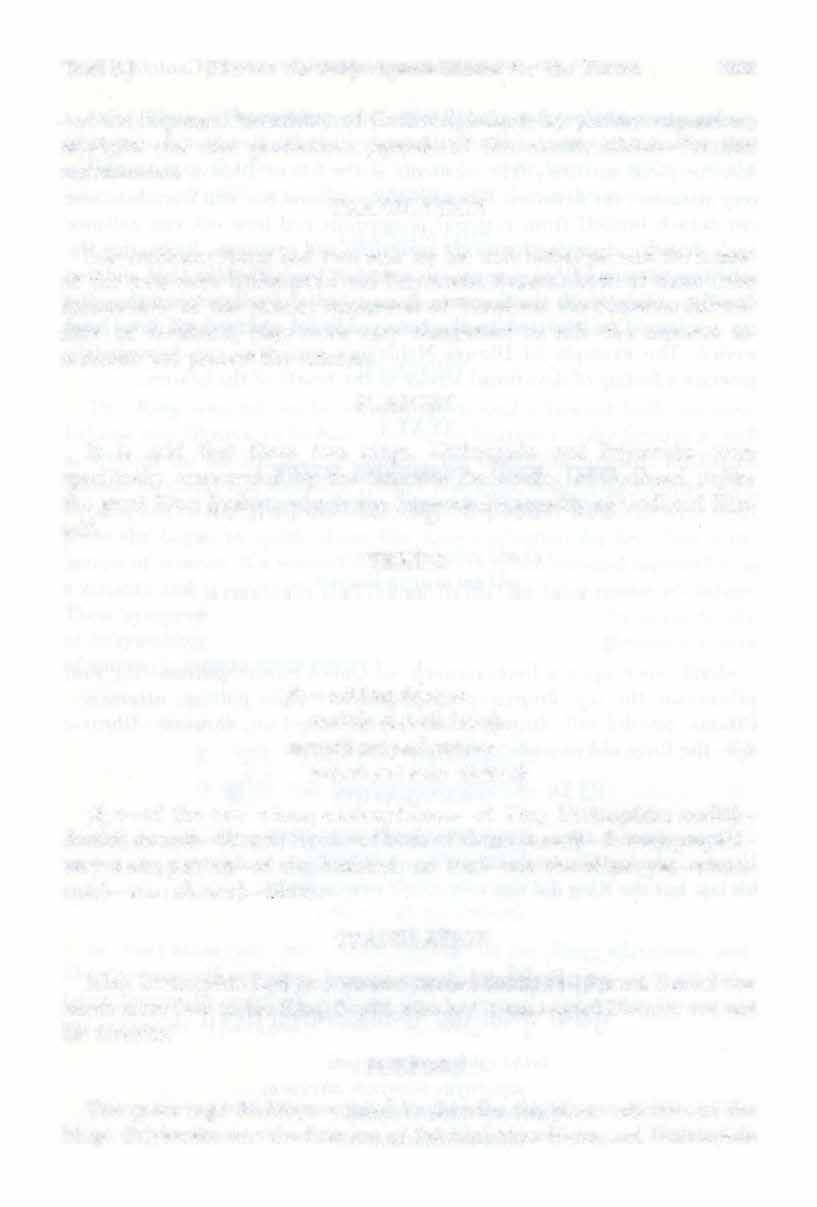
TRANSLATION
Svayambhuva Manu had two sons by his wife Satariipa, and thenames of the sons were Uttanapiida and Priyavrata. Because both of them were descendants of the plenary expansion of Vasudeva, the Supreme Personality of Godhead, they were very competent to rule the universe to maintain and protect the citizens.
PURPORT
It is said that these two kings, Uttanapada and Priyavrata, were specifically empowered by the Supreme Personality of Godhead, unlike the great King I,t�abha, who is the Supreme Personality of Godhead Him· self.
TEXTS
jiiye uttiinapiidasya
sunit* surucis tayo� suruc* preyasi patyur
netarii yat-suto dhruva�
jiiye-of the two wives; uttiinapiidasya-of King UWi.napiida; suniti�Suniti; suruc*-Suruci; tayo�-of both of them; suruci�-Suruci; p reyasivery dear; patyu�-of the husband; na itarii-not the other; yat-whose; suta�-son; dhruva�- Dhruva.
TRANSLATION

King Uttiinapli.da had two queens, named Suniti andSuruci.Suruci was much moredear to the King;Suniti,whohad a son named Dhruva, was not his favorite.
PURPORT
The great sage Maitreya wanted to describe the pious activities of the kings. Priyavrata was the first son ofSvayambhuva Manu, and Uttanapada
Text 8] Dhruva Maharaja Leaves Home for the Forest 285
was the second, but the great sage Maitreya immediately began to speak of Dhruva Maharaja, the son of Uttanapada, because he was very eager to describe pious activities. The incidents in the life of Dhruva Maharaja are very attractive for devotees. From his pious actions, one can learn how one can detach himself from material possessions and how one can enhance one's devotional service by severe austerities and penances. By hearing the activities of pious Dhruva, one can enhance one's faith in God and can directly connect with the Supreme Personality of Godhead, and thus one can very soon be elevated to the transcendental platform of devotional service. The example of Dhruva Maharaja's austerities can immediately generate a feeling of devotional service in the hearts of the hearers.
TEXT9
ekadii suruce� putram
ankam iiropya liilayan
uttamarh niiruruk§antarh



dhruvarh riijiibhyanandata
ekadii-once upon a time; suruce�-of Queen Suruci; putram-the son; ankam-on the lap; iiropya-placing; liilayan-while patting; uttamamUttama; na-did not; iiruruk§antam- trying to get on; dhruvam-Dhruva; rojii-the King; abhyanandata-welcome.
TRANSLATION
Once upon a time, King Uttanapada was patting the son of Suruci, Uttama, placing him on his lap. Dhruva Maharaja was also trying to get on his lap, but the King did not very much welcome him.
TEXT 10
(NT f:qct\4+t1Uiij(1q�l(ijwt4
�: � u�: ll�oil e
tathii cikir§amiirzarh tam
sapatnyiis tanayarh dhruvam
suruc* srrwato riijiia�
ser§yam iihiitigarvitii
286 Srimad-Bhagavatam [Canto 4, Ch. 8
\0\H.'S�� I m � tFf �������
� �: �'l+tt+n(tcq
tatha-thus; ciki'T}amapam-the child Dhruva, who was trying to get up; tam-unto him; sapatnya[l-of her co-wife (Suniti); tanayam-son; dhruvam -Dhruva; suruci[l-Queen Suruci; srpvata[l-while hearing; rajiia[l-of the King; seF}yam-with envy; aha-said; atigarvita-being too proud.
TRANSLATION
While the child, Dhruva Maharaj a, was trying to get on the lap of his father, Suruci, his stepmother, became very envious of the child, and with great pride she began to speak so as to be heard by the King himself.
PURPORT
The King was, of course, equally affectionate toward both his sons, Uttama and Dhruva, so he had a natural inclination to take Dhruva as well as Uttama on his lap. But because of his favoritism towards his Queen Suruci, he could not welcome Dhruva Maharaja, despite his feelings. King Uttiinapada's feeling was understood by Suruci, and therefore with great pride she began to speak about the King's affection for her. This is the nature of woman_ If a woman understands that her husband regards her as a favorite and is especially affectionate to her, she takes undue advantage. These symptoms are even visible in such an elevated society as the family of Svayambhuva Manu. Therefore it is concluded that the feminine nature of woman is present everywhere.
TEXT ll

WI � iq��uui 1fcU•Uiti'(t� I
WI� IPfl" MNffl iql�: II��II
na vatsa n.rpater dh�f1yam
bhavan arotjhum arhati
na grhito maya yat tvam
kuk§av api n.rpiitmaja[l
na-not; vatsa-my dear child; n.rpate[l-of the King; dh�pyam-seat; bhavan-yourself; arotjhum-to get on; arhati-deserve; na-not; grhita[ltaken; maya-by me; yat-because; tvam-yourself; kulc�au-in the womb; api-although; nrpa-atmaja[l-son of the King.
TRANSLATION
Queen Suruci told Dhruva Maharaja: My dear child, you do not deserve to sit on the throne or on the lap of the King. Surely you are also the son
Text 11) Dhruva Maharaja Leaves Home for the Forest 287
of the King, but becauseyou did not takeyour birthin my womb, youare not qualified to sit on your father ' s lap.
PURPORT
Queen Suruci very proudly informed Dhruva Maharaja that to be the King's son was not the qualification for sitting on the lap or on the throne of the King. Rather, this privilege was dependent on one's taking birth in the womb of Queen Suruci. In other words, she indirectly informed Dhruva Maharajathatalthough he happenedto be born of the King, he was nevertheless considered to be an illegitimate son because of his birth in the womb of the other queen.
TEXT 12

�sftf 'Rr'11�¥41'1¥4.-
biilo 'si bat a niitmiinam anya-stri-garbha-sambhrtam nunarh veda bhaviin yasya durlabhe'rthe mano-ratha�
bala� -child; asi- you are; bata-however; na-not; iitmanam-my own; anya- other; stri-woman; garbha-womb; sambhrtam-born by; nunamhowever; veda-just try to know; bhavan- yourself; yasya-of which; durlabhe-unapproachable; arthe-matter; mana�-ratha�-desirous.
TRANSLATION
Mydear child,youare unawarethatyou were not born of my womb but were born of another woman. Therefore you should know that your attempt is doomed to failure. You are trying to fulfill a desire which is impossible to be fulfilled.
PURPORT
The small child, Dhruva Maharaja, was naturally affectionate toward his father, and he did not know that there was a distinction between his two mothers. This distinction was pointed out by Queen Suruci, who informed
288 Srimad-Bhagavatam [Canto 4, Ch_ 8
;@ � �����: ������
� I
him that since hewas a child he did notunderstandthe distinction between the two queens. This is another statement of Queen Suruci's pride.
TEXT 13

tapasiiriidhya puru¥Jm tasyaiviinugrahepa me garbhe tvam siidhayiitmiinam yadicchasi n.rpiisanam
tapasa-by austerities; iiriidhya-having satisfied; puru§am-the Supreme Personality of Godhead; tasya-by His; eva-only; anugrahepa-by the mercy of; me - my ; garbhe-in the womb; tvam-you; sadhaya- place; atmanam-yourself ; yadi-if; icchasi-you desire; nrpa-iisanam-on the throne of the King.
TRANSLATION
If you at aU desire to rise to the throne of the King, then you have to undergo severe austerities. First of aU you must satisfy the Supreme Personality of Godhead, N araya!la, and then, when you are favored by Him because of such worship, you shall have to take your next birth in my womb.
PURPORT
Suruci was so envious of Dhruva Maharaja that she indirectly asked him to change his body. According to her, first of all he had to die, then take his next body in her womb, and only then would it be possible for Dhruva Maharaja to ascend the throne of his father.
Text 141 Dhruva Maharaja Leaves Home for the Forest 289
�� � 6�ii41i!ltul itI tN�6N�I�I;f�((l'14f«i't16;wl(IIt�II
TEXT 14 � .... InN� �: (1q�a: � �Rfi(if;(: � � <ocm �:1
ftm � firnt (1'5t'41'ii �" �: � �� II�'JII
maitreya uviica
miitu� sapatnyii� sa durukti-viddha�
svasan ru§ii dar!fa-hato yathiih*
hitvii mi§antam pitaram sanna-viicam
jagiima miitu�prarudan sakiisam
maitreya� uviica-the great sage Maitreya said;miitu�-of his mother; sapatnyii�-of the co-wife;sa�-he;durukti-harsh words;viddha�-being pierced by; svasan-breathing very heavily; ru�ii-out of anger; dar!fahata�-struckbya stick;yathii-asmuch as; ah*-a snake;hitvii-giving up; mi§antam-simply looking over;pitaram-his father; sanna-viicam-silently; jagiima-went;miitu�-to his mother;prarudan-weeping;sakiisam-near.
TRANSLATION
The sage Maitreya continued: My dear Vidura, as a snake, when struck by a stick, breathes very heavily, so Dhruva Maharaja also, being struck by the strong words of his stepmother, began to breathe very heavily because of great anger. When he saw that his father was silent and did not protest, he immediately left the palace and went to his mother.
TEXT 15

tam ni�svasantam sphuritiidharo§tham sunitir utsahga uduhya biilam
nisamyatat-paura-mukhiin nitiintam sii vivyathe yad gaditam sapatnyii
tam-him;n*svasantam-heavily breathing; sphurita-trembling ; adhara
O§{ham-upper and lower lips; suniti�-Queen Suniti; utsahge-on her lap; uduhya-lifting; biilam-her son; nisamya- after hearing ; tat-paura-

290
Srimad-Bhagavatam
[Canto 4, Ch. 8
���
�
��ij
������
� f-1:�
ij;flf{t(itttf �a mt{, 1
ij�qi(Jl{ctlfl'lijlord m ft�
eq�•
mukhiit-from the mouths of other inhabitants; nitiintam-all descriptions; sii-she; vivyathe-became aggrieved; yat-that which; gaditam-spoken; sapatnyii-by her co-wife.


TRANSLATION
When Dhruva Maharaja reached his mother, his lips were trembling in anger, and he was crying very grievously. Queen Suniti immediately lifted her son onto her lap, while the palace residents who had heard all the harsh words of Suruci related everything in detail. Thus Suniti also became greatly aggrieved.
TEXT 16

sotsrjya dhairyam vilaliipa sokadiiviigninii diiva-lateva biilii viikyam sapatnyii� smarati sarojasriyii drsii bii§pa-kaliim uviiha
sii-she; utsrjya-giving up; dhairyam-patience; vilaliipa-lamented ; sokadiiva-agninii-by the fire of grief; diiva-latii iva-like burned leaves; biilii-the woman; viikyam-words; sapatnyii�-spoken by her co-wife; smarati-remember; saroja-sriyii-a face as beautiful as a lotus; drsii-by looking; bii�pa-kaliim-weeping; uviiha-said .
TRANSLATION
This incident was unbearable to Suniti's patience. She began to burn as if in a forest fire, and In her grief she became just like a burnt leaf and so lamented. As she remembered the words of her co-wife, her brightlotuslike face became filled with tears, and thus she spoke.
PURPORT
When a man is aggrieved, he feels exactly like a burnt leaf in a forest fire. Sunili's position was like that, and although her face was as beautiful
Text 16] Dhruva Maharaja Leaves Home for the Forest 291
�«f�q M �(.'Sc?H4 ��Rr.n �q �I qwf eq�n
emr� � II��II
�
as a lotus flower, it became dried up because of the burning fire caused by the harsh words of her co-wife.
TEXT 17

dirgharh svasanti vrjinasya piiram apasyati biilakam iiha biilii miimangalarh tiita pare�u marhsthii bhunkte jano yat para-du�khadas tat
dir;gham- heavy; svasanti-breathing; vrjinasya-of the danger; piiramlimitation; apasyati-without finding; biilakam-to her son; aha- said; biila -the lady; ma-let there not be; amangalam-ill fortune; tiita-my dear son; pare§u- unto others; marhsthii�-desire; bhunkte-suffered; jana�- person; yat-that which; para-du{tkhada{t-who is apt to inflict pain upon others; tat-that.


TRANSLATION
She aJso was breathing very heavily, and she did not know the factual remedy for the painful situation. Not finding any remedy, she said to her son, My dear son, don't wish for anything inauspicious for others. Anyone who inflicts pains upon others suffers himself from that pain.
TEXT
satyarh surucyabhihitarh bhaviin me yad durbhagayii udare grhita�
stanyena vrddhas ca vilajjate yarh
bhiiryeti vii vo!ihum i!las-patir miim
292 Sr'imad-Bhagavatam [Canto 4, Ch_ 8
�� 1{� ¥tl¥tte ffl!J � \ilitl � mi11RJ;�¥tt( illl� I �� ��:�11�\911
� ij� �� � �ltm � �:I ����� � �ftr �� II��II
18
satyam-truth; sumcya-by Queen Suruci; abhihitam- narrated; bhaviin -unto you; me-of me; yat- because; durbhagaya�-of the unfortunate; udare-inthe womb;grhita�-takenbirth; stanyena-fed by the breastmilk; vrddha� ca-grown up; vilajjate-becomes ashamed; yam-unto one; bharya -wife; iti - thus; va-or; voqhum-to accept; iqas -patil]. - the King; mamme.
TRANSLATION
Suniti said: My dear boy, whatever has been spoken by Suruci is so, because the King, your father, does not consider me his wife or even his maidservant. He feels ashamed to accept me, so it is a fact that you have taken birth in the womb of an unfortunate woman, and by being fed from her breast you have grown up.
TEXT 19
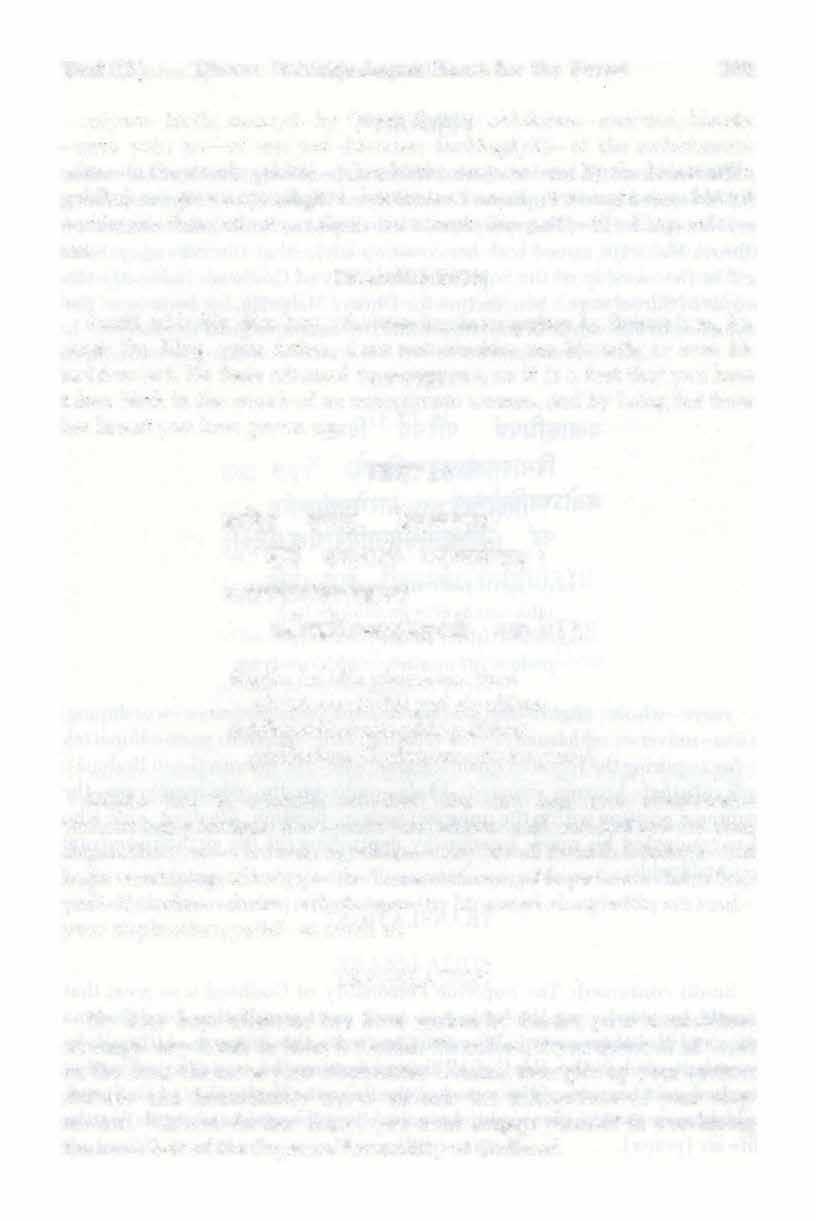
iiti�tha tat tata vimatsaras tvam uktarh samatrapi yad avyalikam iiriidhayiidhok�aja-piida-padmarh yadicchase'dhyiisanam uttamo yatha
ati�tha-just to execute; tat-that; tata-my dear son; vimatsara�without being envious; tvam-unto you; uktam-said; samiitrii api-by your stepmother; yat- wh atever; avyalikam- they are all factual; aradhaya-just beginworshiping; adhok�aja-the Transcendence; pada-padmam- lotusfeet; yadi-if; icchase-desire; adhyasanam-to be seated along with; uttama�your stepbrother; yatM-as much as.
TRANSLATION
My dear boy, whatever has been spoken by Suruci, your stepmother, although very harsh to hear, is factual. Therefore, if you desire at all to sit on the same throne as your stepbrother Uttama, then give up your envious attitude and immediately try to execute the instructions of your stepmother. Without further delay, you must engage yourself in worshiping the lotus feet of the Supreme Personality of Godhead.
Text 19] Dhruva Maharaja Leaves Home for the Forest 293
� mrrn ���i� �Uti'IIN ��ot�JI€ti'( I ��� ��S\:."tfm�
�'fr 11��11
PURPORT
The harsh words used by Suruci to her stepson were true because unless one is favored by the Supreme Personality of Godhead one cannot achieve any success in life. Man proposes, God disposes. Suniti, the mother of Dhruva Maharaja,agreed with her co-wife's advicethat Dhruva engage himself in the worship of the Supreme Personality of Godhead. Indirectly the words of Suruci were a benediction for Dhruva Maharaja, for because of the influence of the words of his stepmother, he became a great devotee.
TEXT 20
4�1emq1i tffi:;q� N'J... l*lgunf¥m):

�51Ts�f<te«�
� �m-��� II"< oil
yasyiihghri-padmarh paricarya visvavibhiivaniiyiitta-guriibhipattelz ajo'dhyat�that khalu piirame§thyarh padarh jitiitma-svasaniibhivandyam
yasya-whose; anghri-leg; padmam- lotus feet; paricarya- worshiping; viSva-universe; vibhiivaniiya-for creating; iitta-received; gura-abhipattefz -foracquiringtherequired qualifications; ajafz-theunborn (Lord Brahmii.); adhyat�that-bccame situated; khalu-undoubtedly; piirame§thyam-the supreme position withinthe universe; padam-position ; jita-iitma-one who has conquered his mind; svasana-by controlling the life air; abhivandyam -worshipable.


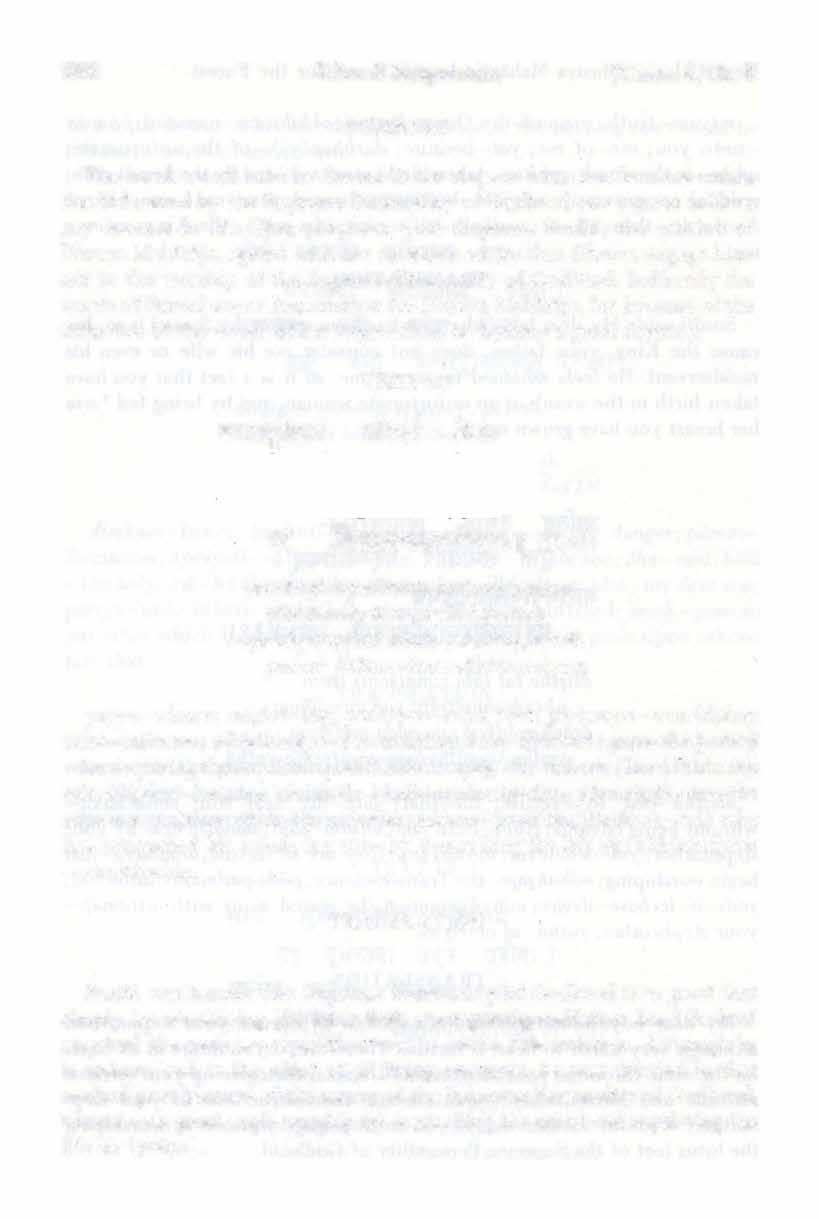
TRANSLATION
Suniti continued: The Supreme Personality of Godhead is so great that simply by worshiping His lotus feet, your great-grandfather Lord Brahmii. acquired the necessary qualifications to create this universe. Although he is unborn and is the chief of all living creatures, he was situated in that exalted post because of the mercy of the Supreme Personality of Godhead, whom even great yogis worship by controlling the mind and regulating the life air [prii.!J.a].
294 Srimad-Bhagavatam [Canto 4, Ch. 8
Suniti cited the example of Lord Brahma, who was Dhruva Maharaja's great-grandfather. Although Lord Brahma is also a living being, by his penance and austerity he acquired the exalted position of creator of this universe by the mercy of the Supreme Lord. To become successful in any attempt, one not only has to undergo severe penances and austerities, but also must be dependent on the mercy of the Supreme Personality of Godhead. This indication had been given to Dhruva Maharaja by his stepmother and was now confirmed by his own mother, Suniti.
TEXT 21

tathii manur vo bhagaviin pitii-maho yam eka-maty'ii puru-dak§iuair makha*
i§tviibhipede duraviipam anyato bhaumarh sukharh divyam athiipavargyam
tathii-si milarly; manuft-Svayambhuva Manu; vaft-your; bhagaviinworshipable; pitii-mahaft-grandfather;yam-unto whom; eka-matyii-with unflinching devotion; puru-great; dakfiirwift-charity; makhaift-by executingsacrifices ; ifi. tva-worshiping ; abhipede-achieved ; duravapam-difficult to achieve; anyataft-by any other means; bhaumam-material; sukham-happiness; divyam- celestial; atha-thereafter; apavargyam-li beration.
TRANSLATION
Suniti informed her son: Your grandfather, Svayambhuva Manu, executed great sacrifices with distribution of charity, and thereby, with unflinching faith and devotion, he worshiped and satisfied the Supreme Personality of Godhead. By acting in that way he achieved the greatest success in material happiness and afterwards achieved liberation, which is impossible to obtain by worshiping the demigods.
Text 21) Dhruva Maharaja Leaves Home for the Forest 295
PURPORT
��
�F{ f� tt�cti•w•u ���:
1 (itfilqa.
�«N'4;44ffl � ij� R\Ott'4"41q�''��''
The success of one's lifeis measured by one's material happinessin this life and liberation in the next. Such success can he achieved only by the grace of the Supreme Personality of Godhead. The words eka-matyii mean concentrating one's mind on the Lord without deviation. This process of undeviatingworship oftheSupremeLord is alsoexpressed in Bhagavad-gitii as ananya-bhiik. "That which is impossible to obtain from any other source" is also mentioned here. "Other source" refers to worship of the demigods. It is especially stressed here that the opulence of Manu was due to his undeviating faithfulness in the transcendental service of the Lord. One who diverts his mind to worshiping many demigods to obtain material happiness is considered to be bereft of intelligence. If anyone wants even material happiness, he can worship the Supreme Lord without deviation, and persons who are desirous of liberation can also worship the Supreme Lord and achieve their goal of life.
TEXT 22

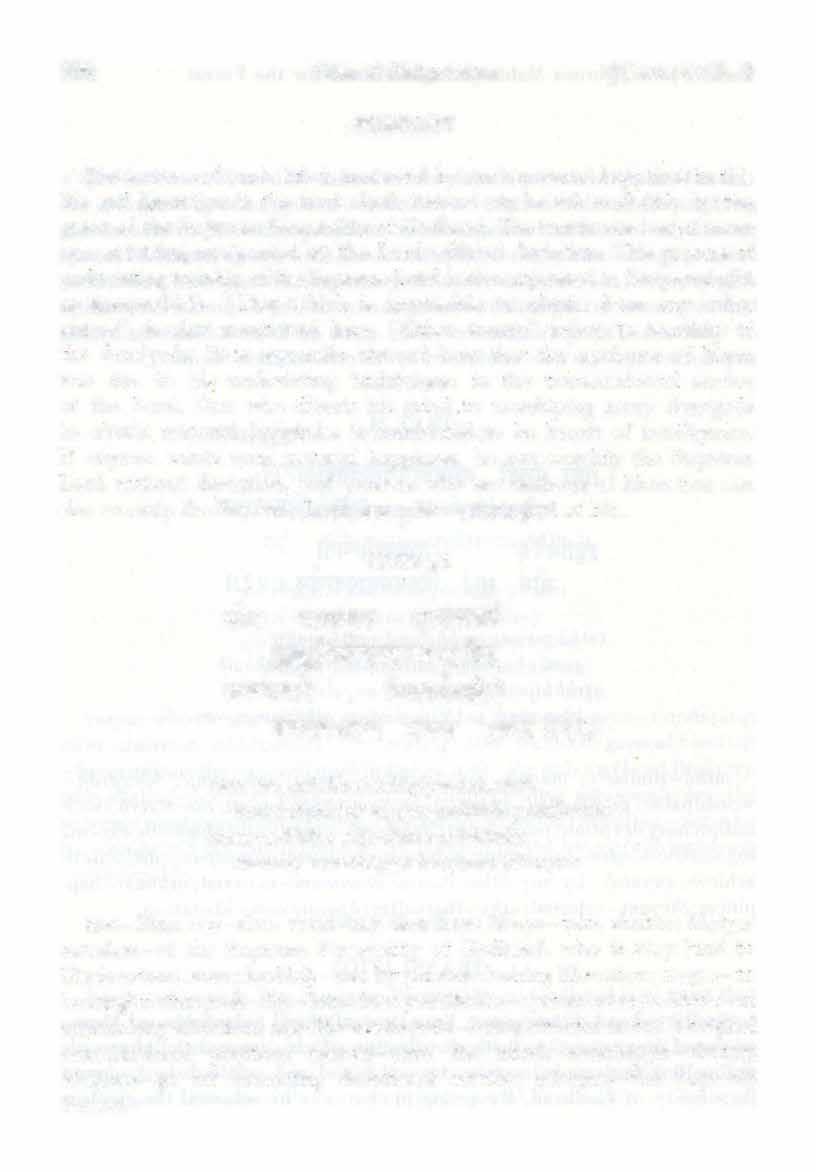
tam eva vatsiiSraya bhrtya-vatsalam
mumuk�ubhir m.rgya-padiibja-paddhatim
ananya-bhiive nija-dharma-bhiivite
manasy avasthiipya bhajasva puru�am
tam-Him; eva-also; vatsa-my dear boy; as'raya- take shelter; bhrtyavatsalam-of the Supreme Personality of Godhead, who is very kind to Hisdevotees; mumuk�ubhil)-also by personsdesiring liberation; mrgya-to besQughtafter; pada-abja-lotusfeet; paddhatim - system; ananya-bhiive-in unflinching situation; nija-dharma-bhiivite- being situated in one's original constitutional position; manasi-unto the mind; avasthiipya-placing; bhajasva-go on executing devotional service; puru�am- the Supreme Person.
296 Snmad-Bhigavatam [Canto 4, Ch. 8
PURPORT
• � ��qq�J aqfll��qqa\I�Cf{Rt¥( 31+44ata� ���¥�1H�
¥t'1�q�PI � �11��11
My dear boy, you also should take shelter of the Supreme Personality of Godhead, who is very kind to His devotees. Persons who are seeking liberation from the cycle of birth and death always take shelter of the lotus feet of the Lord in devotional service. Becoming purified by executing your allotted occupation, just situate the Supreme Personality of Godhead in your heart, and without deviating for a moment, engage always in His service.
PURPORT
The system of bhakti-yoga described by Queen Suniti to her son is the standard way of God realization. Everyone can continue in his constitutional occupational duties and at the same time keep the Supreme Personality of Godhead within his heart. This was also instructed by the Lord Himself to Arjuna in Bhagavad-gitii: "Go on fighting, but keep Me within your mind." That should be the motto of every honest person seeking perfection in Kr�t;�a consciousness. In this connection, Queen Suniti advised her son that the Supreme Personality of Godhead is known as bhrtya-vatsala, which indicates that He is very kind to His devotees. She said, "You came to me crying, having been insulted by your stepmother, but I am unable to do any good for you. But Kr�t;�a is so kind to His devotees that if you go to Him, then the combined kindness of millions of mothers like me would be surpassed by His affectionate and tender dealings. When everyone else fails to mitigate one's misery, Kr�t;�a is able to help the devotee." Queen Suniti also stressed that the process of approaching the Supreme Personality of Godhead is not easy, but is sought after by great sages who arevery advanced in spiritual realization. Queen Sunitialso indicated by her instruction that Dhruva Maharaja was only a small child, five years old, and it was not possible for him to purify himself by the way of karm.a-kiir-{la. But by the process of bhakti-yoga, even a childless than five years old, or anyone of any age, can be purified. That is the special significance of bhakti-yoga. Therefore she advised him not to accept worship of the demigods or any other process, but simply to take to the Supreme Personality of Godhead, and the result would be all perfection. As soon as one places the Supreme Personality of Godhead within one's heart, everything becomes easy and successful.

Text 22) Dhruva Maharaja Leaves Home for the Forest 297
TRANSLATION
TEXT 23


;n;ti mt: 1Ar���
tR'4�S(� 4141�tfft � I � � �(ij·li\dqil�l f�'� ftrap�IUUI�I������
niinyam tata[l padma-paliisa-locaniid du[lkha-cchidam te m.rgayiimi kaiicana yo m.rgyate hasta-ghita-padmayii sriyetarair anga vimrgyamiirwyii
na anyam-no others; tata[l-therefore; padma-paliisa-locaniit-from the lotus-eyed Supreme Personality of Godhead; du[lkha-chidam-one who can mitigate others' difficulties; te-your; m.rgayiimi-I am searching after; kaiicana-anyone else; ya[l-who; m _rgyate-searches; hasta-ghita-padmayii -taking a lotus flower in the hand; sriyii-the goddess of fortune; itarai[lby others; anga- my dear boy; vim.rgyamiipayii-one who is worshiped.
TRANSLATION
My dear Dhruva, as far as I am concerned, I do not find anyone who can mitigate your distressed condition but the Supreme Personality of Godhead, whose eyes are like lotus petals. Many demigods such as Lord Brahmii and others seek the pleasure of the goddess of fortune, but the goddess of fortune herself, with a lotus flower in her hand, is always ready to render service to the Supreme Lord.
PURPORT
Suniti pointed out herewith that the benediction received from the Supreme Personality of Godhead and that received from the demigods are not on an equal level. Foolish persons say that no matter whom one worships one will get the same result, but actually that is not a fact. In Bhagavad-gitii it is also said that benedictions received from the
298 Snmad-Bhagavatam
[Canto 4, Ch. 8
demigods are all temporary and are meant for the less intelligent. In other words, because the demigods are all materialistically conditioned souls, although they are situated in very exalted positions, their benedictions cannot be permanent. Permanent benediction is spiritual benediction, since a spirit soul is eternal. It is also said in Bhagavad-gitii that only persons who have lost their intelligence go to worship the demigods. Therefore Suniti told her son that he should not seek the mercy of the demigods, but should directly approach the Supreme Personality of Godhead to mitigate his misery.
Material opulences are controlled by the Supreme Personality of Godhead through His different potencies and specifically the goddess of fortune. Therefore, those who are after material opulences seek the pleasure or mercy of the goddess of fortune. Even the highly placed demigods worship the goddess of fortune, but the goddess of fortune, Mahii-Lak�mi herself, is always seeking the pleasure of the Supreme Personality of Godhead. Anyone, therefore, who takes to the worship of the Supreme Lord automatically receives the blessings of the goddess of fortune. At this stage of his life, Dhruva Maharaja was seeking material opulences, and his mother advised rightly that even for material opulences it is better to worship not the demigods but the Supreme Lord.
Although a pure devotee does not seek benedictions from the Supreme Lord for material advancement, still it is stated in Bhagavad-gitii that pious persons go to the Lord even for material benedictions. A person who goes to the Supreme Personality of Godhead for material gain is gradually purified in association with the Supreme Lord. Thus he becomes free from all material desires and is elevated to the platform of ' spiritual life. Unless one is raised to the spiritual platform it is not possible for him to completelytranscend all material contamination.

Suniti, the mother of Dhruva, was a farseeing woman, and therefore she advised her son to worship the Supreme Lord and no one else. The Lord is described herein as lotus-eyed (padma-paliisa-locanf'it). When a person is fatigued, if he sees a lotus flower all his fatigue can be immediately reduced to nil. Similarly, when an aggrieved person sees the lotus face of the Supreme Personality of Godhead, immediately all his grief is reduced. A lotus flower is also an insignia in the hands of Lord Vi�ttu as well as in the hand of the goddess of fortune. The worshipers of the goddess of fortune and Lord Vi�ttu together certainly are very opulent in all respects, even in material life. The Lord is sometimes described as siva-virii'ici-nutam, which means that Lord Siva and

Text 23) Dhruva Maharaja Leaves Home for the Forest 299
Lord Brahma also offer their respectful obeisances unto the lotus feet of the Supreme Personality of Godhead, Naraya!la.
TEXT 24

maitreya uviica evam saiijalpitam miitur iikarr-yiirthiigamam vaca� sanniyamyiitmaniitmiinam niscakriima pitu� puriit
maitreya{t uvaca- the great sage Mai t reya said ; evam-thus; saiijalpitamspoken together ; matuft-from the mother; akar[l ya- hearing; artha-agamam -purposeful; vaca{t-words; sanniyamya- controlling; iitmanii-by the mind; atmanarn-own self; niscakrama-got out; pituft-of t he father; puriit-from the house.
TRANSLATION
Thegreat sageMaitreya continued:The instruction of DhruvaMaharaja's mother, Suniti, was actually meant for fulfilling his desired objective. Therefore, after deliberate consideration and with intelligence and fixed determination, he left his father's house.
PURPORT
Both the mother and the son were lamenting Dhruva Maharaja's being insulted by his stepmother and his father's not having taken any step on this issue. But mere lamentation is useless-one should find out the means to mitigate one's lamentation. Thus both the mother and the son decided to take shelter of the lotus feet of the Lord because that is the only solution to all material problems. It is indicated in this connection
300 Srimad-Bhagavatam [Canto 4, Ch. 8
�� � �'Ri �U«(I4i"il�t•l4 ��: I �f.tt�+qi€44�1S�t;ff;{�fq"Q:�" � I
that Dhruva Maharaja left his father's capital city to go to a secluded place to search out the Supreme Personality of Godhead. It is the instruction of Prahlada Maharaja also that if oneis seeking peace ofmind he should free himself from all contamination of family life and take shelter of the Supreme Godhead by going to the forest. To the Gauflya Vaisnava this forest is the forest of Vrndli, or Vrndavana. If one takes sheit�r of Vrndavana under Vrndavane§vari, Srim�ti Radharap.i, certainly all the problems of his life are solved very easily.

TEXT 25
•n«(ij�� � � R-tlfif�H( I �
niiradas tad upiikar[!ya jiiiitvii tasya cikir�itam spntvii murdhany agha-ghnena piirinii priiha vismita�
niirada�-the great sage Narada; tat-that; upiikar[lya-overhearing; jii.iitvii-and knowing;tasya-his (Dhruva Maharaja's);cikir§itam-activities; spntvii-by touching; murdhani-on the head; agha-ghnena-which can drive awayallsinful activities;piirtinii-by the hand;priiha-said;vismita�being surprised.
TRANSLATION
The great sage Narada overheard this news, and understanding all the activities of Dhruva Maharaja, he was struck with wonder. Heapproached Dhruva, and touching his head with his all-virtuous hand, he spoke as follows.
PURPORT
When Dhruva Maharaja was talking with his mother, Suniti, of all the incidences that had taken place in the palace, Narada was not present.
Text 25) Dhruva Maharaja Leaves Home for the Forest 301
��s:p:.�;J 'flfor;n sm f�: ����II
Thus the question ll\ay be raised how Narada overheard all these topics. The answer is that Narada is tri-kiila-jiia; he is so powerful that he can understand the past, future and present of everyone's heart, just like the Supersoul, the Supreme Personality of Godhead. Therefore, after understanding the strong determination of Dhruva Maharaja, he came to help him. It may be explained in this way: The Supreme Personality of Godhead is present in everyone's heart, and as soon as He understandsthat a living entity is serious about entering devotional service, he sends His representative. In this way Narada was sent to Dhruva Maharaja. This is explained in the Caitanya-caritiimrta: guru-kmw-prasade paya bhakti-lata bija: By the grace of the spiritual master and Kr�t:Ja, one can enter into devotional service. Because of Dhruva Maharaja's determination, Kr�t:Ja, the Supersoul, immediately sent His representative, Narada, to initiate him.
TEXT 26

aho teja[l k�atriyii'(liim miina-bhangam amnyatiim biilo 'py ayam hrdii dhatte yat samiitur asad-vaca[l
aho-how surprising it is; teja[l -power; k�atriyii'(liim-of the k�atriyas; miina-bhangam-hurtin g the prestige;amr�yatiim-unable to tolerate; biila[l -onlyachild; api- although; ayam- this; hrdii- at heart; dhatte- hastaken; yat-that which; samiitu[l-of the stepmother; asat- unpa la tabl e; vaca[lwords.
TRANSLATION
How wonderful are the powerful k�atriyas. They cannot tolerate even a slight infringement of their prestige. just imagine! This boy is only a small child, yet harsh words from his stepmother proved unbearable to him.
PURPORT
The'qualifications of the k�atriyas are described in Bhagavad-gitii. Two important qualifications are to have a sense of prestige and not to flee
302 Srimad-Bhagavatam [Canto 4, Ch. 8
3tif �:��'IR��I ;nJls44lf �� ��(14ildU1iii''H����II
from battle. It appears that the k�atriya blood within the body of Dhruva Maharaja was naturally very active. If the brahminical, k�atriya or vai.Sya culture is maintained in a family, naturally the sons and grandsons inherit the spirit of the particular class. Therefore, according to the Vedic system, the samskiira, or the reformatory system, is maintained very rigidly. If one fails to observe the reformatory measures current in the family, then immediately he is degraded to a lower standard of life.
TEXT 27
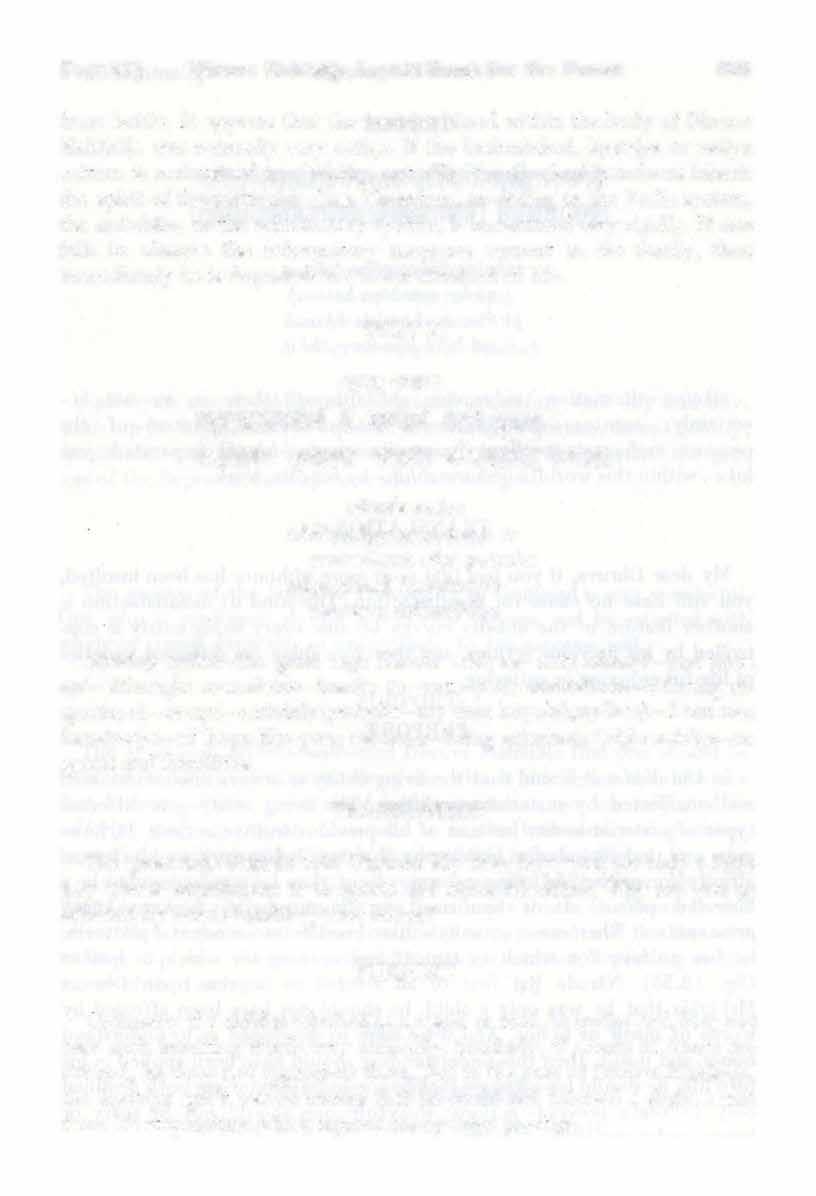
niirada uviica niidhuniipy avamiinam te sammiinam viipi putraka lak�ayiimafl kumiirasya saktasya knpaniidi§u
niiradafl uviica-the great sage Narada said; na-not; adhunii-just now; api-although; avamiinam-insult; te-unto you; sammiinam-offering re· spects;vii-or;api-certainly;putraka-my dear boy;lak�ayiimafl-I can see; kumiirasya-of boys like you; saktasya-being attached; kripana-iidi�u-to sports and frivolities.
TRANSLATION
The great sage Narada told Dhruva: My dear boy, you are only a little boy whose attachment is to sports and other frivolities. Why are you so affected by words insulting your honor?
PURPORT
Ordinarily if a child is rebuked as a rascal or fool, he smiles and does not take such insulting words very seriously. Similarly, if words of honor are offered, he does not appreciate them. But in the case of Dhruva Maharaja, the k�atri.ya spirit was so strong that he could not tolerate a slight insult from his stepmother which injured his k�atriya prestige.
Text 27] Dhruva Maharaja Leaves Home for the Forest 303
..ro{� ;mJ;cMct¥tlwf � � m �· I ��: t¥41(� �� •1�'11fa:!lll�\911
TEXT 28

� f�sfq W1 ���: I �ijt �� f�t �e't Pt�€tiatfit: ������
vikalpe vidyamiine 'pi na hy asanto�a-hetava� pumso moham rte bhinnii yal-loke nija-karmabhi�
vikalpe-alternation; vidyamiine api-although there is; na-not; hicertainly; as an to�a-dissatisfaction; hetavaiJ,-causes; pu msa�-of the persons; moham rte-without being illusioned; bhinnii[l-separated; yatloke-withi n this world; nija-karmabh�-by his own work.
TRANSLATION
My dear Dhruva, if you feel that your sense of honor has been insulted, you still have no cause for dissatisfaction. This kind of dissatisfaction is another feature of the illusory energy because every living entity is controlled by his previous actions, and therefore there are different varieties of life for enjoying or suffering.
PURPORT
In the Vedas it is said that the living entity is always uncontaminated and unaffected by material association. The living entity gets different types of material bodies because of his previous fruitive actions. If, however, one understands the philosophy that as a living spirit soul he has an affinity for neither suffering nor enjoyment, then he is considered to be a liberated person. It is confirmed in Bhagavad-gitii, brahma-bhiita� prasanniitmii: When oneis actuallysituated onthetranscendental platform, he has nothing for which to lament and nothing for which to hanker (Bg. 18.54). Narada J,t�i first of all wanted to impress upon Dhruva Maharaja that he was only a child; he should not have been affected by words of insult or honor. And if he were so developed as to understand honor and insult, then this understanding should have been applied in his own life; he should have knownthat honor and dishonor are both destined only by one's previous actions; therefore one should not be sorry or happy under any circumstances.
304 Srimad-Bhagavatam [Canto 4, Ch. 8
paritu,yet tatas tiita tiivan-miitrepa piirufllfl daivopasiiditam yiivad vik§yesvam-gatim budhafl
paritu§yet-one shouldbe satisfied; tatap-therefore; tiita-my dearboy; tavat-up to such; miitrepa-quantity; piiru§afl-a person; daiva-destiny; upasaditam-offered by; yiivat-as; vlk,ya-seeing; uvam-gatim-the processofthe Supreme; budhafl-one whois intelligent.
TRANSLATION
The process of the Supreme Personality of Godhead is very wonderful. One who is intelligent should accept that process and be satisfied with whatevercomes, favorable or unfavorable, by His supreme will.
PURPORT
The great sage Narada instructed Dhruva Maharaja that one should be satisfied in all circumstances. Everyone who is intelligent should know that because of our concept of bodily existence, we are subjected to suffering and enjoyment. One who is in the transcendental position, beyondtheconcept ofbodilylife,is consideredto be intelligent. Onewho is a devotee especially accepts all reverses as gifts of the Supreme Lord. When a devotee is put into distress, he accepts this as God's mercy and offers Him repeated obeisances with his body, mind and intellect. An intelligent person, therefore, should be alwayssatisfied, depending on the mercyof the Lord.

Text 30) Dhruva
Leaves
�M;tt�GI 'l"(:
t(lq(11"� 441cti\�(•tRI �: ll�\11
Maharaja
Home for the Forest TEXT 29 qRtR'Ef6«116
I
305
TEXT30 31'1 ¥tl�q(\4;w itlir.IM�RII 'lal(11( U l$If((Riad� 441( II�oil
Srimad-Bhagavatam
atha-therefore; miitrii- by your mother; upadi§tena-being instructed; yogena-by mystic meditation; avarurutsasi-want to elevate yourself; yat-prasiidam-whose mercy; sa�-that; vai-certainly; pumsiim-of the living entities; duriiriidhya�-very difficult to perform; mata�-opinion; mama- my.
TRANSLATION
Now you have decided to undertake the mystic process of meditation under the instruction of your mother, just to achieve the mercy of the Lord, but in my opinion such austerities are not possible for any ordinary man. It is very difficult to satisfy the Supreme Personality of Godhead.
PURPORT
The process of bhakti-yoga is simultaneously very difficult and very easy to perform. Sri Nirada Muni, the supreme spiritual master, is testing Dhruva Maharaja to see how determined he is to prosecute devotional service. This is the process of accepting a disciple. The great sage Narada Muni has come to Dhruva under the direction of the Supreme Personality of Godhead just to initiate him, yet he is testing his determination to execute the process. It is a fact, however, that for a sincere person devotional service is very easy. But for one who is not determined and sincere, this process is very difficult.
TEXT 31

munaya� padavim yasya n*sahgenoru-janmabh* na vidur mrgayanto'pi tivra-yoga-samiidhinii
munayaQ -great sages; padavi"m- pa t h; yasya- whose ; n*sarigenaby detachment; uru-janmabh*-after many births; na-never ; vidu�-

306
[Canto 4, Ch. 8
atha miitropadi§tena yogeniivarurutsasi yat-prasiidam -sa vai pumsiim duriiriidhyo mato mama
understood; mrgayanta�-searching for; api-certainly; ti"vra-yoga-severe austerities; samadhina-by trance.
TRANSLATION
NaradaMunicontinued:Aftertrying thisprocess for many,manybirths and remaining unattached to material contamination, placing themselves continuallyintrance and executing manytypesof austerities, many mystic yogis could not find the end ofthe pathofGod realization.
TEXT 32
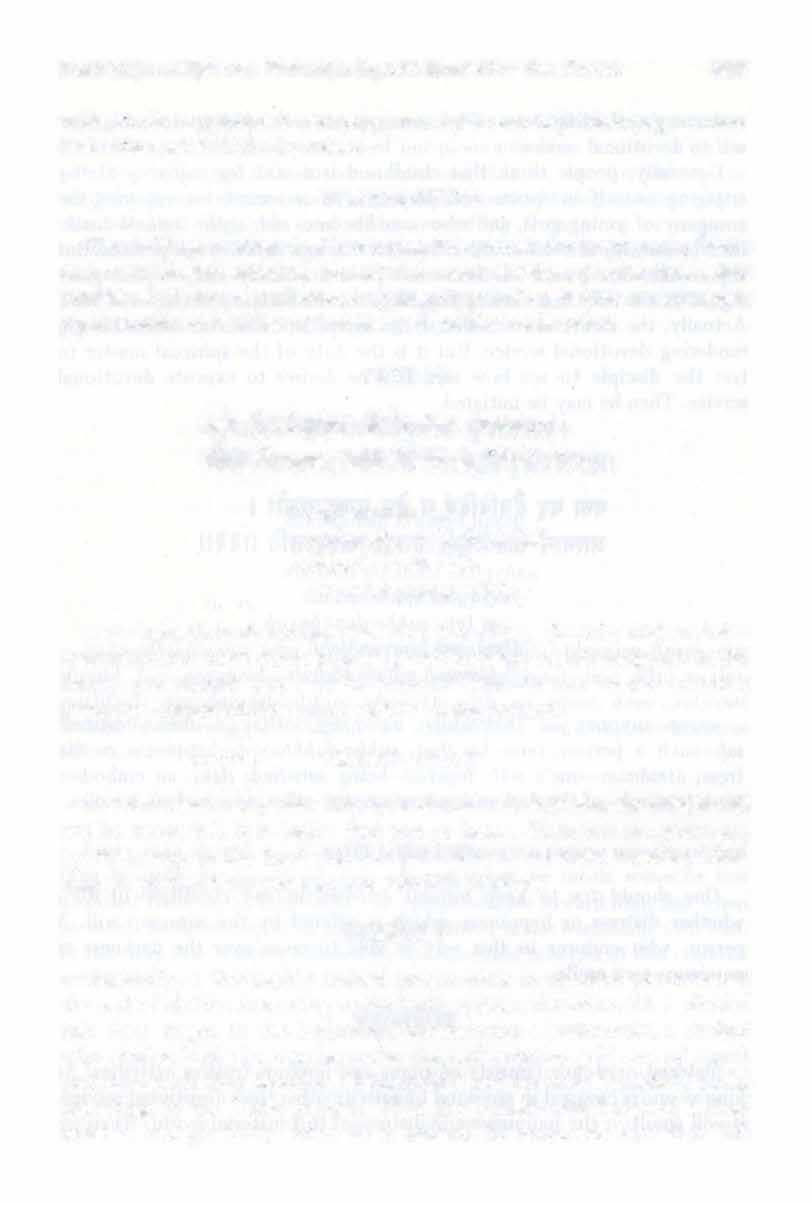
ato nivartatiim e§a nirbandhas tava ni§phala� yati§yati bhaviin kiile sreyasiim samupasthite
ata�-hereafter; nivartatiim-just stop yourself; e§a[t-Lhis; nirbandha{tdetermination; tava-your; ni§phala�-without any result; yati§yati- in the future you should try; bhaviin-yourself; kiile-in due course of time; sreyasiim-opportunities; samupasthite-being present.
TRANSLATION
For this reason, my dear boy, you should not endeavorforthis; it will not be successful. It is better that you gohome. Whenyou are grownup, by the mercy of the Lord you will get a chance for these mystic performances.Atthat time you may executethisfunction.
PURPORT
Generally, a thoroughly trained person takes to spiritual perfection at the end of his life. According to the Vedic system, therefore, life is divided into four stages. In the beginning, one becomes a brahmaciiri, a student who studies Vedic knowledge under the authoritative guidance of a spiritualmaster. He then becomes a householderand executes household duties according to the Vedic process. Then the householder becomes a viinaprastha, and gradually, when he is mature, he renounces household life
Text32) Dhruva Maharaja Leaves Home for the Forest 307
3lm r.t��<�•it-t � · �: 1 �fa�f<t�cR � ijf4�� ����II
and viinaprastha life also and takes to sannyiisa, completely devoting himself to devotional service.

Generally, people think that childhood is meant for enjoying life by engaging oneself in sports and play, youth is meant for enjoying the company of young girls, and when one becomes old, at the time of death, then he maytry to execute devotional service or a mystic yoga process. But this conclusion is not for devotees who are actually serious. The great sage Narada Muni is instructing Dhruva Maharaja just to test him. Actually, the direct order is that from any point of life one should begin rendering devotional service. But it is the duty of the spiritual master to test the disciple to see how seriously he desires to execute devotional service. Then he may be initiated.
TEXT 33

�q�������:�: I
yasya yad daiva-vihitarh sa tena sukha-du[lkhayo[l iitmiinarh to§ayan dehi tamasa[l piiram rcchati
yasya-anyone; yat-that which; daiva-by destiny; vihitam-destined; safl-such a person; tena-by that; sukha-duflkhayo[l- happiness or distress; iitmiinam-one's self; to§ayan-being satisfied; dehi-an embodied soul; tamasaQ.-of the darkness; param-to the other side; rcc hati-crosses.

TRANSLATION
One should try to keep himself satisfied in any condition of lifewhether distress or happiness-which is offered by the supreme will. A person who endures in this way is able to cross over the darkness of nescience very easily.
PURPORT
Material existence consists of pious and impious fruitive activities. As long as one is engaged in any kind of activity other than devotional service, it will result in the happiness and distress of this material world. When we
308 Srimad-Bhagavatam [Canto 4, Ch. 8
�t;f �
�: qt(lt+>u� II��II
enjoylife inso-called material happiness, it is tobe understood that we are diminishing the resultant actions of our pious activities. Andwhenweare put into suffering, it is to be understood that we are diminishing the resultant action of our impious activities. Instead of being attached to the circumstantial happiness and distress resulting from pious or impious activities, if we want to get out of the clutches of this nescience, then whatever position we are put in by the will of the Lord we should accept. Thus ifwe simply surrender unto the Supreme Personalityof Godhead, we get out of t�e clutches of this material existence.
TEXT 34

guriidhikiin mudam lipsed anukrosam gu'{liidhamiit maitrim samiiniid anvicchen na tiipair abhibhuyate
gu'{la-adhikiit-one who is more qualified; mudam-pleasure; lipset- one should feel; anukrosam-compassion; gu!w-adhamiit-one who is less qualified; maitrim- friendship; samiiniit-with an equal; anvic chet-one should desire; na-not; tiipa*-by tribulation; abhibhuyate- becomes affected.

TRANSLATION
Every man should act like this: when he meets a person more qualified than himself, he should be very pleased; when he meets someone less qualified than himself, he should be compassionate toward him; and when he meets someone equal to himself, he should make friendship with him. In this way one is never affected by the threefold miseries of this material world.
PURPORT
Generally when we find someone more qualified than ourselves, we become envious of him; when we find someone less qualified, we deride him; and when we find someone equal we become very proud of our
Text 34] Dhruva Maharaja Leaves Home for the Forest 309
activities. These are the causes of all material tribulations. The great sage Narada therefore advised that a devotee should act perfectly. Instead of being envious of a morequalified man, one should bejolly toreceive him. Instead of being oppressive to a less qualified man, one should be compassionate toward himjustto raise himto the proper standard. And when one meets an equal, instead of being proud of one's own activities before him, one should treat him as a friend. One should also have compassion for the people in general, who are suffering due to forgetfulness of J<r�Qa. These important functions will make one happy within this material world.
TEXT 35
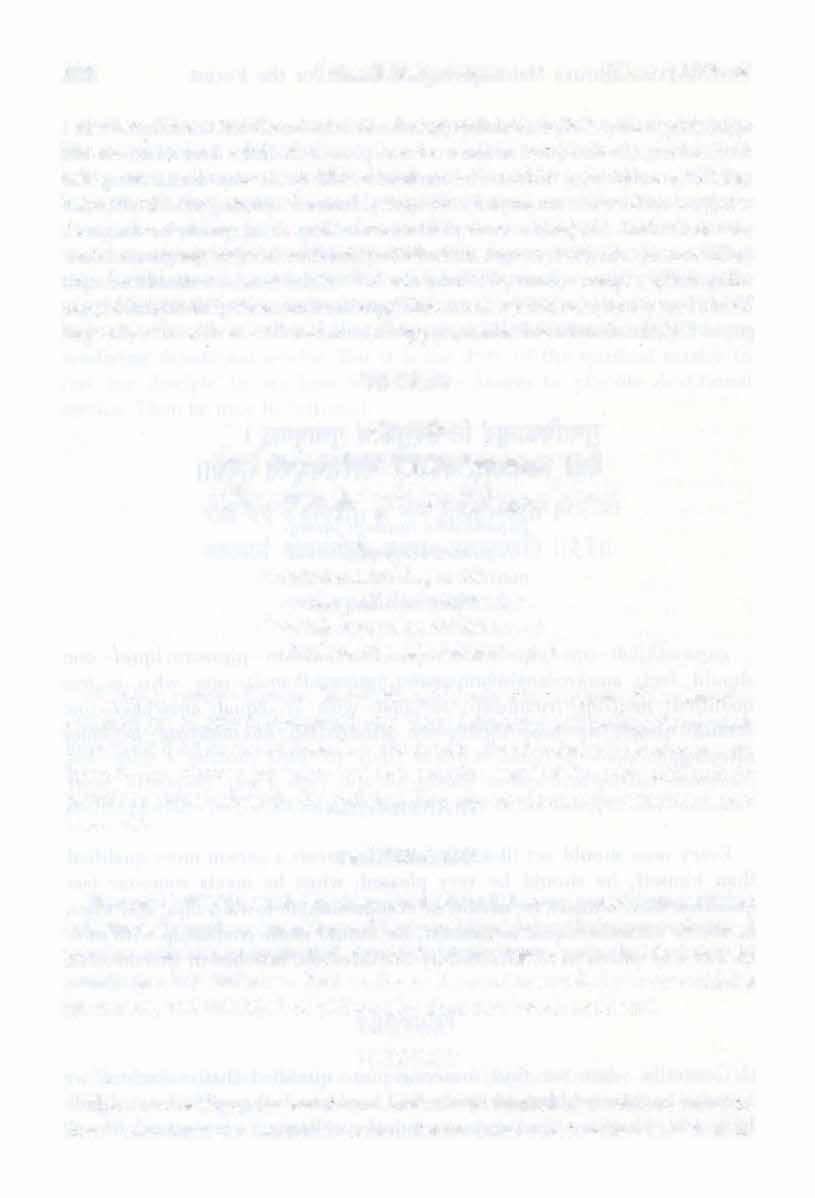
dhruva uviica so 'yarh: samo bhagavatii sukha-du[l.kha-hatiitmaniim darsita[l. krpayii pumsiim durdarso 'smad-vidhais tu ya[l.
dhruva{l. uviica- Dhruva Maharaja said; sa[l.-that; ayam- this; sama{tequilibrium of mind; bhagavatii-by Your Lordship; sukha-du[l.kha-happiness and miseries; hata-iitmaniim-those who are affected; darsita[l.-shown; krpayii-by mercy; pumsiim-of the people; durdarsa[l.-very difficult to perceive; asmat-vidhai[l.-by persons like us; tu-but; ya[l.-whatever you have said.
TRANSLATION
Dhruva Maharaja said: My dear Lord Naradaji, for a person whose heart is disturbed by the material conditions of happiness and distress, whatever you have so kindly explained for attainment of peace of mind is certainly a very good instruction. But as far as I am concerned, I am covered by ignorance, and this kind of philosophy does not touch my heart.
PURPORT
There are various classes of men. One class is called akarmis, referring Lo those who have no material desire. Desire must exist, ei t her material or
310 Srimad-Bhagavatam [Canto 4, Ch. 8
�� �����RCf�I�WII¥( I �a-:���""f"�� �: 11��11
spiritual. Material desire arises when one wants to satisfy one's personal senses. One who is ready to sacrifice anything to satisfy the Supreme Personality of Godhead can be said to have spiritual desire. Dhruva did not accept the instruction given by the great saint Narada because he thought himself unfit for such in&truction, which prohibited all material desires. It is not a fact, however, that those who have material desires are prohibited from worshiping the Supreme Personality of Godhead. This is the essential instruction from the life of Dhruva. He frankly admitted that his heart was full of material desires. First of all, he was very much affected by the cruel words of his stepmother, whereas those who are spiritually advanced do not care about anyone's condemnation or adoration.
In Bhagavad-gitii it is said that persons who are actually advanced in spiritual life do not care for the dual behavior of this material world. But Dhruva Maharaja frankly admitted that he was not beyond the affliction of material distress and happiness. He was confident that the instruction given by Narada was valuable, yet he could not accept it. The question raised here is whether or not a person afflicted by material desires is fit to worship the Supreme Personality of Godhead. The answer is that everyone is fit to worship Him. Even if one has many material desires to fulfill, he should take to Kr�l'.la consciousness and worship the Supreme Lord Kr�J'.la, who is so merciful that He fulfills everyone's desires. Through this narration it will become very clear that no one is barred from worshiping the Supreme Personality of Godhead, even if he has many material desires.
TEXT 36
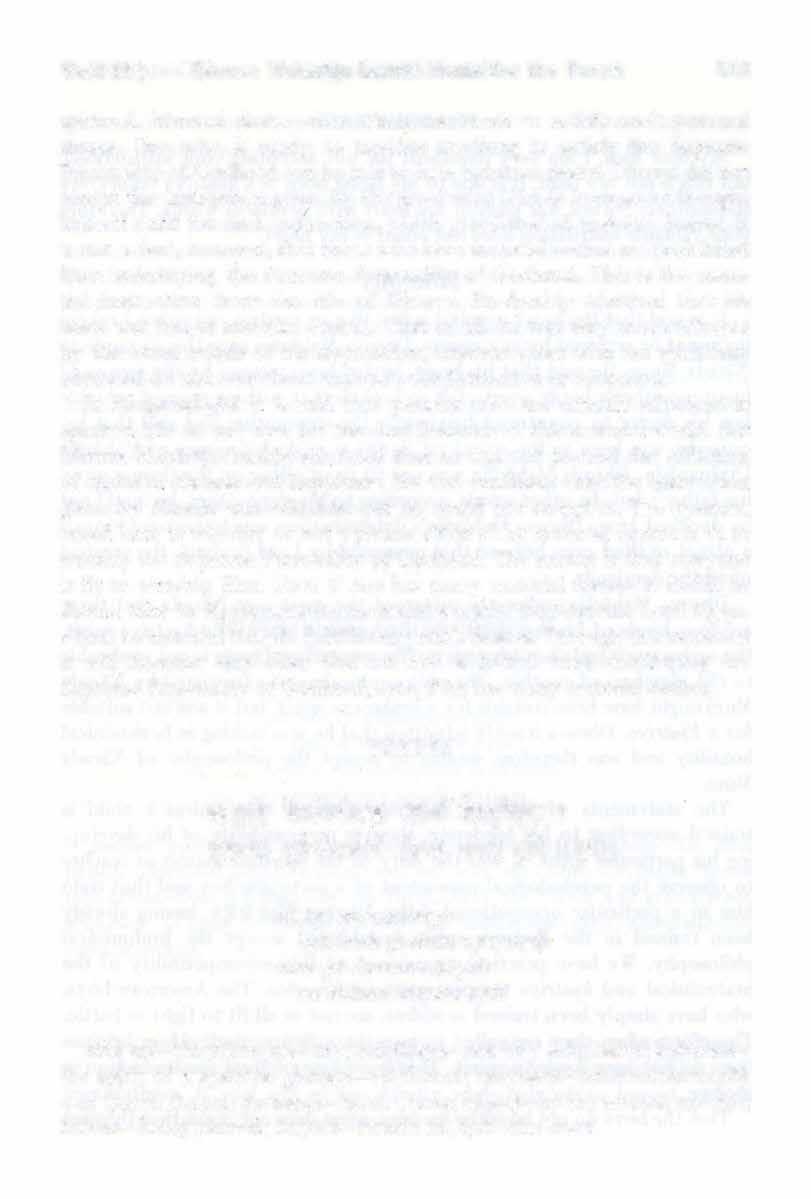
� itsfft416� �-it(�ft: I
� ��"iftiCI�� � ������II
athiipi me'vinitasya
k§iittram ghoram upeyu§a{l surucyii durvaco-biirwir
na bhinne srayate hrdi
atha api-therefore; me-my; avinitasya-not very submissive; k§iittramthe spirit of a kfiatriya; ghoram-intolerant; upeyufia(l -achieved ; suru cya� -of Queen Suruci; du rvaca(l -harsh words; biirwi(l-by the arrows; na-not; bhinne -being pierced; srayate-remain in; hrdi -the heart.
Text 36] Dhruva Maharaja Leaves Home for the Forest 311
My dear lord, I am very impudent for not accepting your instructions, butthis is not my fault. It is due to my being born in a lqatriya family. My stepmother, Suruci, has pierced my heart with her harsh words. Therefore your valuable instruction does not stand in my heart.
PURPORT
It is said that the heart or mind is just Like an earthen pot; once broken, it cannotbe repaired by any means. Dhruva Maharaja gave this example to Narada Muni. He said that his heart, having been pierced by the arrows of his stepmother's harsh words, felt so broken that nothing seemed valuable but his desire to counteract her insult. His stepmother had said that because he was born in the womb of Suniti, a neglected queen of Maharaja Uttanapada, Dhruva Maharaja was not fit to sit either on the throne or on his father's lap. In otherwords,according tohis stepmother,he could not be declared king. Dhruva Maharaja's determination was to becomeking of a planet exalted even beyond that possessed by Lord Brahma, thegreatest of allthe demigods.
Dhruva Maharaja indirectly informed the great sage Narada that there are four kinds of human spirit-the brahminical spirit, the k�atriya spirit, the vaiSya spiritandthe sudra spirit.The spiritof one casteis notapplicable to the members of another. The philosophical spirit enunciated by Narada Munimighthavebeen suitablefora briihmapa spirit,but itwas not suitable for a k�atriya. Dhruva frankly admittedthat he waslacking inbrahminical humility and was therefore unable to accept the philosophy of Narada Muni.

The statements of Dhruva Maharaja indicate that unless a child is trained according to his tendency, there is no possibility of his developing his particular spirit. It was the duty of the spiritual master or teacher to observe the psychological movement of a particular boy and thus train him in a particular occupational duty. Dhruva Maharaja, having already been trained in the k11Jtriya spirit, would not accept the brahminical philosophy. We have practical experience of this incompatibility of the brahminical and kFtriya temperaments in America. The American boys, who have simply been trained as siidms, are not at allfit to fight in battle. Therefore, when they are called to join the military, they refuse because they do not have k�atriya spirit. This is a cause of great dissatisfactionin society.
That theboys donothave the k�atriya spirit doesnot mean that theyare
312 Srimad-Bhagavatam [Canto 4, Ch. 8
TRANSLATION
trained in brahminical qualities; they are trained as siidras, and thus in frustration they are becoming hippies. However, as soon as they enter the Kr�J;�a consciousness movement which is beirig started in America, they are trained to meet the brahminical qualifications, even though they have fallen to the lowest conditions as siidras. In other words, since the Kr�J;�a consciousness movement is open for everyone, people in general can attain the brahminical qualifications. This is the greatest need at the present moment, for now there are actually no briihmarws or k�atriyas but only some vaiSyas and, for the most part, siidras. The classification of society into briihmartas, k�atriyas, vaiSyas and siidras is very scientific. In the human social body, the briihmartas are considered the head, the k�atriyas are the arms, the vaisyas are the belly, and the siidras are the legs. At the present moment the body has legs and a belly, but there are no arms or head, and therefore society is topsy-turvy. It is necessary to reestablish the brahminical qualifications in order to raise the fallen human society to the highest standard of spiritual consciousness.
TEXT 37
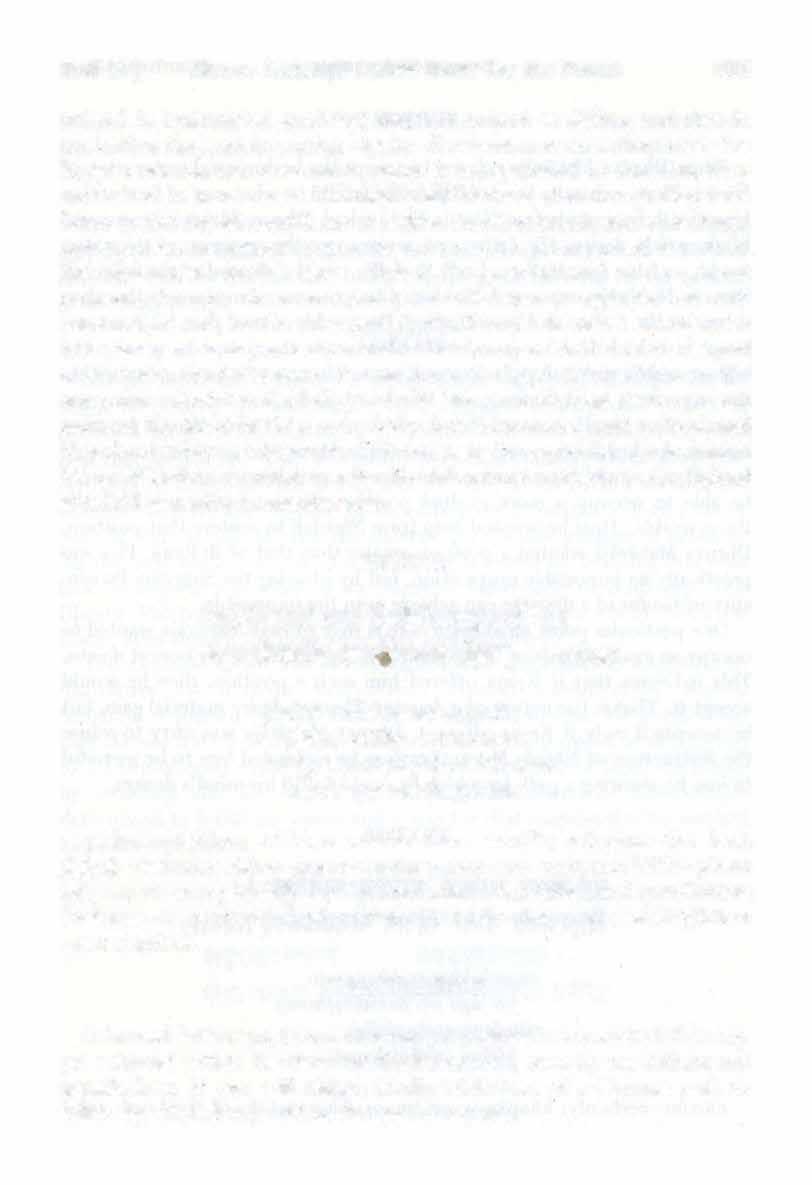
� NiCJwil�tq! �:�� it I
i(4441Rqq:f4i;fiii'S(..-�cqt:f� II�\SII
padarh tri-bhuvanotknfarh jigi�o� siidhu vartma me briihy asmat-pitrbhir brahmann anyair apy anadhi�thitam
padam-position ; tri-bhuvana-the three worlds; utknfam-the best; jigi�o�-desirous; siidhu-honest; vartma-way; me-unto me; briihi-please tell; asmat-our; pitrbhi�-by the forefathers, the father and grandfather; brahman-0 great briihmarw; anya*-by others; api- eve n ; anadhi§.thitam -not acquired.
TRANSLATION
0 learned brahma!la, I want to occupy a position more exalted than any yet achieved within the three worlds by anyone, even by my fathers and grandfathers. If you will oblige, kindly advise me of an honest path to follow by which I can achieve the goal of my life.
Text 37] Dhruva Maharaja Leaves Home for the Forest 313
PURPORT
When Dhruva Maharaja refused to accept the brahminical instruction of Narada Muni, naturally the next question would be what sort of instruction he wanted. So, even before Narada Muni asked, Dhruva Maharaja expressed his heartfelt desire. His father, of course, was the emperor of the entire world, and his grandfather, Lord Brahma, was the creator of the universe. Dhruva Maharaja expressed his desire to possess a kingdom better than those of his father and grandfather. He frankly stated that he wanted a kingdom which had no competitor within the three worlds, namely the higher, middle and lower planetary systems. The greatest personality within this universe is Lord Brahma, and Dhruva Maharaja wanted a position even greater than his. He wanted to take advantage of Narada Muni's presence because he knew very well that if Narada Muni, the greatest devotee of Lord Kr�l].a, could bless him or show him the path,then certainly he would be able to occupy a more exalted position than any person within the three worlds. Thus he wanted help from Naradajito achieve that position. Dhruva Maharaja wanted a position greater than that of Brahma. This was practically an impossible proposition, but by pleasing the Supreme Person· ality of Godhead a devotee can achieve even the impossible.
One particular point mentioned here is that Dhruva Maharaja wanted to occupy an exalted position not by hoo or by crook, but by honest means. This indicates that if Kr�l].a offered him such a position, then he would accept it. That is the nature of a devotee. He may desire material gain, but he accepts it only if Kr�a offers it. Dhruva Maharaja was sorry to refuse the instruction of Narada Muni; therefore he requested him to be merciful to him by showing a path by which he could fulfill his mind's desires.

TEXT38


nunam bhaviin bhagavato yo 'nga-jafi. pamme�thina� vitudann atate v"iQiim hitiiya jagato 'rkavat
nfLnam-certainly; bhaviin-your honor; bhagavata�-of the Lord; yapthat which; anga-ja�-born from the body; pamme�thina[I.-Lord Brahma;
314 Srimad-Bhagavatam [Canto 4, Ch. 8
vitudan-by playing on ; atate-travel all over;vi!u2m- a musical instrument; hitiiya-for the welfare;jagata�- of the world;arkavat-like the sun.
TRANSLATION
My dear lord, you are a worthy son of Lord Brahma, and you travel, playing on your musical instrument, the vi!J.ii, for the welfare of the entire universe. You are like thesun, which rotates in the universe for the benefit of aU living beings.
PURPORT
Dhruva Maharaja, although a young child, expressed his hope that he might be offered the benediction of a kingdom which would exceed in opulence those of his father and grandfather. He also expressed his glad· ness that he had met such an exalted person as Narada, whose only con· cern was to illuminate the world, like the sun, which rotates all over the universe only for the purpose of benefiting the inhabitants of all planets. Narada Muni travels all over the universe for the sole purpose of perform· ing the best welfare activity for the entire universe by teaching everyone how to become a devotee of the Supreme Personality of Godhead. Thus Dhruva Maharaja felt fully assured that Narada Muni could fulfill his desire, even thoughthe desire was very extraordinary.
The example of the sun is very significant. The sun is so kind that he distributes his sunshine everywhere, without consideration. Dhruva Maharaja requested Narada Muni to be merciful to him. He pointed out that Narada travels all over the universe just for the purpose of doing good to all conditioned souls. He requested that Narada Muni show his mercy by awarding him the benefit of his particular desire. He was strongly determined to fulfill his desire, and it was for that purpose that he had left his home and palace.
TEXT

Text 39) Dhruva Maharaja Leaves Home for the Forest 315
39 �� ��l(ij+tlwuf ¥1tlql'fl(((�I sfur: � �mea:t+t+t�ifi+qtt• maitreya uviica ity udiihrtamiikarrya bhagaviinniiradastadii prita� pratyiiha tam biilam sad-viikyam anukampayii ����II
maitreya[l uviica-the sage Maitreya continued; iti-thus; udiihrtambeing spoken; iikarpya-hearing; bhagaviin niirada[l-the great personality Narada; tadii-thereupon; prita[l-being pleased; pratyiiha-replied; tamhim; balam-the boy; sat-viikyam-good advice; anukampayii-being compassionate.
TRANSLATION
The sage Maitreya continued: The great personality Narada Muni, upon hearing the words of Dhruva Maharaja, became very compassionate towards him, and in order to show him his causeless mercy, he gave him the following expert advice.
PURPORT
Since the great sage Narada is the foremost spiritual master, naturally his only activity is to bestow the greatest benefit upon whomever he meets. Dhruva Maharaja, however, was a child, and so his demand was also that of a playful child. Still, the great sage became compassionate towards him, and for his welfare he spoke the following verses.
TEXT40

�: �: ��f;r:��� I
�l'l en�m � � sNon�;:ctll�oll
niirada uviica
jananyiibhihita[l panthii[l sa vai nilJ,sreyasasya te bhagaviin viisudevas tam bhaja tam pravarziitmanii
niirada[l uviica-the great sage Narada said; jananyii-by your mother; abhihita[l-stated; panthii[l-the path; sa[l-that; vai-certainly; ni[lsreyasasya-the ultimate goal of life; te-for you; bhagaviin-the Supreme Personality of Godhead; viisudeva{l-Kf�T)a; tam-unto Him; bhaja-render your service; tam-by Him ; pravarza-iitmanii-fully absorbing your mind.
TRANSLATION
The great sage Narada told Dhruva Maharaja: The instruction given by your mother, Suniti, to follow the path of devotional service to the
316 Srimad-Bhagavatam [Canto4, Ch. 8
��
Supreme Personality of Godhead, is just suitable for you. You should therefore completely absorb yourself in the devotional service of the Lord.
PURPORT
Dhruva Maharaja's demand was to achieve an abode even greater than Lord Brahma's. Within this universe, Lord Brahma is supposed to be in the most exalted position, for he is the chief of all demigods, but Dhruva Maharaja wanted a realm beyond his. Therefore his desire was not to be fulfilled by worshiping any demigod. As described in Bhagavad-gitii, the benedictions offered by the demigods are all temporary. Therefore Narada Muni asked Dhruva Maharaja to follow the path which was recommended by his mother-to worship Kr�rp, Vasudeva. When Kr�I;Ia offers anything, it is beyond the expectation of the devotee. Both Suniti and Narada Muni knewthat the demand of Dhruva Maharaja was impossiblefor anydemigod to fulfill, and therefore both of them recommended following the process of devotional service to Lord Kr�I;Ia.
Narada Muni is referred to here as Bhagaviin because he can bless any person just as the Supreme Personality of Godhead can. He was very pleased with Dhruva Maharaja, and he could have at once personally given whatever he wanted,but that is not the dutyof a spiritual master. His duty is to engage the disciple in proper devotional service as prescribed in the siistras. Kr�I;Ia was similarly present before Arjuna, and even though He could have given him all facilities for victory over the opposing party without a fight, He did not do so; He asked him to fight. In the same way, Narada Muni asked Dhruva Maharaja to undergo devotional discipline in order toachieve the desired result.
TEXT41

dharmiirtha-kiima-mok�iikhyarh ya icchecchreya iitmana�
ekarh hy eva hares tatra kiirar-arh piida-sevanam
dharma-artha-kiima-mok§a-the four principles of religiosity, economic development, sense gratification and liberation; iikhyam-by the· name;
Text41) Dhruva
Leaves Home for the Forest 317
Maharaja
�������:I � m- � � q1a;ijttW1'(����II
ya{l-who; icche t-may desire; sreya{l-the goal of life; iitmana . h-of the self; ekam hi eva-only the one; hare �- of the Supreme Personality of Godhead; tatra-in that; kara!la m- the cause; pada-sevanam-worshiping the lotus feet.
TRANSLATION
Any person who desires the fruits of the four principles of religiosity, economic development, sense gratification and, at the end, liberation, should engage himself in the devotional service of the Supreme Personality of Godhead because worship of His lotus feet yields the fulfillment of all of these.
PURPORT
In Bhagavad-gita it is said that only with the sanction of the Supreme Personality of Godhead can the demigods offer benediction. Therefore, whenever any sacrifice is offered to a demigod, the Supreme Lord in the form of Niirayapa-sila or Salagrama-sila is put forward to observe the sacrifice. Actually, the demigods cannot give any benediction without the sanction of the Supreme Lord. Narada Muni, therefore, advised that even for religiosity,economic development, sense gratification or liberation, one should approach the Supreme Personality of Godhead, offer prayers and ask for the fulfillment of his desire at the lotus feet of the Lord. That is real intelligence. An intelligent person never goes to demigods to pray for anything. He goes directly to the Supreme Personality of Godhead, who is the cause of all benediction.
As Lord Sri Kr�t;�a has said in Bhagavad-gitii, performance of ritualistic ceremonies is not actually religion. The real path of religion is to surrender at the lotus feet of the Lord. For one who is actually surrendered to the lotus feet of the Lord, there is no question of any separate endeavor for economic development. A devotee engaged in service to the Lord is not disappointed in the satisfaction of his senses. If he wants to satisfy his senses, Kr�t:�a fulfills that desire. As far as liberation is concerned, any devotee fully engaged in the service of the Lord is already liberated; therefore there is no separate necessity for his liberation.
Narada Muni therefore advised Dhruva Maharaja to take shelter of Vasudeva, Lord Kr�t;�a, and engage himself in the way that his mother had advised, for that would help him fulfill his desire. In this verse Narada Muni has especially stressed the devotional service of the Lord as the only
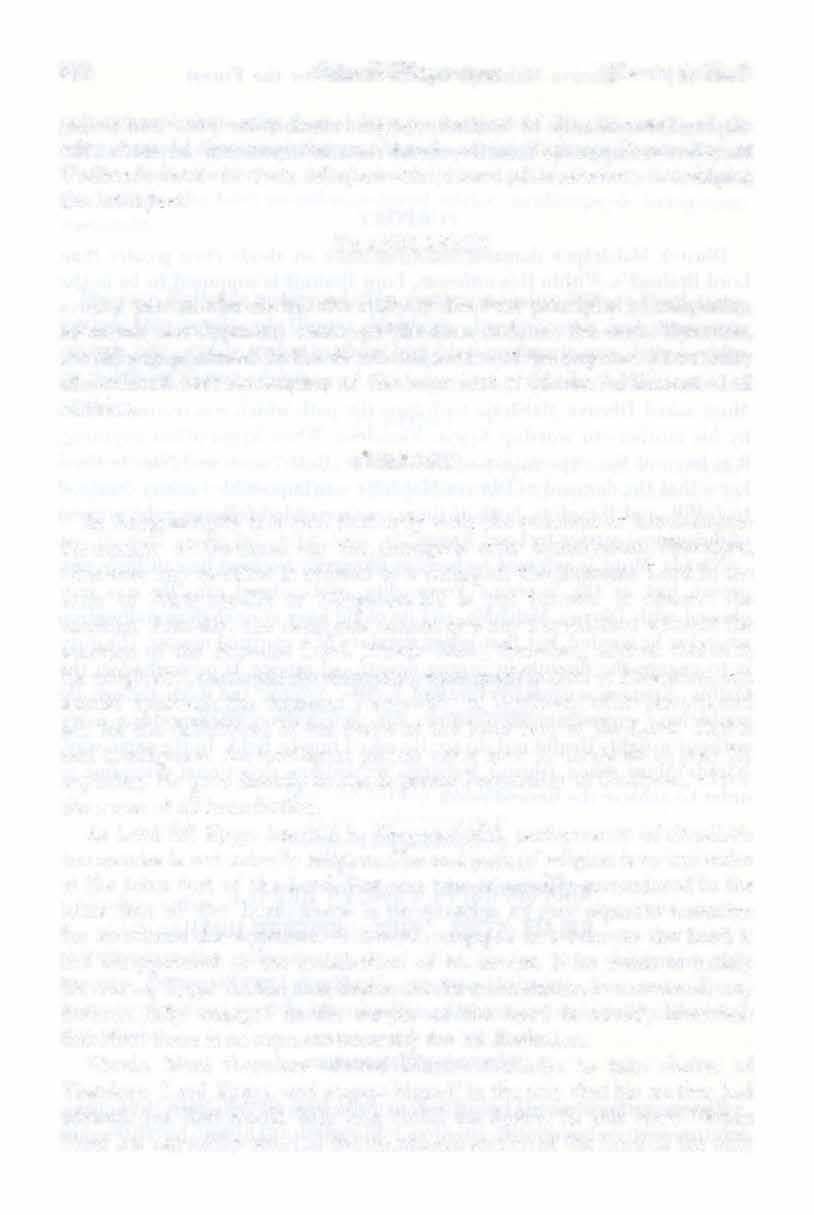
318 Srimad-Bhagavatam [Canto 4, Ch. 8
Text42] Dhruva Maharaja Leaves Home for the Forest 319
way. In other words, even if one is full of material desires, he can continue his devotional service to the Lord, and all his desires will be fulfilled.
TEXT42
tat tiita gaccha bhadram te yamuniiyiis tafam suci pupyam madhuvanam yatra siinnidhyam nityadii hareZ,.
tat-that; tiita-my dear son; gaccha-go; bhadram-good fortune; tefor you; yamuniiyii/1.-of the Yamuna; tatam-bank; suci-being purified; pupyam-the holy; madhuvanam-of the name Madhuvana; yatra-where; siinnidhyam-being nearer; nityadti-always; hareZ,.-of the Supreme Per· sonality of Godhead.
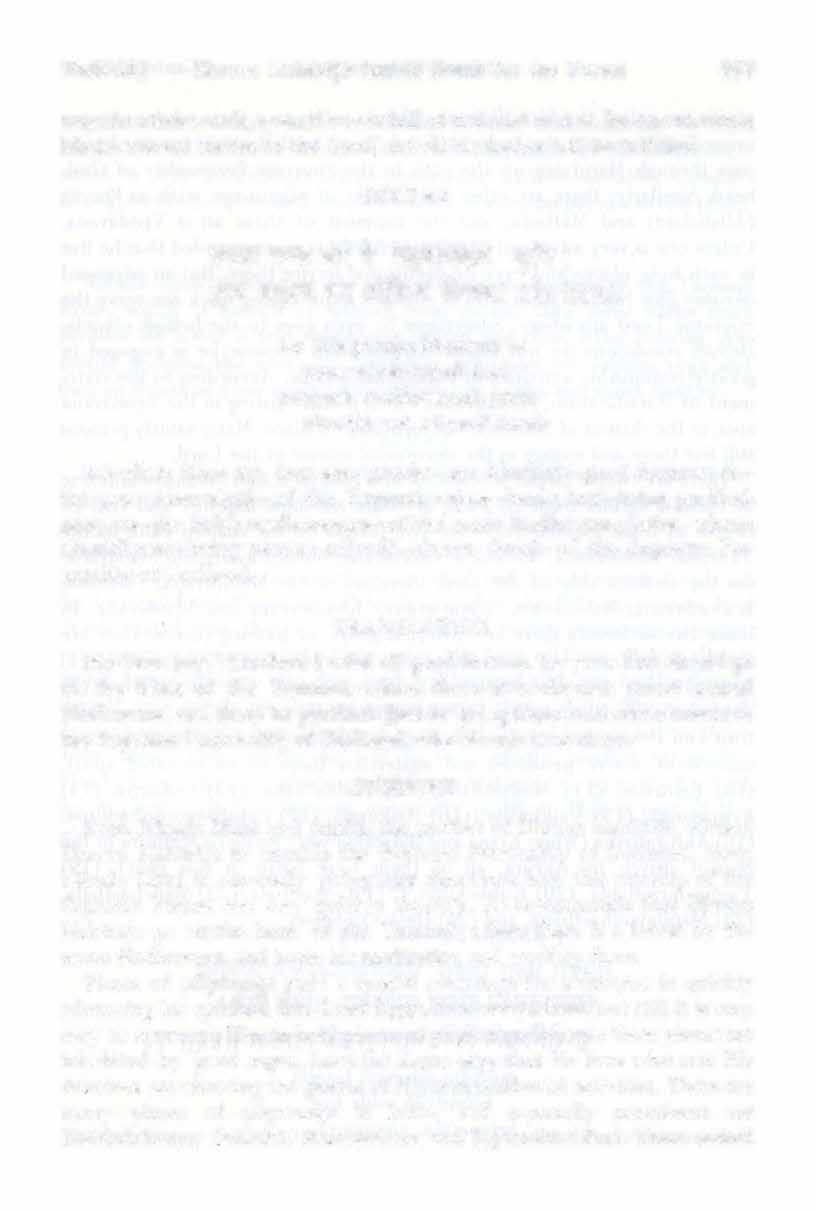
TRANSLATION
My dear boy, therefore I wish all good fortune for you. You should go to the bank of the Yamuni, where there is a virtuous forest named Madhuvana, and there be purified. Just by going there, one draws nearer to the Supreme Personality of Godhead, who always lives there.
PURPORT
Both Narada Muni and Suniti, the mother of Dhruva Maharaja, advised Dhruva Maharaja to worship the Supreme Personality of Godhead. Now, Narada Muni is especially giving him directions how this worship of the Supreme Person can very quickly fructify. He recommends that Dhruva Maharaja go to the bank of the Yamuna, where there is a forest by the name Madhuvana, and begin his meditation and worship there.
Places of pilgrimage yield a special advantage for a devotee in quickly advancing his spiritual life. Lord Kr�J}.a lives everywhere, but still it is very easy to approach Him in holy places of pilgrimage because these places are inhabited by great sages. Lord Sri Kr�Qa says that He lives wherever His devotees are chanting the glories of His transcendental activities. There are many places of pilgrimage in India, and especially prominent are Badriniiriiyal)a, Dviirakii, Riime8varam and Jagannatha Purl. These sacred
� � �� "4Jfll"41«ti � I � � � �tr.r'01#Pl€"4�1 (�: 11\l�ll
places are called the four dhiimas. Dhiima refers to a place where one can immediately contact the Supreme Lord. To go to Badrinaraya�a one has to pass through Haridvara on the path to the Supreme Personality of Godhead. Similarly, there are other holy places of pilgrimage, such as Prayag (Allahabad) and Mathura, and the topmost of them all is Vrndavana. Unless one is very advanced in spiritual life, it is recommended that he live in such holy places and execute devotional service there. But an advanced devotee like Narada Muni who is engaged in preaching work can serve the Supreme Lord anywhere. Sometimes he even goes to the hellish planets. Hellish conditions do not affect Narada Muni because he is engaged in greatly responsible activities in devotional service. According to the state· ment of Narada Muni, Madhuvana, which is still existing in the Vrndavana area,in the district of Mathura, is a most sacred place. Many saintlypersons still live there and engage in the devotional service of the Lord.
There are twelve forests in the area of Vrndavana, and Madhuvana is one of them. Pilgrims from all parts of India assemble together and visit all twelve of these forests. There are five forests on the eastern bank of the Yamuna: Bhadravana, Bilvavana, Lauhavana, Bha�<;liravana and Mahavana. On the western side of the bank there are seven: Madhuvana, Talavana, Kumudavana, Bahulavana, Kamyavana, Khadiravana and Vrndavana. In those twelve forests there are different ghats, or bathing places. They are Listed as follows: (1) Avimukta, (2) Adhiru<;lha, (3) Guhyatirtha, (4) Prayagatirtha, (5) Kanakhala, (6) 'i'indukatirtha, (7) Suryatirtha, (8) Vatasvami, (9) Dhruvaghata (Dhruvaghata, where there are many nice fruit and flower trees, is famous because Dhruva Maharaja meditated and underwent severe penances and austerities there in an elevated spot), (10) J.l�itlrtha, (ll) Mok�ati"rtha, (12) Budhatirtha, (13) Gokar�a, (14) Kr�qagarigii, (15) Vaiku�tha, (16) Asikul).<;la, (17) Catul).siimudrika�kupa, (18) Akruratirtha (When Kr�l).a and Balarama were going to Mathura in the chariot driven by Akrura, all of them took baths in this ghiit), (19) Yajii.igviprasthana, (20) Kubja-kupa, (21) Rarigasthala, (22) Maiichasthala, (23) Manllayudhasthana, and (24) Dasasvamedha.



TEXT 43
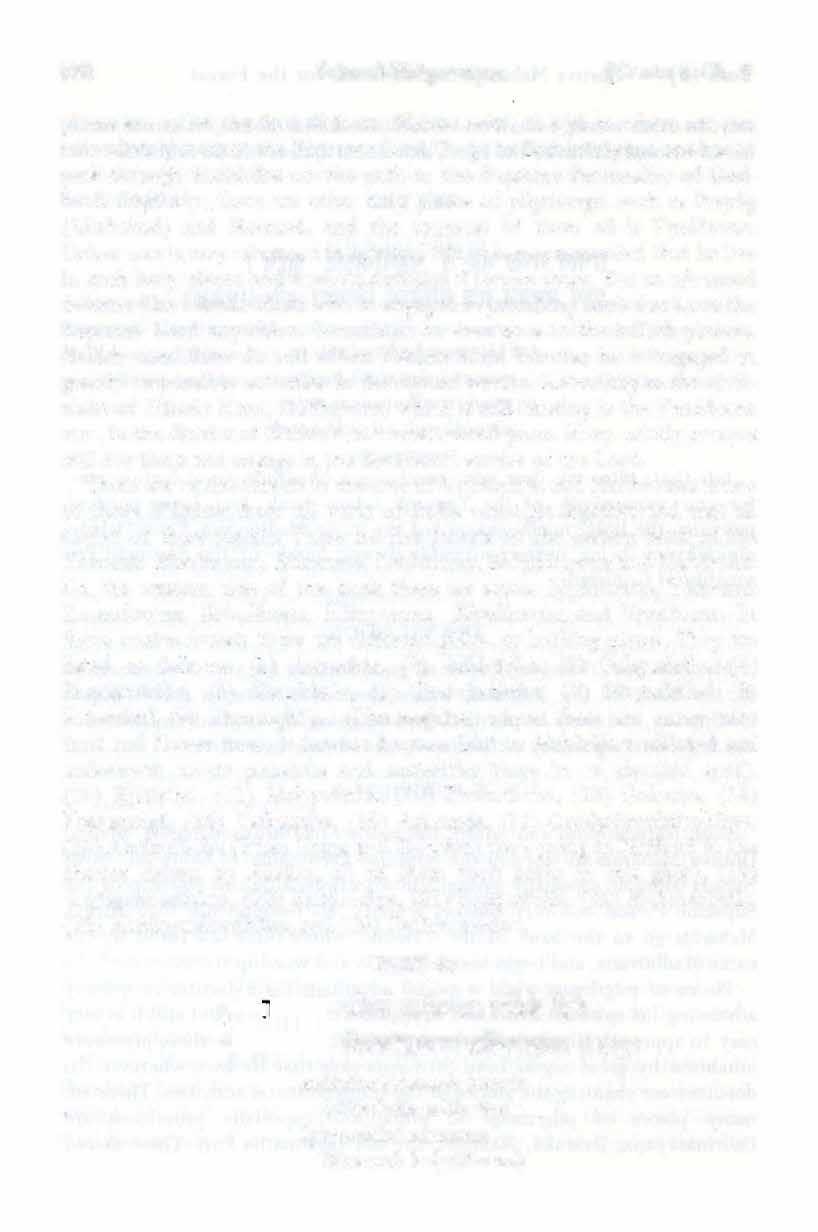
'hfiN�I(1'1: 11\l�ll
sniitviinusavanam tasmin kiilindyii{l, salile sive krtvocitiini nivasann iitmanafl. kalpitiisanafl.
320 Srimad-Bhagavatam [Canto 4, Ch. 8
��:
•�•fe"'•u:�RA 1 t�f41M�tf.f
snatva-after taking bath; anusavanam-three times; tasmin-in that; kalindya[l -in the River Kalindi (the Yamuna); salile-in the water; sivewhich is very auspicious; krtva-performing; ucitani-suitable; nivasansitting; atmana[l-of the self; kalpi ta-iisana[l - having prepared a sitting place.
TRANSLATION
Narada Muni instructed: My dear boy, in the waters of the Yamuna River, which is known as Kalindi, you should take. three baths daily because the water is very auspicious, sacred and clear.Afterbathing, you should perfoFQl the necessary regulative principles for at1iinga-yoga and thensit down onyourasana [sitting place] in acalm andquietposition.
�URPORT
It appears from this statement that Dhruva Maharaja had already been instructed how to practice the eightfold yoga system, which is known as a§tanga-yoga. This system is explained in our Bhagavad-gita As It Is, in the chapter entitled "Siinkhya-yoga," pages 319-322. It is understood that in a§tahga-yoga one practices settling the mind and then concentrating it on the form of Lord Vi�rm, as will be described in the following verses. It is clearly stated here that a§tanga-yoga is not a bodily gymnastic exercise, but a practice to concentrate the mind on the form of V�!].u. Before sitting on his asana, which is also described in Bhagavad-gita, one has to cleanse himself very nicely in clear or sacred water thrice daily. The water of Yamuna is naturally very clear and pure, and thus if anyone bathes there three times, undoubtedly he will be very greatly purified externally. Narada Muni, therefore, instructed Dhruva Maharaja to go to the bank of the Yamuna and thus become externally purified. This is part of the gradual process of practicing mystic yoga.

TEXT 44
prapiiyiimena tri-vrta
prii!'endriya-mano-malam sanair vyudasyiibhidhyiiyen manasii gurw;tii gurum
prariiyamena-by breathing exercise; tri-vrta-by thethreerecommended ways; prara-indriya-the life air and the senses; mana�-mind; malam-
Text 44] Dhruva Maharaja Leaves Home for the Forest 321
sn�JfTlnlt� NRI Sf11J)f;.�'lwil'l�l( 1 ftl�*�nflr�"fwml � � ������
impurity; sanaift-gradually; vyudasya- giving up; abhidhyayet-meditate upon; manasa- by the mind; gurucui- undisturbed ; gurum-the supreme spiritual master, Kr�Qa.
TRANSLATION
After sitting on your seat, practice the three kinds of breathing exercises, and thus gradually control the life air, the mind and the senses. Completely free yourself from all material contamination, and with great patience begin to meditate on the Supreme Personality of Godhead.
PURPORT
In this verse the entire yoga system is described in summary, and special stress is given to the breathing exercise for stopping the disturbing mind. The mind, by nature, is always oscillating, for it is very fickle, but the breathing exercise is meant to control it. This process of controlling the mind might have been very possible in those days millions of years ago when Dhruva Maharaja took to it, but at the present moment the mind has to be fixed directly on the lotus feet of the Lord by the chanting process. By chanting the Hare Kr�Qa mantra one immediately concentrates on the sound vibration and thinks of the lotus feet of the Lord, and very quickly one is elevated to the position of samiidhi, or trance. If one goes on chanting the holy names of the Lord, which are not different from the Supreme Personality of Godhead, naturally his mind becomes absorbed in thought of the Lord.
It is here recommended to Dhruva Maharaja that he meditate on the supreme guru or supreme spiritual master. The supreme spiritual master is Kr�r,ta, who is therefore known as caitya-guru. This refers to the Supersoul, who is sitting in everyone's heart. He helps, as stated in Bhagavad-gitii, from within, and He sends the spiritual master, who helps from without. The spiritual master is the external manifestation of the caitya-guru, or the spiritual master sitting in everyone's heart.
The process by which we give up our thoughts of material things is called pratyiihara, which entails being freed from all material thoughts and engagements. The word abhidhyayet, which is used in this verse, indicates that unless one's mind is fixed, one cannot meditate. The conclusion, therefore, is that meditation means thinking of the Lord within. Whether one comes to that stage by the a§tiinga-yoga system or by the method which is recommended in the sastras especially for this present age-to constantly chant the holy name of the Lord-the goal is to meditate on the Supreme Personality of Godhead.

322 Srimad-Bhagavatam [Canto 4, Ch.8
Maharaja Leaves Home for the Forest TEXT 45 ��I ��w'fl� ti<�(¥(tt'l�tt
prasiidiibhimukharh sasvat prasanna-vadanek§ar.am suniisarh subhruvarh ciirukapolarh sura-sundaram

prasiida-abhimukham- always prepared to offer causeless mercy; sasvatalways; prasanna- pleasing; vadana- mouth; ik§ar.am-vision; suniisamvery nicely constructed nose; subhruvam-very nicely decorated eyebrows; earn-beautiful; kapolam-forehead ; sura-the demigods; sundaram-goodlooking.
TRANSLATION
[The form of the Lord is described herein.] The Lord's face is perpetually very beautiful and pleasing in attitude. To the devotees who see Him, He appears never to be displeased, and He is always prepared to award benediction to them. His eyes, His nicely decorated eyebrows, His raised nose and His broad forehead are all very beautiful. He is more beautiful than all the demigods.
PURPORT
This verse clearly explains how one has to meditate on the form of the Lord. 1mpersonal meditation is a bogus invention of modern days. In none of the Vedic literatures is impersonal meditation recommended. In Bhagavad-gitii, when meditation is recommended, the word "mat-para{t," which means "pertaining to Me," is used. Any Vi�ryu form pertains to Lord l<f�rya because Lord Kr�rya is the original Vi�ryu form. Sometimes someone tries to meditate upon the impersonal Brahman, which is describedin Bhagavad-gitii as avyakta, meaning unmanifested orimpersonal. But it is remarked by the Lord Himself that those who are attached to this impersonal feature of the Lord suffer a very troublesome task because no one can concentrate on the impersonal feature. One has to concentrate on the form of the Lord, which is described here in connection with Dhruva Maharaja's meditation. As will be apparent from later descriptions, Dhruva Maharaja perfected this kind of meditation, and his yoga was successful.
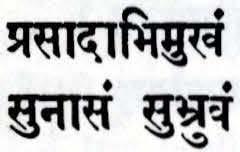
Text 45]
Dhruva
323
TEXT46
31VR11�� II \l� II
tarnrwrh rama'{liyiingam
arn'{lO§thek§a[liidharam pra'{latiisraya"[larh nrm'{larh sarar-yarh karnr-iir'{lavam

tarn'{lam-youthful; ramar-iya-attractive; arigam-all parts of the body; aru�a-o�tha-lips pinkish like the rising sun; ik§a�a-adharam-eyes of the same nature; pral)ata-one who is surrendered; as'rayal)am-shelter of the surrendered; nrmr-am-transcendentally pleasing in allrespects;sarar-yamthe person unto whom it is just worthy tosurrender; karn'{lii-merciful like; a"{lavam-the ocean.
TRANSLATION
Narada Muni continued: The Lord's form is always youthfuL Every limb and every part of His body is properly formed, free from defect. Both His eyes and lips are pinkish like the rising sun. He is always prepared to give shelter to the surrendered soul, and anyone who is so fortunate as to look upon Him feels all satisfaction. The Lord is always worthy to be the master of the surrendered soul, for He is the ocean of mercy.
PURPORT
Everyone has to surrender to someone superior. That is always the nature of our living condition. At the present moment we are trying to surrender to someone-either to society, or to our nation, family, state or government. The surrendering process already exists, but it is never perfect because the· person or institution unto whom we surrender is imperfect, and our surrender, having so many ulterior motives, is also imperfect. As such, in the material world no one is worthy to accept anyone's surrender, nor does anyone fully surrender to anyone else unless he is obliged to do so. But here the surrendering process is voluntary, and the Lord is worthy to accept the surrender. This surrender by the living entity occurs automatically as soon as he sees the beautiful youthful nature of the Lord.
The description given by Narada Muni is not imaginary. The form ofthe Lord is understood by the paramparii system. Mayavadi philosophers say that we have to imaginethe form of the Lord, but here Narada Muni does



324 Srimad-Bhagavatam [Canto4, Ch. 8
not say that. Rather, he gives the description of the Lord from authoritative sources. He is himself an authority, and he is able to go to Vaiku!lthaloka and see the Lord personally; therefore his description of the bodily features of the Lord is not imagination. Sometimes we give instructions to our students about the bodily features of the Lord, and they paint Him. Their paintings are not imaginary. The description is given through disciplic succession, just like that given by Narada Muni, who sees the Lord and describes His bodily features. Therefore, such descriptions should be accepted, and if they are painted, that is not imaginative painting.
TEXT47

srivatsiinkarit ghana-syiimarit puru�arit vana-miilinam
sankha-cakra-gadii-padmair abhivyakta-caturbhujam
srivatsa-ankam-the mark of Srivatsa on the chest of the Lord; ghana-syiimam-deeply bluish; puru§am-the Supreme Person; vanamiilinam-with a garland of flowers; sankha- conchshell; cakra-wheel; gadii-club;padmai�-lotusflower;abhivyakta-manifested;catur-bhujamfour-handed.
TRANSLATION
The Lord is further described as having the mark of Srivatsa, or the sitting place of the goddess of fortune, and His bodily hue is deep bluish. The Lord is a person, He wears a garland of flowers, and He is eternally manifest with four hands, which hold [beginning from the lower left hand] a conchshell, wheel, club and lotus flower.
PURPORT
Here in this verse the word puru�am is very significant. The Lord is never female. He is always male (puru§a). Therefore the impersonalist who imagines the Lord's form asthat of a woman is mistaken. The Lord appears in female form if necessary, but His perpetual form is puru§a because He is originally male. The feminine feature of the Lord is displayed by goddesses of fortune-Lak�mi, Radharli!li, Sita, etc. All these goddesses of fortune are servitors of the Lord; they are not the Supreme, as falsely imagined by the impersonalist. Lord Kr�!}a in His Narayal)a feature is always four-
Text47) Dhruva Maharaja Leaves Home for the Forest 325
��ffllt �� � q��ttG\N�d4���Ill'd\911
handed. On the Battlefield of Kuru�etra, when Arjuna wanted to see His universal form, He showed this feature of four-handed Niiriiya':la. Some devotees are of the opinion that Kr�J].a is an incarnation of NarayaJ].a, but the Bhagavata school says that NarayaJ].a is a manifestation of Kr�J].a.



TEXT48

kiritinarh kur-!lalinarh keyiira-valayiinvitam kaustubhiibharar-a-grivarh pita-kauseya-viisasam
11\l�ll
kirifinam-the Lord is decorated with ajeweled helmet; kur-�alinamwithpearlearrings; keyiira-jeweled necklace; valaya-anvitam-withjeweled bracelets; kaustubha-iibharar-a-grivam- His neck is decorated by the Kaustubha jewel; pita-kause ya-viisasam-and He is dressed with yellow silk garments.
TRANSLATION

The entire body of the Supreme Personality of Godhead, Vasudeva, is decorated. He wears a valuable jeweled helmet, necklaces and bracelets, His neck is adorned with the Kaustubha jewel, and He is dressed in yellow silk garments.
TEXT49
Cfil91il$�Nq4� I
((�wt"it�(l4 �
kiinci-kaliipa-paryastarh
lasat-kiincana-niipuram
darianiyatamarh siintarh

mano-nayana-vardhanam
11\l�ll
kiinci-kaliipa-small bells; paryastam-surrounding the waist; lasatkiincana-niipuram-His legs are decorated with golden ankle bells; darsaniyatamam-the superexcellent feature; siintam-peaceful, calm and quiet; mana�-nayana-vardhanam-very pleasing to the eyes and the mind.
326 Srimad-Bhagavatam [Canto4, Ch. 8
�� �R;;f I
The Lord is decorated with small golden hells around His waist, and His lotus feet are decorated with golden ankle hells. All His bodily features are very attractive and pleasing to the eyes. He is always peaceful, calm and quiet and very pleasing to the eyes and the mind.
TEXT 50
1 II� oII
padbhyiirh nakha-mari.Srer-yii vilasadbhyiirh samarcatiim hrt-padma-karr-ikii-dhi.§r;tyam iikramyiitmany avasthitam
padbhyiim-by His lotus feet; nakha-marisreryii-by the light of the jewel-like nails on the toes; vilasadbhyiim-glittering lotus feet; samarcatiim-persons who are engaged in worshiping them; hrt-padma-karr-ikiithe whorl of the lotus flower of the heart; dhi.§r;tyam- situated; iikramyaseizing; iitmani-in the heart; avasthitam-situated.
TRANSLATION
Real yogis meditate upon the transcendental form of the Lord as He stands on the whorl of the lotus of their hearts, the jewel-like nails of His lotus feet glittering.
TEXT 51

�il'ff14'Cl�l�ffll�(lili'4JlEM\ I
¥(;mt � ll�tll
smayamiinam abhidhyiiyet siinuriigiivalokanam
niyatenaikabhutena manasii varadar�abham
smayamiinam-the Lord's smiling; abhidhyiiyet-one should meditate upon Him; sa-anuriiga-avalokanam-one who is looking towards the devotees with great affection; niyatena-in this way, regularly; ekabhutena-with

Text 51 J Dhruva Maharaja Leaves Home for the Forest 327
TRANSLATION
�wm� �e�t+qfe'f��l(
��
great attention; manasa-with the mind; varadar§abham-one should meditate upon the greatest bestower of benedictions.

TRANSLATION
The Lord is always smiling, and the devotee should constantly see the Lord in this form, as He looks very mercifully toward the devotee. In this way the meditator should look toward the Supreme Personality of Godhead, the bestower of all benediction.
PURPORT
The word niyatena is very significant in this connection, for it indicates that one should execute the meditation practice as stated above. One should not manufacture a way of meditation on the Supreme Personality of Godhead, but should follow the authorized siistras and personalities. By this prescribed method one can practice concentration upon the Lord until he is so fixed that he remains in trance, thinking always of the form of the Lord. The word used here is ekabhiitena, which means "with great attention and concentration." If one concentrates on the descriptions of the bodily features of the Lord, he will never fall down.
TEXT 52

evarh bhagavato riiparh
su-bhadrarh dhyiiyato manafl
nirvrtyii parayii turcwrh
sampaimarh na nivartate
evam- thus; bhagavata�- of the Supreme Personality of Godhead; riipam-form; su-bhadram-very ausp1c10us; dhyiiyata�-meditating; mana�-the mind; nirvrtyii-being freed from all material contamination; parayii-transcendental; tiirr-am- very soon; sampannam -being enriched; na-never; nivartate-do not come down.
TRANSLATION
One who meditates in this way, concentrating his mind upon the always auspicious form of the Lord, very soon is freed from all material contamination, and he does not come down from meditation upon the Lord.
328 Srimad-Bhagavatam [Canto 4, Ch. 8
This fixed meditation is called samiidhi, or trance. A person constantly engaged in the transcendental loving service of the Lord cannot bedeviated from meditating on the form of the Lord, as described herein. The arcanamiirga, or the devotional path prescribed in the paiicariitra system of devotional service for worshiping the Deity in the temple, makes the devotee think constantly of the Lord;that is samiidhi, or trance. One who practices in this way cannot deviate from the service of the Lord, and that makes him perfect in the mission of human life.
TEXT 53

�q� wit ga: � ir iql€¥4� 1
japas ca paramo guhya� sriiyatiim me n.rpiitmaja yam sapta-riitram prapathan pumiin pasyati khecariin
japa� ca-the chanting mantra in this connection;parama�-very, very; guhya�-confidential; sriiyatiim-please hear;me-from me; nrpa-iitmaja0 son of the King;yam-which; sapta-riitram-seven nights; prapa_thanchanting;pumiin-a person;pasyati-can see;khecariin-human beings who travel in space.
TRANSLATION
0 son of the King, now Ishall speak unto you the mantra which is to be chanted with thismeditationprocess. One whocarefully chants this mantra for seven nights can see the perfect humanbeings flying in the sky.
PURPORT
Within this universe there is a planet called Siddhaloka. The inhabitants of Siddhaloka are by nature perfect in the yoga achievements, which are of eight varieties: one can become smaller than the smallest, lighter than the lightest, or bigger than the biggest, one can immediately get whatever he likes, one can even create a planet, etc. These are some of the yogic perfections. By virtue of the laghimii-siddhi, or purificatory process to become lighter than the lightest, the inhabitants of Siddhaloka can fly in the sky without airplanes or airships. It is hintedherein by Narada Muni to Dhruva Maharaja that by meditating upon the transcendental form of the
Text 53) Dhruva Maharaja Leaves Home for the Forest 329
PURPORT
����@'114(11_11��11
q
Lord and at the same time chanting the mantra one becomes so perfect within seven days that he can see the human beings who fly in the sky. Narada Muni used the word japa[l, which indicates that the mantra to be chanted is very confidential. One may ask, "If it is confidential, why is it mentioned in the writing of Srimad-Bhiigavatam?" It is confidential in this sense: one may receive a published mantra anywhere, but unless it is accepted throughthe chain of disciplic succession, the mantra does not act. It is said by authoritative sources that any mantra chanted without having been received from the disciplic succession has no efficacy.
Another point established in this verse is that meditation should be carried on with the chanting of a mantra. Chanting of the Hare �J).a mantra is the easiest process of meditation in this age. As soon as one chants the Hare Kr�J).a mantra, he sees the forms of Kr�J).a, Rama and Their energies, and that is the perfect stage of trance. One should not artificially try to see the form of the Lord while chantjng Hare Kp]J).a, but when the chanting is performed offenselessly the Lord will automatically reveal Himself to the view of the chanter. The chanter, therefore, has to concentrate on hearing the vibration, and without extra endeavor on his part, the Lord will automatically appear.
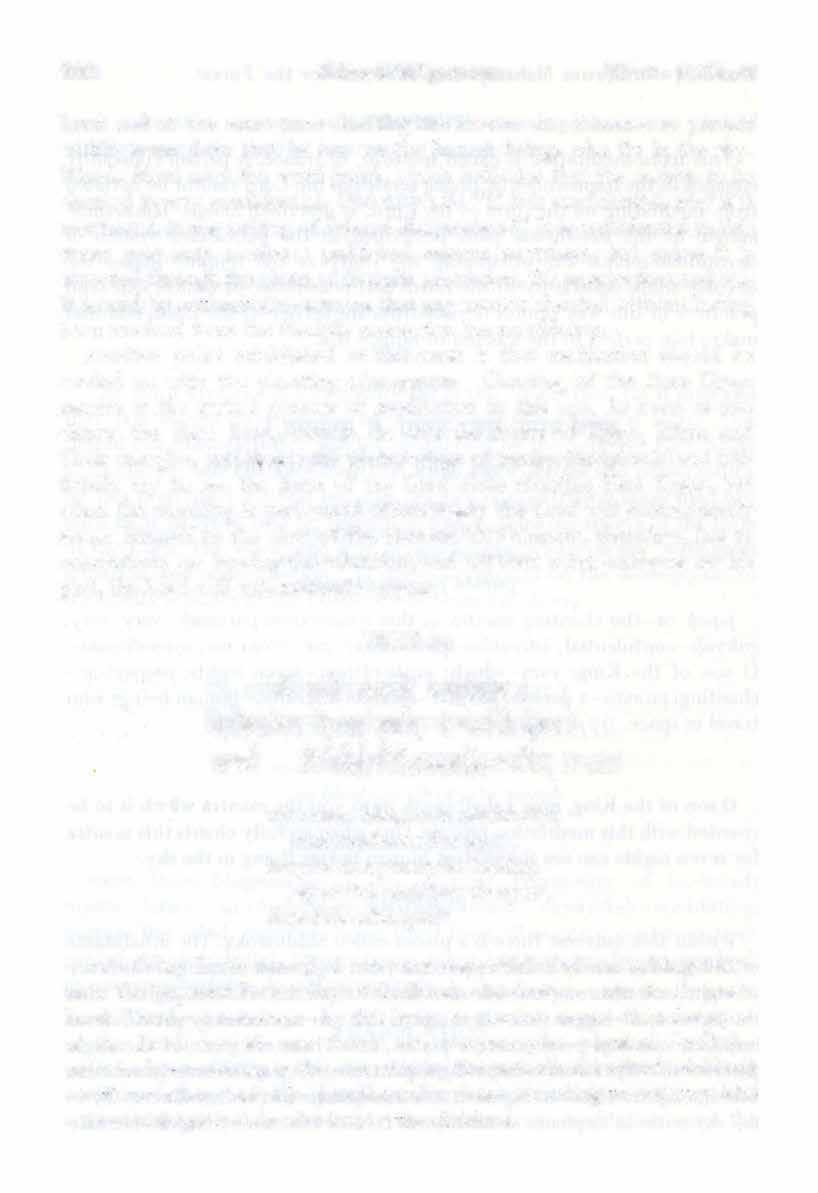
TEXT 54
a,;M � qlijC.ql� I apiuu�;c ���oq+t4f �: 1 � fit�Qi��14iR��fii•IM( 11"\\lll

om namo bhagavate viisudeviiya mantreriinena devasya
kuryiid dravyamayirh budha[l saparyiirh vividhair dravyair
desa-kiila-vibhiigavit
om-0 my Lord; nama[l-1 offer my respectful obeisances; bhagavateunto the Supreme Personality of Godhead; viisudeviiya-unto the Supreme Lord Vasudeva; mantrera-by this hymn or mantra; anena-this; devasyaof the Lord; kuryiit-one should do; dravyamayim-physical; budha[lone who is learned;saparyam-worship by the prescribed method; vividhai[l -with varieties; drav yai[l - paraphernalia ; desa-according to country; kala -time; vibhagavit- one who knows the divisions.
330 Srimad-Bhagavatam [Canto 4, Ch. 8
Orh namo bhagavate visudeviya. This is the twelve-syllable mantra for worshiping Lord Kr�l}a. One should install the physical forms of the Lord, and with the chanting of the mantra one should offer flowers and fruits and other varieties of foodstuffs exactly according to the rules and regulations prescribedby authorities. But this should be done in consideration of place, time and attendant conveniences and inconveniences.
PURPORT
Orh namo bhagavate vasudeviiya is known as the Dvadasak�ara-mantra. This mantra is chanted by V ai�rava devotees, and it begins with prarava, or orhkiira. There is an injunction that those who are not brahmaras cannot pronounce the prarava mantra. But Dhruva Maharaja was born a k�atriya. He at once admitted before Nirada Muni that as a k�atriya he was unable to accept his instruction of renunciation and mental equilibrium, which are the concern of a briihmara. Still, although not a briihmara but a k�atriya, Dhruva was allowed, on the authority of Narada, to pronounce the prarava orhkara. This is very significant. Especially in India, the caste brahmaras object greatly when persons from other castes, who are not born in brahmara families, recite this pmrava mantra. But here is tacit proof that if a person accepts the Vai�rava mantra or Vai�rava way of worshiping the Deity, he is allowed to chant the prarava mantra. In Bhagavad-gita the Lord personally accepts that anyone, even one of a low species, can be elevated to the highest position and go back home, back to Godhead, simply if he worships properly.
The prescribed rules, as stated here by Nirada Muni, are that one should accept the mantra through a bona fide spiritual master and hear the mantra in the right ear. Not only should one chant or murmur the mantra, but in front of him he must have the Deity or physical form of the Lord. Of course, when the Lord appears it is no longer a physical form. For example, when an iron rod is made red-hot in a fire, it is no longer iron; it is fire. Similarly, when we make a form of the Lordwhether of wood, or stone, or metal, or jewel, or paint, or even a form within the mind-it is a bona fide, spiritual, transcendental form of the Lord. One must not only receive the mantra from the bona fide spiritual master like Nirada Muni or his representative in the disciplic succession, but one must chant the mantra. And not only must one chant, but he should also offer whatever foodstuff is available in his part of the world, according to time and convenience.

Text 54] Dhruva Maharaja Leaves Home for the Forest 331
TRANSLATION
The method of worship-chanting the mantra and preparing the forms of the Lord-is not stereotyped, nor is it exactly the same everywhere. Itis specifically mentioned in this verse that one should take consideration of the time, place and available conveniences. Our Kr�l).a consciousness movement is going on throughout the entire world, and we also install Deities in different centers. Sometimes our Indian friends, puffed upwith concocted notions, criticize, "This has not been done. That has not been done." But they forget this instruction of Narada Muni to one of the greatest Vai�ravas, Dhruva Maharaja. One has to consider the particular time, country and conveniences. What is convenient in India may not be convenient in the Western countries. Those who are not actually in the 'line of iiciiryas, or who personally have no knowledge how to act in the role of iiciirya, unnecessarily criticize the activities of the ISKCON movement in countries outside of India. The fact is that such critics cannot do anything personally to spread Kr�l).a consciousness. If someone does go and preach, taking all risks and allowing all considerations for timeand place,it mightbe thatthere arechanges inthe manner ofworship, but that is not at all faulty according to siistra. Sriman Viraraghavacarya, an iiciirya in the disciplic succession of the Riimiinuja Sampradiiya, has remarked in his commentary that car-�iilas, or conditioned·souls who are born in lower than siidra families, can also be initiated according to circumstances. The formalities may be slightly changed here and there to make them Vai�ravas.
Lord Caitanya Mahiiprabhu recommends that His name should be heard in every nook and corner of the world. How is this possible unless one preaches everywhere? The cult of Lord Caitanya Mahiiprabhu is Bhiigavata-dharma, and He especially recommends Kr§TJa-kathii, or the cult of Bhagavad-gitii and Srimad-Bhiigavatam. He recommends that every Indian, considering this task as paropakiira, or welfare activity, take the Lord's message to other residents of the world. "Other residents of the world" does not refer only to those who are exact!y like the Indian briihmar-as or k§atriyas, or like the caste briihmar-as, who claim to be briihmar-as because they were born in the families of briihmarws. The principle that only Indians and Hindus should be brought into the Vai�rava cult is a mistaken idea. There should be propaganda to bring everyone to the Vai�rava cult. The Kr�l).a consciousness movement is meant for this purpose. There is no bar to propagating the Kr�l).a consciousness movement even among people who are born in cap{liila, mleccha or yavana families. Even in India, this point has been enunciated by Srila Sanatana Gosvami in his book Hari-bhakti-viliisa, which is smrti

332 Srimad-Bhagavatam [Canto 4, Ch. 8
and is the authorized Vedic guide for Vai�p.avas in their daily behavior. Sanatana Gosvami says that as bell metal can turn to gold when mixed with mercury in a chemical process, so, by the bona fide dik§ii or initiation method, anyone can become a Vai�p.ava. One should take initiation from a bona fide spiritual master coming in the disciplic succession who is authorized by his predecessor spiritual master. This is called dik�a-vidhiina.
Lord Kmta states in Bhagavad-gitii, vyapasritya: one should accept a spiritual master. By this process the entire world can be converted to Kr�t:J.a consciousness.
TEXT 55

�: �crt�M�e'fielfijlr: 1 \I�IFf�'flii�e�u &� � 11��11
salila* sucibhir miilyair vanyair mula-phaliidibh*
sastiil'tkuriimsukais ciircet tulasyii priyayii prabhum
salilai{t-by use of water; suci bhift -being purified;miilyai�-by garlands; vanyaift- of forest fl owers; mula-roots; phala-iidibhi�-by different kinds of vegetables and fruits; sasta-the newly grown grass; ahkura-buds; amsukai�-by the skin of trees, such as the bhurja ; ca-and; arcet-should worship; tulasyii-by the tulasi leaves; priyayii-which are very dear to the Lord;prabhu m-the Lord.
TRANSLATION
One should worship the Lord by offering pure water, pure flower garlands, fruits, flowers and vegetables, which are available in the forest, or by collecting newly grown grasses, small buds of flowers or even the skins of trees, and if possible, by offering tulasi leaves, which are very dea� to the Supreme Personality of Godhead.
PURPORT
It is specifically mentioned herein that tulasi leaves are very dear to the Supreme Personality of Godhead, and devotees should take particular care to have tulasi leaves in every temple and center of worship. In the Western countries, while engaged in propagating the Kr�t;ta consciousness movement, we were brought great unhappiness because we could not find tulasi leaves. We are very much obliged, therefore, to our disciple
Text 55) Dhruva Maharaja Leaves Home for the Forest 333
Srimati Govinda dasi because she has taken much care to grow tulasi plants from seeds, and she has been successful by the grace of Kr�J;�a. Now tulasi plants are growing in almost every center of our movement.
Tulasi leaves are very important in the method of worshiping the Supreme Personality of Godhead. In this verse the word salilai� means "by the water." Of course, Dhruva Maharaja was worshiping on the bank of the Yamuna. The Yamuna and the Ganges are sacred, and sometimes devotees in India insist that the Deity must be worshiped with water of the Ganges or Yamuna. But here we understand desa-hiila to mean "according to time and country." In the Western countries there is no River Yamuna or Ganges-water from such sacred rivers is not available. Does this mean that the arcii worship should be stopped for that reason? No. Salilaifi. refers to any water-whatever is available-but it must be very clear and collected purely. That water can be used. The other paraphernalia, such as flower garlands, fruits and vegetables, should be collected according to the country and according to their availability. Tulasi leaves are very important for satisfying the Lord, so as far as possible, an arrangement should be made for growing tulasi leaves. Dhruva Maharaja was advised to worship the Lord with the fruits and flowers available in the forest. In the Bhagavad-gitii Kr�J;�a frankly says that He accepts vegetables, fruits, flowers, etc. One should not offer Lord Vasudeva anything other than what is prescribed herein by the great authority Narada Muni. One cannot offer to the Deity according to one's whims, but since these fruits and vegetables are available anywhere in theuniverse, we should observe this small point very attentively.
TEXT 56

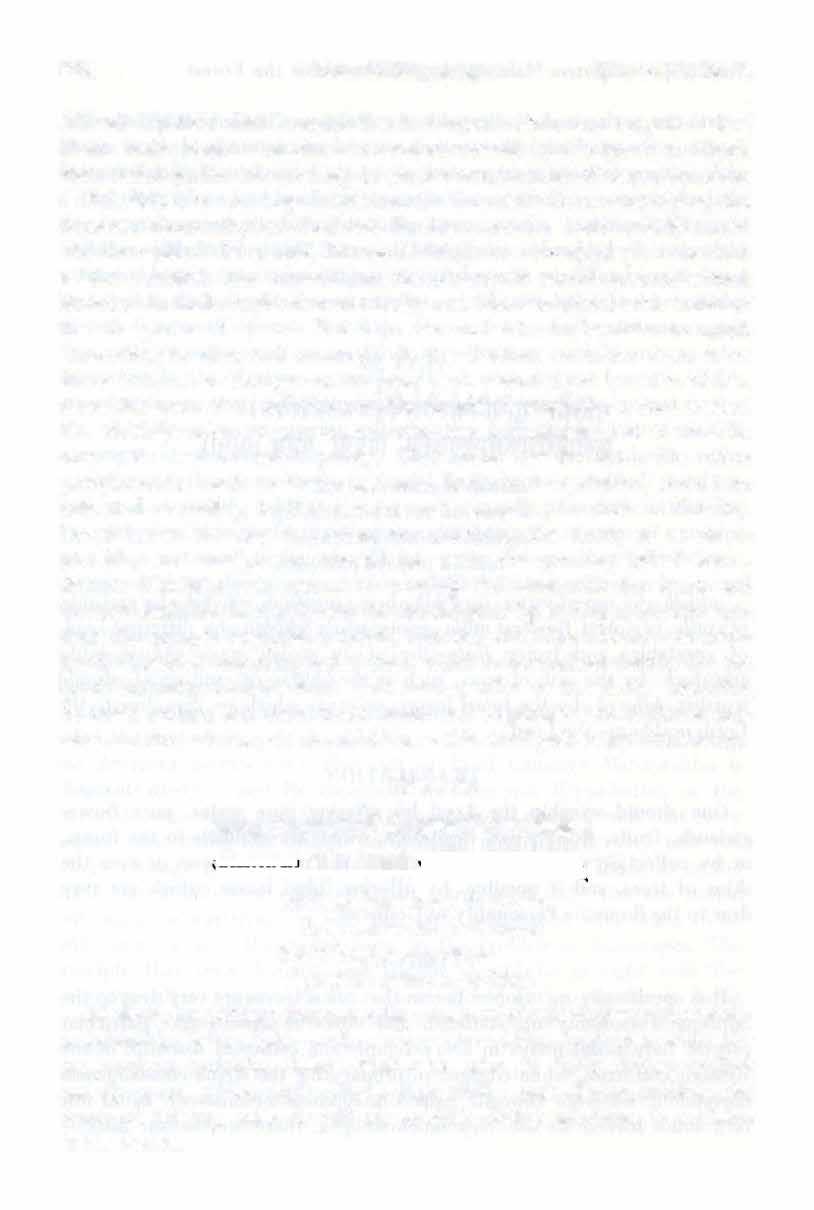
uf.l: � �' �"'"''"'' ....
labdhvii dravyamayim arciim k§ity-ambv-iidi§u viircayet iibhrtiitmii munifi. siinto
yataviin mita-vanya-bhuk
labdhvii-by getting; dravyamayim-made of physical elements; arciimworshipable Deity; k§iti-earth; ambu-water; iidi§u-beginning with; viior; arcayet-worship; iibhrta-iitmii-one who is fully self-controlled; munifi.-great personality; Siinta[l-peacefully; yataviik-controlling the force of talking; mita-frugal; vanya-bhuk-eating whatever is available inthe forest.


334 Srimad-Bhagavatam [Canto 4, Ch. 8
��sqf14ht'itlfP4�uqaR,;� 1
It is possible to worship a form of the Lord made of physical elements such as earth, water, pulp, wood and metal. In the forest one can make a form with no more than earth and water and worship Him according to the above principles. A devotee who has full control over his self should be very sober and peaceful and must be satisfied simply with eating whatever fruits and vegetables are available in the forest.
PURPORT
It is essential for a devotee to worship the form of the Lord and not only to meditate upon the form of the L�rd within his mind with the chanting of the mantra given by the spiritual master. The worship of the form must be present. The impersonalist takes unnecessary trouble to meditate upon or worship something impersonal, but this is very troublesome, and the path is very precarious. We are not advised to follow the impersonalist way of meditating or worshiping the Lord. Dhruva Maharaja was advised to worship a form made of earth and water because in the jungle, if it is not possible to have a form made of metal, wood or stone, the best process is to take earth mixed with water and make a form of the Lord and worship Him. The devotee should not be anxious about cooking food; whatever is available in the forest or in the city among the fruit and vegetable groups should be offered to the Deity, and the devotee should be satisfied eating that. He should not be anxious to have very palatable dishes. Of course, wherever it is possible, one should offer the Deities the best foodstuffs, prepared within the category of fruits and vegetables, cooked or uncooked. The important factor is that the devotee should be regulated (mita-bhuk); that is one of the good qualifications of a devotee. He should not hanker to satisfy the tongue with a particular kind of foodstuff. He should be satisfied to eat whatever prasiidam is available by the grace of the Lord.

Text 57) Dhruva Mahanija Leaves Home for the Forest 335 TRANSLATION
�._4M61NRijd��MiifqliJili I •ftctl��qi\EfM'!�''"'"'' svecchiivatiira-caritair acintya-nija-miiyayii ka�yaty uttamaslokas tad dhyiiyed dhrdaymigamam
TEXT 57
sva-icchii-by His own supreme will; avatiira- incarnation ; caritaiftactivities; acintya-inconceivable ; nija-miiyayii-by His own potency; kari§yati-performs; uttama-slokaft-the Supreme Personality of Godhead; tat- that ; dhyiiyet-one should meditate; hrdayan gamam- very attractive.
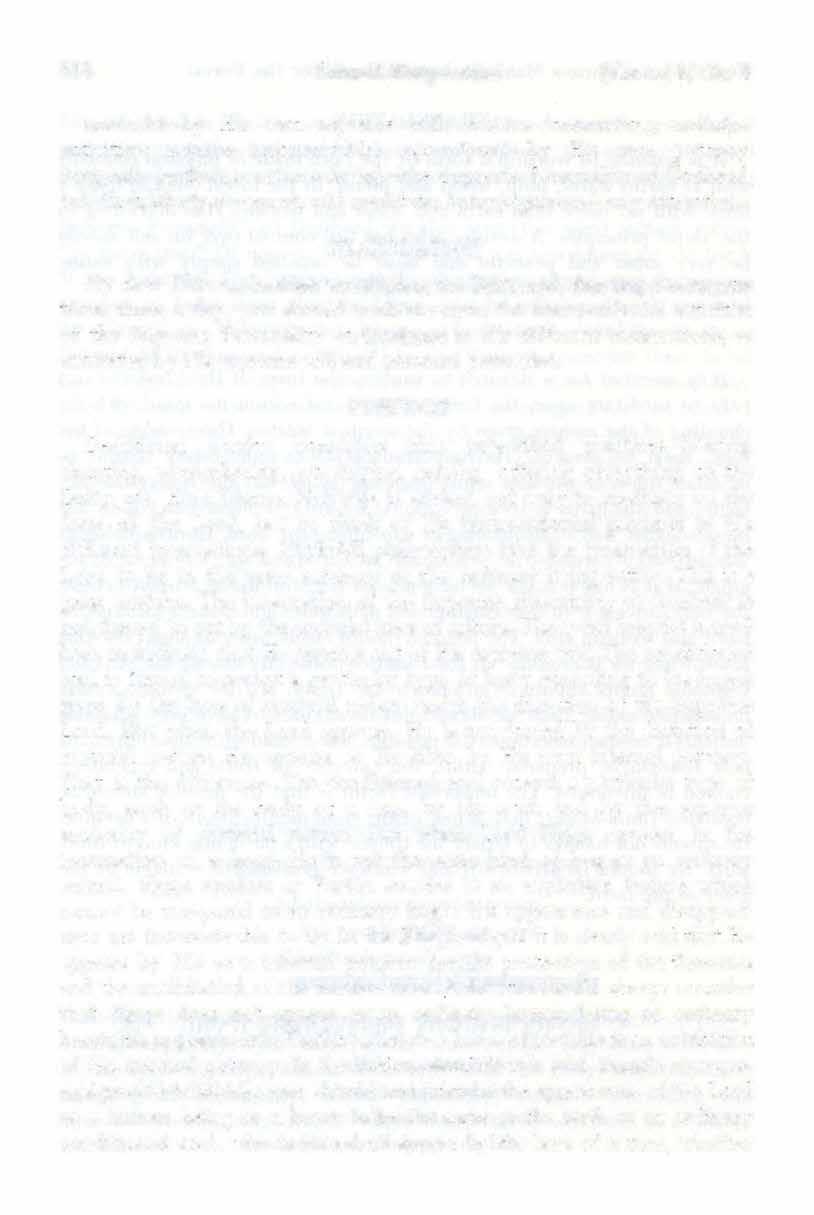
TRANSLATION
My dear Dhruva, besides worshiping the Deity and chanting the mantra three times a day, you should meditate upon the transcendental activities of the Supreme Personality of Godhead in His different incarnations, as exhibited by His supreme will and personal potencies.
PURPORT
Devotional service comprises nine prescribed practices-hearing, chanting, remembering, worshiping, serving, offering everything to the Deity, etc. Here Dhruva Maharaja is advised not only to meditate on the form of the Lord, but to think of His transcendental pastimes in His different incarnations. Mayavadi philosophers take the incarnation of the Lord to be in the same category as the ordinary living entity. This is a great mistake. The incarnation of the Supreme Personality of Godhead is not forced to act by the material laws of nature. The word svecchii is used here to indicate that He appears out of His supreme will. The conditioned soul is forced to accept a particular type of body according to his karma given by the laws of material nature under the direction of the Supreme Lord. But when the Lord appears, He is not forced by the dictation of material nature; He appears as He likes by His own internal potency. That is the difference. The conditioned soul accepts a particular type of body, such as the body of a hog, by his work and by the superior authority of material nature. But when Lord Kr�Qa appears in the incarnation of a boar, He is not the same kind of hog as an ordinary animal. Kr�Qa appears as V araha avatiira in an expansive feature which cannot be compared to an ordinary hog's. His appearance and disappearance are inconceivable to us. In the Bhagavad-gitii it is clearly said that He appears by His own internal potency for the protection of the 'tlevotees and the annihilation of the nondevotees. A devotee should always consider that Kr�Qa does not appear as an ordinary human being or ordinary beast; His appearance as Varaha-miirti or a horse or tortoise is an exhibition of His internal potency. In the Brahma-sarhhitii it is said, iinanda-cinmayarasa-pratibhiivitiibhi[l: one should not mistake the appearance of the Lord as a human being or a beast to be the same as the birth of an ordinary conditioned soul, who is forced to appear by the laws of nature, whether
336 Srimad-Bhagavatam [Canto 4, Ch. 8
as an animal, as a human being or as a demigod. This kind of thinkingis offensive. Lord Caitanya Mahaprabhu has condemned the Mayavadis as offensive to the Supreme Personality of Godhead because of their thinking that the Lord and the conditionedlivingentitiesare one and the same.
Narada advises Dhruva to meditate on the pastimes ofthe Lord, which is as good as the meditation of concentrating one's mind on the form of the Lord. As meditation on any form of the Lord is valuable, so is chanting of different names of the Lord, such as Hari, Govinda and Narayatla. But in this age we are especially advised to chant the Hare Kr�t:Ja mantra as enunciated in the siistra: Hare Kr�Qa, Hare K.r�r;ta, Kr�t:Ja K.r�t:Ja, Hare Hare/ Hare Rama, Hare Rama, Rama Rama, Hare Hare. qf(:q�i
TEXT 58
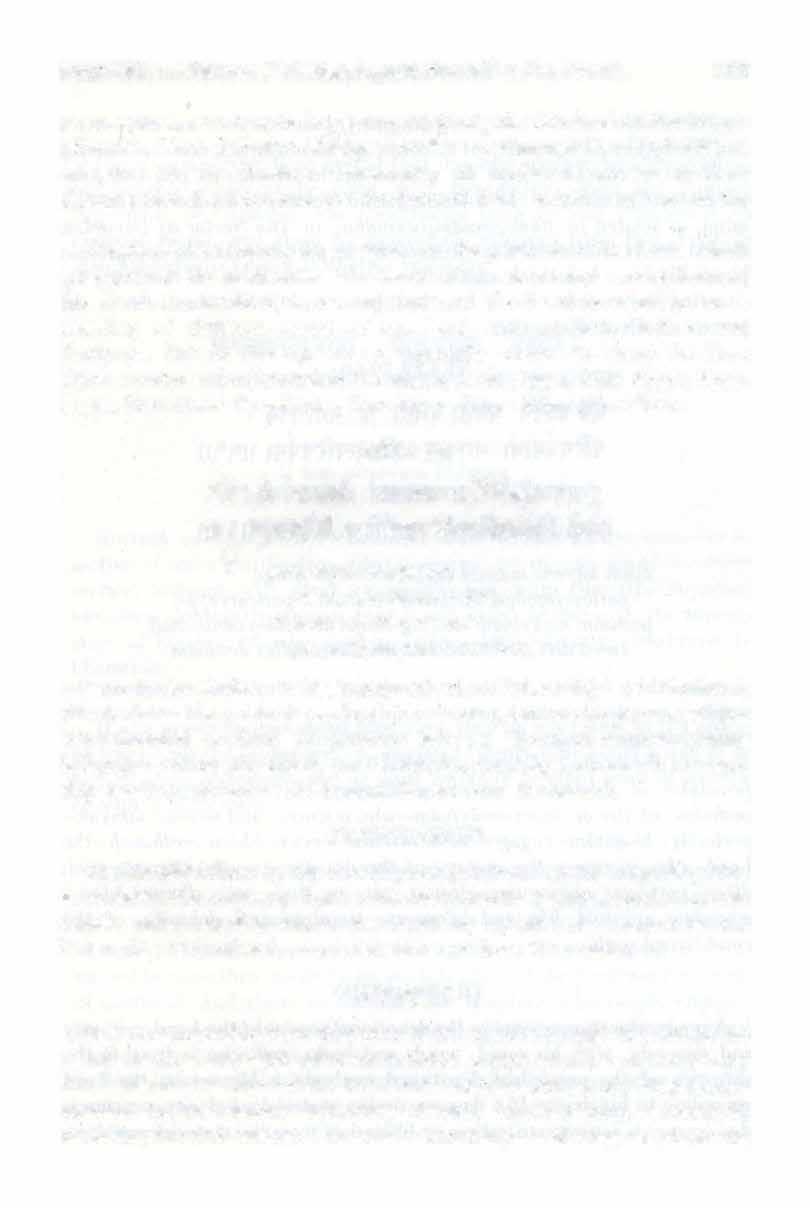
�tt:
paricaryii bhagavato yiivatya{l, piirva-sevitii{l, tii mantra-hrdayenaiva prayunjyiin mantra-miirtaye
paricaryii{l,-service; bhagavata{l,-of the Personality of Godhead; yiivatya{l,-as they are prescribed (as above mentioned); piirva-sevitii�recommended or done by previous iiciiryas; tii�- that ; mantra-hymns; hrdayena- within the heart; eva-certainly; prayunjyiit-one should worship; mantra-miirtaye-who is nondifferent from the mantra.
TRANSLATION
One should follow in the footsteps of previous devotees regardinghow to worship the Supreme Lord with the prescribed paraphernalia, or one should offer worship within the heart by reciting the mantra to the PersonalityofGodhead,whois nondifferent from themantra.
PURPORT
It is recommended here that even if one cannotarrange to worshipthe forms of the Lord with all recommended paraphernalia, one can simply think about the form of the Lord and mentally offer everything recommended in ·the siistras, including flowers, candana pulp, conchshell, umbrella, fan and ciimara. One can meditate upon offering and chant the
Text 58] Dhruva Maharaja Leaves Home for the Forest 337
� m �51«��q
'l4�Aaa: I
Sl'l��•ll'"¥4.-5f'{dlt ����II
twelve-syllable mantra, orh namo bhagavate viisudeviiya. Sincethe mantra andtheSupremePersonalityofGodheadarenondifferent,onecanworship the form of the Lord with the mantra in the absenceof physical paraphernalia. Thestoryofthe briihmar-a who worshipedtheLordwithinhis mind, as related in Bhakti-rasiimrta-sindhu, or The Nectar of Devotion, should be consulted in this connection. If paraphernalia is not present physically, one can think of the items and offer them to the Deityby chanting the mantra. Such are the liberal and potent facilities in the processofdevotionalservice.
TEXTS 59-60
evam kiiyena manasii vacasii ca mano-gatam paricaryamiir-o bhagavifn bhaktimat-paricaryayii pumsiim amiiyiniirh samyag bhajatiim bhiiva-vardhana� sreyo disaty abhimatarh yad dharmiidi§U dehiniim
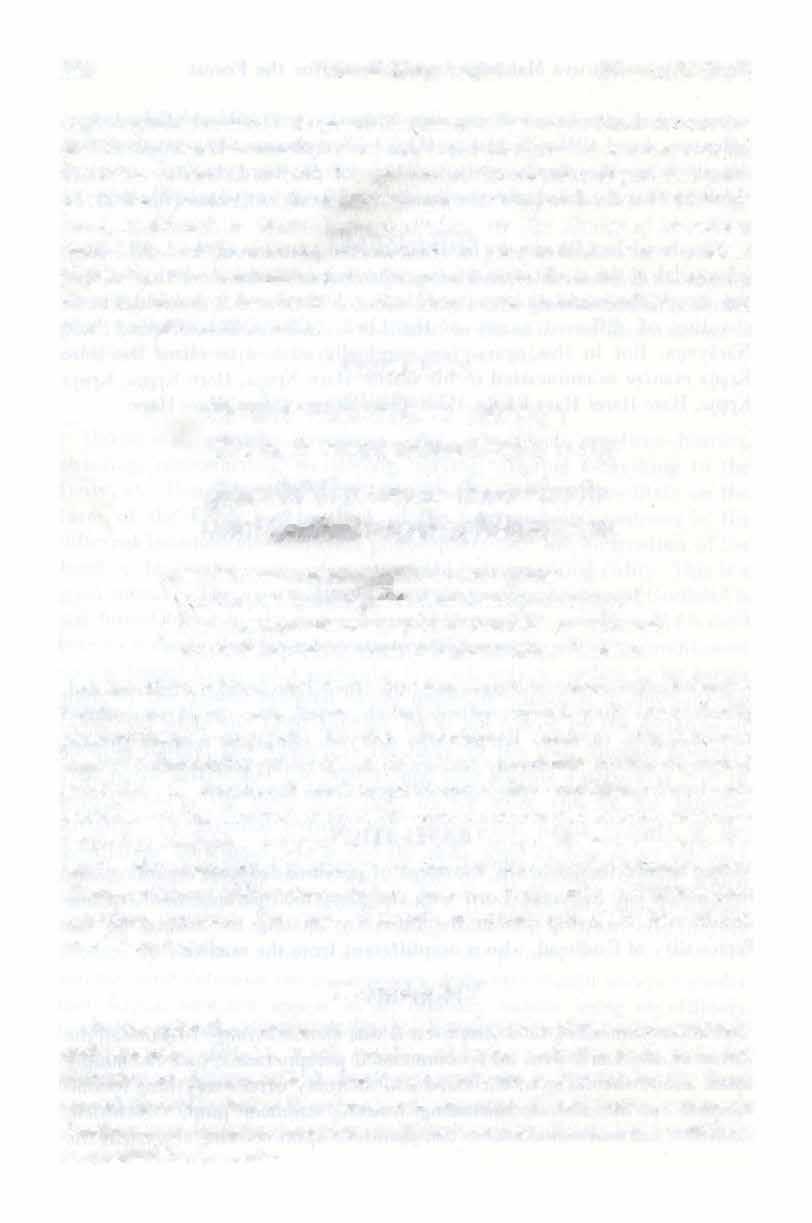
evam-thus; kiiyena-by thebody; manasii-by themind; vacasii-by the words; ca-also; mana�-gatam-simply by thinking of the Lord; paricaryamiir-a�-engaged in the devotional service; bhagaviin-the Supreme Personalityof Godhead; bhaktimat-according to the regulative principles of devotional service; paricaryayii-by worshiping the Lord; pumsiim-of the devotee; amiiyiniim-whoissincereandserious; samyakperfectly; bhajatiim-engaged in devotional service; bhiiva-vardhana�-the Lord, who increases the ecstasy of the devotee; sreya�-ultimate goal; diSati-bestows; abhimatam-desire; yat-as they are; dharma-iid�uregarding spiritual life and economic development; dehiniim-of the conditionedsouls.
TRANSLATION
Anyone who thus engages in the devotional service of the Lord, seriously and sincerely, with his mind, words and body, and who is fixed in the activities of the prescribed devotional methods, is blessed by the Lord according to his desire. If a devotee desires material religiosity, economic development, sense gratification or liberation from the material world, he is awarded these results.
338 Srlmad-Bhagavatam [Canto 4, Ch. 8
���.·� tf� � 'lr.q;w:rr.l•l'r.ll�l'ft'( I qft�+tluflll1f.rr-ll4Rfi+t�qf(:q��� ����II
I ����fllq� �4:¥(\R!«:R:wtl(ll�oll
�lttfiriff � �:
Devotional service is so potent that one who renders devotional service can receive whatever he likes as a benediction from the Supreme Personality of Godhead. The conditioned souls are very attached to the material world, and thus, by performing religious rites, they want the material benefits known as dharma and artha.
viraktascendriya-ratau
bhakti-yogena bhiiyasii tam nirantara-bhiivena
bhajetiiddhii vimuktaye
virakta� ca-completely renounced order of life; indriya-ratau-in the matter of sense gratification; bhakti-yogena-by the process of devotional service; bhiiyasii- with great seriousness; tam-unto Him (the Supreme); nirantara-constantly, twenty-four hours daily; bhiivena-in the topmost stage of ecstasy; bhajeta-must worship; addha-directly ; vimu. ktaye-for liberation.
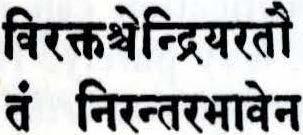

TRANSLATION

If one is very serious about liberation, then he must stick to the process of transcendental loving service, engaging twenty-four hours a day in the highest stage of ecstasy, and he must certainly be aloof from all activities of sense gratification.
PURPORT
There are different stages of perfection according to different persons' objectives. Generally people are karmis, for they engage in activities of sense gratification. Above the karmis are the jniinis, who are trying to become liberated from material entanglement. Yogis are still more advanced because they meditate on the lotus feet of the Supreme Personality of Godhead. And above all these are the devotees, who simply engage in the transcendental loving service of the Lord; they are situated seriously on the topmost platform of ecstasy.
Here Dhruva Maharaja is advised that if he has no desire for sense gratification, then he should directly engage himself in the transcendental loving service of the Lord. The path of apavarga, or liberation, begins from the stage called mok�a. In this verse the word vimuktaye, "for liberation,"
Text 61] Dhruva Maharaja Leaves Home for the Forest 339
PURPORT
��if
is especially mentioned. If one wants to be happy within this material world, he may aspire to go to the different material planetary systems where there is a higher standard of sense gratification, but real mok§a or liberation is performed without any such desire. This is explained in the Bhakti-rasiimrta-sindhu by the term anyiibhilii§itii-siinyam, "without desire formaterial sense gratification." Forpersons who are still inclinedto enjoy material life in different stages or on different planets, the stage ofliberation in bhakti-yoga is not recommended. Only persons who are completely free from the contamination of sense gratification can execute bhaktiyoga, or the process of devotional service, very purely. The activities on the path of apavarga up to the stages of dharma, artha and kiima are meant for sense gratification, hut when one comes to the stage of mok§a, the impersonalist liberation, the practitioner wants to merge into the existence of the Supreme. But that is also sense gratification. When one goes above the stage of liberation, however, he at once becomes one of the associates of the Lord to render transcendental loving service. That is technically called mukti. For this specific vimukti liberation Narada Muni recommends that one directly engage himself in devotional service.
TEXT 62
�����Q qf(rtlRt SIOTRJ � �: I � � � ��������II

ity uktas tam parikramya
prarzamya ca nrpiirbhaka[l yayau madhuvanarh purzyarh
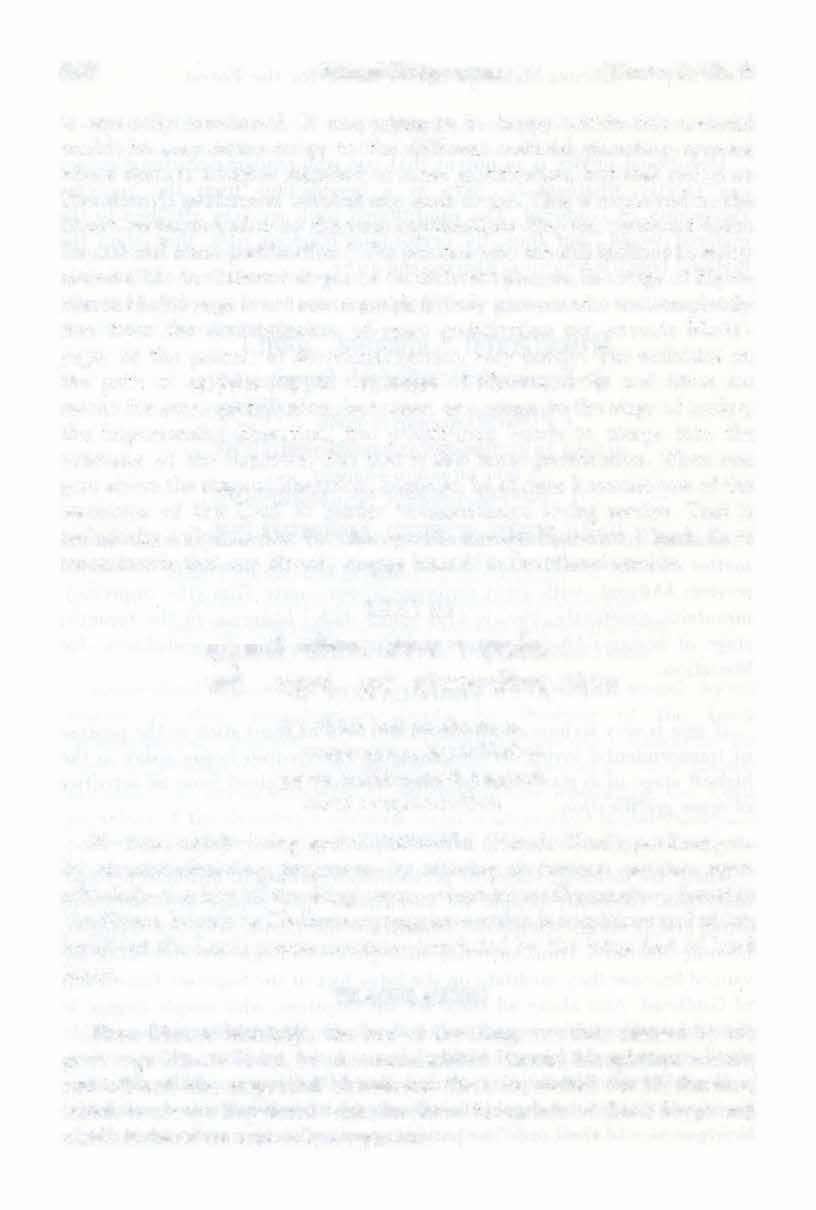
hares cararza-carcitam
iti-thus; ukta[l -being spoken; tam-him (Narada Muni); parikramyaby circumambulating; prarzamya-by offering obeisances; ca-also; nrpaarbhaka[l-the boy of the King ; yayau-went to; madhuvanam-a forest in Vrndavana known as Madhuvana; puryam- which is auspicious and pious; hare[l-of the Lord; cararza-carcitam-imprinted by the lotus feet of Lord Kt�Qa.
TRANSLATION
When Dhruva Maharaja, the son of the King, was thus advised by the great sage Narada Muni, he circumambulated Narada, his spiritual master, and offered him respectful obeisances. Then he started for Madhuvana, which is always imprinted with the lotus footprints of Lord Kr�;�r;ta and which is therefore especially auspicious.
340 Srimad-Bhagavatam [Canto 4, Ch. 8
Text 64) Dhruva Maharaja Leaves Home for the Forest

TEXT 63

� � J#f: I stff<tltul�l � ij('41«\Wi �R �11,�11
tapo-vanam gate tasmin
prav4to'nta�-puram mun*
arhitiirhacwko riijiiii
sukhiisina uviica tam
tapa�-vanam-the forest path where Dhruva Maharaja executed his austerity; gate-:having thus approached; tasmin- there; prav4ta�- having entered; anta�-puram-within the private house; muni�-the great sage Narada; arhita-being worshiped; arharwka�-by respectful behavior; riijiiiiby the King; sukha-asina�-when he comfortably sat on his seat; uviicasaid; tam-unto him (the King) .

TRANSLATION
After Dhruva entered Madhuvana Forest to execute devotional service, the great sage Narada Muni thought it wise to go to the King to see how he was faring within the palace. When Narada Muni approached, the King received him properly, offering him due obeisances. After being seated comfortably, Narada began to speak.
TEXT 64 ;m:a:�
�It �q� ;::� �qf{@Wt<tl I
"�';{ft"� ���N;t ��: II�'ill
niirada uviica
rajan kim dhyayase dirgham
mukhena parisu�yatii
kim vii na ri§yate kiimo
dharmo viirl;hena samyuta�
narada� uviica- the great sage Narada Muni said; riijan-my dear King; kim-what; dhyiiyase-thinking of; dirgham- very deeply; mukhena-with your face; parisufiyatii-as if drying up; kim vii-whether; na-not; rifiyatebeen lost; kiima�-sense grati fica tion; dharma�-reJjgious rituals; vii-or; arthena-with economic development; sarhyuta�t-along with.
341
The great sageNarada Muniinquired: My dearKing,yourfaceappears tobewitheringup,andyoulooklikeyouhavebeenthinkingofsomething fora very longtime. Why is that? Haveyou beenhampered infollowing your path of religious rites, economic development and sense gratification?

PURPORT
The four stages of advancement of human civilization are religiosity, economic development, sense gratification and, for some, the stage of liberation. Narada Muni did not inquire from the King about his liberation, but only regarding the state management, which is meant for advancement of the three principles of religiosity, economic development and sense gratification. Since those who engage in such activities are not interested in liberation, Narada did not inquire from the King about this. Liberation is meant for persons who have lost all interest in religious ritualistic ceremonies, economic development and sense gratification.
TEXT65 <tit6Jt4lf
wR�� � �Yl"tl��oll€¥4'11 I
MC4lfeil:q�: � m;rt ¥{6}r€fiN: II��I/
riijoviica
suto me biilako brahman
straiveniikarnviitmanii nirvasita� paiica-var�afl
saha miitrii mahan kavi�
riijii uviica- the King replied; suta� - so n; me - my ; biilaka�- tender boy; brahman-my dear briihmapa; strairzena- one who is too addicted to his wife; akarnrii-iitmanii-one who is very hard of heart and without mercy; nirviisita� -is banished; paiica-var�a�-althou gh the boy is five years old; saha-with; miitrii- mother; mahiin- great personality; kav*devotee.
TRANSLATION
The King replied: 0 bestofthebrahma�as, I amverymuchaddictedto my wife, and I am so fallen that I haveabandoned allmercifull;lehavior,
342 Srimad-Bhagavatam [Canto 4, Ch. 8
TRANSLATION
even to my son, who is only five years old. I have banished him and his mother, even though he is a great soul and a great devotee.
PURPORT
In this verse there are some specific words which are to be understood very carefully. The King said that since he was very much addicted to his wife, he had lost all his mercy. That is the result of becoming too affectionate towards women. The King had two wives; the first wife was Sunlti, and the second was Suruci. He was too attached to the second wife, however, so he could not behave well with Dhruva Maharaja. That was the cause of Dhruva's leaving hometo perform austerities. Although as a father the King was affectionate towards his son, he minimized his affection for Dhruva Maharaja because he was too much addicted to the second wife. Now he was repenting that both Dhruva Maharaja and his mother, Suniti, were practically banished. Dhruva Maharaja went to the forest, and since his mother was being neglected by the King, she was, therefore, almost banished also. The King was repentant for banishing his boy because Dhruva was only five years old and a father should not banish his wife and children or neglect their maintenance. Repentant over his neglect of both Suniti and her son, he was morose, and his face appeared withered. According to Manu-smrti, one should never desert his wife and children. In a case where the wife and children are disobedient and do not follow the principles of home life, they are sometimes given up. But in the case of Dhruva Maharaja this was not applicable because Dhruva was very mannerly and obedient. He was, moreover, a great devotee. Such a person is never to be neglected, yet the King was obliged to banish him. Now he was very sorry.
TEXT 66

�q Cl� ;m;:qi�IC::�<:�� m: I
� �tfFi �mqf<+<?H9tf!(cc•"�¥(������
apy aniitharh vane brahman mii smiidanty arbhakarh vrkii�
sriintarh sayiinarh k�udhitarh parimliina-mukhiimbujam
api-certainly; anatham-without being protected by anyone; vane-in the forest; brahman-my dear brahma"{la; mii-whether or not; sma-did not; adanti-devour; arbhakam-the helpless boy; vrka� -wolves; srantam-

Text 66) Dhruva Maharaja Leaves Home for the Forest 343
being fatigued; sayanam-lying down; k§udhitam-being hungry; parimlana-emaciated; mukha-ambujam-his face, which is just like a lotusflower.
TRANSLATION
My dear brahmapa, the face of my son wasjust like a lotus flower. I am thinking of his precarious condition. He is unprotected, and he might be very hungry. He might have lain down somewhere in the forest, and the wolves might have attacked him to eat his body.
TEXT67

Qt� 'Rr G.1�t<:Ri ���I
�siitwnss���;:ij�;;::+t('(fl+t:II�\911
aho me bata dauratmyam strf-jitasyopadharaya yo'nkam prem[lli' 'ruruk�antam nabhyanandam asattama�.
ah o- alas ; me-my; bata-certainly; dauratmyam-cruelty; strf-jitasyaconquered by a woman;upadharaya-just thinkof meinthisregard; ya�who; ankam-lap;premT).a-out oflove;aruruk�antam-trying to riseonit; na-not; abhyanandam-receivedproperly; asattama�-the mostcruel.
TRANSLATION
Alas, just see how I was conquered by my wife! Just imagine my cruelty! Out of love and affection the boy was trying to get up on my lap, but I did not receive him, nor did I even pat him for a moment. Just imagine how hardhearted I am.
TEXT68 ��
�� �: � � fft�l+<t�I
GdUtPf+t�(lli4 mti � �II��II
narada uv'iica ma ma suca� sva-tanayam deva-guptarh visampate tat-pra-bhavam avipiiiya priivrnkte yad-ya5o jagat
344 Srimad-Bhagavatam [Canto 4, Ch. 8
niirada� uviica-the great sage Narada Muni said; mii-do not; mii-do not; su ca�-be aggrieved; sva-tanayam-of your own son; deva-guptamhe is well protected by the Lord; visiimpate-0 master of human society; tat-his; prabhavam-influence; avijiiaya-without knowing; pravpiktewidespread; yat-whose; yas'a�-reputation; jagat-all over the world.
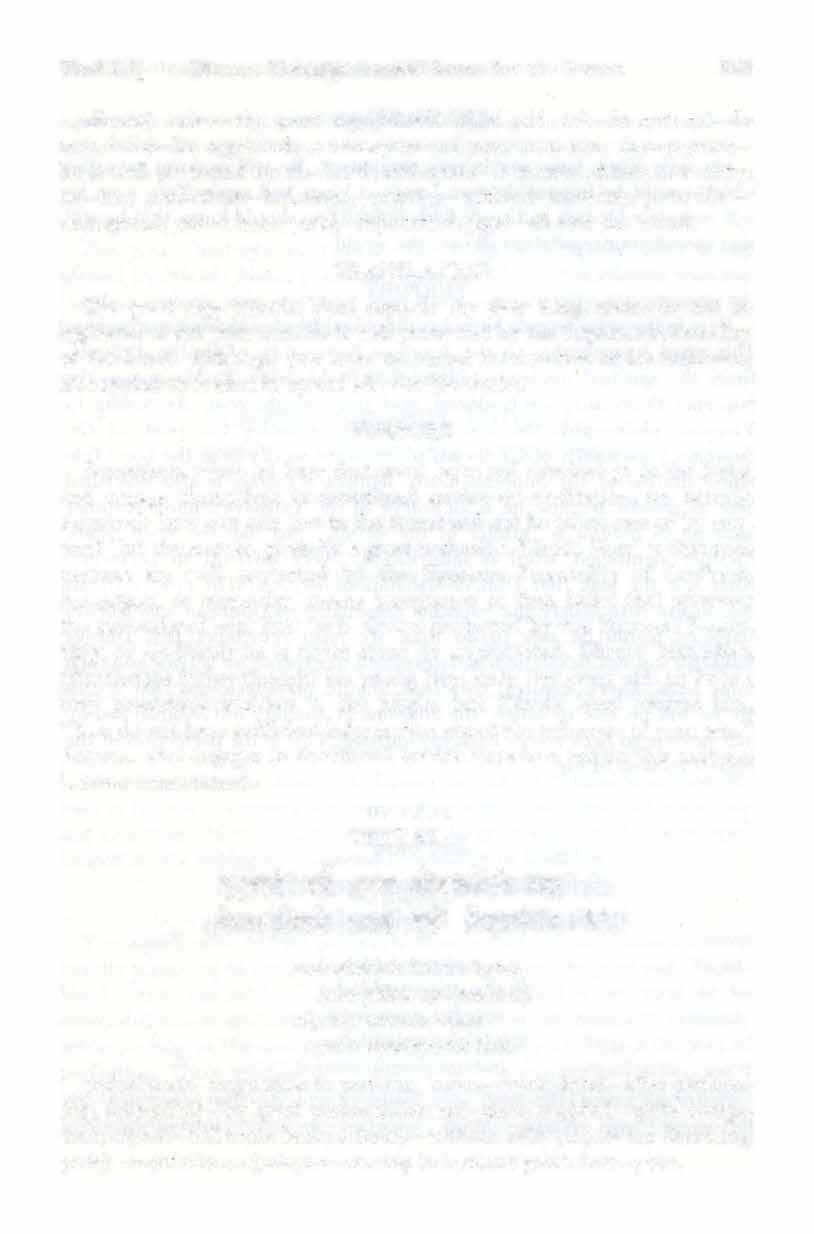
TRANSLATION
The great sage Narada Muni replied: My dear King, please do not be aggrieved about your son. He is weD protected by the Supreme Personality of Godhead. Although you have no actual information of his influence, his reputation is already spread aU over the world.
PURPORT
Sometimes when we hear that great sages and devotees go to the forest and engage themselves in devotional service or meditation, we become surprised: how can one live in the forest and not be taken care of by anyone? But the answer, given by a great authority, Narada Muni, is that such persons are well protected by the Supreme Personality of Godhead. Sararuigati, or surrender, means acceptance or firm belief that wherever the surrendered soul lives he is always protected by the Supreme Personality of Godhead; he is never alone or unprotected. Dhruva Maharaja's affectionate father thought his young boy, only five years old, to be in a very precarious position in the jungle, but Narada Muni assured him, "You do not have sufficientinformation about the influence of your son." Anyone who engages in devotional service anywhere within this universe is never unprotected.
TEXT 69
ij�{ d � al'f*q�dq q: I �<:��«11
sudu�kararh karma krtvii
loka-piilair api prabhu�
a4yaty acirato riijan
yaso vipulayams tava
sudu�karam - impossibleto perform; karma-work; krtva-after performing; loka-piilai�-by great personalities; api-even; prabh u�-quite competent; aiuati- willcome back; acirata� - withoutdelay; riijan-mydear King; yasa�- reputation ; vipu layan-causing to become great; tava-your.
Text 69] Dhruva Maharaja Leaves Home for the Forest 345
� �it �,;�4�������
My dear King, your son is very competent. He will perform activities which would be impossible even for great kings and sages. Very soon he will complete his task and come back home. You should know that he will also spread your reputation all over the world.
PURPORT
Here inthisverse Narada Muni has described Dhruva Maharaja as prabhu. This word is applicable to the Supreme Personality of Godhead. Sometimes the spiritual master is addressed as Prabhupada. Prabhu means the Supreme Personality of Godhead, and piida means post. According to Vai�l)ava philosophy the spiritual master occupies the post of the Supreme Personality of Godhead, or in other words he is the bona fide representative of the Supreme Lord. Dhruva Maharaja is also described here as prabhu because he is an acarya of the Vai�l}ava school. Another meaning of prabhu is "master of the senses," just like the word svami Another significant word is sudu�karam, "very difficult to perform." What was the task that Dhruva Maharaja undertook? The most difficult task in life is to satisfy the Supreme Personality of Godhead, and Dhruva Maharaja would be able to do that. We must remember that Dhruva Maharaja was not fickle;he was determined to execute his service and then come back. Every devotee, therefore, should be determined that in this life he will be able to satisfy the Supreme Personality of Godhead and by that process go back home, back to Godhead. That is the perfection of the highest mission of life.

346 Srimad-Bhigavatam [Canto 4,Ch.8
TRANSLATION
TEXT70 �� ��Mansffi5 �Gt•a�qf<l: 1 �""i(Wfl® ��lf41�M;{14.1( ll\Soll
uvaca iti deva�i!lii proktam viSrutya jagati-pati� roja-lak�mim anadrtya putram eviinvacintayat maitreya� uvaca-the great sage Maitreya said; iti-thus; devar$i!lii-by the great sage Nirada Muni ; proktam-spoken; viSrutya-hearing ;
maitreya
jagat"i-pati�-the King; raja-lak§m"im-the opulence of his big kingdom; aniidrtya-without taking care of; putram-his son; eva-certainly; anvacintayat-began to think of him.
TRANSLATION
The great Maitreya continued: The King, Uttanapada, after being advised by Narada Muni, practically gave up all duties in relation with his kingdom, which was very vast and wide, opulent like the goddess of fortune, and he simply began to think of his son Dhruva.
TEXT 71
�: SltJ�(ijUJtft'Q R+Wt(h( I
(iiu�: q4:q(t:'41��'1 �ll\9tll
tatrabhi�ikta� prayatas tam upo�ya vibhavarim samahita� paryacarad r�yadesena puru�am
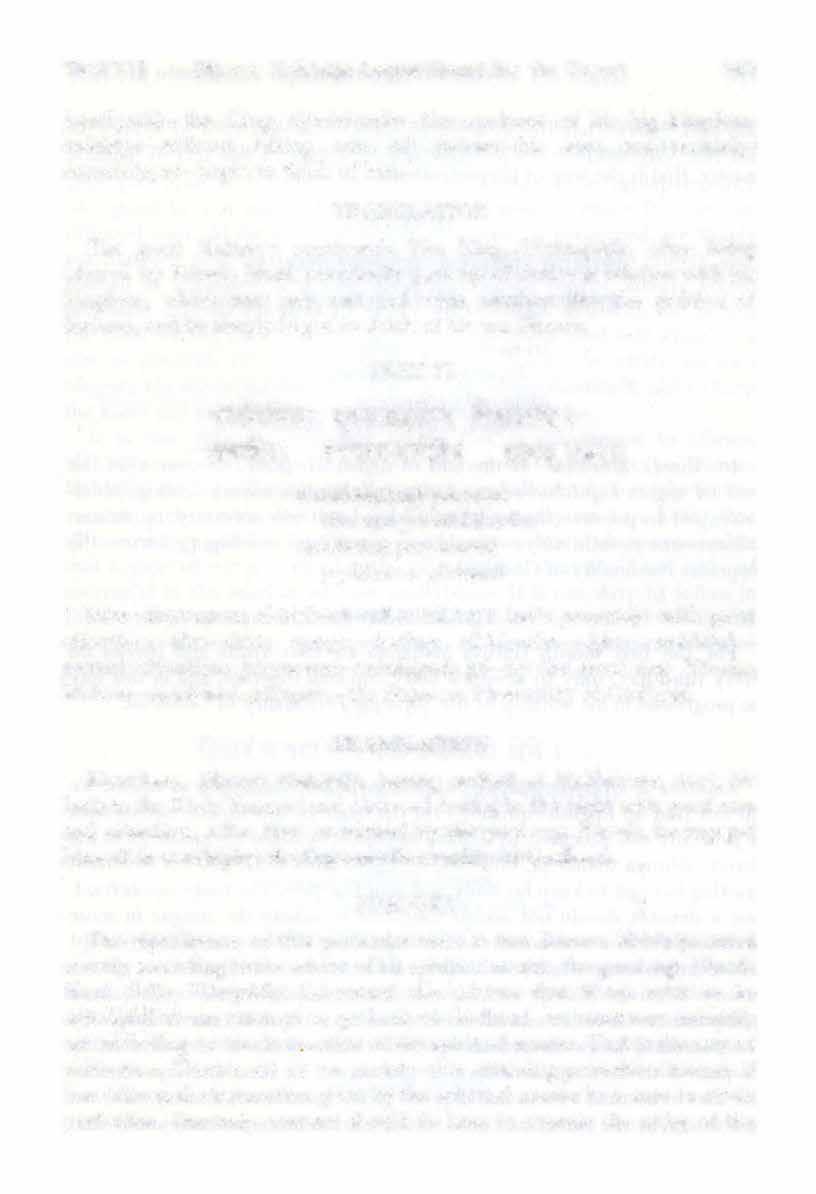
tatra-thereupon; abhi$ikta�-after taking a bath; prayata�-with great atfention; tam-that; upo�ya-fasting; vibhavar"im-night; samahita�perfect attention; paryacarat-worshiped; r�i-by the great sage Narada; adesena-as advised; puru�am-the Supreme Personality of Godhead.
TRANSLATION
Elsewhere, Dhruva Maharaja, having arrived at Madhuvana, took his bath in the River Yamuna and observed fasting in the night with great care and attention. After that, as advised by the great sage Narada, he engaged himself in worshiping the Supreme Personality of Godhead.
PURPORT
The significance of this particular verse is that Dhruva Maharaja acted exactly according to the advice of his spiritual master, the great sage Narada Muni. Srila Visvanatha Cakravarfi also advises that if we want to be successful in our attempt to go back to Godhead, we must very seriously act according to the instruction of the spiritual master. That is the way of perfection. There need be no anxiety over attaining perfection because if one follows the instruction given by the spiritual master he is sure to attain perfection. Our only concern should be how to execute the order of the
Text 71) Dhruva Maharaja Leaves Home for the Forest 347
spiritual master. A spiritual master is expert in giving special instructions to each of his disciples, and if the disciple executes the order of thespiritual master, that is the way of his perfection.
TEXT 72



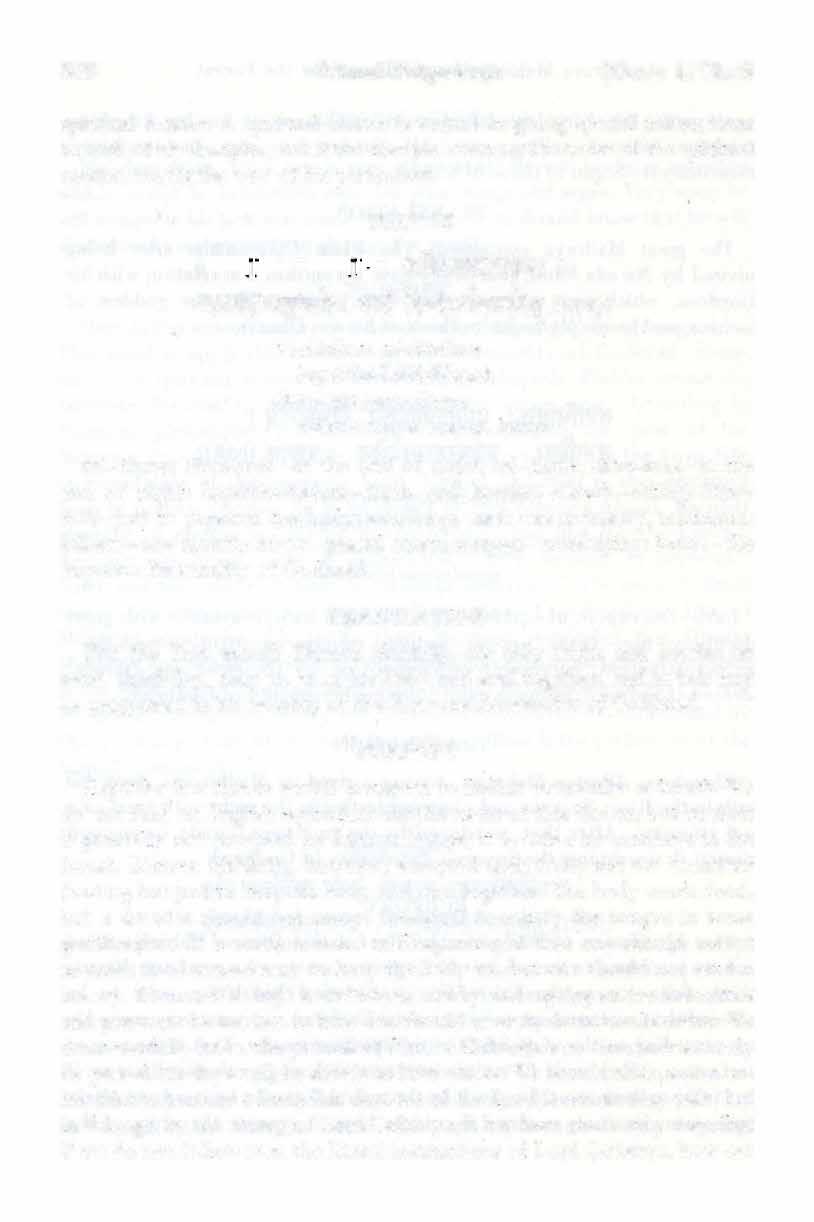
tri-riitriinte tri-riitriinte kapittha-badariisana�
iitma-vrtty-anusiire!ta miisarh ninye 'rcayan harim
tri-three; riitra-ante-at the end of night; tri - three; riitra-ante-at the end of night; kapittha-badara-fruits and berries; asana� - eating; iitmavrtti- just to preserve the body; anusiire(w-as it was necessary, minimum; miisam-one month; ninye-passed away; arcayan- worshiping; harim-the Supreme Personality of Godhead.




TRANSLATION
For the first month Dhruva Maharaja ate only fruits and berries on every third day, only to keep his body and soul together, and in this way he progressed in his worship of the Supreme Personality of Godhead.
PURPORT
Kapittha is a flower which is known in Indian vernacular as kouth. We do not find an English equivalent for the name of this flower, but its fruit is generally not accepted by human beings; it is eaten by monkeys in the forest. Dhruva Maharaja, however, accepted such fruit, not for luxuriant feasting but just to keep his body and soul together. The body needs food, but a devotee should not accept foodstuff to satisfy the tongue in sense gratification. It is recommended in Bhagavad-gitii that one should accept as much food as necessary to keep the body fit, but one should not eat for luxury. Dhruva Maharaja is an iiciirya, and by undergoing severe austerities and penances he teaches us how one should execute devotional service. We must carefully know the process of Dhruva Maharaja's service; how severely he passed his days will be shown in later verses. We should always remember that to become a bona fide devotee of the Lord is not an easy task, but in this age, by the mercy of Lord Caitanya, it has been made very easy. But if we do not follow even the liberal instructions of Lord Caitanya, how can
348 Srimad-Bhagavatam [Canto 4, Ch. 8
�((�...� f,t((�...� 4iA�lti((\(l�it: I 311€+ft�q�I�OI � �s:4q;:d�( ll\9�11
we expect to discharge our regular duties in devotional service? It is not possible in this age to follow Dhruva Maharaja in his austerity, but the principles must be followed; we should not disregard the regulative principles given by our spiritual master, for they make it easier for the conditioned soul. As far as our ISKCON movement is concerned, we simply ask that one observe the four prohibitive rules, chant sixteen rounds, and, instead of indulging in luxurious eating for the tongue, simply accept prasadam offered to the Lord. This does not mean that with our fasting the Lord should also fast. The Lord should be given foodstuff which isas nice as possible. But we should not make it a point to satisfy our own tongues. As far as possible we should accept simple foodstuff, just to keep the body and soul together to execute devotional service.
It is our duty to remember always that in comparison to Dhruva Maharaja we are insignificant. We cannot do anything like Dhruva Maharaja did for self-realization because we are absolutely incompetent to execute such service. But by Lord Caitanya's mercy we have been given all concessions possible for this age,so at least we should always remember that neglect of our prescribed duties in devotional service will not makeus successful in the mission we have undertaken. It is our duty to followin the footsteps of Dhruva Maharaja, for he was very determined. We should also be determined to finish our duties in executing devotional service in this life; we should not wait for another life to finish our job.
TEXT 73



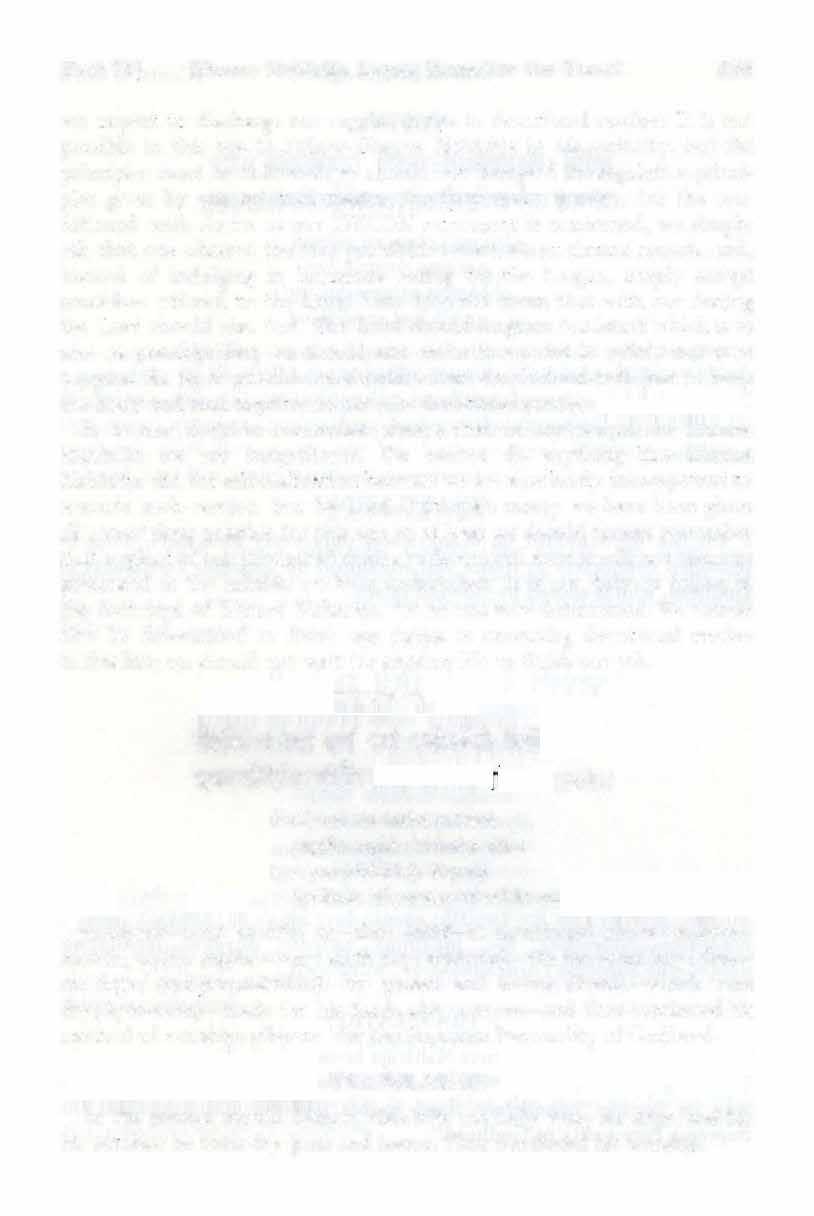
fmtf � � lffif��cit � I
(Utqati�flr:itUf: l\9�11


dvitiyam ca tathii miisam
§U§fhe §U§the'rbhako dine
tnw-parr-iidibhift sirrai�
krtiinno 'bhyarcayan vibhum
dvitiyam-next month; ca-also; tathii-as mentioned above; mii.sammonth; §U§the §U§the-every sixth day; arbhaka[l-theinnocent boy; dineon days; trrw�parr-a-iidibhi�-by grasses and leaves; sirraifl-which were dry; krta-anna�-;- made for his food; abhyarcayan-and thus continued his method of worship;vibhum-for the Supreme Personality of Godhead.



TRANSLATION
In the second month Dhruva Maharaja ate only every six days, and for his eatables he took dry grass and leaves. Thus continued his worship.
Text 73] Dhruva Maharaja Leaves Home for the Forest 349
TEXT 74

� �stf.t' 1
�sil�QtW411JHij'i1Nwn 11�\lll
trtiyarh ciinayan miisarh
navame navame'hani
abbhak�a uttamaslokam
upiidhiivat samiidhinii


trtiyam-the third month; ca-also; iinayan-passing; miisam-one month; navame navame-on each ninth; ahani-on the day; abbhakfia�drinking water only; uttamaslokam-the Supreme Personality of Godhead, who is worshiped by selected verses; upiidhiivat-worshiped; samiidhiniiin trance.
TRANSLATION
On the third month he drank water only every nine days. Thus he remained completely in trance and worshiped the Supreme Personality of Godhead, who is adored by selected verses.
TEXT 75
caturtham api vai miisarh
dviidase dviidase 'hani
viiyu-bhak§o jita-sviiso
dhyiiyan devam adhiirayat
caturtham-fourth; api- also; vai-in that way; miisam-the month; dviidase dviidase-on the twelfth; ahani-day; viiyu-air; bhak§a�-eating; jita-sviisa�- controlling the breathing process; dhyiiyan- meditating; devam-the Supreme Lord; adhiirayat - worshiped.

TRANSLATION
In the fourth month Dhruva Maharaja became a complete master of the breathing exercise, and thus he inhaled air only every twelfth day. In this way he became completely fixed in his position and worshiped the Supreme Personality of Godhead.
350 Srimad-Bhagavatam [Canto 4, Ch. 8
�
�
��'4Rf���� ����--�q¥4\itl(q(
ll\9�11
Dhruva Maharaja Leaves Home for the Forest
TEXT 76
q�'����Mftr�'IIRU i'tl�iSI:1
�q_ ;m �twlm��u'!R:�u:qe:ll\9'"
paii.came miisy anupriipte jita-sviiso nrpiitmajaft
dhyiiyan brahma padaikena tasthau sthiirzur iviicalaft
paii.came-in the fifth; miisi-in the month; anupriipte-being situated; jita-sviisaft-and stil.l controlling the breathing; nrpa-iitmajaft-the son of the King; dhyiiyan-meditating; brahma-the Supreme Personality of Godhead; padii ekena-with one leg; tasthau-stood; sthiiruft-j ust like a column; iva-like; acalaft-without movement.
TRANSLATION
By the fifth month, Maharaja Dhruva, the son of the King, had controlled his breathing so perfectly that he was able to stand on only one leg, just as a column stands, without motion, and concentrate his mind fully on the Param-brahman.
TEXT 77
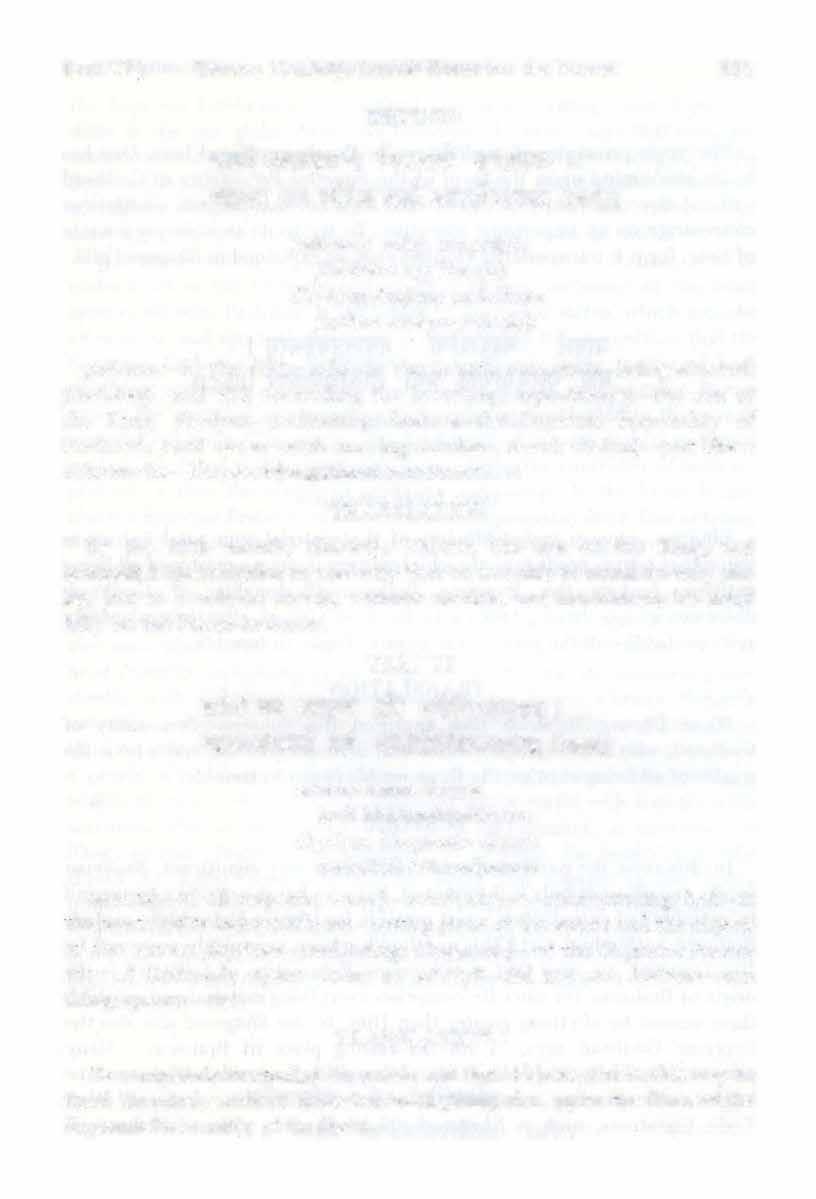
sarvato mana iikr�ya hrdi bhutendriyiisayam dhyiiyan bhagavato rupam niidriik�it kincaniiparam
sarvataft-in all respects; manaft- mind ; iikr�ya-concen tratin g; hrdi- in theheart;bhilta-indriya-as'ayam-resting place of the senses and the objects of the senses; dhyiiyan-meditating; bhagavata1;1.-of the Supreme Personality of Godhead; riipam-form ; na adriik�il-did not see; kiii.cana-anything; aparam-else.
TRANSLATION
He completely controlled his senses and their objects, and in this way he fixed his mind, without diversion to anything else, upon the form of the Supreme Personality of Godhead.
Text
77]
351
� ¥R llti§QI �\ijPJ\�Iij'4'(l \tU�t'ftiN\fl� wtl«��oqwtlq('(11�11
PURPORT
The yogic principles of meditation are clearly explained here. One has to fix one's mind upon the form of the Supreme Personality of Godhead without diversion to any other objective. It is not that one can meditate or concentrate on an impersonal objective. To try to do so is simply a waste of time, forit is unnecessarilytroublesome, as explained in Bhagavad-gitii.
TEXT 78 3INR ¥t«lf:.�f Sl\1191�()\t� I

Jl1r 'li.ll(l4qiOI� �)
iidhiirarh mahadiidiniirh pradhiina-puru§esvaram brahma dhiirayamiirwsya trayo lokiis cakampire
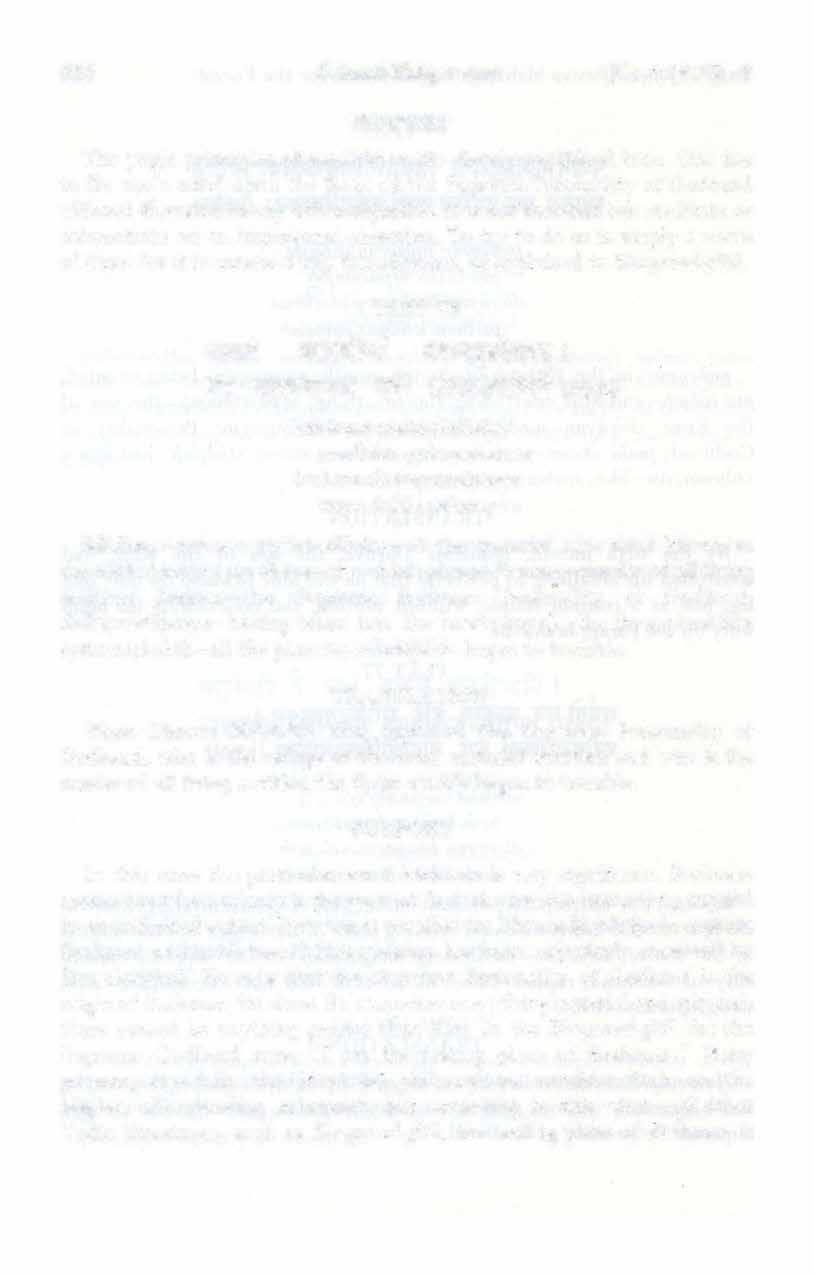
11\!l�tl
iidhiiram-repose; mahat-iidiniim- of the material sum total known as the mahat-tattva; pradhiina-the chief; puru§a-iSvaram-master of all living entities; brahma-the Supreme Brahman Personality of Godhead; dhiirayamiirwsya-having taken into the heart; traya�- the three planetary systems; loka�-al1 the planets; cakampire- began to tremble.
TRANSLATION
When Dhruva Maharaja thus captured the Supreme Personality of Godhead, who is the refuge of the total material creation and who is the master of all living entities, the three worlds began to tremble.
PURPORT
In this verse the particular word brahman is very significant. Brahman means onewho not onlyis the greatest,butwho hasthe potencyto expand to anunlimited extent. How wasit possible for Dhruva Maharaja to capture Brahman within his heart? This question has been very nicely answered by J!va Gosvami. He says that the Supreme Personality of Godhead is the originof Brahman,for since He compriseseverythingmaterial and spiritual, there cannot be anything greater than Him. In the Bhagavad-gitii also the Supreme Godhead says, "I am the resting place of Brahman." Many persons, especially the Mayavadi philosophers, consider Brahman the biggest, all-expanding substance, but according to this verse and other Vedic literatures, such as Bhagavad-gitii, the resting place of Brahman is
352 Srimad-Bhagavatam [Canto 4, Ch. 8
���'"
the Supreme Personality of Godhead, just as the resting place of the sunshine is the sun globe. Srila Jiva Gosvami, therefore, says that since the transcendental form of the Lord is the seed of all greatness, He is the Supreme Brahman. Since the Supreme Brahman was situated in the heart of Dhruva Maharaja, he became heavier than the heaviest, and therefore everything trembled in all three worlds and in the spiritual world.
The mahat-tattva, or the sum total of the material creation, is to be understood as the ultimate end of all universes, including all the living entities therein. Brahman is the resort of the mahat-tattva, which includes all material and spiritual entities. It is described in this connection that the Supreme Brahman, the Personality of Godhead, is the master of both pradhiina and pnru�a. Pradhana means subtle matter, such as ether. Puru§a means the spiritual spark living entities who are entangled in that subtle material existence. These may also be described as para prakrti and apara prakrti, as stated in Bhagavad-gitii . Kr1lt:Ja, being the controller of both the prakrtis, is thus the master of pradhiina and puru�a. In the Vedic hymns also the Supreme Brahmanisdescribedas anta�pravi�f.a� siistii. Thisindicates that the Supreme Personality of Godhead is controlling everything and entering into everything. The Brahma-samhitii further confirms this: ar-{iantarastha-paramiif}u-cayiintarastham: He has not only entered the universes, but He has entered even into the atom. In Bhagavad-gita Kr�t;�a also says, v4tabhyaham idam krtsnam. The Supreme Personality of Godhead controls everything by entering into everything. By associating constantly with the Supreme Personality in his heart, Dhruva Maharaja naturally became equal to the greatest, Brahman, by His association, and thus became the heaviest, and the entire universe trembled. In conclusion, a person who always concentrates on the transcendental form of Kr�!)a within his heart can very easily strike the whole world with wonder at his activities. This is the perfection of yoga performance, as confirmed in Bhagavad-gita. Yoginiim api sarve§am: of all yogis, the bhakti-yogl, who thinks of Kr1l!)a always within his heart and engages in His loving transcendental service, is the topmost. Ordinary yogis can exhibit wonderfulmaterial activities, known as a§ta-siddhi, eight kinds of yogic perfection, but a pure devotee of the Lord can surpass these perfections by performing activities which can make the whole universe trembte.
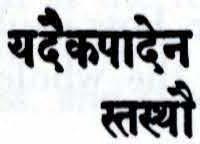
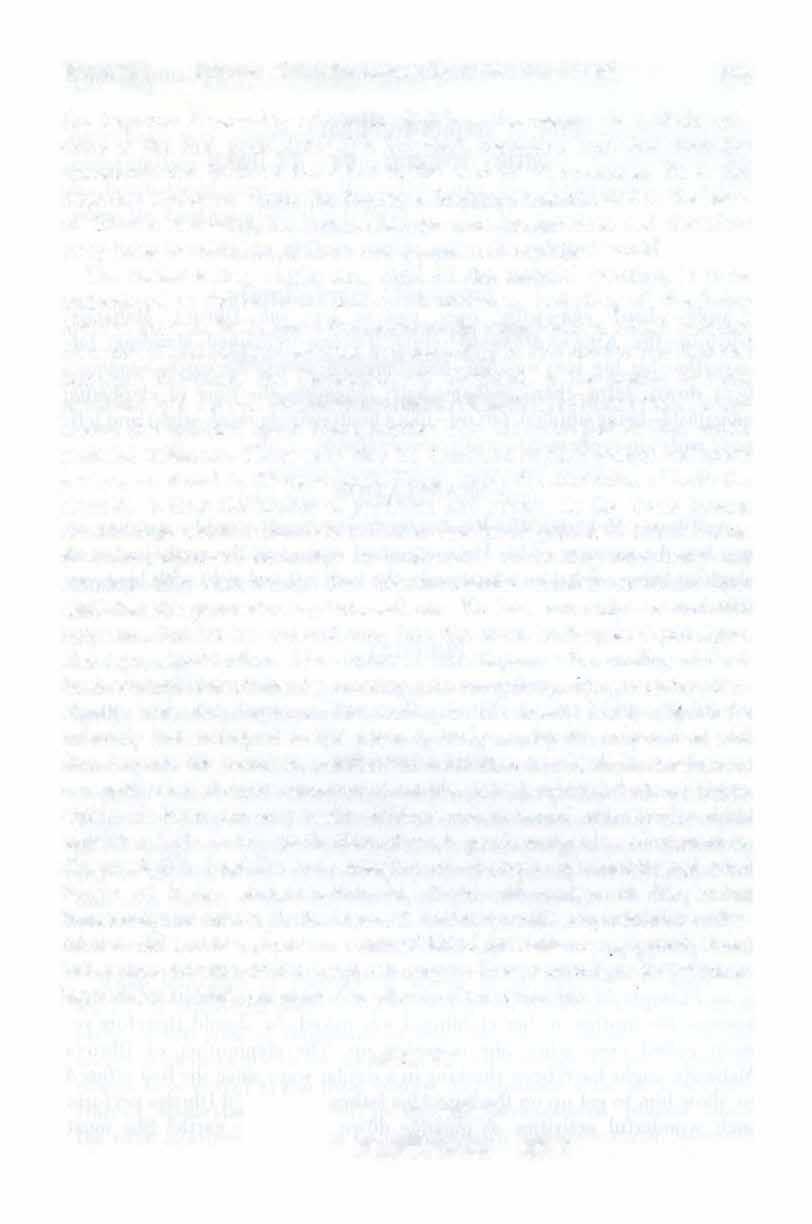
Text 79] Dhruva Maharaja Leaves Home for the Forest 353
TEXT 79 6 �<t<tuPtcft�61 � 1
yadaika-padena sa piirthivarbhakas
tasthau tad-a;tgu§(ha-nipit;lita mahi
nanama tatrardham ibhendradhi�thita
tariva sabyeta-rata� pade pade
yada-when; eka-with one; padena-Ieg; sa�-Dhruva Maharaja; piirthiva-the King's; arbhaka{l - child ; tasthau-remained standing; tatarigu�tha- his big toe; nipit;lita- bein g pressed; mahi-the earth; nanamabent down; tatra-then ; ardham-half; ibhendra-the king of elephants; adhi�thitii- being situated; taniva-like aboat; sabyeta-rataQ.-right and left; pade pade-in every step.
TRANSLATION
As Dhruva Maharaja, the King's son, kept himself steadily standing on one leg, the pressure of his big toe pushed down half the earth, just as an elephant being carried on a boat rocks the boat left and right with his every step.
PURPORT
The most significanf expression in this verse is parthivarbhaka ("son of the King"). When Dhruva Maharaja was at home, although he was a king's son, he was prevented from getting on the lap of his father. But when he became advanced in self-realization or devotional service, by the pressure of his toe he could push down the whole earth. That is the difference between ordinary consciousness and Kr:}l}a consciousness. In ordinary consciousness a king's son may be refused something even by his father, but when the same person becomes fully Kr11l}a conscious within his heart, he can push down the earth with the pressure of his toe.

One cannot argue, "How is it that Dhruva Maharaja, who was prevented from getting up on the lap of his father, could press down the whole earth?" This argument is not very much appreciated by the learned, for it is an example of nagnamatrkii logic. By this logic one would think that because his mother in her childhood was naked she should therefore remain naked even when she is grown up. The stepmother of Dhruva Maharaja might have been thinking in a similar way: since she had refused to allow him to get up on the lap of his father, how could Dhruva perform such wonderful activities as pressing down the whole earth? She must
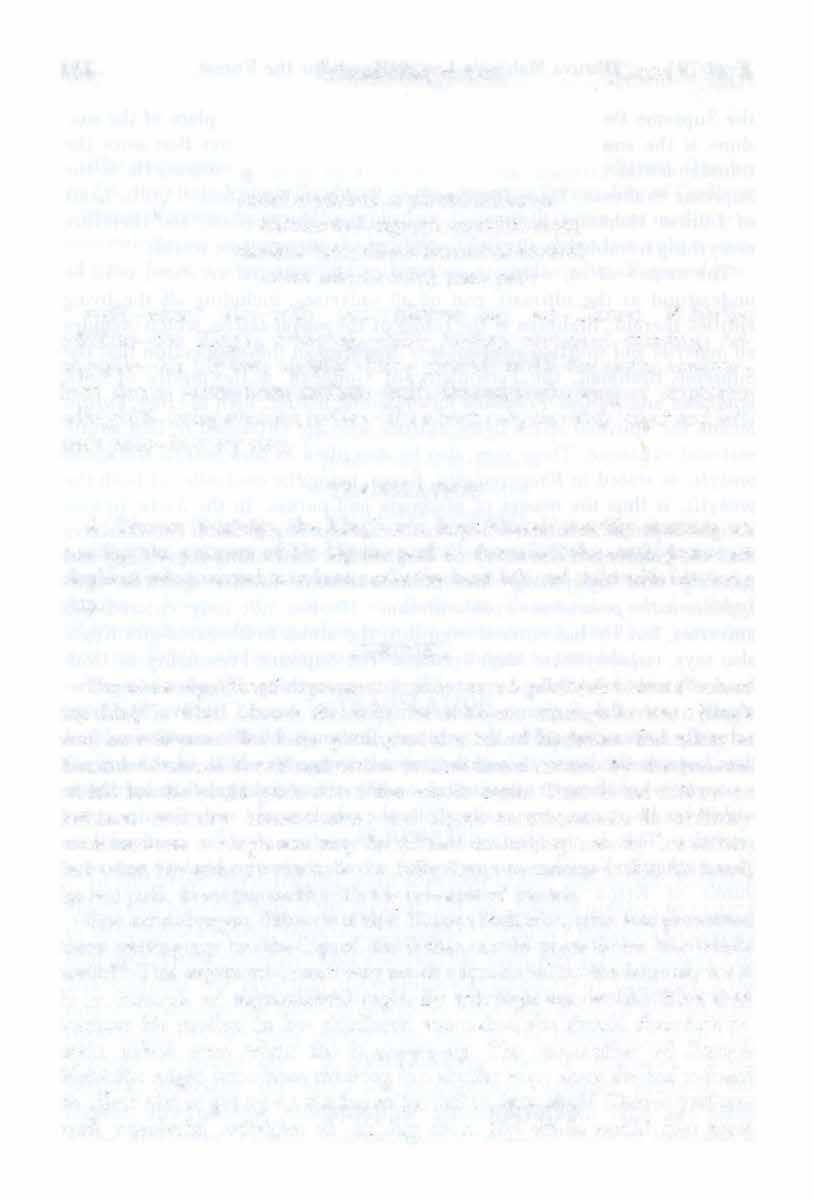
354 Srimad-Bhagavatam
[Canto 4, Ch. 8
have been very surprised when she learned that Dhruva Maharaja, by con cent rating constantly on the Supreme Personality of Godhead within his heart, could press down the en tire earth, like anelephant who presses downthe boat on which it is loaded.
TEXT 80

6f4t'ilf'l\li41it� Rlfl'41€¥ieil m A�lt\'4._9'i4i41 �I
tasminn abhidhyiiyati visvam iitmano dvaram nirudhyiisum ananyayii dhiyii
lokii nirucchviisa-nipit;litii bhrsarh saloka-piilii� sara[J-arh yayur harim
tasmin-Dhruva Maharaja; abhidhyiiyati-when meditating with full concentration; visvam iitmana{t -the total body of the universe; dviiramthe holes; nirudhya-closed ; asum-the life air; ananyaya-without being diverted; dhiya-meditation; loka!t-all the planets ; nirucchvasahaving stopped breathing; nipit;litii{t- thus being suffocated; bhrsam-very SOOn; saloka-piilii�-al1 the greatdemigodsfrom different planets; sara!Wmshelter; yayu�- t ook; harim-ofthe Supreme Personali ty of Godhead.
TRANSLATION
When Dhruva Maharaja became practically one in heaviness with Lord Vi�pu, the total consciousness, due to his fully concentrating and closing all the holes of his body, the total universal breathing became choked up, and all the big demigods in all the planetary systems felt suffocated and thus took shelter of the Supreme Personality of Godhead.
PURPORT
When hundreds of persons are Sittmg in an airplane, although they remain as individual units, they each share in the total force of the airplane, which runs at thousands of miles per hour; similarly, when unit energyisidentified withthe service of the total energy,theunitenergy becomes as powerful as the total energy. Asexplainedinthepreviousverse, Dhruva Maharaja, because of his spiritual advancement, became almost the total heaviness, and thus he pressed down the whole earth. l\1oreover,
Text 80] Dhruva Maharaja Leaves Home for the Forest 355
�Pl�1(1Pfc(t�61� �mt: � ·ll�oll
by such spiritual power his unit body became the total body of the universe. Thus when he closed the holes of his unit body to firmly concentrate his mind on the Supreme Personality of Godhead, all the units of the universe-namely all the living entities, including the big demigods-felt the pressure of suffocation, as if their breathing were being choked. Therefore they all took shelter of the Supreme Personality of Godhead because they were perplexed as to what had happened.
This example of Dhruva Maharaja's closing the holes of his personal body and thereby closing the breathing holes of the total universe clearly indicates that a devotee, by his personal devotional service, can influence all the people of the whole world to become devotees of the Lord. If there is only one pure devotee in pure Kr�fla consciousness, he can change the total consciousness of the world into Kr�l}a consciousness. This is not very difficult to understand if we study the behavior of Dhruva Maharaja.

TEXT 81
devii ucu�
naivarh vidiimo bhagavan priirw-rodharh
cariicarasyiikhila-sattva-dhiimna�
vidhehi tan no vrjiniid vimok§arh
priiptii vayarh tviirh sara[!arh sara[!yam
devii{t ucu�-al 1 thedemigods said; na-not; evam-thus; vidiima�-we can understand; bhagavan-0 Personality of Godhead; prii[!a- rodham-how we feel our breathing choked; cara- moving; acarasya-not moving; akhilauniversal; sattva-existence; dhiimna�-the reservoir of; vidhe hi-kindly do theneedful; tat-therefore; na�t -our; vrjinat- from the danger; vimok�amliberation; prapta�-approaching; vayam-all of us; tvam-unto You; sara [lam-shelter; sarartyam- worthy to be taken shelter of.
TRANSLATION
The demigods said: Dear Lord, You are the refuge of all moving and nonmoving living entities. We feel all living entities to 'he suffocating,
356 Srimad-Bhagavatam [Canto 4, Ch. 8
"tcrrq: � � � SIIUI@i :q(l:q*IIR.iteQ'+il':tHH'1 � "' t�•uf«l• snm ifli m �ta(U�aJ:.II����
their breathing processes choked up. We have never experienced such a thing. Since You are the ultimate shelter of all surrendered souls, we have thereforeapproached You; kindly save usfrom this danger.
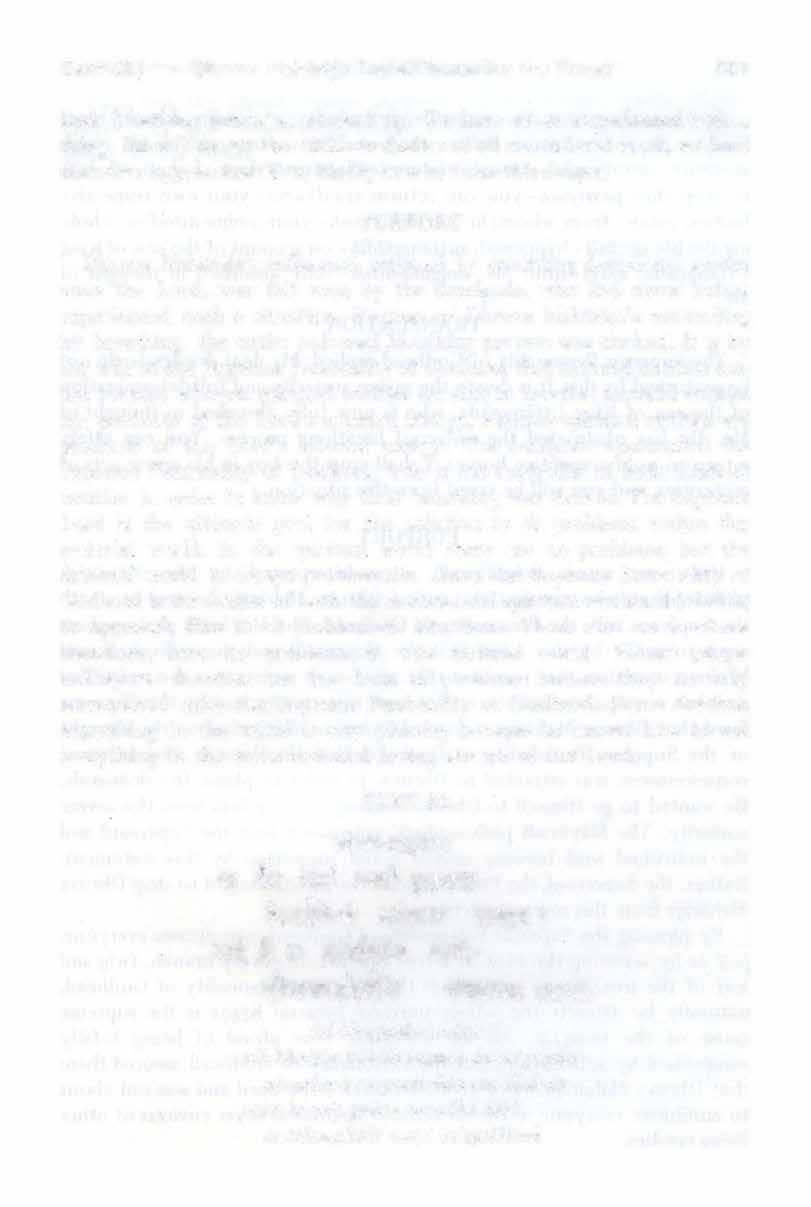
PURPORT
Dhruva Maharaj a's influence, attained by executing devotional service unto the Lord, was felt even by the demigods, who had never before experienced such a situation. Because of Dhruva Maharaj a's controlling his breathing, the entire universal breathing process was choked. It is by the will of the Supreme Personality of Godhead that material entities cannot breathe whereas spiritual entities are able to breathe;material entities are products of the Lord's external energy, whereas spiritual entities are products of the Lord's internal energy. The demigods approached the Supreme Personality of Godhead, who is the controller of both kinds of entities, in order to know why their breathing was choked. The Supreme Lord is the ultimate goal for the solution to all problems within this material world. In the spiritual world there are no problems, but the material world is always problematic. Since the Supreme Personality of Godhead is the master of both the material and spiritual worlds, it is better to approach Him in all problematic situations. Those who are devotees, therefore, have no problems in this material world. Visvam piirrtasukhiiyate: devotees are free from all problems because they are fully surrendered unto the Supreme Personality of Godhead. For a devotee, everything in the world is very pleasing because he knows how to use everything in the transcendental loving service of the Lord.
Text 82) Dhruva Maharaja Leaves Home for the Forest 357
st.:fh�tr�� "' u
S1M�I(( � I 1Rftft if: SIIUif.t(t� amftf(,'q(ijqlf«o�� 411<11€¥41 "'�" sd"-bhagaviin uviica mii bha4ta biilam tapaso duratyayiin nivartayi�ye pratiyata sva-dhama yato hi va� prar;w-nirodha as"id auttanapadir mayi satigatatma
TEXT82
� �5:(���·AI���G�
sri bhagaviin uviica-the Supreme Personality of Godhead replied; ma bhai�ta-do not be afraid; balam-the boy Dhruva; tapasa�-by his severe a usterity; duratyayat-strongly determined; nivartayi�ye-1 shall ask him to stop this; pratiyiita-you can return; sva-dhiima-your own respective homes; yataft-from whom; hi-certainly; va�-your;priirw-nirodha-choking thelife air;astt-happened;auttanapadi/;l-onaccountof the son of King Uttanapada; mayi-unto Me; saligata-iitma-fully absorbed in thought of Me.
TRANSLATION
The Supreme Personality of Godhead replied: My dear demigods, do not be perturbed bythis. It is dueto the severe austerity and full determination of the son of King Uttanapada, who is now fully absorbed in thought of Me. He has obstructed the universal breathing process. You can safely return to your respective homes. I shall stop this boy in his severe acts of austerities, and you will be saved from this situation.
PURPORT
Here one word, satigatiitmii, is misinterpreted by the Mayavadi philosophers, who say that the self of Dhruva Maharaja became one with the Supreme Self, the Personality of Godhead. The M ayavadl philosophers want to prove by this word that the Supersoul and the individual soul become united in this way and that after such unification the individual soul has no separate existence. But here il is clearly said by the Supreme Lord that Dhruva Maharaja was so absorbed in meditation on the thoughl of the upreme Personality of Godhead that He Himself, the universal consciousness, was attracted to Dhruva. In order to please the demigods, He wanted to go Himself to Dhruva Maharaja to stop him from this severe austerity. The Mayavad'i philosophers' conclusion that the Supersuul and the individual soul become united is not support d by this sta l ement. Rather, the Supersoul, the Personality of Godhead, wanted to stop Dhruva Maharaja from this sever austerity.
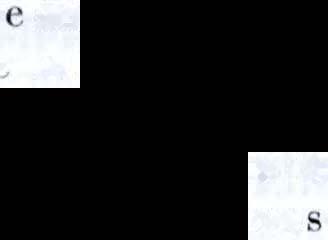

By pleasing the Supreme Personality of Godhead, one pleases everyone, just as by watering the root of a tree one satisfies every branch, twig and leaf of the tree. If one can attract the Supreme Personality of Godhead, naturally he attracts the whole univer e because Kr!ll}a is the supreme cause of the universe. All the demigods were afraid of being totally vanquished by suffocation, but the Persona lity of Godhead assured them that Dhruva l\llaharaja was a great devotee of the Lord and was not about to annihilate everyone in the universe. devotee is never envious of other living entities.

358 Srimad-Bhagavatam [Canto 4, Ch. 8
Thus end the Bhaktivedanta purports of the Fourth Canto, Eighth Chapter, of the Sr!mad-Bhagavatam, entitled "Dhruva Mahiiriija Leaves Home for the Forest."

Text 82J Dhruva Maharaja Leaves Home for the Forest. 359






 His Divine Grace A. C. Bhaktivedanta Swami Prabhupada
His Divine Grace A. C. Bhaktivedanta Swami Prabhupada








 Plate 5 Speaking to all the sages present, Lord Siva sat as gravely as time eternal under the giant banyan tree. (page 189)
Plate 5 Speaking to all the sages present, Lord Siva sat as gravely as time eternal under the giant banyan tree. (page 189)
 Plate 6
Plate 6
 Plate 7 After Dhruva Maharaja received instructions from his spiritual master Narada and entered Madhuvana Forest to execute devotional service, Narada thought it wise to go to the King. (page 341)
Plate 7 After Dhruva Maharaja received instructions from his spiritual master Narada and entered Madhuvana Forest to execute devotional service, Narada thought it wise to go to the King. (page 341)














































































































































































































































































































































































































































































































































































































